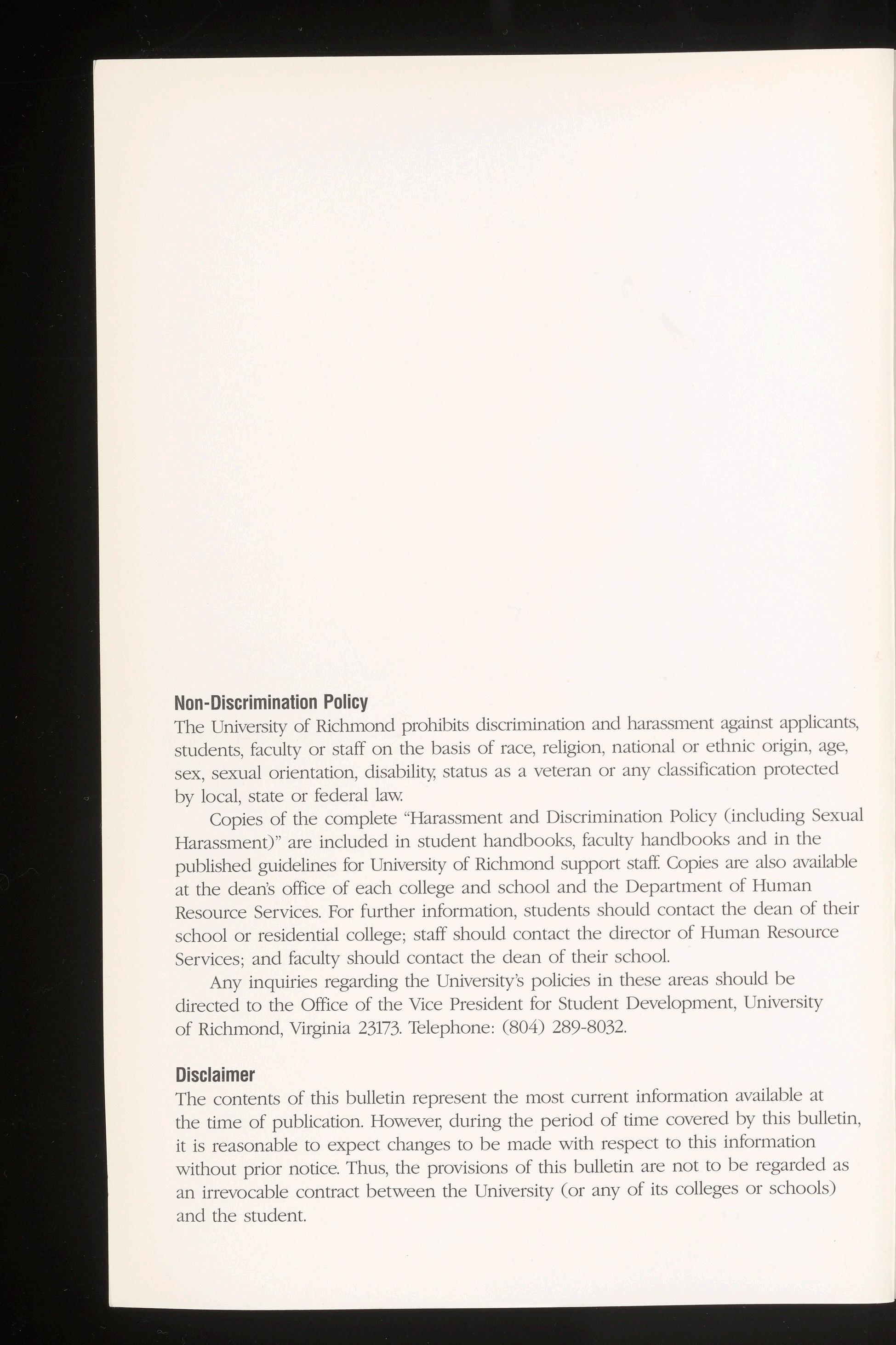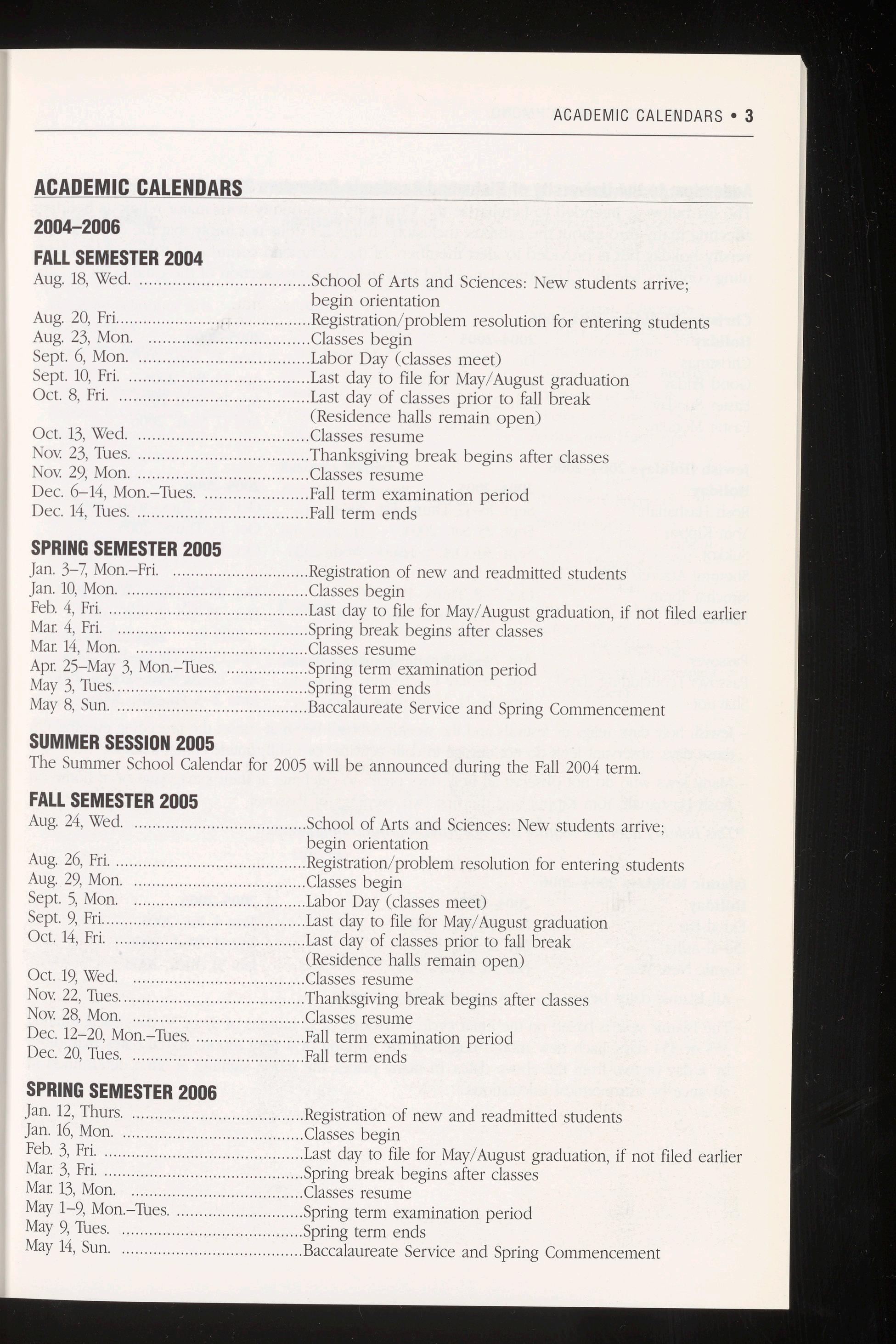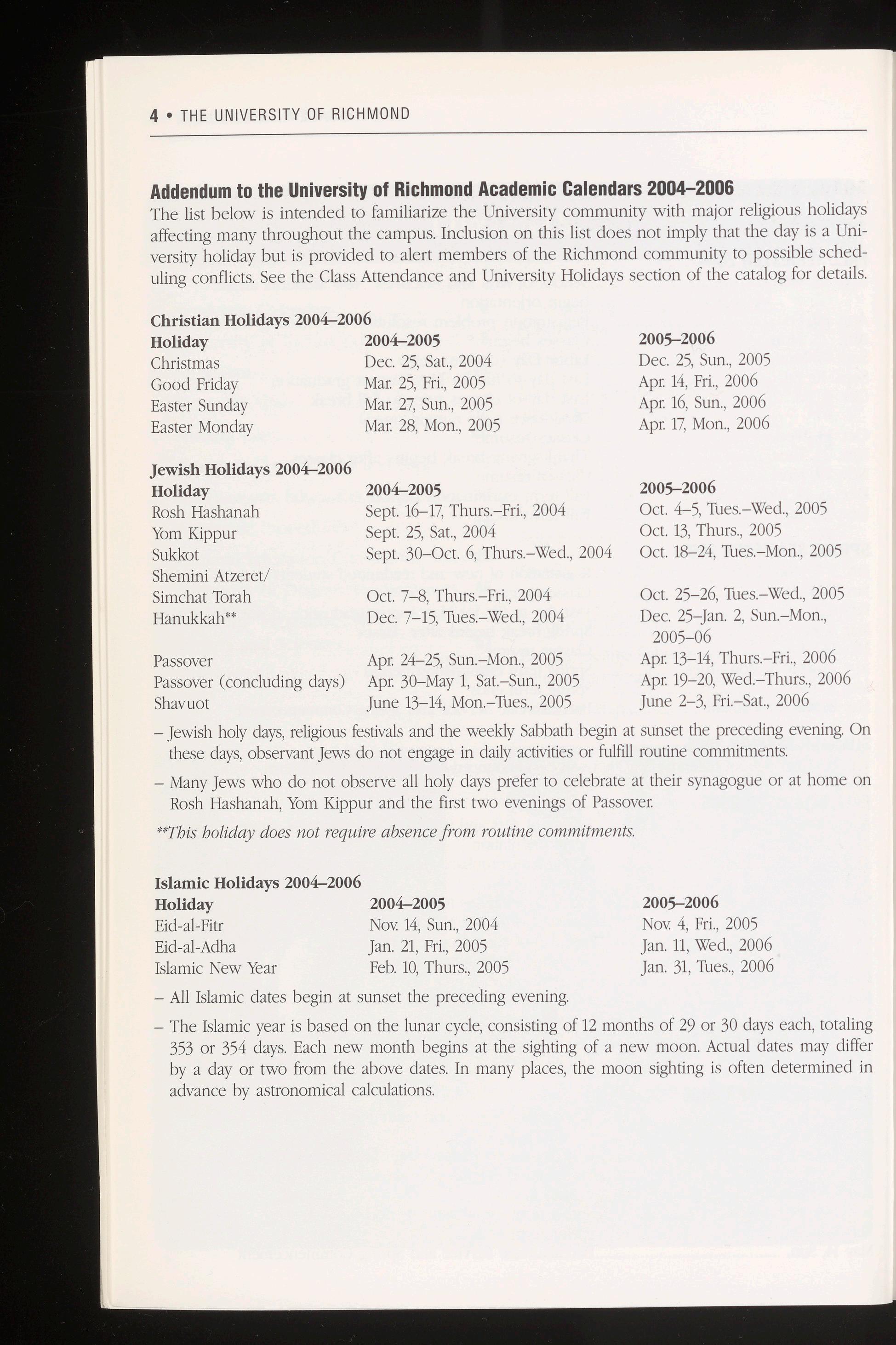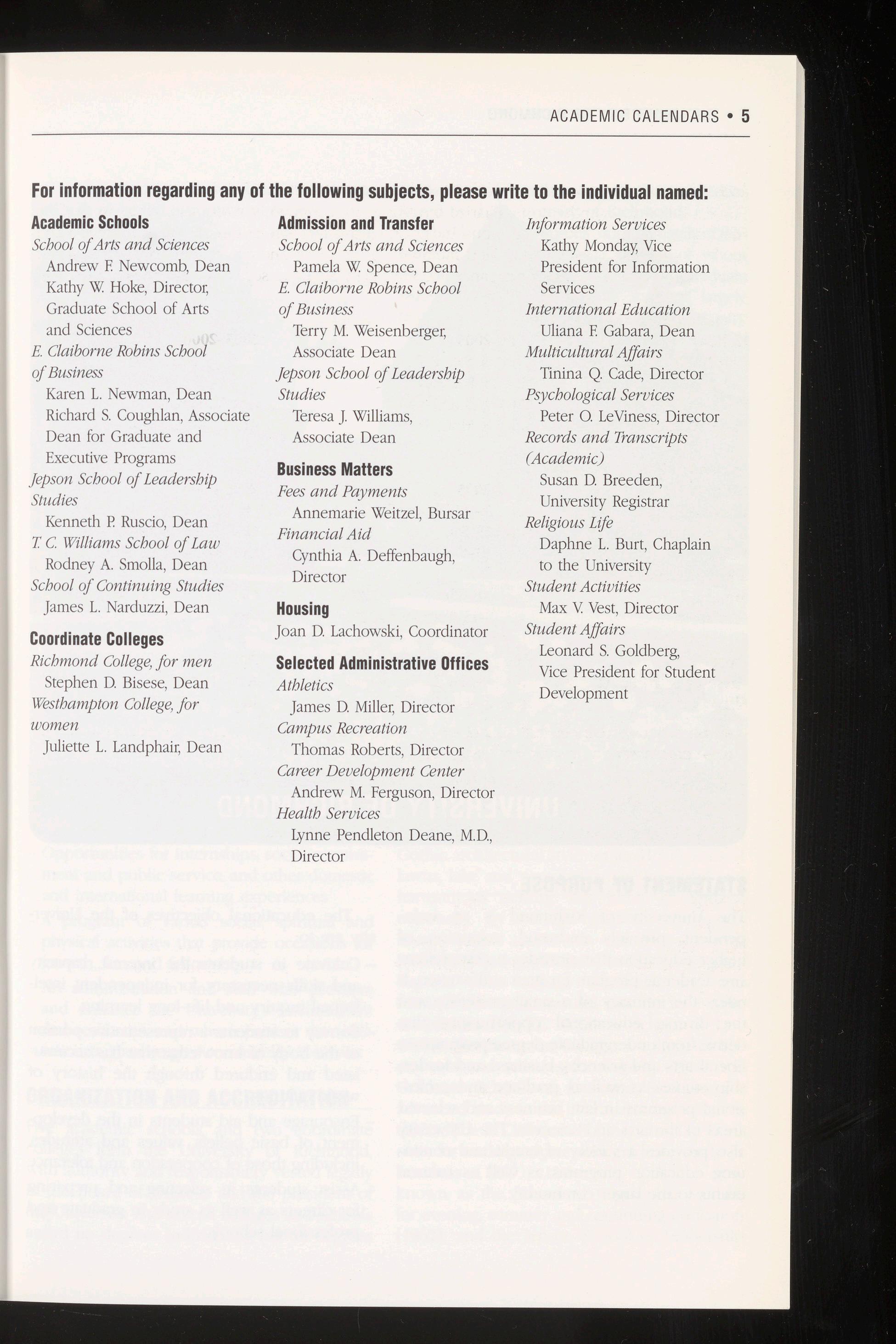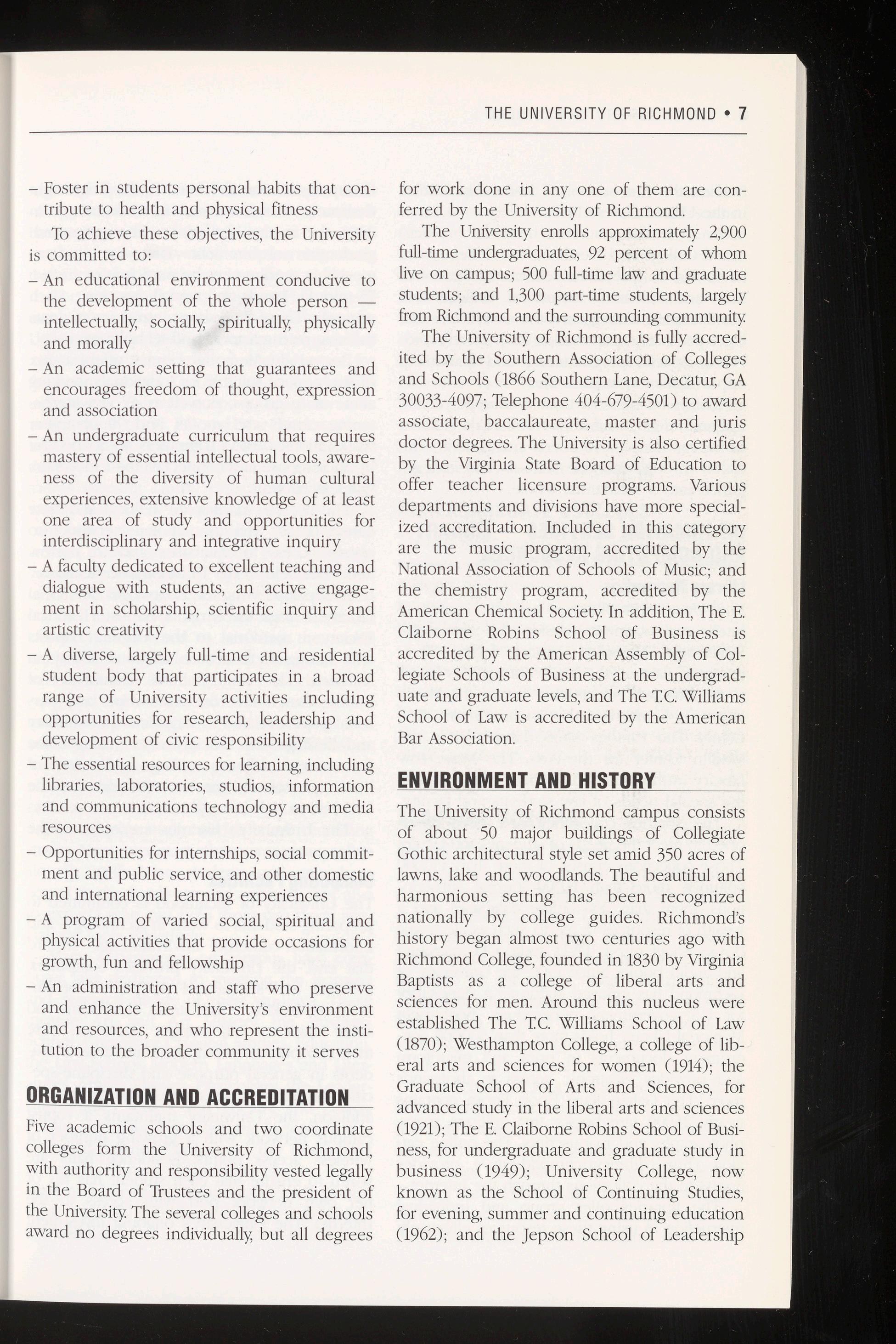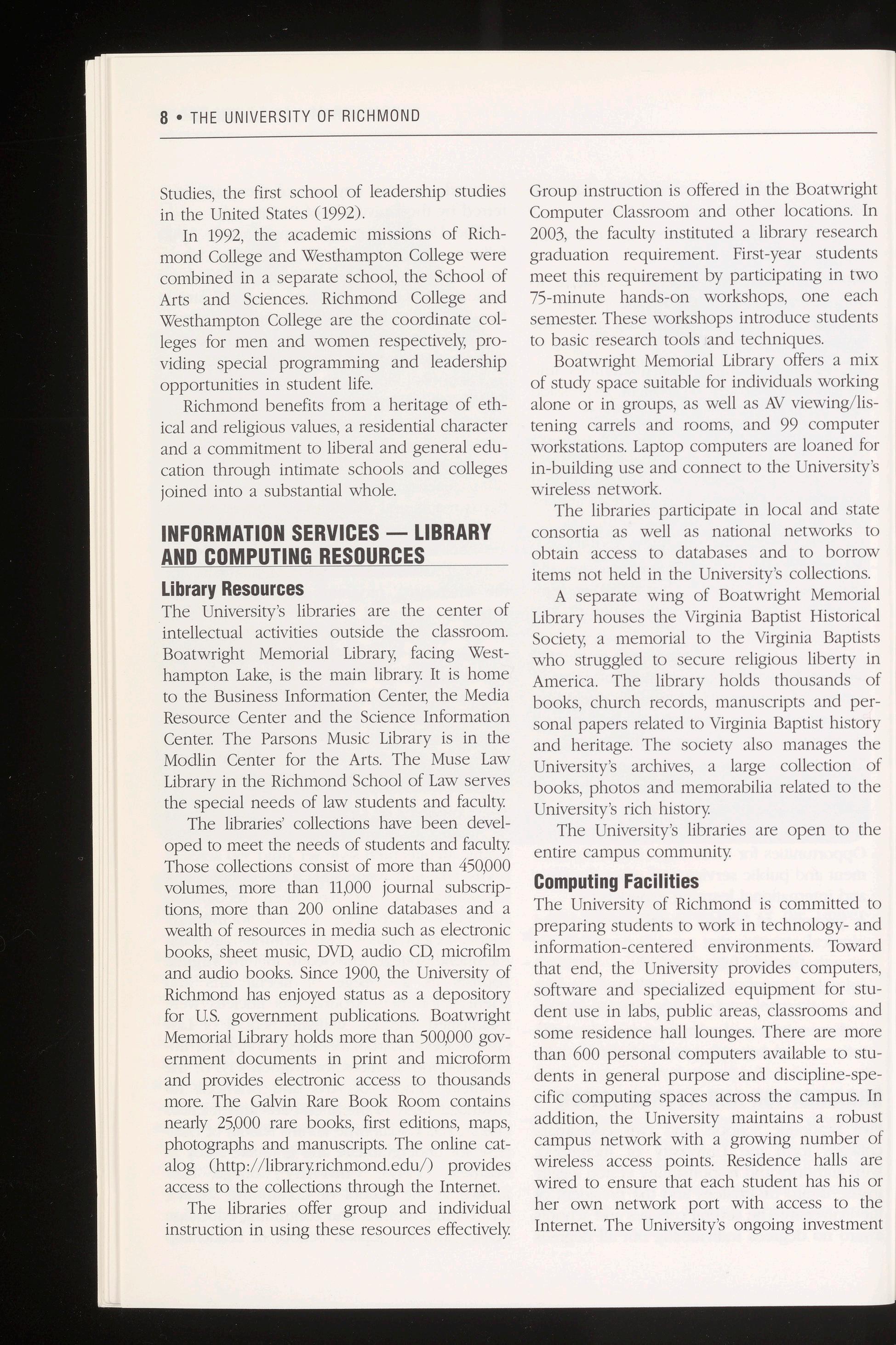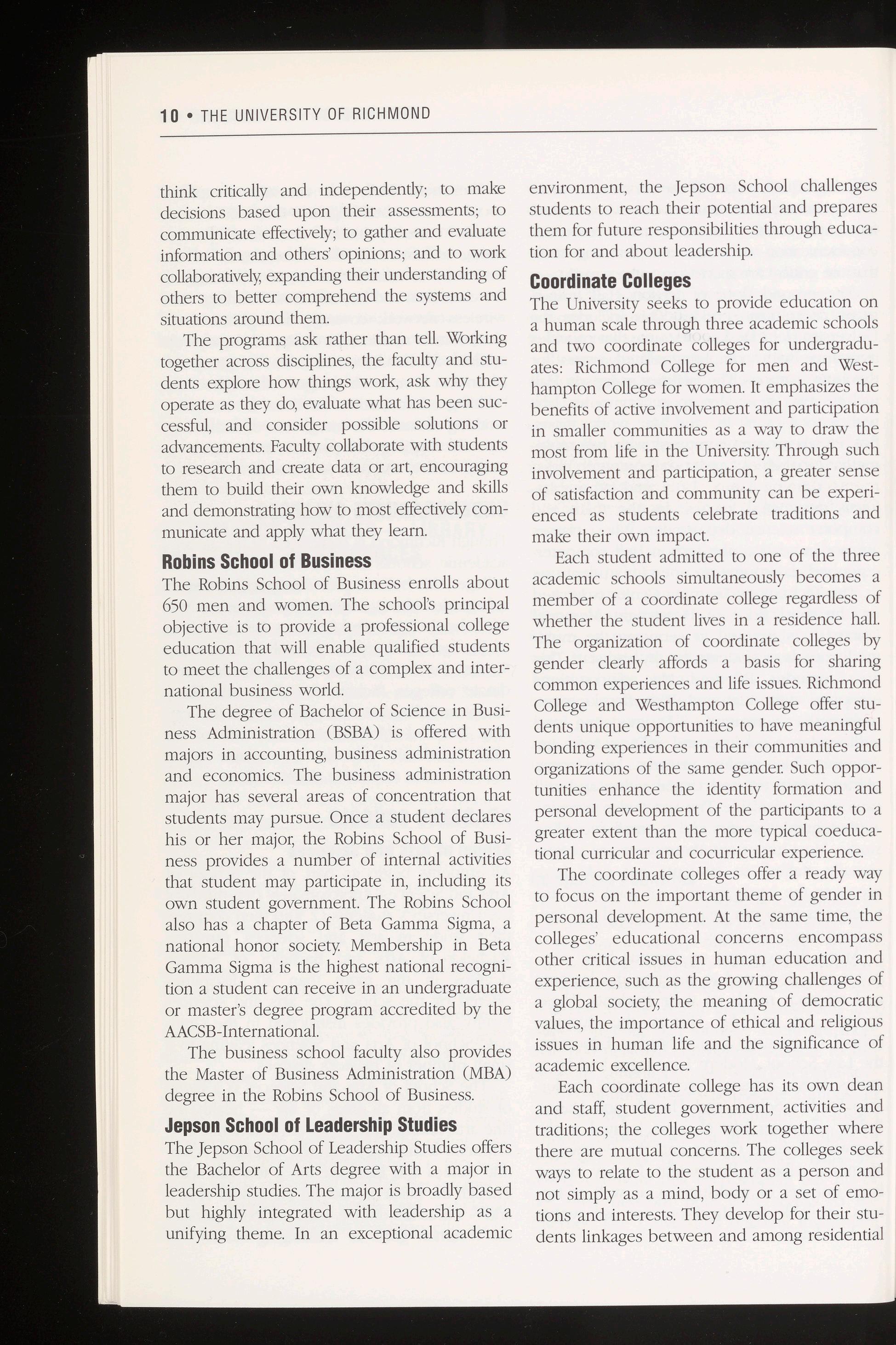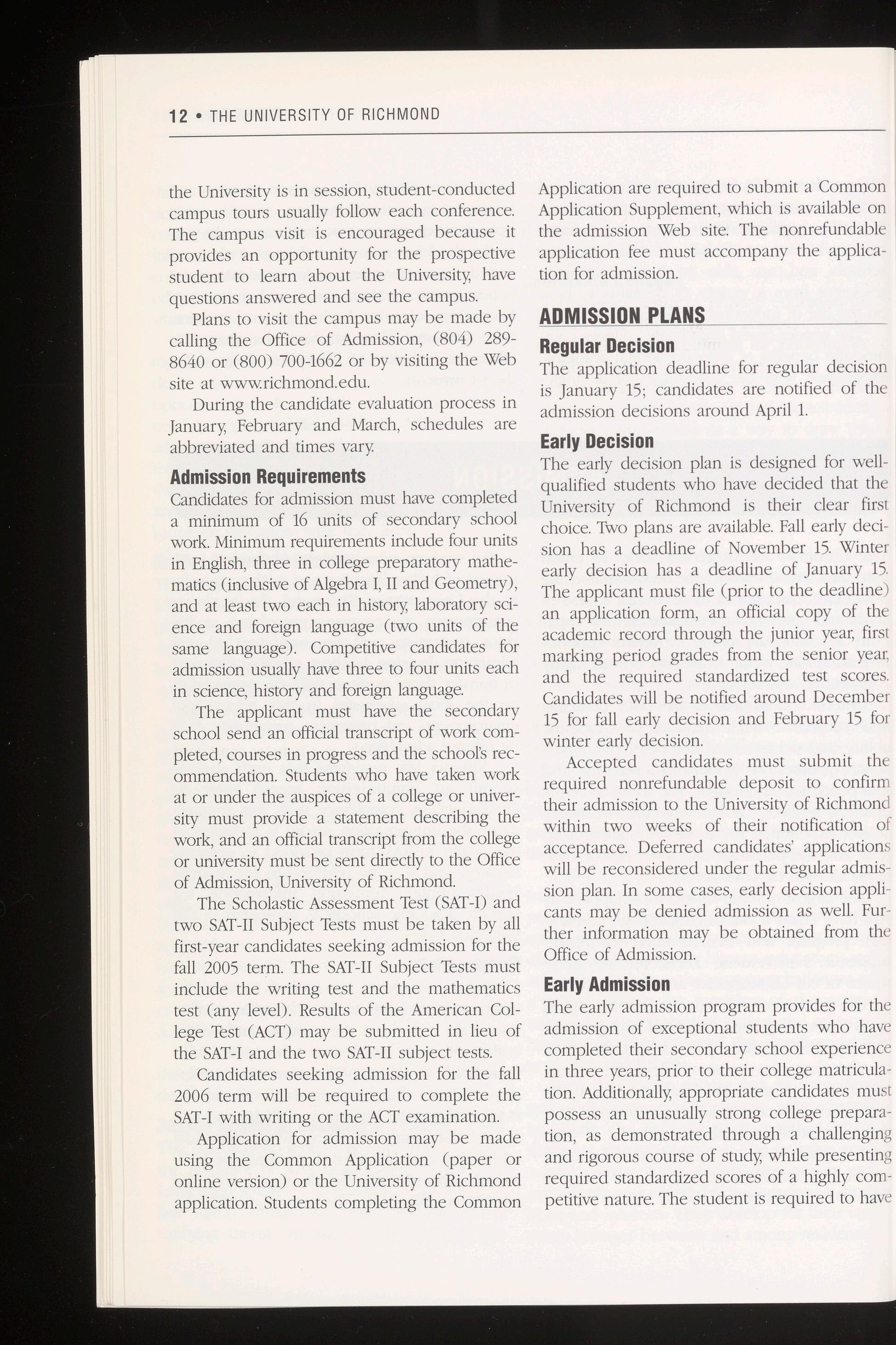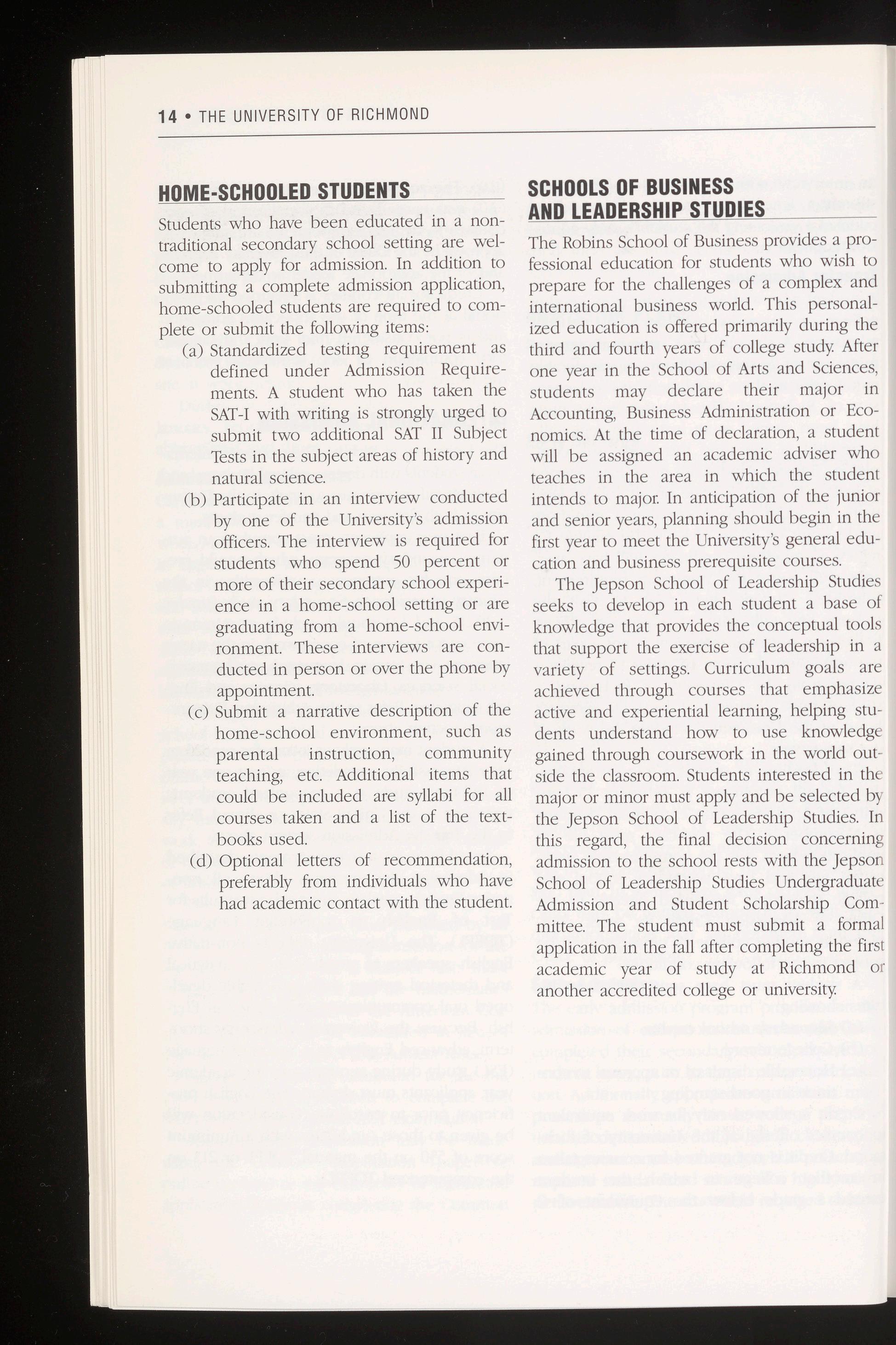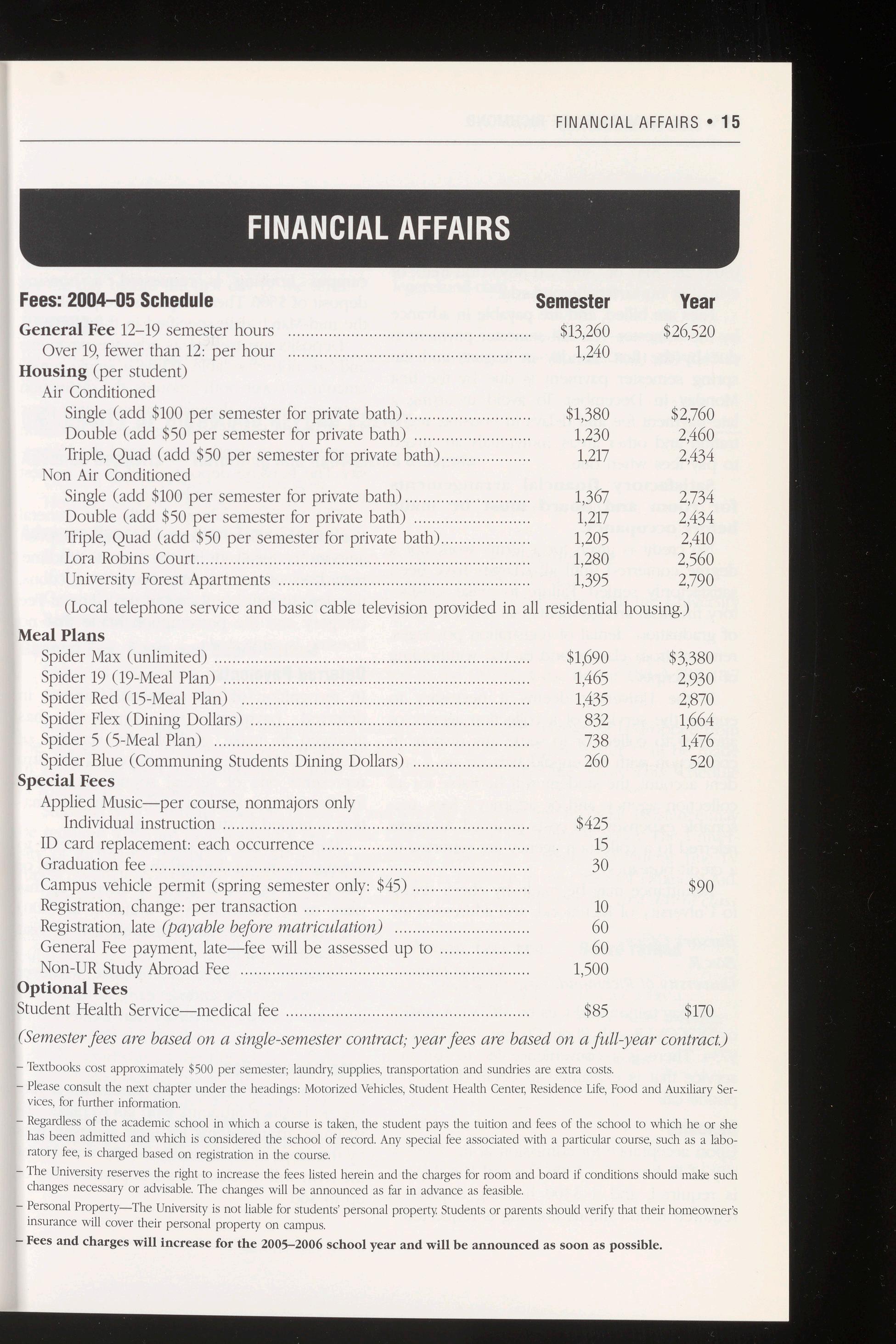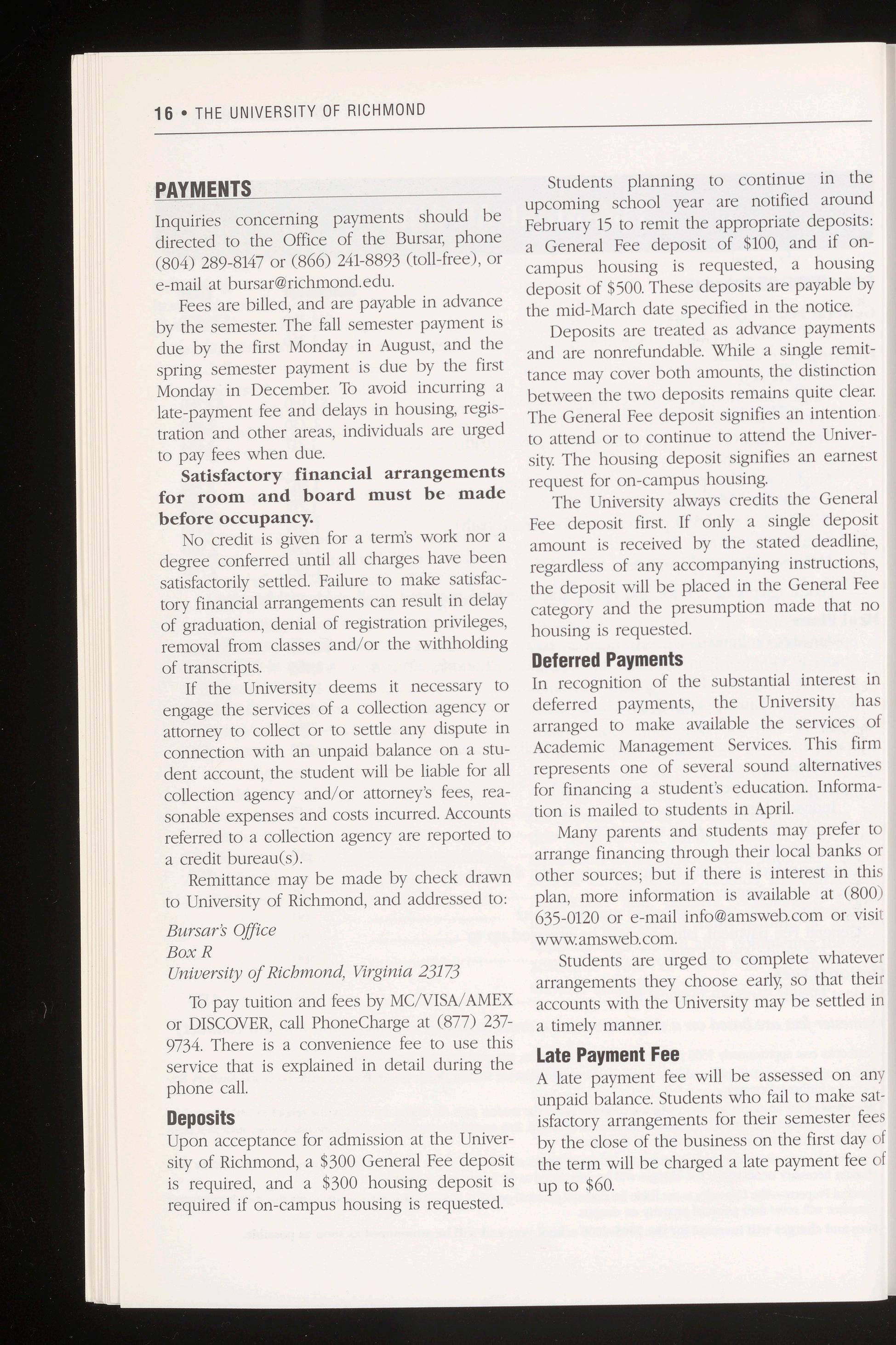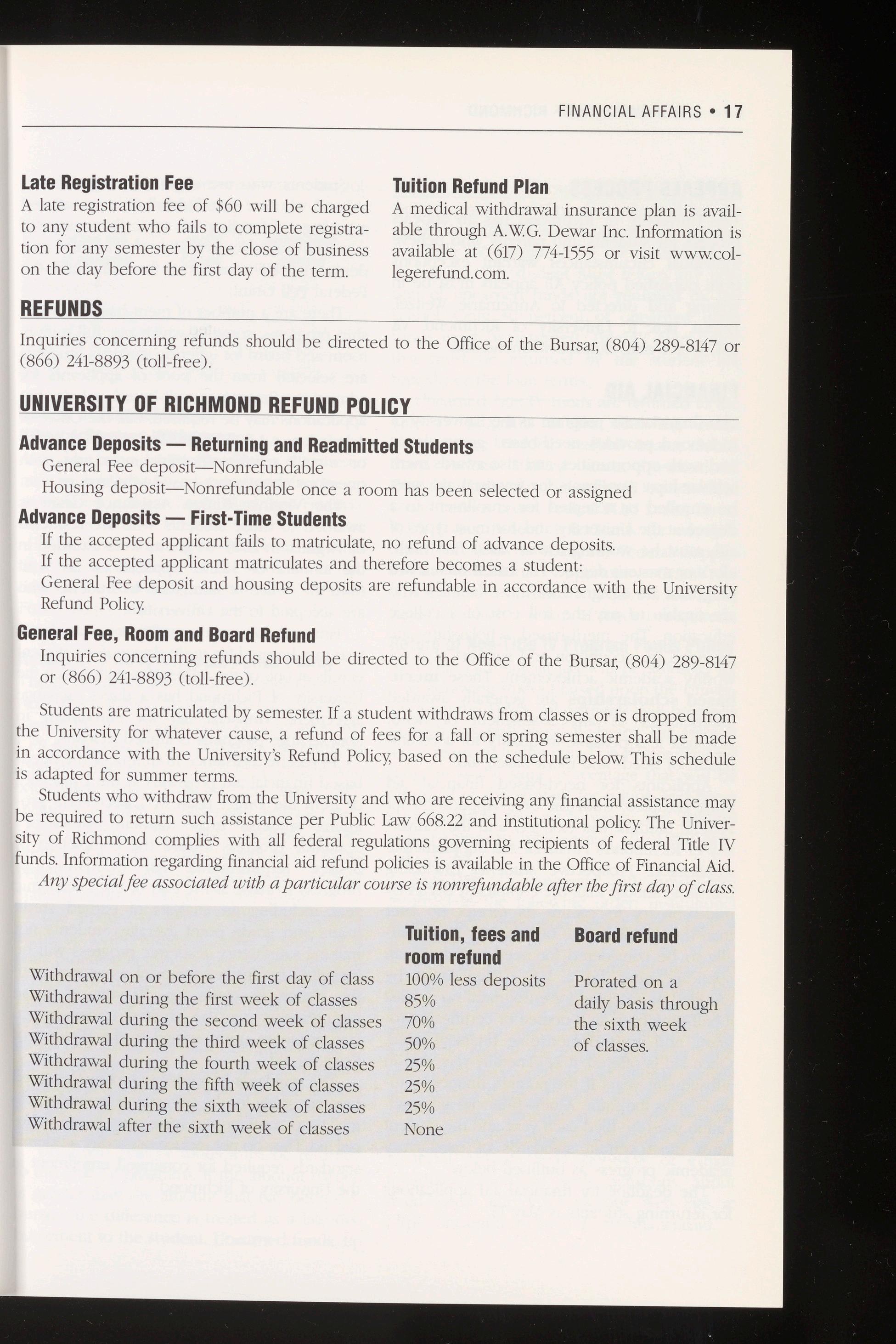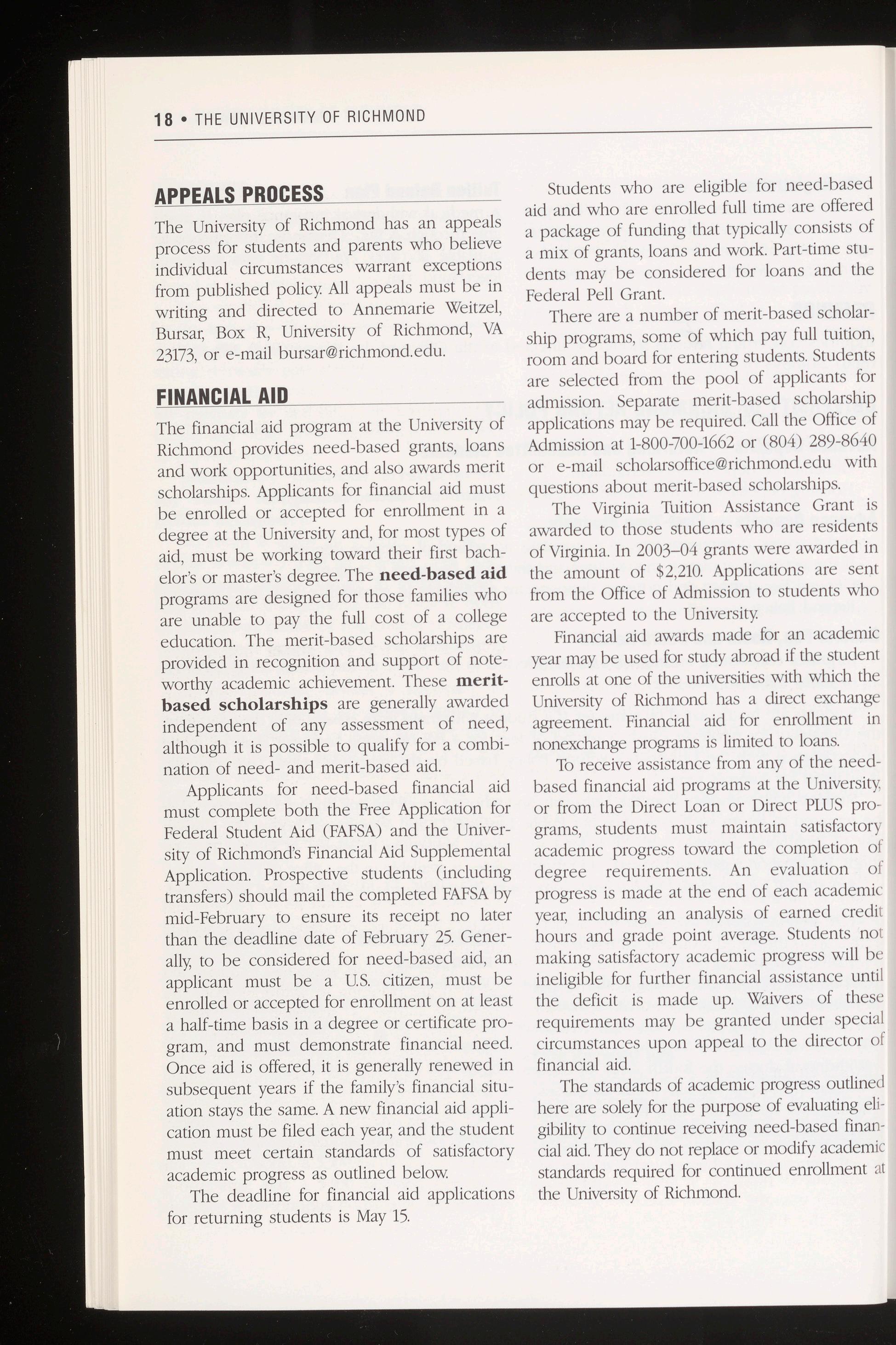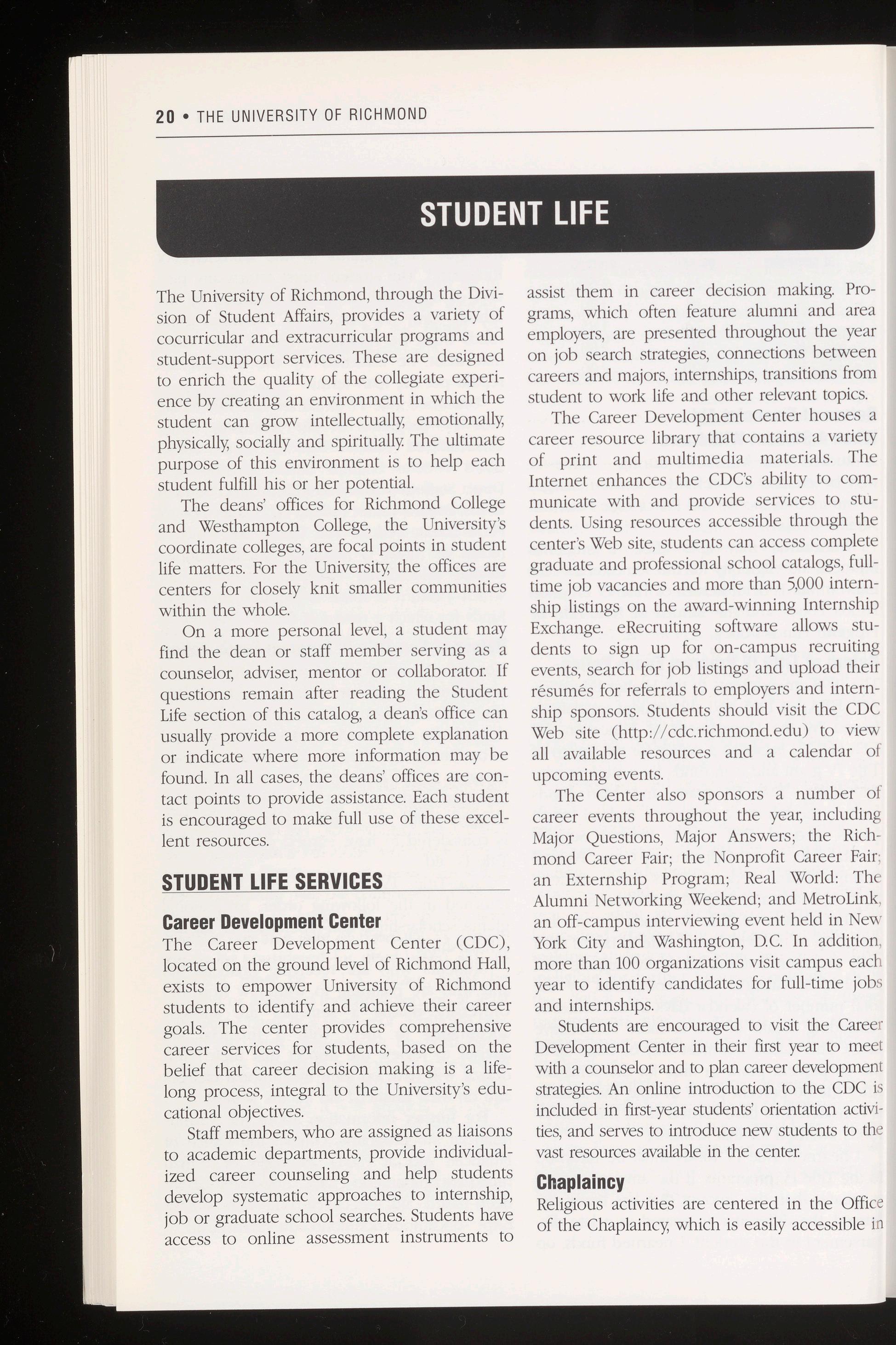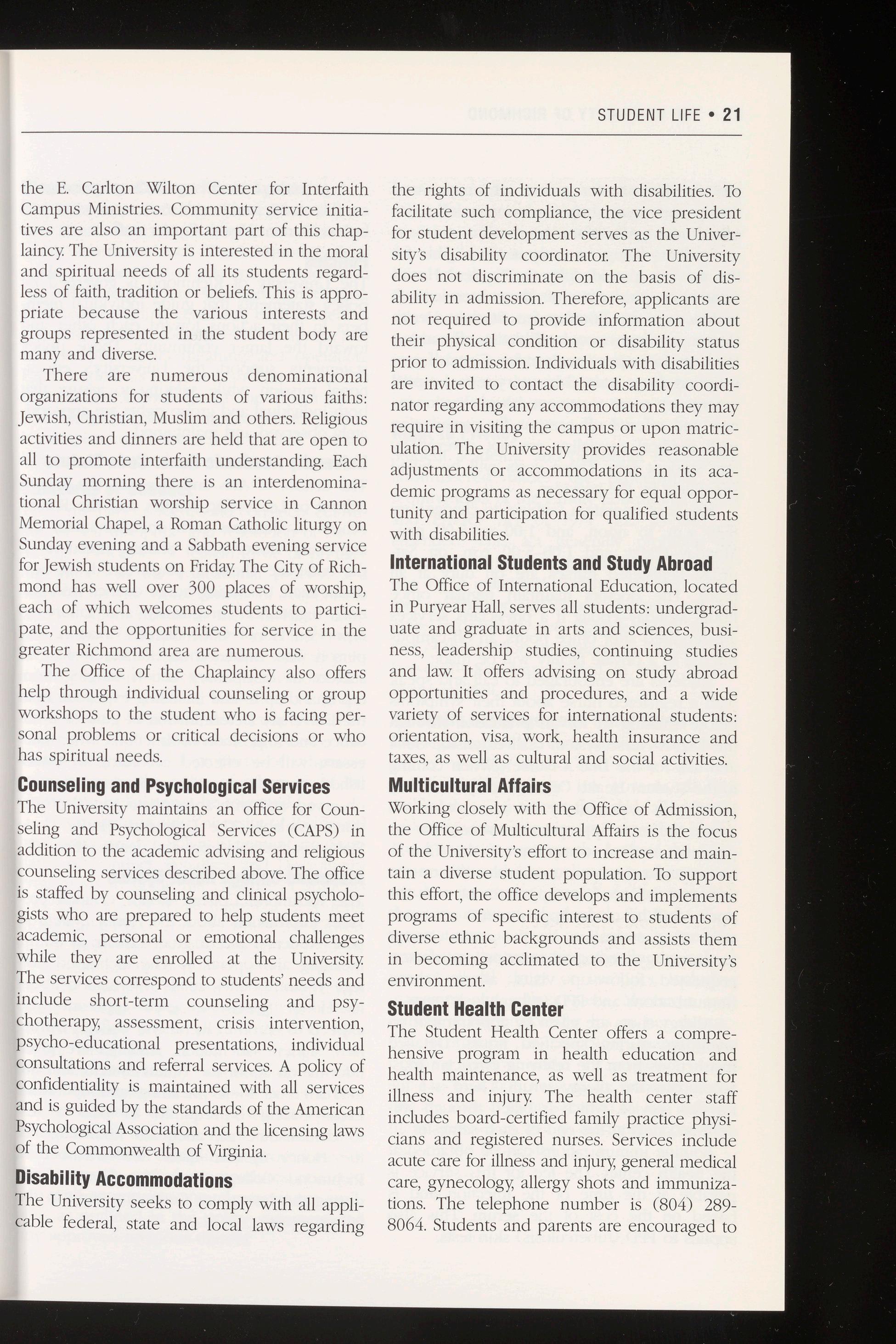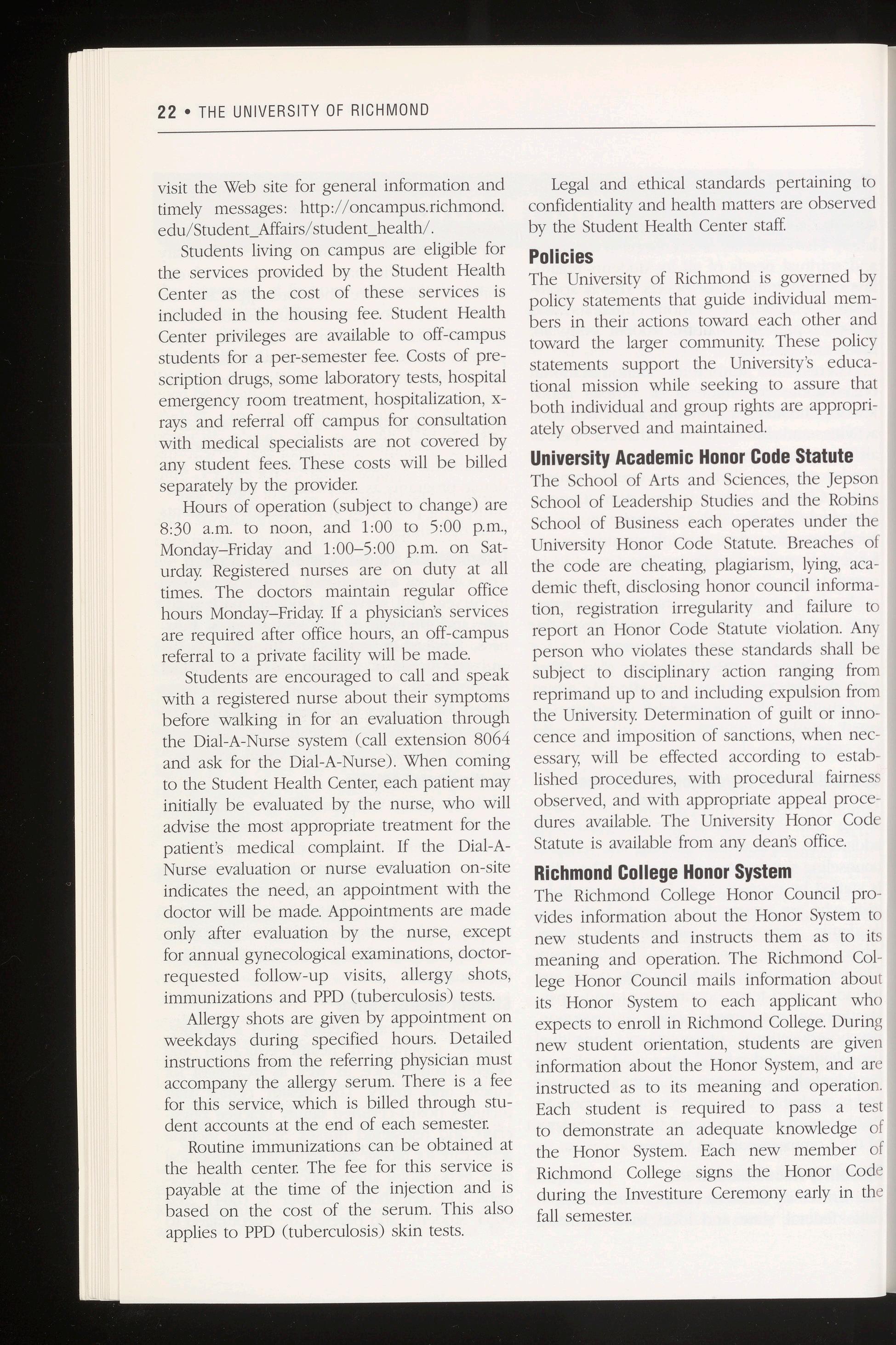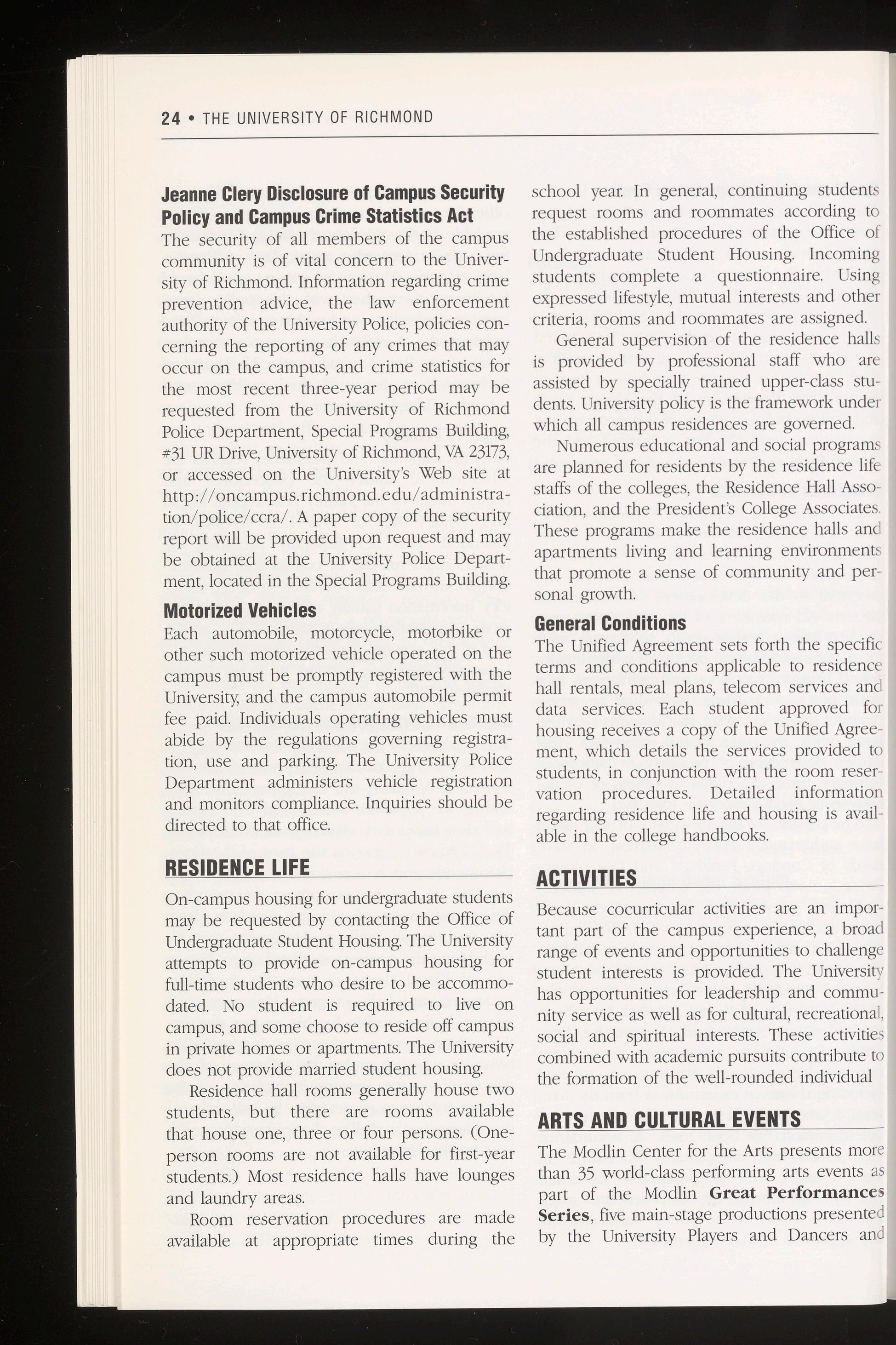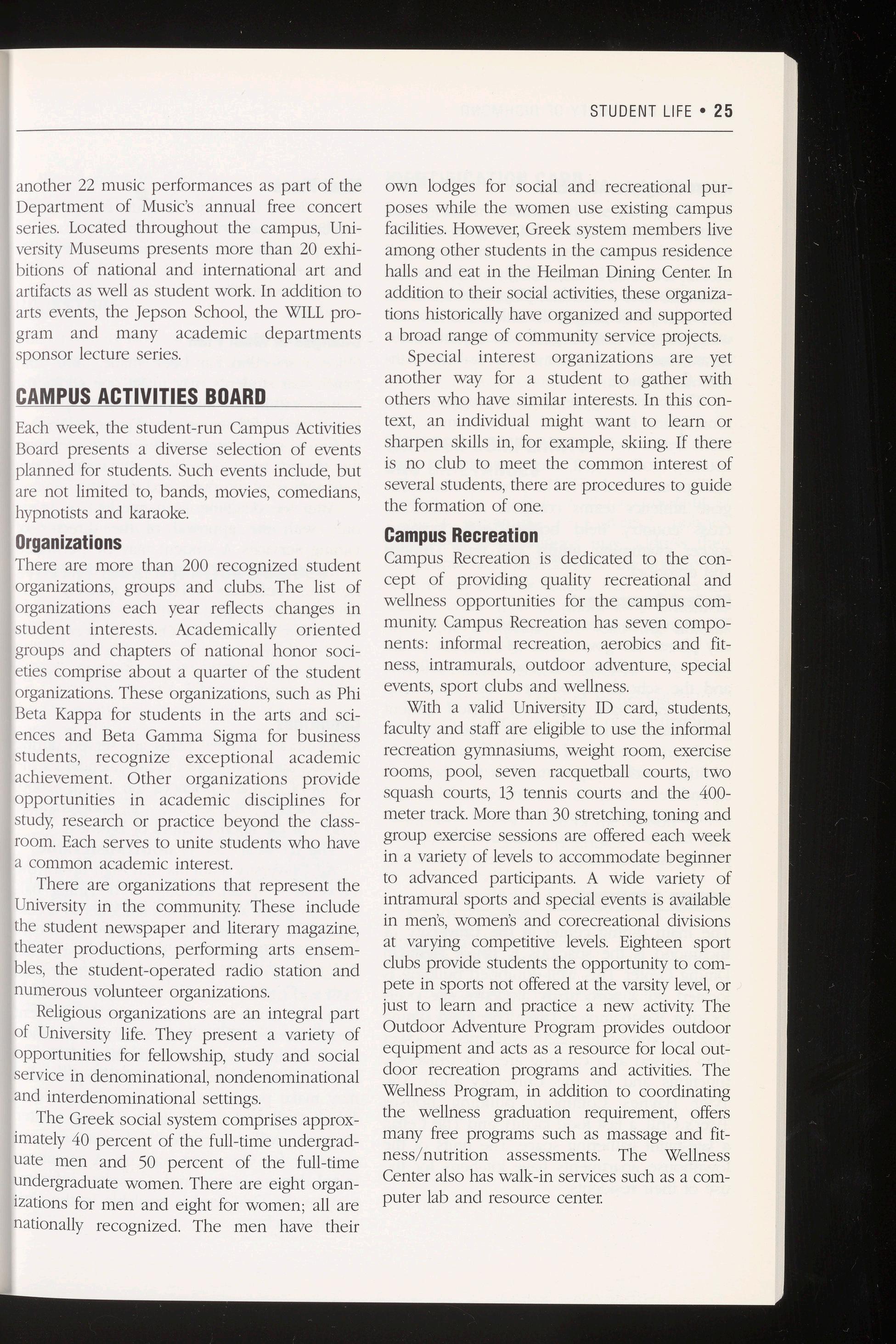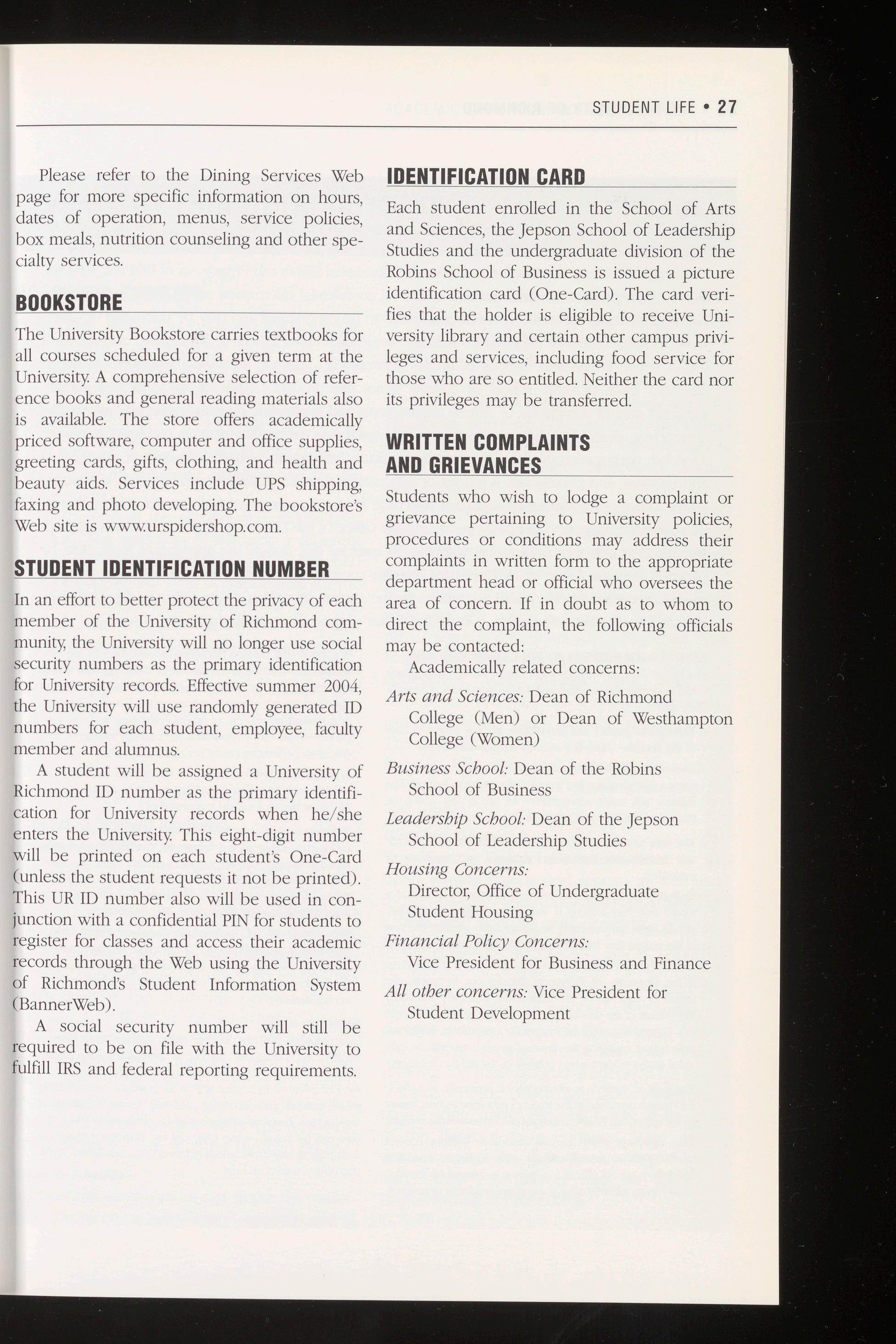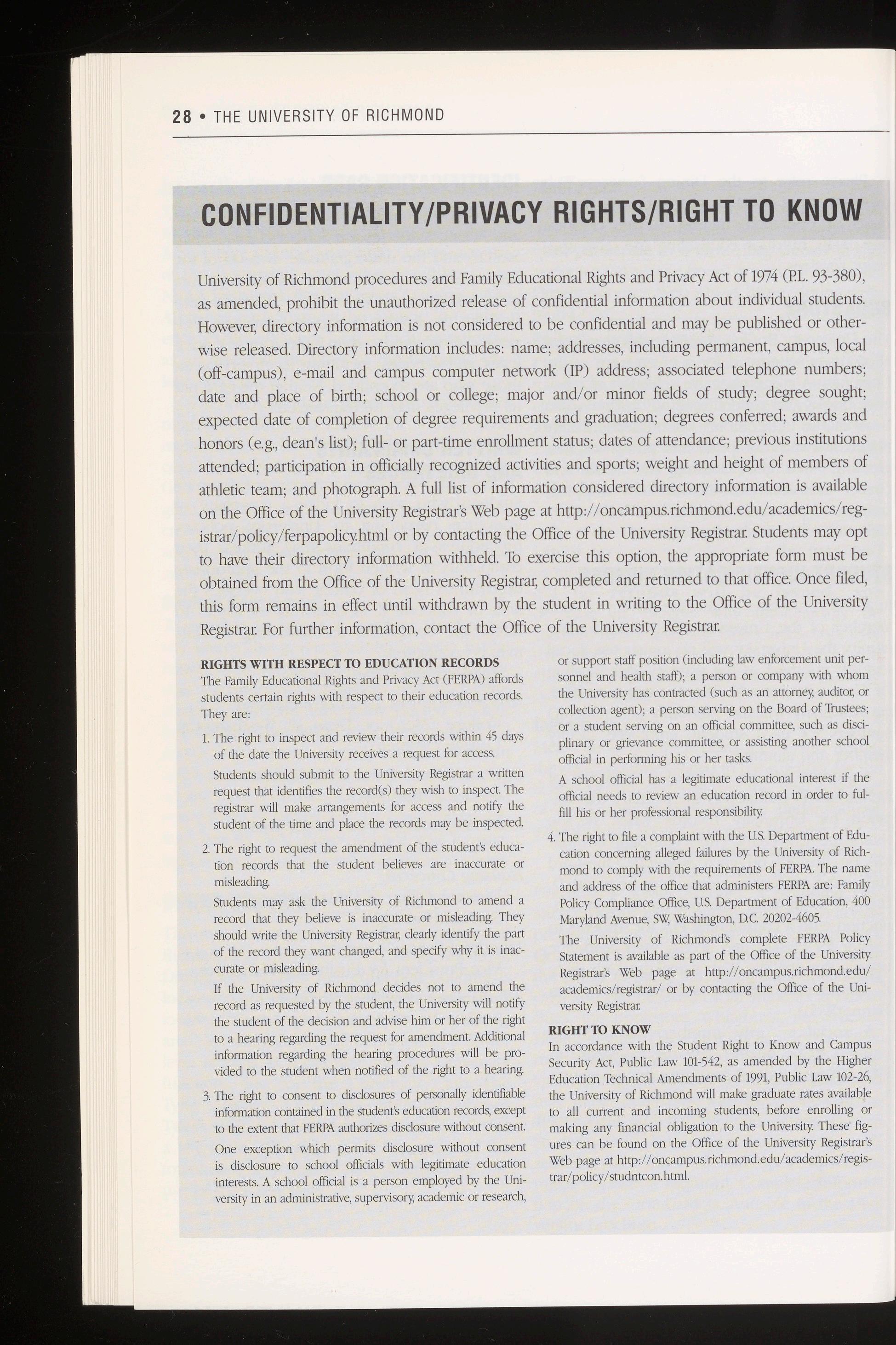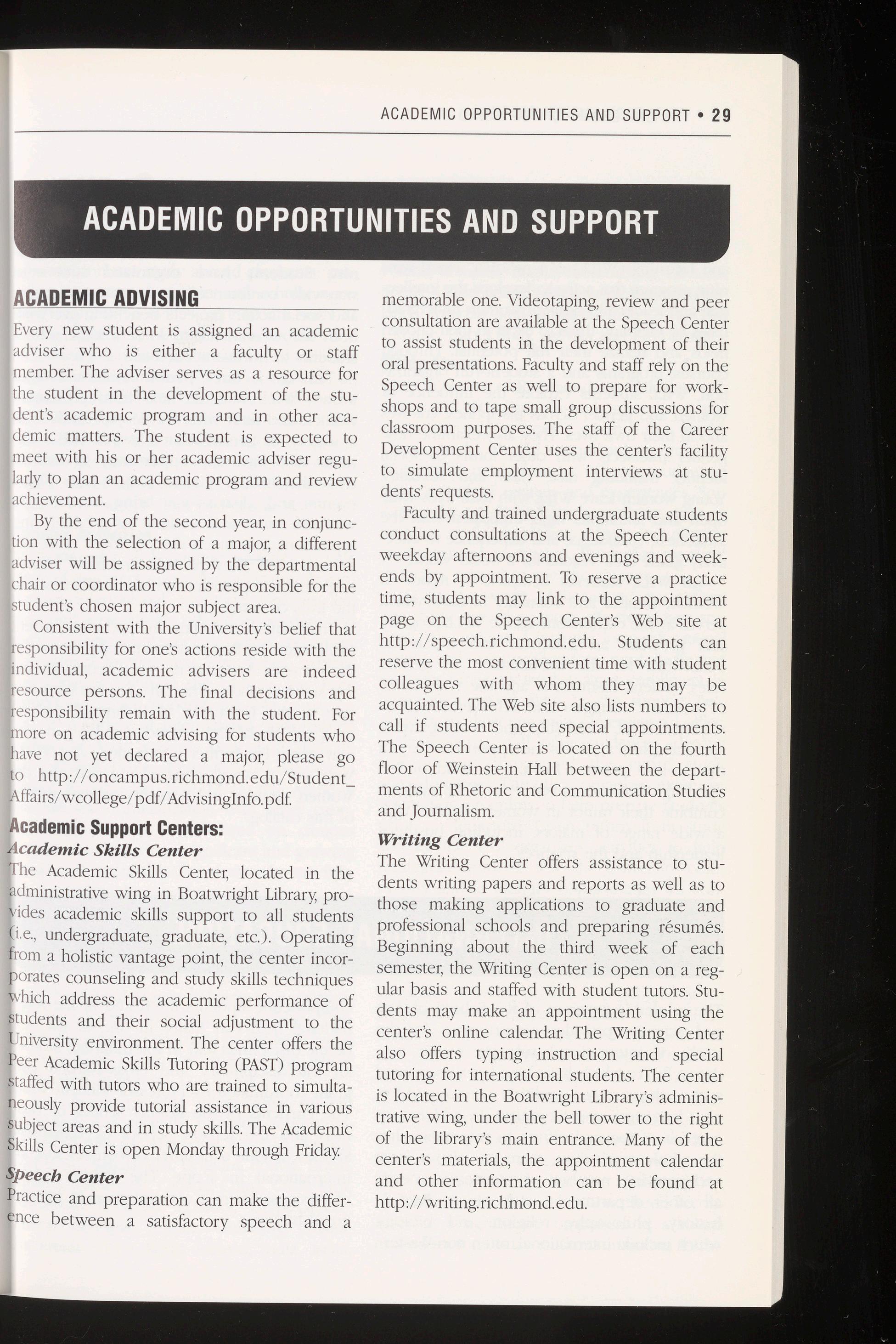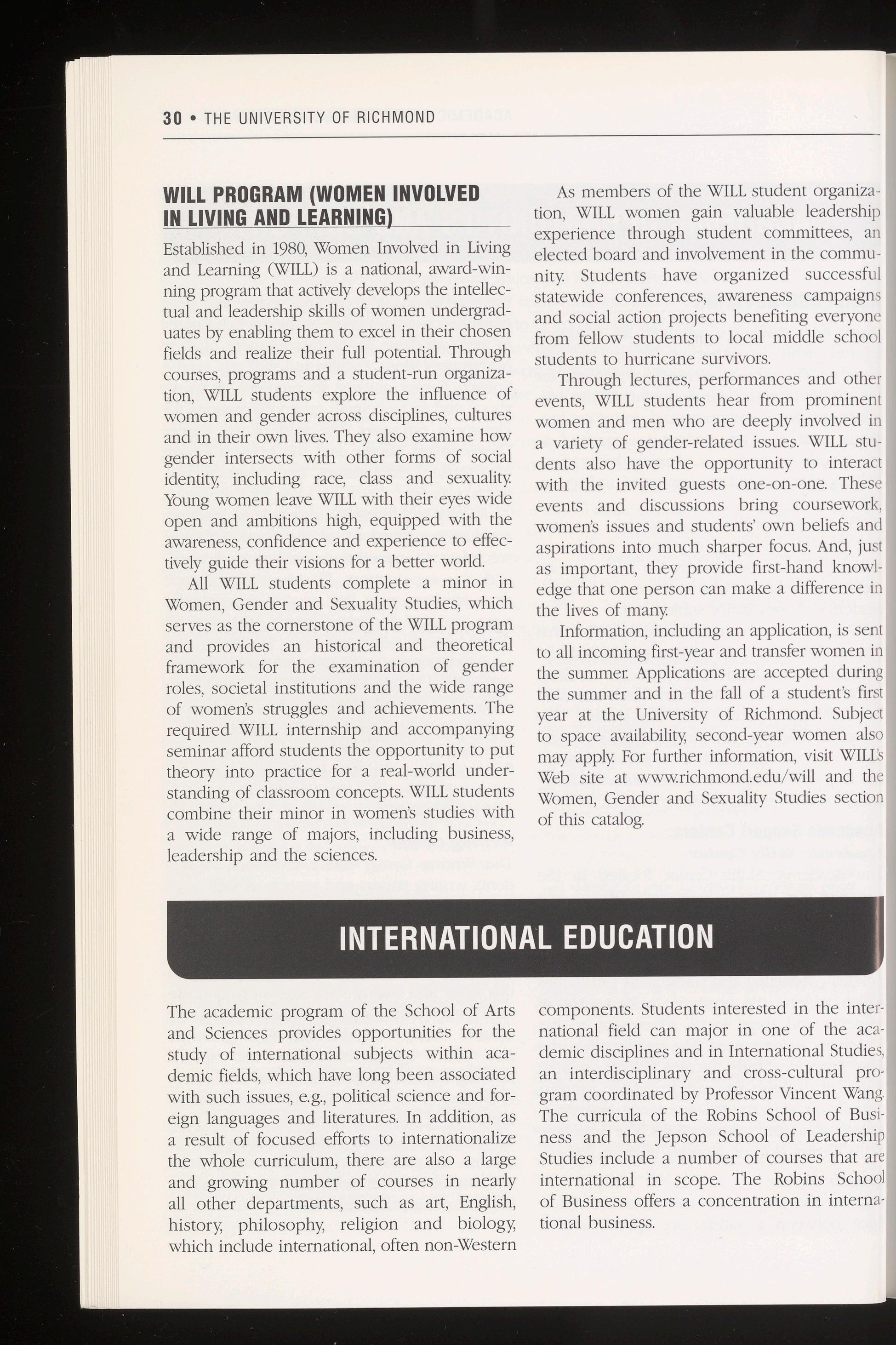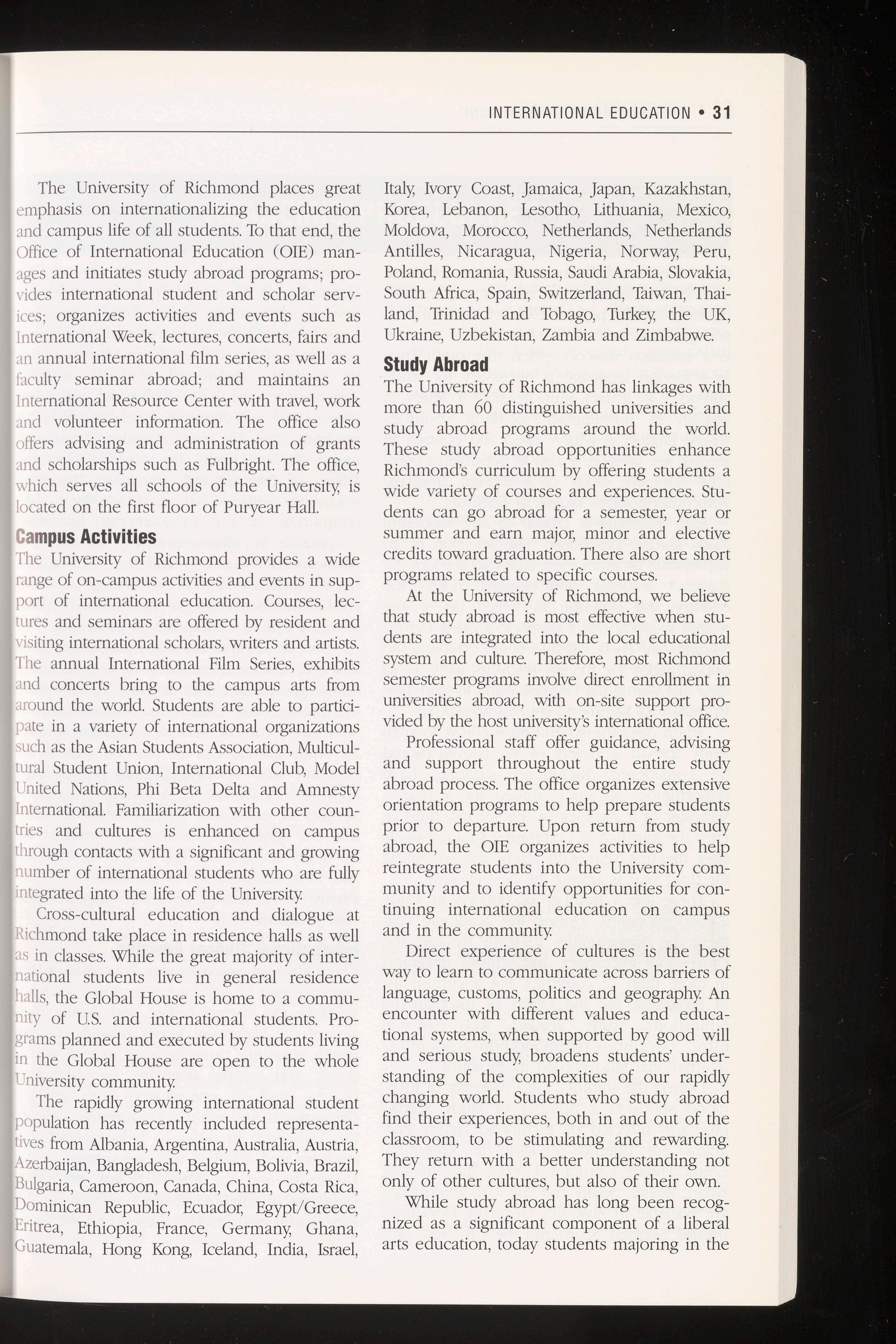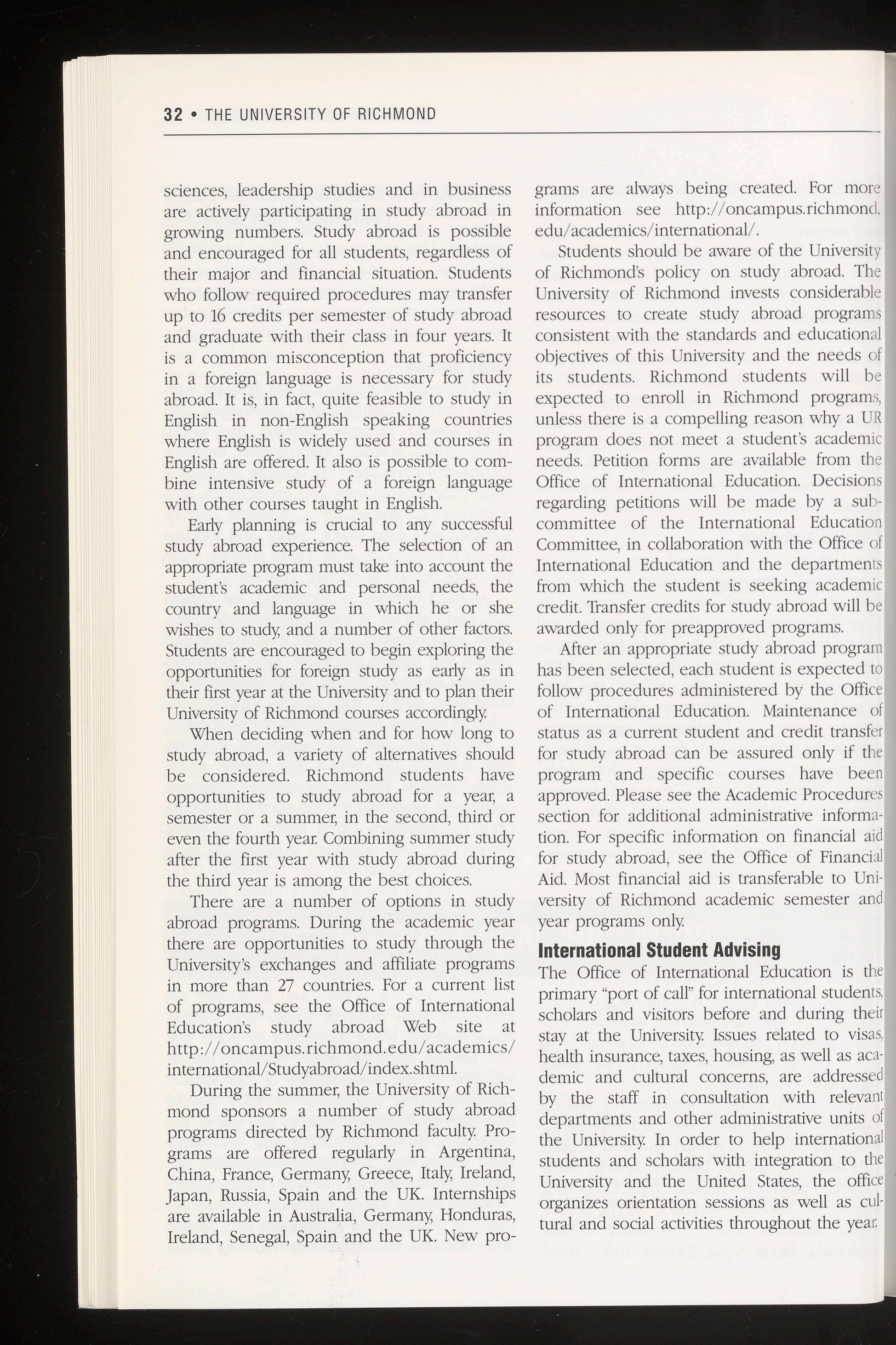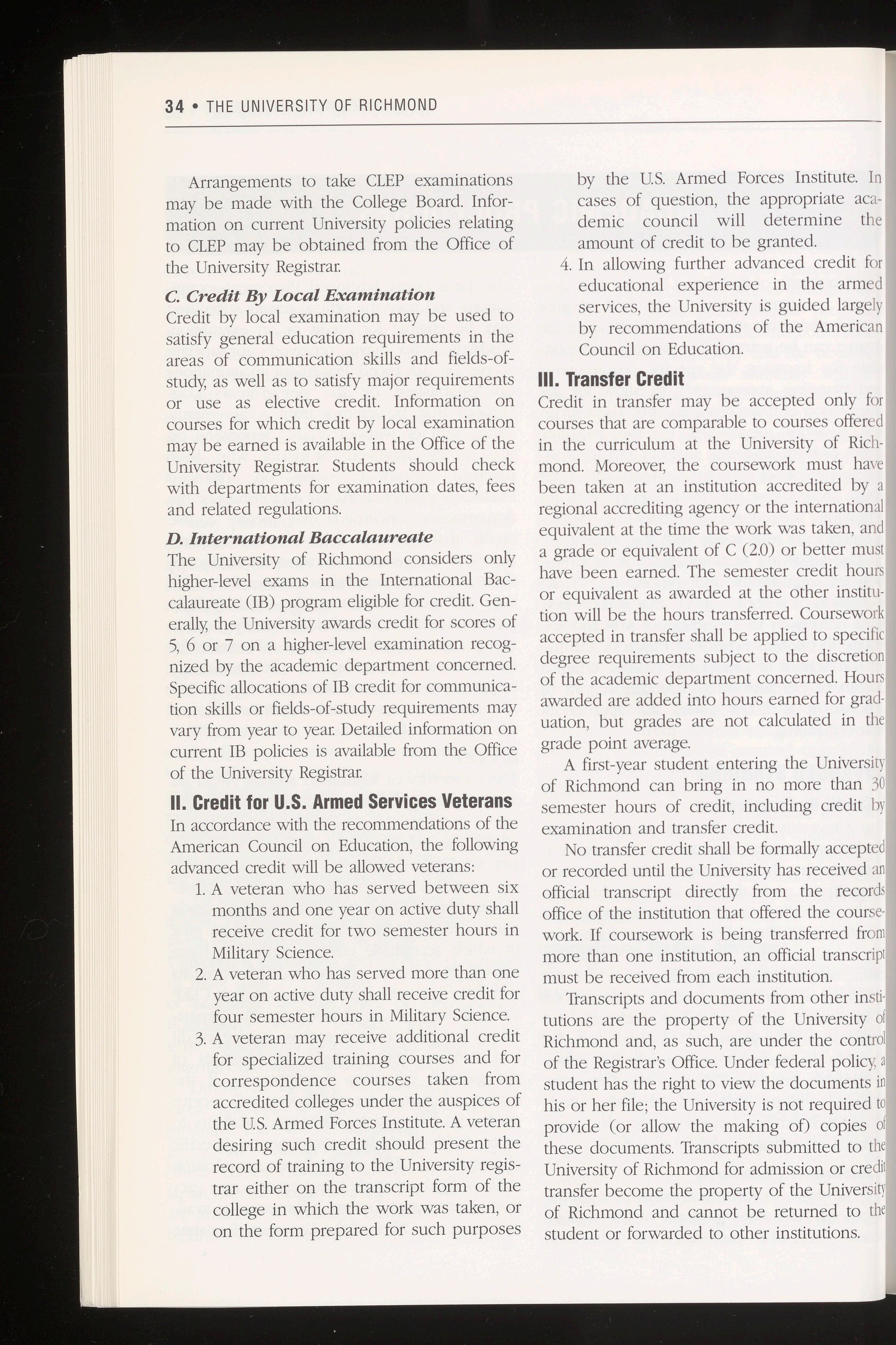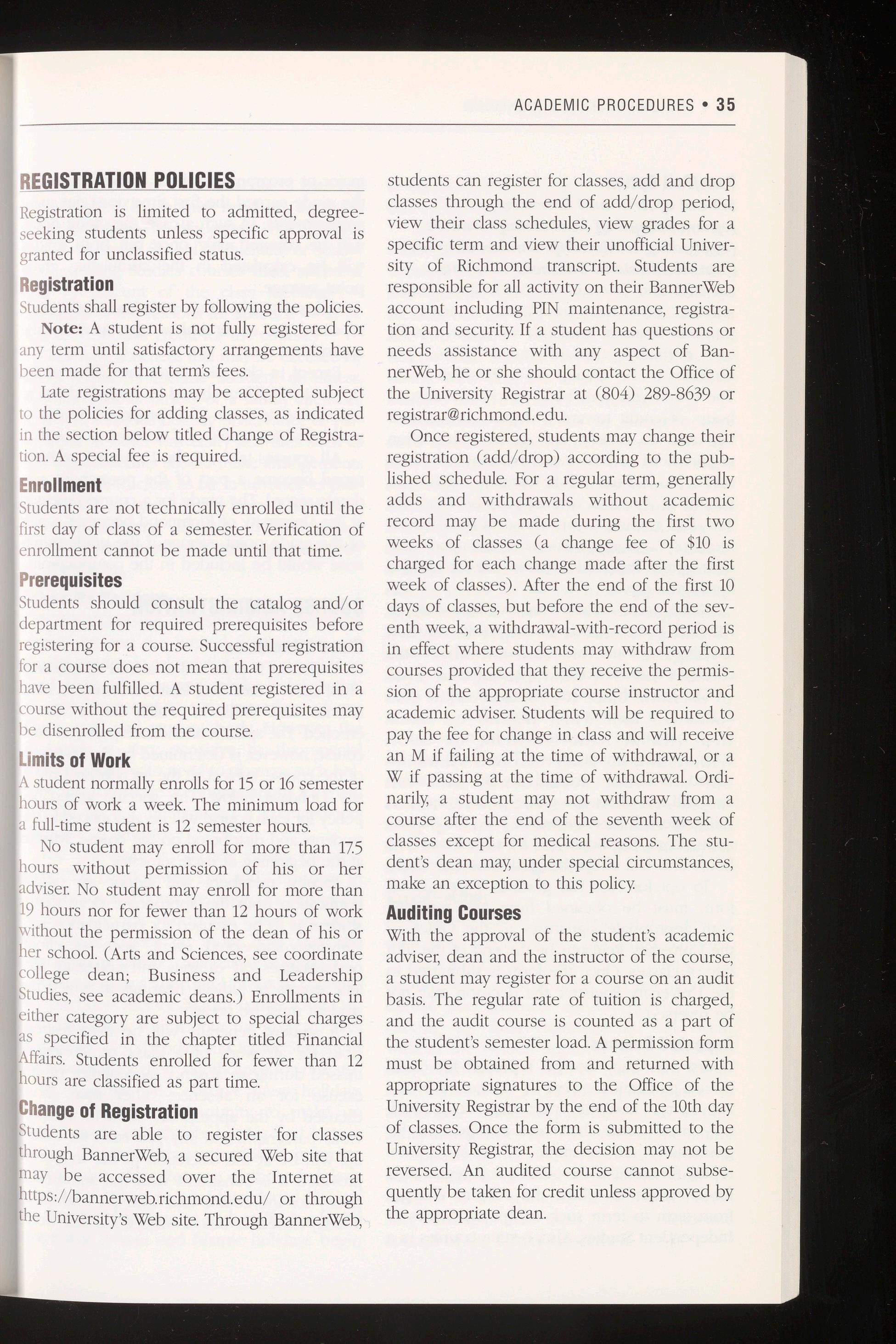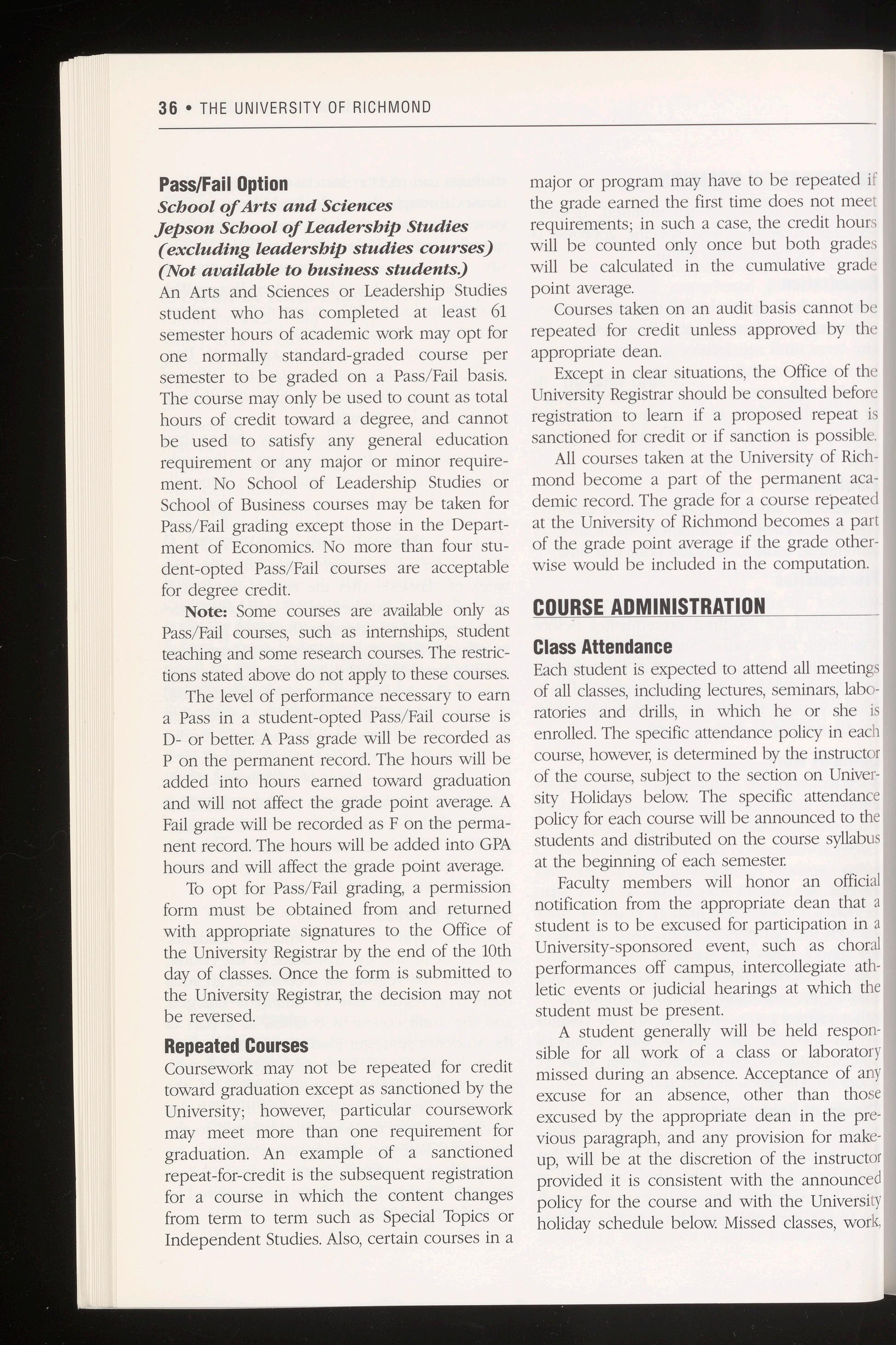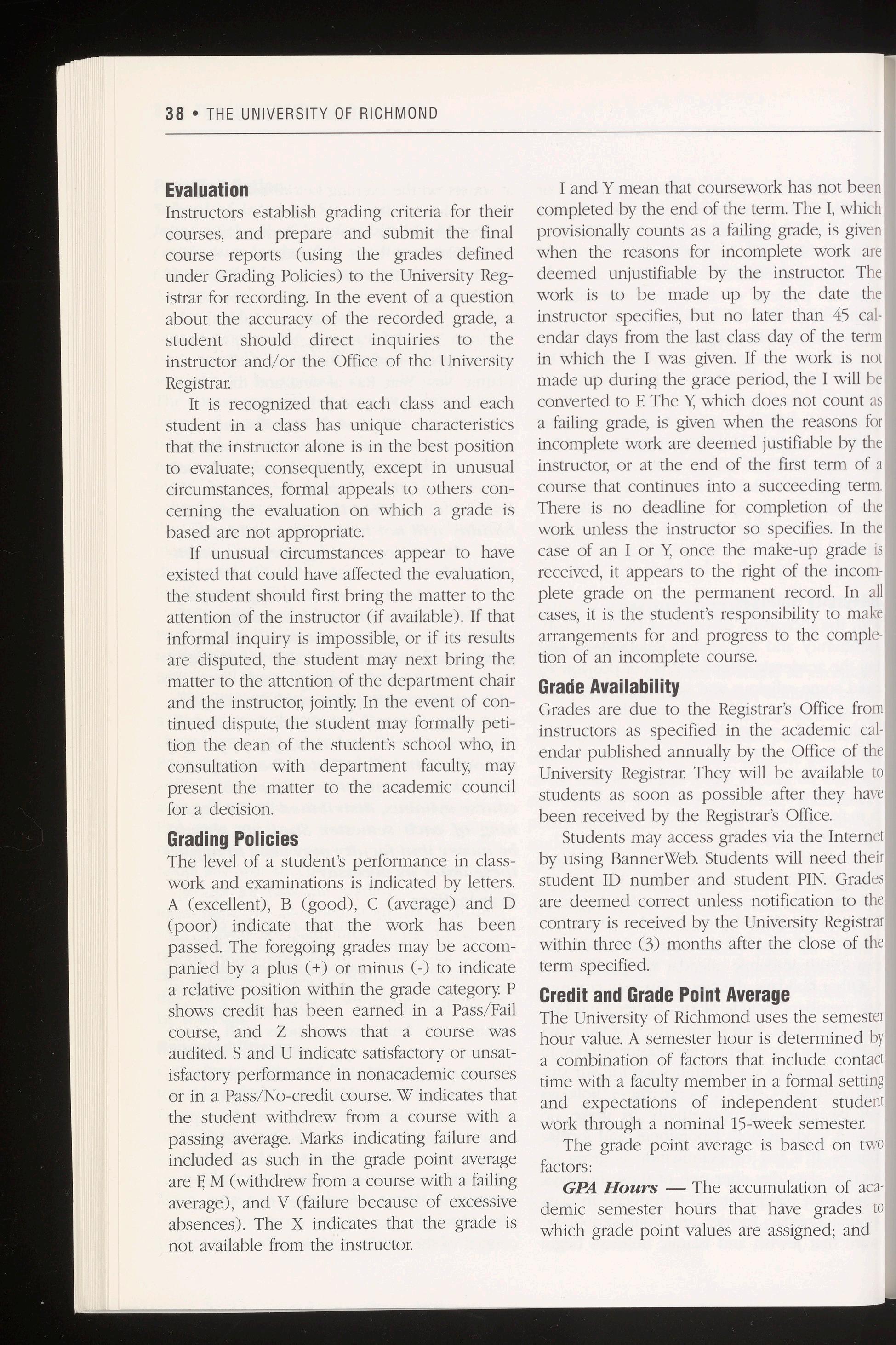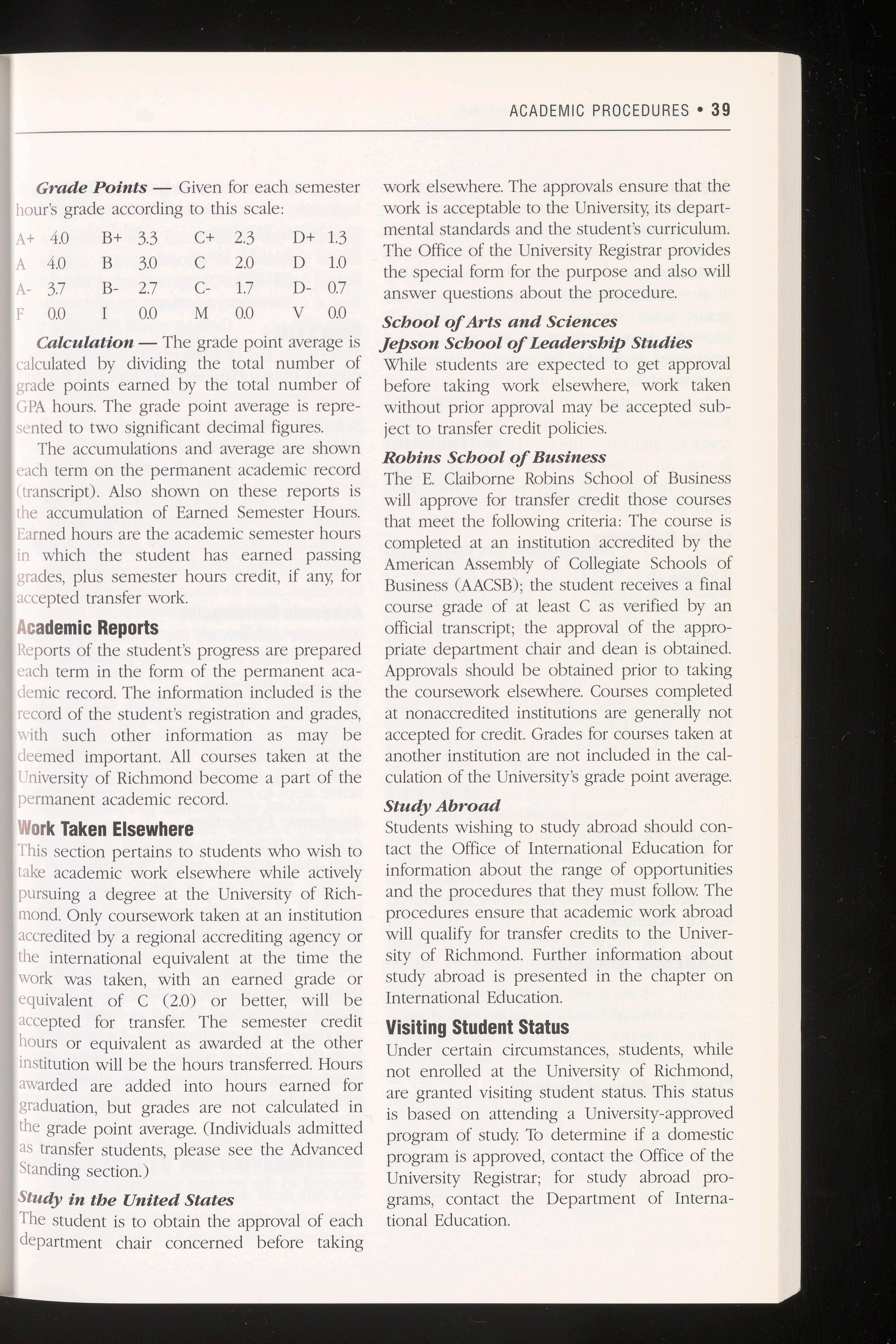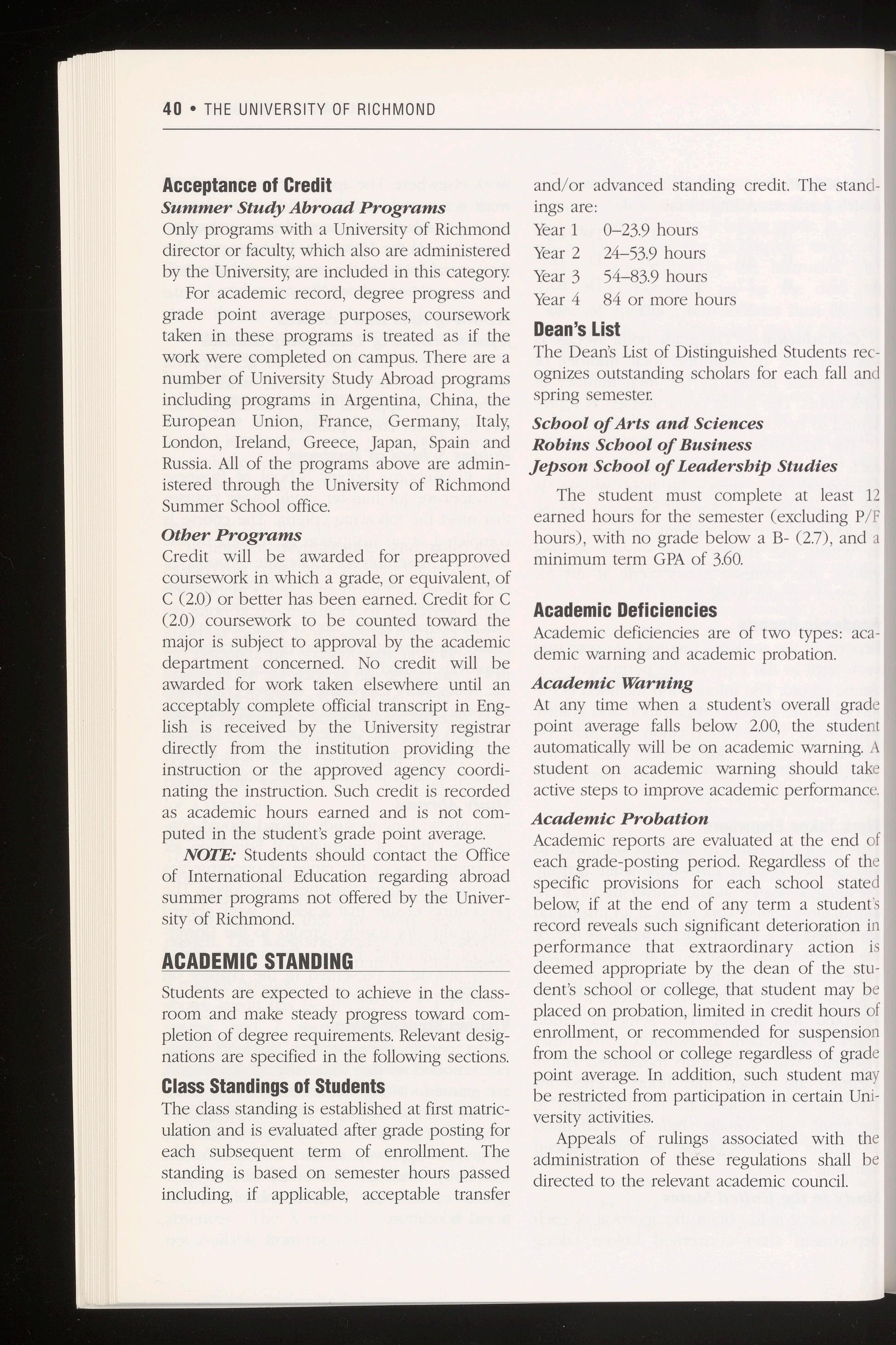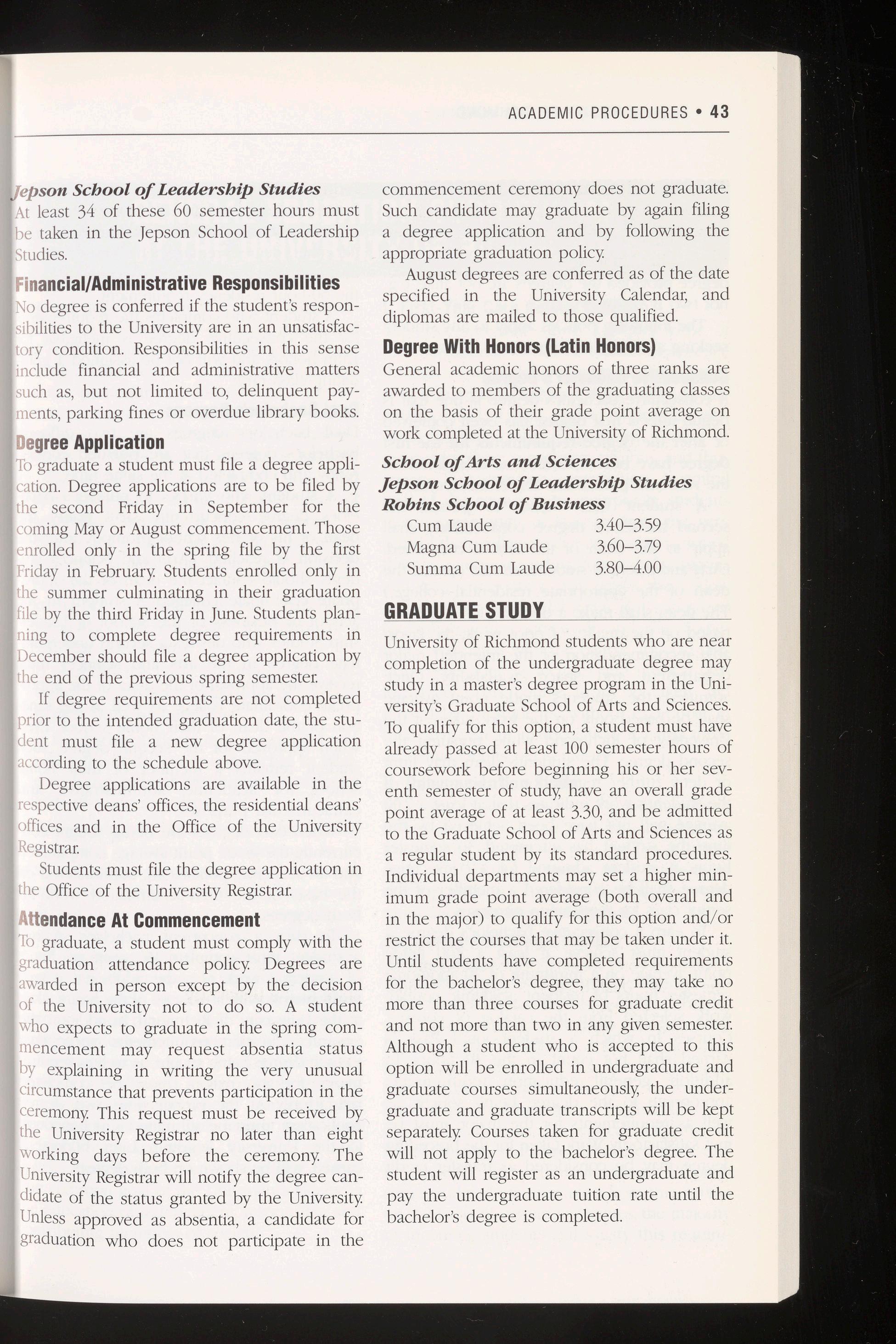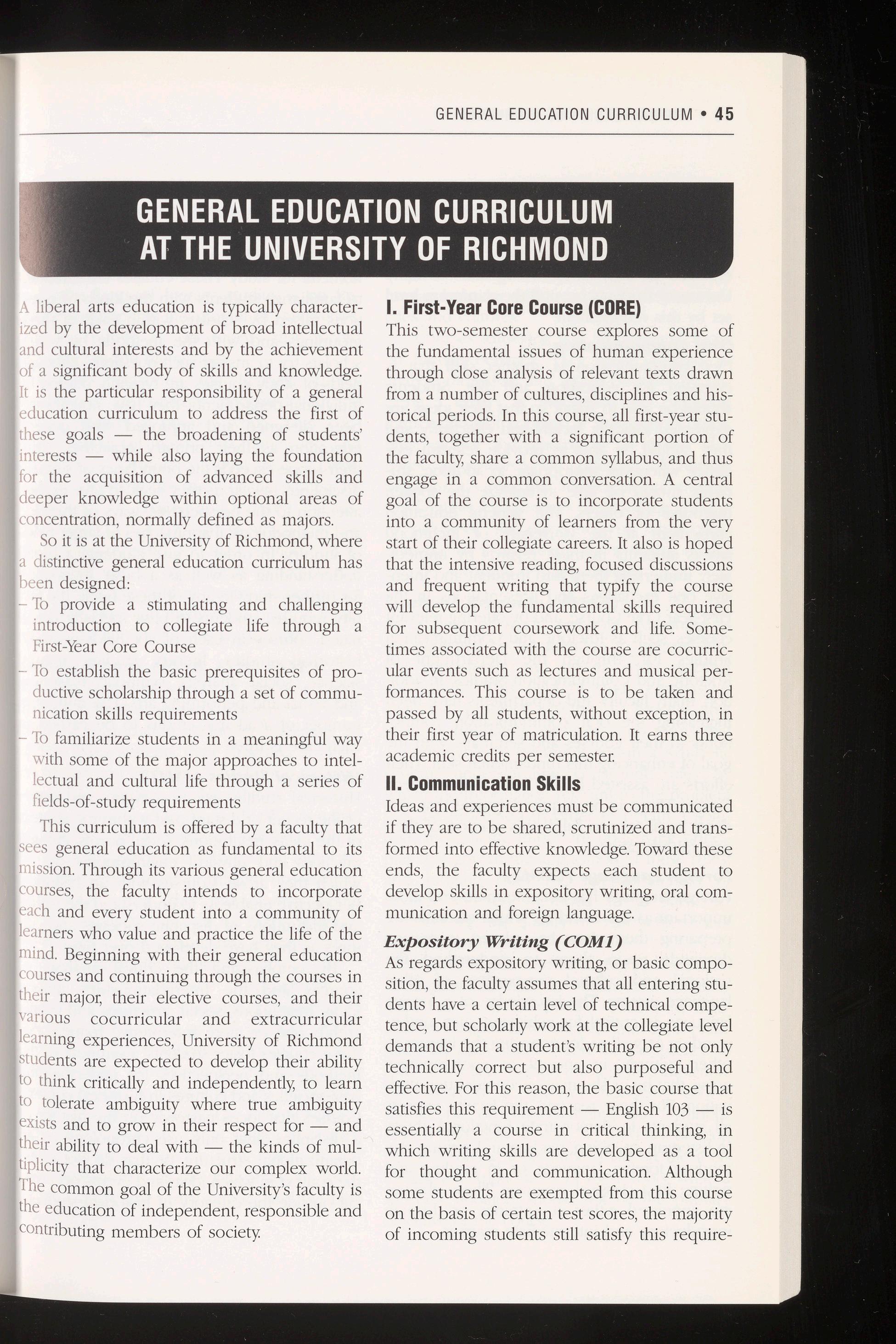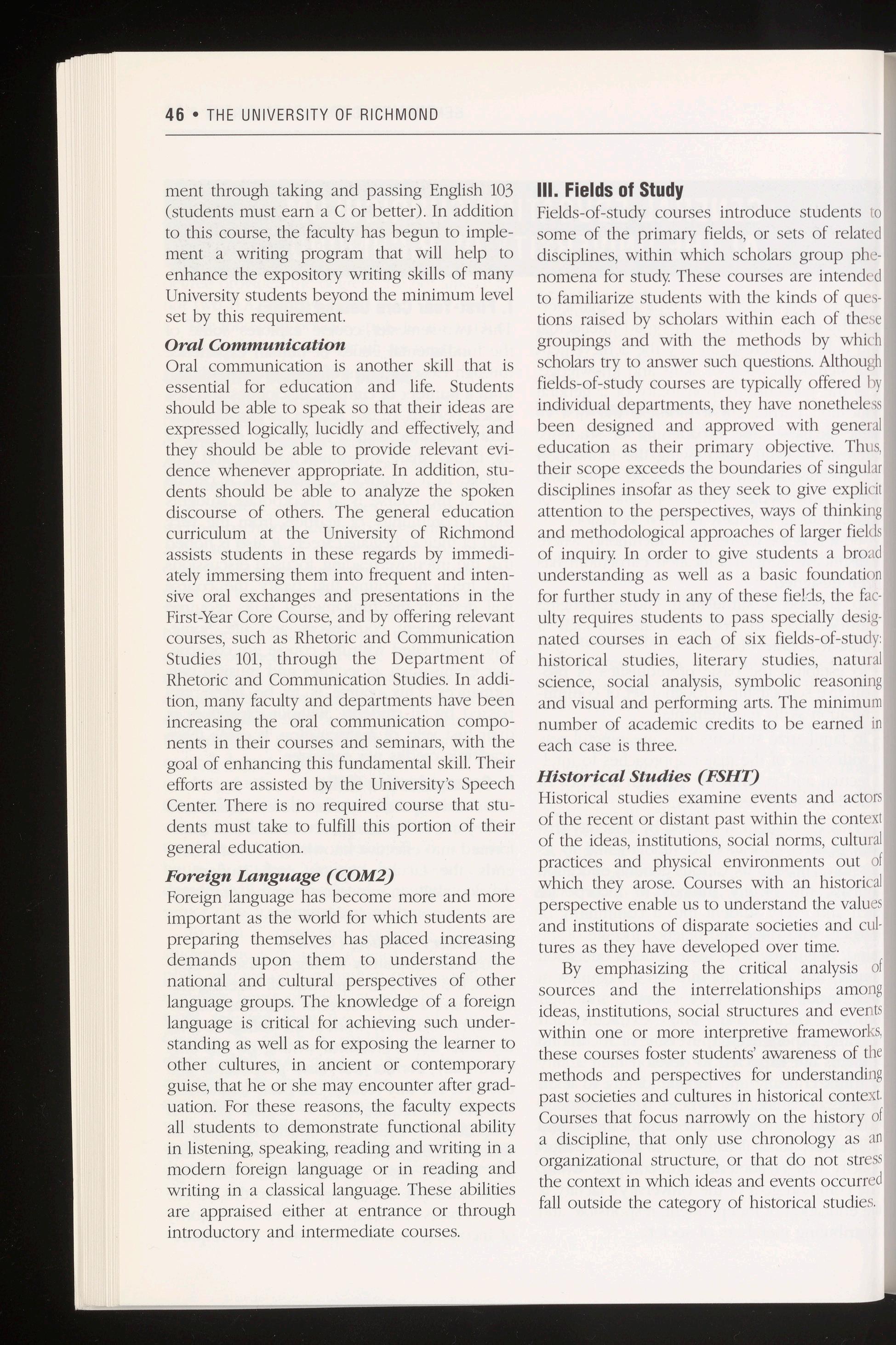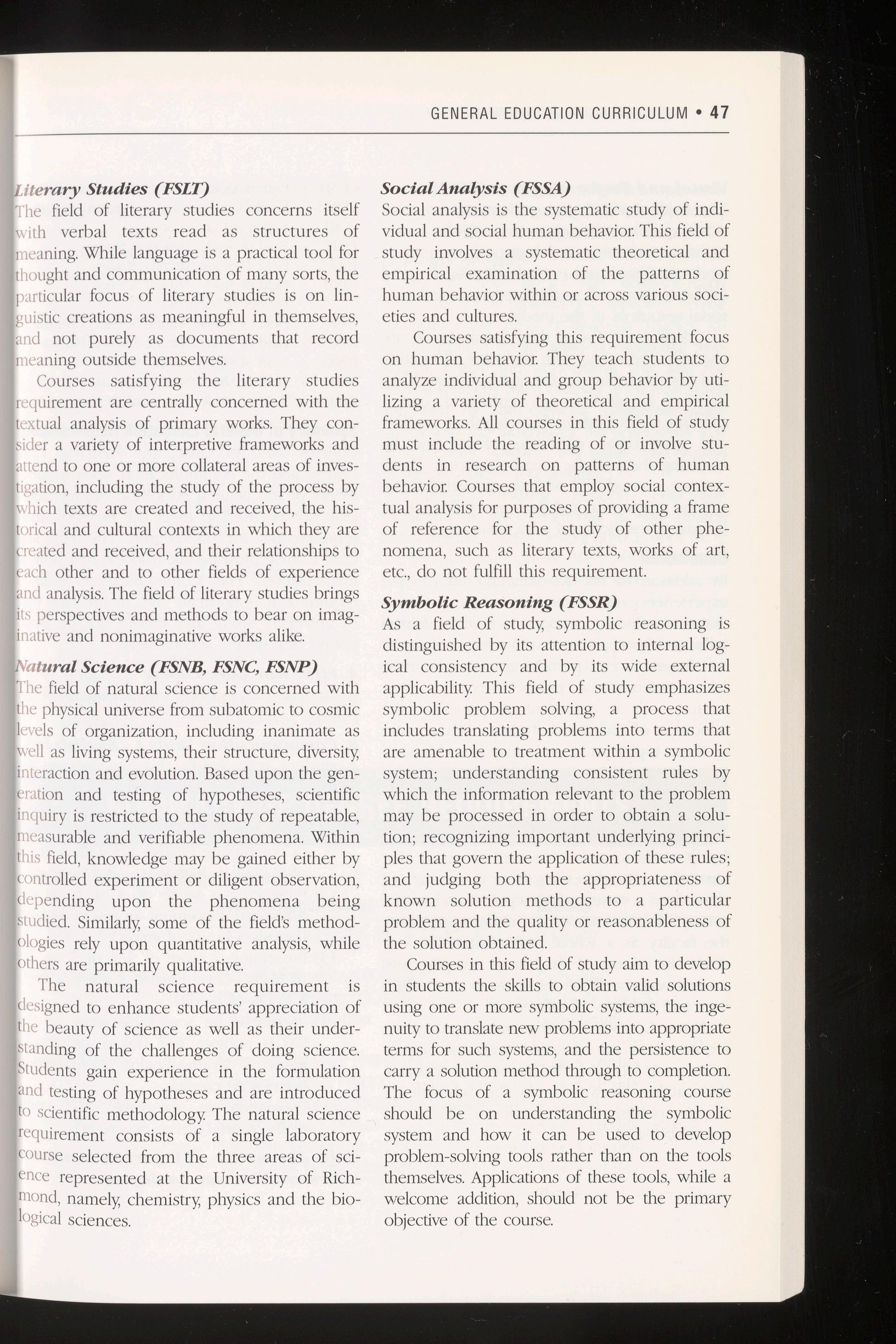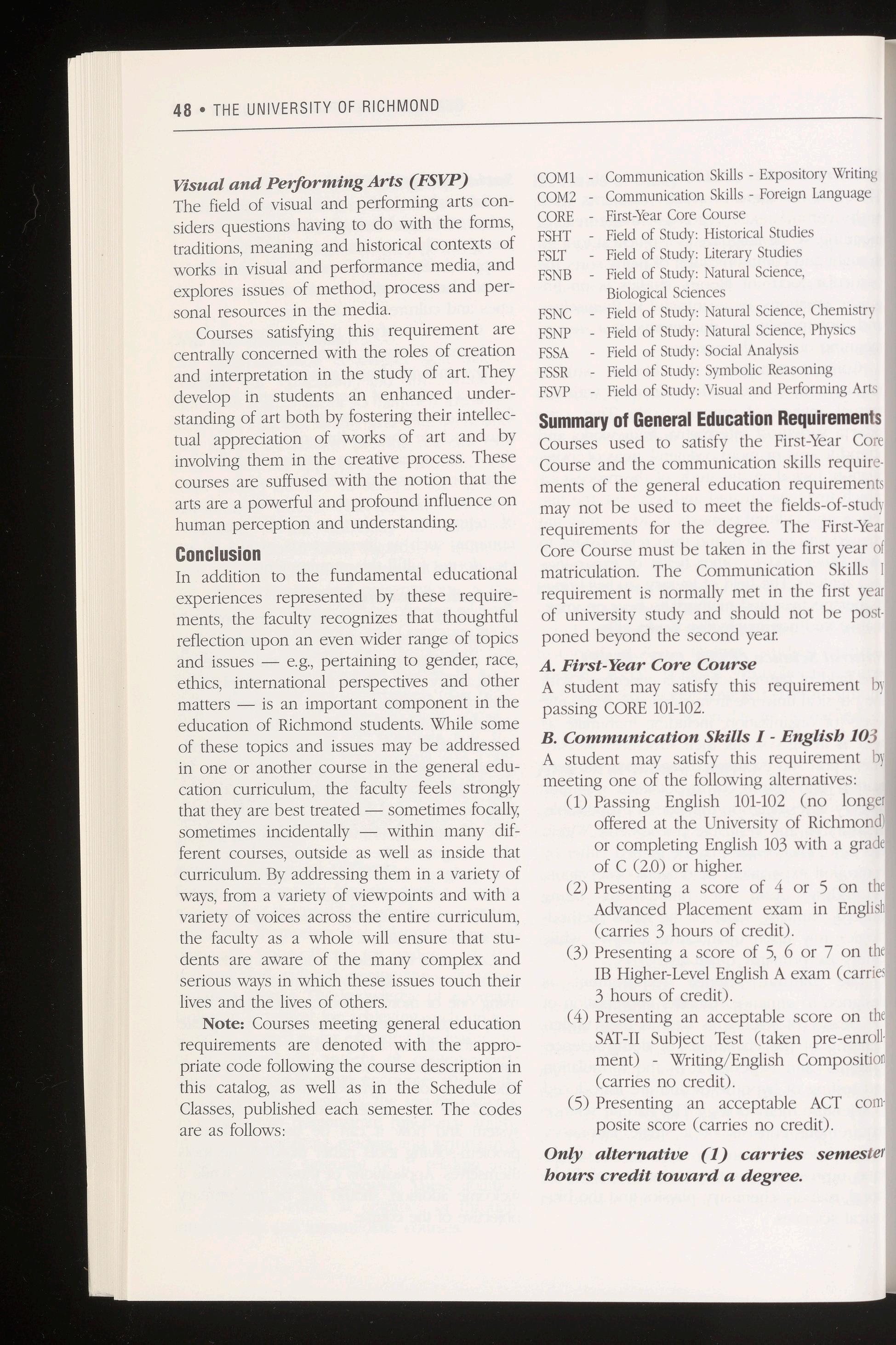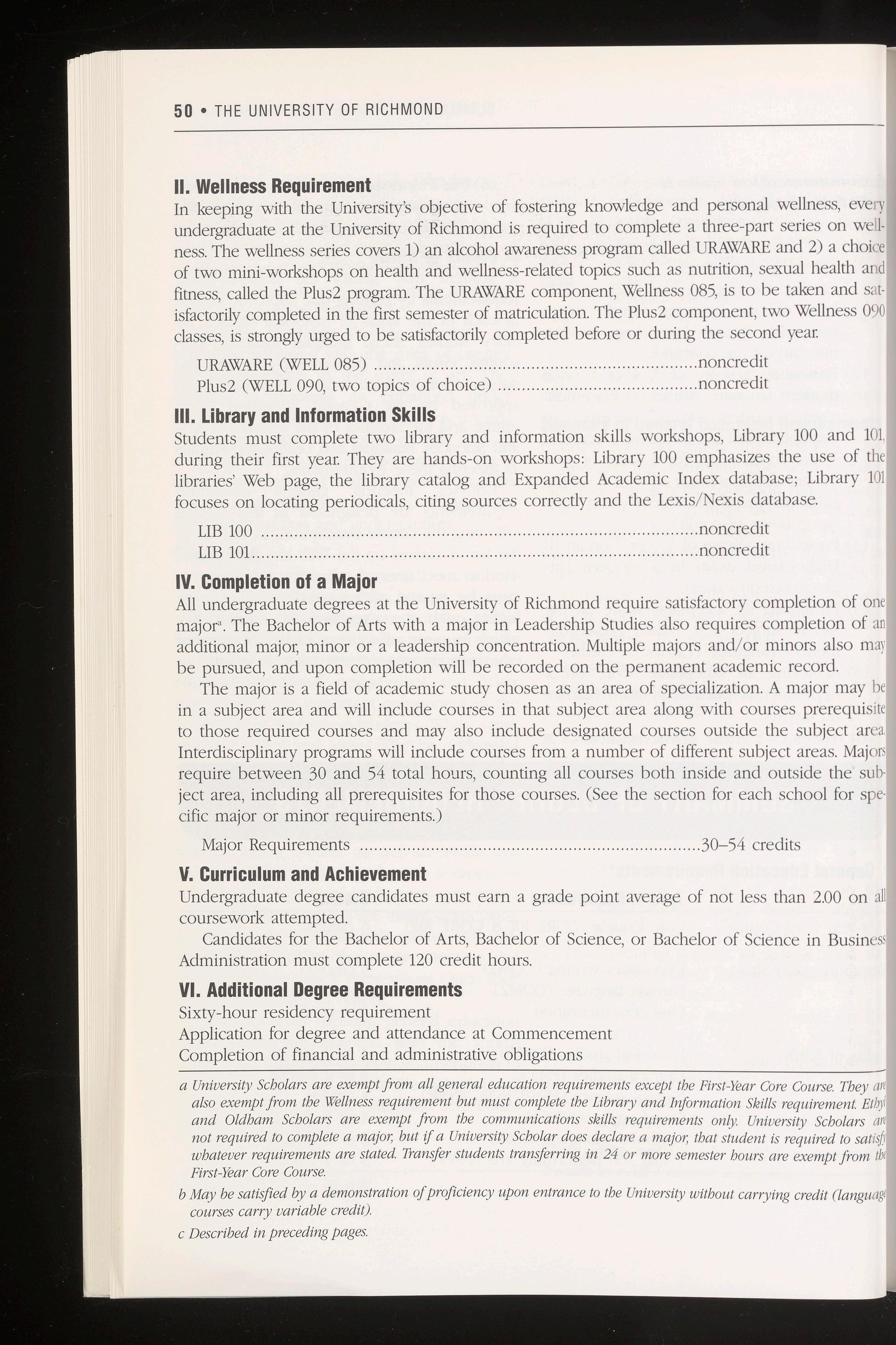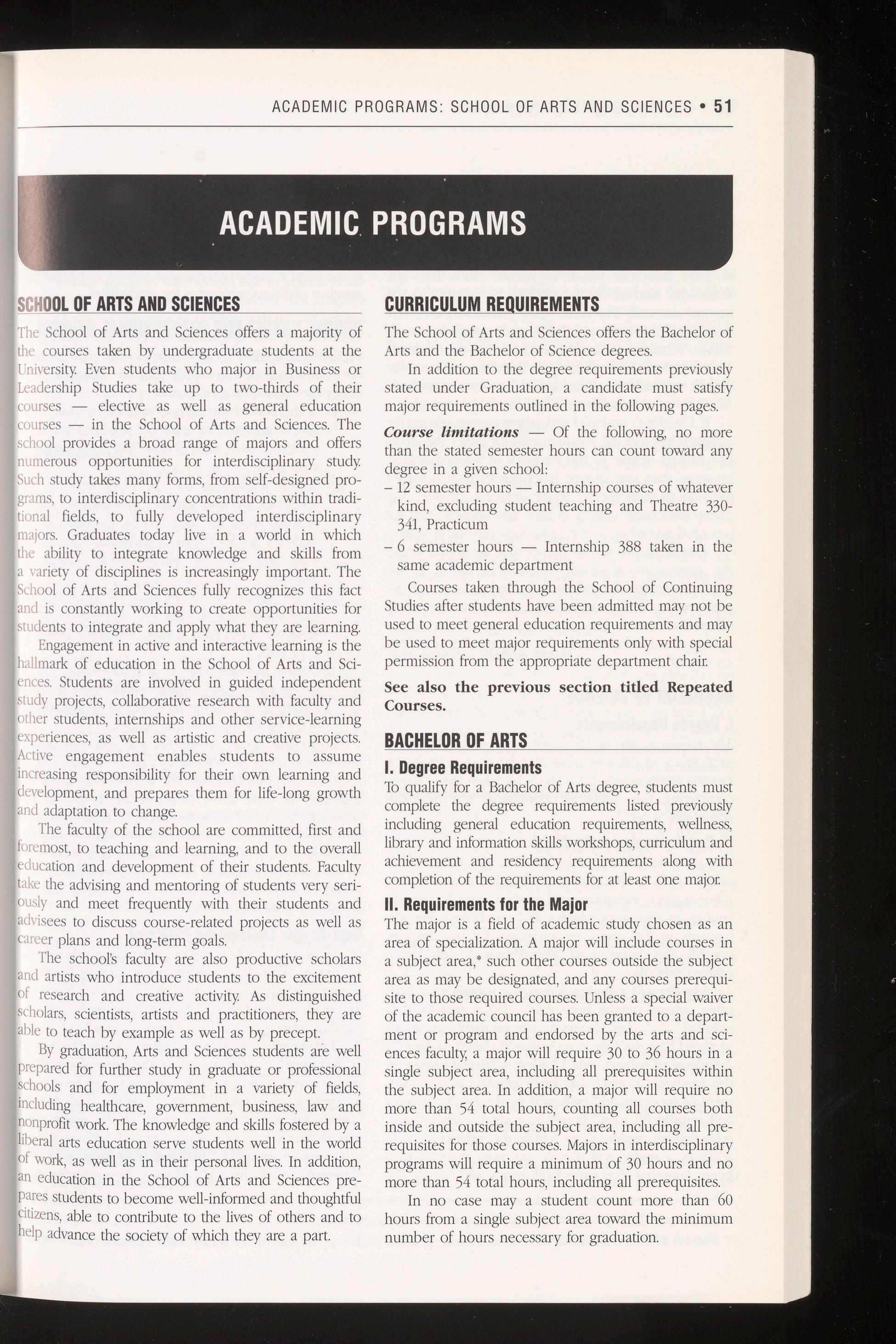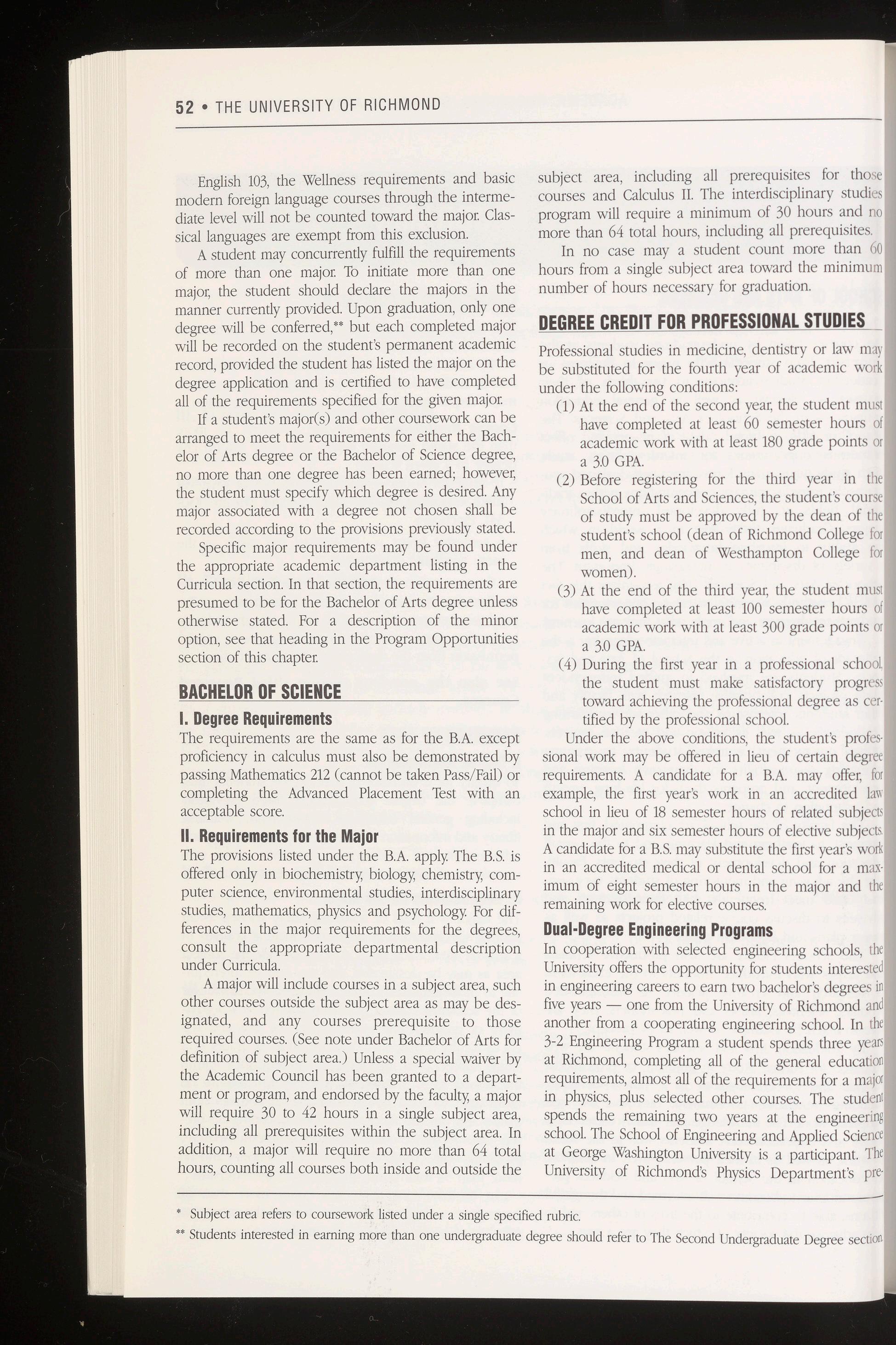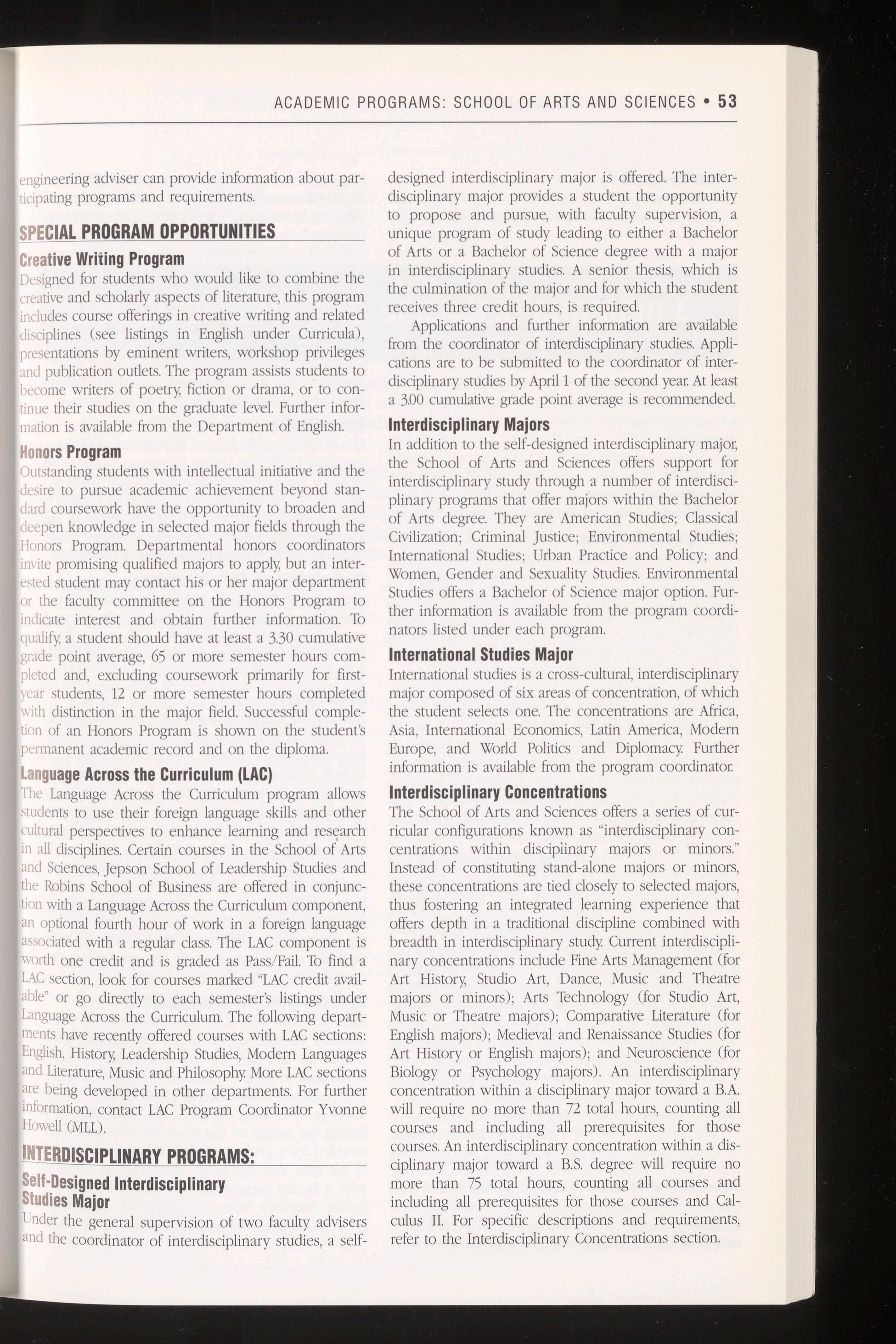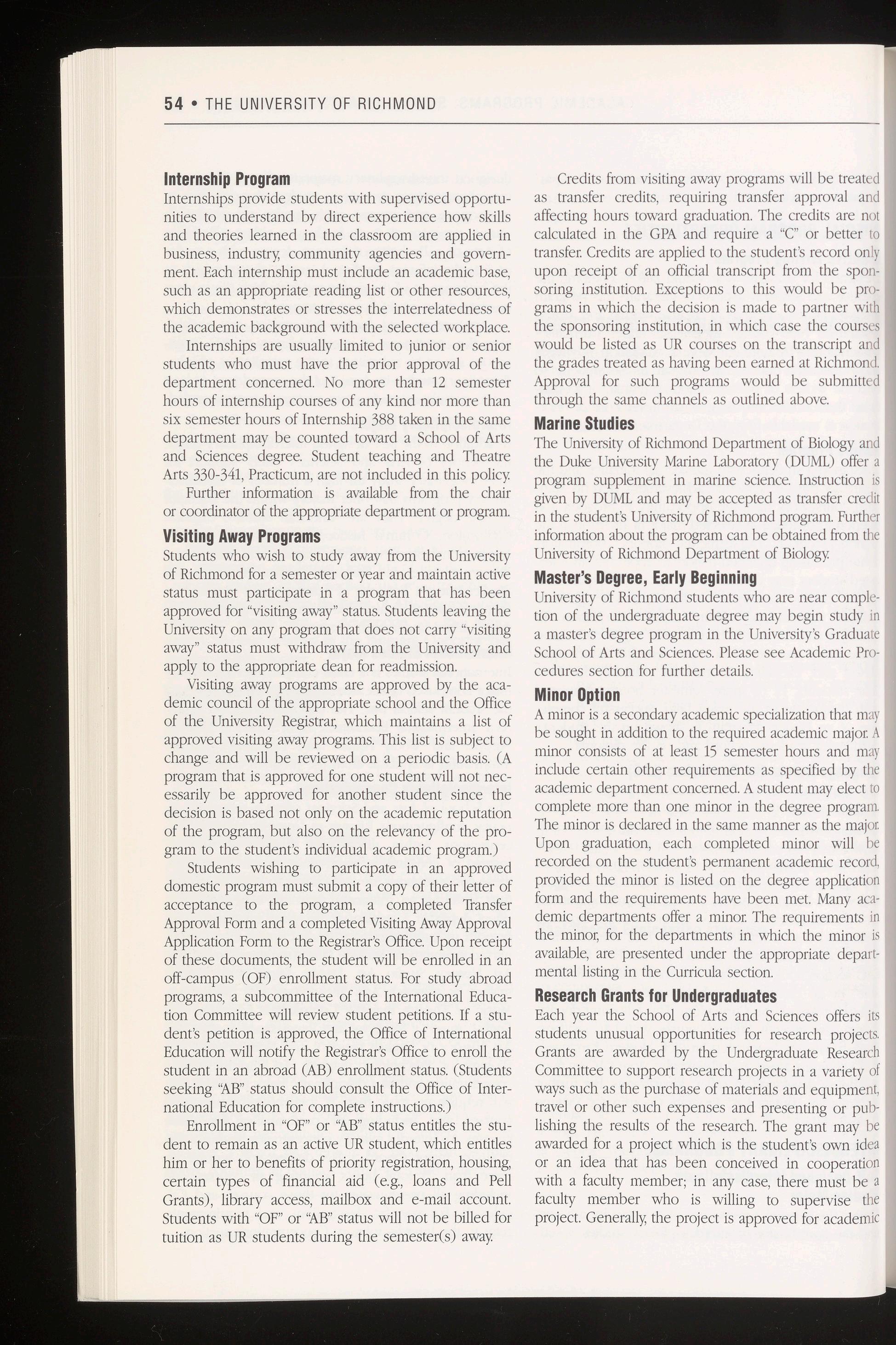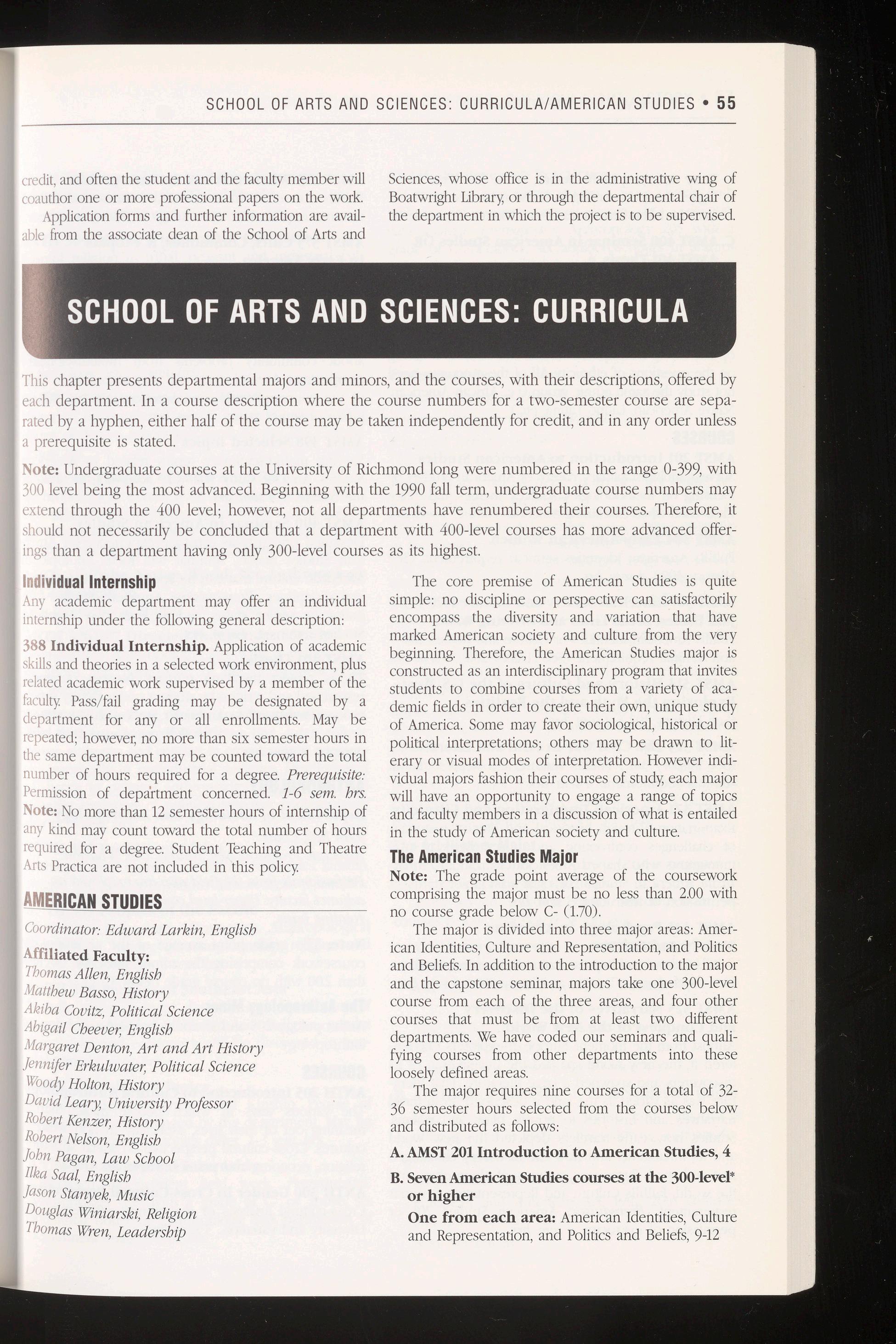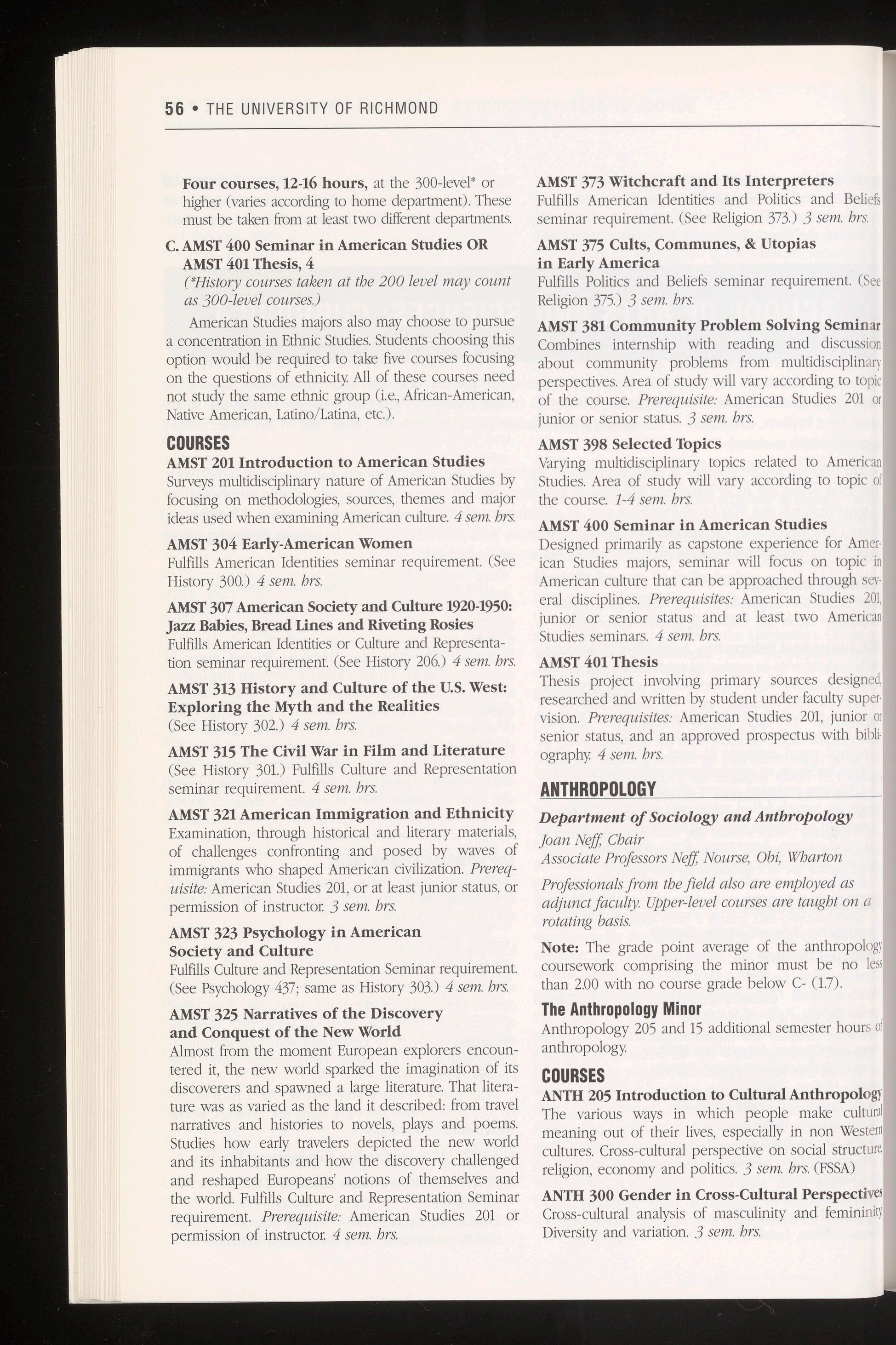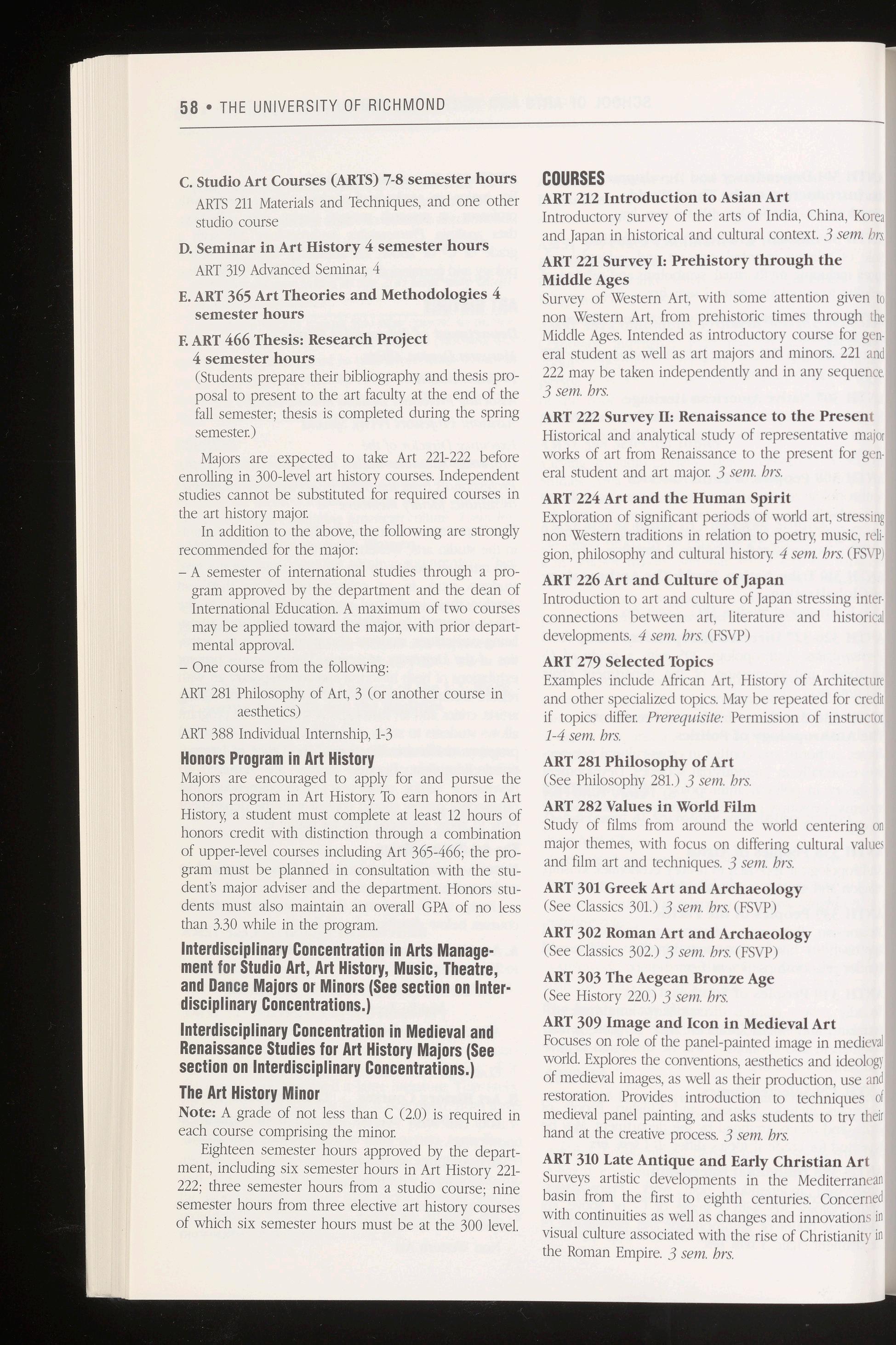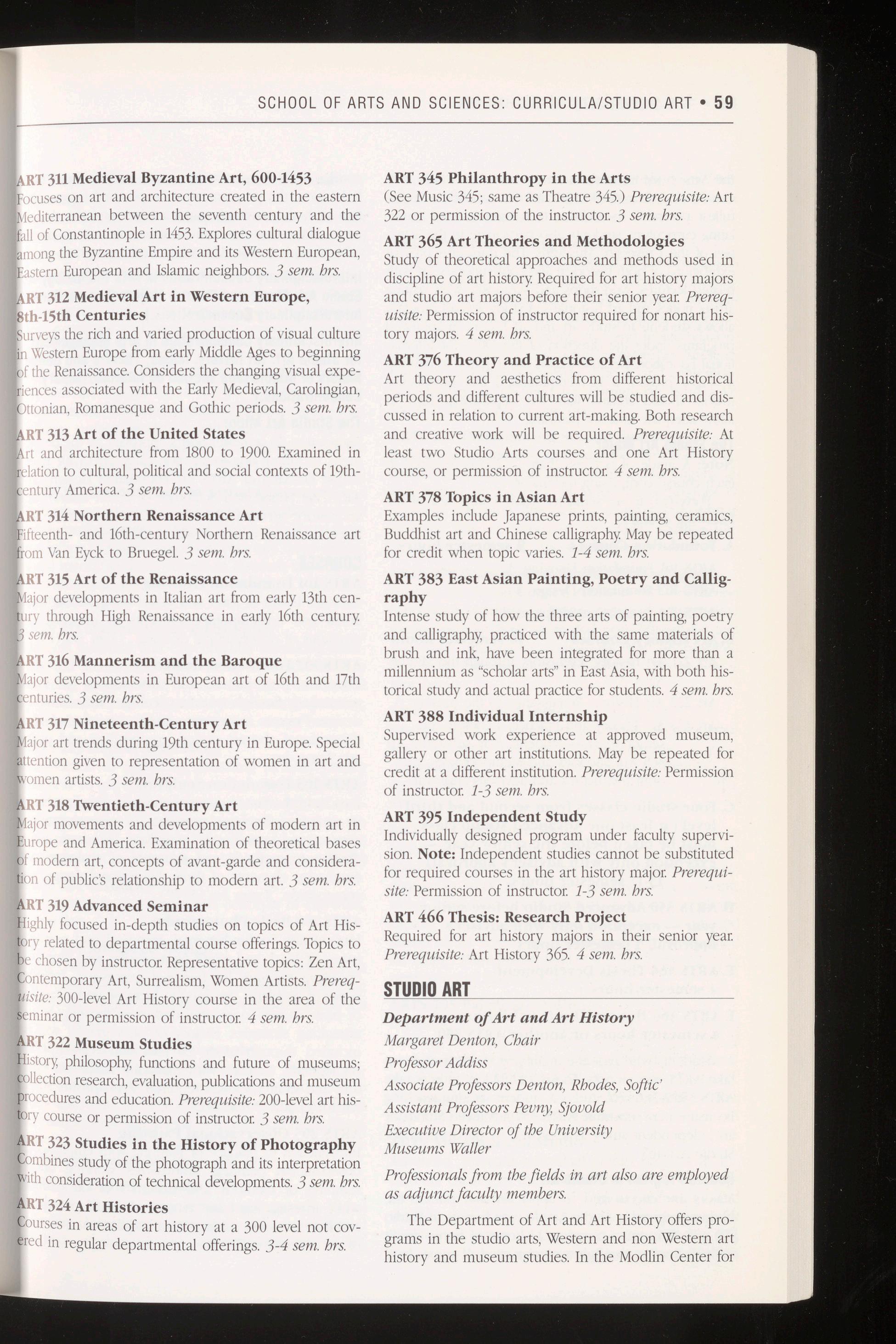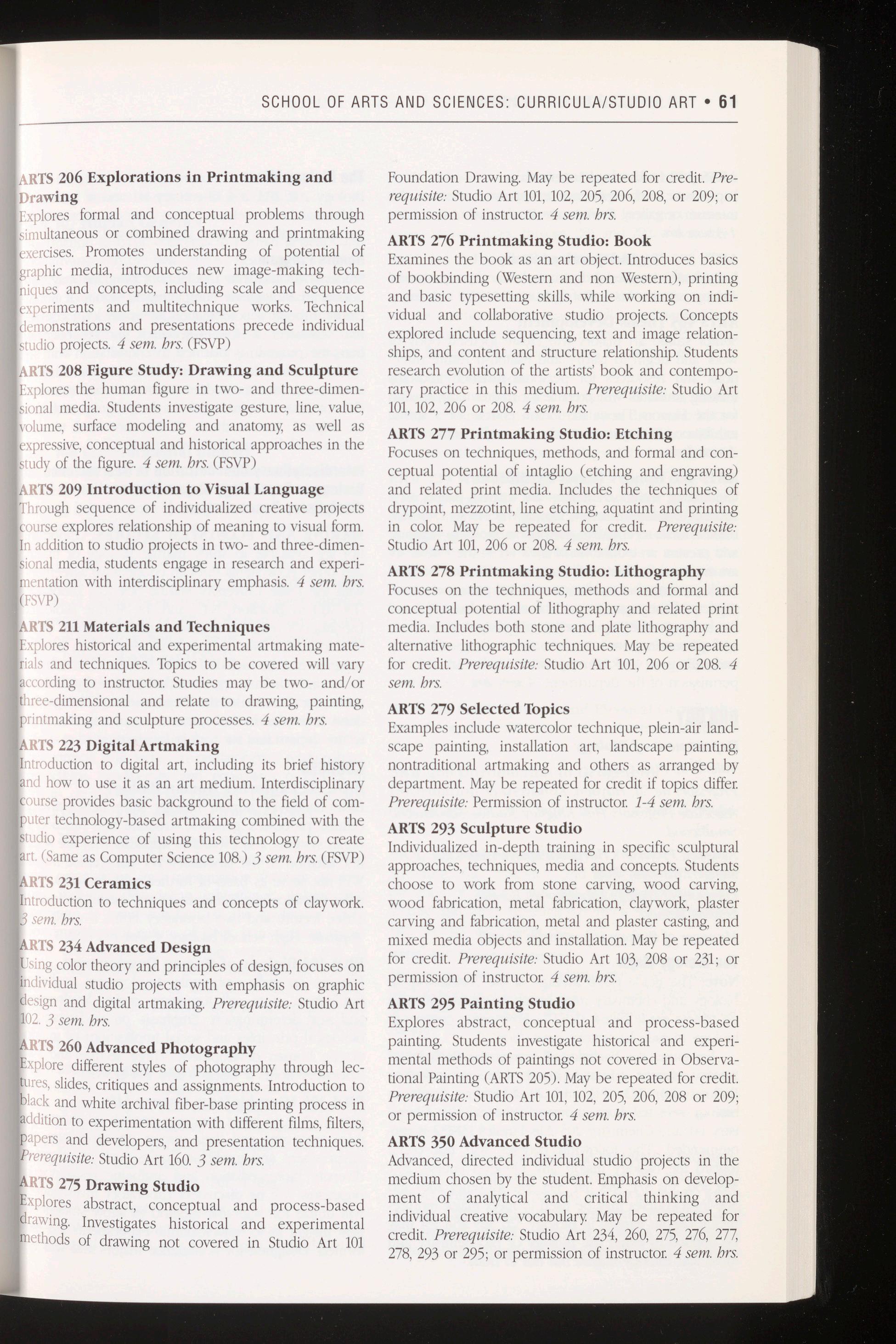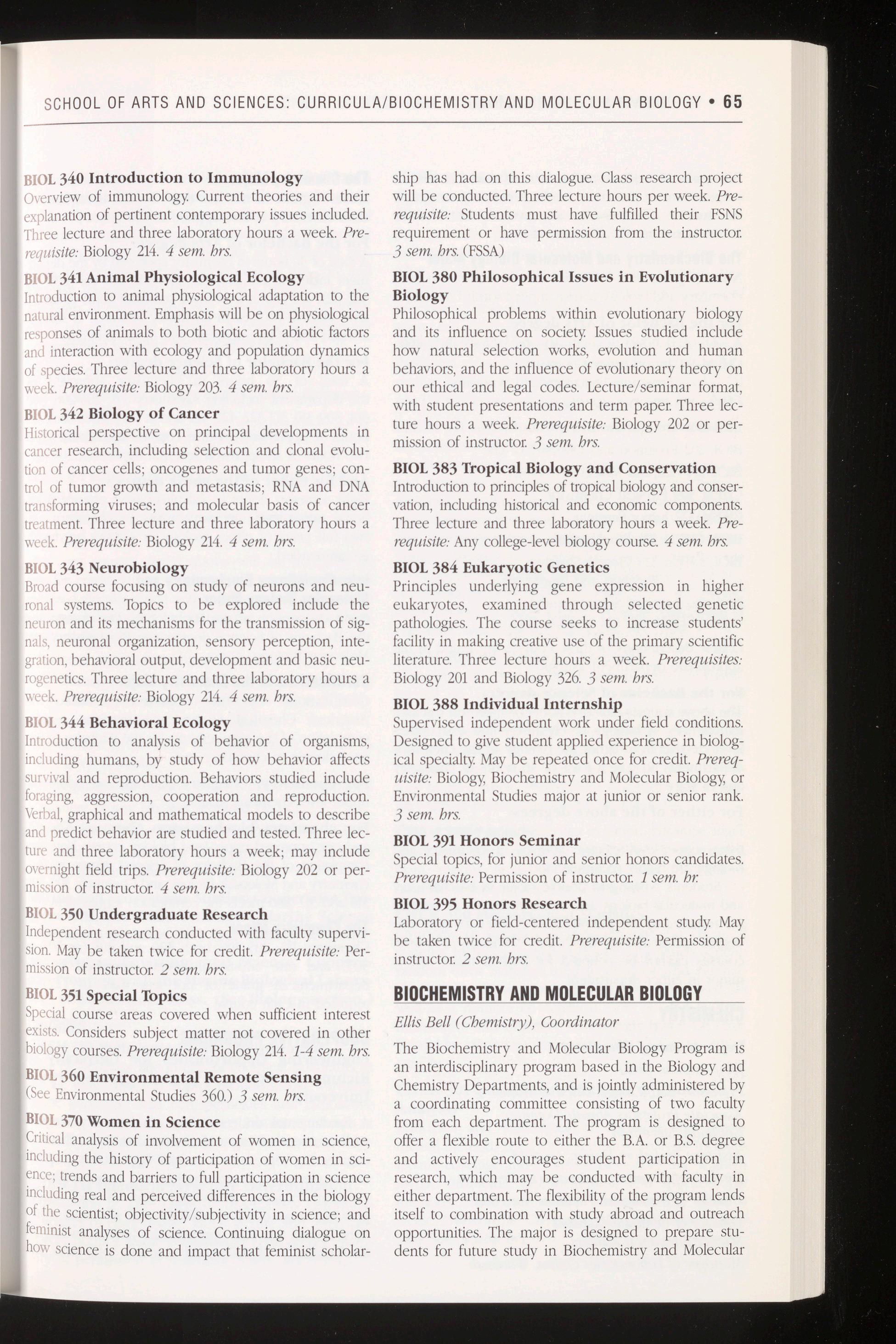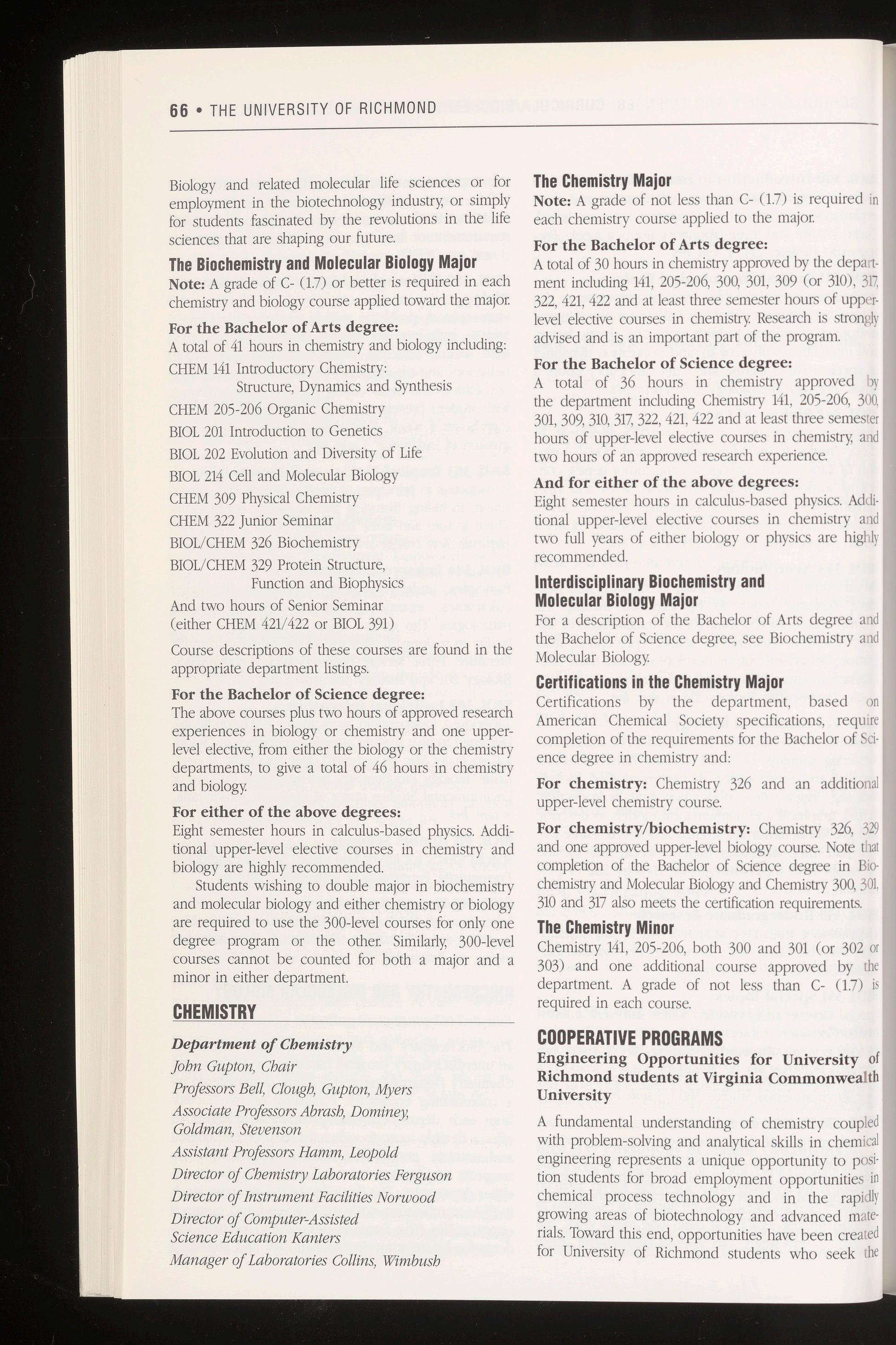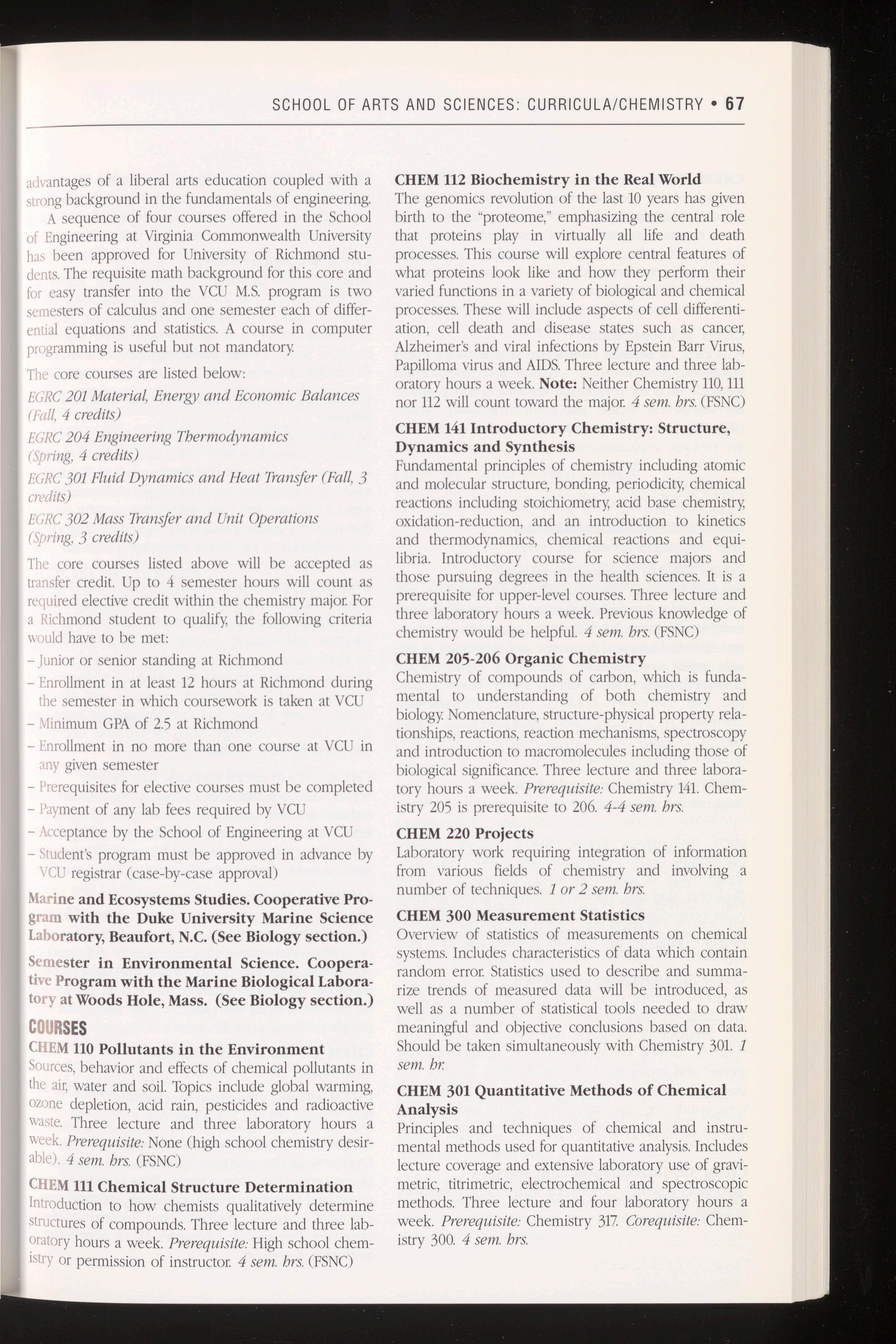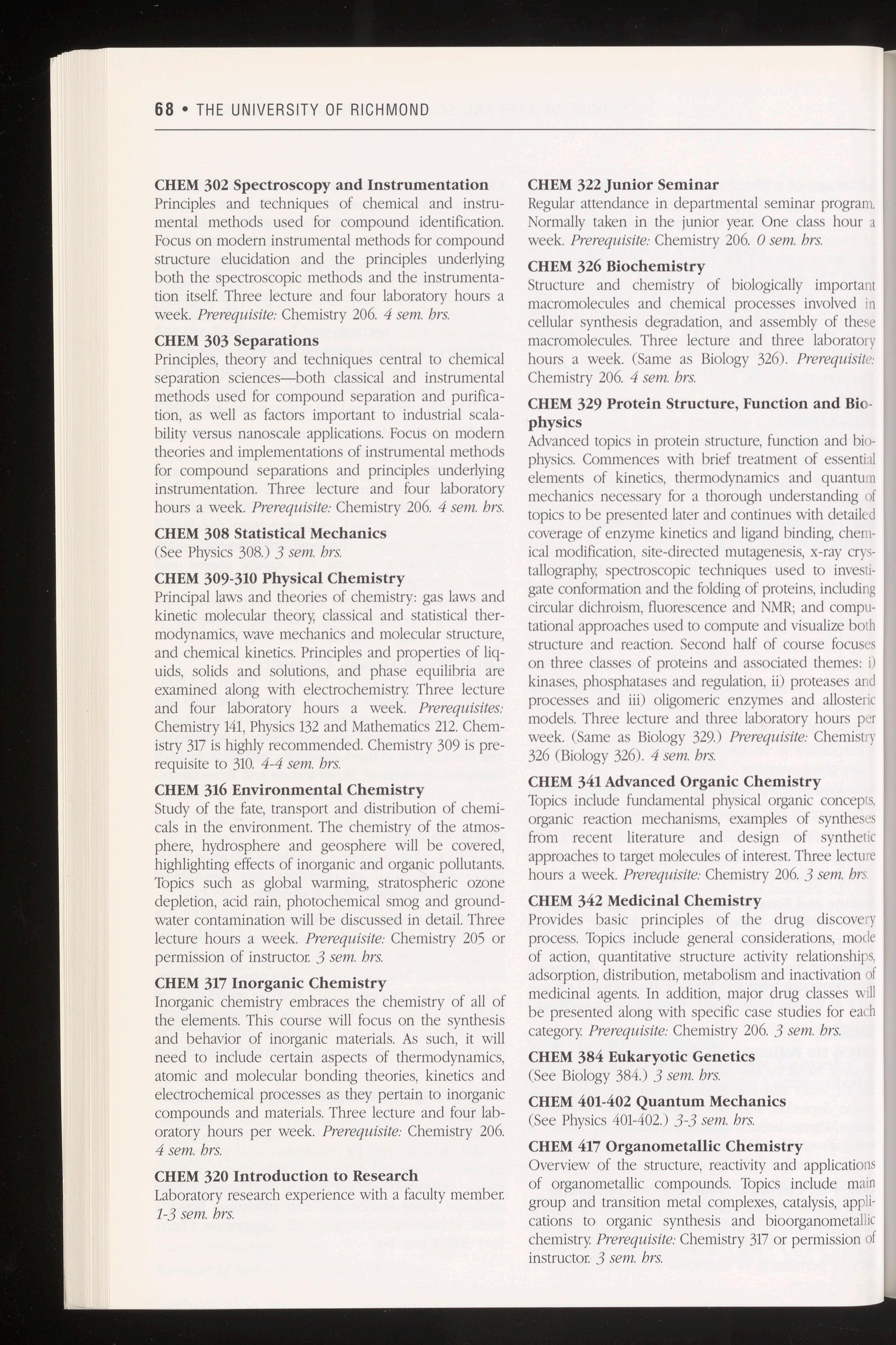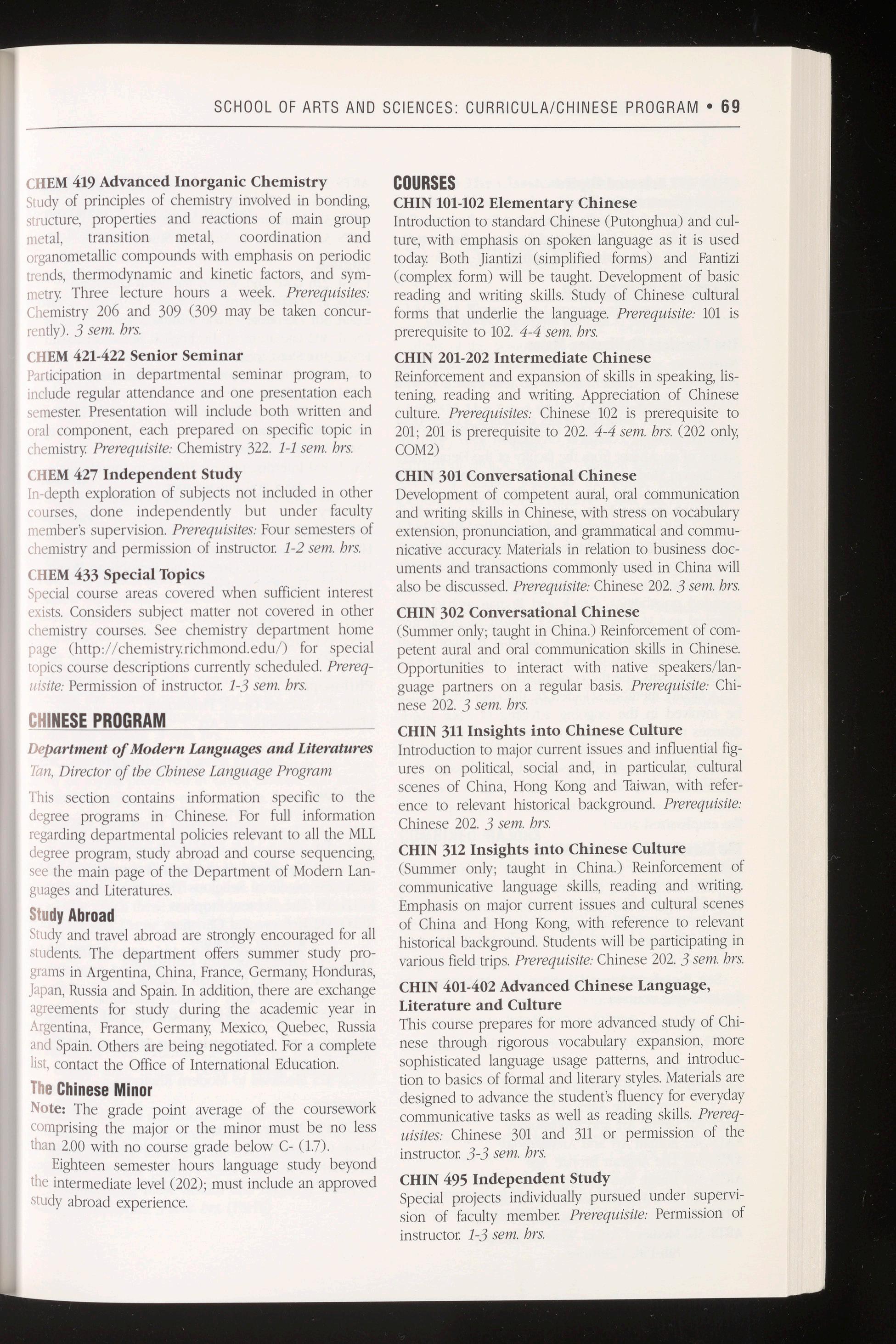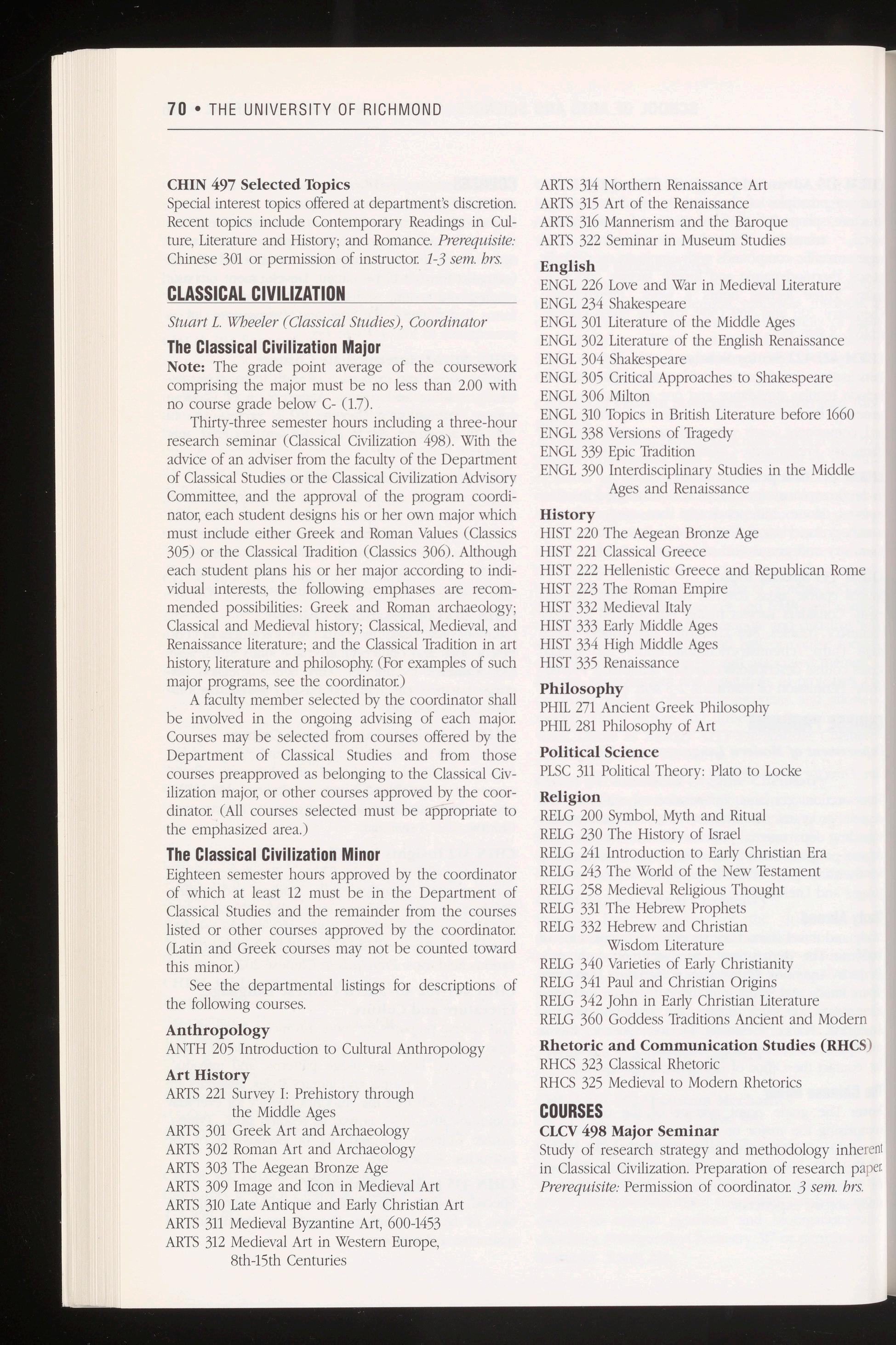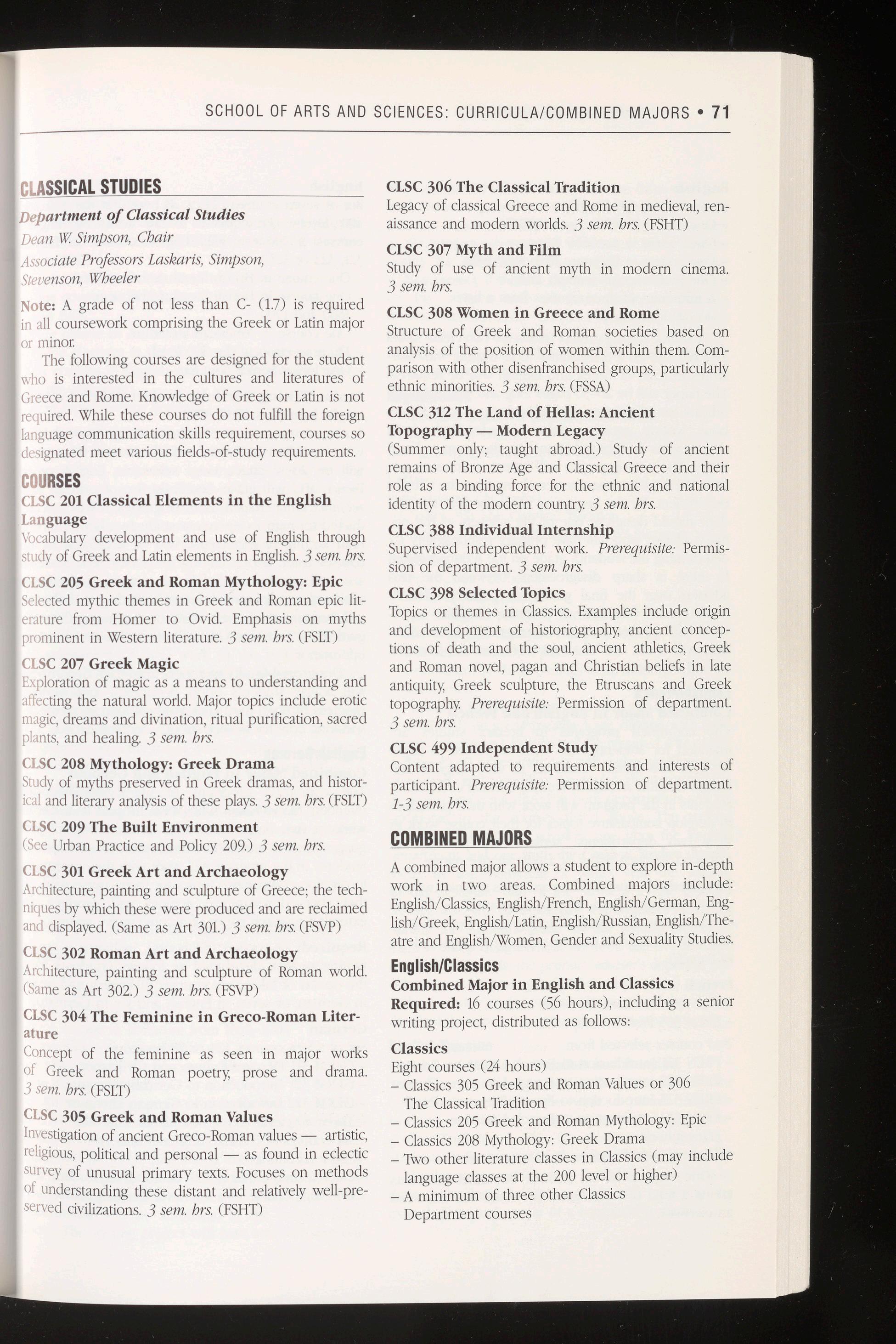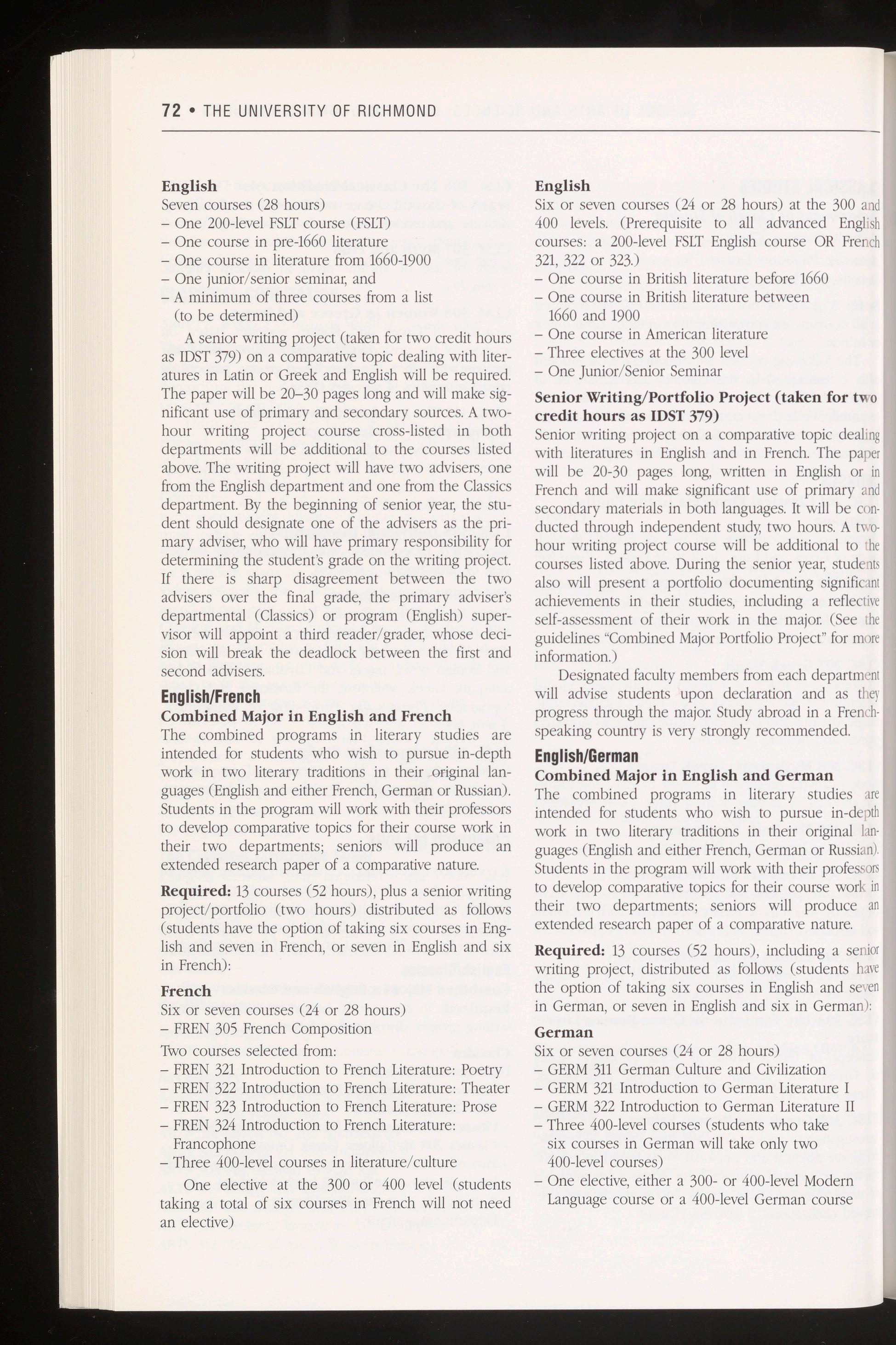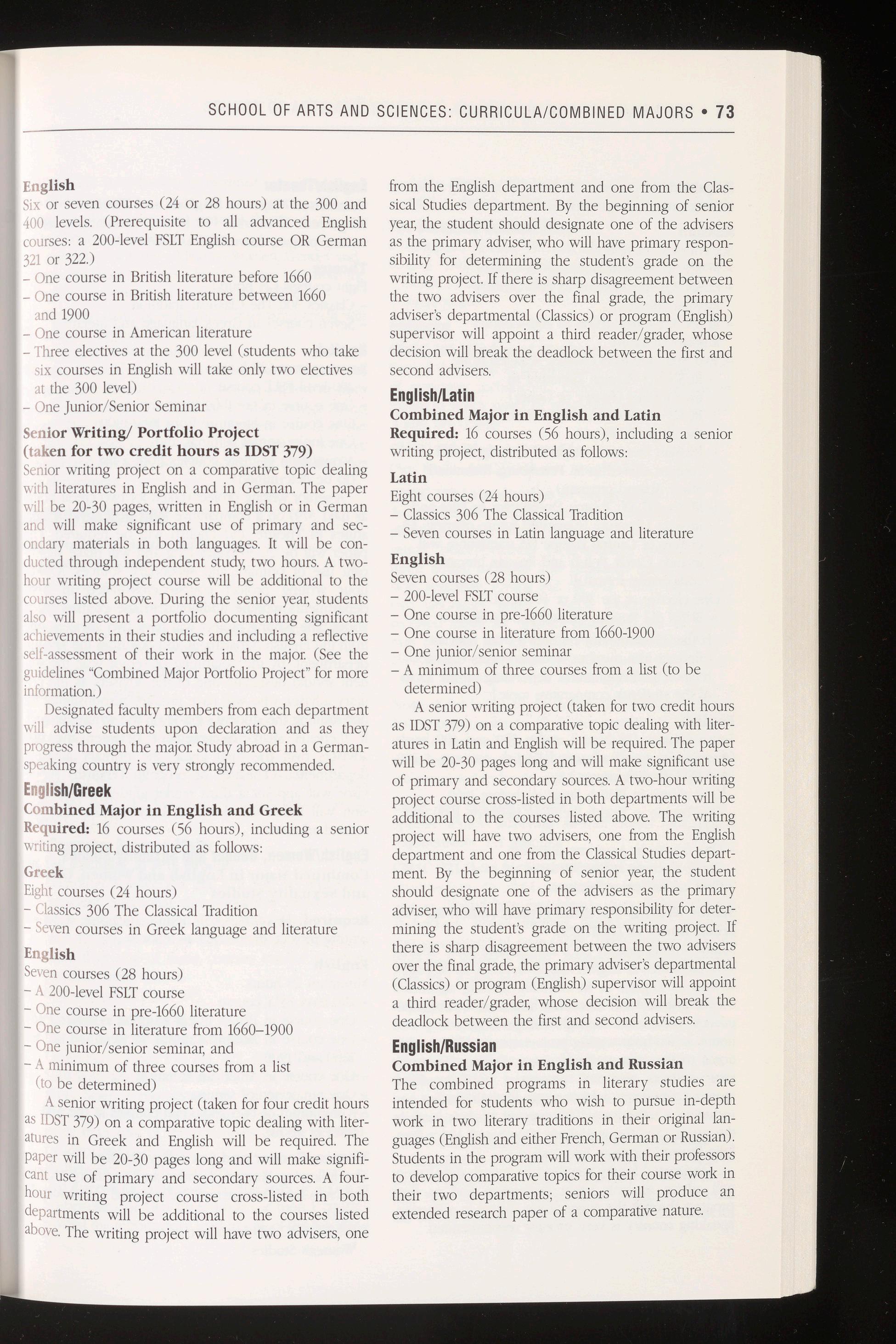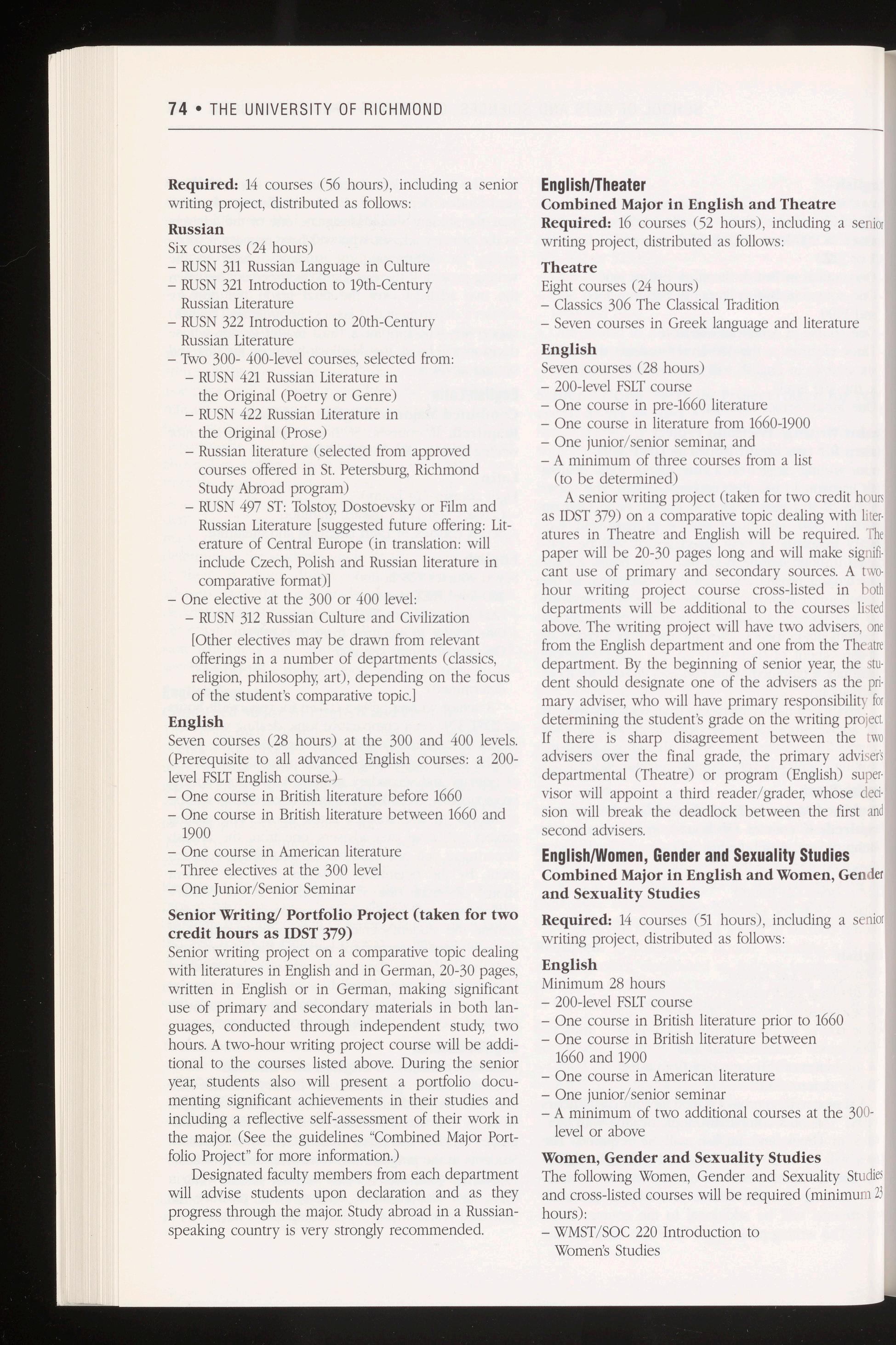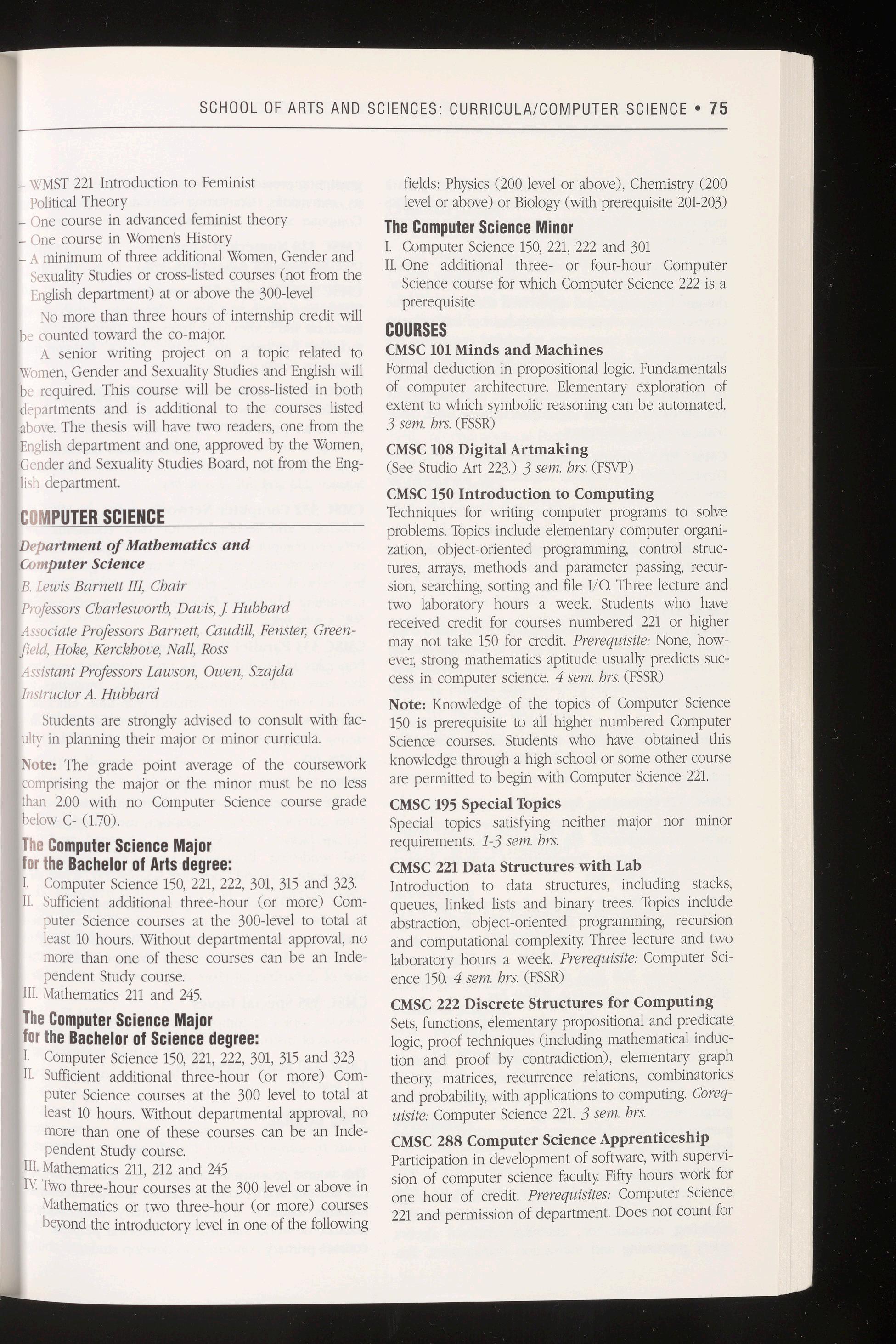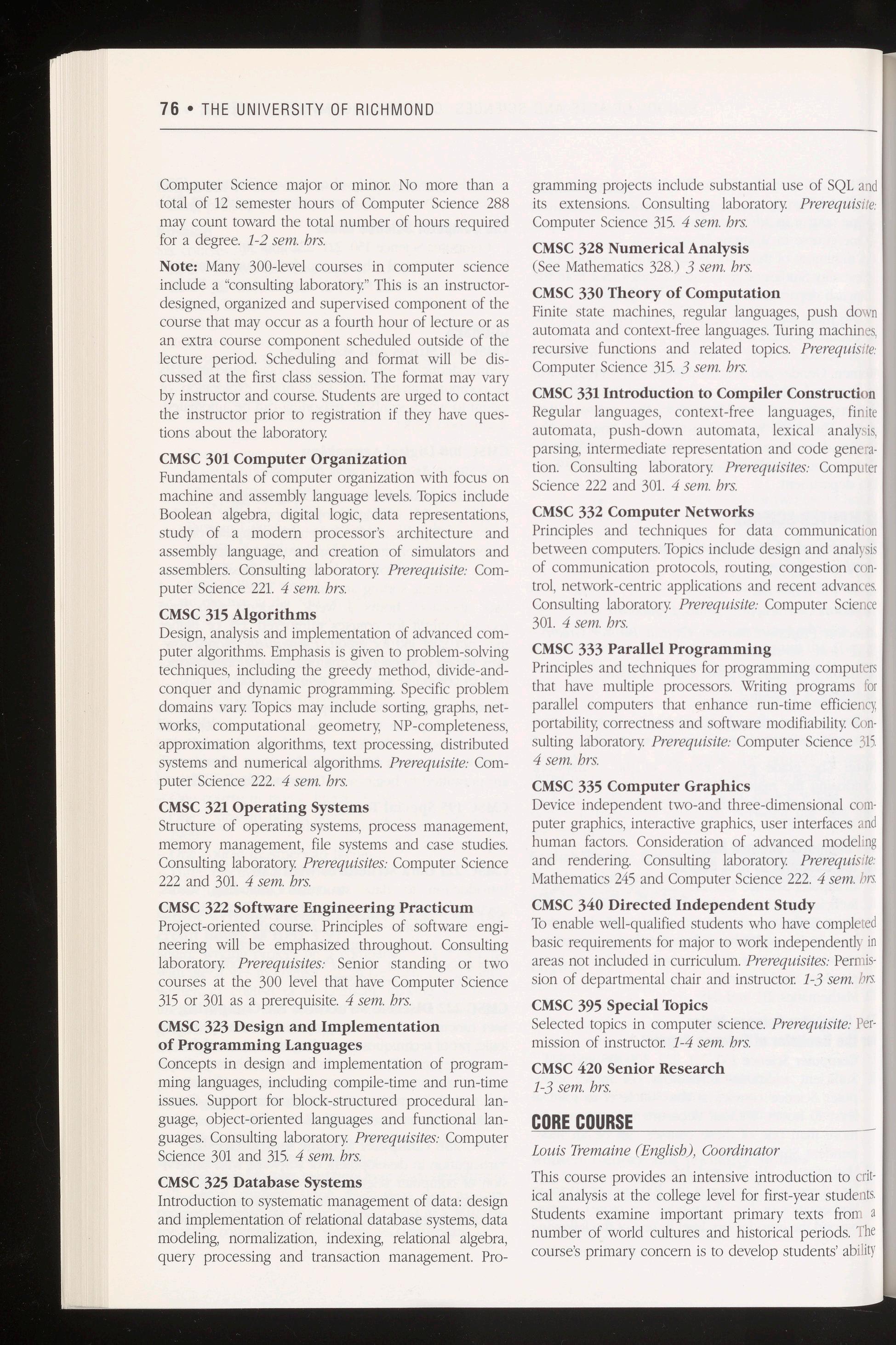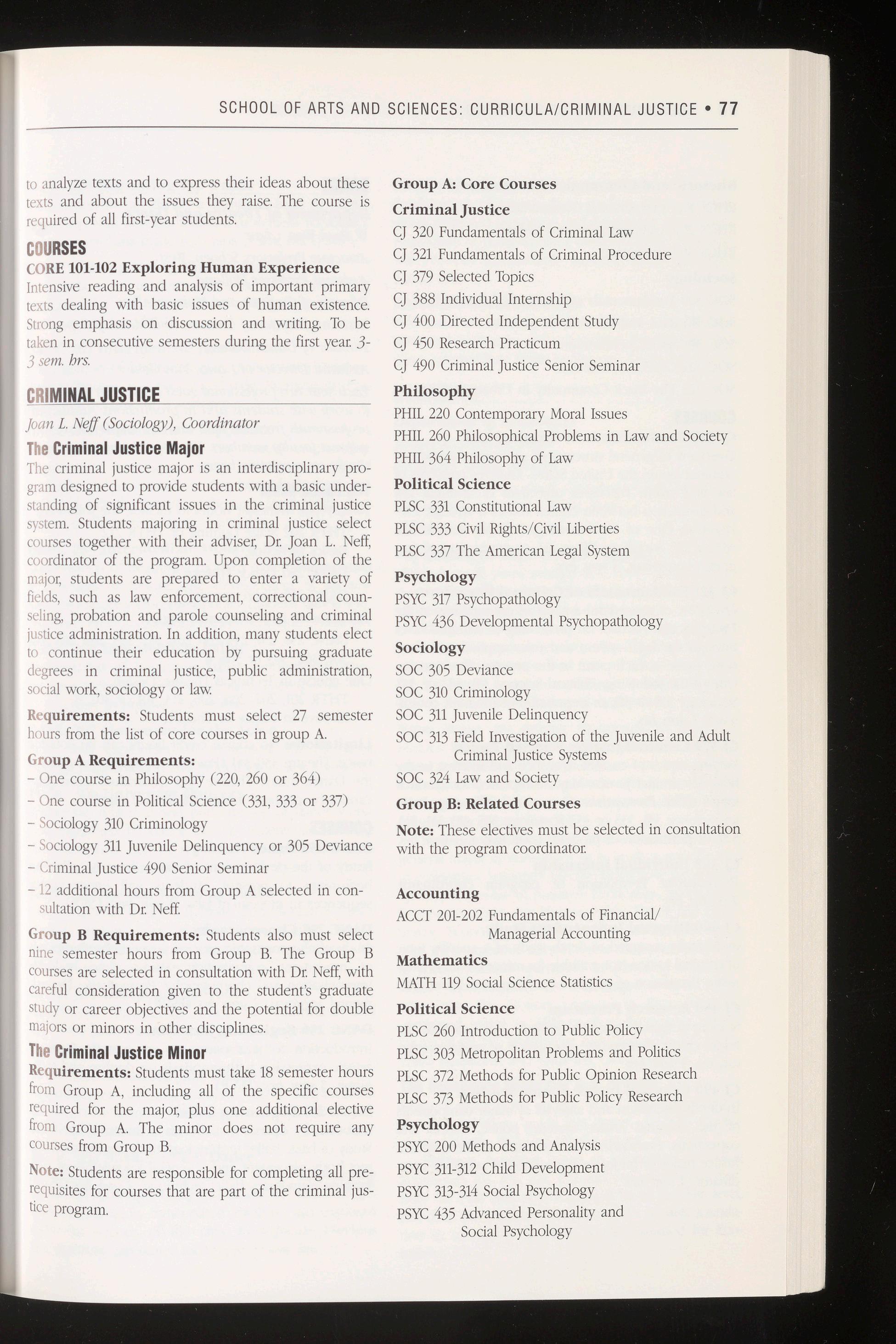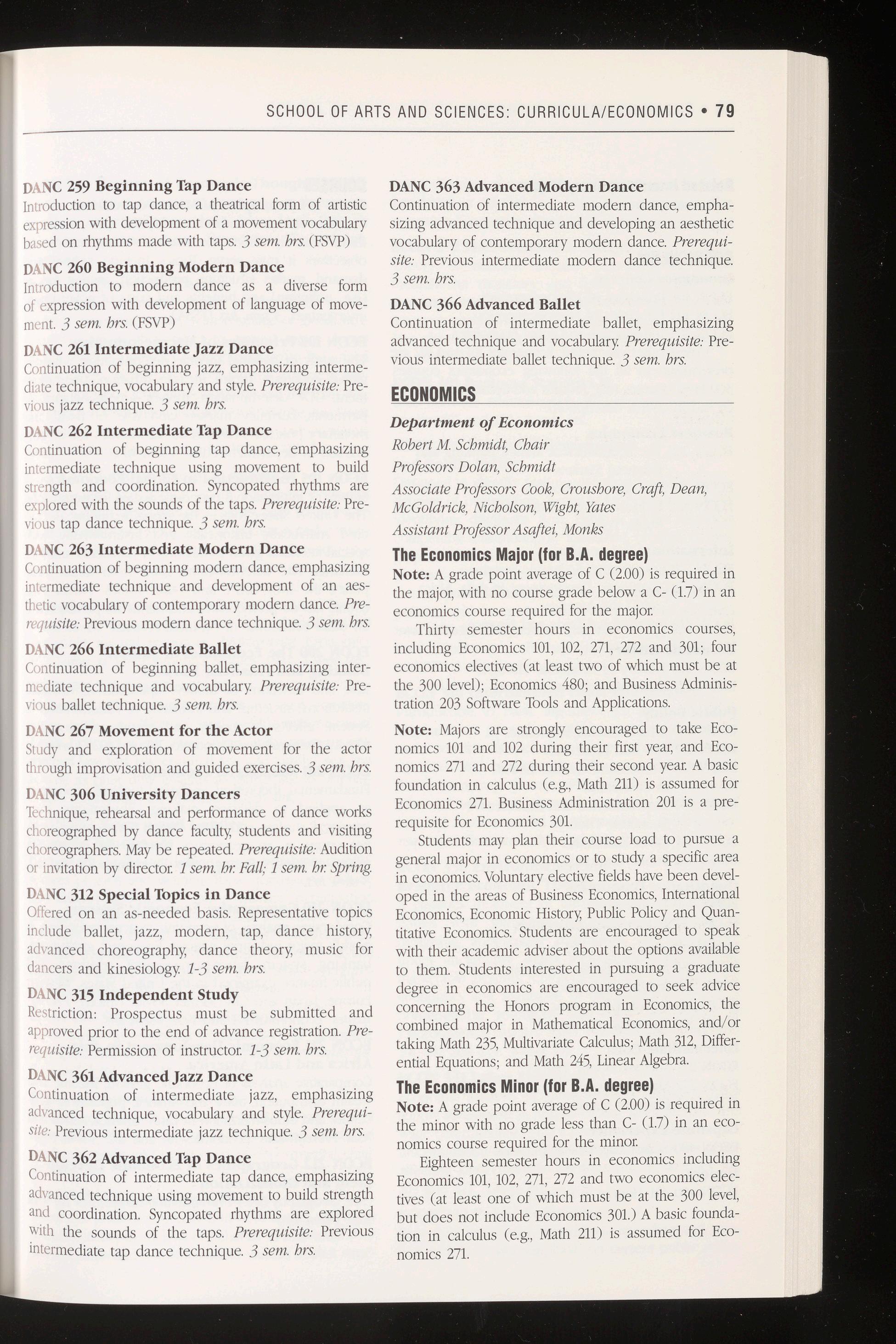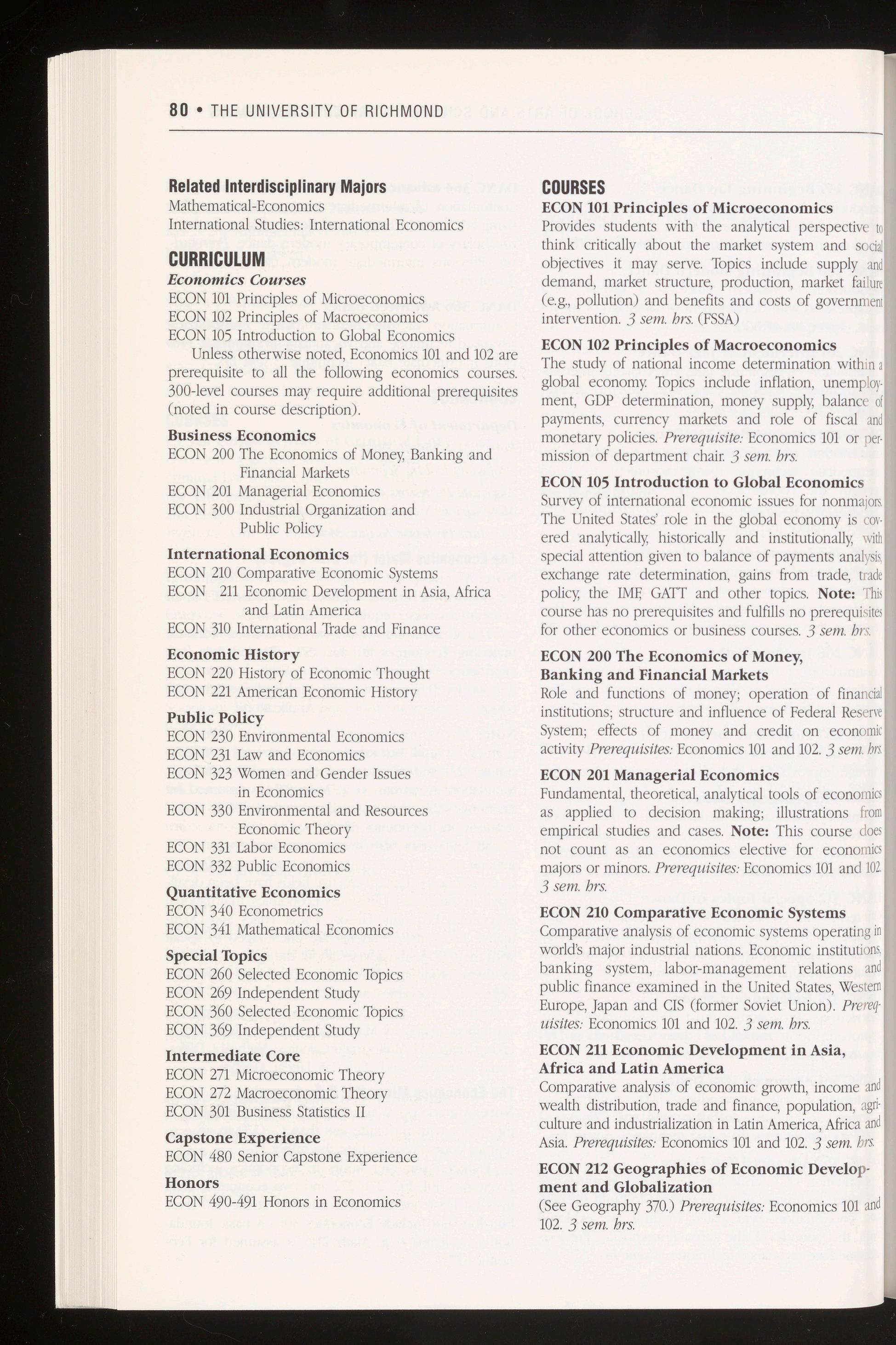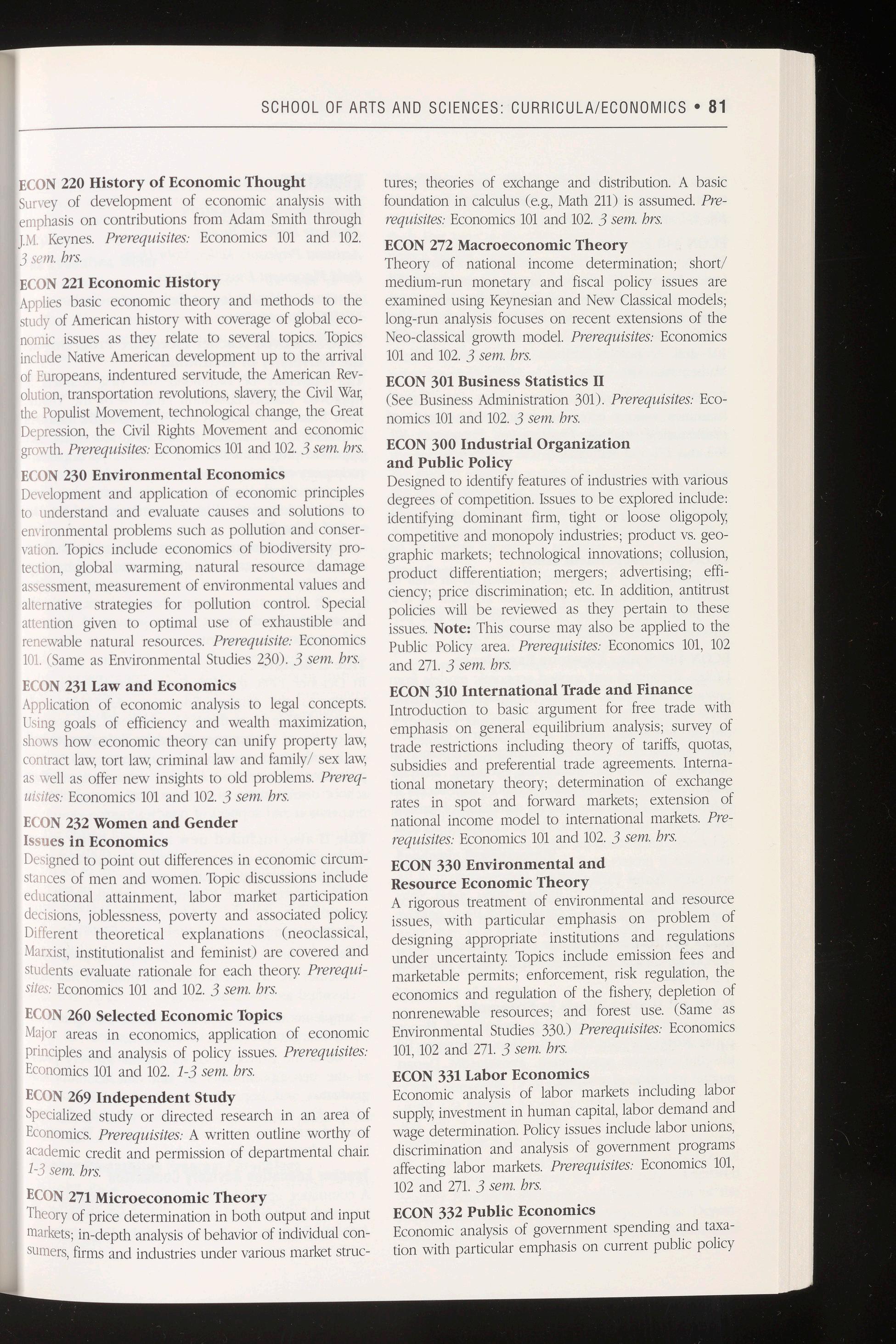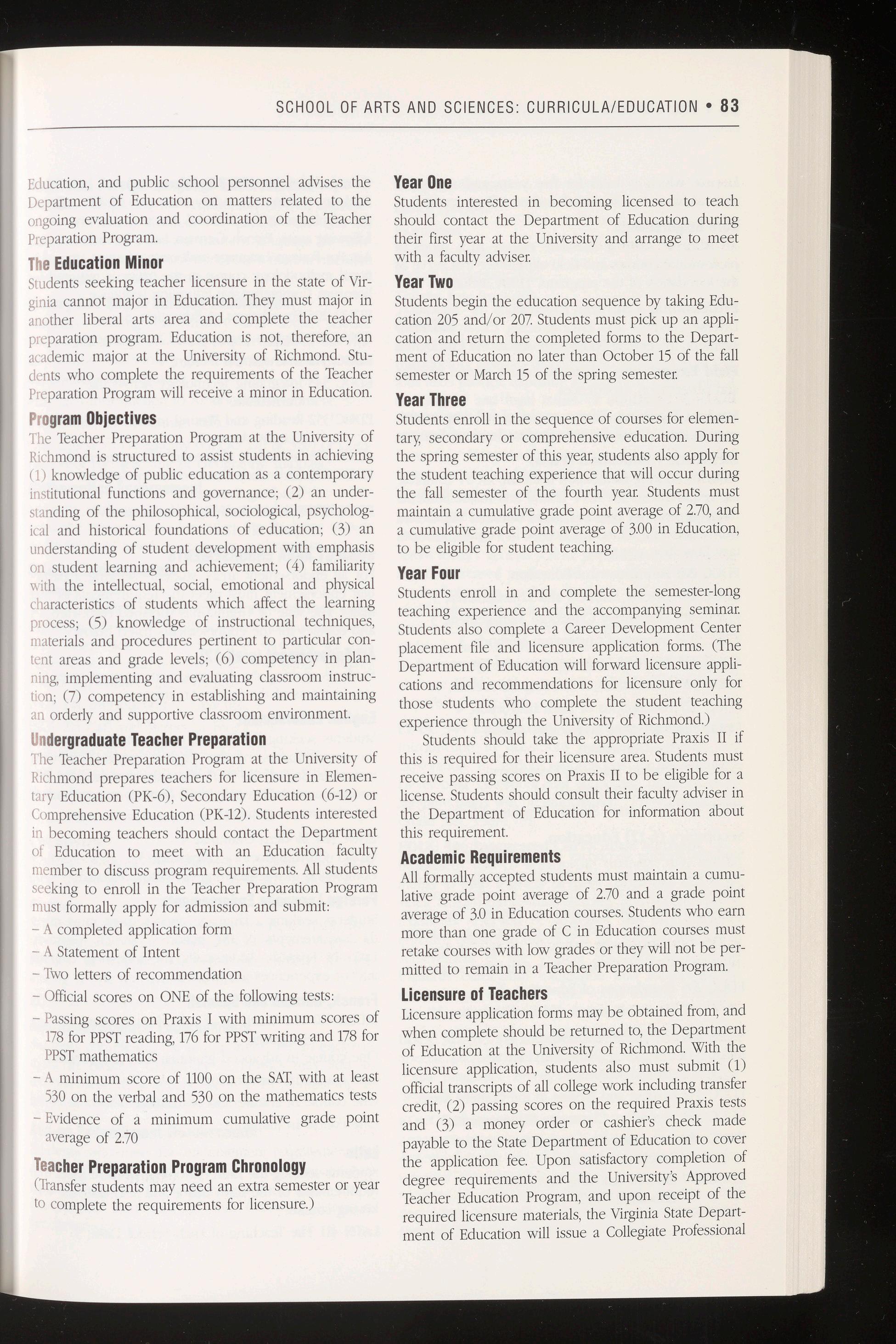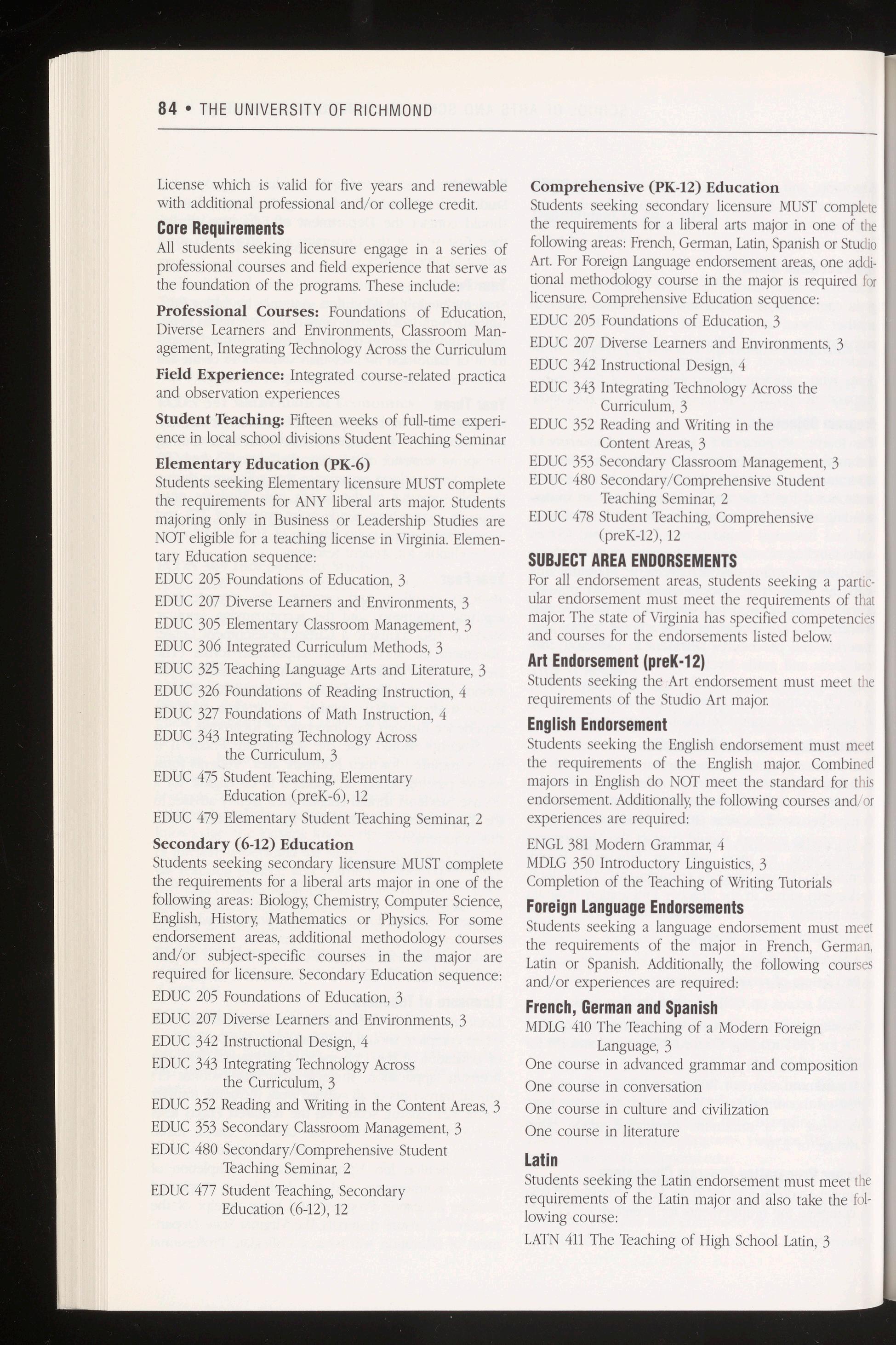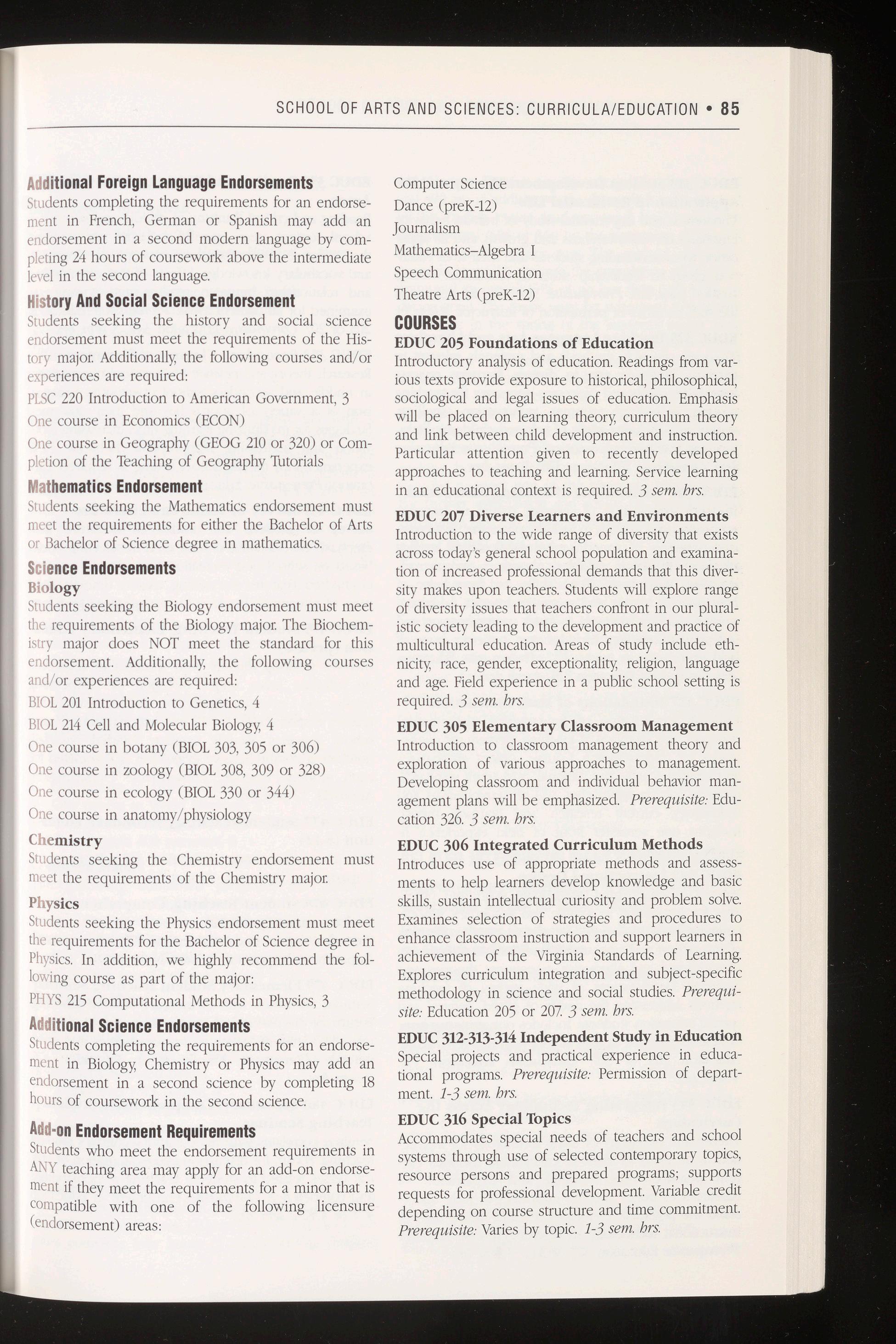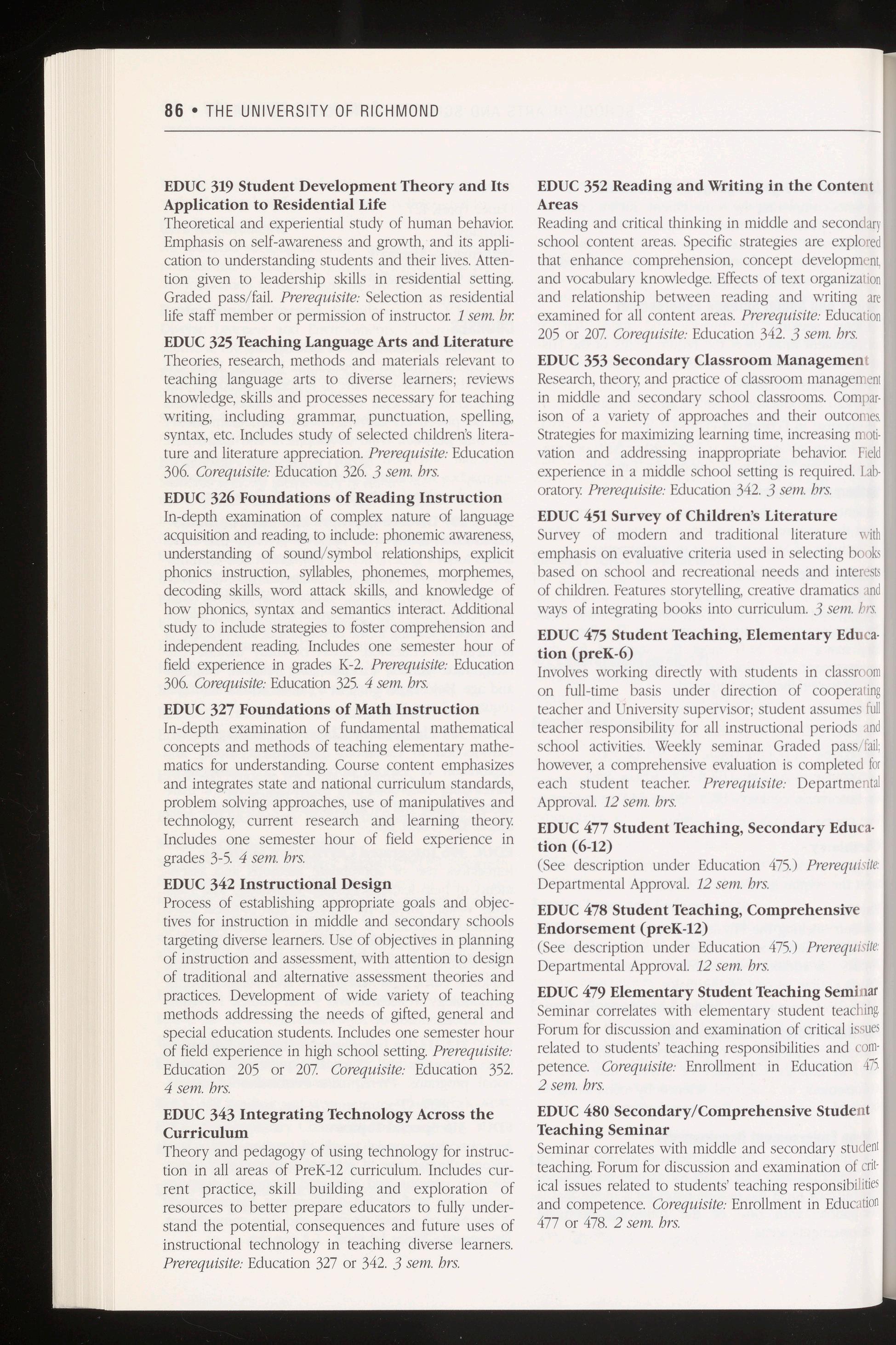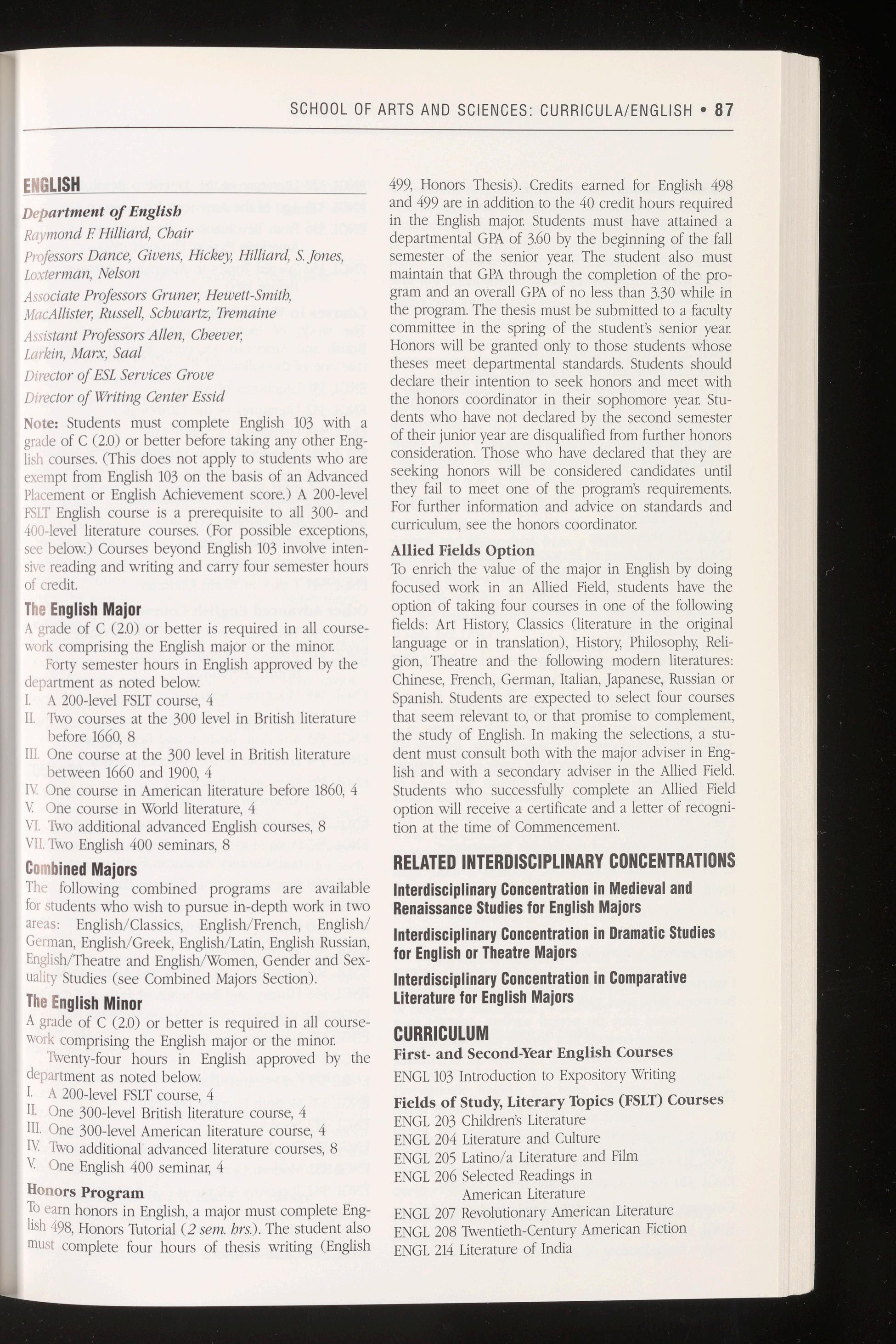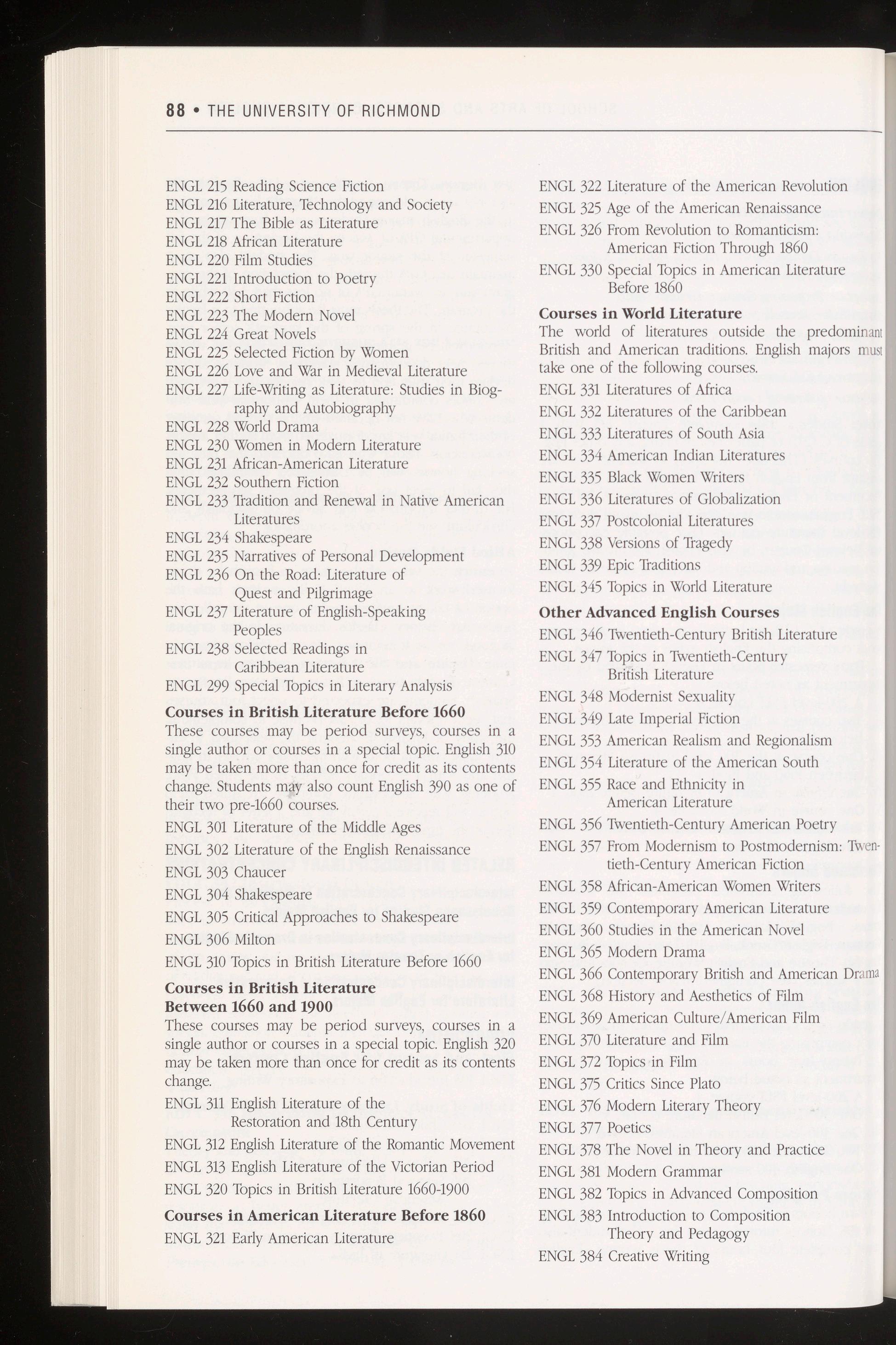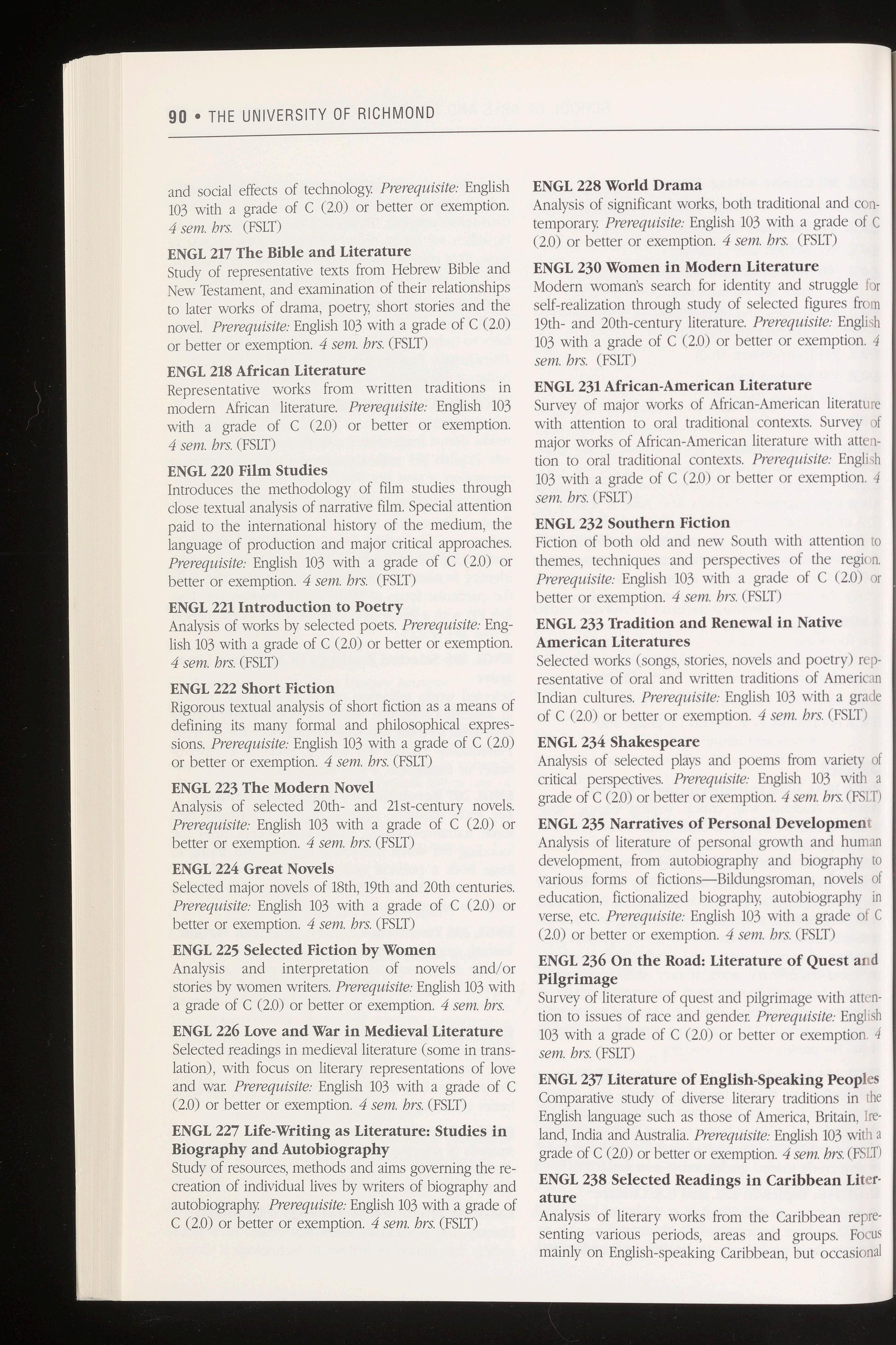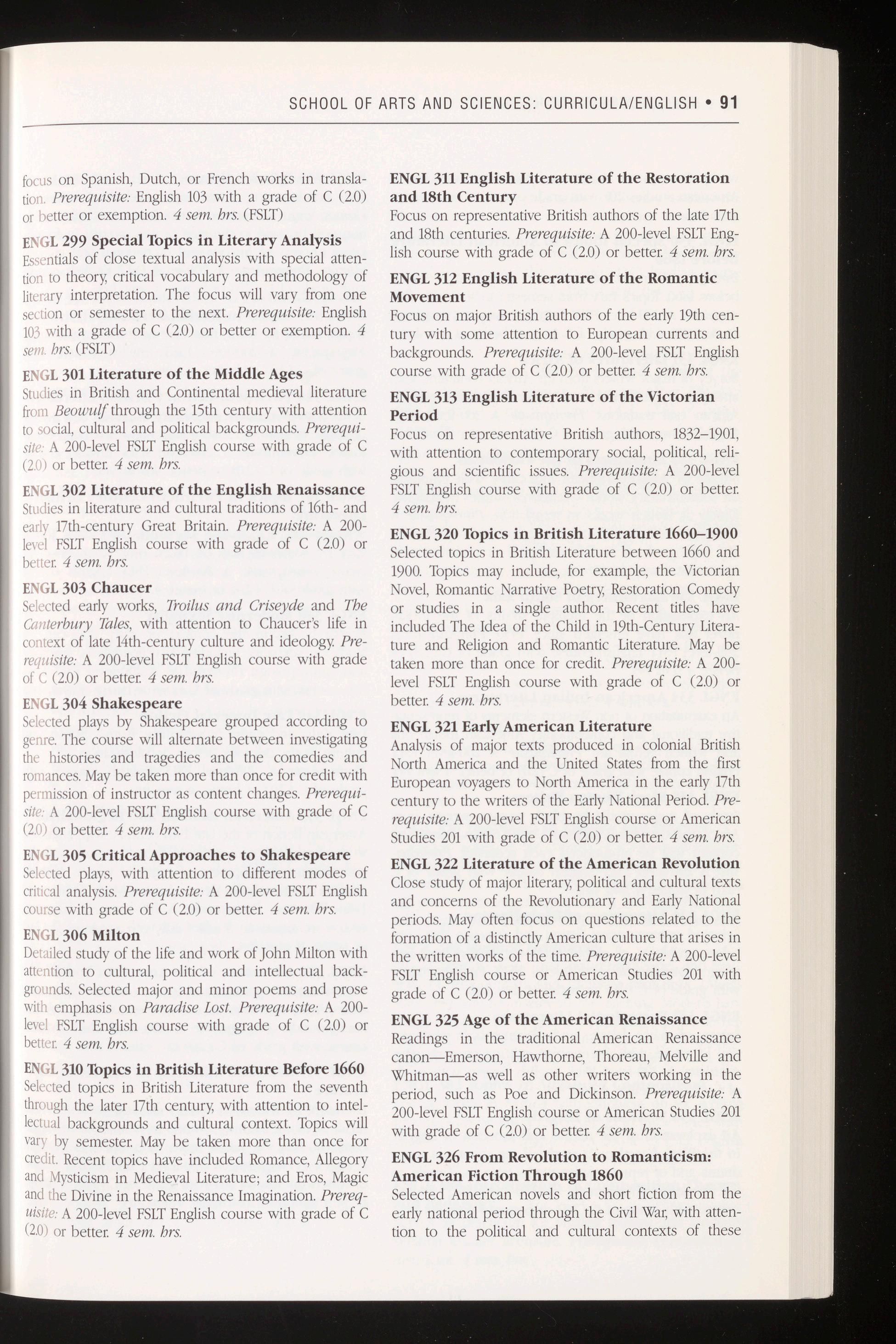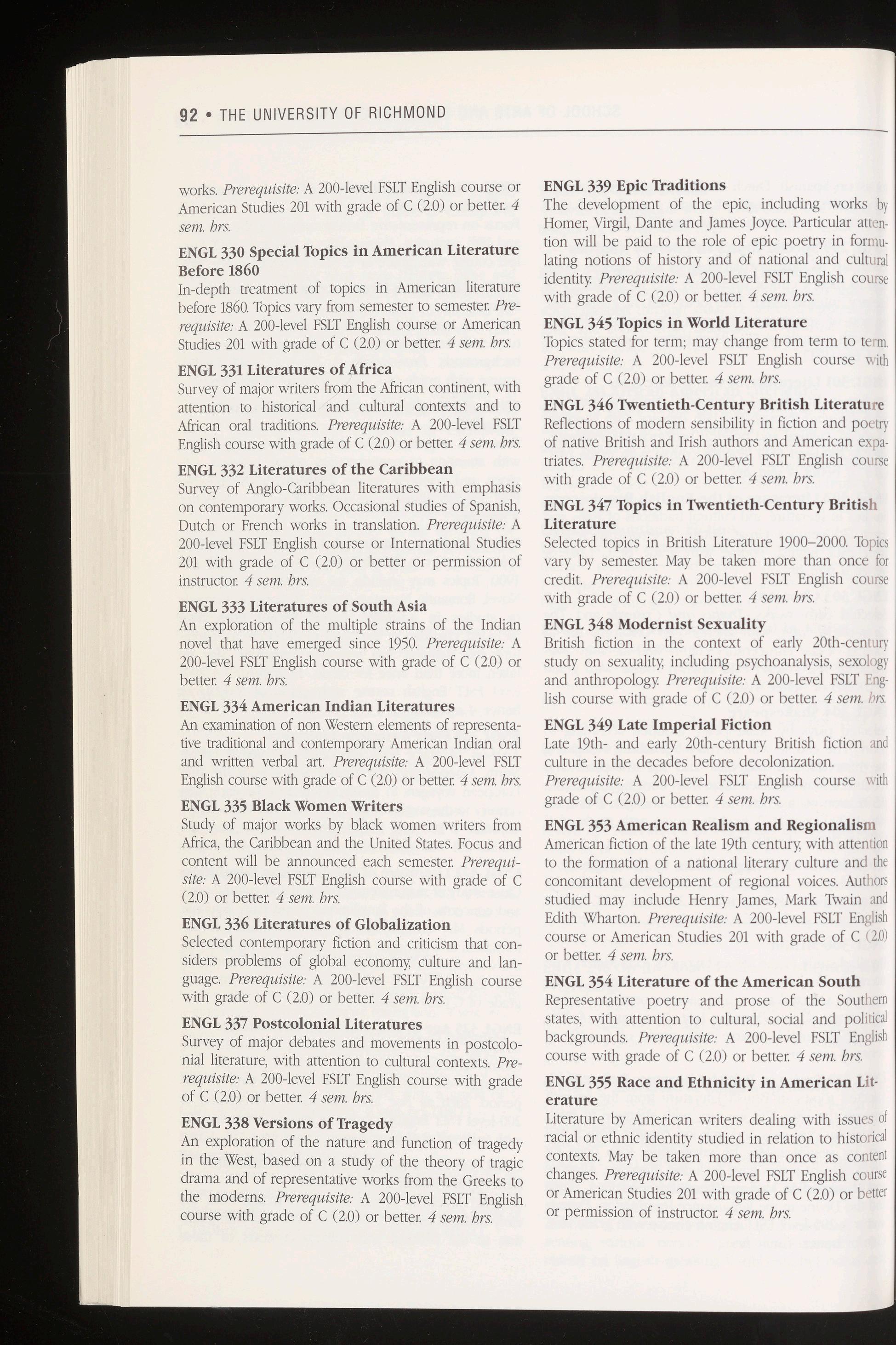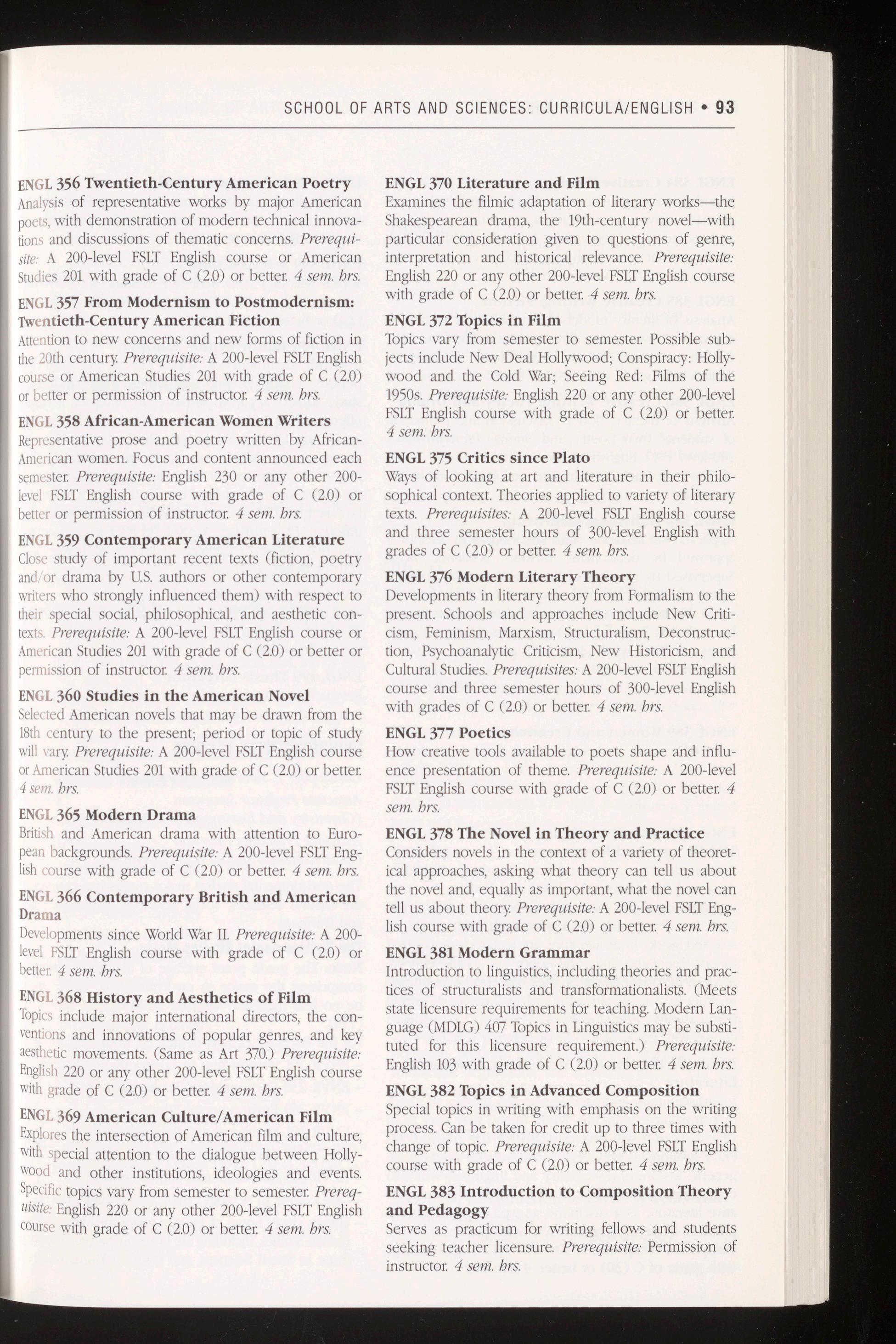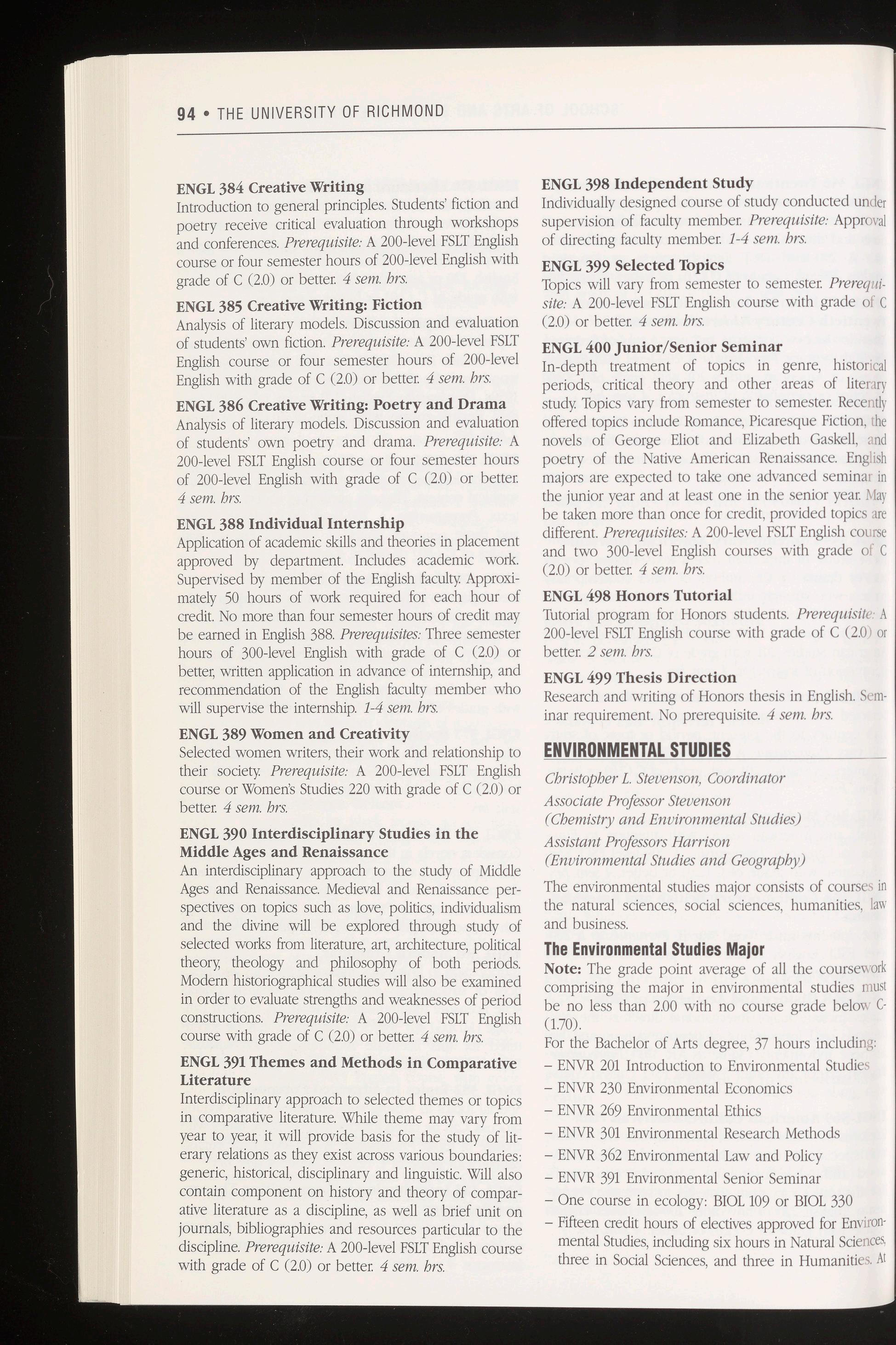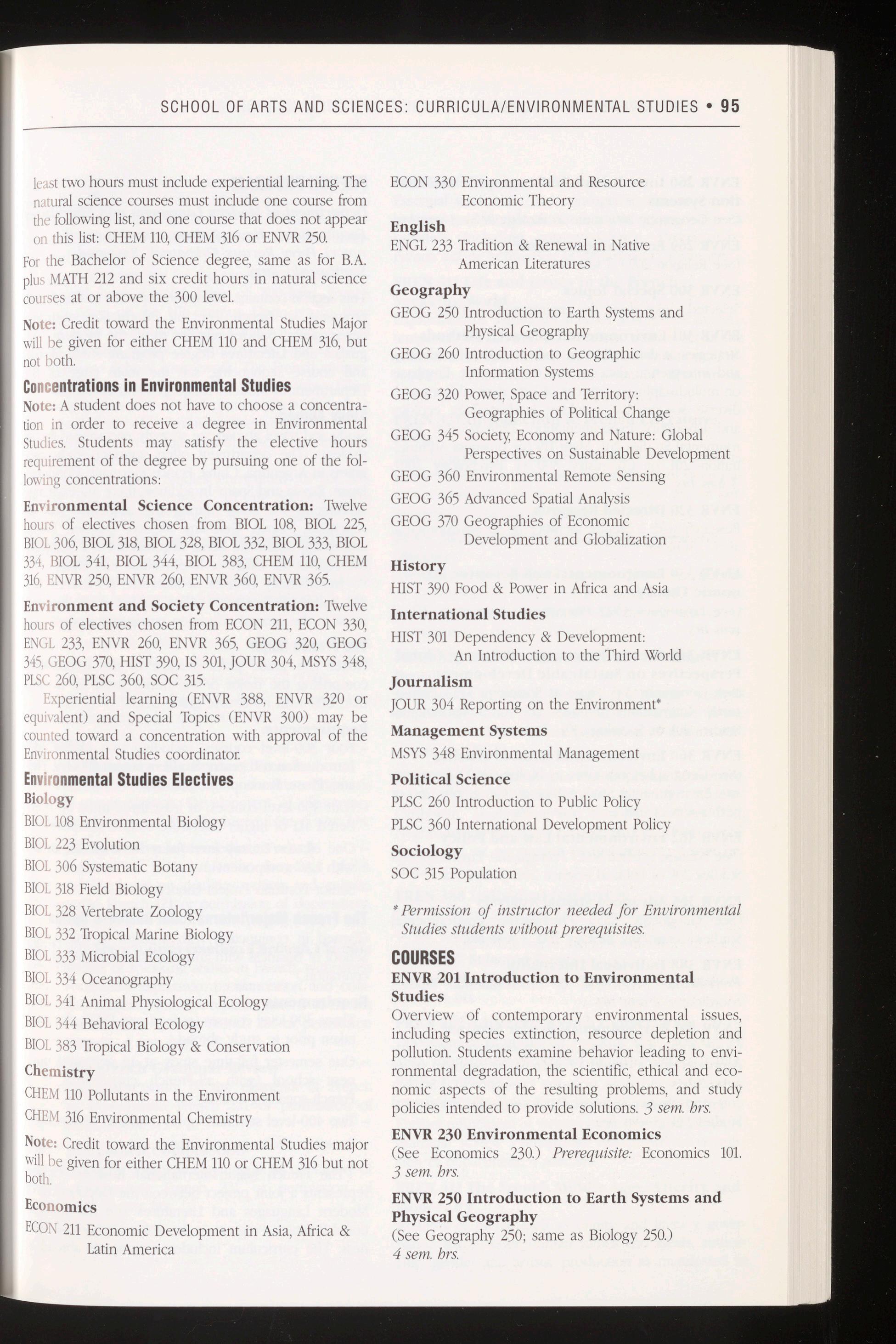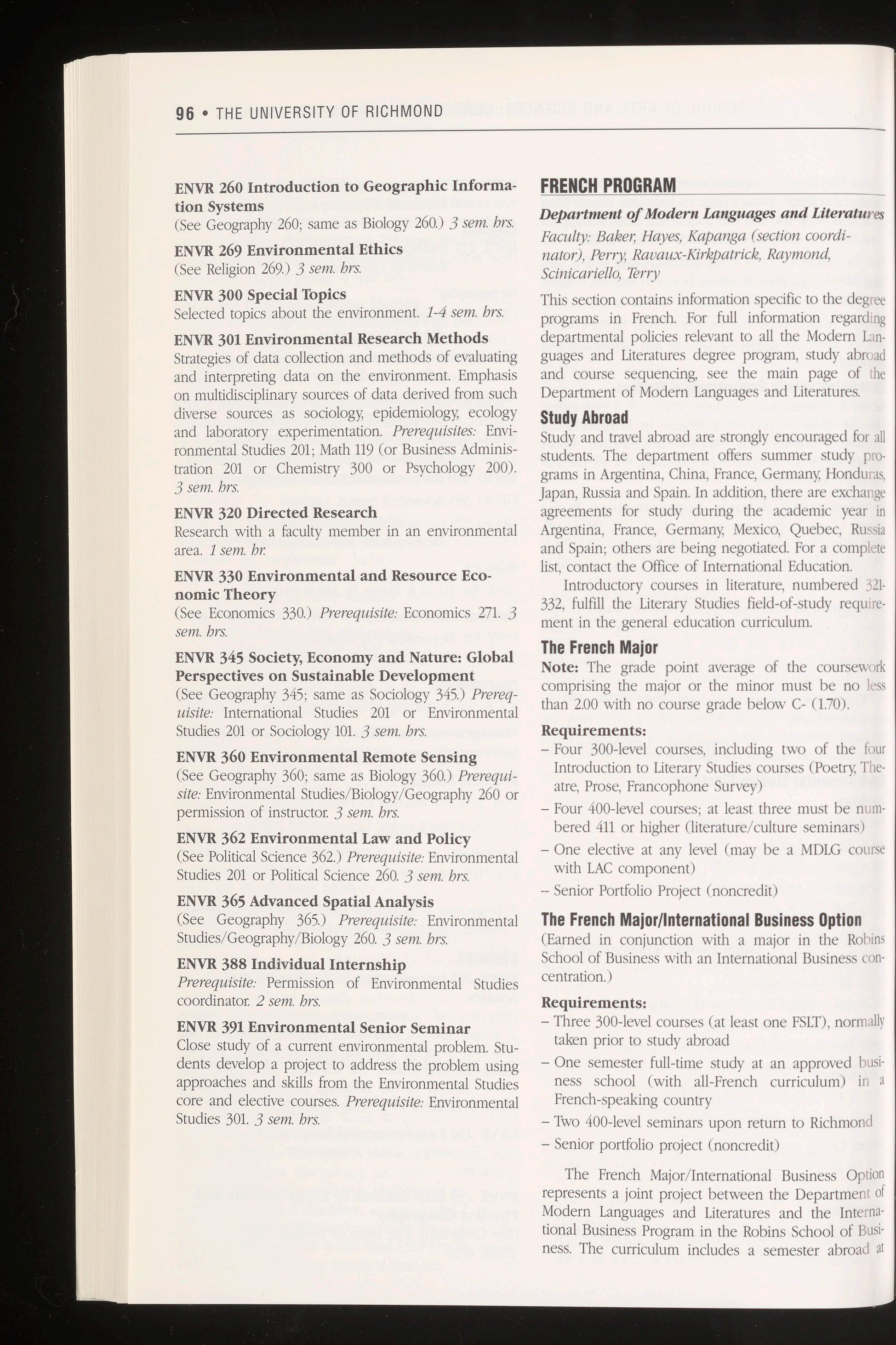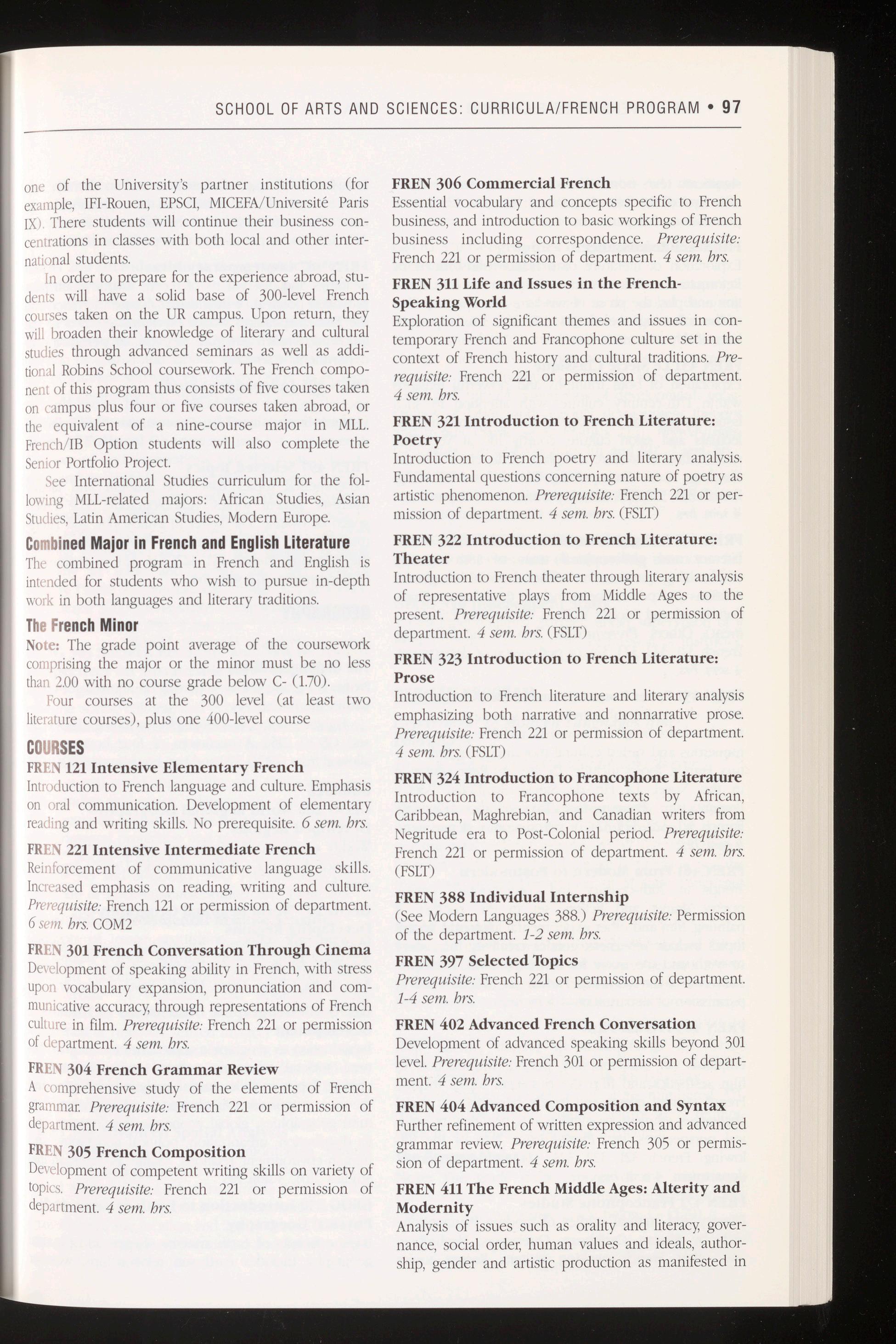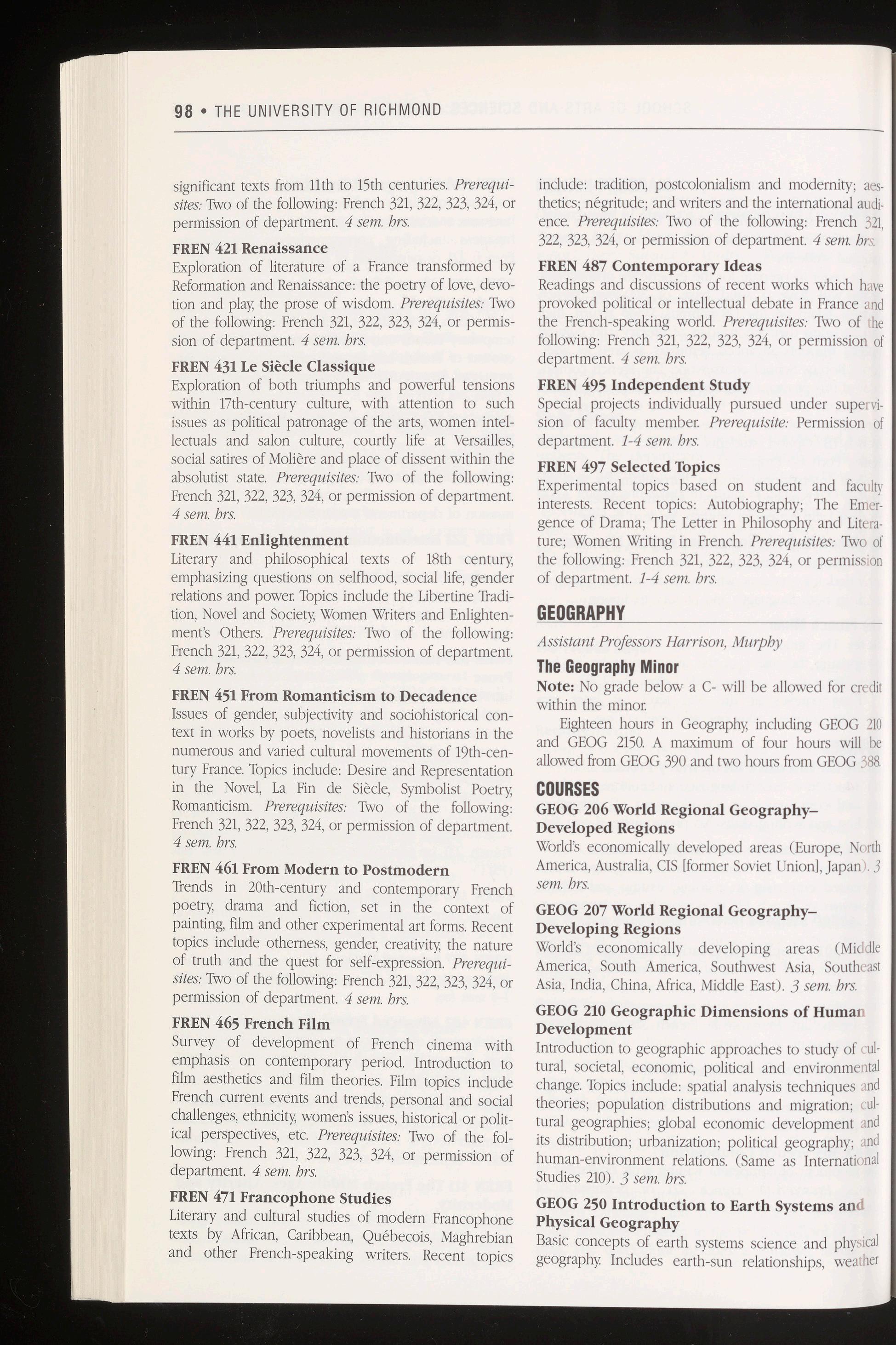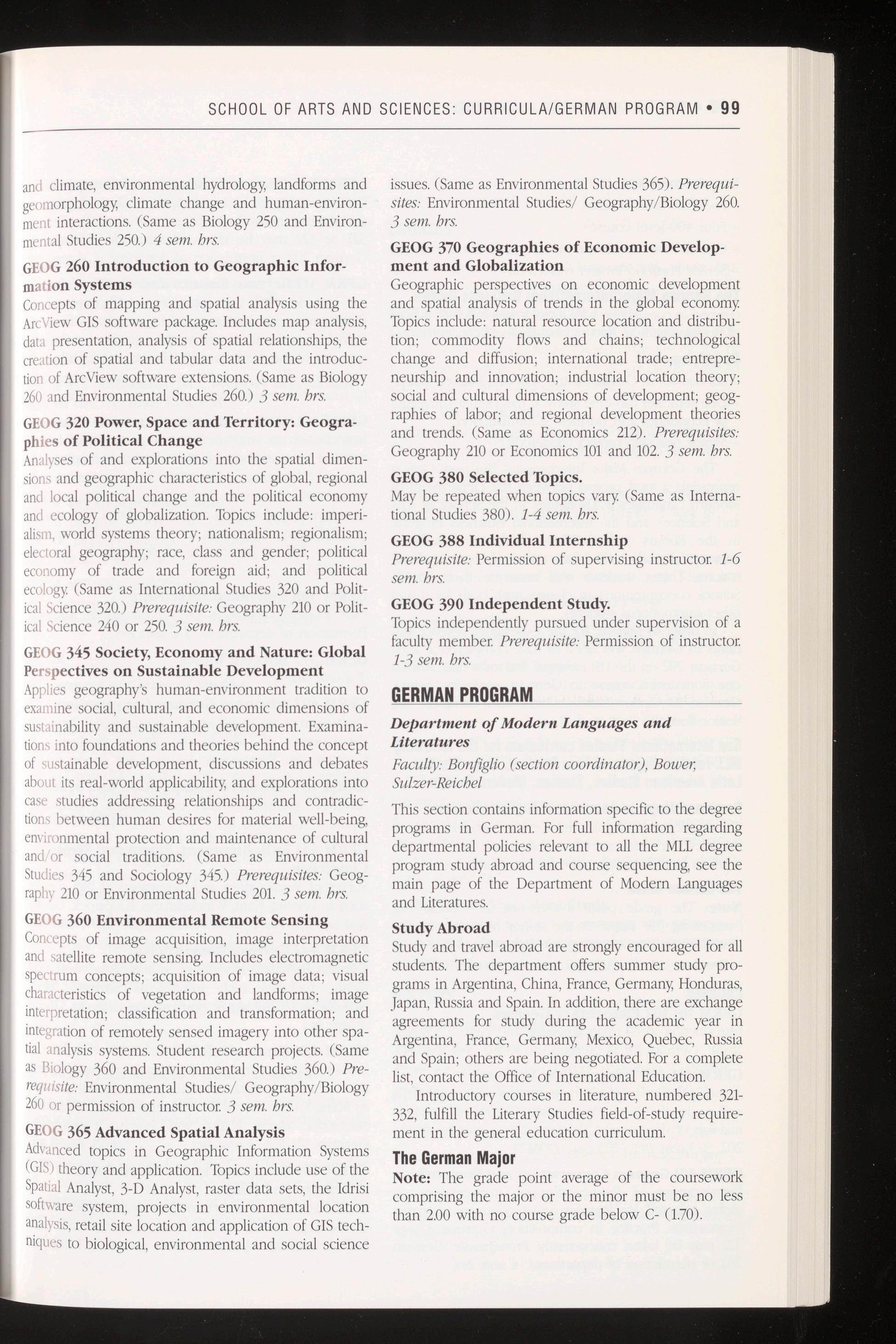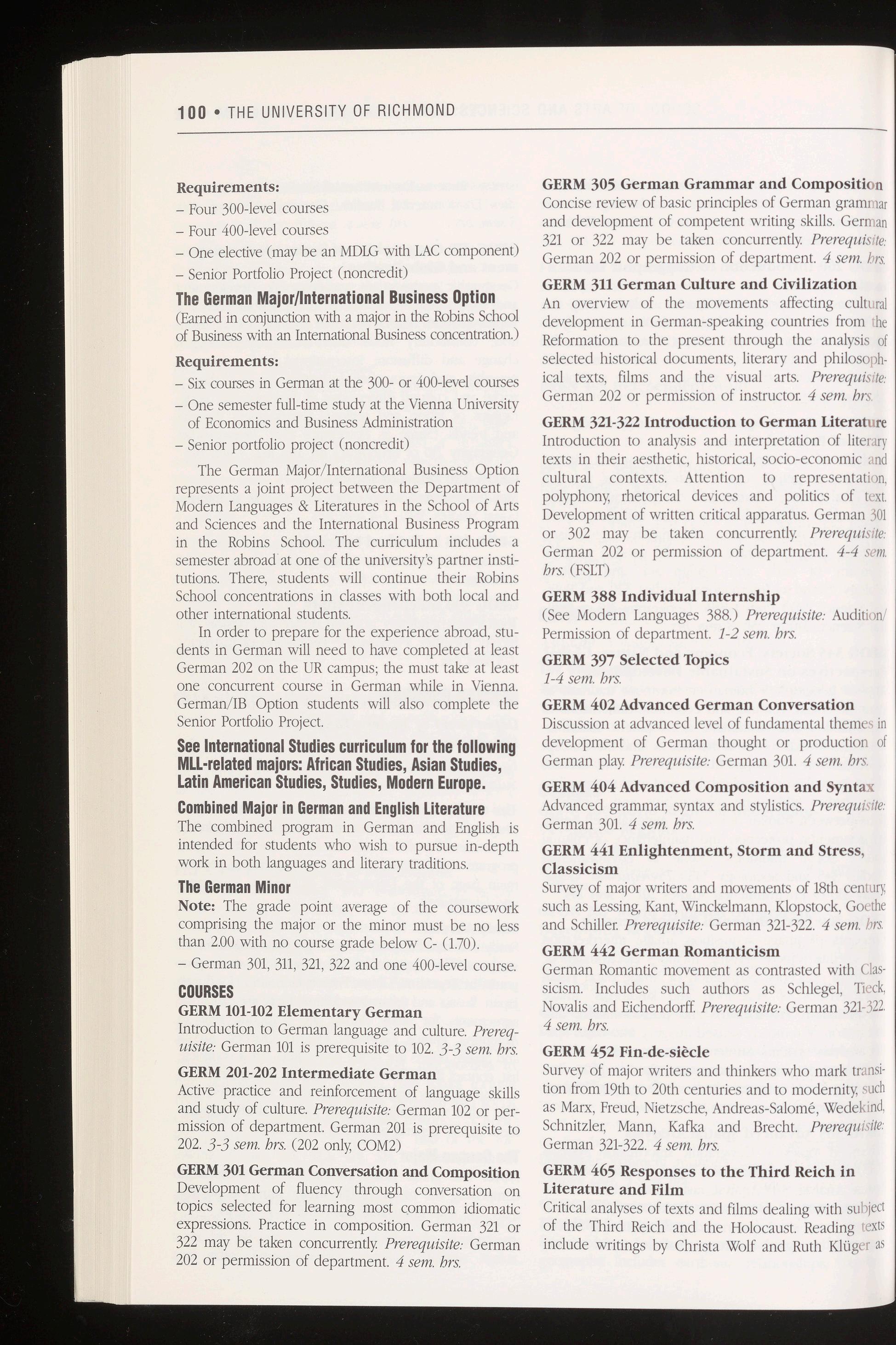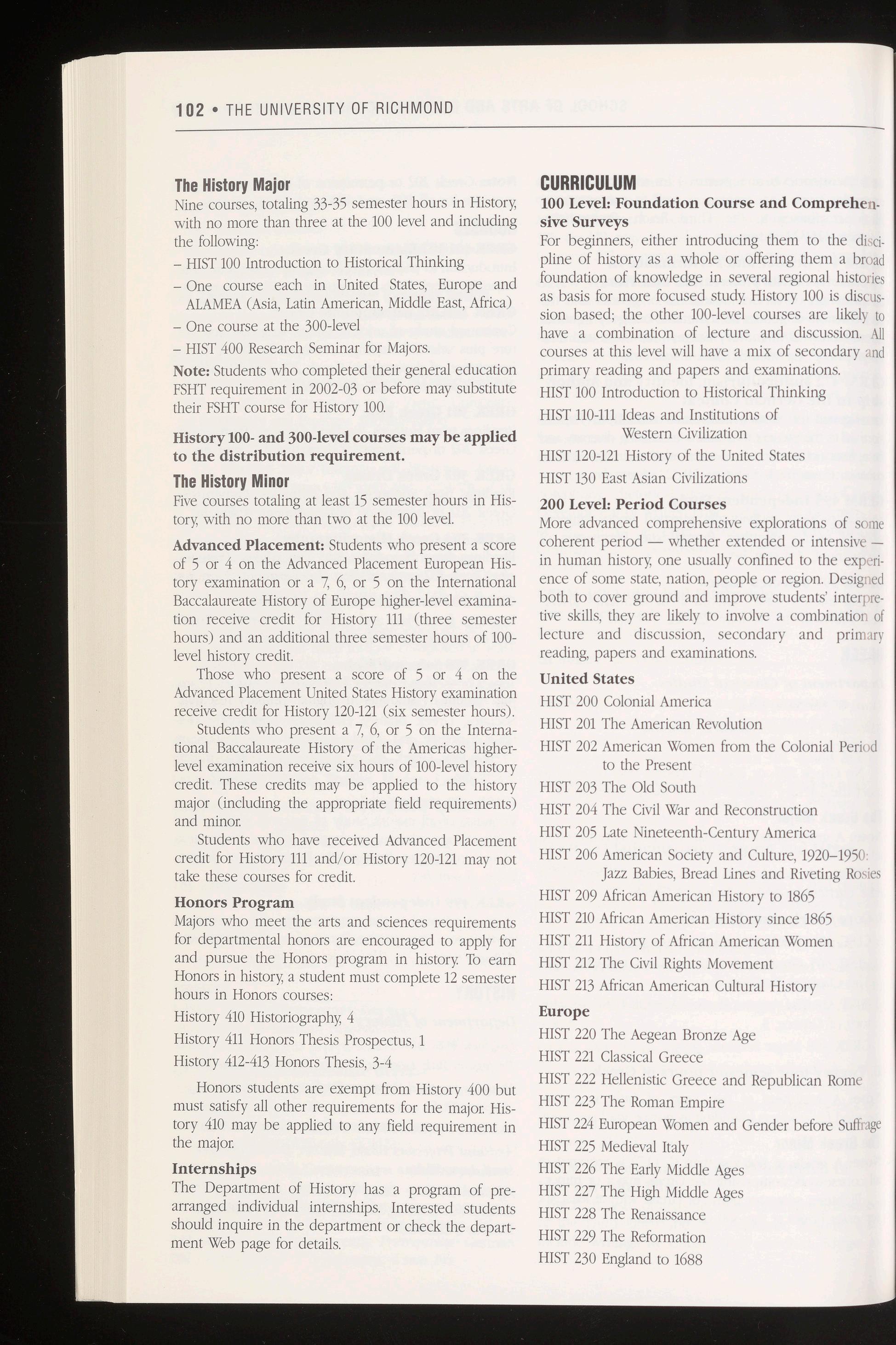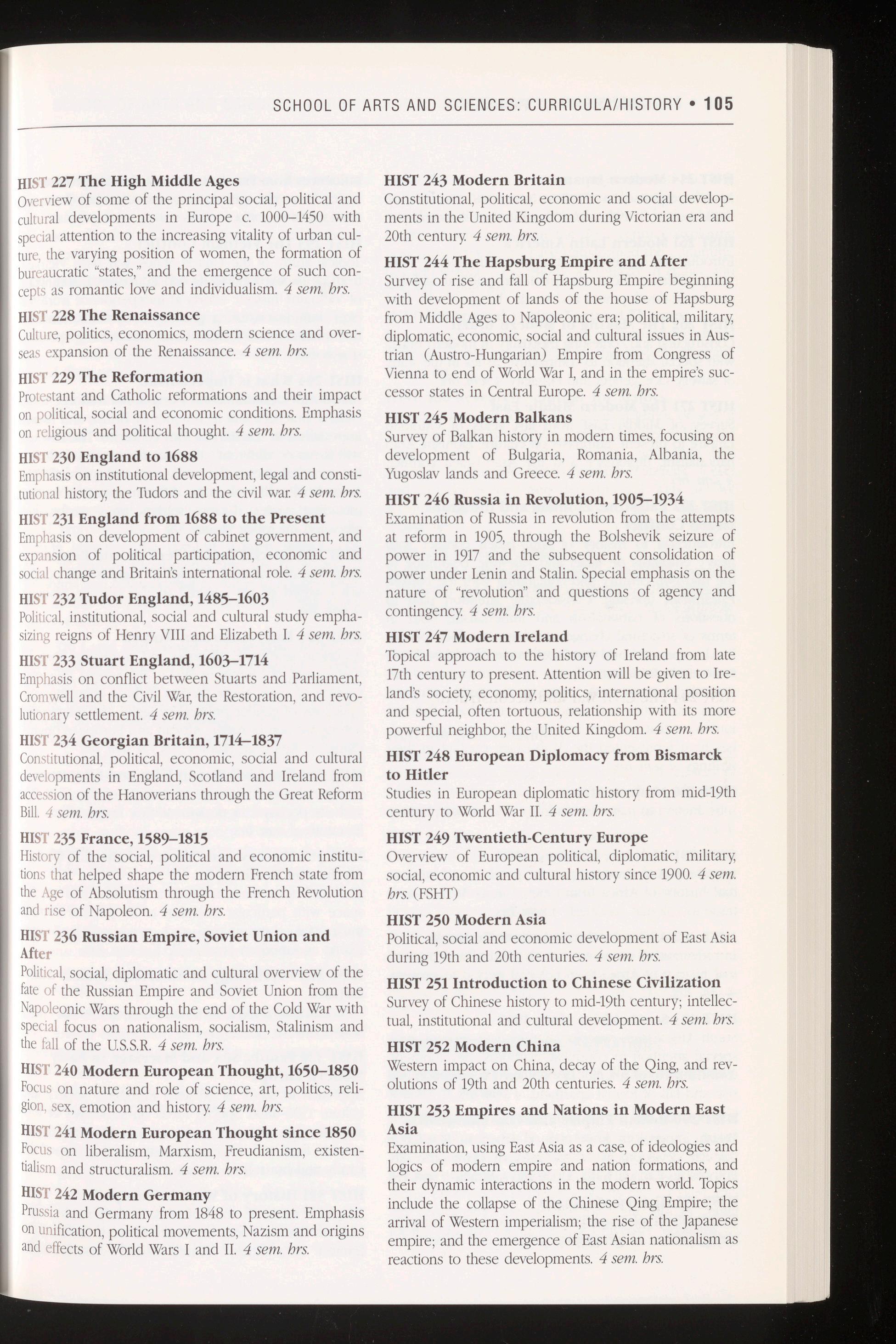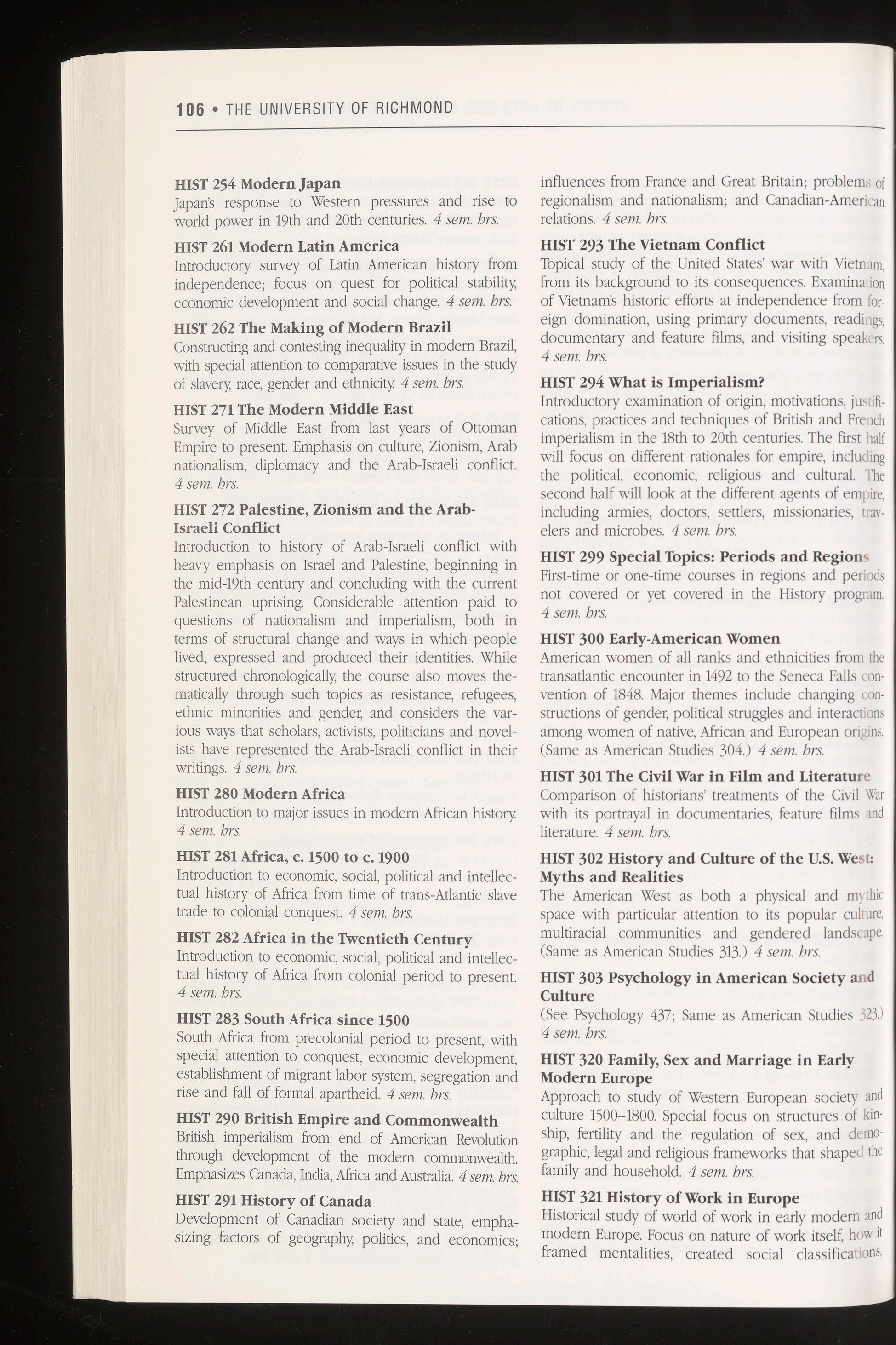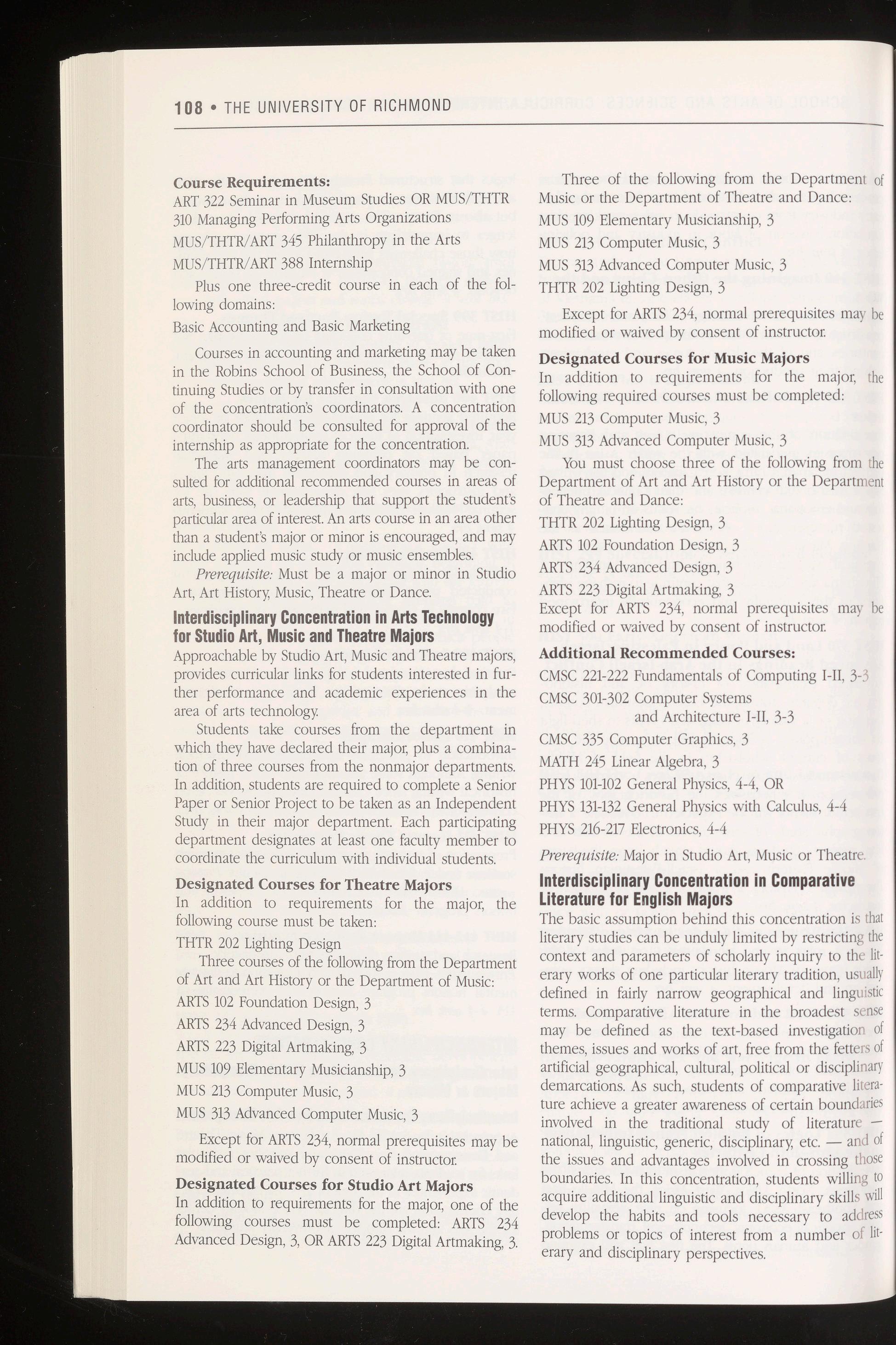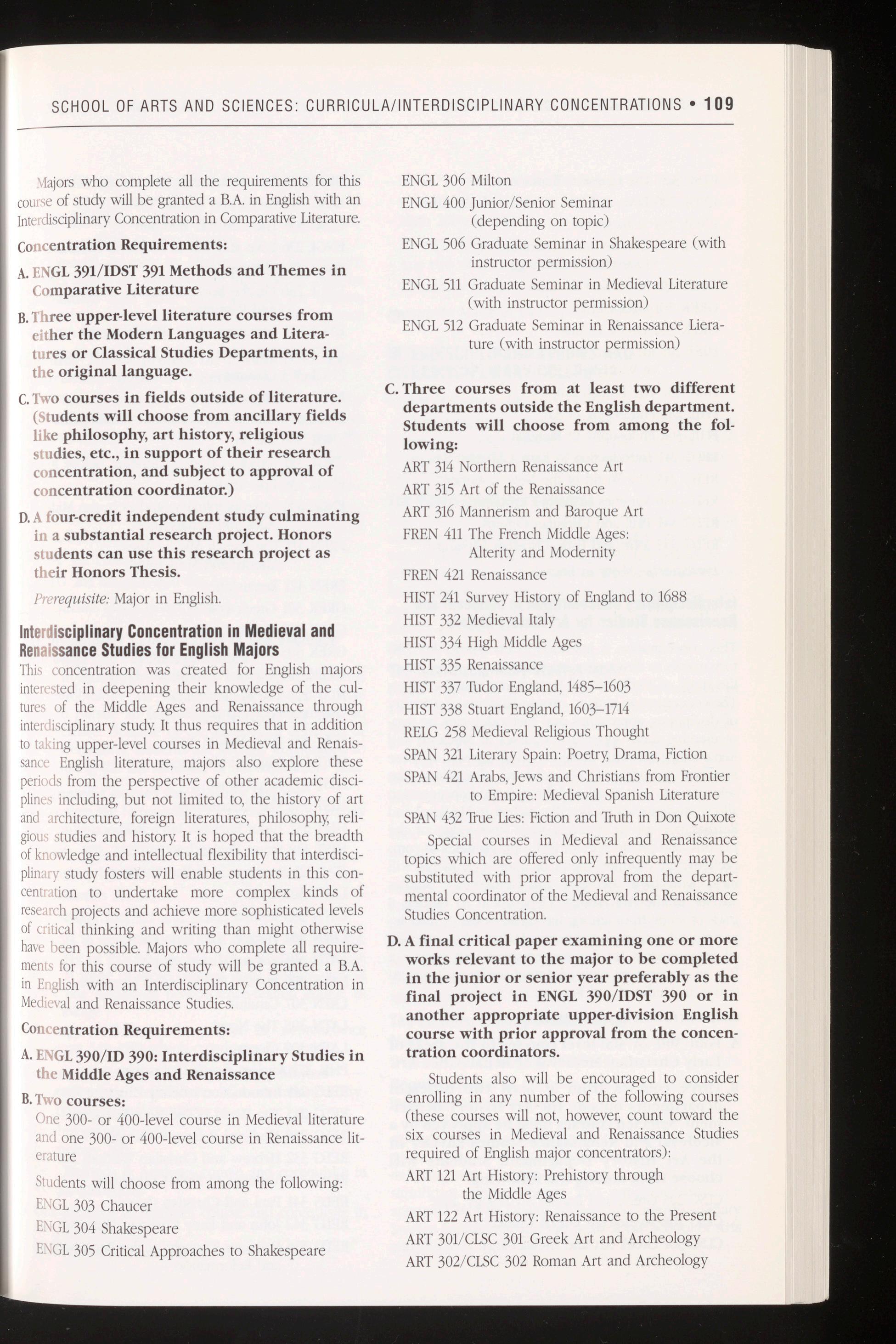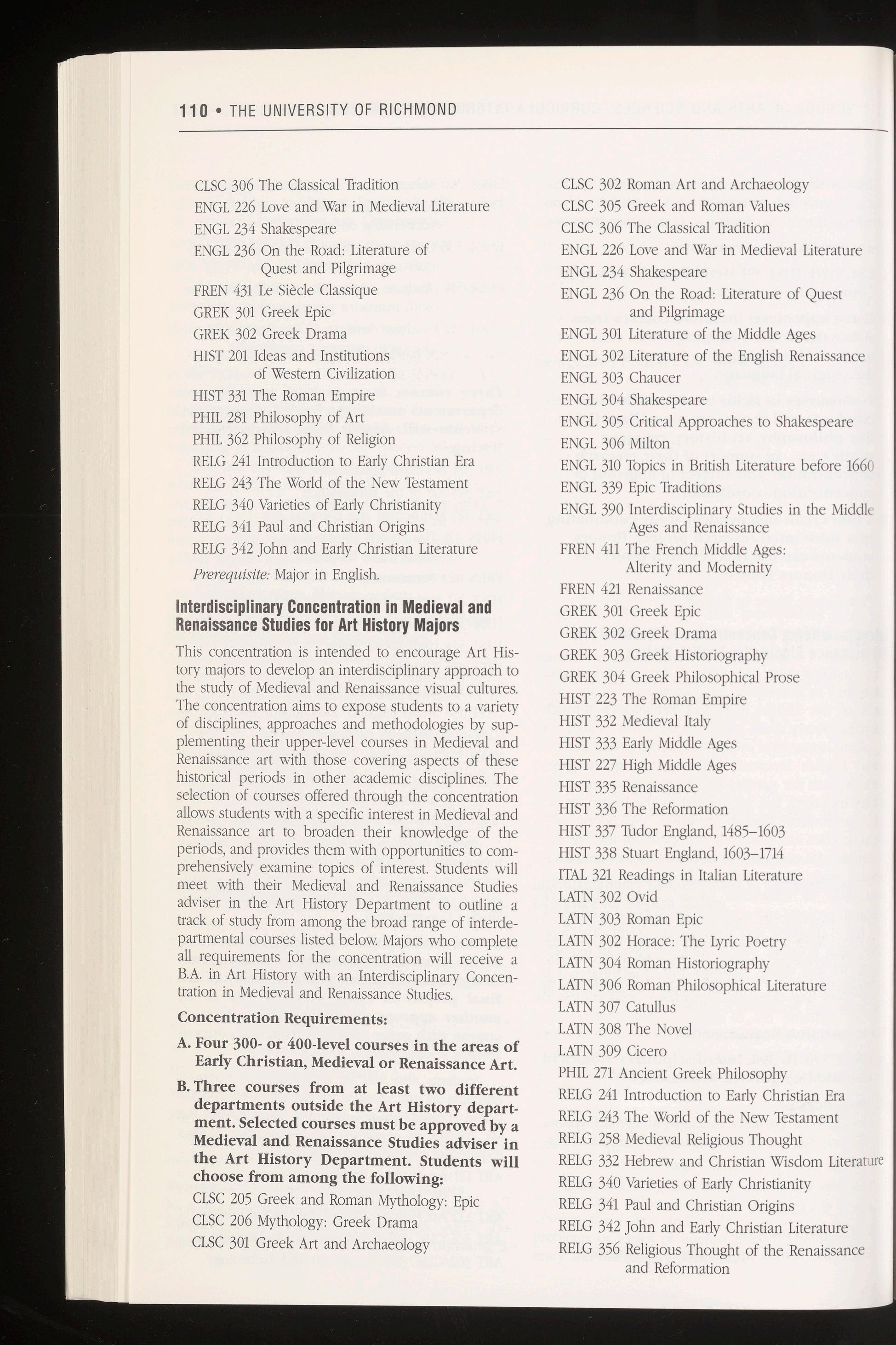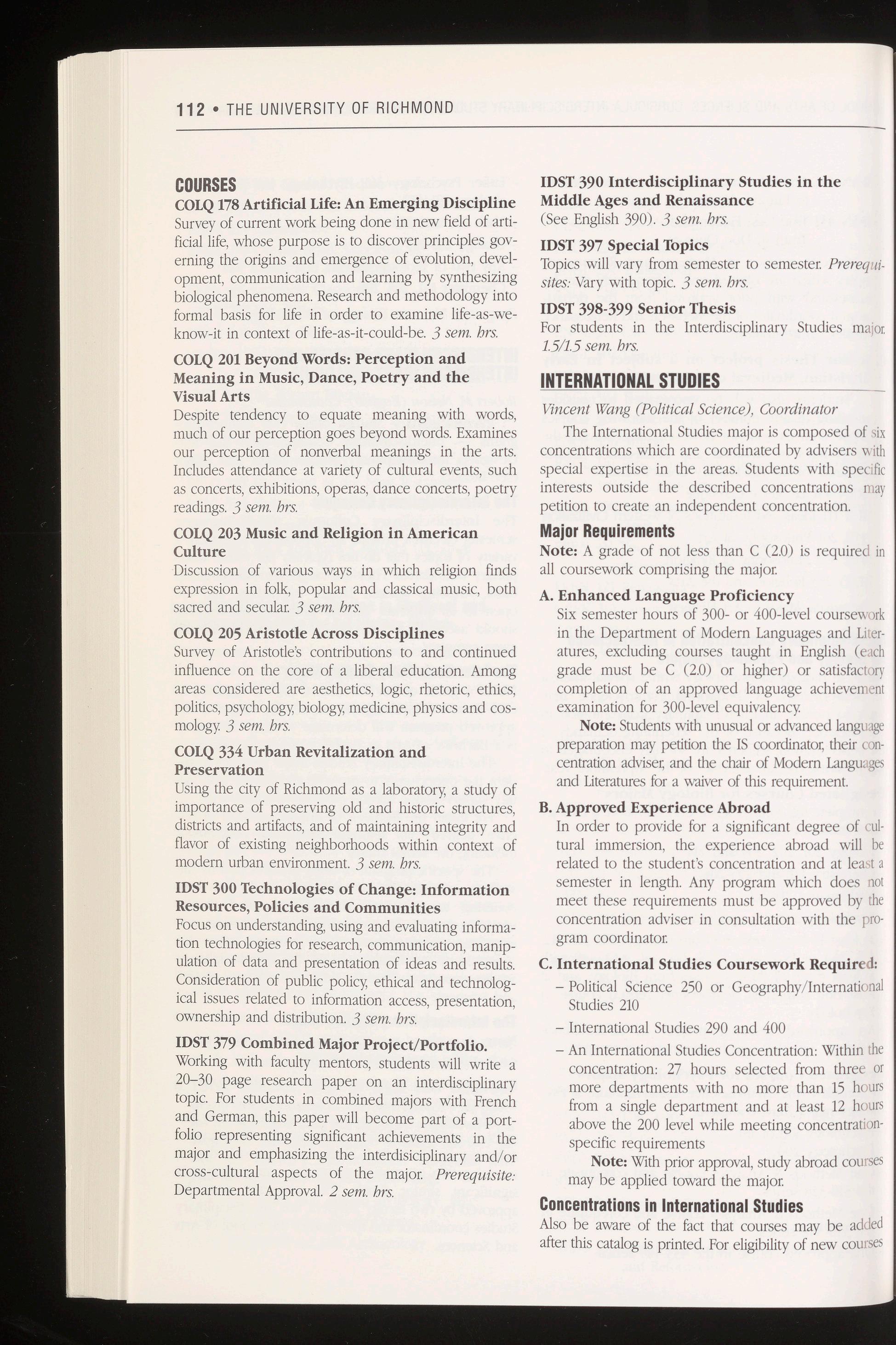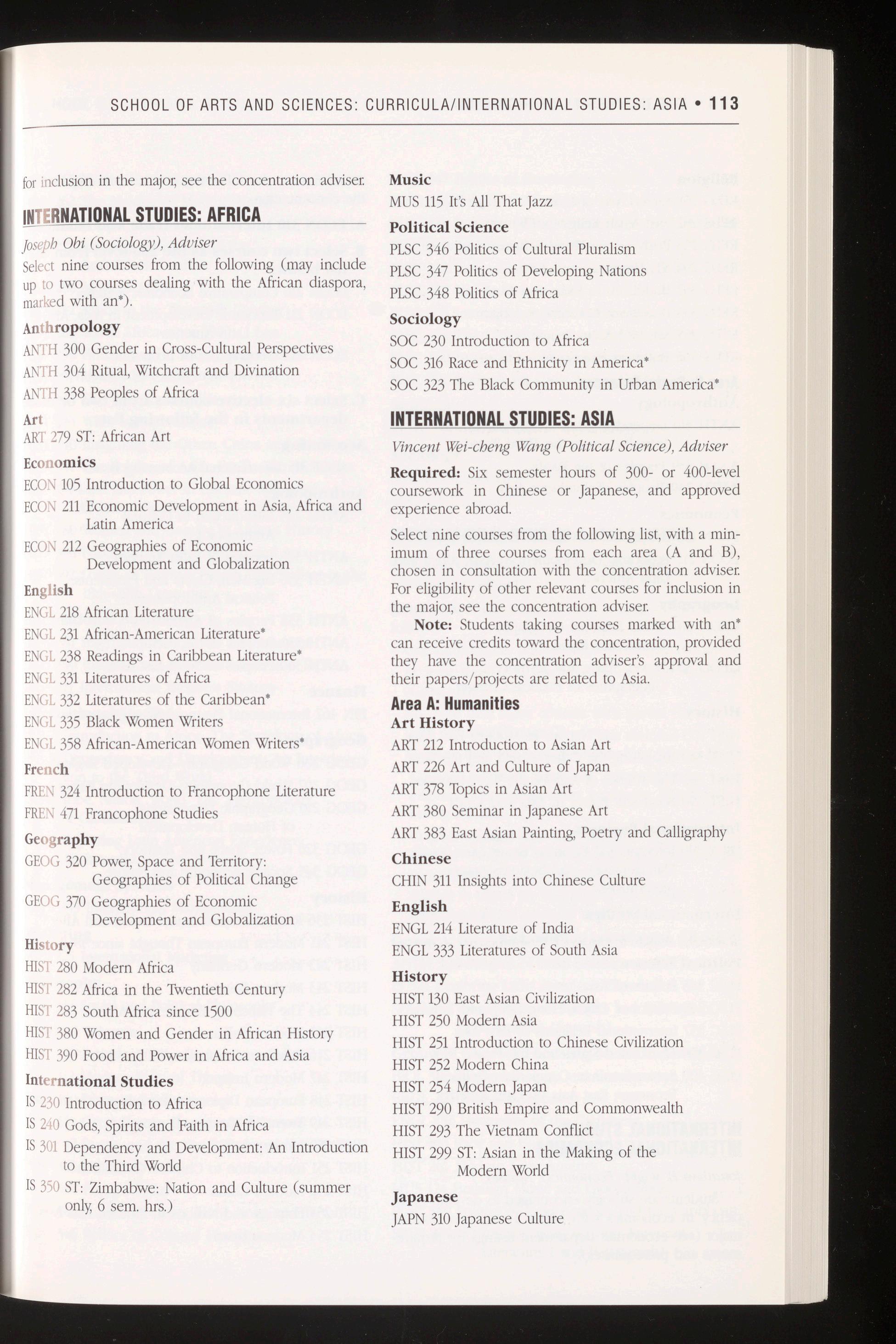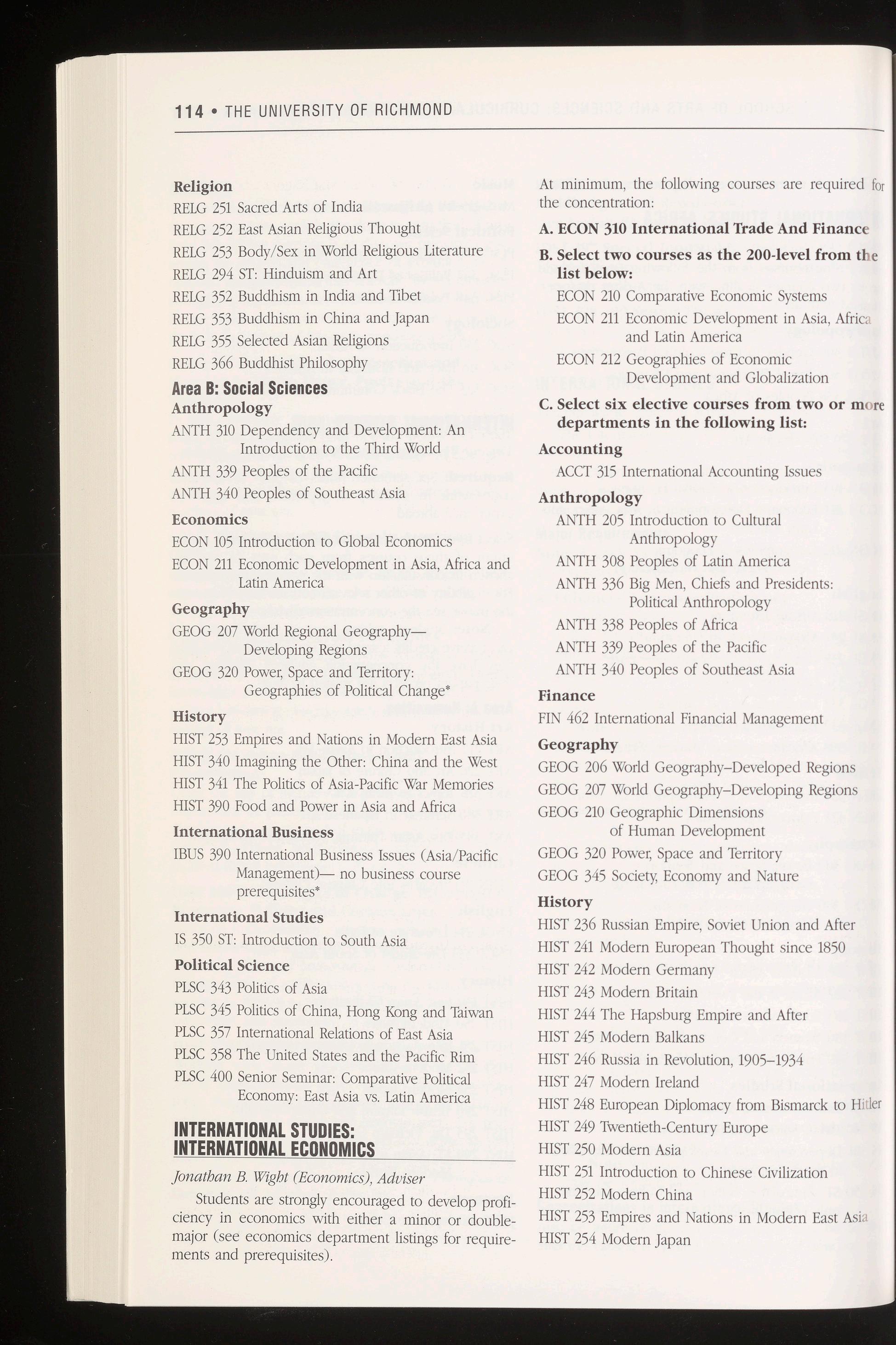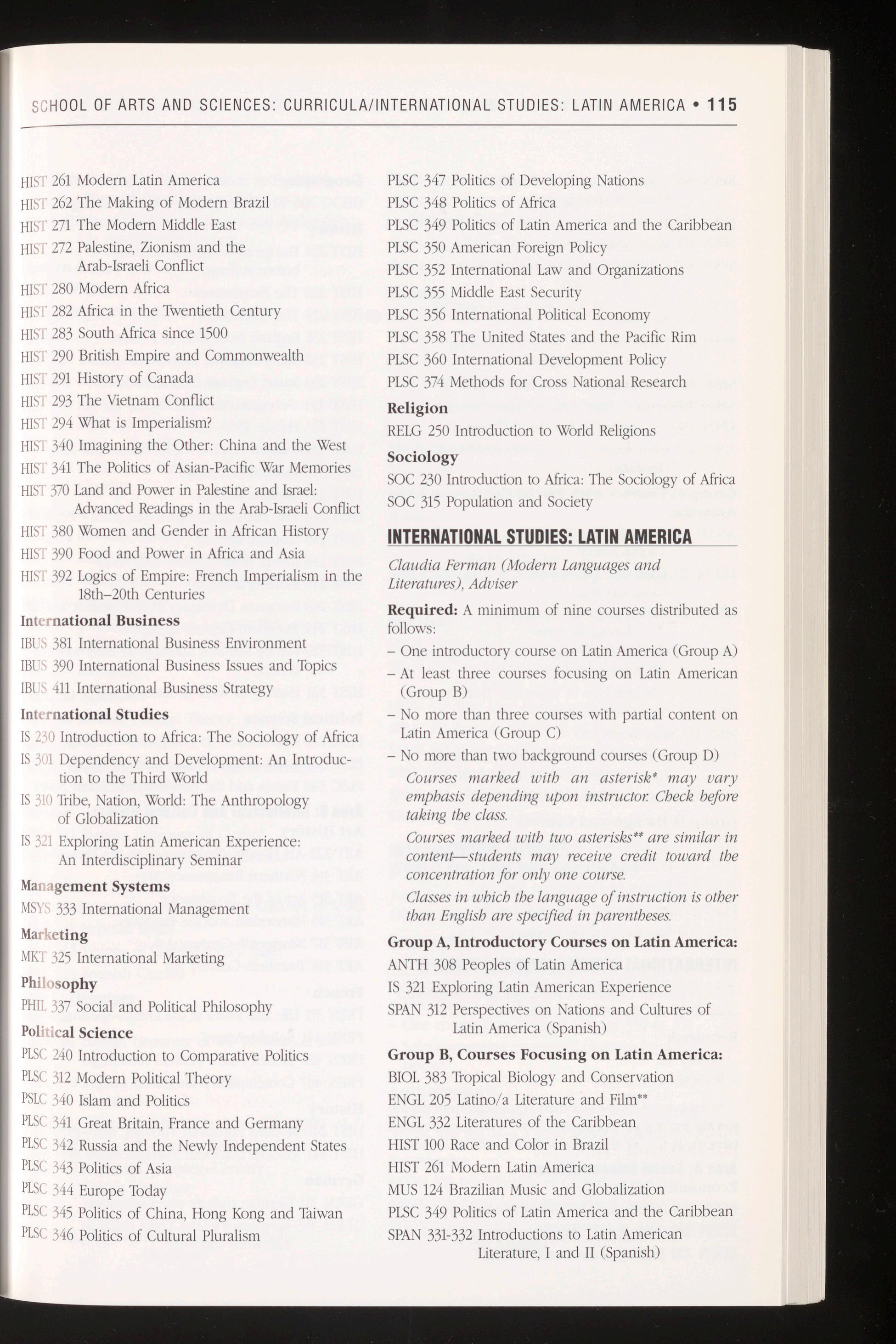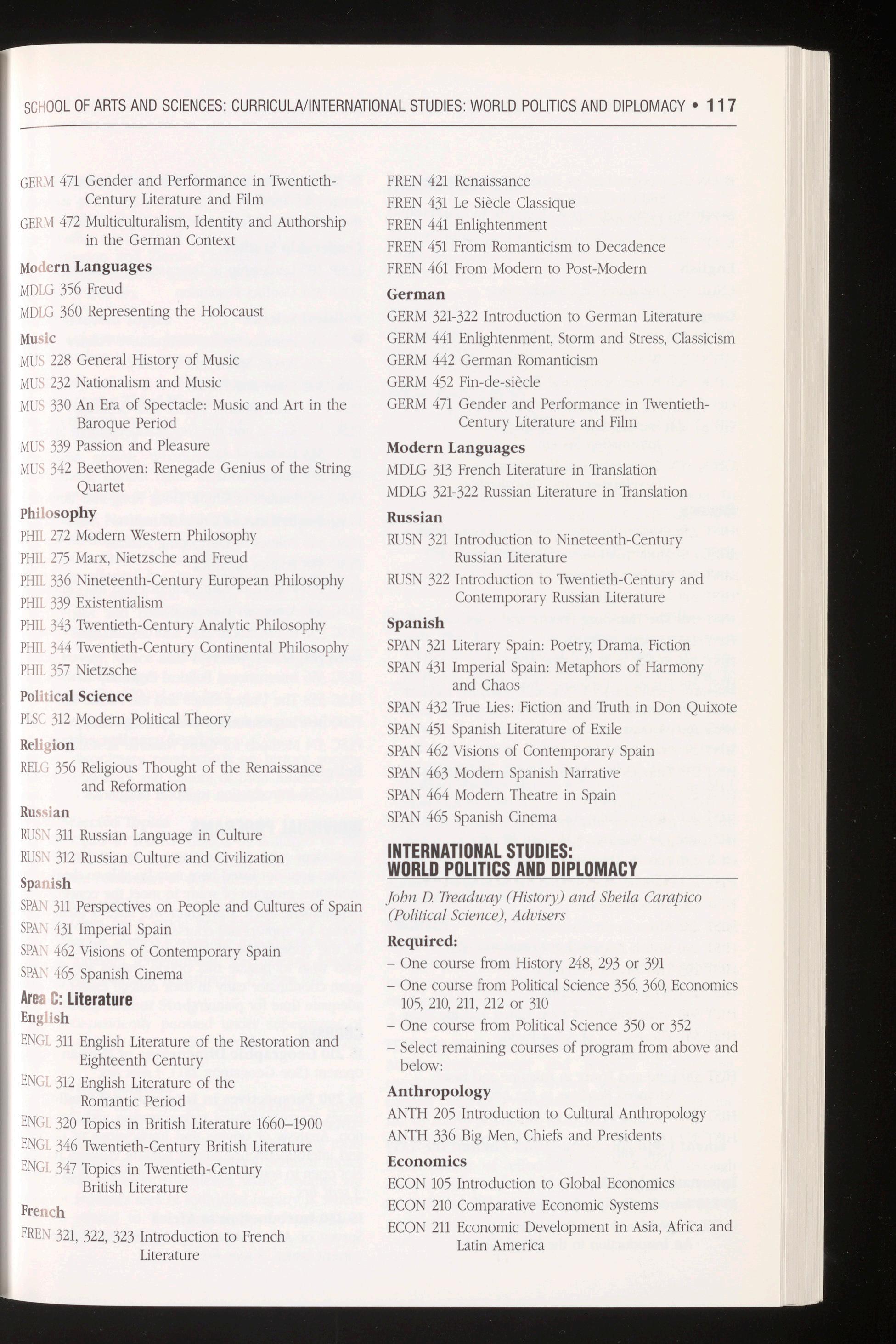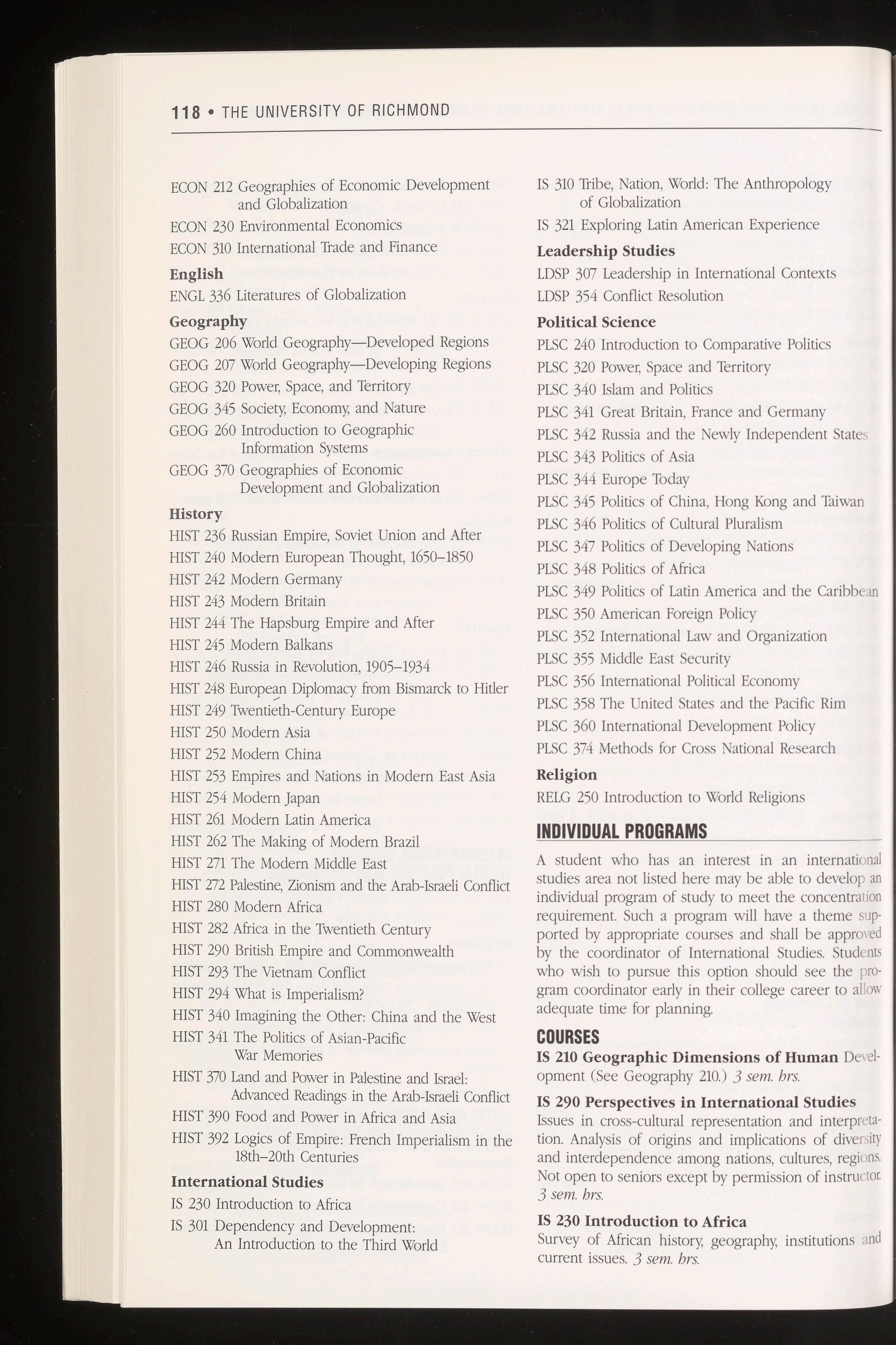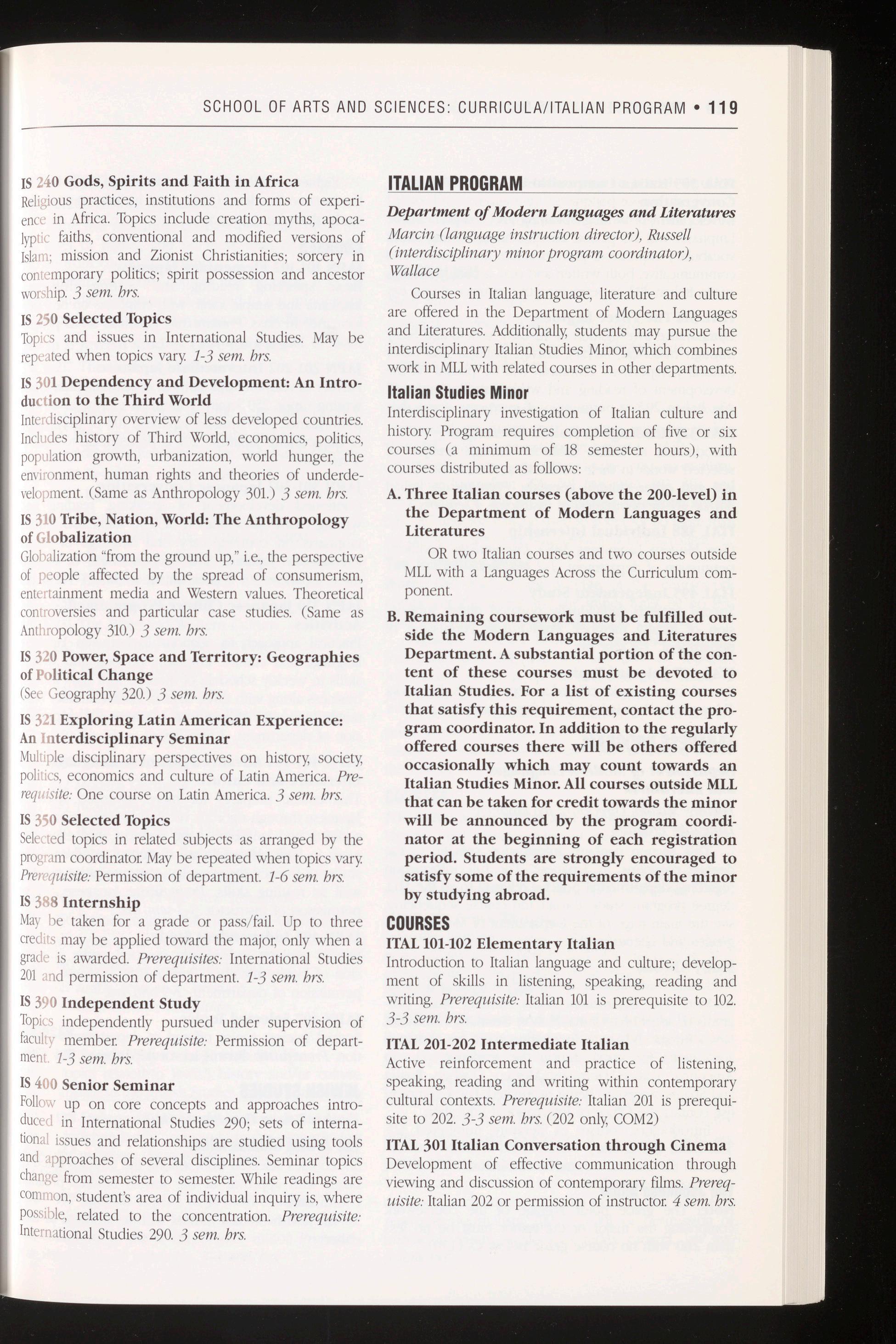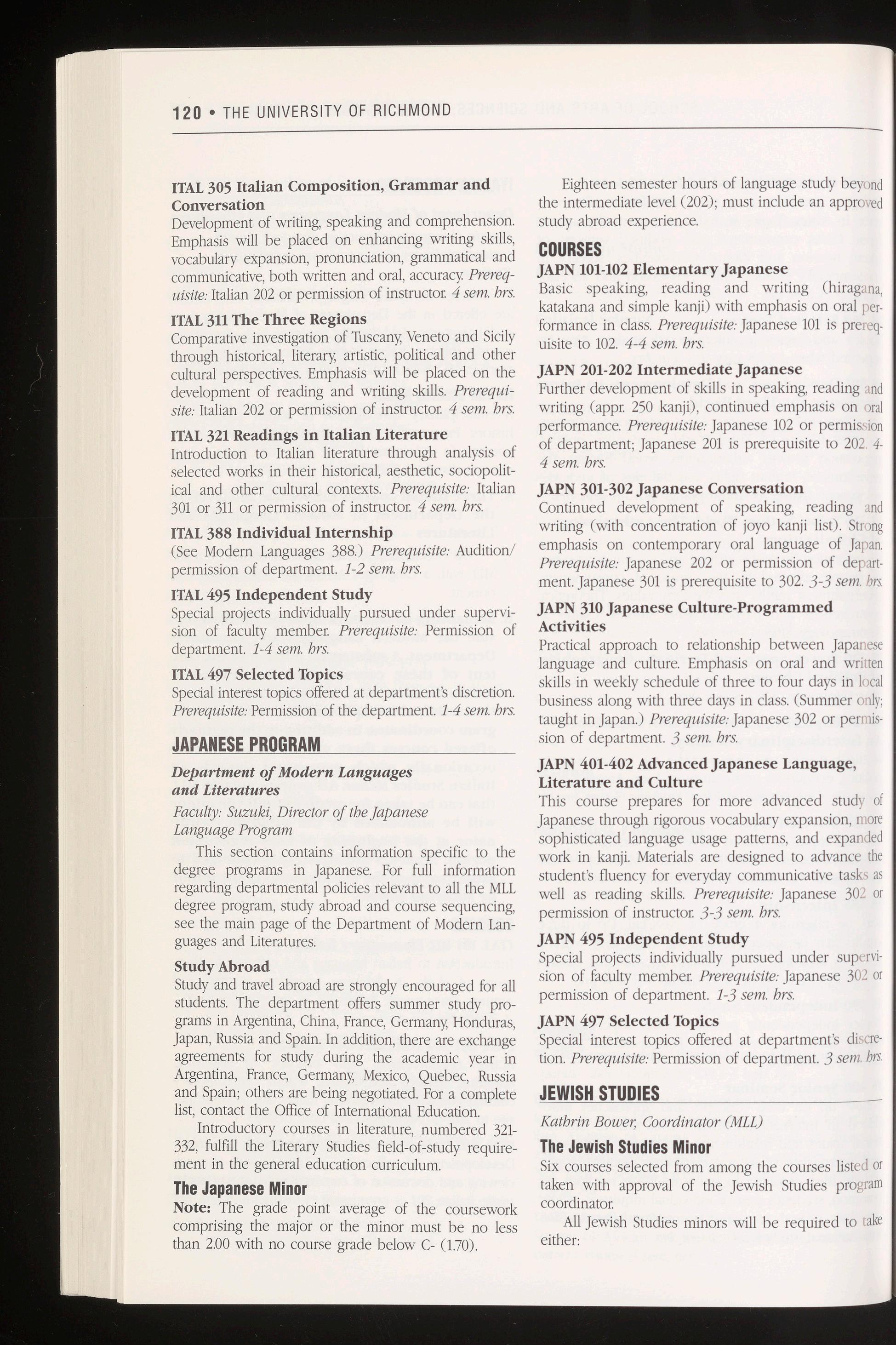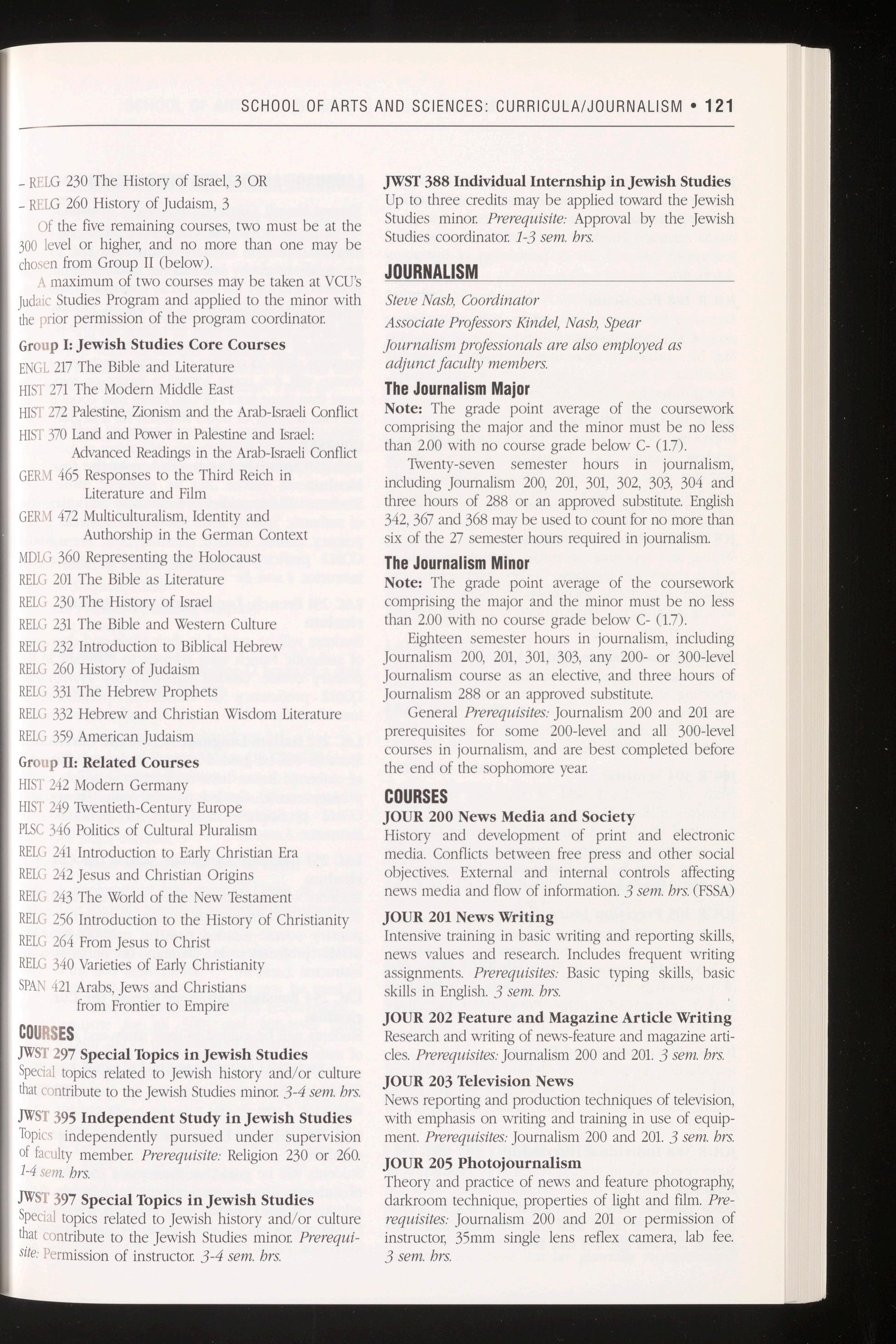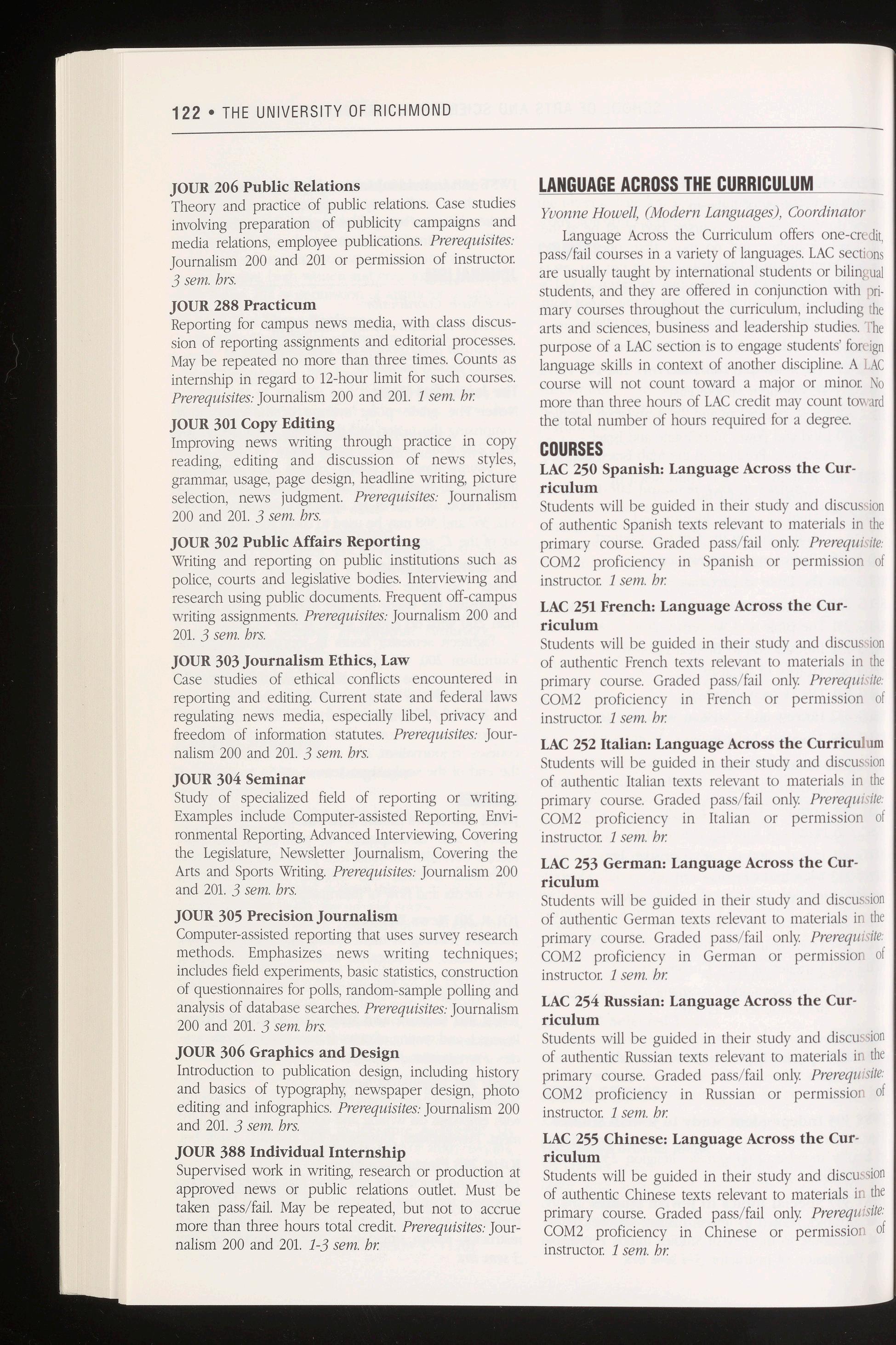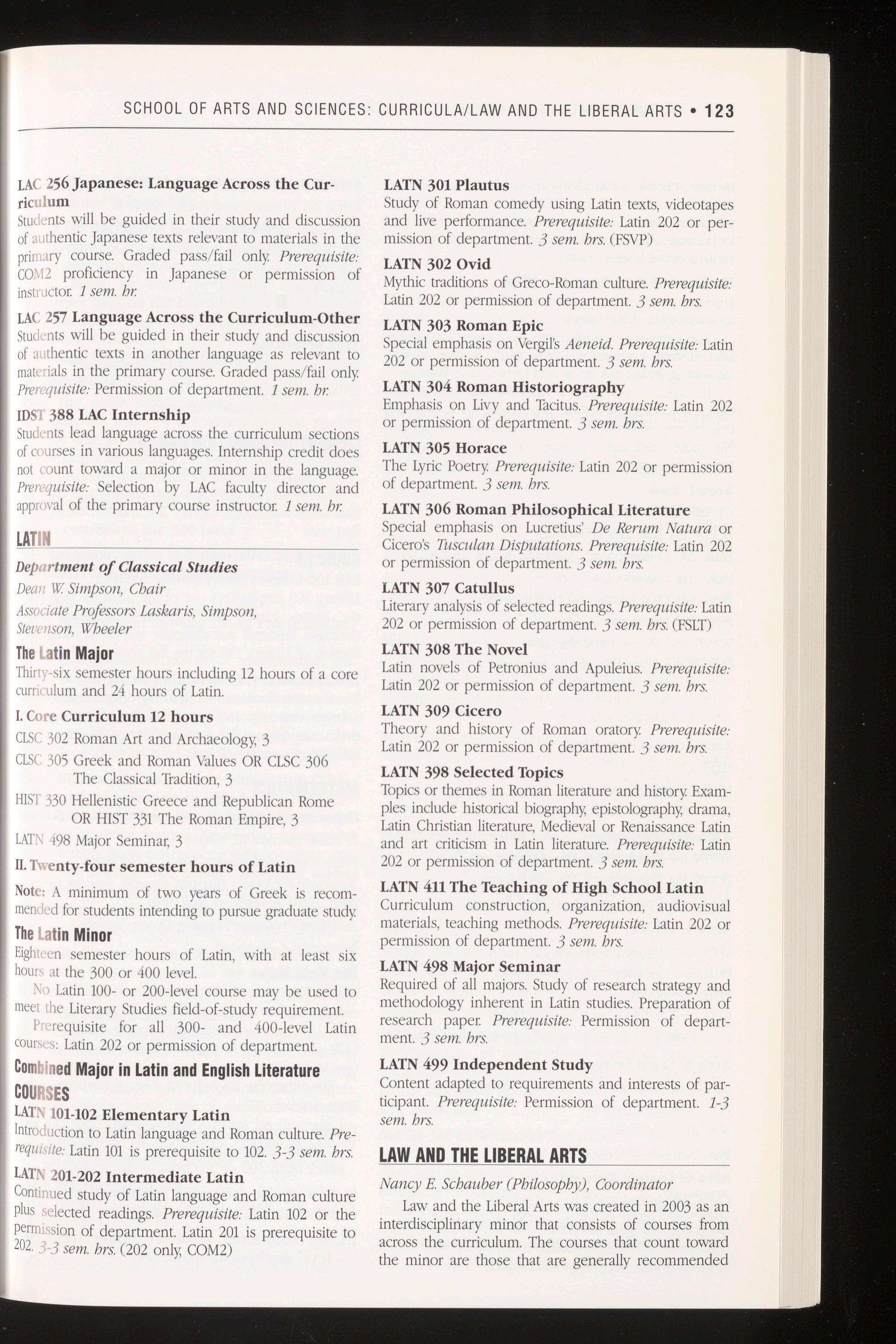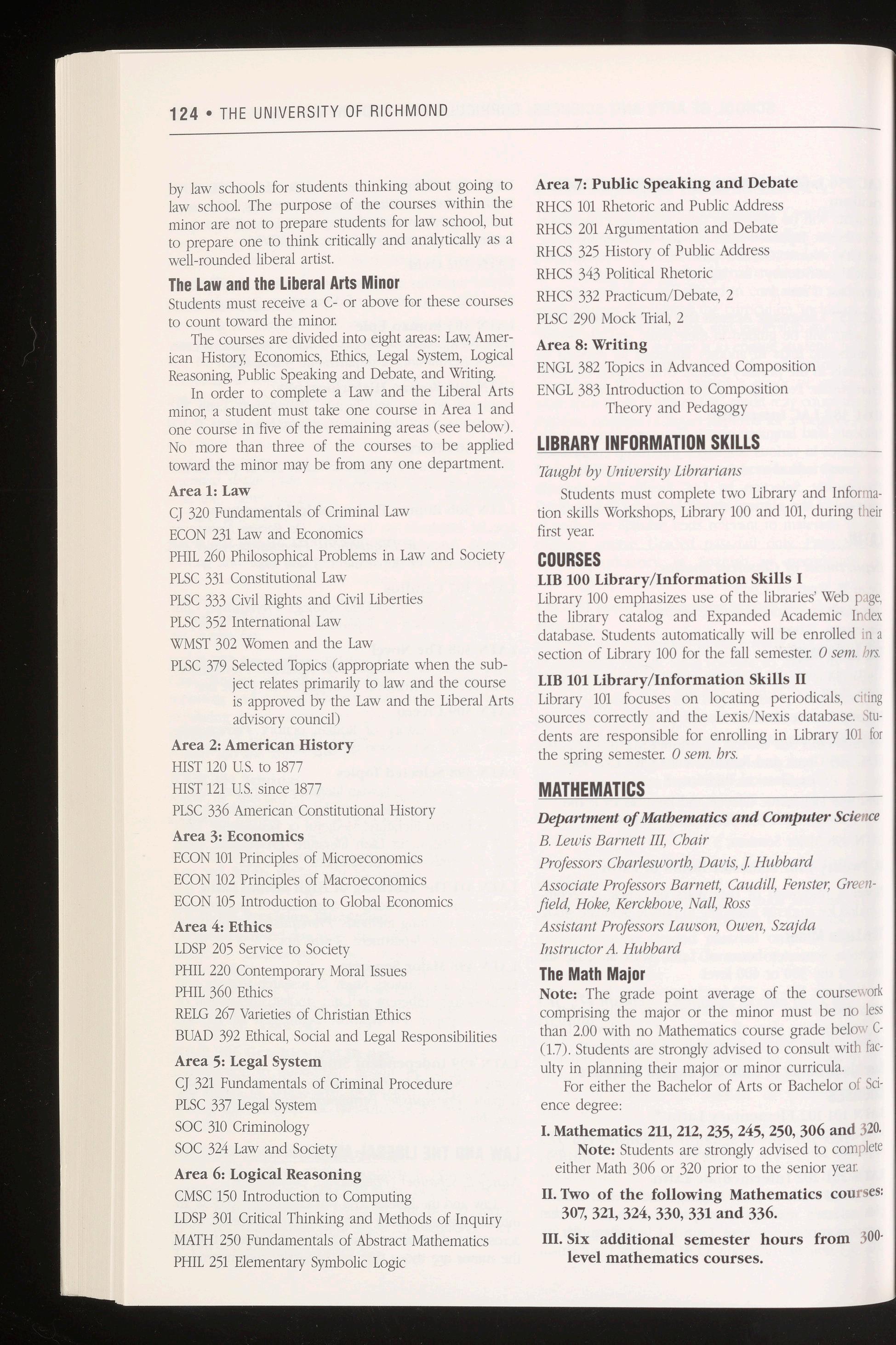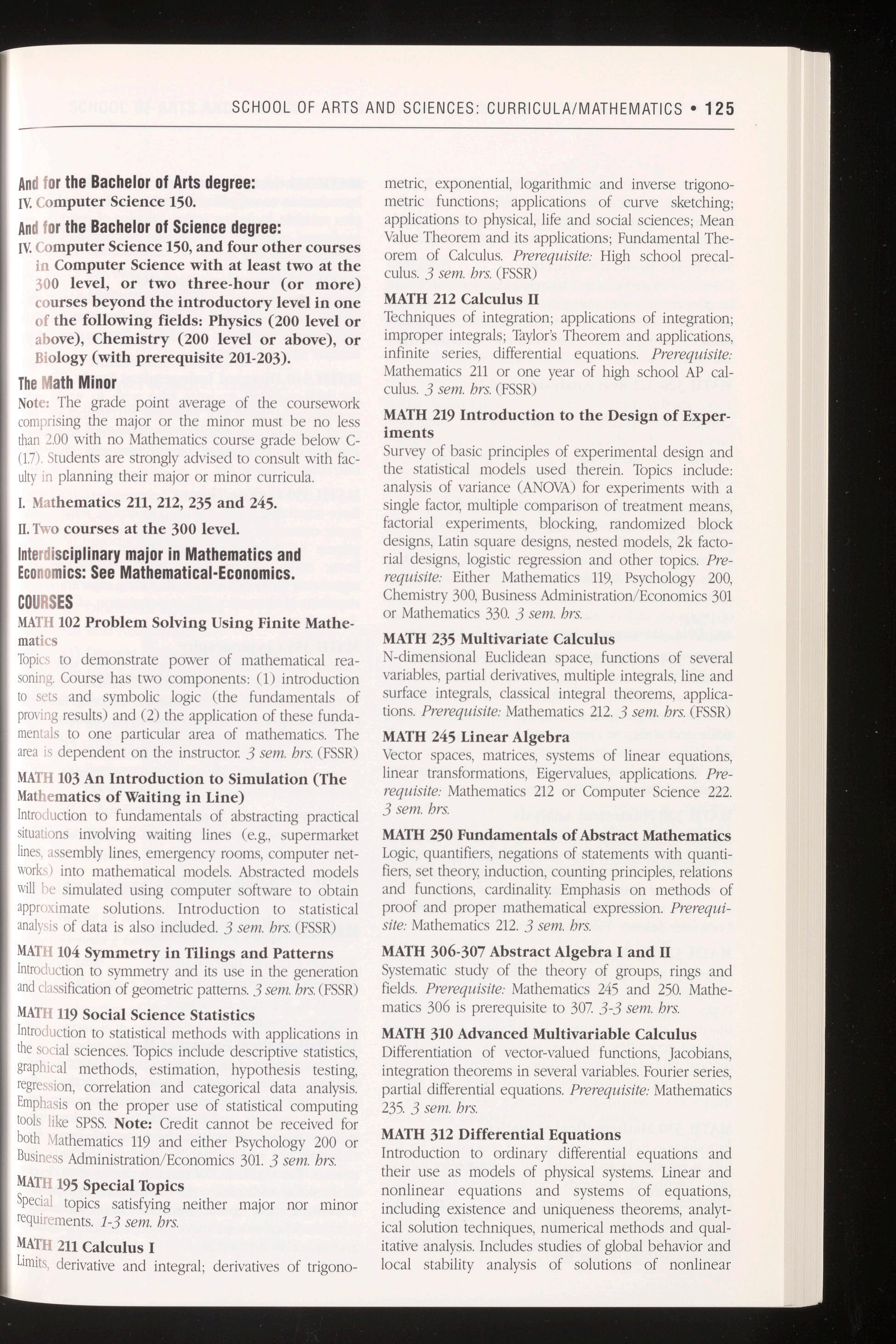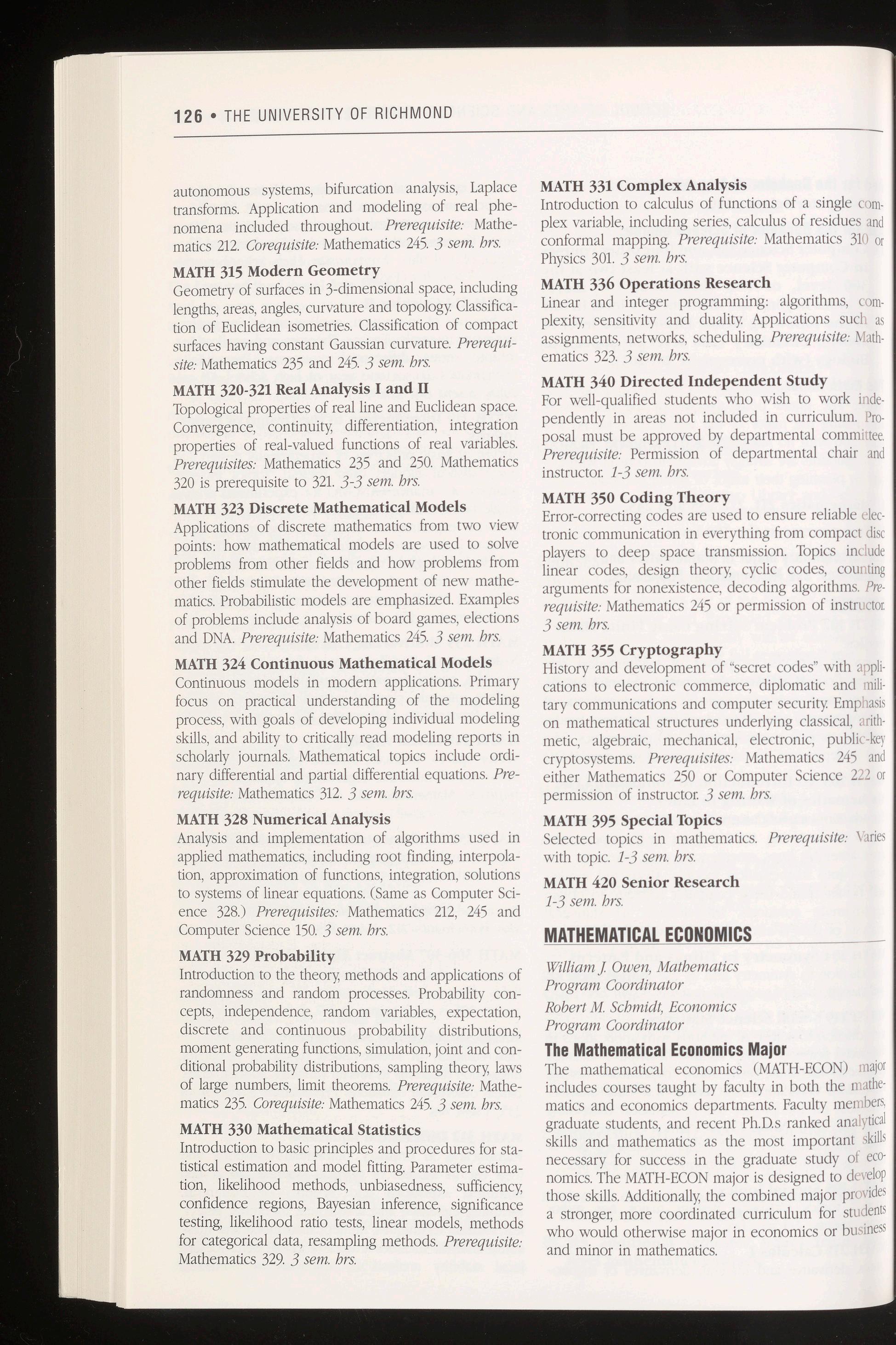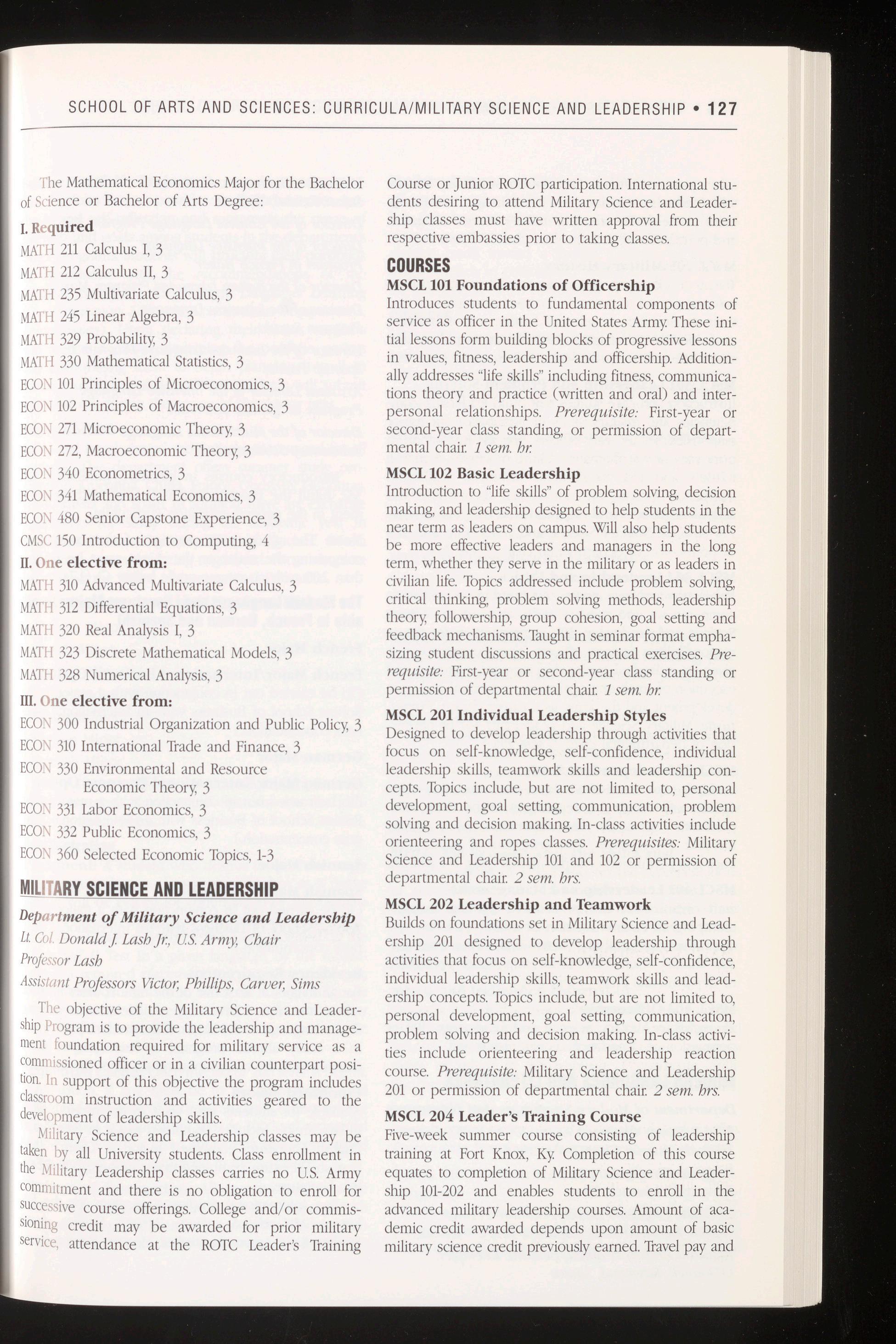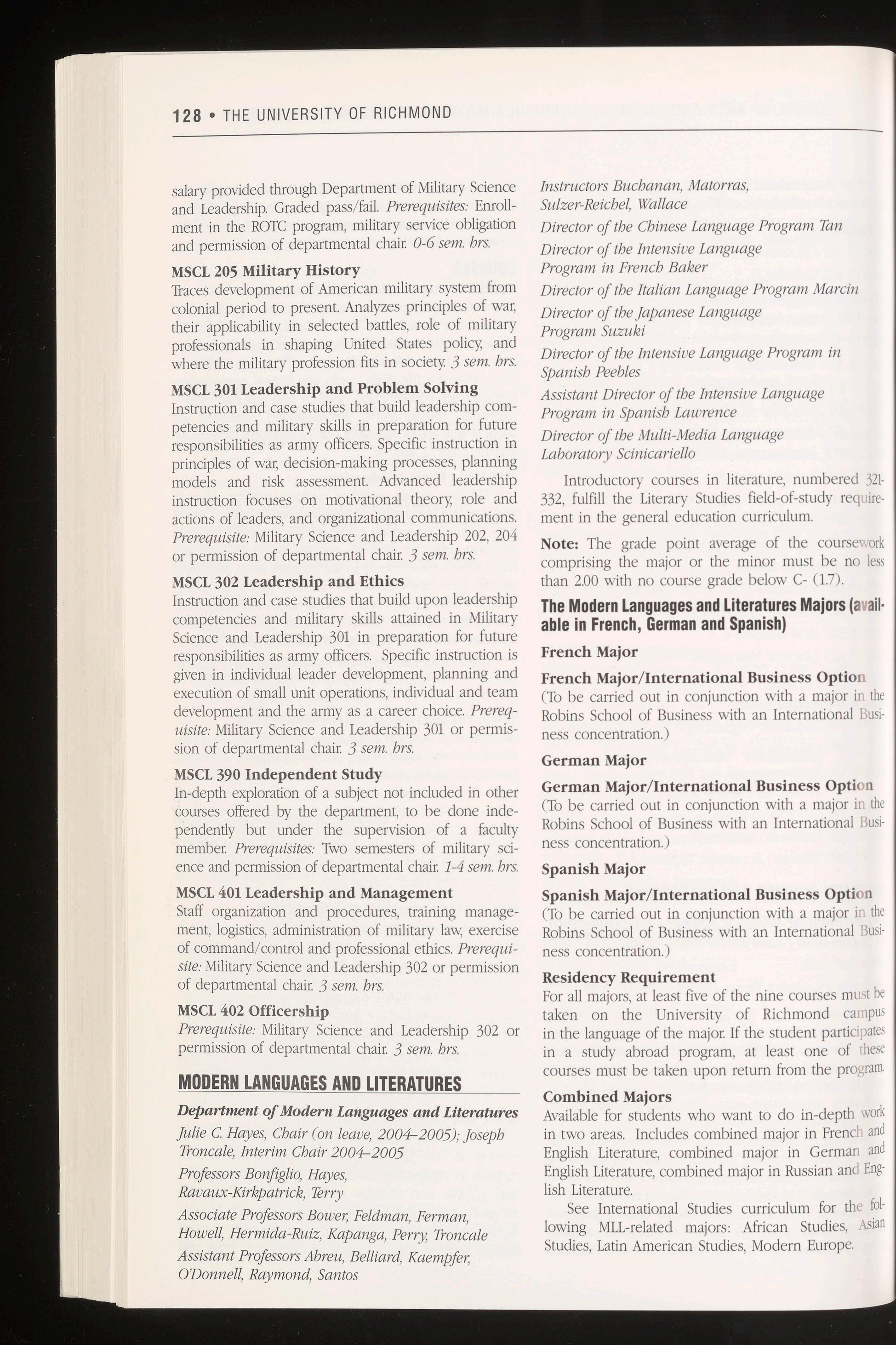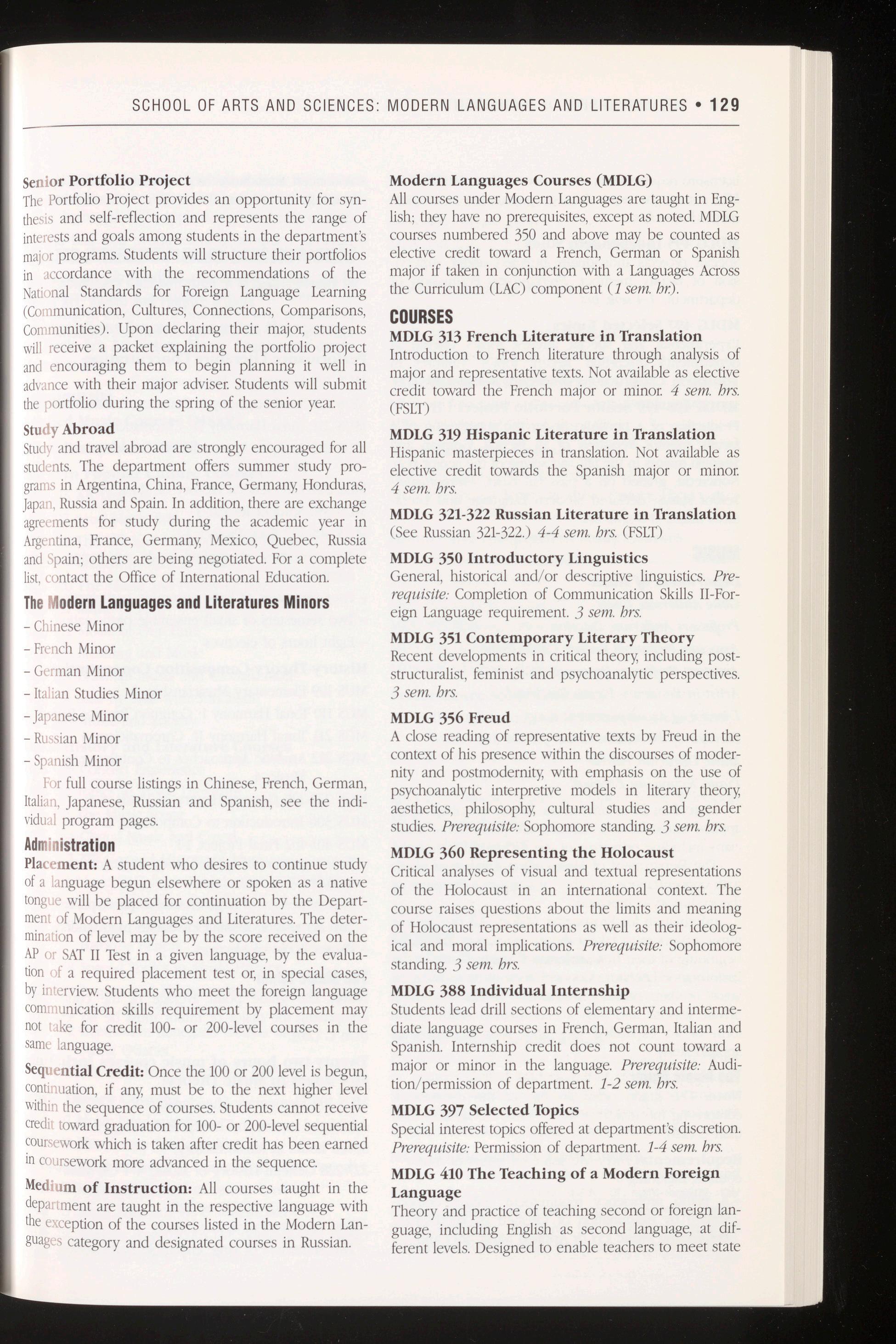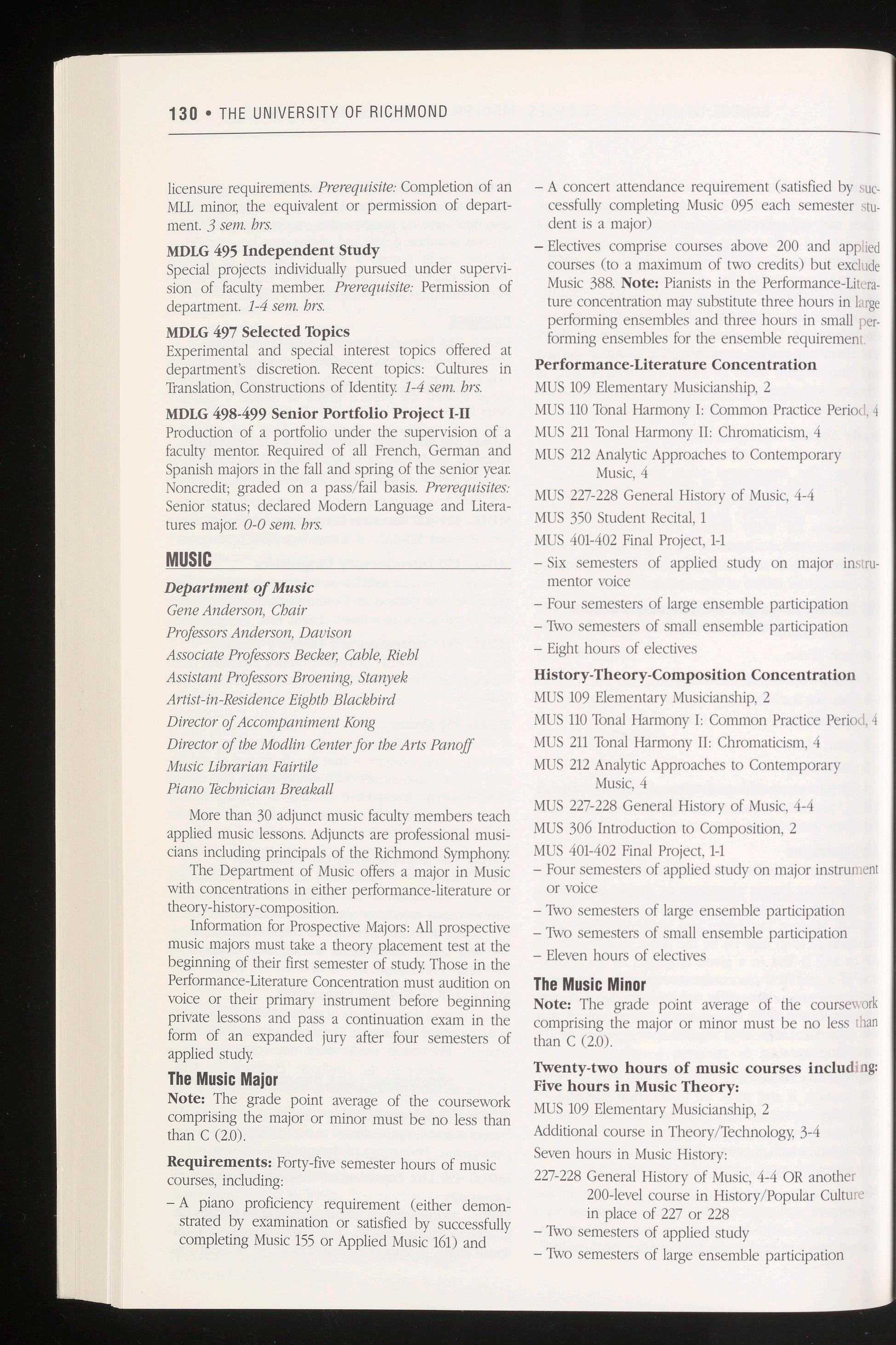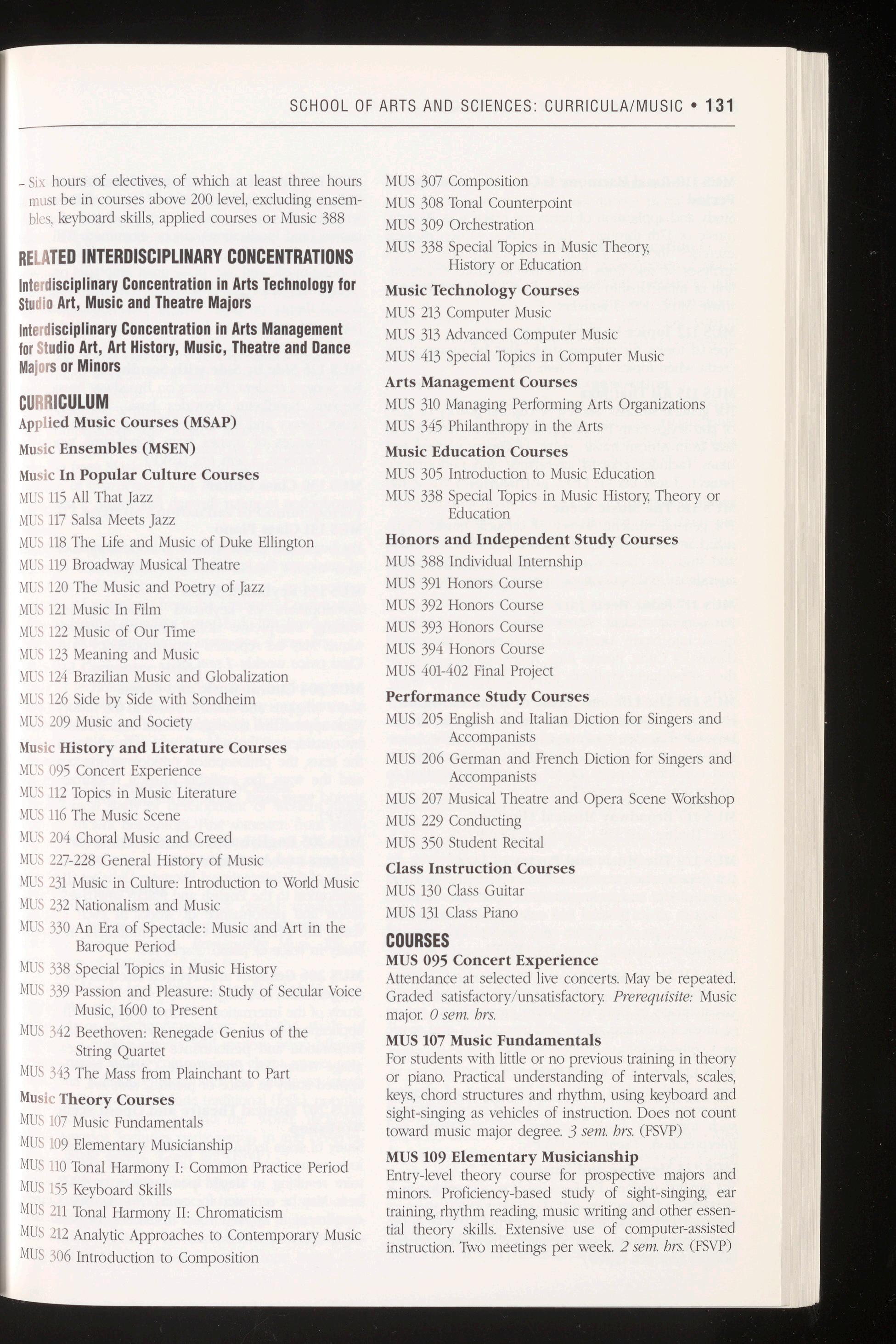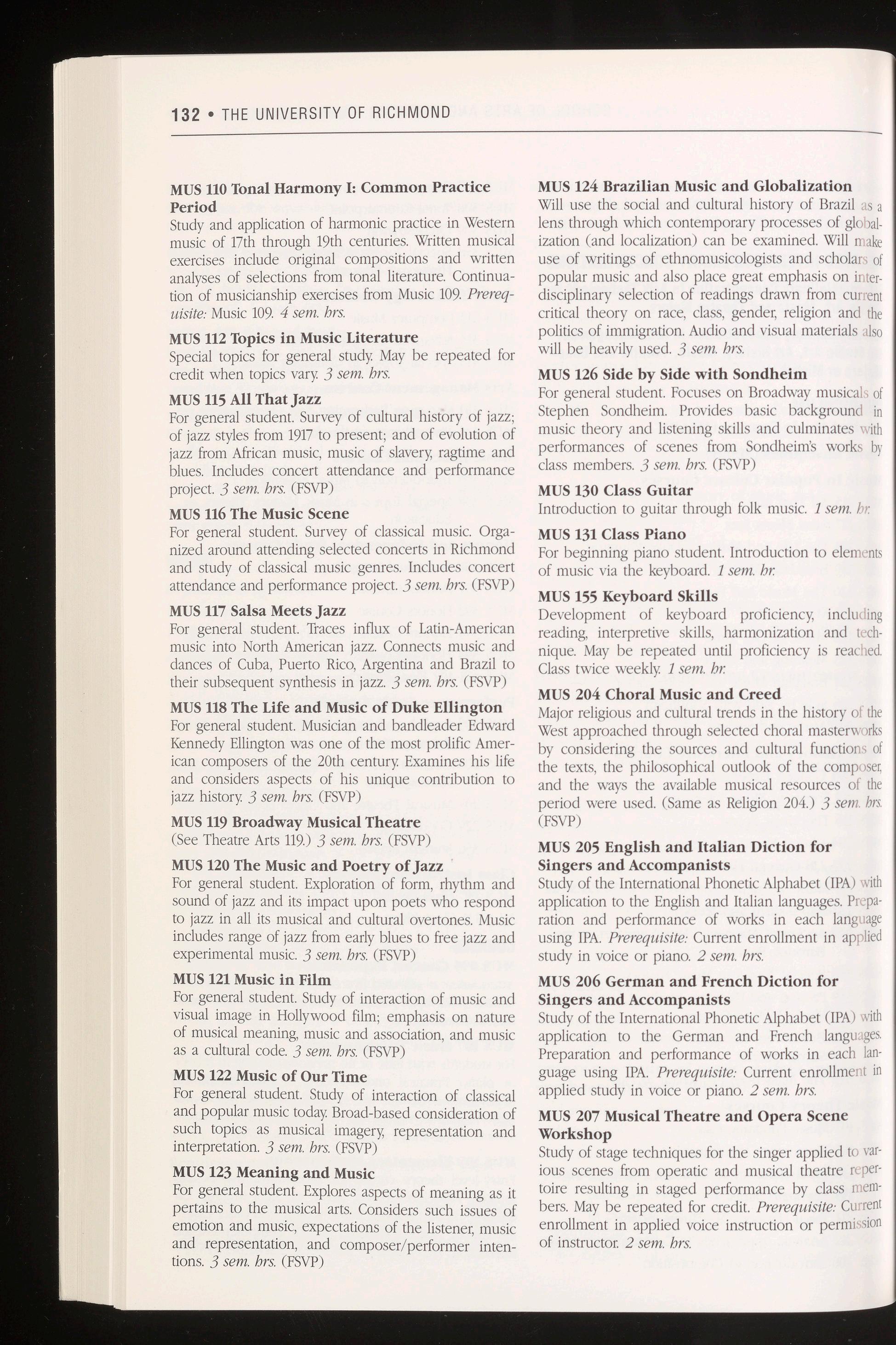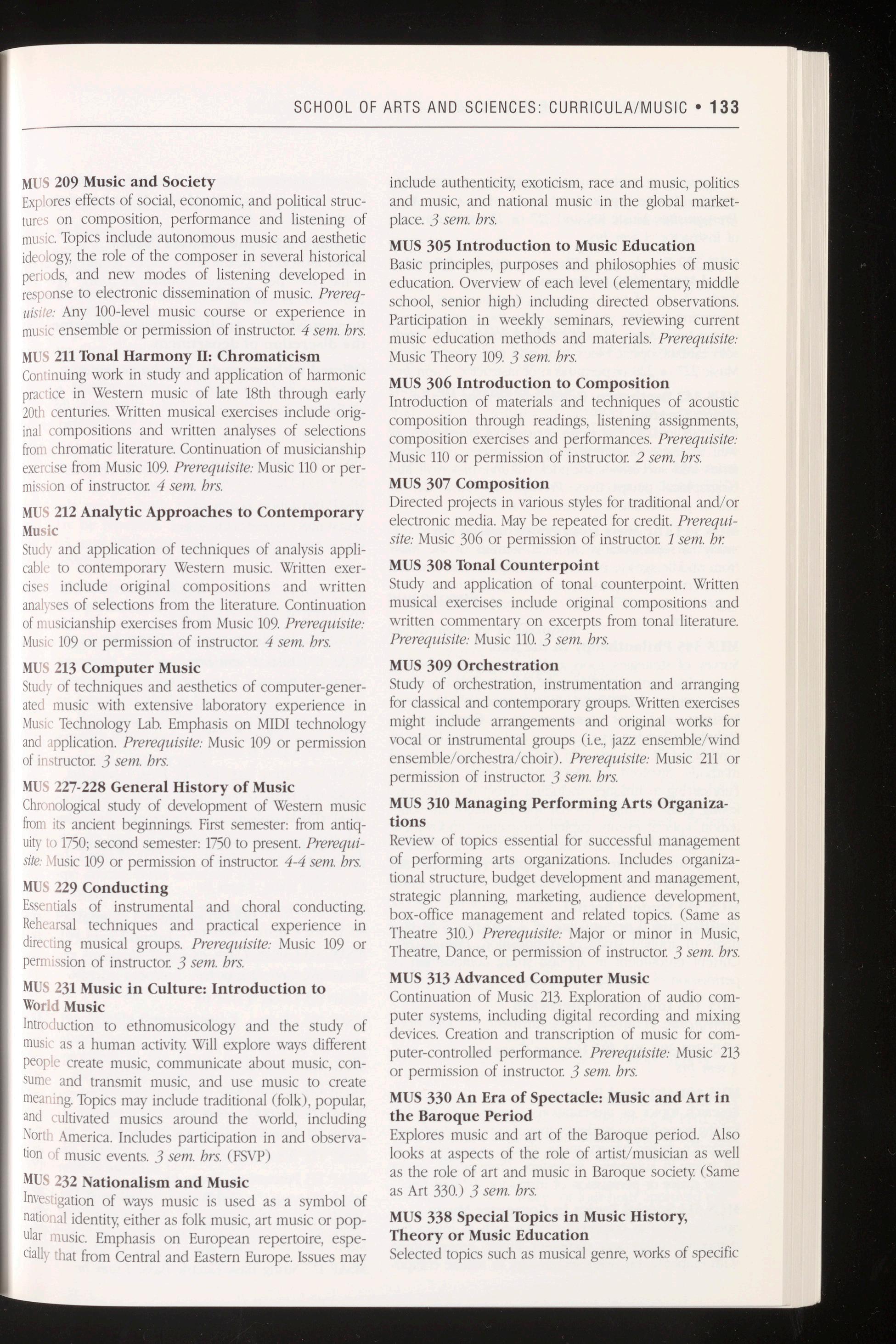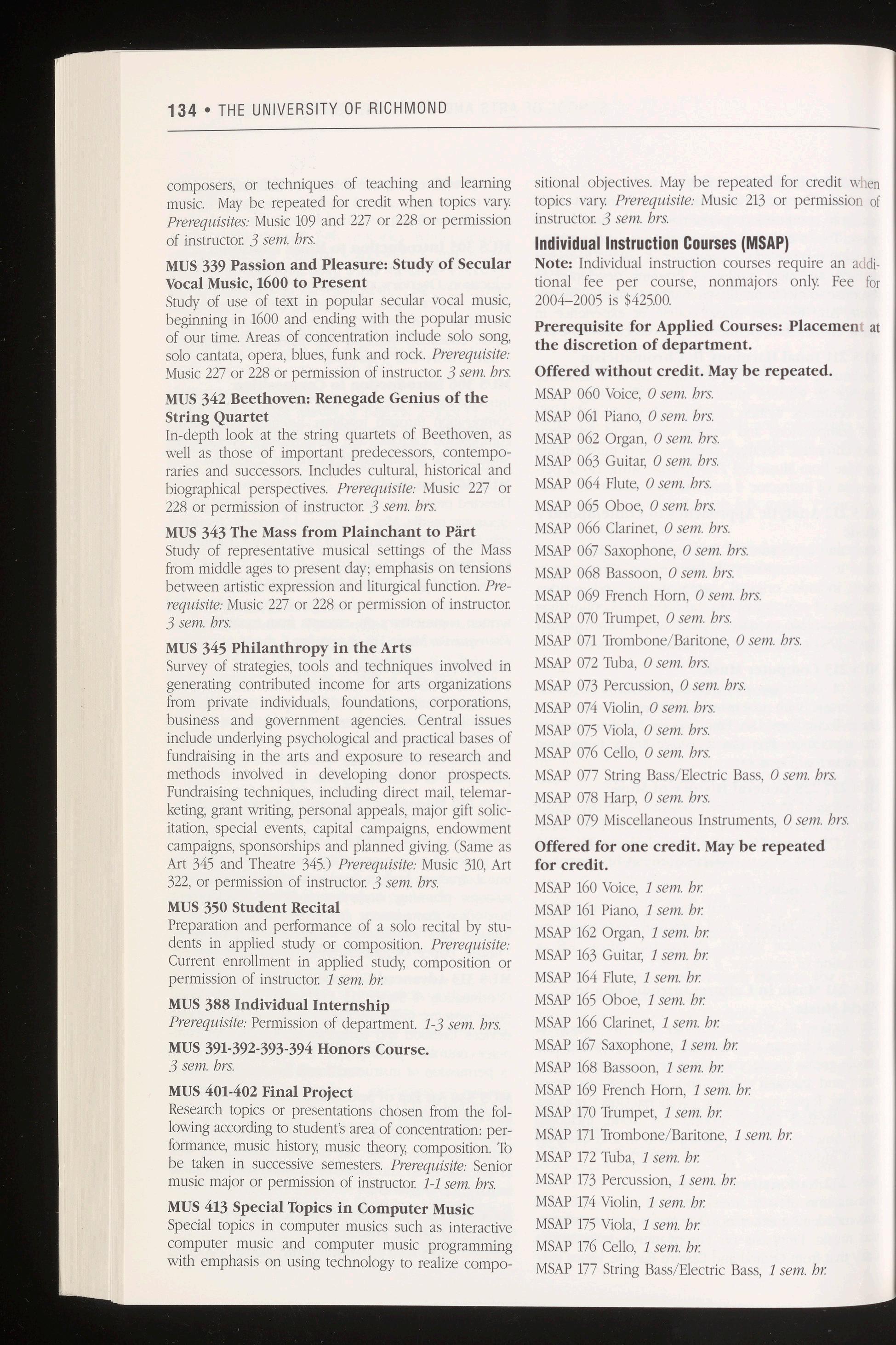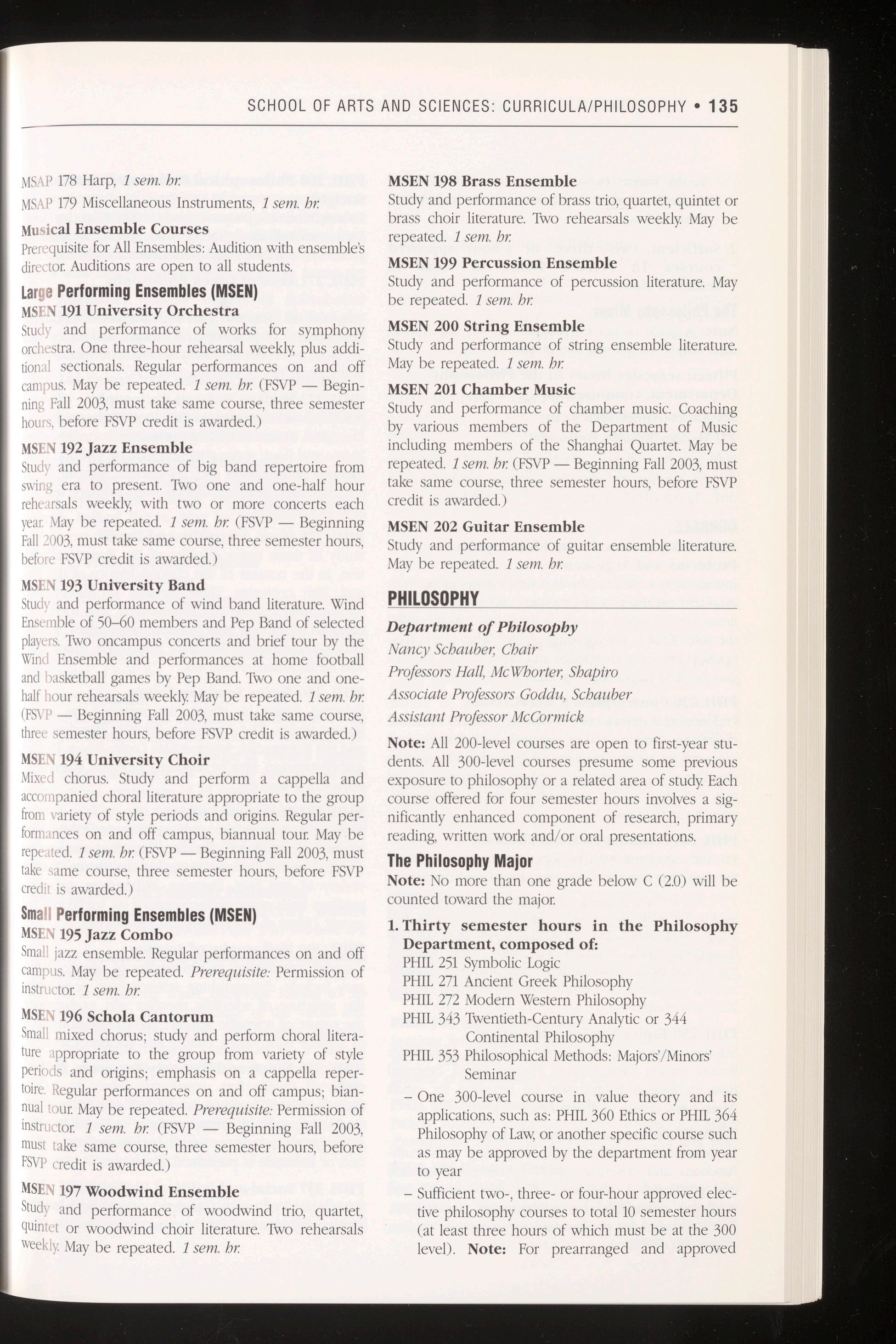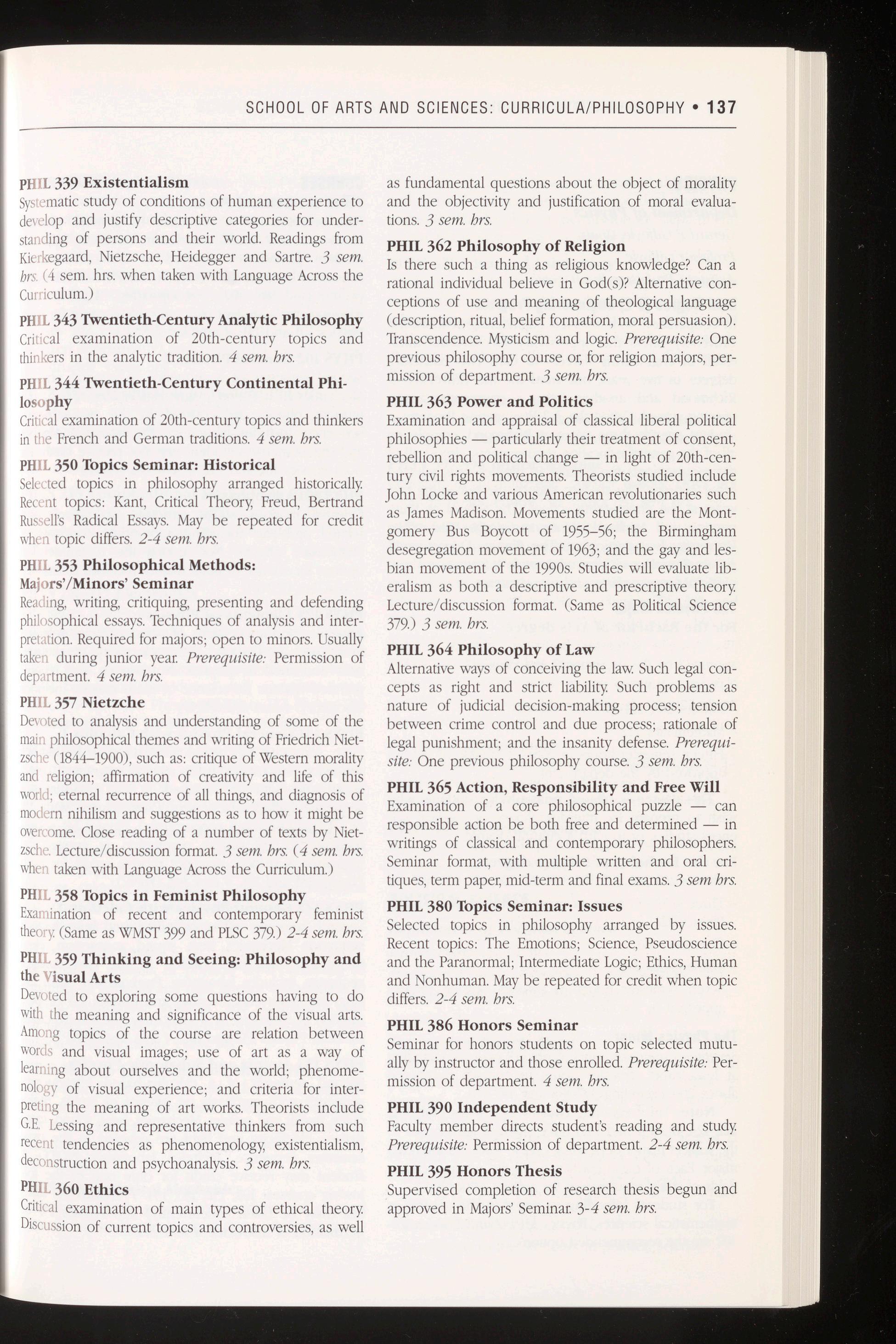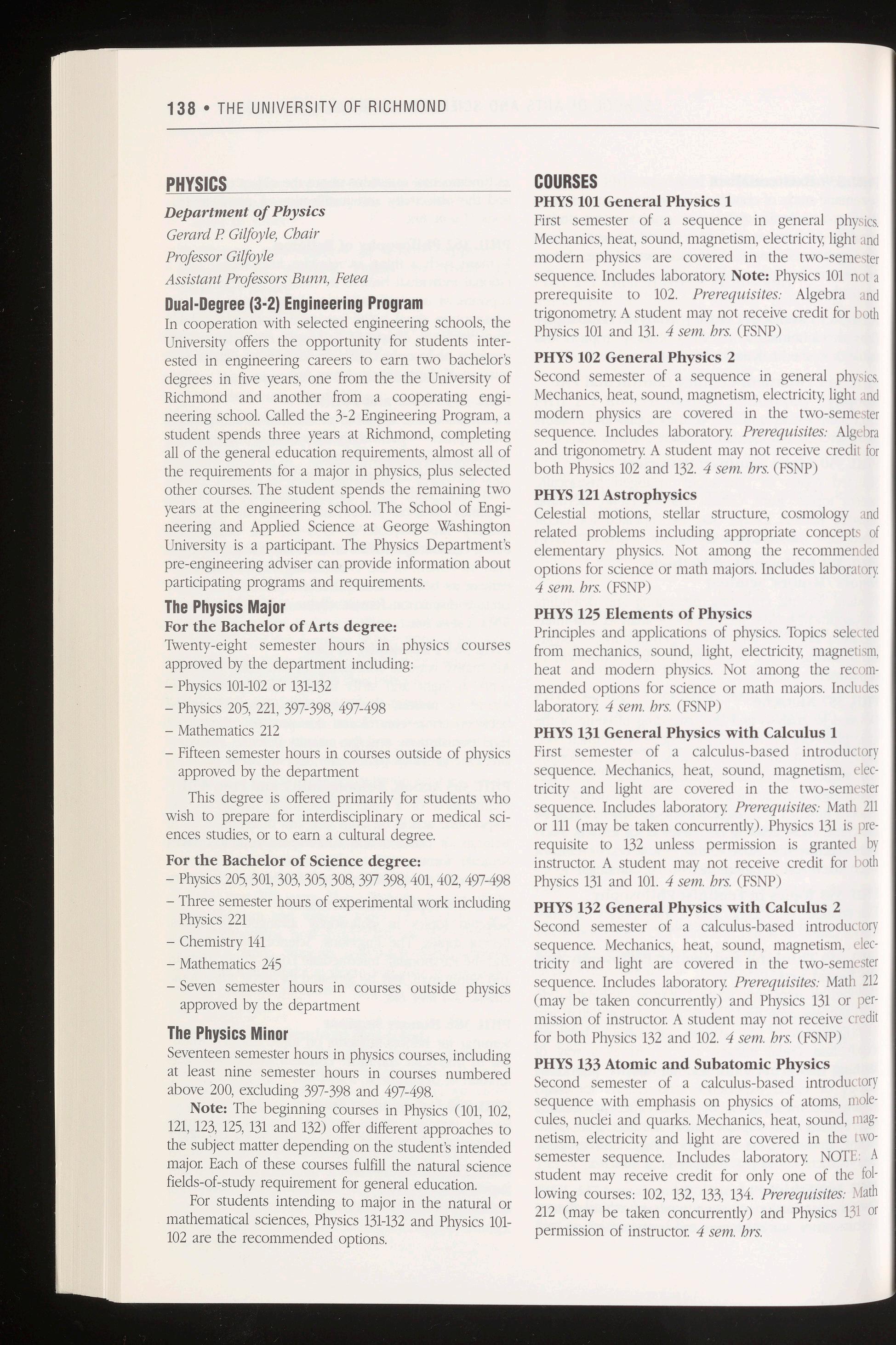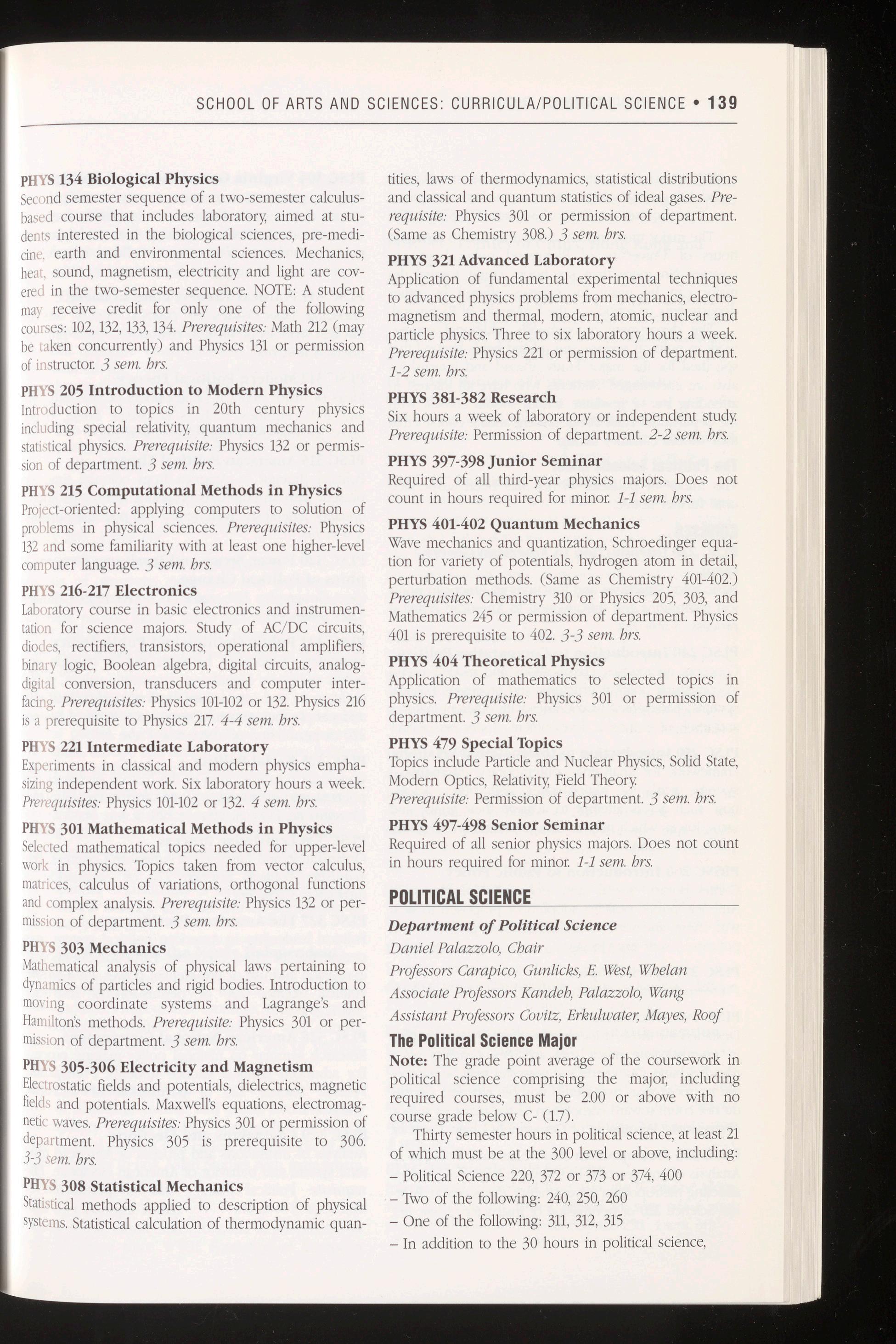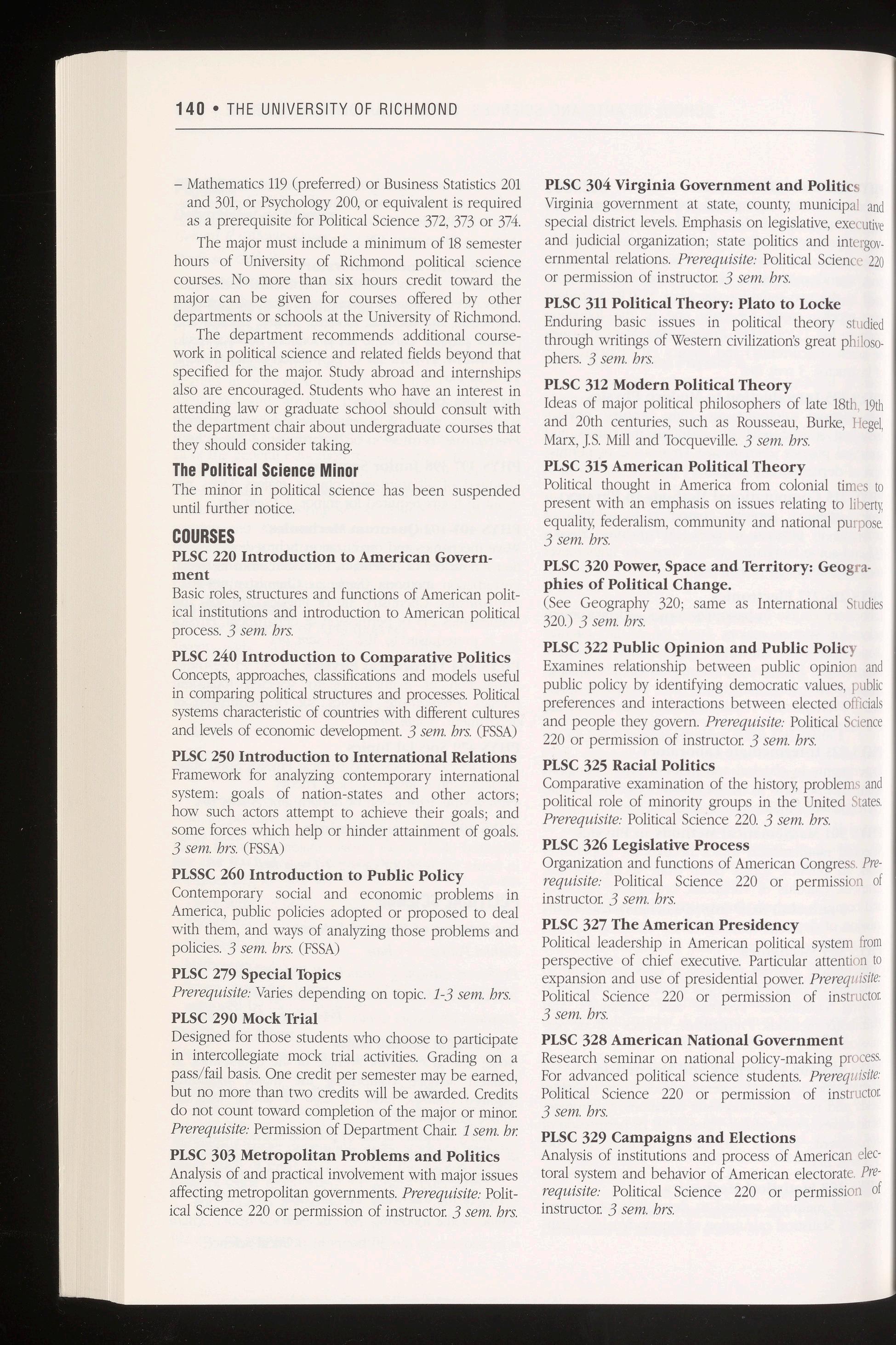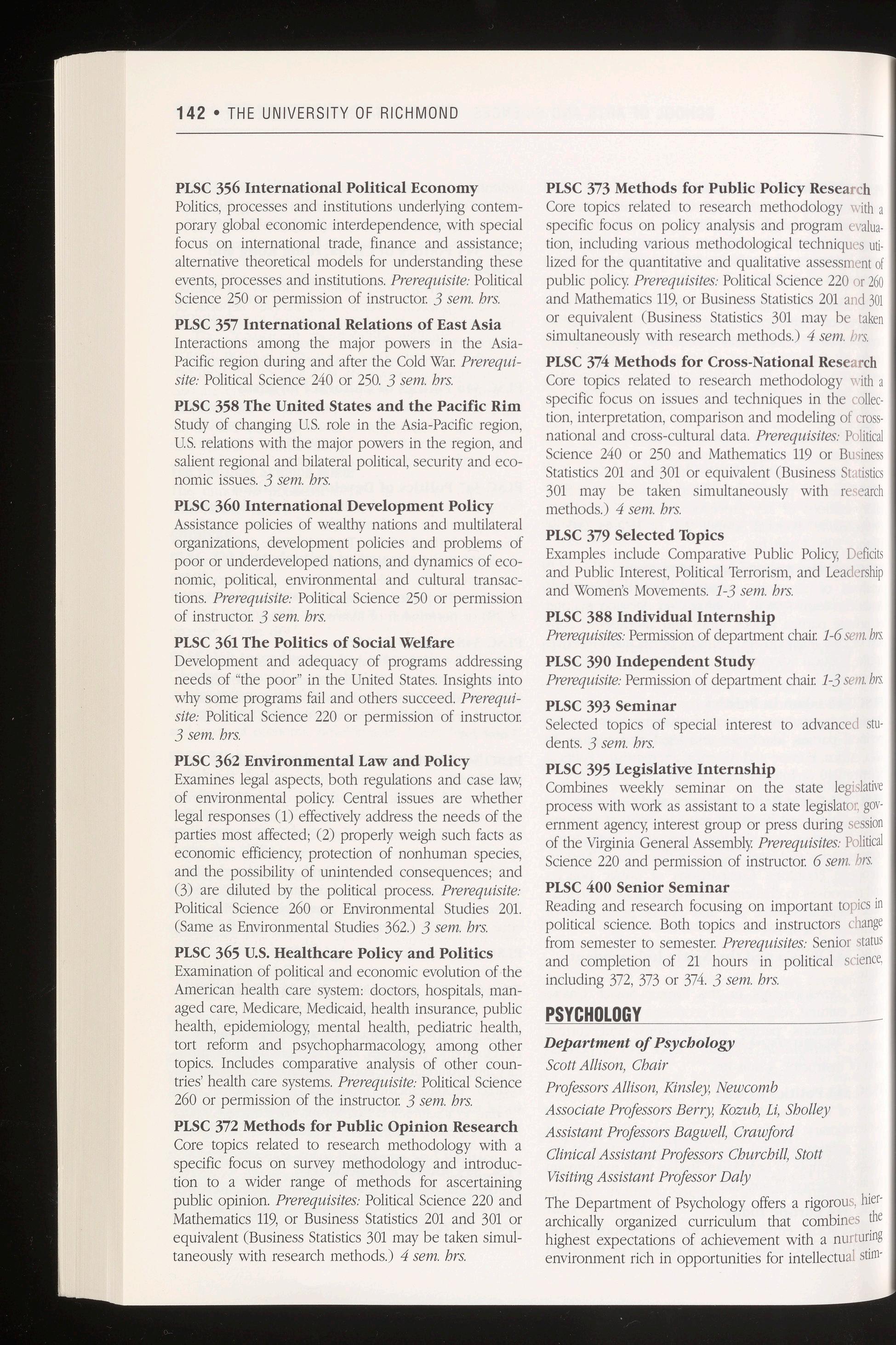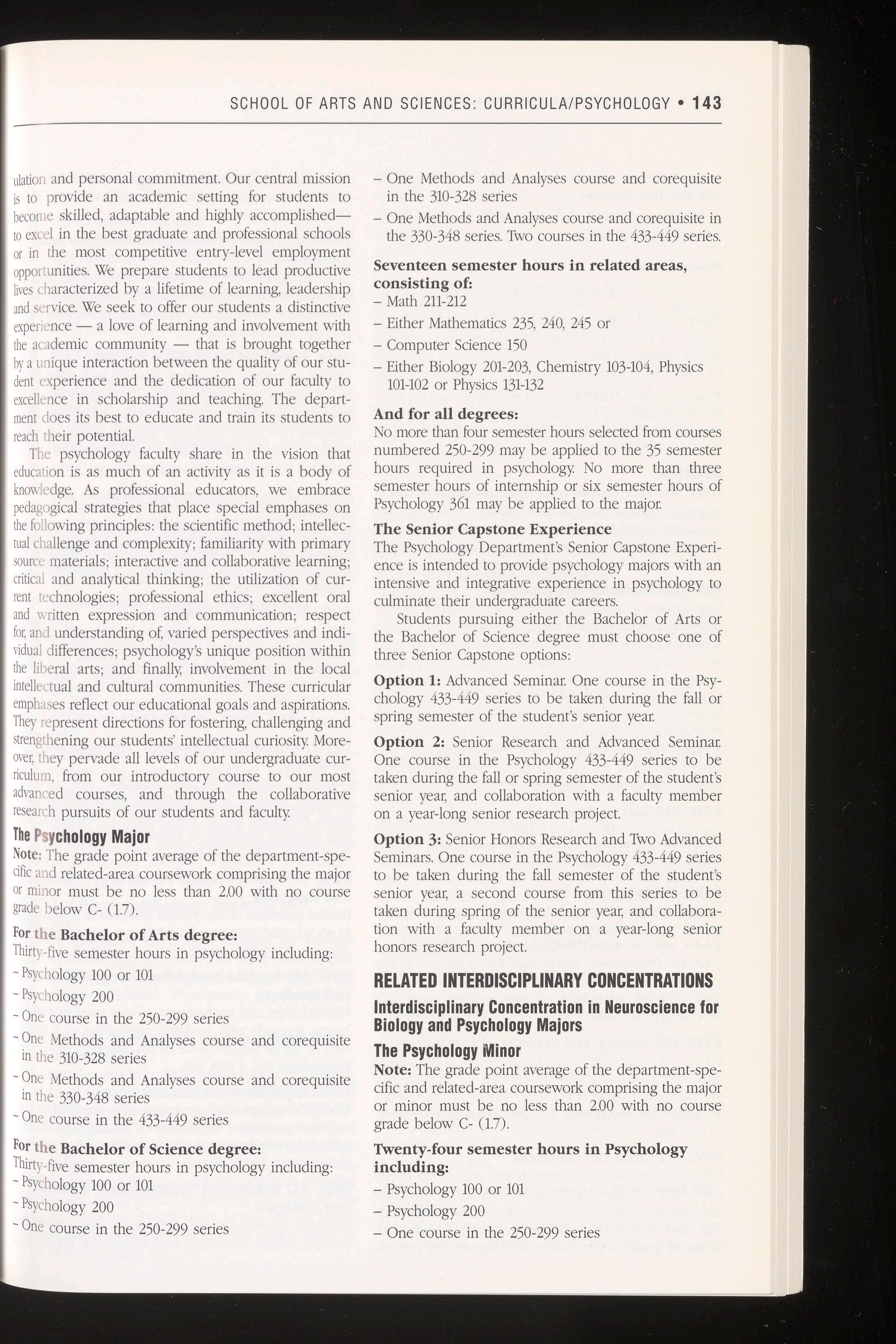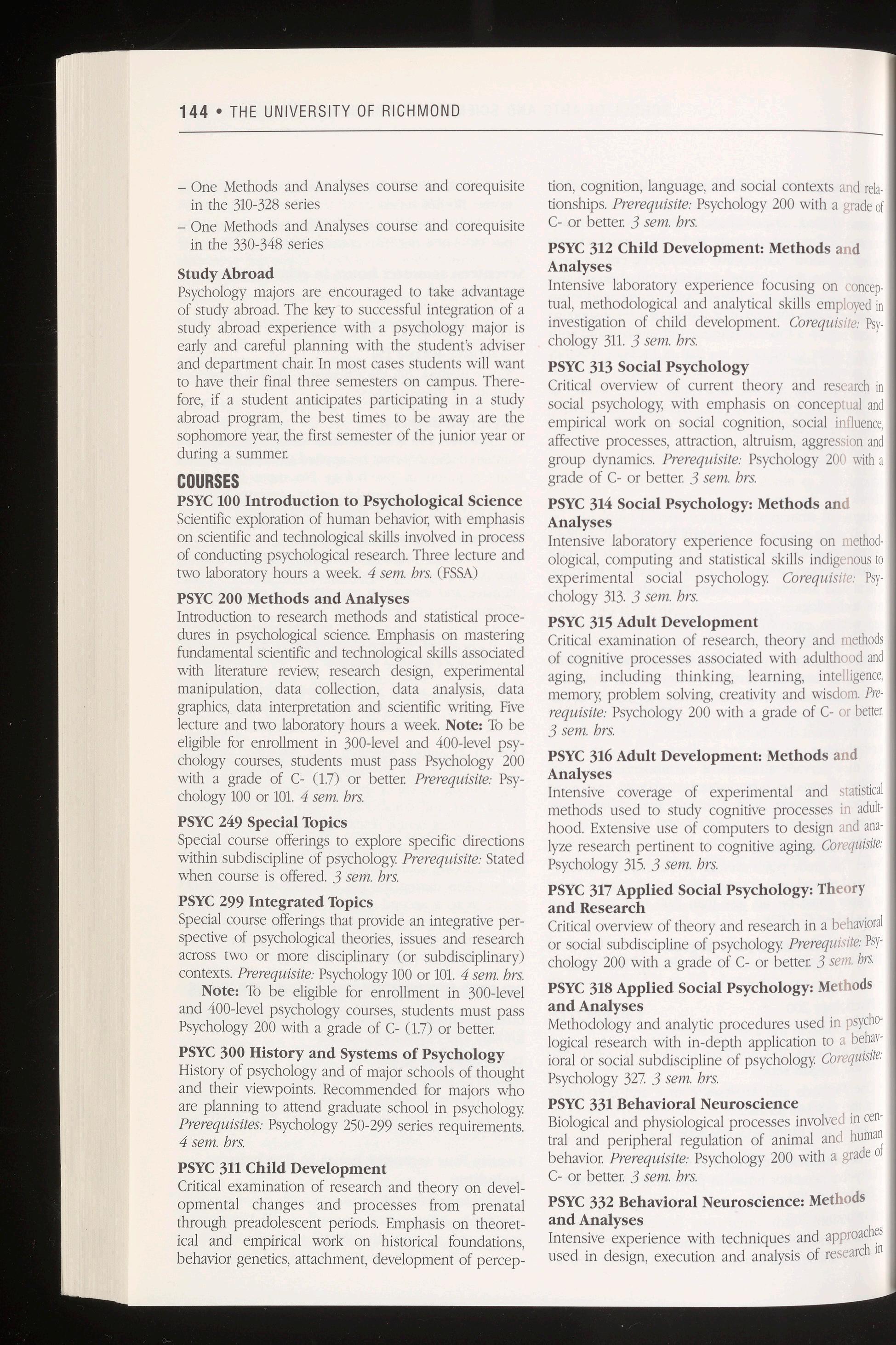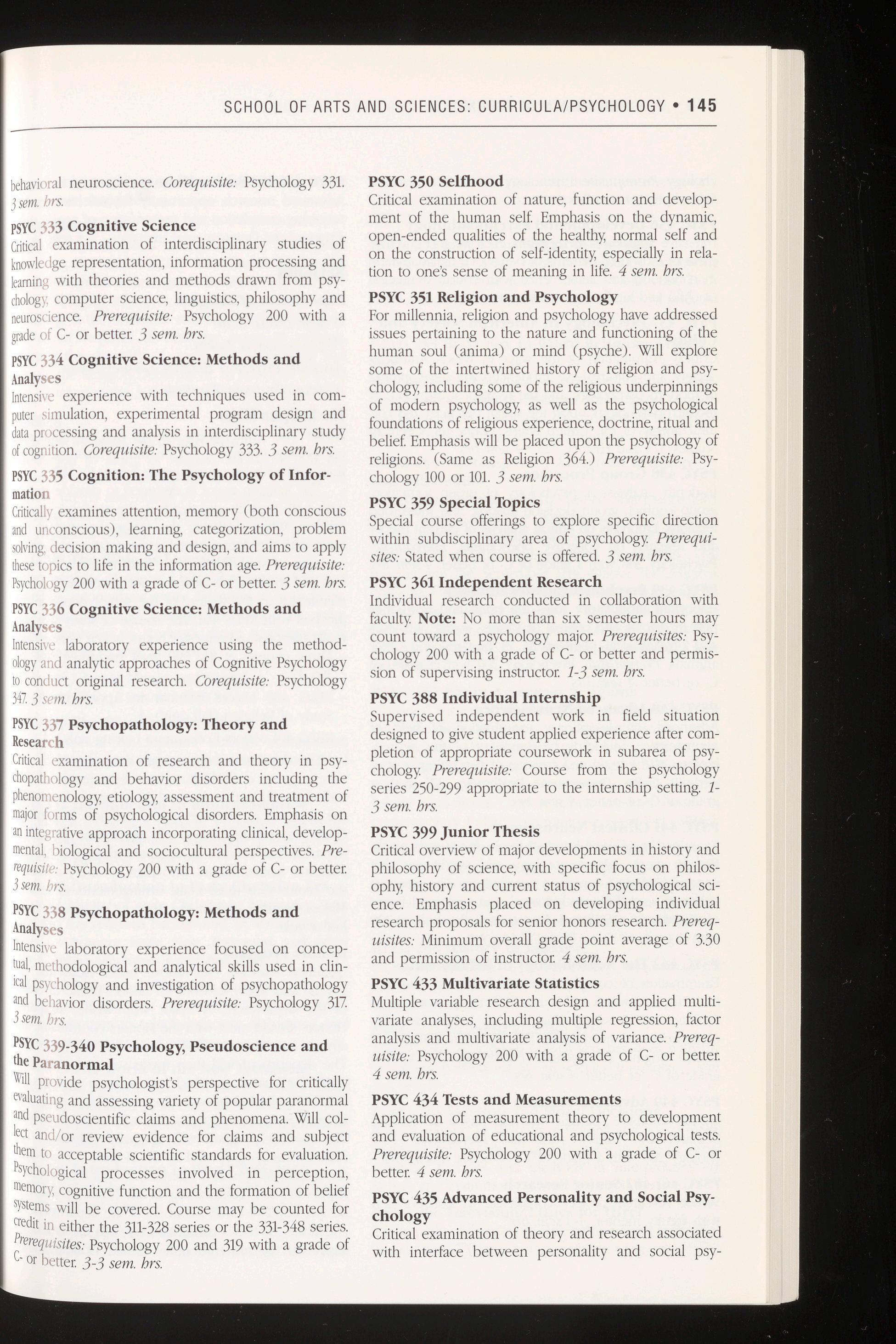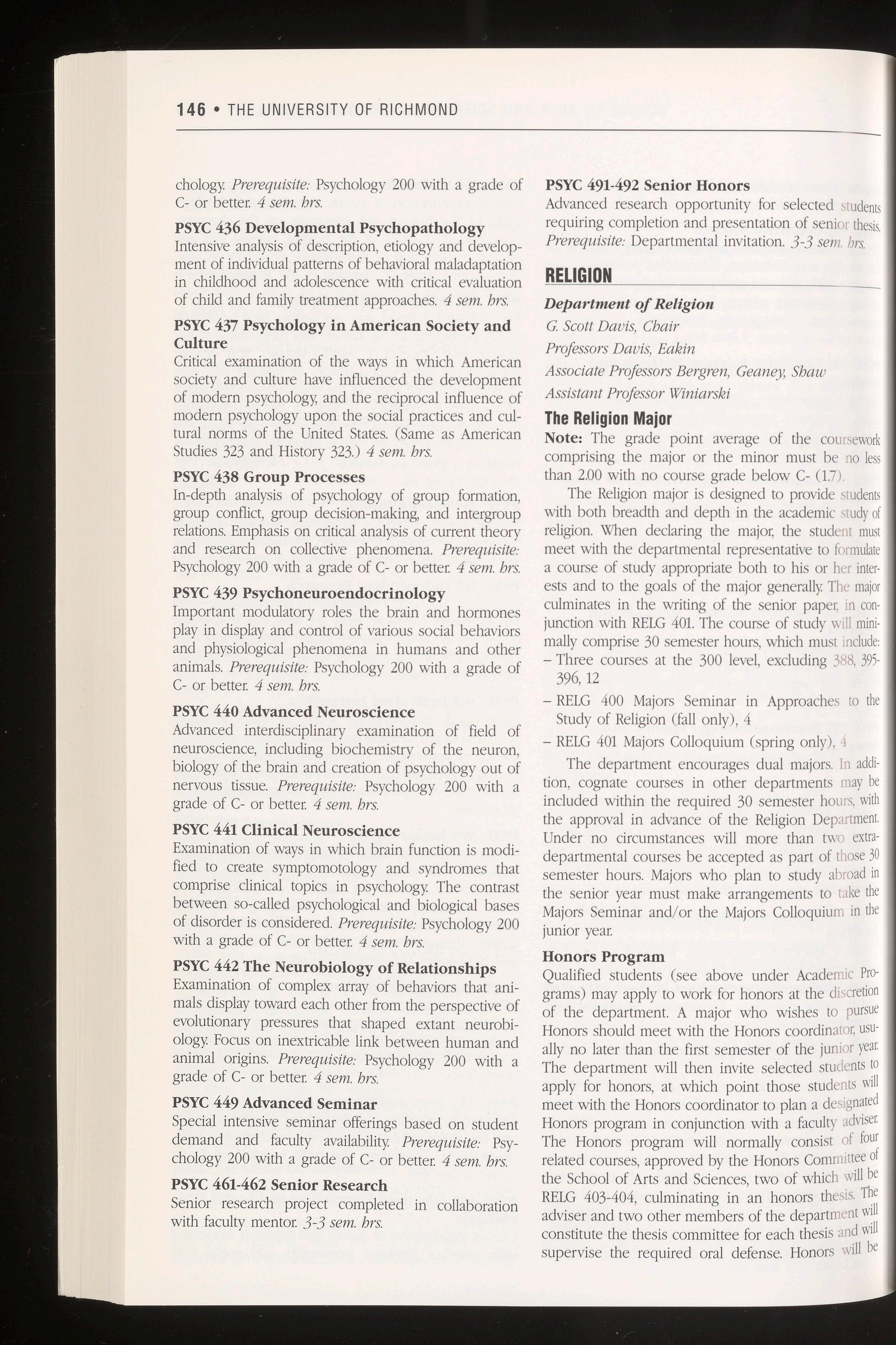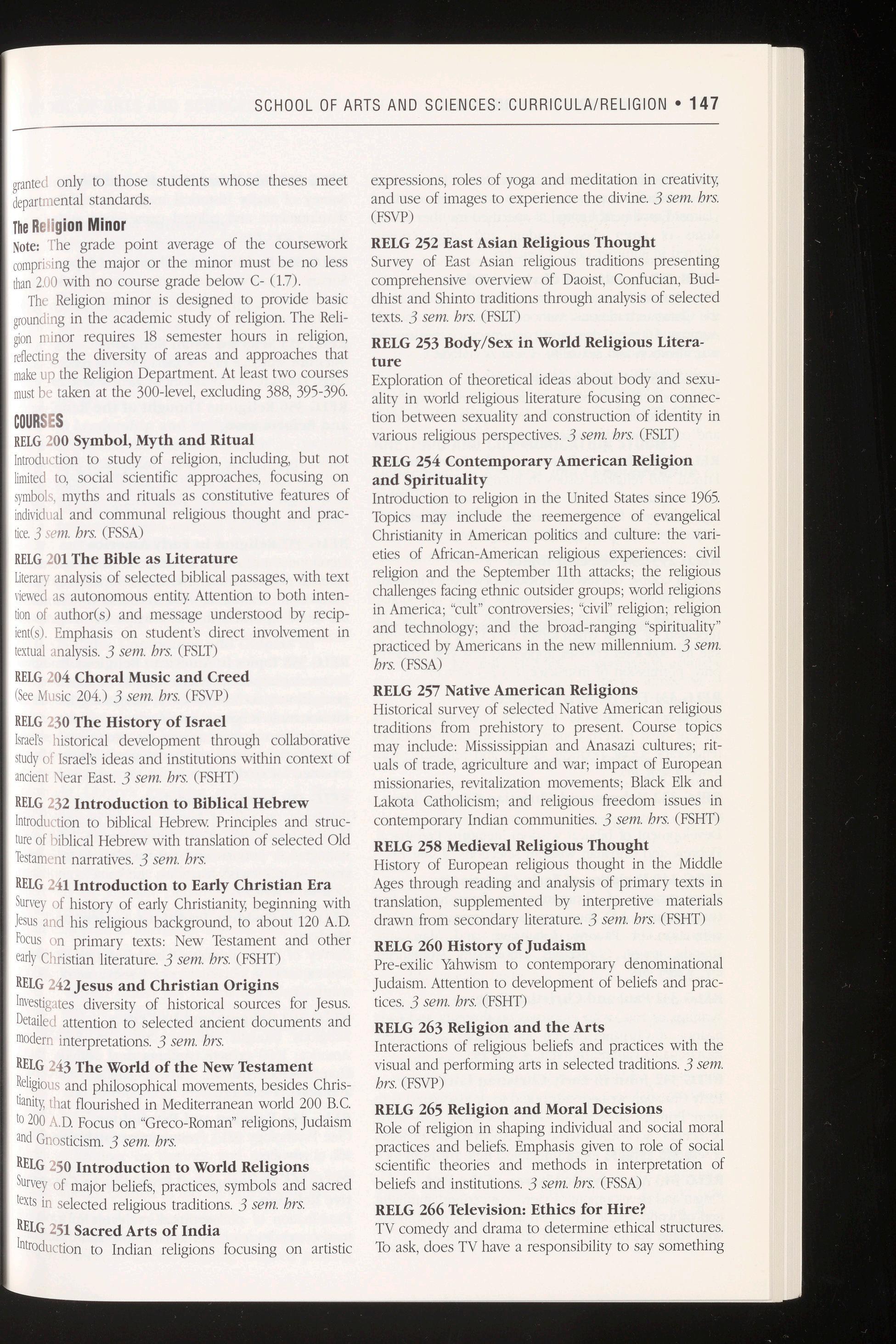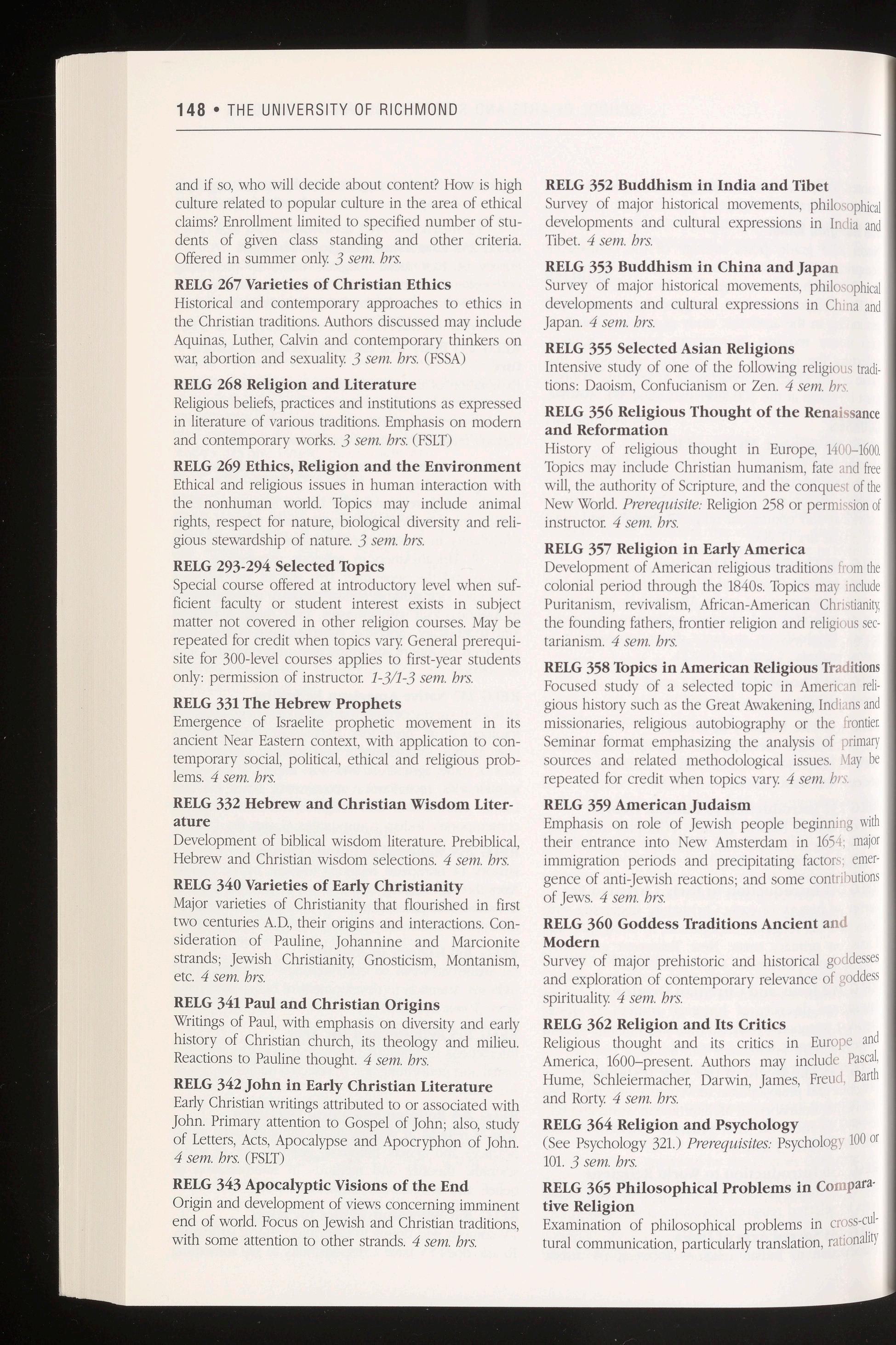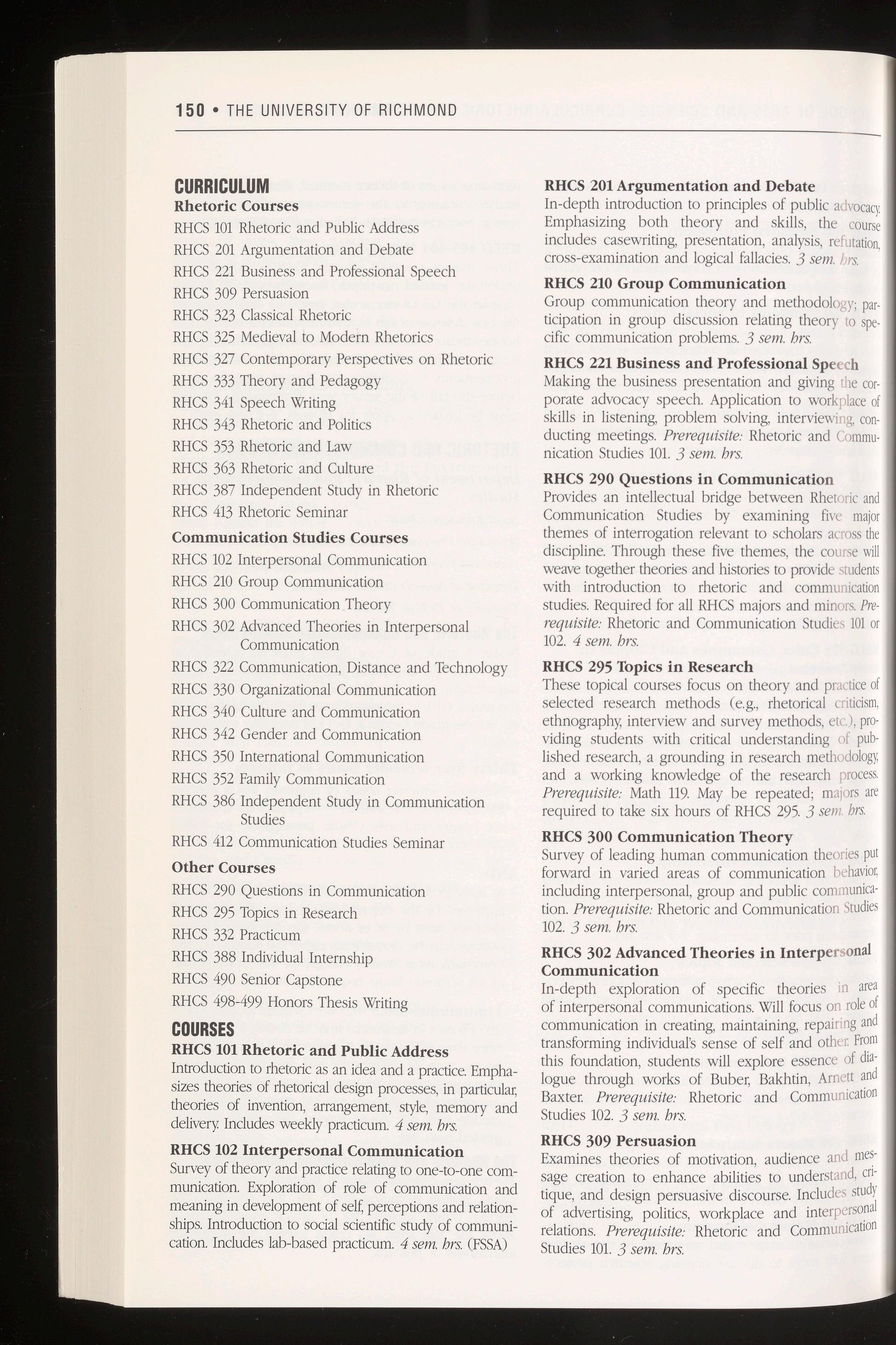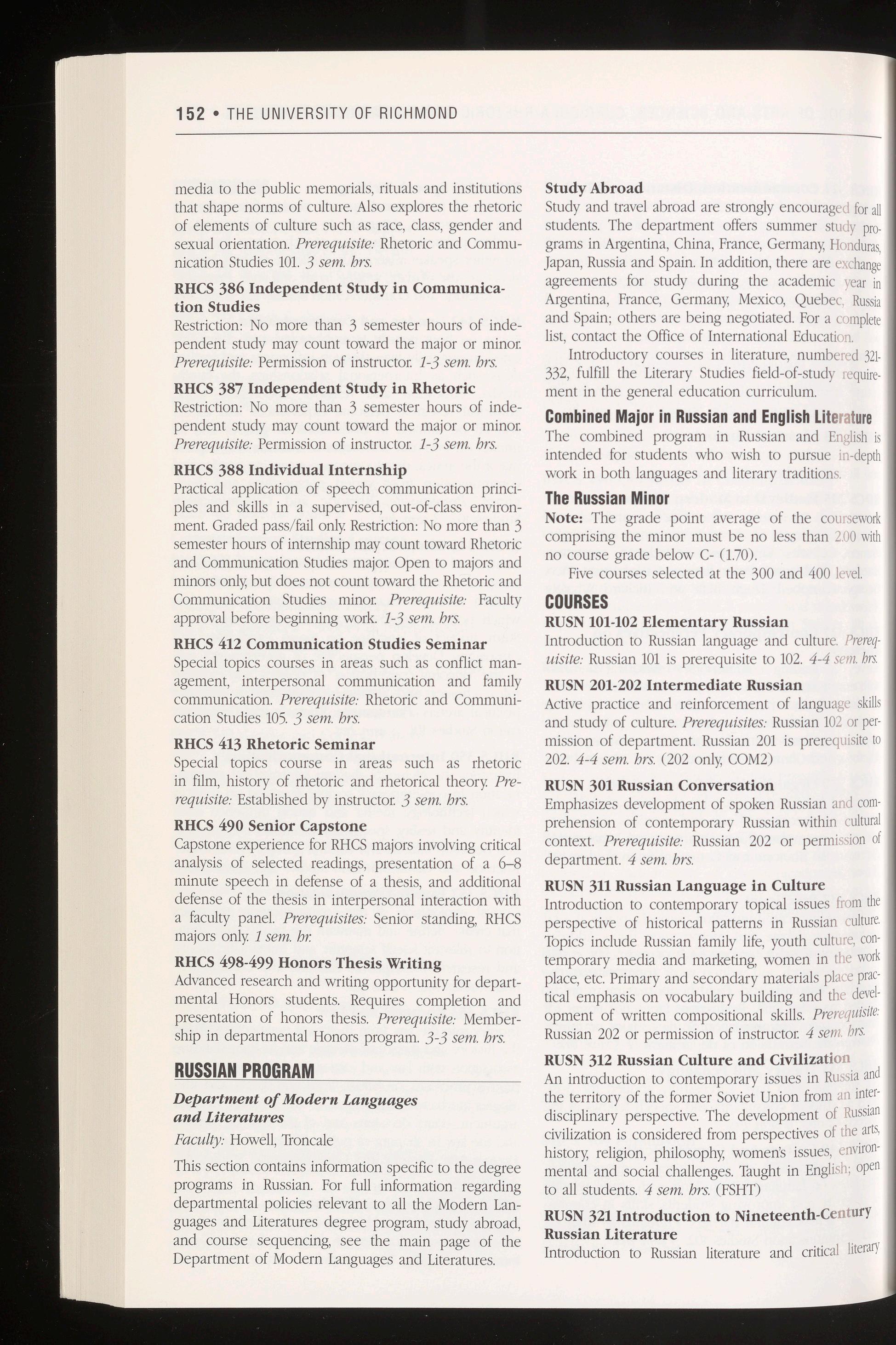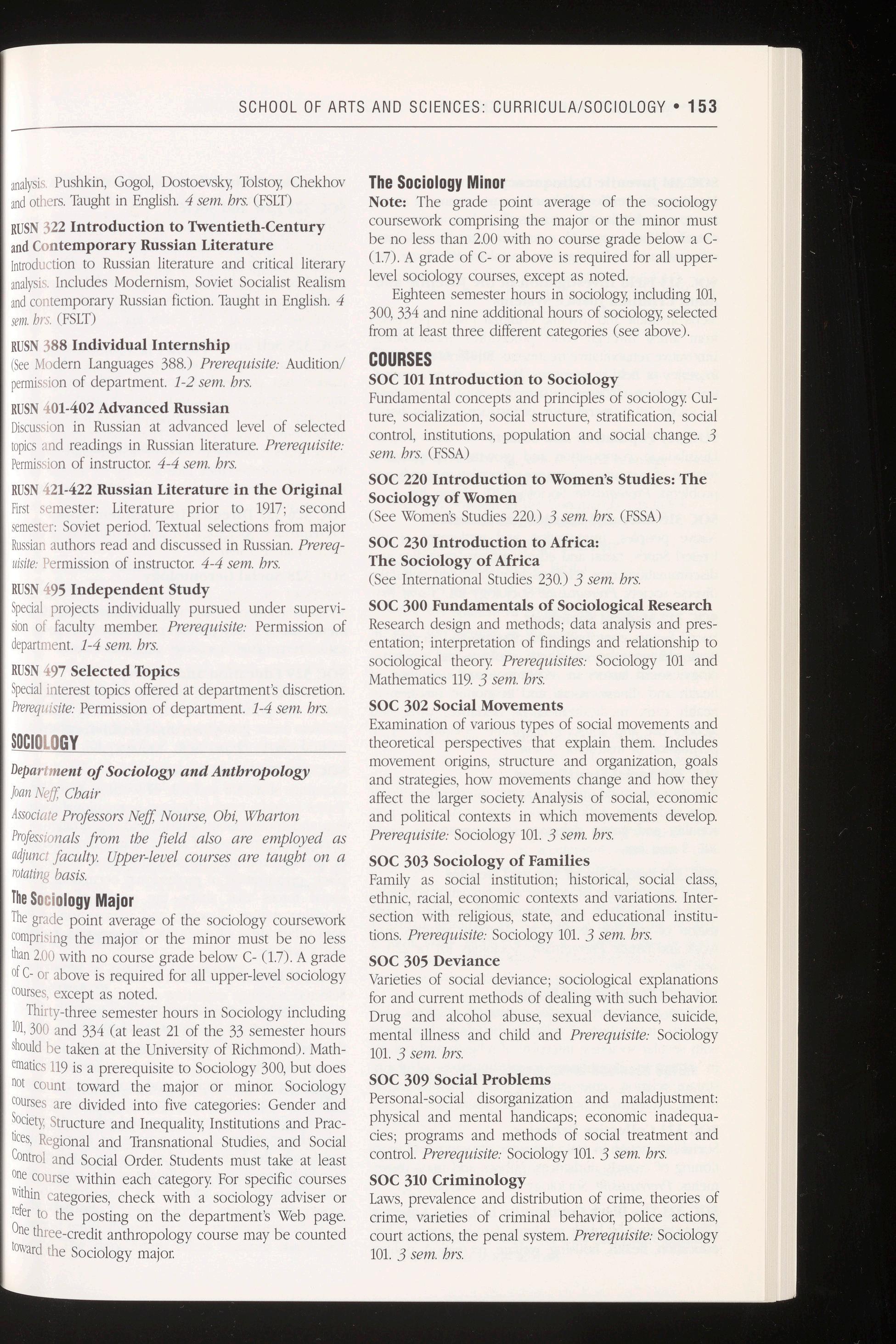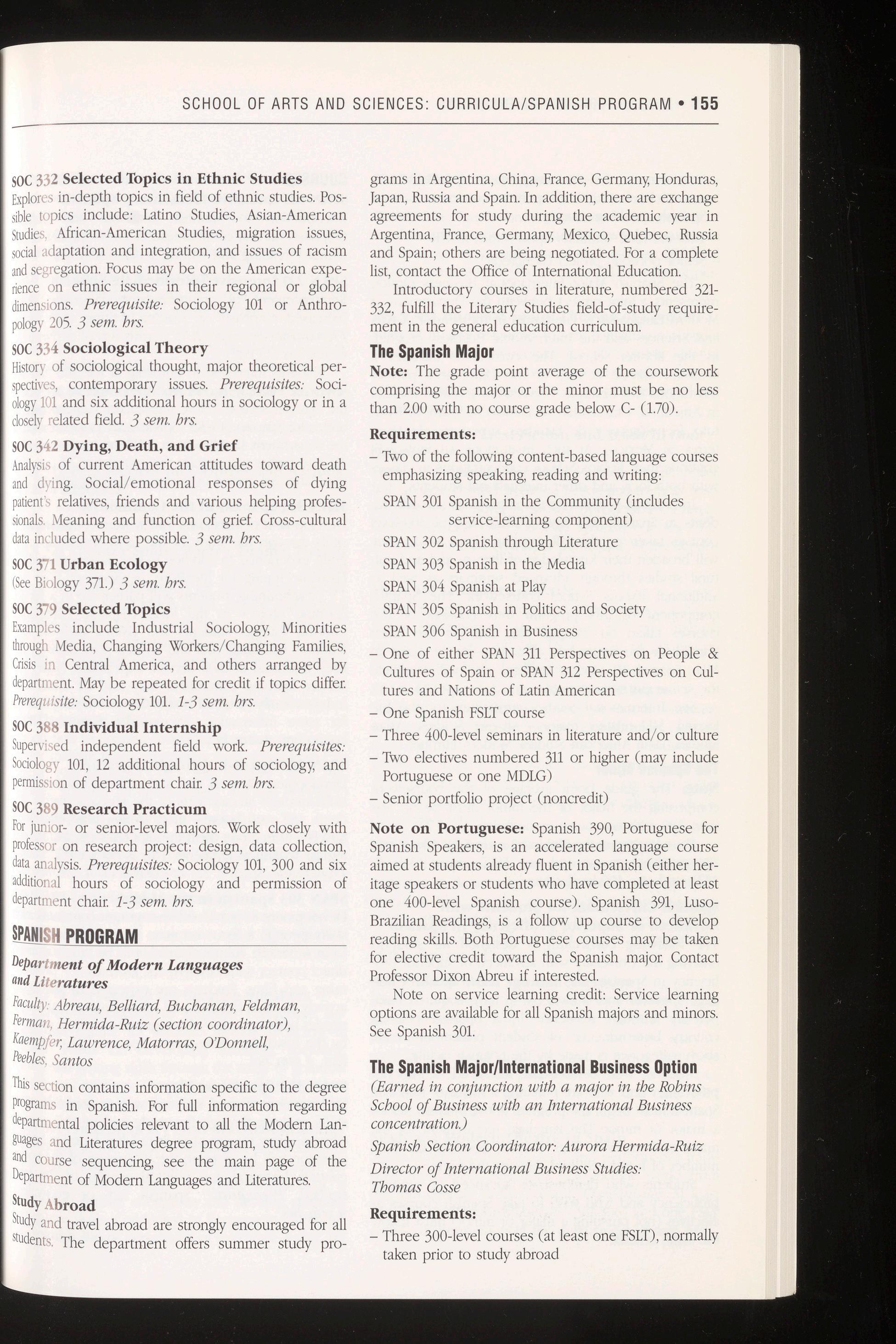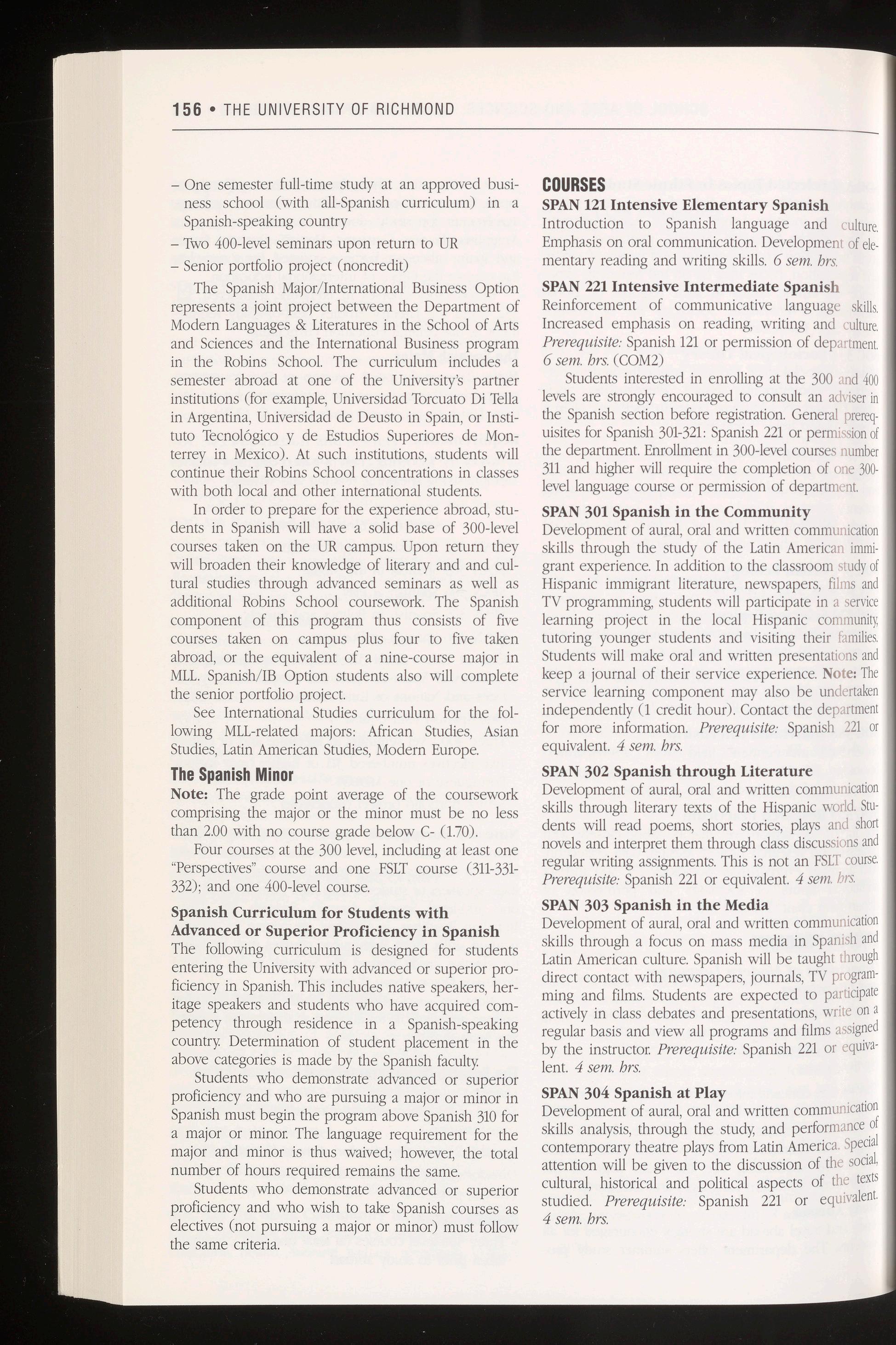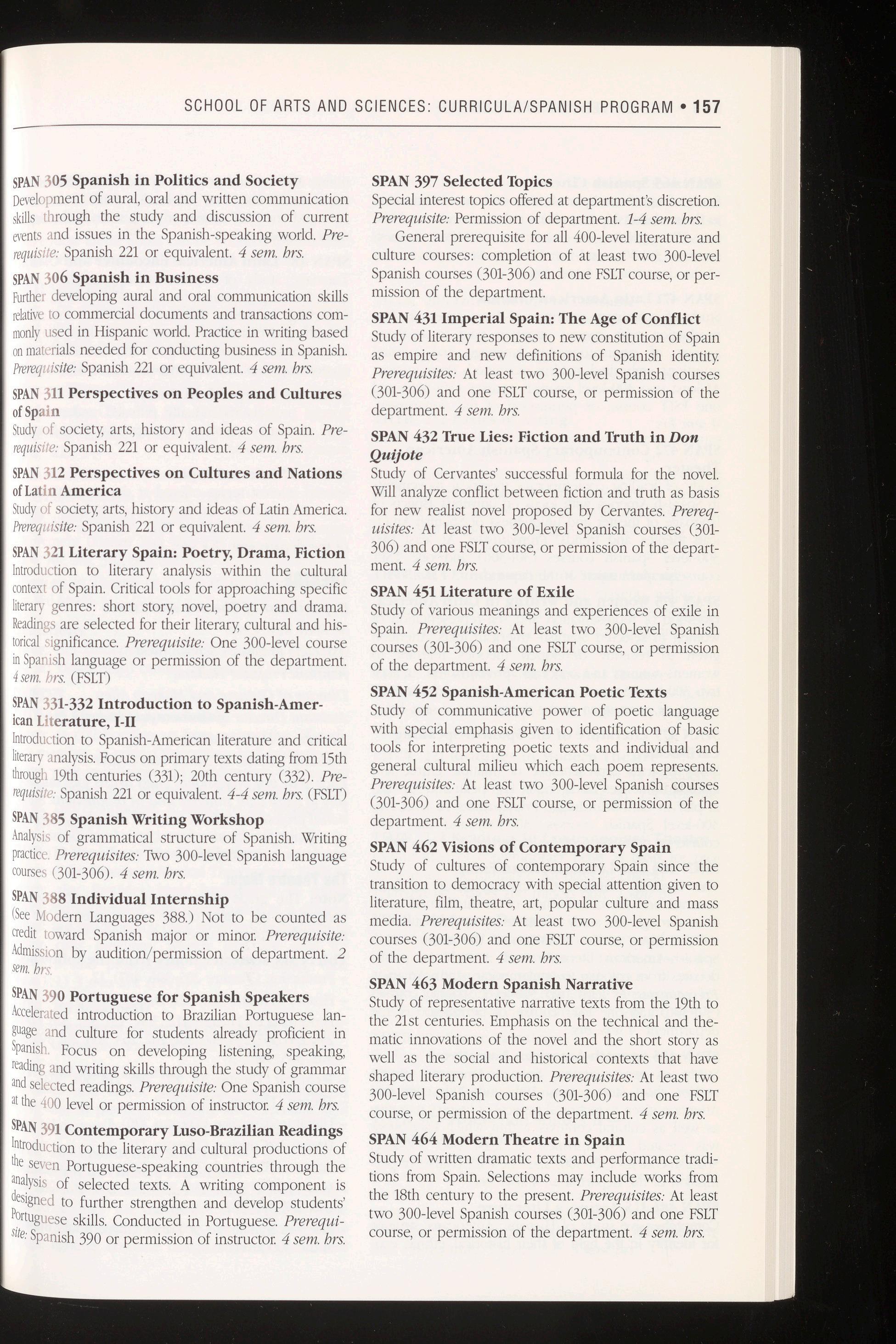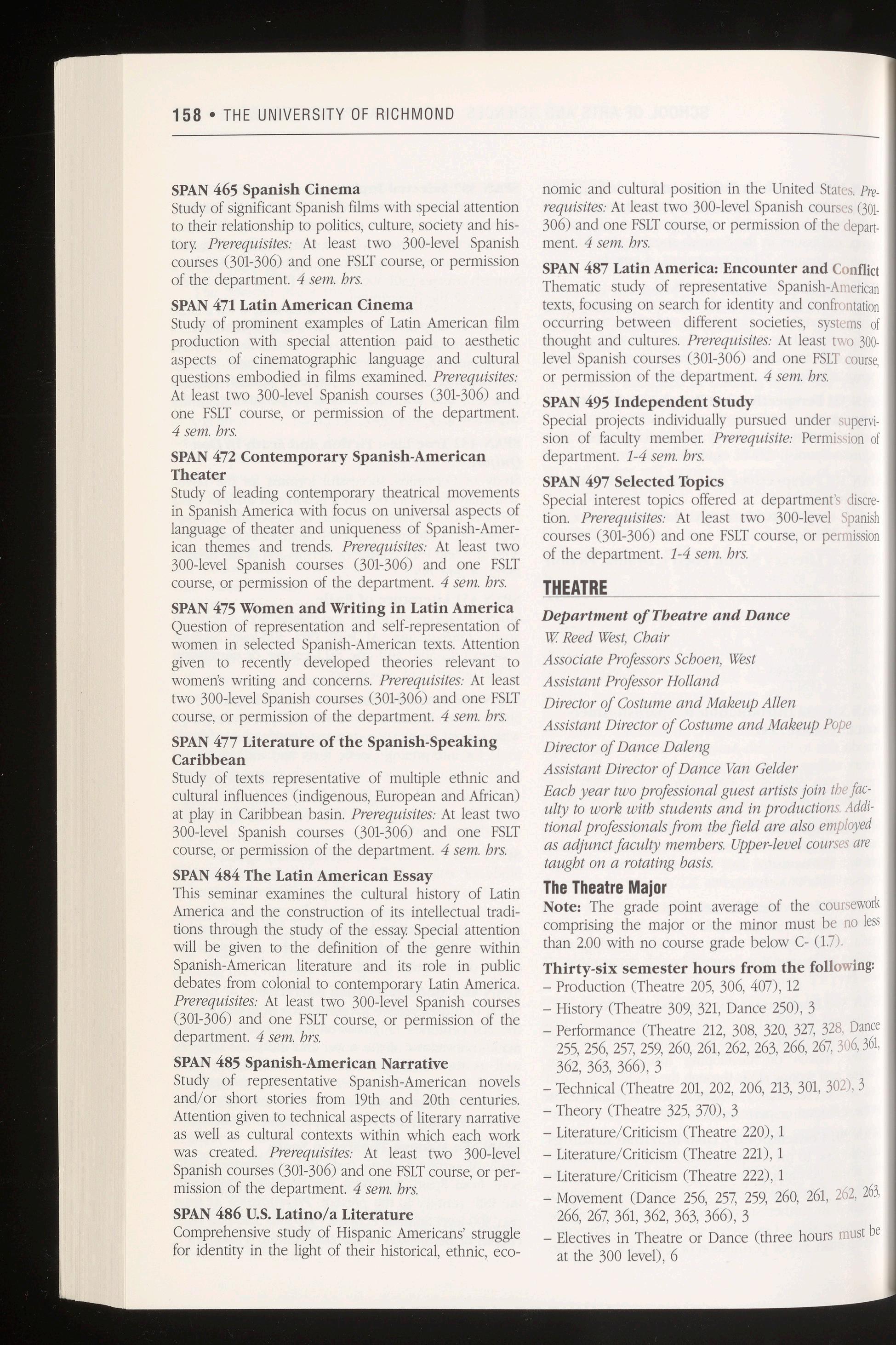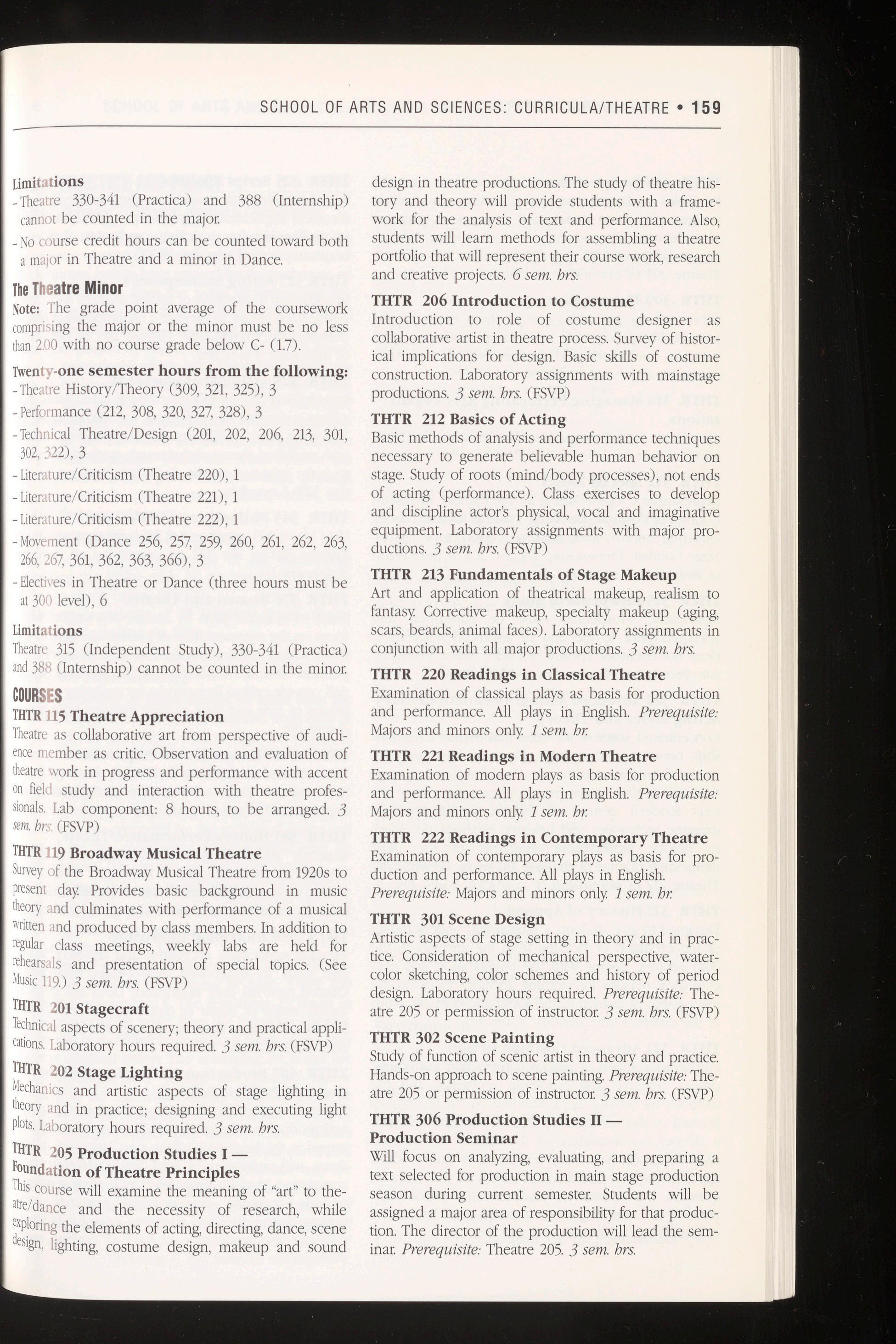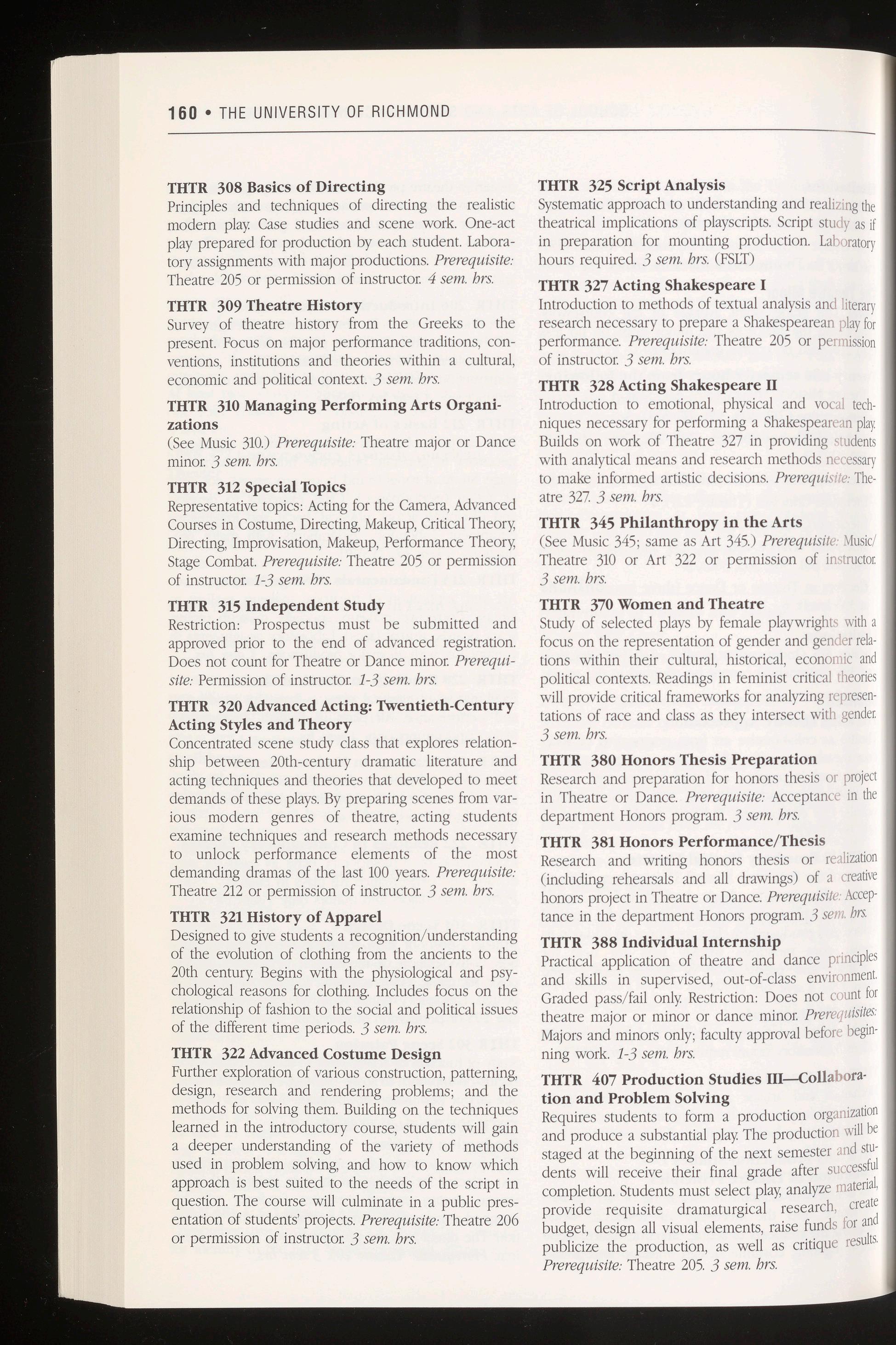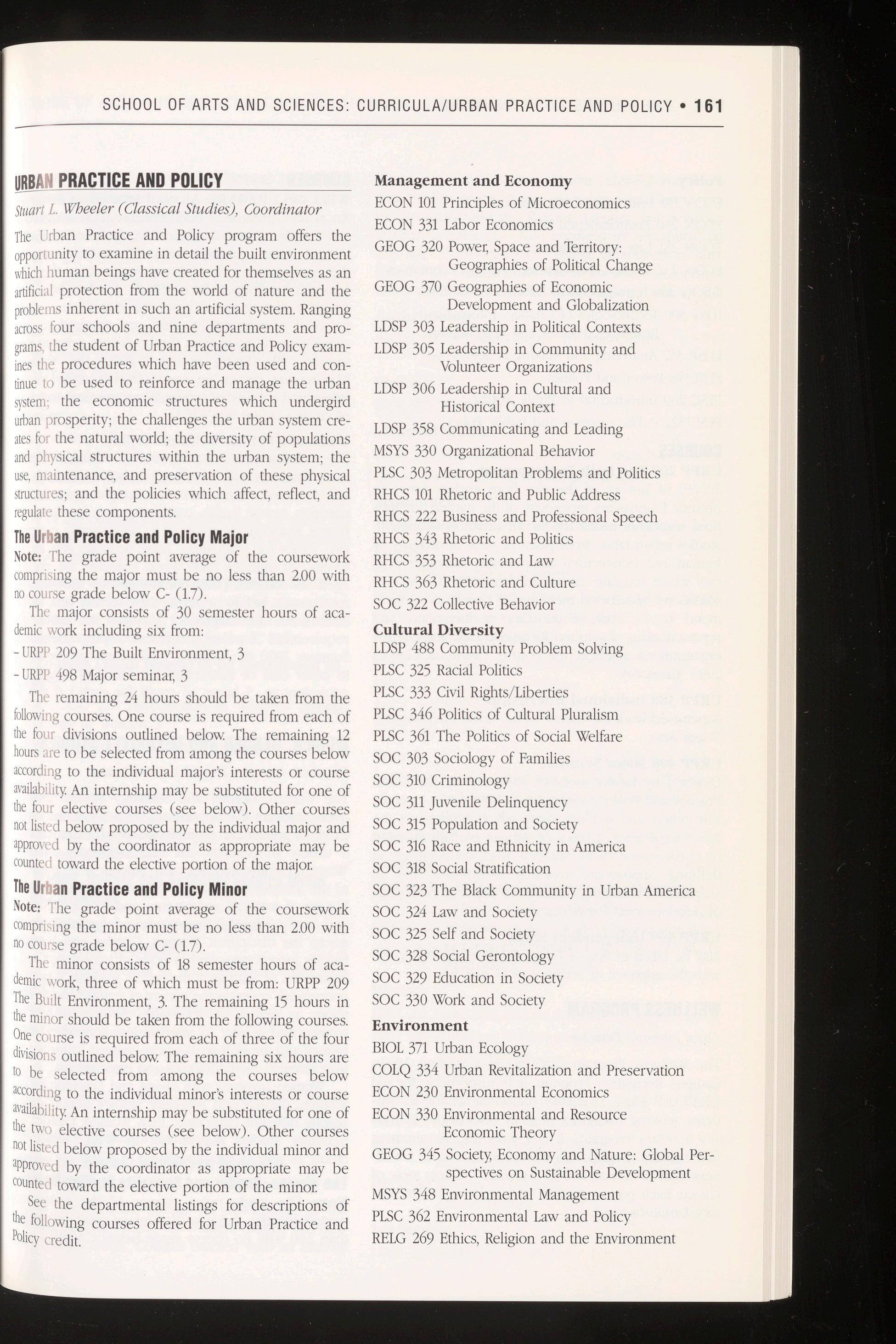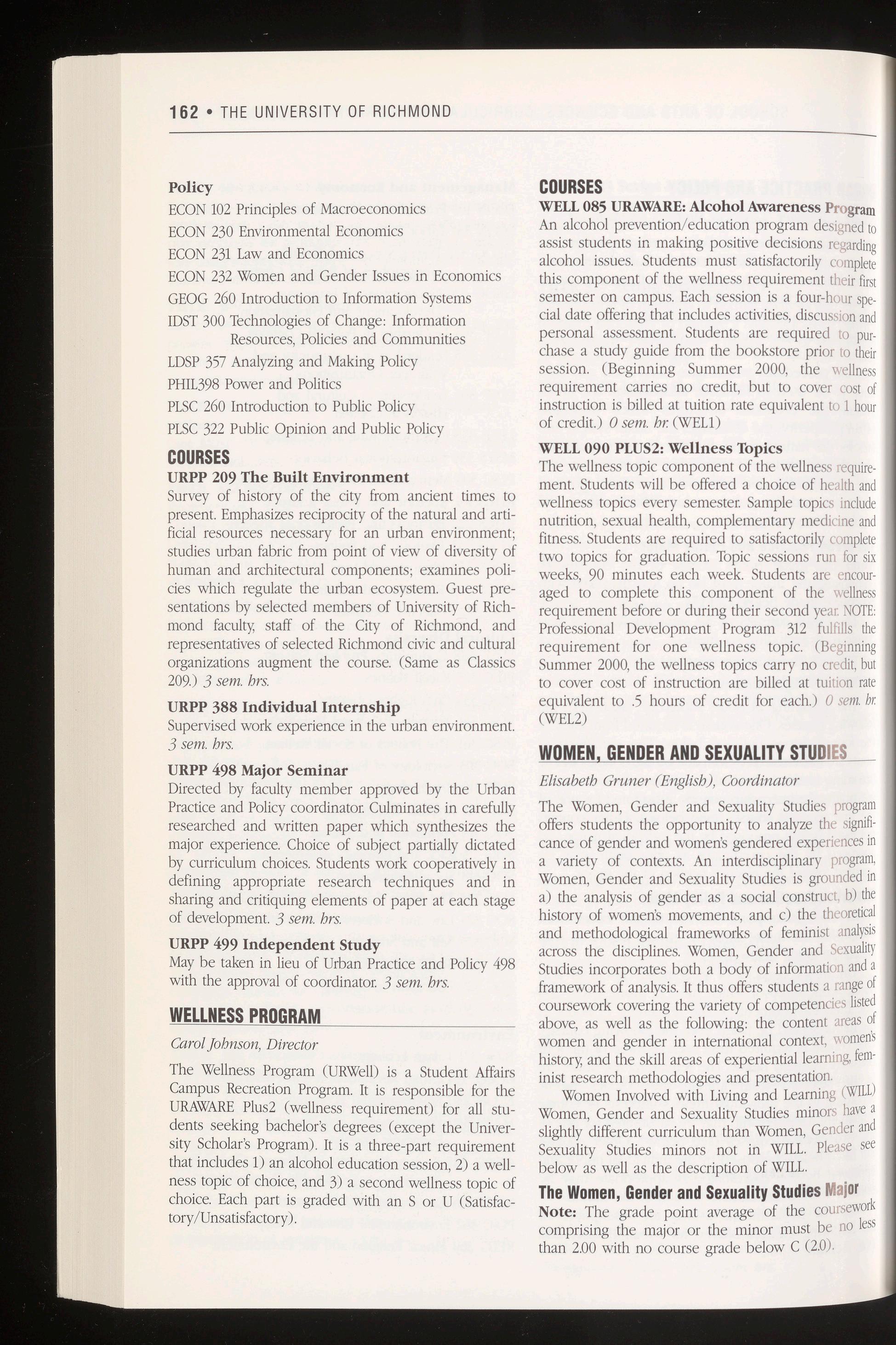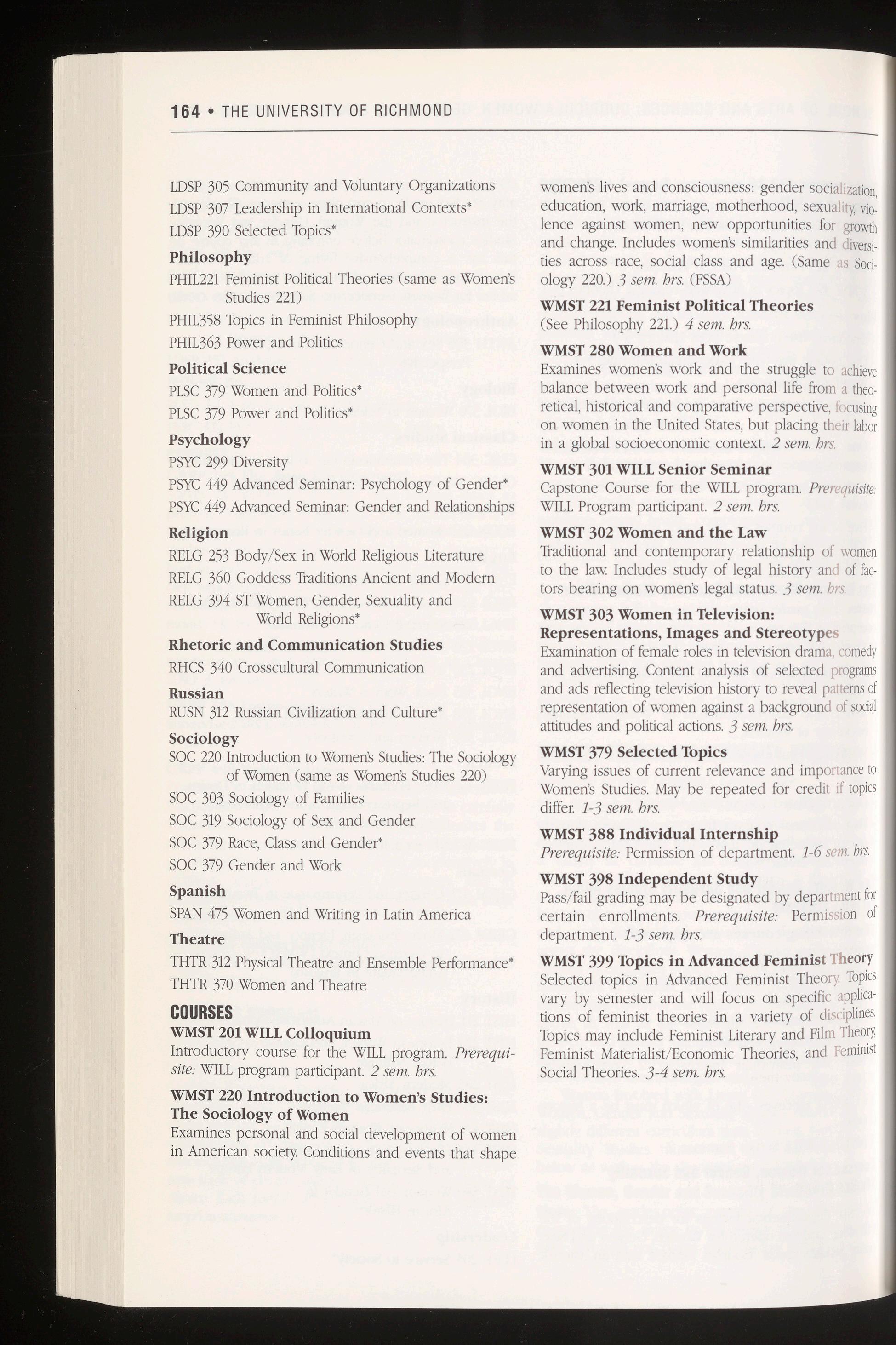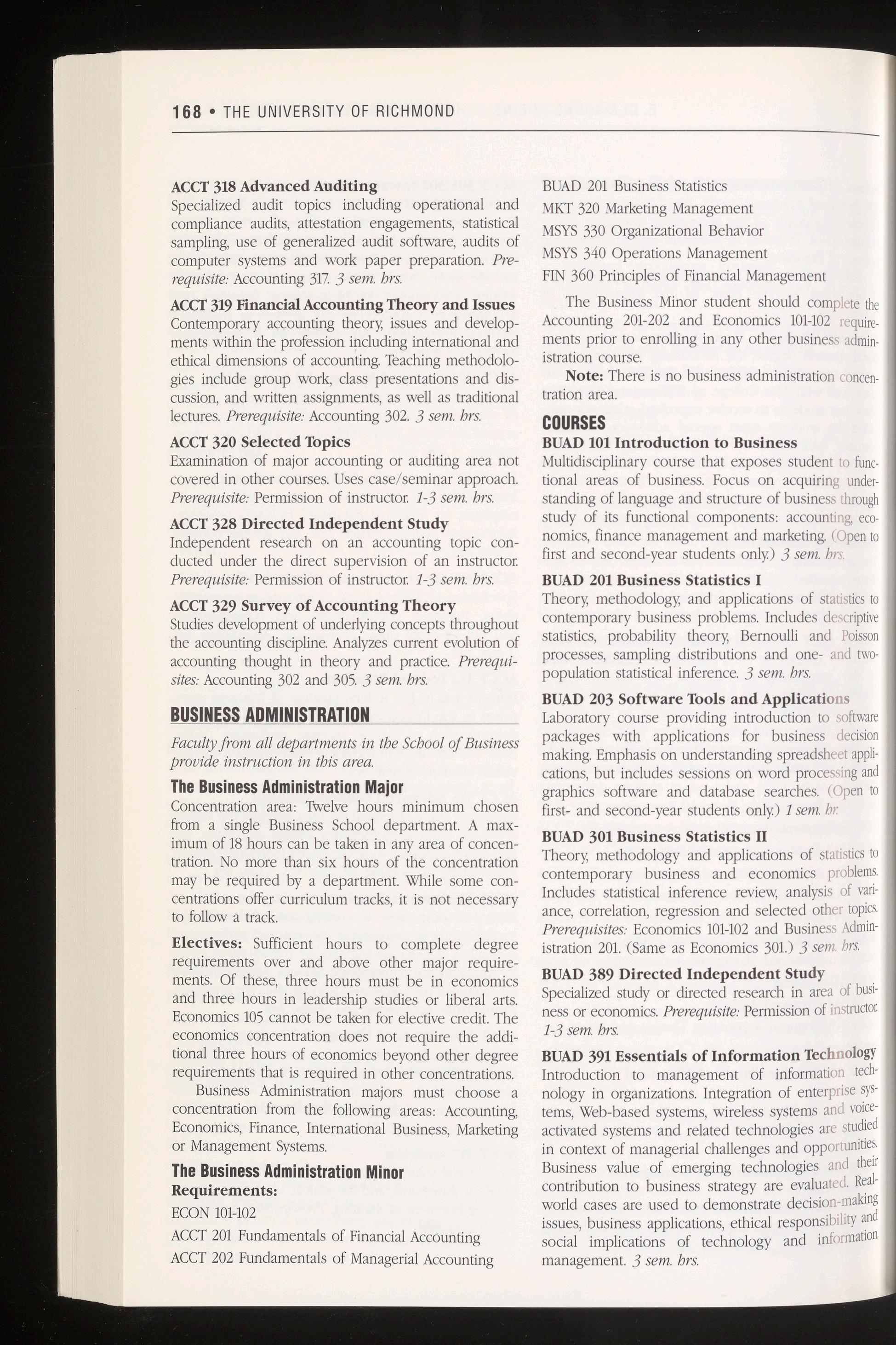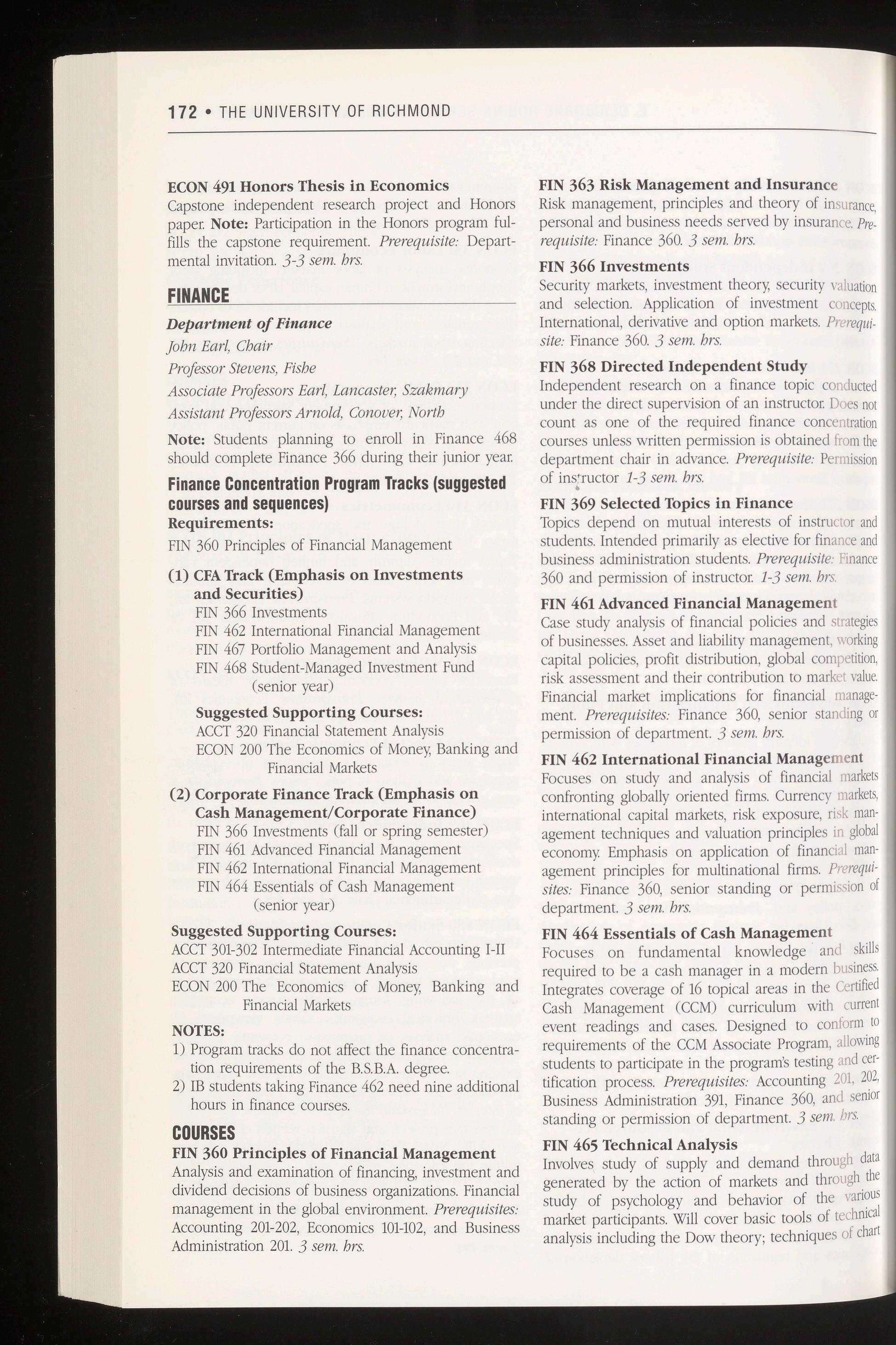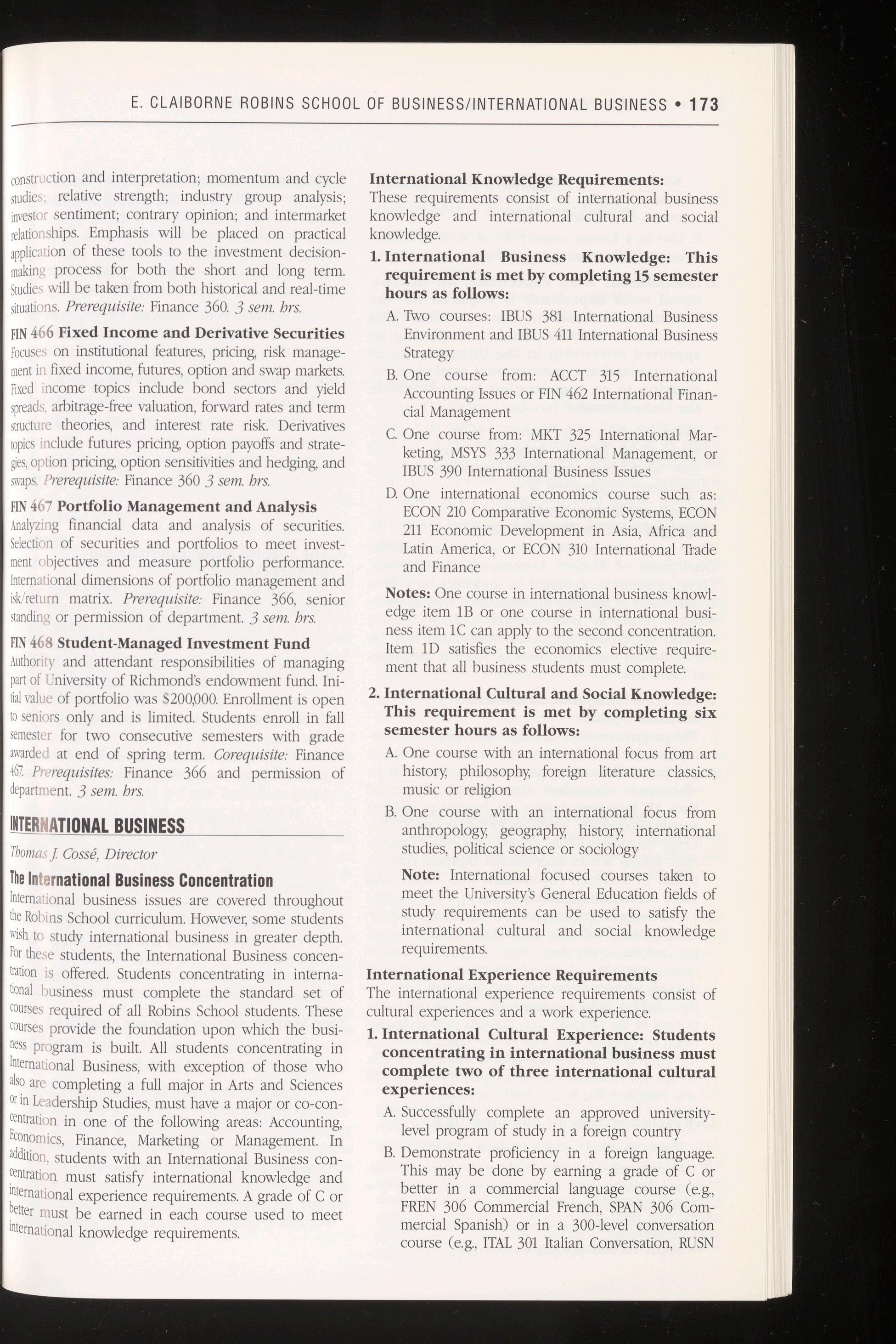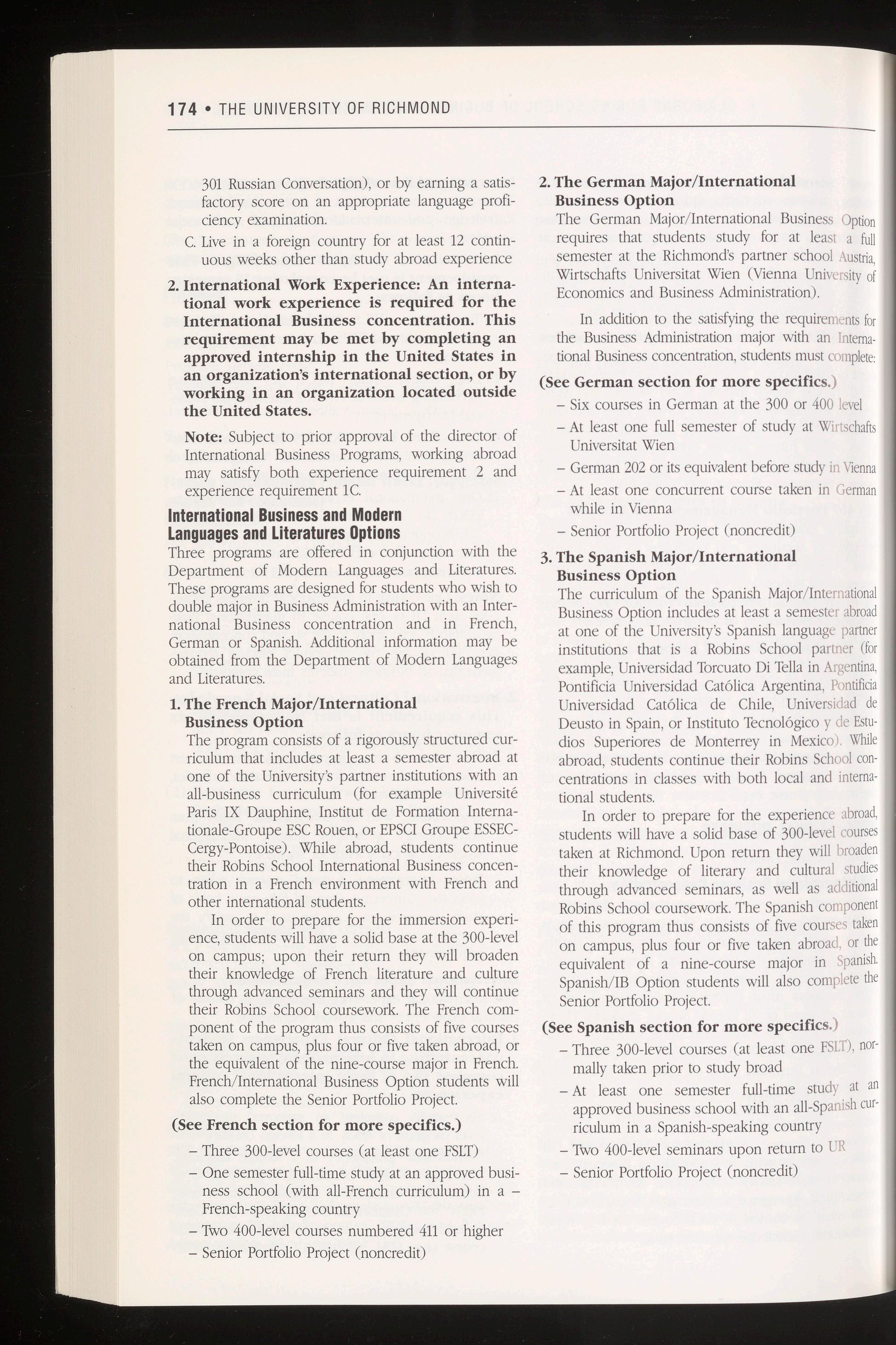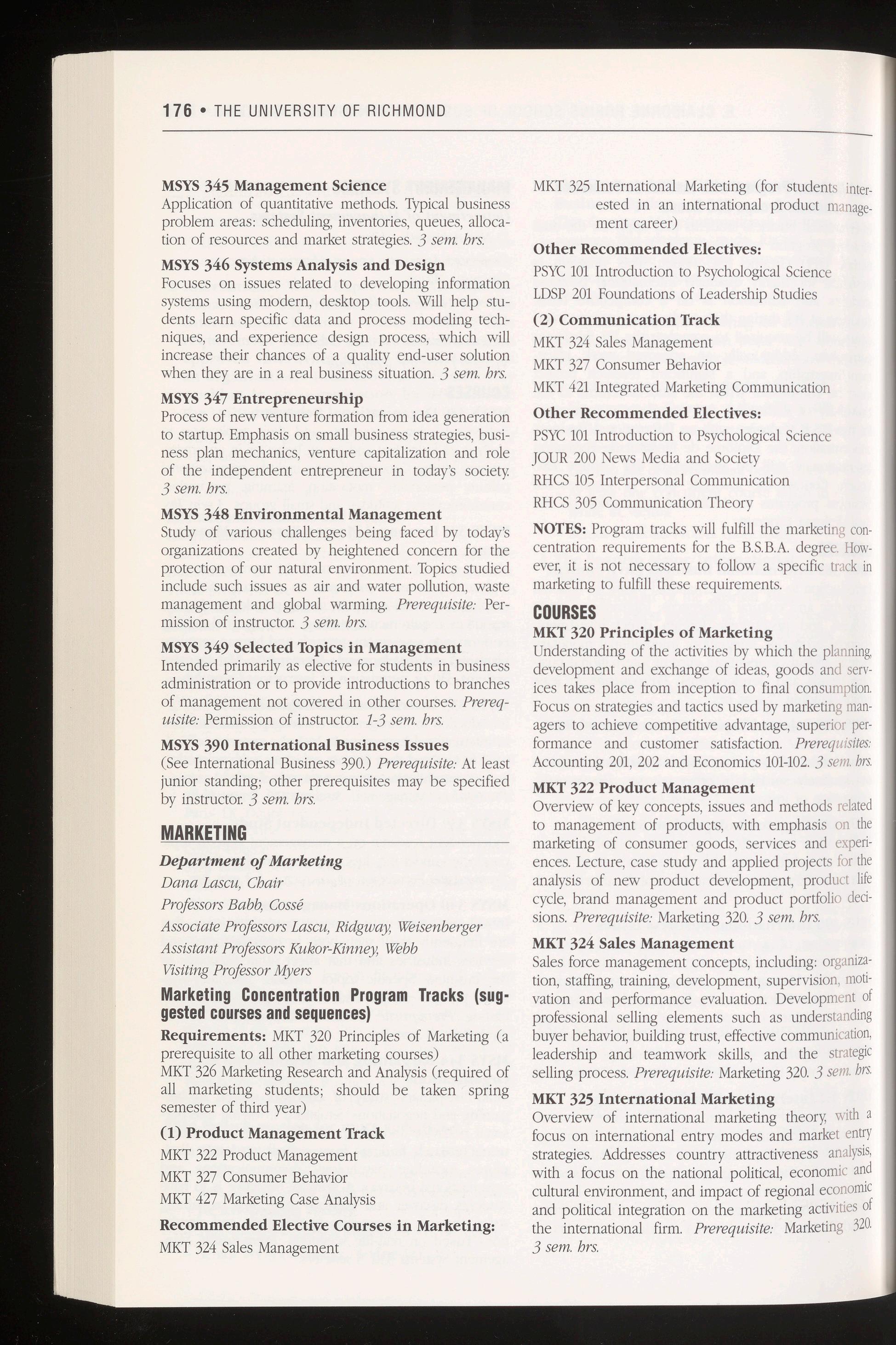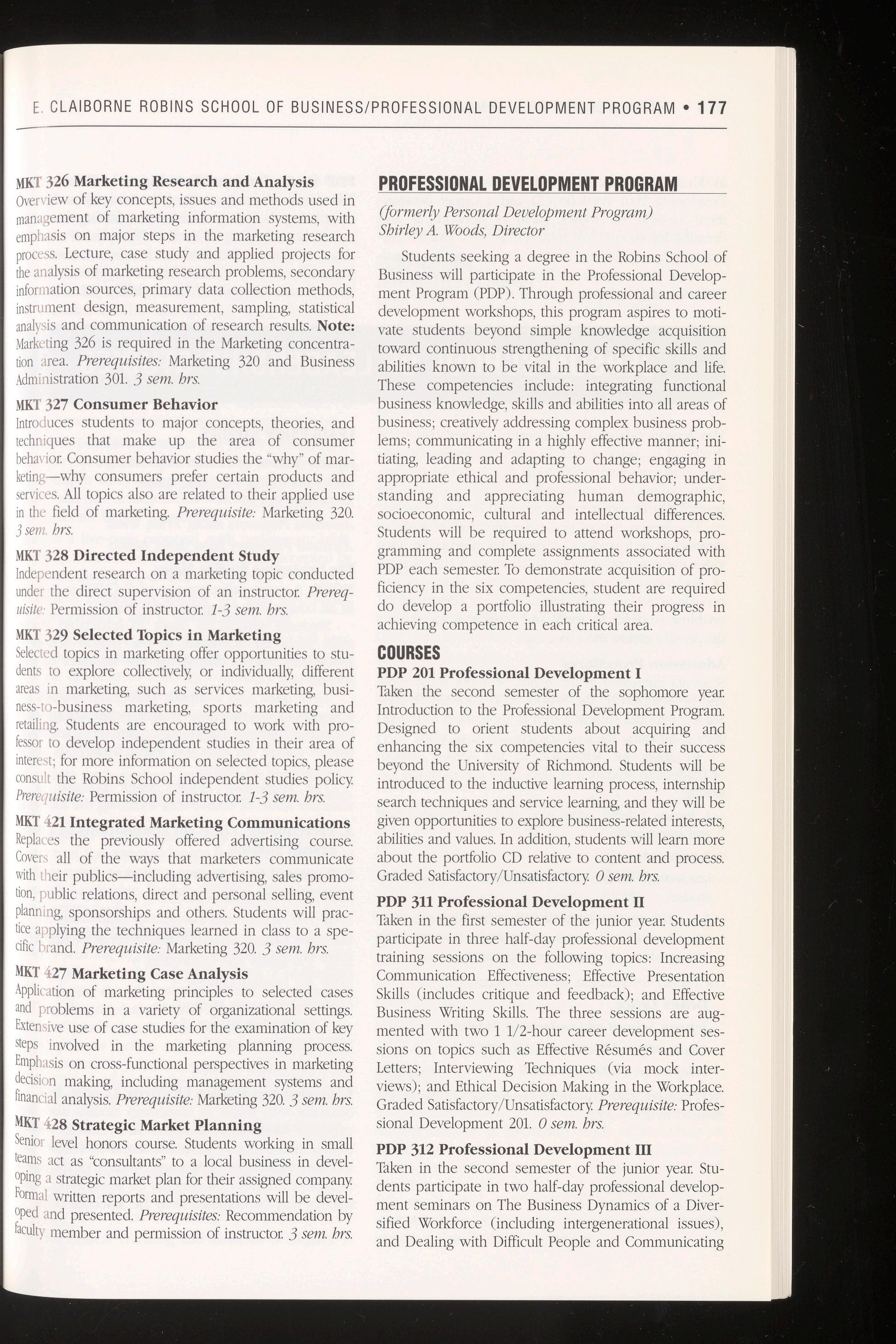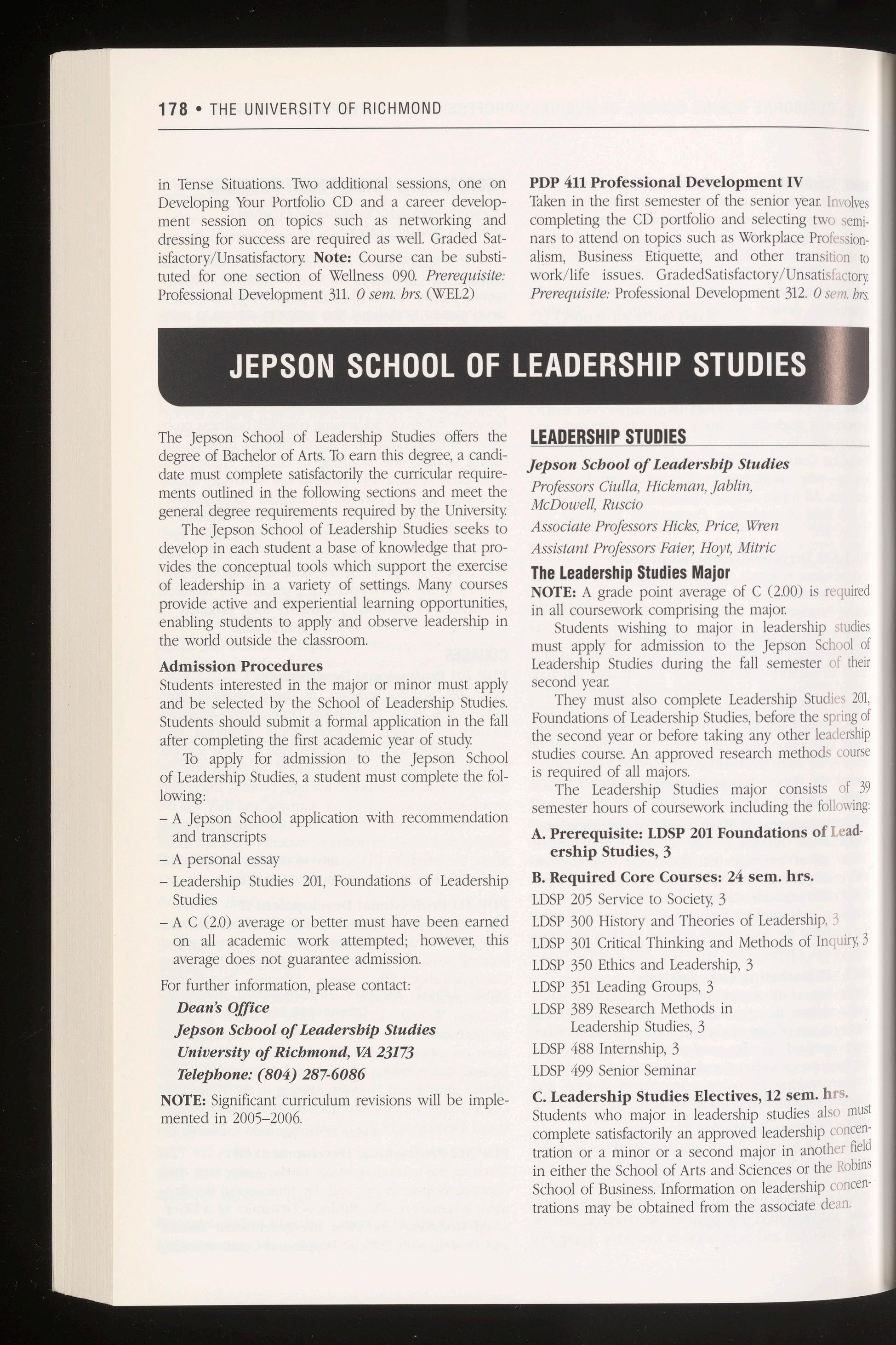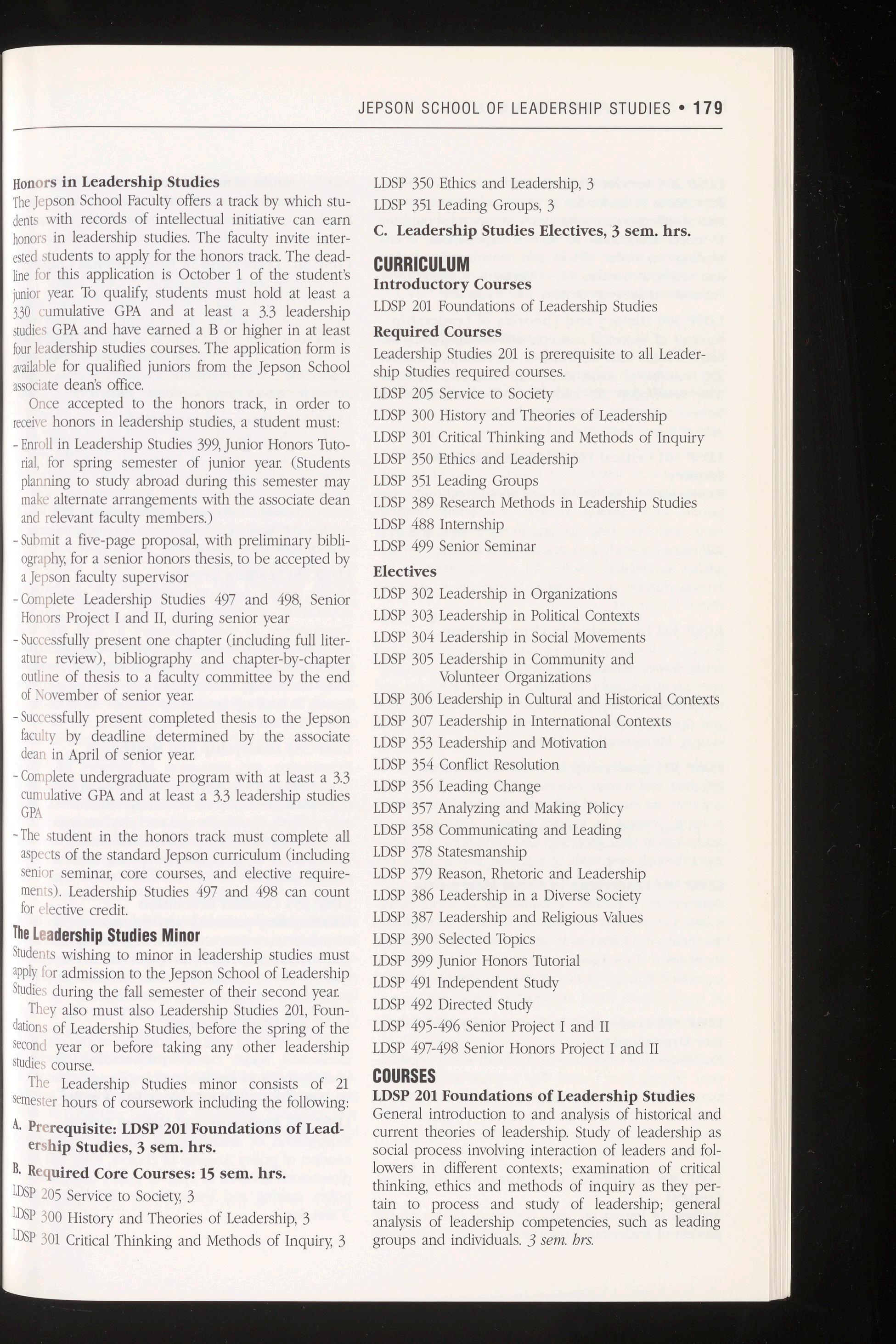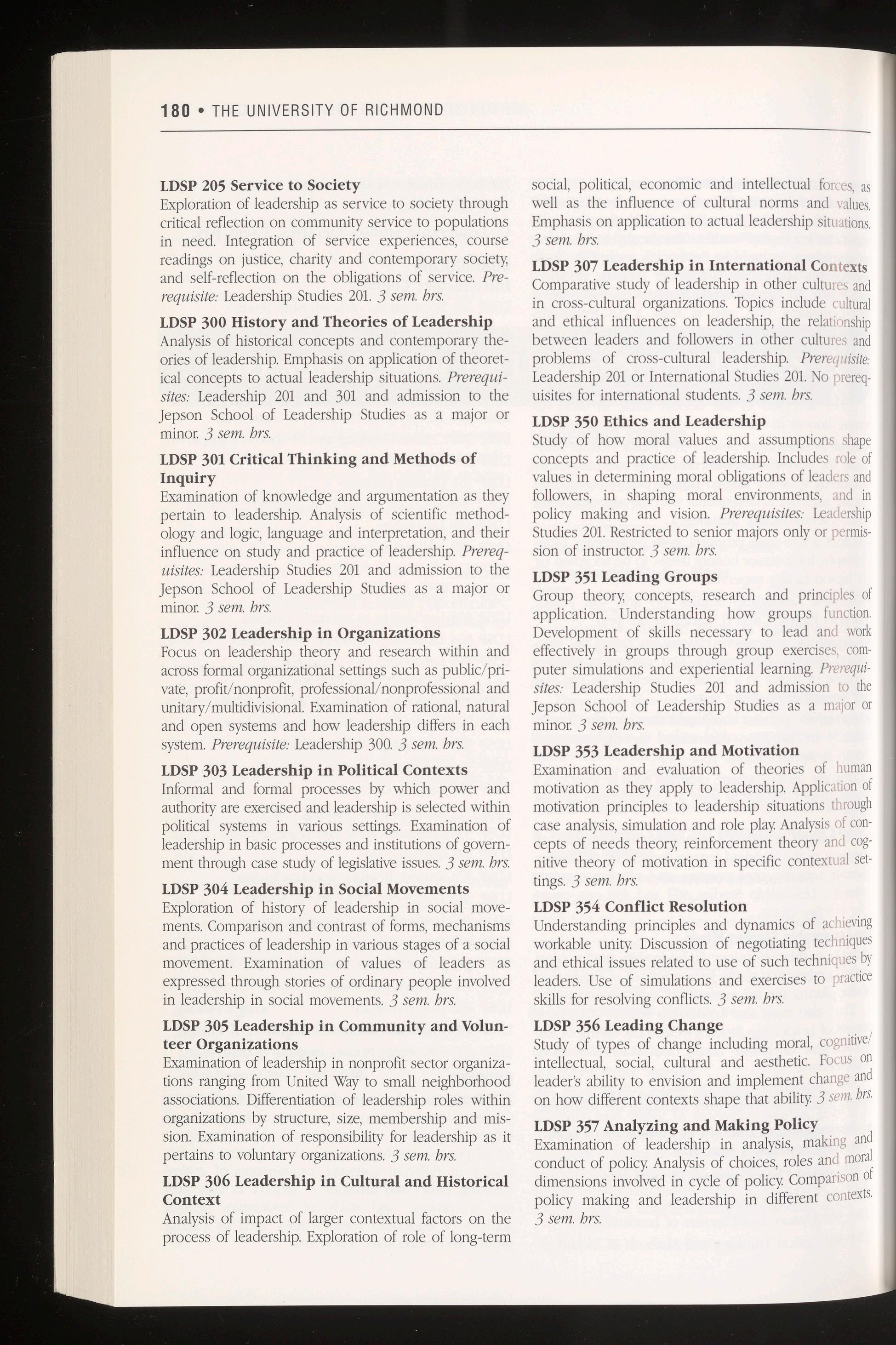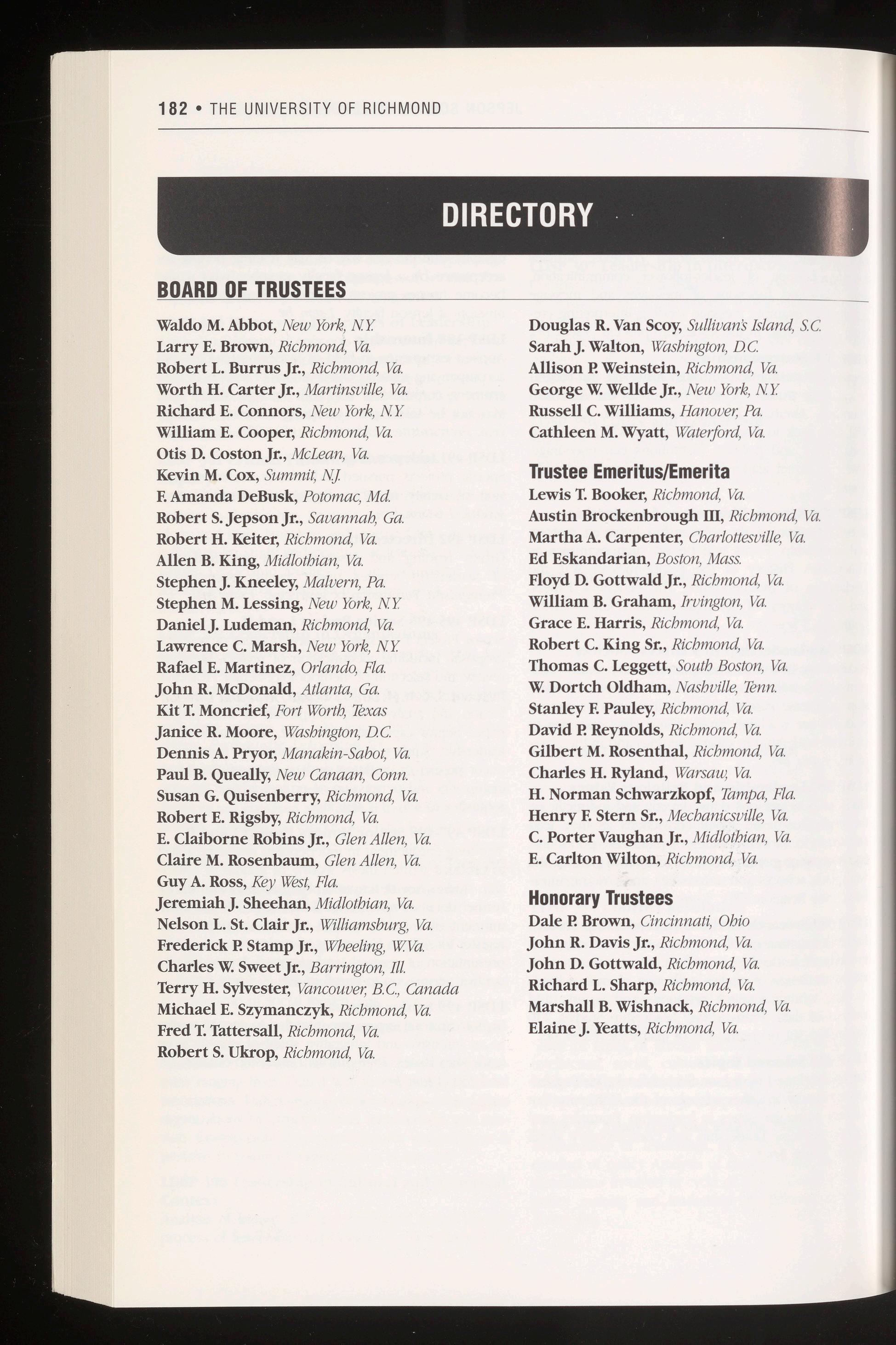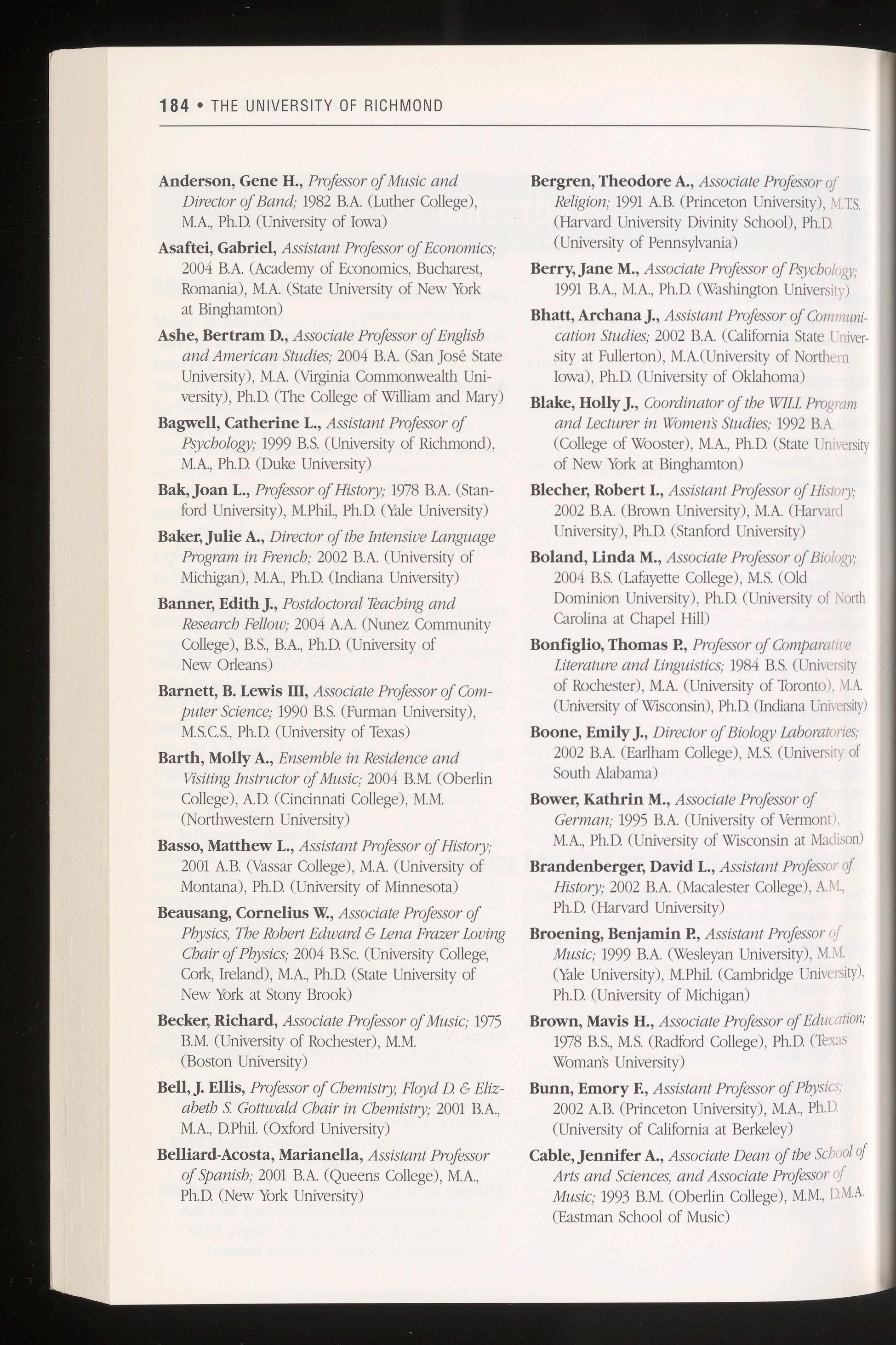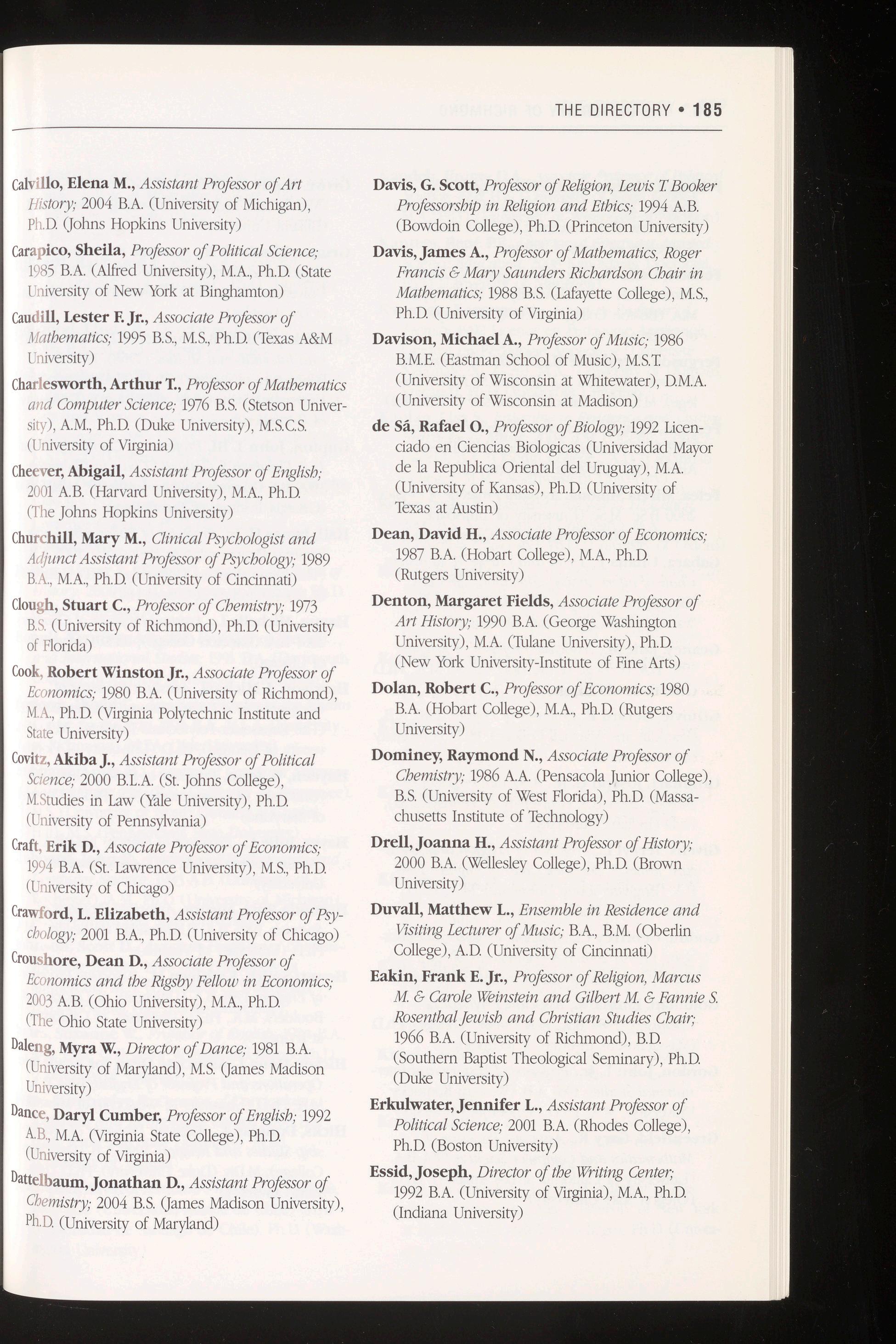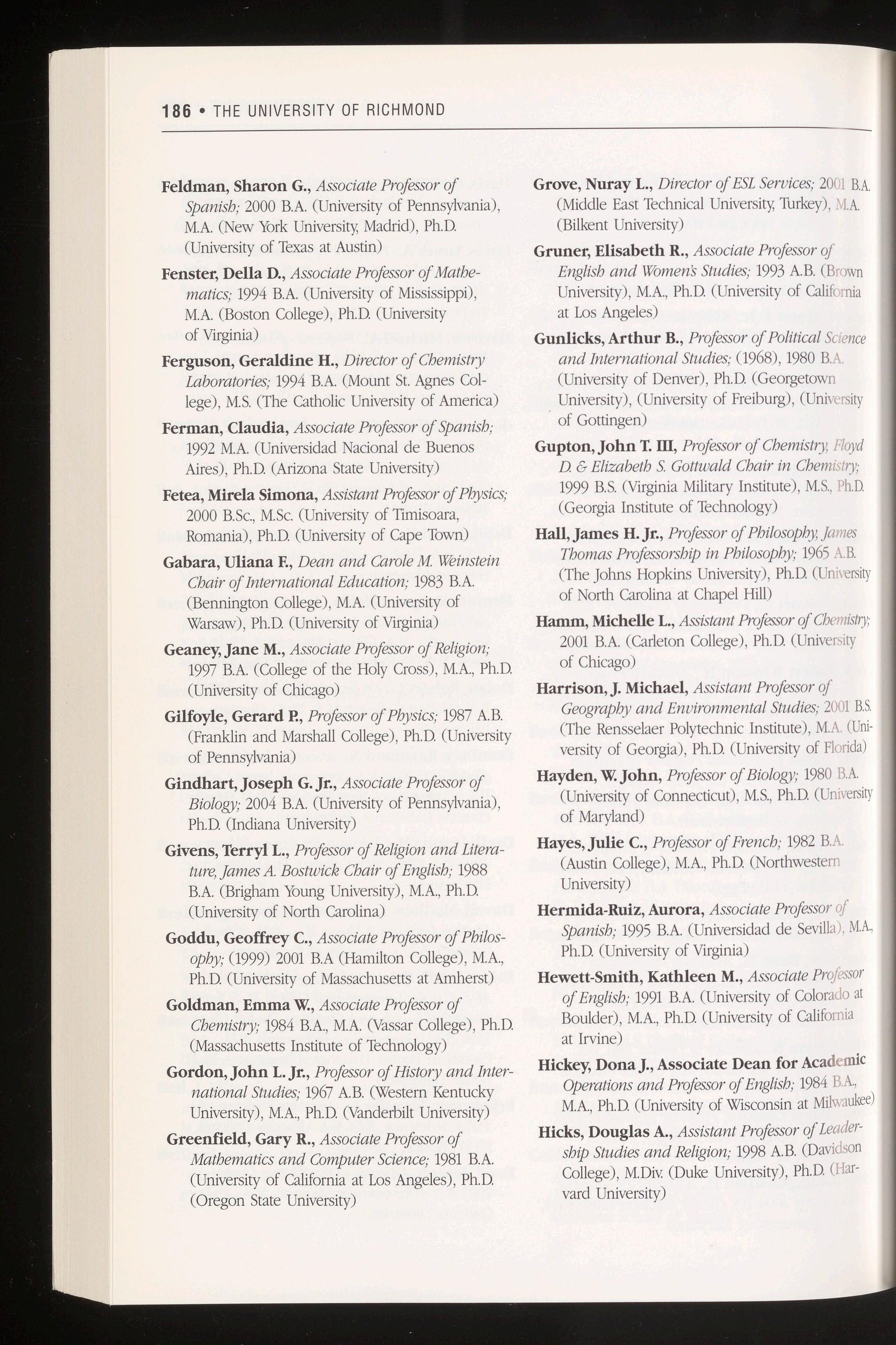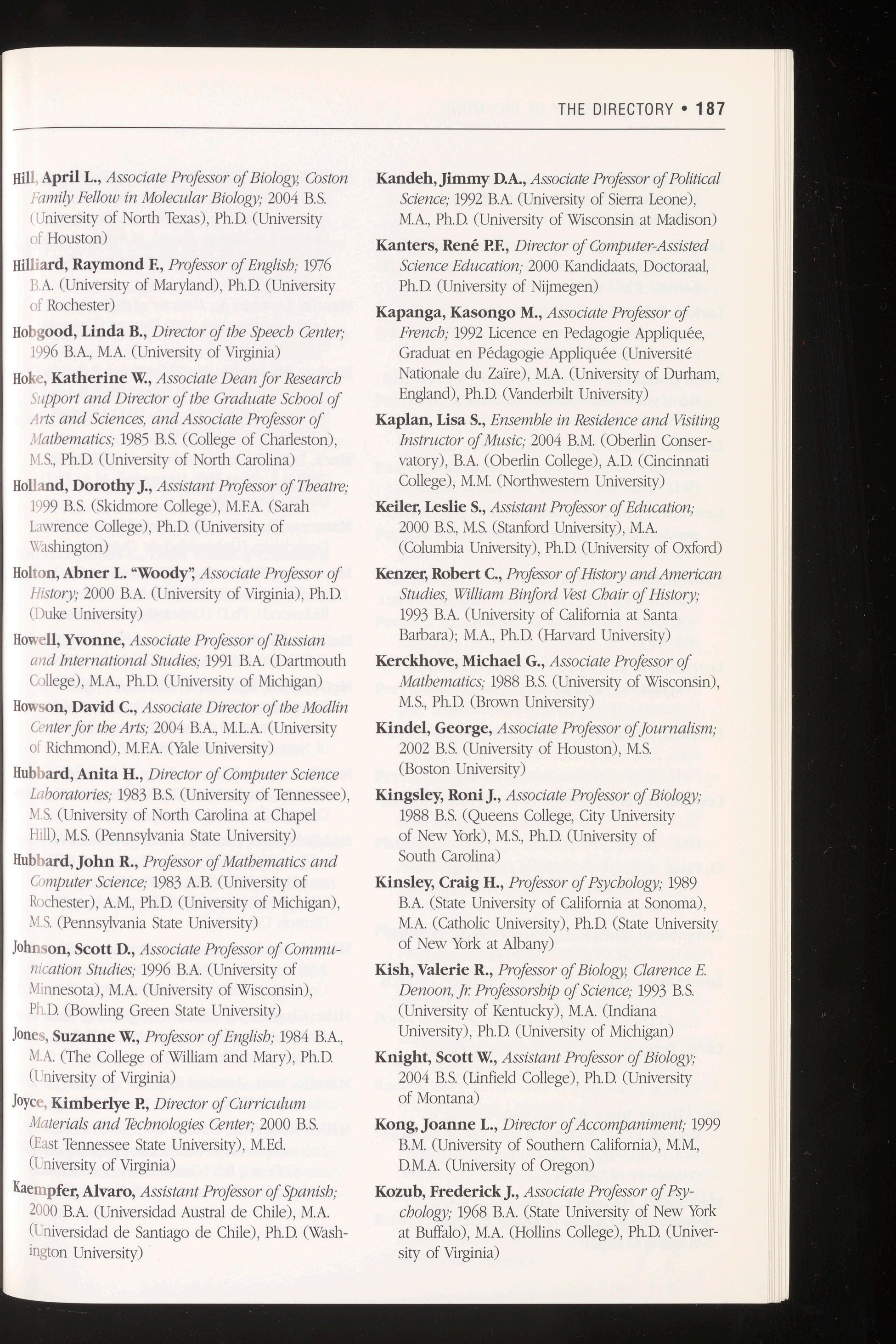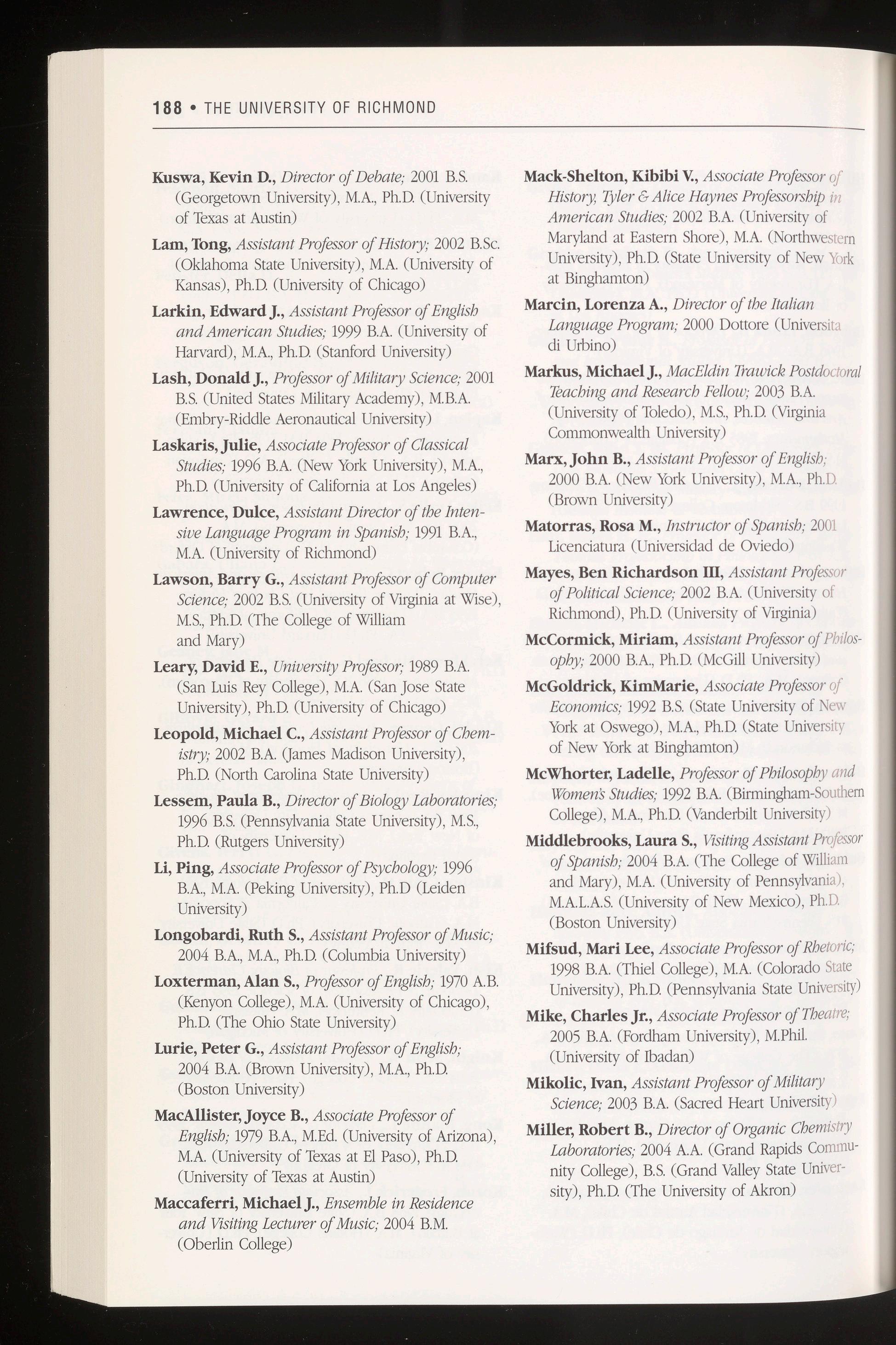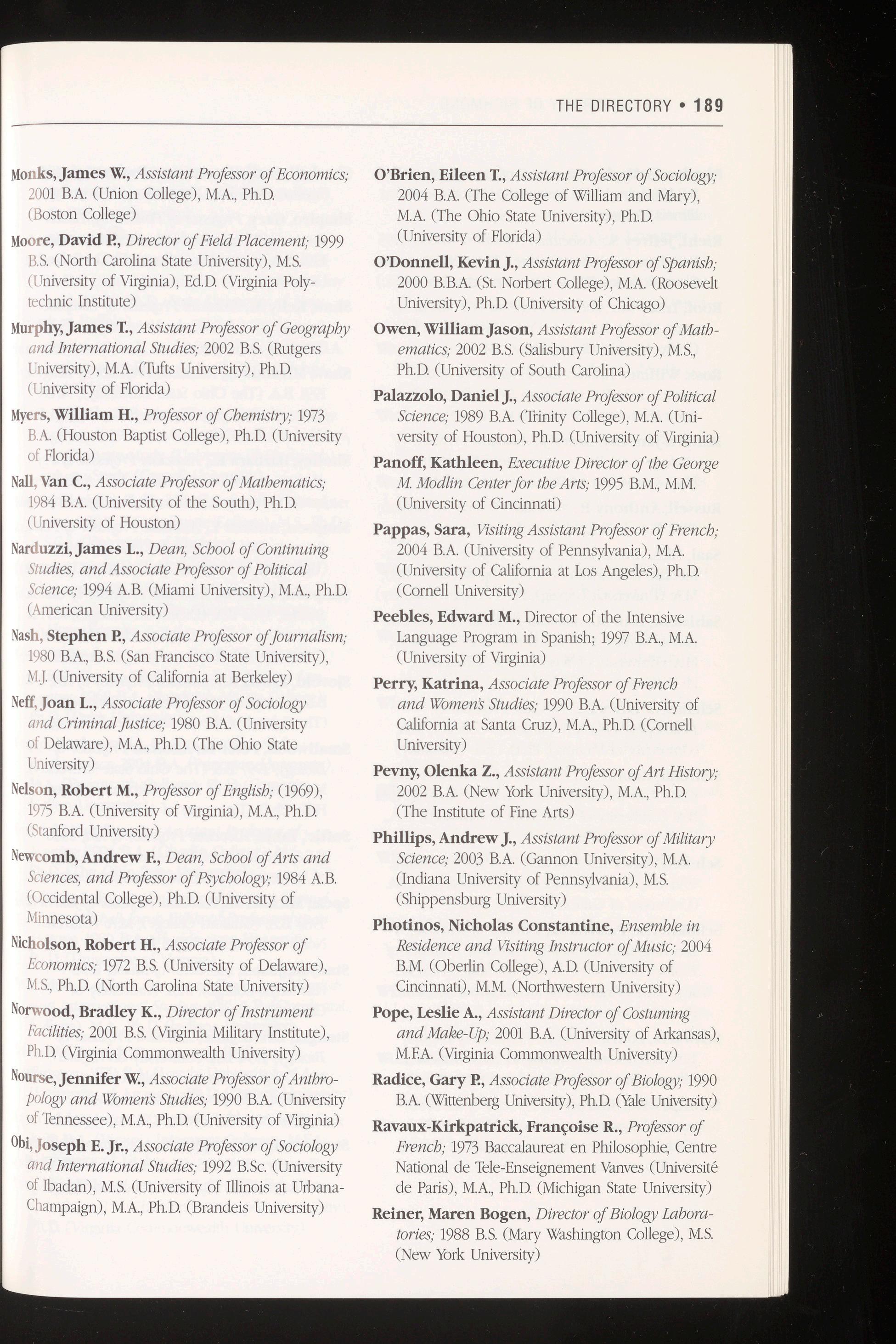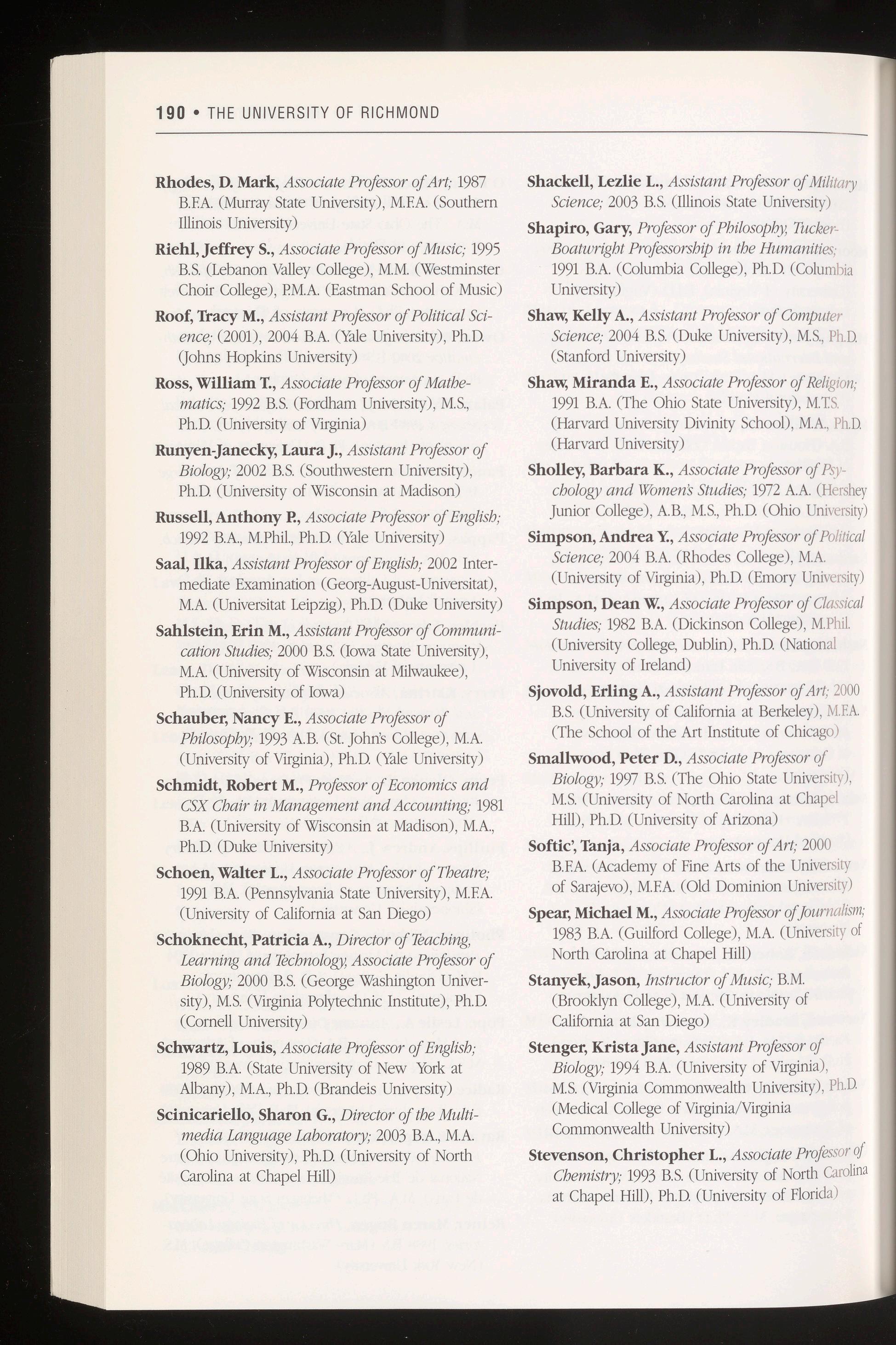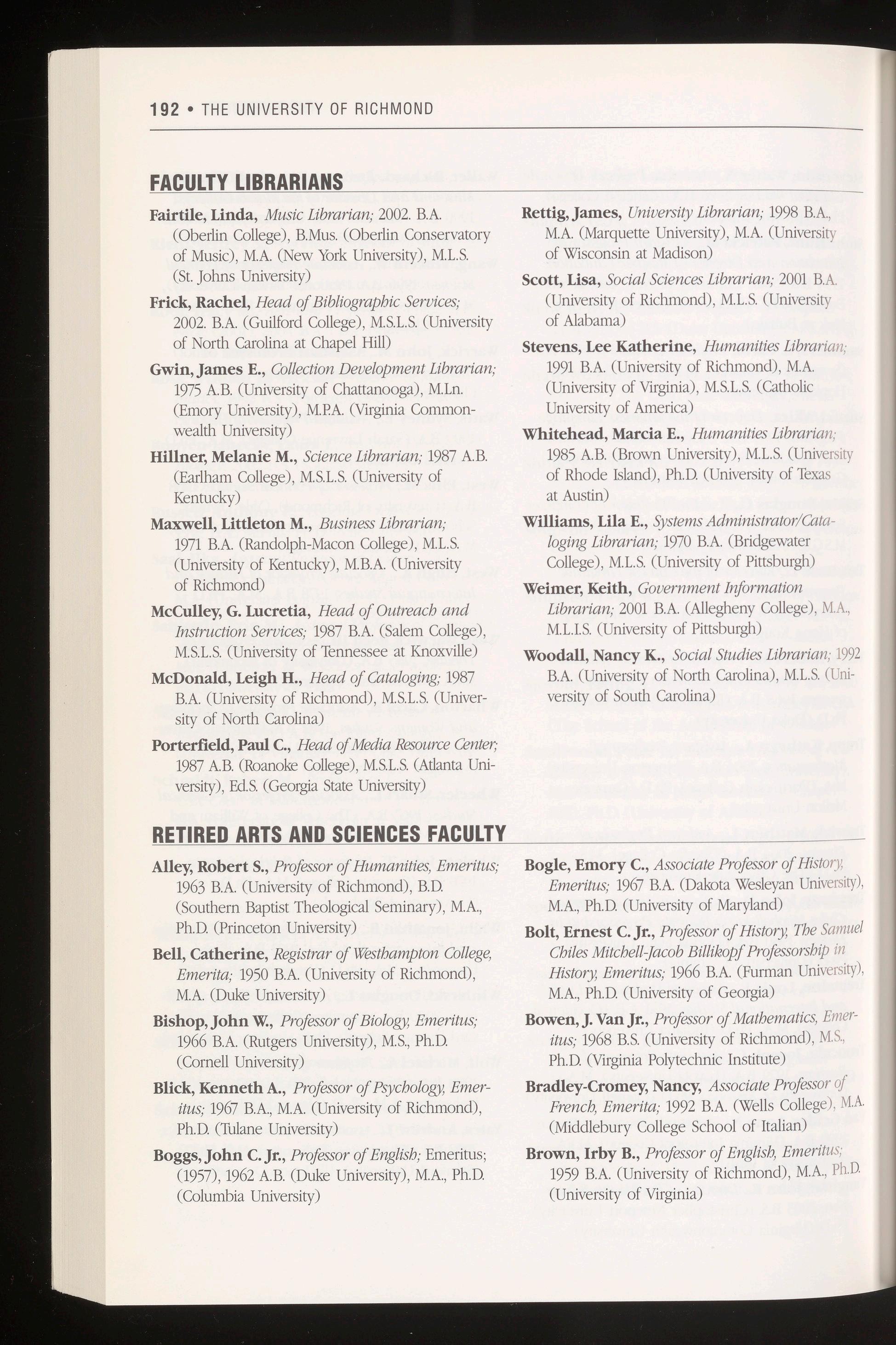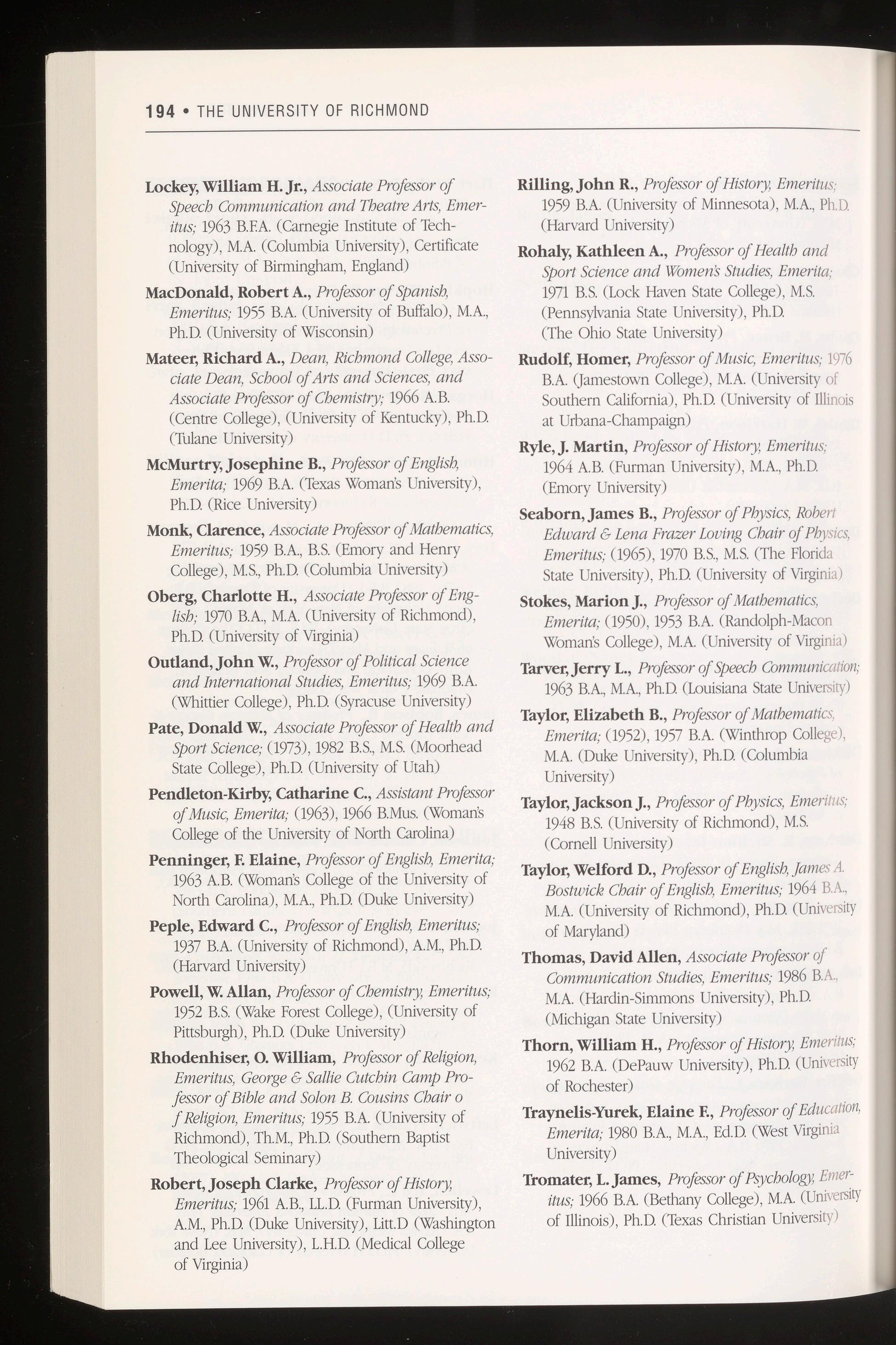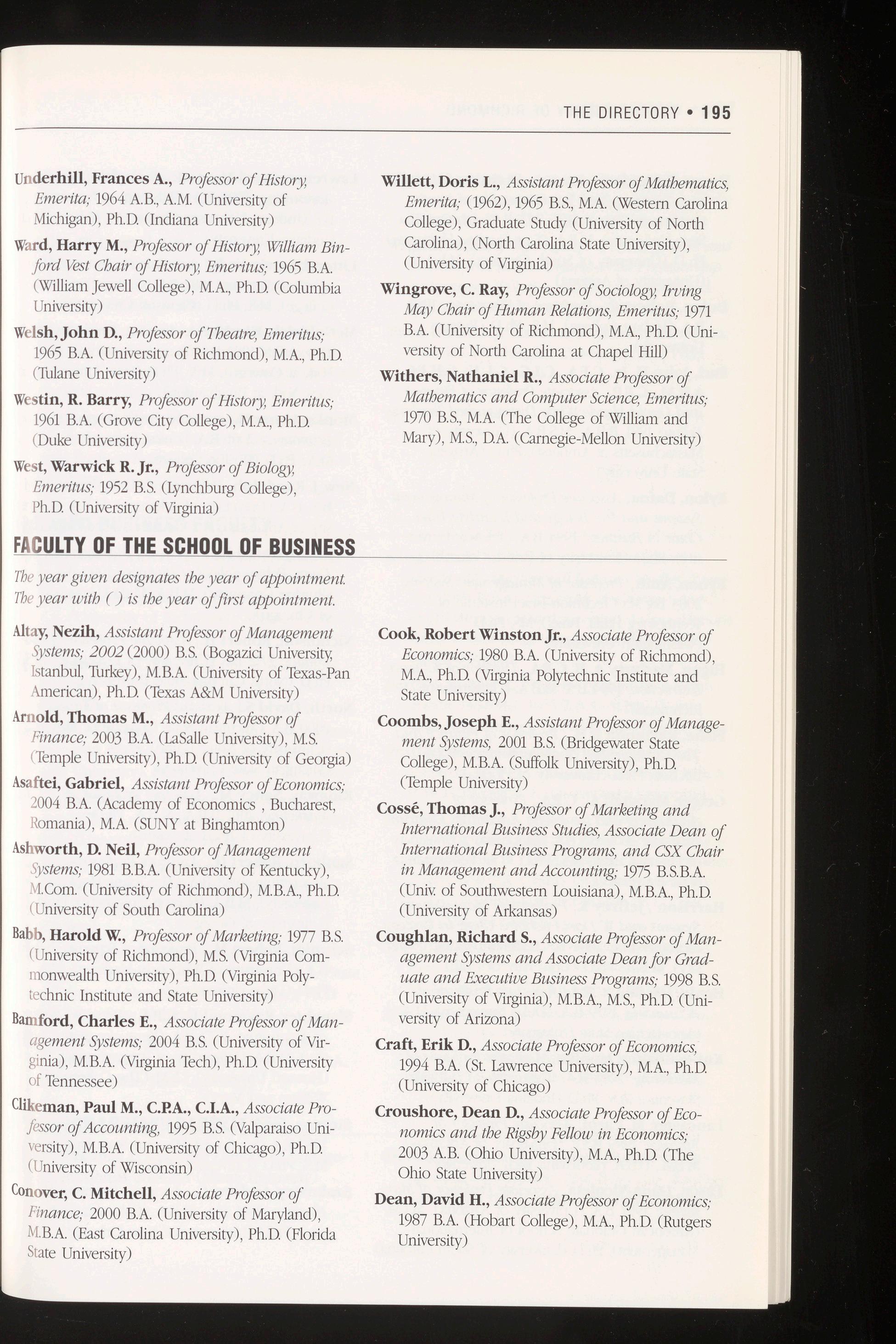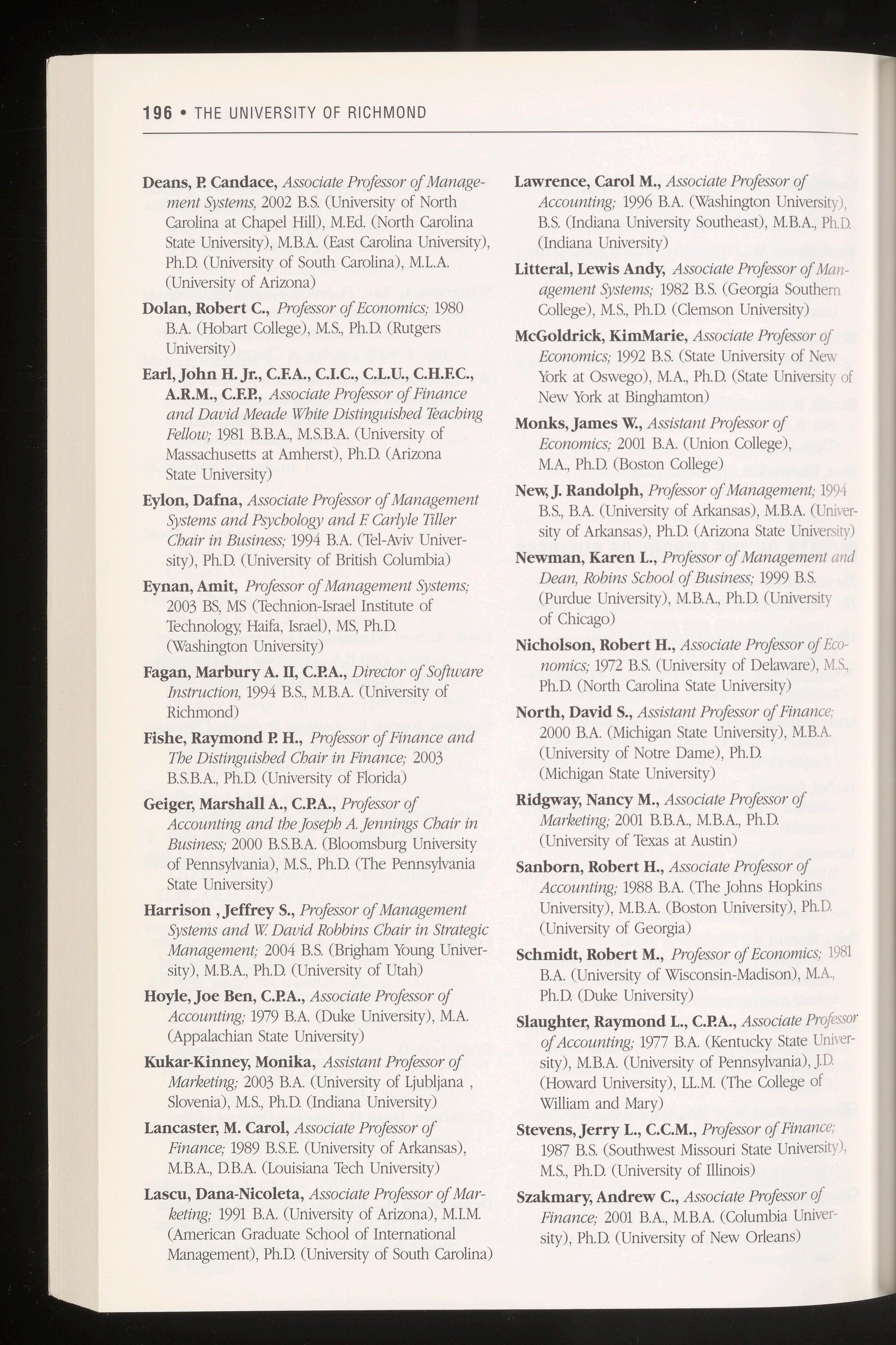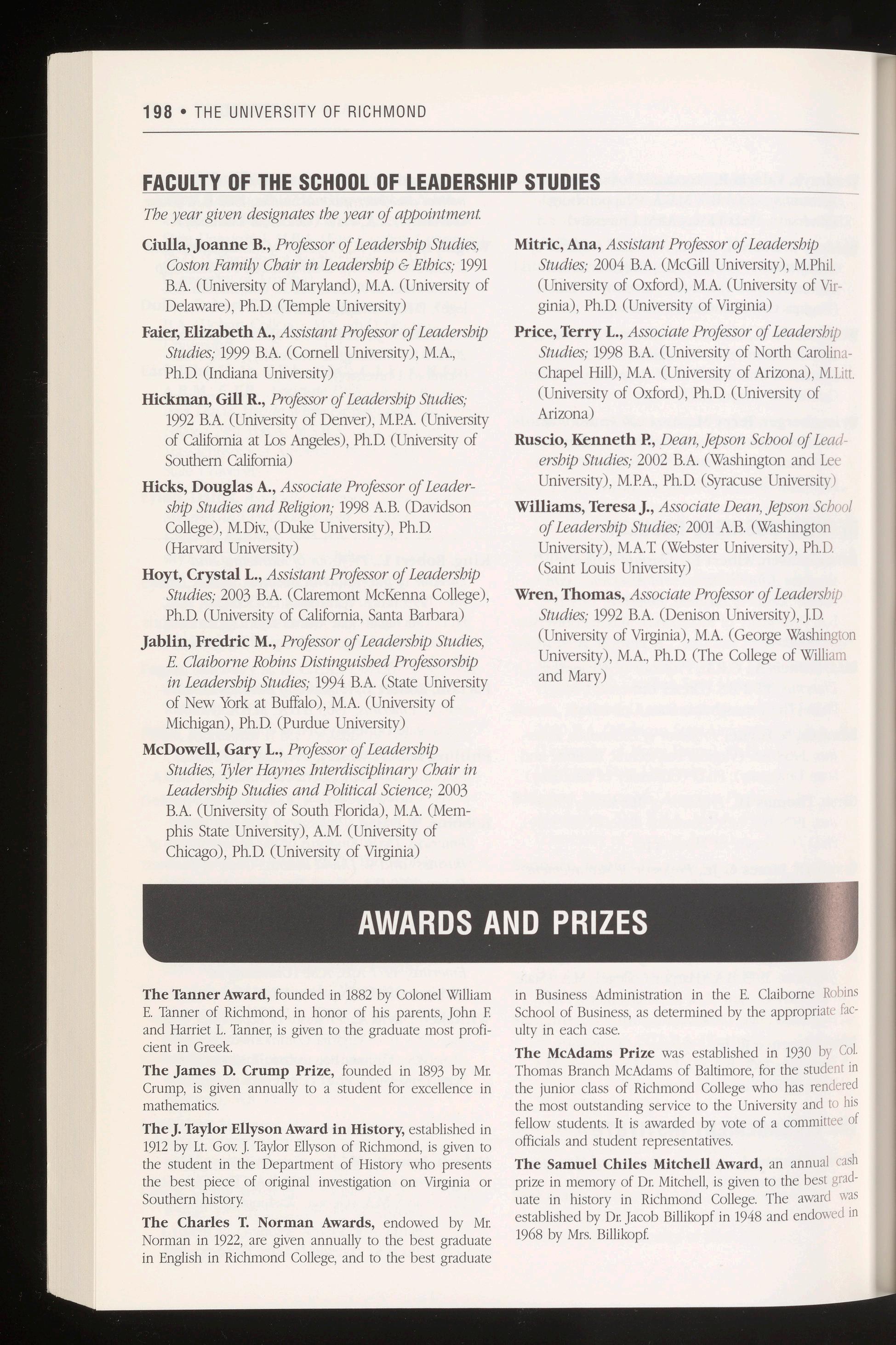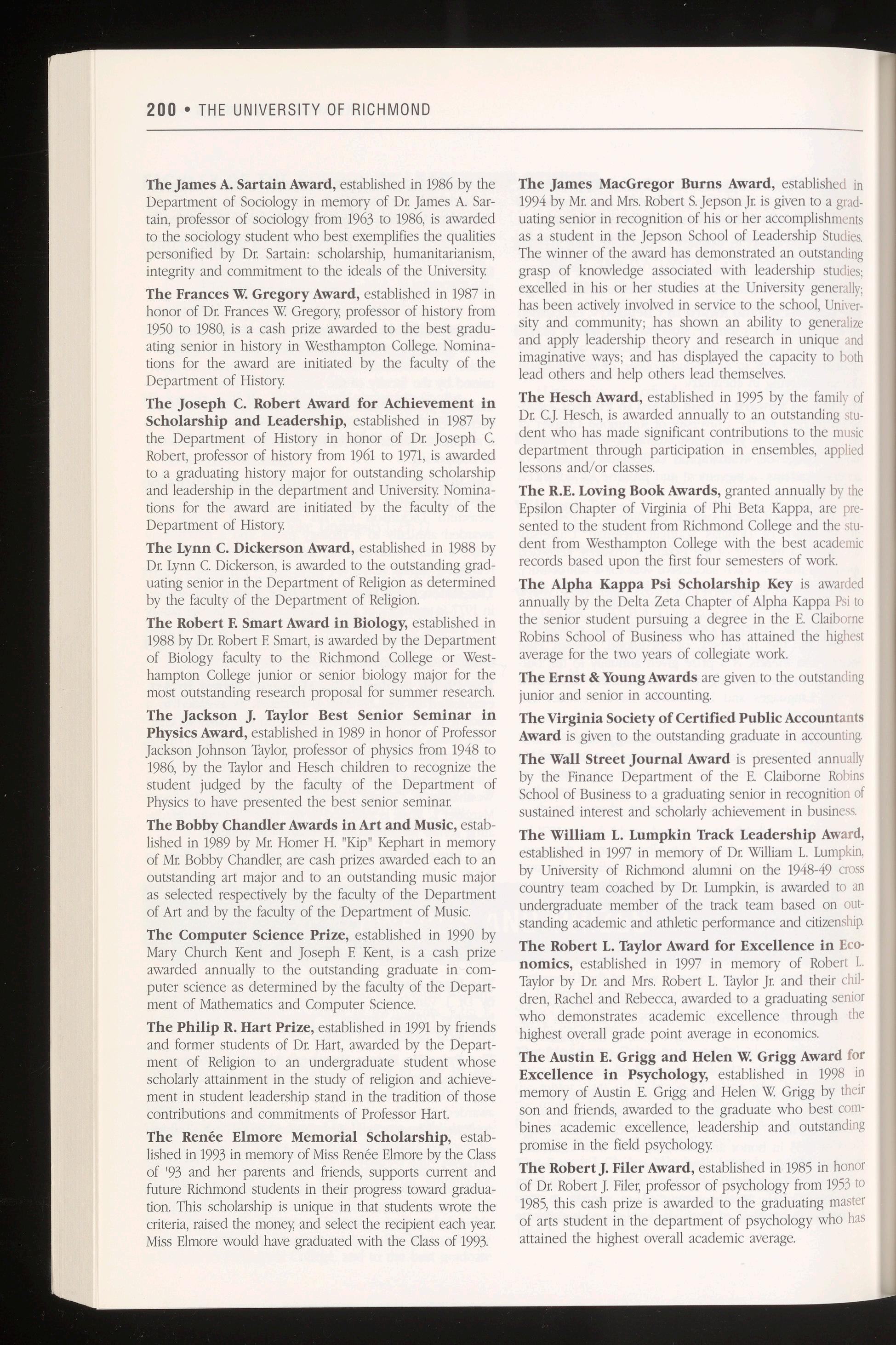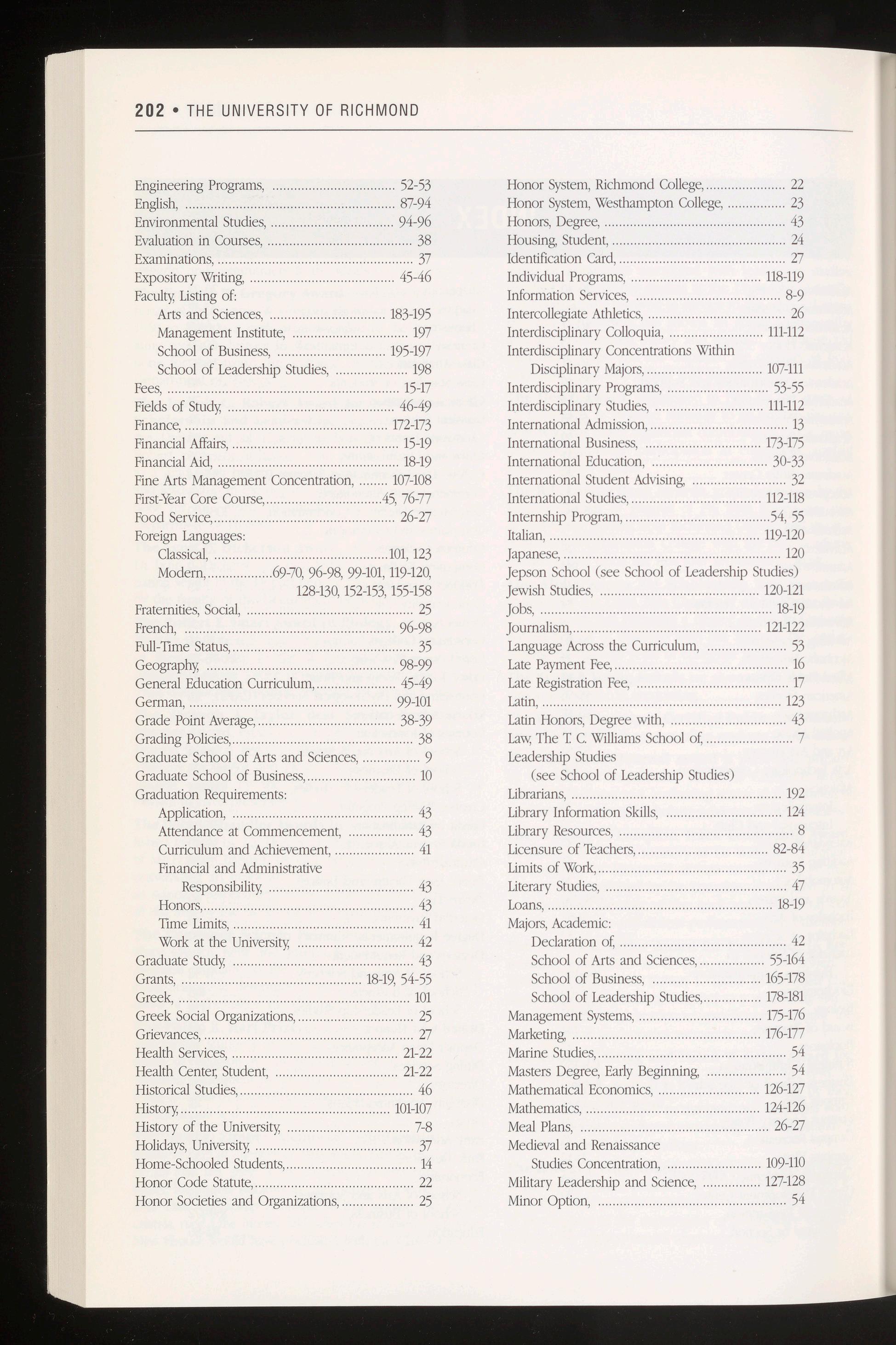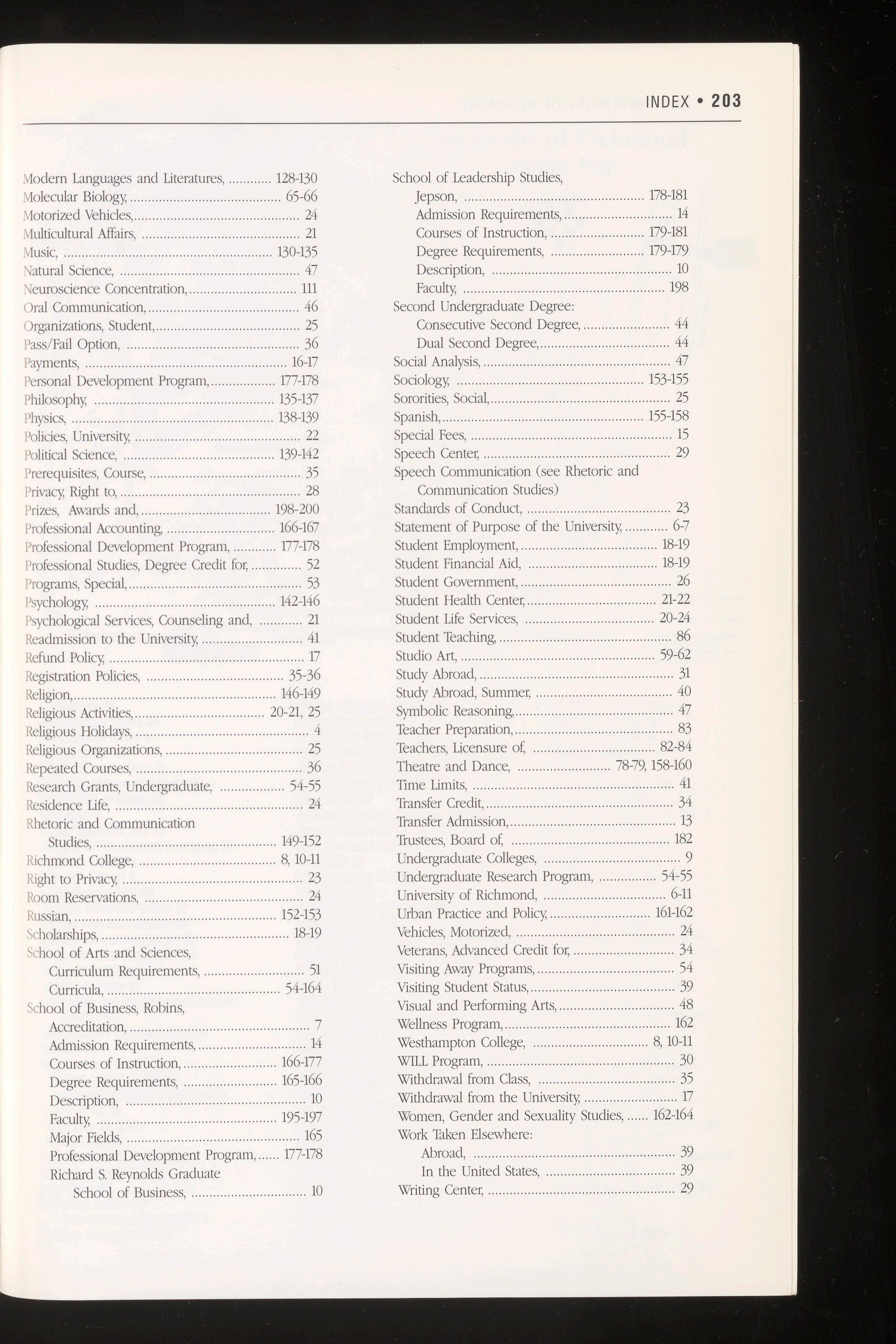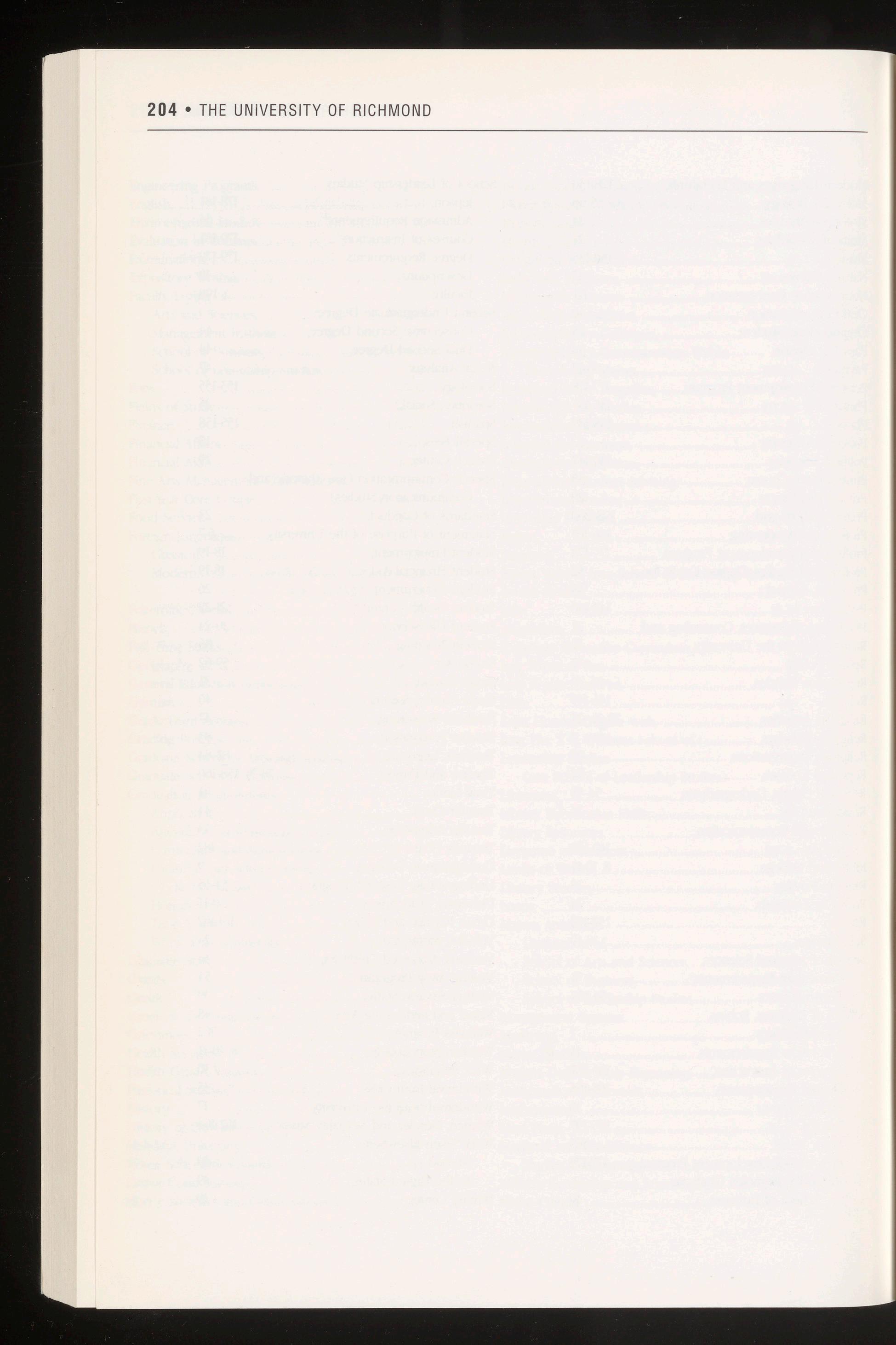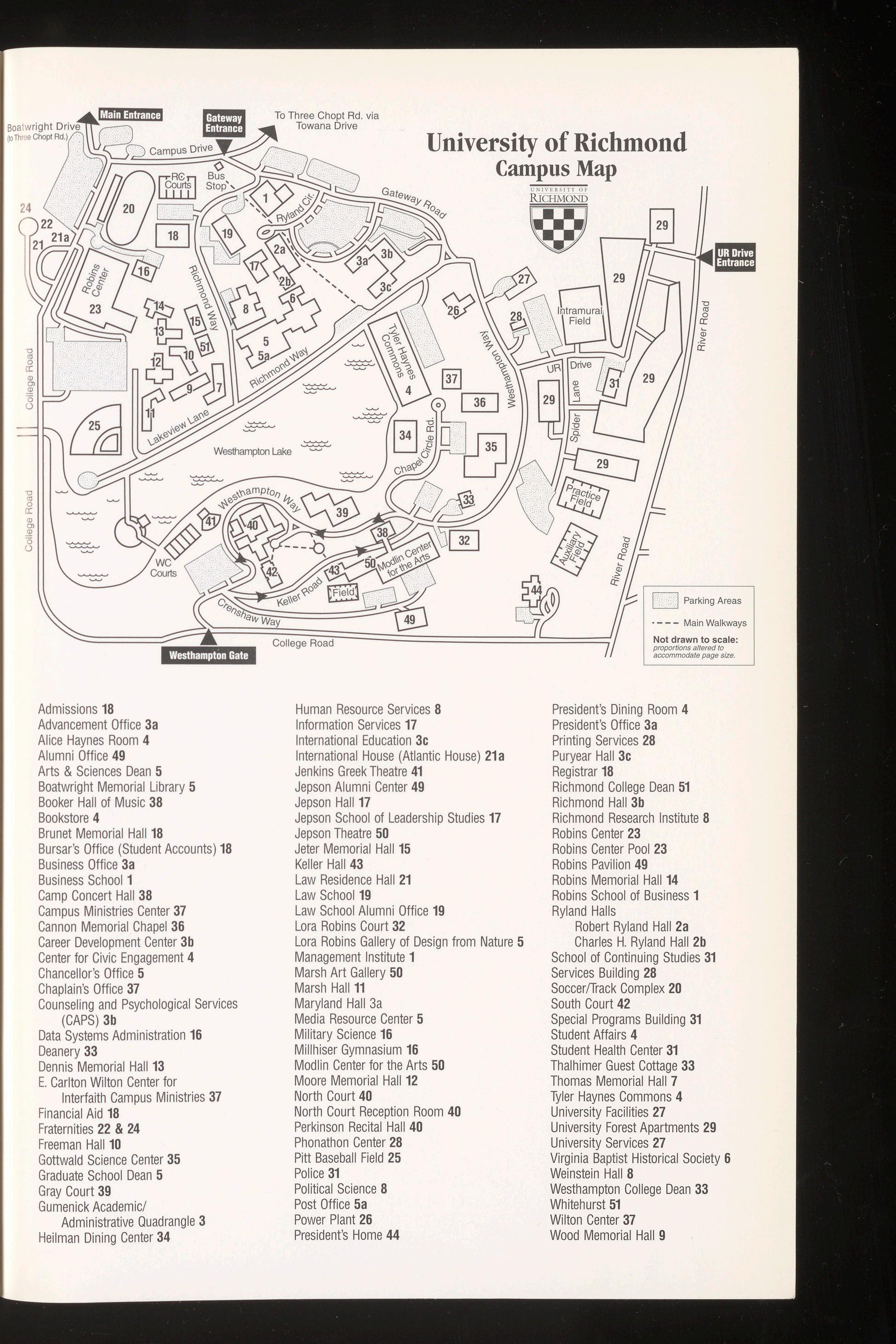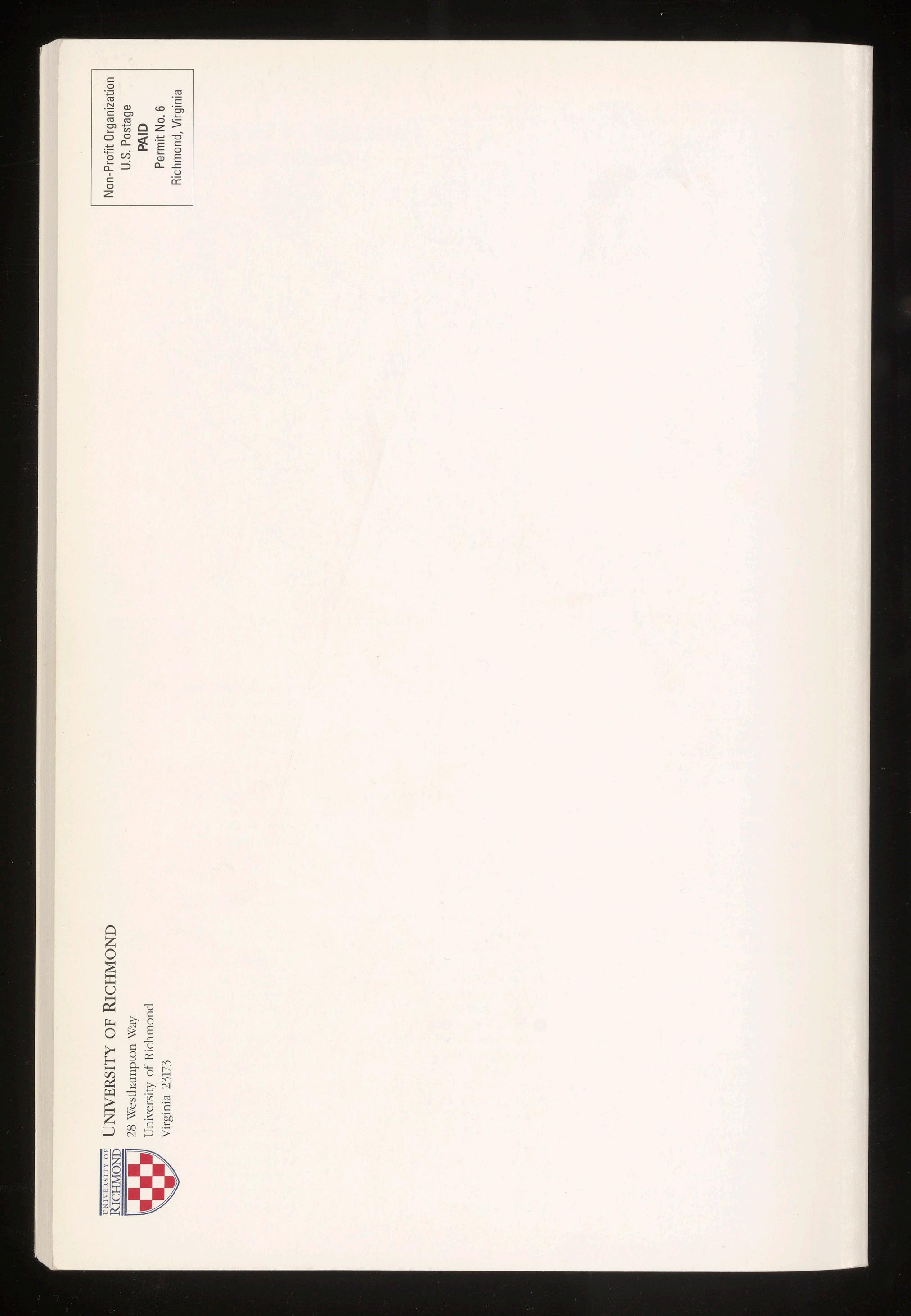ISCHOOLOFARTSANDSCIENCES:CURRICULA
This cha pter presents departmental majors and minors , and the courses, with their descriptions, offered by each department. In a course description where the course numbers for a two-semester course are separated by a hyphen, either half of the course may be taken independently for credit, and in any order unless a pre requisite is stated.
Note: Undergraduate courses at the University of Richmond long were numbered in the range 0-399, with 300 level being the most advanced. Beginning with d1e 1990 fall term , undergraduate course numbers may exte nd through the 400 level ; howeve1; not all departments have renumbered their courses. Therefore , it should not necessarily be concluded that a department w id1 400-level courses has more advanced offerings tha n a department having only 300- level courses as its highest.
IndividualInternship
Any acade mic d epa rtment may offer an individual internship und e r the following genera l de scription:
388 Individual Internship. Application of academic skills and theories in a se lec ted work environment, plus related acade mic work supervised by a member of the faculty. Pass/ fail grading may be designated by a departme nt for any or all enrollments. May be repeated; howeve1;no more than six semester hours in the same department may be counted toward the total number of hours required for a degree. Prerequisite: Permission of cle pa'rtment concerned. 1-6 sem. hrs.
Note: No more than 12 semester hours of internship of any kind may count toward the total number of hours require d for a degree . Stud ent Teaching and Theatre Arts Practica are not included in this policy.
AMERICANSTUDIES
Coordinator:Edward Larkin, English
Affili ated Faculty:
Thomas Allen, English
MatthewBasso , History
Akiba Covitz,Political Science
Abigail Cheeve,;English
Margaret Denton, Art and Art History
Jennifer Erkulwater,Political Science
WoodyHolton, History
David Leary, UniversityProfessor
RobertKenzer, History
RobertNelson,English
John Pagan, Law School
Ilka Saal, English
JasonStanyek, Music
Douglas Winiarski,Religion
Thomas Wi·en , Leadership
The core premise of American Studies is quite simple: no discipline or perspective can satisfactorily encompass the diversity and variation that have marked American society and cultu re from the very beginning. Therefore , the American Studies major is constructed as an interdisciplinary program that invites st ud ents to combine courses from a variety of academic fields in order to create their own, uniqu e study of America. Some may favor sociological, historical or political interpretations; others may be drawn to literary or visual modes of interpretation. However individual majors fashion their cou rses of stud y, each major will have an opportunity to engage a range of topics and faculty members in a discussion of what is entailed in the study of American society and culture.
TheAmericanStudiesMajor
Note: The grade point average of the coursework compr ising the major must be no less than 2.00 with no course grade below C- (1.70)
The major is divided into three major areas: American Identities , Culture and Representation, and Politics and Beliefs. In addition to the introduction to the major and the capstone se mina1; majors take one 300-level course from each of the three areas, and four other courses that must be from at least two differen t departments. We have coded our se minars and qualifying courses from other departments into these loosely defined areas.
The major requires nine courses for a total of 3236 semeste r hours se lected from the courses below and distributed as follows:
A. AMST201 Introduction to American Studies, 4
B. Seven American Studies courses at the 300-level* or higher
One from each area: American Ident ities, Culture and Representation , and Politics and Beliefs, 9-12
Four courses, 12-16 hours, at the 300-level' or higher (varies according to home deparu11ent). These must be taken from at least two different departments.
C. AMST400 Seminar in American Studies OR AMST401 Thesis, 4 ('History coursestaken al the 200 level may count as 300-level courses.)
American Studies majors also may choo se to pursue a concent ration in Ethnic Studies. Students choosing this option would be required to take five courses focusing on the questions of ethn icity All of these courses need not study the same e thnic group (i.e., African-American, Native American, Latino/ Latina, etc.).
COURSES
AMST 201 Introduction to American Studies
Surveys multidisciplinary nature o f American Studies by focusing on methodologies , sources, themes and major ideas used when examining American culture. 4 sem.hrs.
AMST304 Early-American Women
Fulfills American Identities sem inar requirement. (See History 300.) 4 sen1.hrs.
AMST307 American Society and Culture 1920-1950: Jazz Babies, Bread Lines and Riveting Rosies
Fulfills American Identities or Culture and Representation seminar requirement. (See History 206.) 4 sem. hrs.
AMST313 History and Culture of the U.S. West: Exploring the Myth and the Realities (See History 302.) 4 sen1.hrs.
AMST315 The Civil War in Film and Literature
(See History 301.) Fulfills Culture and Representation seminar requir ement. 4 sem. hrs.
AMST321 American Immigration and Ethnicity
Examination, through historical and literary materials , of challenges confronting and po sed by waves of immigrants who shaped American civilization. Prerequisite:American Studies 201, or at least junior status, or permission of instru ctoi: 3 sen1.hrs.
AMST323 Psychology in American Society and Culture
Fulfills Culture and Re pres entation Seminar requirement. (See Psychology 437; same as History 303.) 4 sem. hrs.
AMST325 Narratives of the Discovery and Conquest of the New World
Almost from the moment European exp lorers encountered it, the new world spa rked the imagin ation of its discoverers and spawned a large literatur e. That lite rature was as varied as the land it described: from travel narr atives and histor ies to novels , plays and poems. Studies ho w ea rly travelers depicted the new world and its inhabitant s and how the discov e ry challenged and reshaped Europeans' notions of th e mselves and the world. Fulfills Culture and Repre se ntation Seminar requ irement. Prerequisite:American Studies 201 or permission of instructm 4 seni. hrs.
AMST373 Witchcraft and Its Interpreters
Fulfills American Ide ntities and Politics and Beliefa seminar requirement. (See Religion 373.) 3 sem. hrs.
AMST375 Cults, Communes, & Utopias in Early America
Fulfills Politics and Beliefs seminar requirement. (See Religion 375.) 3 sen1.hrs.
AMST381 Community Problem Solving Semin ar
Combines internship with rea ding and discuss ion about community problems from multidisciplin ary perspectives. Area of study wi ll vary according to topic of the cou rse. Prerequisite:American Studies 201 or junior or senior status. 3 sem. hrs.
AMST398 Selected Topics
Varying multidisciplinary topics related to Ameri can Studies. Area of study will vary according to topic of the course 1-4 sem. hrs.
AMST400 Seminar in American Studies
Designed primarily as capstone experience for American Studies major s, seminar will focus on topic in American culture that can be approached through se1·eral disciplines. Prerequisites:American Studies 201. junior or senior status and at least two American Studi es sem in ars. 4 sem. hrs.
AMST401 Thesis
Thesis project involving primary sources design ed. resea rched and written by stude nt und er faculty super· visio n. Prerequisites:American Studi es 201, junior or senior status, and an approved prospectus with bibli· ography. 4 sem. hrs.
ANTHROPOLOGY
Department of Sociology and Anthropology
Joan Neff, Chair
AssociateProfessorsNeff,Nourse , Obi, Wharton
Professionalsfrom thefield also are employed as adjunct faculty. Upper-levelcoursesare taught on a rotating basis.
Note: Th e grade point average of the anth ropol og\' coursework comp rising the minor must be no less than 2.00 with no course grade below C-(1.7).
TheAnthropologyMinor
Anthropo logy 205 and 15 additi ona l se mester hour s of anthropology.
COURSES
ANTH 205 Introduction to Cultural Anthropology
The various ways in which peop le make cultur~ meanin g out of their lives, especia lly in non Western cultures. Cross-cultural perspective on soc ial structure religion, economy and politics. 3 sem. hrs.( FSSA)
ANTH 300 Gender in Cross-Cultural Perspecti ves Cross-cultural analysis of masculinity and femini nitf Divers ity and variation. 3 sem. hrs.
ANTU 301 Dependency and Development:
An Introd uction to the Third World
(See International Studies 301.) 3 sem. hrs.
ANTU 304 Ritual, Witchcraft & Divination
Role of religion in tribal, peasant and industrial cultures including myth, ritual, symbolism and relation of religion to social structure. 3 sem. hrs.
ANTU 306 Leadership in Cultural and Historical Contex t
( SL Leadership 306.) Prerequisites:Anthropology 205 or Sociology 301.3 sem. hrs.
ANTU 307 Native American Heritage
Historical deve lopment, culture, variability and present issues of Native Americans north of the Rio Grande. 3 sem. hrs.
ANTU 308 Peoples of Latin America
Anthropological overview of Latin American cultures and subculwres, including close studies of particular pre-Columbian civilizations and conte mporary tribal peoples, peasants and urbanites. 3 sem. hrs.
ANTU 310 Tribe, Nation, World:The Anthropology of Globaliza tion.
(See International Studies 310.) 3 sem. hrs.
ANTU 326-327 Directed Independent Study
Pr 'requ isites: Anthropology 205 with a grade of Cor above and permission of the department chair. I 3 sem. hrs.
ANTU 336 Big Men, Chiefs and Presidents:
The Anthropology of Politics
Power, authority and conflict in cross-cultural perspectiw, especially in preindustrial societies. Development of theory in political anthropology; types of political systems; evolution of political systems; contemporary theory.3 sem. brs.
ANTU 338 Peoples of Africa
Anthropologicalapproach to history,economics,kinship, religion and gender in various Africanareas. 3 sem. brs.
ANTU 339 Peoples of the Pacific Melanesian, Polynesian, Micronesian. Anthropological approach to history, economy, kinship, religion and gender relationships.3 sem. hrs.
ANTU 340 Peoples of Southeast Asia
Broadly covers cultural diversity and continuities of mainland and island Southeast Asia. Religion, gende r colonialism and economics will be discussed in general terms. 3 sen1.hrs.
ANTU 379 Selected Topics
Examples include Marriage and Kinship, People of India,and others arranged by the department. May be repeated for credit if topics diffet: 1-3 se111.hrs.
ANTU 388 Individual Internship
Supervised independent field work. Prerequisites: Anthropology 205 with a grade of C-or above, six additional hours of anthropology, and permission of department chait: 3 sem. hrs.
ANTU 389 Research Practicum
For junior- or senior-level students. Work closely with professor on research project: design, data collection, data analysis. Prerequisites:Anthropology 205 with a grade of C-or above, six additional hours in anthropology,and permission of department chair.1-3 sem.hrs.
ARTHISTORY
Department of Art and Art History
MargaretDenton, Chair
ProfessorAddiss
AssociateProfessorsDenton, Rhodes , So/tic' Assistant ProfessorsPevny,Sjovold Executive Directorof the UniversityMuseums Waller Professionalsji-0111 tbefields in art also are employed as adjunct faculty members.
The De partment of Art and Art History offers programs in the studio arts, Western and non Western art history and museum studies. In the Modlin Center for the Arts, stude nts work in an environment where they can develop their intellectual and creative abilities to the fullest potential. In addition to a rigorous and stimulating curriculum , students also participate in the activities of the UniversityMuseums.The museums present exhibitions of both historicaland contemporary art with related lectures, workshops and symposia, with visiting artists, critics and art historians.A study abroad program allows students to study art and art history in approved programs under the direction of the Office of International Education. Because majors are required to develop a senior project, it is recommended that prospective majors should consult with the department early to allow adequate time for planning
TheArtHistoryMajor
Note: A grade of not less than C (2.0) is required in each course comprising the majo1:
Forty to 46 semester hours selected from the courses below distributed as follows:
A. Art History Surveys 9-10 semester hours
Three courses:
ART221 Art History: Prehistory through the Middle Ages, 3
ART222 Art History: Renaissance to the Present, 3
Course in non Western Art History,3-4
B. Art History Courses 12-16 semester hours
Four 300-level courses selected from depart ment offerings, one in each of the following four areas: Late Antiquity,MedievalArt Renaissance,16th-1 8th-Centur y Art European and American Art, 19th, 20th centuries and Contemporary Art Non Western Art
c. Studio Art Course s (ARTS) 7-8 se m es ter hour s
ARTS211 Materialsand Techniques, and one other studio course
D. Seminar i n Art His tor y 4 s eme s ter hours
ART319Advanced Seminar,4
E. ART365Art Theori es and Methodologie s 4 se m est er hou rs
F. ART4 66 The si s : Rese arch Project
4 se me s ter hour s
(Students prepare their bibliography and thesis proposal to present to the art faculty at the end of the fall semester; thesis is completed during the spring semestei:)
Majors are expected to take Art 221-222 before enrolling in 300-levelart history courses. Independen t studies cannot be substituted for required courses in the art history major.
In addition to the above, the followingare strongly recommended for the major:
-A semester of international studies through a program approved by the department and the dean of International Education.A maximum of two courses may be applied toward the major, with prior departmental approval.
-One course from the following:
ART281 Philosophy of Art, 3 (or another course in aesthetics)
ART388 Individual Internship, 1-3
HonorsPrograminArtHistory
Majors are encouraged to apply for and pursue the honors program in Art History.To earn honors in Art History, a student must complete at least 12 hours of honors credit with distinction through a combination of upper-level courses including Art 365-466;the program must be planned in consultation with the student's major adviser and the department. Honors students must also maintain an overall GPA of no less than 3.30 while in the program.
InterdisciplinaryConcentrationinArtsManagementforStudioArt,ArtHistory,Music,Theatre, andDanceMajorsorMinors(SeesectiononInterdisciplinaryConcentrations.)
InterdisciplinaryConcentrationinMedievaland RenaissanceStudiesforArtHistoryMajors(See sectiononInterdisciplinaryConcentrations.)
TheArtHistoryMinor
Note: A grade of not less than C (2.0) is required in each course comprising the minor.
Eighteen semester hours approved by the department, including six semester hours in Art History 221222; three semester ho urs from a studio course; nine semester hours from three elective art history courses of which six semester hours must be at the 300 level.
COURSES
ART 212 Introduction to As ian Art
Introductory survey of the arts of India, China, Korea and Japan in historical and cultural context. 3 se111.Im
ART 221 Surve y I: Pre hi s tor y through the Middle Ages
Sur vey of Western Art, with some attention given to non Western Art, from prehistoric times through the Middle Ages . Intended as inu·oductory course for gm era! student as well as art majors and minors. 221 and 222 may be taken independently and in any sequence 3 sem. hrs.
ART 222 Surv ey II: Renai ssa n ce to th e Pre sen t Historical and analytical study of representative rn;qor works of art from Renaissance to the present for general student and art major.3 sem. hrs.
ART 224 Art and th e Hum an Spirit
Explorationof significantperiods of world art, stressing non Western u·aditionsin relation to poetry, music, religion, philosophy and cultural history.4 sem. hrs.(FS\PI
ART 226 Art and Cultur e of Jap an
Introduction to art and culture of Japan stressing interconnections between art, literature and historical developments. 4 sem. hrs.(FSVP)
ART 279 Select e d To pic s Examples include African Art, History of Architectllr t and other specialized topics.Maybe repeated for credit if topics differ. Prerequisite:Permission of insu·uctOI 1-4 sen1.hrs.
ART 281 Philo s oph y of Ar t (See Philosophy 281.) 3 sen1.hrs.
ART 282 Values in World Film Study of films from around the world centering on major themes, with focus on differing cultural values and film art and techniques. 3 sem. hrs.
ART 301 Gree k Art and Arc h ae ology (See Classics301.) 3 sem. hrs.(FSVP)
ART 302 Roman Art and Arc h aeology (See Classics 302.) 3 sen1.hrs.(FSVP)
ART 303 The Aegea n Bronz e Age (See History 220.) 3 sem. hrs.
ART 309 Imag e and Icon in Medieval Art Focuses on role of the panel-painted image in medicl'al world.Explores d1econventions,aesthetics and ideology of medievalimages,as well as d1eirproduction, use and restoration Provides introduction to tech niques of medieval panel painting, and asks students to try d1eir hand at d1e creative process. 3 sen1.hrs.
ART 310 Late Antique and Early Christian Art Surveys artistic developments in the Mediterranean basin from the first to eighth centuries. Concerned with continuities as well as changes and innovation, in visual culture associated with the rise of Christianit} in the Roman Empire. 3 sem. hrs.
ART 311 Medieval Byzantine Art, 600-1453
Focuses on art and architecture created in the eastern editerranean between the seventh century and the fall of Constantinople in 1453.Explores cultural dialogue among the ByzantineEmpire and its Western European, Eastern European and Islamic neighbors. 3 sem. hrs.
ART 312 Medieval Art in Western Europe, th-15th Centuries
urYey s the rich and varied production of visual culture in Western Europe from early MiddleAges to beginning of the Renaissance.Considers the changing visual experiences associated with the Early Medieval,Carolingian, ttonian, Romanesque and Gothic periods. 3 sem. hrs.
RT313 Art of the United States
rt and architecture from 1800 to 1900. Examined in relation to cultural, political and social contexts of 19thcentury America.3 sem. hrs.
RT314 Northern Renaissance Art
Fifteenth-and 16th-century Northern Renaissance art from Van Eyck to Bruegel. 3 sem. hrs.
RT315 Art of the Renaissance lajor developments in Italian art from early 13th century through High Renaissance in early 16th century. sem.hrs.
RT316 Mannerism and the Baroque ajor developments in European art of 16th and 17th centuries 3 sem. hrs.
RT317 Nineteenth-Century Art !ajorart trends during 19th century in Europe. Special attention given to representation of women in art and omen artists. 3 sen1.hrs.
RT318 Twentieth-Century Art ajor movements and developments of modern art in Europe and America. Examination of theoretical bases f modern art, concepts of avant-garde and consideration of public's relationship to modern art. 3 sen1.hrs.
RT319 Advanced Seminar
ighlyfocused in-depth studies on topics of Art History related to departmental co urse offerings. Topics to e chosen by instructor.Representative topics: Zen Art, Contemporary Art, Surrealism, Women Artists. Prerequisite:300-leve l Art History course in the area of the seminar or permission of instructO[ 4 sen1.hrs.
RT322 Museum Studies
istory,philosophy,functions and future of museums; collection research,evaluation, publicationsand museum procedures and education.Prerequisite:200-levelart history course or permission of instructor. 3 sem. hrs.
ART323 Studies in the History of Photography
Combines study of the photograph and its interpretation ith considerationof technical developments.3 sem. hrs.
ART324 Art Histories
Courses in areas of art history at a 300 level not covered in regular de partmental offerings. 3-4 seni. hrs.
ART 345 Philanthropy in the Arts
(See Music 345; same as Theatre 345.) Prerequisite:Art 322 or permission of the instructor. 3 sem. hrs.
ART 365 Art Theories and Methodologies
Study of theoretical approaches and method s used in discipline of art history. Required for art history majors and studio art majors before their senior year. Prerequisite:Permission of instructor required for nonart history majors. 4 sem. hrs.
ART 376 Theory and Practice of Art
Art theory and aesthetics from diffe re nt historical periods and different cultures will be studied and discussed in relation to current art-making. Both research and creative work will be required. Prerequisite:At least two Studio Arts courses and one Art History course, or permission of instructor. 4 sem. hrs.
ART 378 Topics in Asian Art
Examples include Japanese prints, painting, ceramics, Buddhist art and Chinese calligraphy.May be repeated for credit when topic varies. 1-4 sem. hrs.
ART 383 East Asian Painting, Poetry and Calligraphy
Intense study of how the three arts of painting, poetry and calligraphy, practiced with the same materials of brush and ink, have bee n integrated for more than a millennium as "scholar arts" in East Asia, with both historical study and actual practice for stude nts. 4 seni.hrs.
ART 388 Individual Internship
Supervised work experience at approved museum, gallery or other art institutions. May be repeated for credit at a different institution. Prerequisite:Permission of instructor. 1-3sem. hrs.
ART 395 Independent Study
Individually designed program under faculty supervision. Note: Independent studies cannot b e substitute d for required courses in the art history majO[ Prerequisite: Permission of instructor. 1-3sen1.hrs.
ART 466 Thesis: Research Project
Required for art history majors in their sen ior yeai: Prerequisite:Art History 365. 4 sem. hrs.
STUDIOART
Department of Art and Art History
Margaret Denton, Chair
ProfessorAddiss
Associate ProfessorsDenton, Rhodes, Softic'
Assistant ProfessorsPevny, Sjovold
Executive Directorof the University Museums Waller
Professionalsfrom thefields in art also are employed as adjunct faculty members.
The Department of Art and Art History offers programs in the studio arts, Western and non Western art history and museum studies. In the Modlin Center for
the Arts,students work in an environment where they can developtheir intellectualand creative abilitiesto the fullest potential. In addition to a rigorous and stimulatingcurriculum,students also participatein the activities of the University Museums.The museums present exhibitionsof both historicaland contemporary art with related lectures,workshops and symposia, with visiting artists,criticsand art historians.A study abroad program allowsstudents to study art and art history in approved programs under the direction of the Office of InternationalEducation.Becausemajorsare required to develop a senior project, it is recommended that prospective majors should consult with the department early to allow adequate time for planning.
TheStudioArtMajor
Note: A grade of not less than C (2.0) is required in each course comprising the major.
Forty-two to 46 semester hours composed of the followingcourses:
A. Foundation Courses 9 semester hours
ARTS101 Foundation Drawing , 3
ARTS102 Foundation Design, 3
ARTS103 Foundation Sculpture,3
B. Art History Courses 10 semester hours
Art 221 Art History: Prehistory through the Middle Ages , 3
Art 222 Art History: Renaissanceto the present, 3
Art 376Art Theory and Practice,4 (before the senior year) - Students may substitute Art 365Art Theories and Methodologies,with both instructor's and adviser's approval.
C. Four studio classes from second and third level (at least one Advanced Studio class must be taken before the senior yearexception only with adviser's approval) 13-17 semester hours.
D. ARTS350 Advanced Studio before senior year - exception only with adviser 's approval, 4 semester hours
E. ARTS465 Thesis Development 4 semester hours
F. ARTS466 Honors Thesis Exhibition 4 semester hours or another ARTS350
Students who pass the qualifyingexam at midterm take ARTS466 Honors Thesis Exhibition.Others take ARTS350 AdvancedStudio.A student seeking teaching licensure may substitute ARTS350AdvancedStudio or an independent study,as approved by department,' for Studio Art 465 .
HonorsPrograminStudioArt
courses with Thesis Development and l lonors The,il Exhibition; the program must be planned in consultation with the student's major adviser and the dep anment. I lonors students must also maintain an ove all GPAof no less than 3.30 while in the program.
InterdisciplinaryConcentrationinArtsTechnology for StudioArt,MusicandTheatreMajors(Seesectionn InterdisciplinaryConcentrations.)
Majors are encouraged to apply for and pursue the honors program in Studio Art. To earn honors in Studio Art a student must complete 12 hours of honor credit with distinction through a combination of upper-level
InterdisciplinaryConcentrationinArtsManagemen forStudioArt,ArtHistory,Music,TheatreandDance MajorsorMinors(SeesectiononInterdisciplinary Concentrations.)
TheStudioArtMinor
Eighteen to 20 semester hours approved by the dep anment, including one foundation class (ARTS101 Foundation Drawing or ARTS102 Foundation Design) anc ARTS103 Foundation Sculpture (6 credit hours) ; o an history survey (ART 221 or 222) (3 credit hour, three studio art courses (9-12 credit hours).
COURSES
ARTS101 Foundation Drawing
Explores issues of form and visual composition, tr d: tional and contemporary concepts in drawing, ,1 problems of observational drawing. 3 sem. hrs.(Rl"\P
ARTS102 Foundation Design
Theories , perceptions, and interactions of colc researched through painting, collage and comp1111 design. Projects incorporate basic principles of two dimensional abstract design, composition and digits art. 3 sem. brs.
ARTS103 Foundation Sculpture
Basic introduction to material and perceptual problem in sculpture. Explores problems of representatic,nili abstract and nonobjective sculpture. This basic intro duction to methods and concept5 of sculpture wi emphasize elements of three-dime nsional design a composition. 3 sem. hrs.(FSVP)
ARTS160 Basic Photography
Introduction to fundamental, technical and aesthet issues of black and white photography with empl :111 on using medium for personal expression. Include series of problems designed to increase understandin. of basic camera operation, darkroom techniques an, artmaking strategies. History of photography will included through study of past and contemporar photography Camera with manually adjustable aper ture and shutter speeds required. Prerequisite:Studti Art 101 or 102.3 sem. hrs.
ARTS205 Observational Painting
Introduction to practice of painting with emphasis observational painting. Emphasizes working undet standing of methods and materials of oil paintin, while investigatingbasic aspects of visual percepti and how to assess subject, form and content in a ,,·o of art. 4 sem. brs.(FSVP)
ARTS206 Explor ation s in Printmakin g and Drawi ng
Explores form al a nd co nce ptual pr o ble ms th ro ugh simultaneo us o r co mbin ed dr aw ing a nd printm a king exercises. Promo tes und e rs ta ndin g o f po te ntia l o f graphic me di a, int rod uces new image-mak ing tec hniques and co nce pt s, includ ing sca le and seque n ce expe rime nt s and mul t itec hniqu e wo rks. Techni ca l demonstrations a nd p rese n ta tio ns pr ecede indi vid ua l sudi o projec ts. 4 sem. hrs. ( FSVP)
ARTS 208 Fi g ur e Stud y : Dr aw in g and Sculptur e
Explores the h u ma n figur e in t wo-and thr ee -d ime nsional media. Stud e nt s investiga te ges tur e, line, value, rnlume, surface mo d e ling a nd a n ato my, as we ll as expressive, concep tu a l a nd hi sto r ical approac hes in the tudy of the fig ur e . 4 senz.hrs. (FSVP )
ARTS 209 In tro du c tion to Vis u al La n g u ag e
Through seq ue nce o f ind ividu a lized crea tive p rojec ts course exp lo res re latio n ship o f mean ing to visua l form
In ,1ddition to studi o p rojec ts in two-a nd th ree-d ime nsional media, stude nts e ngage in researc h a nd expe ril'ntation w ith inte rdi sc ip lin ar y e mph as is. 4 sem. hrs. (FSVP)
ARTS 211 Mate ri al s a nd Te chniqu es
Explores his tor ica l a nd expe r imen ta l a r t ma king materials and tech n iqu es. Top ics to be covere d w ill va ry ac ·ording to ins tr uc tm Studi es may be t wo-and / o r three-dimens io n a l a nd re late to dr aw ing, pa intin g, printmaking and sc ulpt ur e p rocesses. 4 sem. hrs.
RTS 223 Di g it al Artm ak i n g
Introduction to dig ita l a rt , includ ing its b rief histo r y and how to use it as a n a rt med ium Int e rdi sc iplin a ry course provides b as ic b ac kg ro und to th e fie ld of co mputer techno logy-based a rtm a kin g co m b ine d w ith the studio expe rien ce o f us ing thi s tec hn o logy to create art. (Same as Com p ute r Scie n ce 108.) 3 sen1.hrs.(FSVP)
ARTS 231 Ceram ics
Introduction to tec hni q ues and co nce pt s o f claywo rk. !3sem.hrs.
ARTS 234 Advan ce d D es i g n l: smg color th eo r y a nd prin ciples o f d es ig n , foc uses o n individual studi o pr ojec ts w ith e mph as is o n g raphi c esign and dig ita l a rtm a kin g. Prerequisite: Studi o Art 102. 3 sem. hrs.
RTS 260 Advanc e d Photograph y
Explore diffe re nt s t yles o f ph otog raph y thr o ugh lectures, slides, critiqu es a nd ass ig nm e nt s. Intr o du ctio n to black and wh ite archival fib e r-b ase printin g pr ocess in addition to ex p e rim e nt atio n w ith diffe re nt films, filte rs, apers and d eve lo p e rs, and pr ese ntati o n tec hniqu es.
Prerequisite:Studi o Art 160. 3 sem. hrs.
RTS 275 Draw ing Studio
Explores abs tr ac t , co nce ptual a nd pro cess -b ase d rawing. Inves tiga tes hi s to r ica l a nd ex p e rim e nt al ethods of dra w ing no t cove re d in Studio Art 101
Fo und a tio n Draw ing. May b e re p e ate d fo r cre dit. Prerequisite: Stud io Art 101 , 102, 205, 206, 208, o r 209; o r p e rmi ss io n o f in stru ctm 4 sen1.hrs.
ARTS 276 Printmaking Studio: Book
Exam ines th e boo k as a n art ob jec t. Intr o du ces ba s ics o f boo kb ind ing (Wes te rn and no n Wes te rn ), printin g a nd b as ic typ ese tting s kills, while wo rkin g o n individu a l and co llab o rative s tu d io pr ojec ts. Conce pt s exp lo re d includ e se qu e ncing, tex t a nd image re lationshi ps, a nd co nt e nt an d stru c tur e re latio n ship. Stud e nt s resea rch evo lutio n o f the artists' b oo k a nd co nt e mp ora r y pr ac tice in thi s med ium. Prerequ isite: Studi o Art 101, 102, 206 o r 208. 4 sem. hrs.
ARTS 277 Printm aking Studio: Etching
Foc uses o n tec hni q ues, me th o d s, a nd fo rmal and co nce ptu a l p o te ntia l of int aglio (etc hin g and e ng raving) a nd re late d prin t me di a . Includ es th e tec hni q ues o f dr ypo int , mezzo tint , line e tchin g, aq u atint a nd printin g in co lo r. May be re p ea te d for cre dit. Prereq u isite: Studi o Art 101,206 o r 208 4 sem h rs.
ARTS 278 Printmakin g Studio : Litho g raph y
Foc uses o n t he tec hniqu es, me th ods an d form al and co nce ptu a l po te nti a l o f lithog raph y a nd re late d print me dia. In cludes bo th sto ne a nd p late lithog raph y and a lte rn ative lithograp h ic tec hni q ues. May be re p ea te d for c re dit. Prerequisite: Studi o Art 101, 206 or 208 4 sem. h rs.
ARTS 279 Sel ec te d To pic s
Examp les includ e waterco lor tec hniqu e, p le in- air landscape p a intin g, ins ta llatio n a rt , la nd sca p e p aintin g, no ntr aditio n a l a rtm a kin g a nd oth e rs as arr anged by d epa rtm e n t. May be repea te d for cred it if to pics diffe i: Prerequ isite: Pe rmi ss io n o f instru c to r 1-4 sem. hrs.
ARTS 293 Sculptur e Studi o
In d ivid ua lized in-d e pth trainin g in sp ec ific sc ulptur a l app roac hes, tec hniqu es, me dia and co nce pt s Stud e nt s c hoose to wo rk fro m sto ne ca r ving, woo d car ving, wood fabr ica tio n , me t a l fabri ca tio n , claywo rk , plas te r car ving an d fabrica tion , me tal and plas te r cas ting, and mi xed me di a o bjec ts a nd in stallatio n. May b e re p ea te d for cred it. Prerequ isite: Stu d io Art 103, 208 o r 231; o r pe rmi ss io n o f instru cto i: 4 sem. hrs.
ARTS 295 Pa intin g Studio
Exp lo res a b s tr ac t , co nce ptu a l a nd p rocess - base d p aintin g Stud e nt s investiga te hi sto r ical a nd ex p e r ime ntal me th o d s o f paintin gs no t covere d in Ob se r vation al Paintin g (ARTS 205) May b e re p ea te d for cre dit. Prerequ isite. Studi o Ar t 101 , 102, 205, 206, 208 or 209; o r p e rmi ssio n o f in stru c tm 4 sem hrs.
ARTS 3 50 Adva n c ed Studio
Advan ce d , dir ec te d ind ividu a l s tudio proj ec ts in the me dium ch ose n by th e stud e nt. Emph as is on de ve lopm e nt o f a n a ly tica l and c ritical th inki n g and indi vidu al cre ative voca bular y May b e re p e ate d for cre dit. Prerequisite: Stu dio Art 234, 260, 275 , 276, 277 , 278, 293 o r 295; o r p e rmi ss io n of in stru c tor. 4 se m. hrs.
• THE UNIVERSITYOF RICHMOND
ARTS 388 Individual Internship
Supervised work experience at approved artist's studio, museum or gallery Prerequisite:Permission of instructoi: 1-3 sem.hrs.
ARTS395-396 Independent Study
Individuallydesigned program under faculty supervision. Prerequisite:Permission of instructor: 1-4/1-4sem. hrs.
ARTS465 Thesis Development
Senior studio art majors will create focused body of work and begin to clarify and establish future directions and resources for personal research and artmaking. Students will prepare for midterm application for the Honor s The sis Exhibition co ur se for a spring exhibition. Prerequisite:Studio art major, senior level. 4 sem. hrs.
ARTS 466 Honors Thesis Exhibition
Graduating studio art majors are invited, based on a successful midterm review dur ing the Thesis Development course, to enroll in the honors thesis to organize and present an exhibition of their art in the University art museum. Students will complete a focused body of work p resented in exhibition and will participate in all aspects of the organization. The course also will cover the business of being an artist, including writing about and presenting one's art, resume writing , exh ibiting and selling of work. Prerequisites:Studio Art 465 and permission of the department. 4 seni.hrs.
BIOLOGY
Department of Biology
ValerieM Kish,Chair
Professorsde Sa, Hayden, Kish
AssociateProfessorsHill , Kingsley,Radice,Schoknecht, Smallwood , Assistant ProfessorsHarrison,Runyen-janecky, Stenger,Warrick , Wohl
Directorsof BiologyLaboratoriesBoone , Lessem , Reiner
Manager of BiologyLaboratoriesFarrell
TheBiologyMajor
Note: Th e grade point average of the coursework in biology and chem istry must be no less than 2.00 with no course grade below C- (1.7). Four-credit courses in biology include laboratory instruction.
For either the Bachelor of Arts or the Bachelor of Science degrees at least 32 hours of biology, including Biology 201, 202, 203 and 20 additiona l hour s in biology selecte d from approved courses, plus Chemistry 141 and Chemistry 205-206. Physics 131-132is recommended. The following courses w ill not count toward the biology m ajor: any 100-level course, 260, 349, 350, 370, 371, 388, 391, 395, 396. All other 200-and 300-level co ur ses may b e used to meet major requir ements. Credits earned in Biology 326, 329 and 331 may be applied to either th e Biology or Biochemi stry a nd Molecular Biology majors but not to both.
TheBiologyMinor
Biology 201, 202, 203, Chemistry 141 and at least e ight additional ho ur s se lected from courses approved for the major; with no cou rse grade below C-(1.7).
HonorsProgram
Stud en ts invited into the Honors program may e arn honors in Biology by completing 12 hours of hon ors cred it through a combination of upper-level cour ses, two semes ters of Honors Research , and Honors Semin ar; the program is planned in consu ltation wit h t11e st ud en t 's research adv iser and the department hon ors coord in ator. Honors students must maintain an ove rall GPA of 3.30 or higher whi le in the program and wr te an or iginal honors thesis to be submitted to their research adv iser and the department.
InterdisciplinaryConcentration
inNeuroscience fr BiologyorPsychologyMajors(SeesectiononInter• disciplinaryConcentrations.)
MARINE AND ECOSYSTEMSTUDIES.
Opportu nities are available to study marin e biology or mar ine and o ther ecosystems through cooperative agreem ent.I with the Duke University Marine Sciences Laboratory (DUML) in Beaufort , N.C. , and the Marine Biological Laboratory 's semester in Environmental Science ( MBLSES) located in Woods Hole, Mass. Work take n in eit her program may be included in the student 's Universit, of Richmond curriculum only with the prior approval and under the direction of the Department of Biology Students interested in this option are encouraged to ap ply to the department for further information.
COURSES
BIOL102 Exploring Human Biology
Examination of human biology from perspectiv e of cellular processes , genetic s, stru cture and functio n of organ systems , and evolution. Application of the scientific method in the laboratory For nonscien ce maj,Jr, Will not serve as ba s is of further work in science nor meet entrance requirements for any health profes sion Three lecture and two laboratory hours a week. P1~requisite:High school biology 4 sen1.hrs. ( FS 1B)
BIOL104 Biology of Human Development
Focuses on early embryonic development , inclu ding fertilization, stem cell formation , organ developm eni and sex determination. Emphasis on understan ding biological principles and social implication of ma nip· ulating human development. Three lecture and two laborator y hours a week. 4 sem. hrs. (FSNB)
BIOL106 Microbiology: Unseen Life
Introduction to basic concepts needed to unders tand microorganisms and their impact on agriculture , the environment and medicine. Topics such as micro bi~ diversity, bioremediation a nd antibiotic resistanc e of organisms w ill be discussed. Laboratory investigations w ill utilize the scientific method to allow studen t, to gain insight as to ho w scientific experiments are per· formed. Designed for nonscience majors and will nOI
count toward the biology major:Three lecture and two laboratory hours a week. 4 sem. hrs. (FSNB)
BIOL 107 Human Genetics
Introduction to basic concepts in human genetics and how advances in the field impact health care, biotechnology,public policy and the la\v. Topics such as the Human Genome Project, gene therapy and prenatal te:,tingfor genetic disorders will be discussed. Students will gain working knowledge of how scientists think and how they approach research problems. Designed for students with little or no background in biology, chemistry and mathematics.Does not count toward the biologymajoi:Three lecture and two laboratory hours a week. 4 sem. hrs. (FSNB)
BIOL108 Environmental Biology
Ba;ic ecological principles and selected topics in environmental science, including worldwide impact of growing human population, patterns of energy consumption and issues of water quality, water management,land use and biological resources. Application of tht scientific method will be incorporated in laborator1 component. For nonscience majors.Will not serve as basis of further work in science nor meet entrance requirements for any health profession. Three lecture and two laboratory hour a week. Prerequisite:High school biology 4 sen1.hrs. (FS B)
BIOL109 Commu nity Ecology
l\ature is a dynamic assemblage of interacting species. Community ecology examines the e multispecies interactionsto better understand the form and function of the em·ironment. Will focus on predator-prey relationships , competition, biodiversity and ecosystem processes in habitatson d1e Richmond campus. Three lecture and twr laboratory hours a week. 4 sem. hrs. (FS B)
BIOL201 Introduction to Genetics
IntrJductory course addressing three main themes: 1) ge11eorganization and transmission through generations, including Mendelian inheritance, linkage and mapping; 2) gene function at the molecular level, including physical nature of DNA , transcription, translation and regulation of gene expression; and 3) ch,'lge and evolution of genes and genomes considered from perspective of individuals and/ or popu lations. Emphasis on modern genetic techniques and applications. Three lecture and d1ree laboratory hours a week. 4 sem. hrs.
BIOL202 Evolution and Diversity of Life
Examination of abundance and diversity of life on Earth approached as two core themes: 1) principles and mechanisms of evolution , including speciation, and 2) diversity of and relationships among major groups of organisms.Three lecture and three laboratory hours a week. Prerequisite:Biology 201 4 sem. hrs.
BIOL203 Integrative Biology
Integrated examination of energetics, core metabolism, physiological regulation and ecology, considered in
terms of how these functions shape and are shaped by the natural environ me nt ; includes characteristics of ecosystems.Three lectu re and three laboratory hours a week. Prerequisites:Biology 201 and 202. 4 sem. hrs.
BIOL214 Cell and Molecular Biology
Introd uctio n to structure and function of biological molecules and cellular organelles. Laboratory emp hasizes sepa ration and an alysis of cell con stituen ts. Three lectu re and three laboratory ho urs a week. Prerequisites:Biology 203 and Chemistry 141. 4 sem. hrs.
BIOL225 Evolution
Introduction to biological evolution including history of field and mechanisms of evolution that result in biological diversification , speciation, extinction and the fossil record. Prerequisite:Biology 201. 4 sem. hrs.
BIOL229 Microbiology
Microorganisms are everywhere and are an integral part of our world. Introduces basic concepts such as morphology,physio logy and genetic regulation nee de d to understand microorganisms and their role in the environment. Topics such as microbial diversity, bioremediation and antibiotic resistance of organisms will be discussed. Laboratory investigations employ both classical and molecular techniques. Three lecture and three laboratory hours a week. Prerequisites:Biology 201 or 203 and Chemistry 141 or permission of instructoi: 4 sem. hrs.
BIOL250 Earth Systems and Physical Geography
(See Geography 250; Same as Environmental Studies 250.) 3 sem. hrs.
BIOL 260 Introduction to Geographic Information Systems
(See Geography 260; Same as Environmental Studies 260.) 3 sem. hrs.
BIOL 303 Plant Morphology
Structure, life histories and phylogeny of major divisions of algae, fungi and terrestrial plants. Three lecture and three laboratory hours a week. Prerequisite: Biology 202. 4 sem. hrs.
BIOL 305 Plant Anatomy
Microscopicstructure of vascular plants with emphasis on function, development and evolution. Three lecture and three laboratory hours a week. Prerequisite: Biology 203. 4 sem. hrs.
BIOL 306 Systematic Botany
Identification and classification of vascular plants; emphasis on local flora; principles of systematics. Two lecture and four laboratory hours a week. Prerequisite: Biology 202. 4 sem. hrs.
BIOL 307 Advanced Cell and Molecular Biology
Analysis of molecular mechanisms by which cells interact with each other and d1e environment. Topics include signal transduction, cell cycle regulation and molecularmodels of cancer and microbial pathogenesis. Prerequisites:Biology214and Chemistry 206.3 sem. hrs.
BIOL308 Comparative Vertebrate Anatomy
Comparative anatomy and biology of several systems of organs of representative vertebrates in an evolutionarycontext. Two lecture and four laboratory hours a week Prerequisite:Biology 202. 4 sem. hrs.
BIOL309 Invertebrate Zoology
Comprehensivestudy of systematics,morphology,physiology,development,behavior and ecology of invertebrates,the most abundant animals on the planet.Three lecture and three laboratory hours a week plus field trips. Prerequisite:Biology202. 4 sem. hrs.
BIOL311 Microanatomy
Microscopicstructures and functions of vertebrate tissues and organs. Laboratory e mphasizes quantitative light and electron microscopy and computer-assisted image analysis. Three lecture and three laboratory hours a week Prerequisite:Biology 214.4 sem. hrs.
BIOL312 Developmental Biology
Developmentof animals, concentrating on fertilization and early embryonic development. Emphasizesmechanisms of cell differentiation and pattern formation. Three lecture and three laboratory hours a week. Prerequisite:Biology214.4 sen1.hrs.
BIOL313 Microbial Pathogenesis
Exploration of the general mechanisms used by pathogens to cause disease. Topics include entry into the host attachment to and invasion of host cells, cell and tissue damage, and microbialelimination/dissemination, as well as the techniques use d to study these processes Students will examine these topics in detail in context of several specific pathogens to more thoroughly appreciate the clinical disease that results from infection.Three lecture and three laboratory hours a week. Prerequisite: Biology214.4 sem. hrs.
BIOL314 Molecular Genetics
Examinationof experimental underpinnings of knowledge about gene transmissionand functionthrough critical analysisof key papers. Lab projects focus on developing skill in posing problems that can be addressed experimentally.Three lecture and three laboratoryhours a week Prerequisite: Biology201.4 sem.hrs.
BIOL318 Field Biology
Introduction to theory and practice of field biology research, including sampling, monitoring and experimental design.Emphasison both gatheringquantitative information and understanding natural history of the study organism. Three lectures and three laboratory hours a week. Prerequisite:Biology203. 4 sem. hrs.
BIOL325 Molecular Evolution
Introduction to molecular evolution with focus on genome structure, mutation selection and random genetic drift at molecular level. Evolution by gene duplication, exon shuffling and transposition . Lab focuses on cloning and recombinant DNAtechniques. Strong lab component, two lecture and four laboratory hours a week. Prerequisite : Biology 201. 4 sem. hrs.
BIOL 326 Biochemistry
(See Chemistry 326.) Prerequisite: Chemistry W6. 4 sen1.hrs.
BIOL 328 Vertebrate Zoology
Comprehensive survey of vertebrate classes empl ,a. sizing phylogenetic theory, natural history, behavior and ecology. Two lecture and four laboratory hours a week. Prerequisite:Biology 202. 4 sem. hrs
BIOL 329 Protein Structure, Function and Biophysics
(See Chemistry 329.) Prerequisites:Chemistry 309 a 1d Biology . Chemistry 326 or equivalent. 4 se111.hrs.
BIOL 330 Ecology
Interrelationships of organisms and their environmem; examined at the levels of individuals , p pulations, communities and ecosystems, and application of ernlogical principles to conservation. Three lecture and three laboratory hours a week plus two overnight fidd trips. Prerequisite:Biology 203. 4 se111.hrs
BIOL 332 Tropical Marine Biology
Introduction to marine biology and other ocear ographic disciplines using tropical marine habitat.~a, specific examples. Three lecture hours a week and bboratory portion composed of field trips and exercise, including spring break field experience in the Caribbean (extra fee required). Prerequisites : Biology 203 and permission of instructor. 4 sem. hrs.
BIOL333 Microbial Ecology
Communitydynamics play an important role in orgcin· ismal interactions. Examines the role of microorg:mi ms in terrestrial, freshwater and marine habitats a, well as animal-plant systems. The laboratory 1 ·ill emphasize molecular techniques used to stud) microorganisms in situ and includes independ <'nl research project. Prerequisites:Biology 201 or 203 ,ind Chemistry 141or permission of instructor. 4 sem. hr,
BIOL334 Oceanography
Integrated introduction to biological , geological,chun· ical and physical oceanography. Multidisciplinary approach to ocean processes. Three lecture and three laboratory hours a week, plus field trips. Prerequisites Biology 203 and Chemistry 141.4 sem. hrs.
BIOL338 Comparative Animal Physiology
Introductionto major characteristicsof animal funcuon at level of whole organism and component structureand organ systems.Emphasis on physiologicalfuncuon and processesrelated to survivalin natural environment Three lecture and three laboratory hours a week /'re· requisites:Biology203 and Chemistry 206. 4 sem. hr
BIOL339 Physiology of Marine Organ i sms
Physiological adaptations including osmoregulation,res· piration , diving physiologyand temperature regulation of organisms to marine environments, such as estuaries. the open ocean and deep sea. Three lecture hours 3 week Prerequisite: Biology203. 3 sem. hrs.
BIOL 340 Introduction to Immunology
O\·erview of immunology. Current theories and their explanation of pe rtin ent con tempo ra r y issues included. Th•·eelecture a nd three laboratory hours a week. Prerequisite:Biology 214. 4 sem. hrs.
BIOL 34 1 Animal Physiological Ecology
Introduction to anima l physiological adaptation to the natural env ironment. Emphasis w ill be on physiological responses of anima ls to both biotic and abiotic factors and interaction with eco logy and population dynamics of species. Three lecture and three laboratory hours a we0 k. Prerequisite:Biology 203. 4 sem. hrs.
BIOL 342 Biology of Cancer
Hi ,torical perspective on principal developments in cancer research, includ ing se lection and clonal evo lution of cance r ce lls; oncogenes and tumor genes; control o f tumor growth and meta s tasi s; RNA and DNA transforming viruses; and mole cular basis of cancer tre 1tment. Thr ee lecture and three laboratory hours a wt k Prerequisite:Biology 214. 4 sem. brs.
BIOL 343 Neurobiology
Broad co urse focus ing on stud y of neu rons and neuronal system s. Topics to be explo red includ e the neuron and its mechani s ms for th e transmission of signal:, neurona l organization, se nsor y perception , integration, behavio ra l outp u t, developm e nt and bas ic neuroi ·netics. Three lectur e and three laboratory hours a week. Prerequisite:Biology 214. 4 sem. brs.
BIOL344 Behavioral Ecology
Introduction to analysis of behavior of organisms, inc1uding humans , by study of how behavior affects sur ·ival and reproduction. Behaviors studied include for:1ging, aggression, cooperation and rep roduction. Verbal,graphica l and mathematical models to describe and pred ict behavior are studied and tes ted. Three lecture and three laboratory hours a week; may include ovt ·night field trips. Prerequisite:Biology 202 or permission of instructor. 4 sem. hrs.
BIOL350 Undergraduate Research
Independe nt research conducted with faculty supervision. May be taken t wice for cred it. Prerequisite:Permission of instructor. 2 sem. hrs
BIOL 351 Special Topics
Special course areas covered when s ufficient interest exists. Considers subject matter not covered in ot he r biology co urse s. Prerequisite:Biology 214. 1-4 sem. brs.
BIOL360 Environmental Remote Sensing
(See Environme nt a l Stud ies 360.) 3 sem. hrs.
BIOL370 Women in Science
Critica l analysis of involveme nt of women in scie nce, including the history of participation of wo me n in science; trends and ba rriers to full participation in scie nce including real and perceived differences in the biology of the scientist; objec tivity/s ubj ec tivity in sc ie nce; and feminist ana lyses of scie nce Continuin g dialo g ue on how science is done and impa ct that fe mini st sc ho la r-
sh ip has had on thi s dialogue. Class research project w ill be co ndu cted. Three lecture hours per week. Prerequisite: Stud ents must have fulfilled thei r FSNS req uir ement o r have permission from the instru ctm 3 sem. brs.(FSSA)
BIOL 380 Philosophical Issues in Evolutionary Biology
Philosoph ica l prob lems w ithin evo lutio n ary biology and its influence o n society. Issues stud ied include how natural se lectio n wo rks, evolutio n a nd human behaviors , and the influence of evo lutionary th eory o n ou r eth ica l and legal codes. Lecture / semi n ar format, with stude nt prese nt ations and term paper. Three lecture hours a week. Prerequisite:Biology 202 or permiss ion of insu·uc tor. 3 sem. hrs.
BIOL 383 Tropical Biology and Conservation
Introduction to principles of tropical biology an d conse rvation, including historical and eco nomic components. Thr ee lecture and three laboratory hours a week. Prerequisite:Any co llege-level biology course 4 se111.hrs.
BIOL 384 Eukaryotic Genetics
Principles underlying gene expression in higher eukaryotes, examined th rough selected gene tic patho logies. The course see ks to increase students' facility in making crea tive use of the primary sc ientific literature. Three lec ture hours a week. Prerequisites: Biology 201 and Biology 326. 3 sem. hrs.
BIOL388 Individual Internship
Supervised independent wo rk under field conditions. Des igned to give student applied exper ience in bio logical specialty. May be repeated o nce for credit. Prerequisite: Biology, Biochemisu·y and Molecular Biology, o r Environmental Studies major at juni or or senior rank. 3 sem. hrs.
BIOL 391 Honors Seminar
Special topi cs, for junio r a nd senior honors candida tes. Prerequisite:Permission of instructor. 1 sen1.b1:
BIOL395 Honors Research
Laboratory or field-centered independent stud y. May be taken twice for credit. Prerequisite:Permission o f in stru ctor. 2 seni. hrs.
BIOCHEMISTRYANDMOLECULARBIOLOGY
Ellis Bell (Chemistry), Coordinator
Th e Biochemistry and Molecular Biology Prog ram is an interdisciplinary program based in the Biology and Ch emistry Departments , and is jointly ad mini stered by a coo rdin ating com mitt ee cons isting of two faculty from each department. The p rogra m is d es igne d to offer a flexible route to e ither th e B.A. or B.S. d egree a nd active ly enco ur ages student particip ation in research , wh ich may b e conduc te d w ith faculty in e ithe r d e p a rtm e nt. The flexi bility o f th e program le nd s itself to co mbin ation with st ud y abroad and o utr eac h oppo rtuniti es. The major is designed to prepare st ud e nt s for futur e st ud y in Biochemisu·y and Molec ular
Biology and related molecular life sciences or for employment in the biotechnology industry, or simply for students fascinated by the revolutions in the life sciences that are shaping our future.
TheBiochemistryandMolecularBiologyMajor
Note: A grade of C- (1.7) or better is required in each chemistryand biology course applied toward the majo[
For the Bachelor of Arts degree:
A total of 41 hours in chemistry and biology including:
CHEM141Introductory Chemistry: Structure,Dynamics and Synthesis
CHEM205-206Organic Chemistry
BIOL201 Introduction to Genetics
BIOL202 Evolutionand Diversityof Life
BIOL214Cell and Molecular Biology
CHEM309 PhysicalChemistry
CHEM322Junior Seminar
BIOL/CHEM326 Biochemistry
BIOL/CHEM329 Protein Structure, Function and Biophysics
And two hours of Senior Seminar (either CHEM421 / 422 or BIOL391)
Course descriptions of these courses are found in the appropriate department listings.
For the Bachelor of Science degree:
The above courses plus two hours of approved research experiences in biology or chemistry and one upperlevel elective,from either the biology or the chemistry departments, to give a total of 46 hours in chemistry and biology.
For either of the above degrees:
Eight semester hours in calculus-based physics.Additional upper-level elective courses in chemistry and biology are highly recommended.
Students wishing to double major in biochemistry and molecular biology and e ither chemistry or biology are required to use the 300-levelcourses for only one degree program or the othe1: Similarly, 300-level courses cannot be counted for both a major and a minor in either department.
CHEMISTRY
Department of Chemistry
john Gupton , Chair
ProfessorsBell, Clough,Gupton,Myers
AssociateProfessorsAbrash , Dominey, Goldman,Stevenson
Assistant ProfessorsHamm, Leopold
Directorof Chemist1J1LaboratoriesFerguson
Directorof Instrument FacilitiesNorwood
Directorof Computer-Assisted
ScienceEducation Kanters
Manager of LaboratoriesCollins,Wimbush
TheChemistryMajor
Note: A grade of not less than C-(1.7) is required in each chemistry course applied to the major.
For the Bachelor of Arts degree:
A total of 30 hours in chemistry approved by the depa -rment including 141 , 205-206 , 300, 301 , 309 (or 310), 3C 322,421 , 422 and at least three semester hours of uppt-rlevel elective courses in chemisu-y.Research is strongly advised and is an important part of the program.
For the Bachelor of Science degree:
A total of 36 hours in chemistry appro\'ed )) the department including Chemistry M, 205-206,300 301,309,310 , 317 , 322,421 , 422 and at least three semes1er hours of upper-level elective courses in chemistry;a id two hours of an approved research experience.
And for e ither of the above degrees: Eight semester hours in calculus-based physics. Additional upper-level elective courses in chemistry a id two full years of either biology or physics are higl I) recommended.
InterdisciplinaryBiochemistryand MolecularBiologyMajor
For a description of the Bachelor of Ans degree a·id the Bachelor of Science degree, see Biochemistry a,id MolecularBiology.
CertificationsintheChemistryMajor
Certifications by the department, based iln American Chemical Society specifications, requ re completion of the requirements for the Bachelorof ~t ience degree in chemistry and:
For chemistry: Chemistry 326 and an additiona l upper-level chemistry course.
For chemistry/biochemistry: Chemistry 326, 3"!! and one approved upper-levelbiology course. Note t 1:1 1 completion of the Bachelor of Science degree in Pochemisu·yand MolecularBiologyand Chemistry300,301. 310and 317also meets the certificationrequiremenL~.
TheChemistryMinor
Chemistry 141,205-206,both 300 and 301 (or 302 or 303) and one additional course approved by the department. A grade of not less than C- (1.7) is required in each course.
COOPERATIVEPROGRAMS
Engineering Opportunities for Univer sity of Richmond stu dents at Virginia Commo nwe alth University
A fundamental understanding of chemistry coupled with problem-solvingand analytical skills in chemical engineering represents a unique opportunity to position students for broad employmenl oppo rtunities in chemical process technology and in the rapidly growing areas of biotechnology and advanced mate· rials.Towardthis encl,opportunities have been crea1ed for University of Richmond students who seek 1he
ad\'antages of a liberal arts ed ucation coupled with a strong background in the fund amentals of engineering.
A sequence of four courses offered in the School of Engineering at Virginia Commonwealth University h.,s been approved for University of Richmond students.The requisite math background for this core and for easy transfer into the VCU M.S. program is two semesters of calculus and one semester each of differential eq uations and statistics. A course in computer programming is useful but not mandatory.
The core courses are listed below:
EGRC201 Material, Energy and Economic Balances (Fall,4 credits)
EGRC204 Engineering Thermodynamics (Spring, 4 credits)
EGRC301Fluid Dynamics and Heat Tiwisfer (Fall , 3 credits)
EGRC302 Mass Ti·an~ferand Unit Operations (Spring, 3 credits)
Th, core courses listed above will be accepted as transfercred it. Up to 4 semester hours will count as required elective credit within the chemistry major.For a Richmond student to qua lify, the following criteria would have to be met:
- Junior or senior standing at Richmond
- Enrollment in at least 12 hou rs at Rich mond during the semester in which coursework is taken at VCU
- \lin imum GPAof 2.5 at Richmond
- Enrollment in no more than one course at VCU in ny given semester
- Prerequisites for e lective courses mu t be complete d
- Payment of any lab fees required by VCU
- \cceptance by the School of Engineering at VCU
- Student's program must b e approved in advance by \"CUregistrar (case-by-case approval)
Marine and Ecosystems Studies. Cooperative Program w ith the Duke University Marine Science Laboratory, Beaufort, N.C. (See Biology section.)
Semester in Environmental Science. Cooperative Program with the Marine Biological Laboratory at Woods Hole, Mass. (See Biology section.)
COURS ES
CHEM110 Pollutants in the Environment
Sources,be havior and effects of chemical pollutants in the air, water and soil. Topics include global warming, ozone depletion, acid rain, pesticides and radioactive waste. Three lecture and three lab oratory hours a week.Prerequisite:None ( high school chem istry desirable). 4 sem. hrs. (FSNC)
CHEM 111 Chemical Structure Determination
Introduction to how chemists qualitatively dete rmine structures of compo unds. Three lect ure and three laboratory hours a week. Prerequisite:High schoo l chemistry or permission of instructor. 4 sem. hrs. (FSNC)
CHEM112 Biochemistry in the Real World
The geno mics revolution of the last 10 years has given birth to the "proteome," emphasizing the central role that proteins play in virtually all life and death processes. This course will explore central feat ures of what proteins look like and how they perform their varied functions in a variety of biological and chemical processes. These will include aspects of cell diffe re ntiation, cell death and disease states such as cance1; Alzheimer's and viral infections by Epstein Barr Virus, Papilloma virus and AIDS.Three lectu re and three laboratory hours a week. Note : Neithe r Chemistry 110 , 111 nor 112 will count toward the major. 4 sem. hrs.(FSNC)
CHEM141 Introductory Chemistry: Structure, Dynamics and Synthesis
Fundamental principles of chem istry including atomic a nd molecular su·ucture , bonding, per iodicity, chem ical reactions including stoichiometry,acid base chemistry, oxidation-reduction, and an introduction to kinetics and thermodynamics, chemical reactions and equilibria. Introductory course for science majors and those pursuing degrees in the health sciences. It is a prerequisite for upper-level courses. Th ree lecture and three laboratory hours a week. Previous knowledge of chemistry would be helpful. 4 sen1.hrs. (FSNC)
CHEM 205-206 Organic Chemistry
Chemistry of compounds of carbon , which is fundamental to understanding of both chem istry and biology.Nomenclature, structure-physical property relationships, reactions, reaction mechanisms, spectroscopy and introduction to macromolecules including those of biological sign ificance. Three lec ture and three laboratory hours a week. Prerequisite:Chemistry 141. Chemistry 205 is prerequisite to 206. 4-4 sem. hrs.
CHEM220 Projects
Laboratory work requiring integration of information from various fields of chemistry and involving a number of techniques. 1 or 2 sem. hrs.
CHEM 300 Measurement Statistics
Overview of statistics of measurements on chemical systems. Includes characteristics of data which conta in random error. Statistics used to describe and summarize trends of measured data will be int1·odu ced, as well as a numb er of statistical tools neede d to draw meaningful and objective conclusions based o n data. Should be taken simultaneo usly with Chemistry 301. 1 sem. hr
CHEM 301 Quantitative Methods of Chemical Analysis
Principles and techniques of che mical and instrumental methods used for quantitative analysis.Includ es lecture coverage and extensive laborator y use of gravimetric, titrimetric, electrochem ical and spectroscopic methods. Three lect ure and four laboratory hours a week. Prerequisite:Chemistry 317. Corequisite: Chemistry 300. 4 sem. hrs.
UNIVERSITYOF RICHMOND
CHEM 302 Spectroscopy and Instrumentation
Principles a nd tec hniqu es o f che mica l a nd in strume nt a l me tho d s use d fo r co mp o und ide ntificatio n. Foc us o n mod e rn ins trum e nt a l me tho ds for co mp o und stru ctur e e lucidatio n and the prin c iples und e rlying b o th th e sp ec trosco pic me tho d s a nd th e instrum e nt atio n itse lf. Thr ee lec tur e a nd four lab o rato r y ho ur s a wee k. Prerequ isite: Che mis tr y 206. 4 sem hrs.
CHEM303 Separations
Principles , th eo r y a nd tec hni ques ce ntra l to che mica l se p aratio n sc ie nces - bo th class ica l and ins trum e nt a l me tho d s use d for co mp o un d sepa ra tio n and purifi catio n , as we ll as factors imp o rt ant to indu stria l scalab ility ve rsus n a nosc ale appli ca tio n s. Focus o n mo d e rn th eo ries and imple me nt atio ns o f instrum e nt al me thods for co mpound se parati o n s a nd prin ciples und e rlying in strum e ntati o n. Thr ee lec tur e and fo ur labo rato r y ho ur s a wee k. Prerequisite: Che mistr y 206. 4 sen1.hrs.
CHEM308 Statistical Mechanics
(See Physics 308.) 3 sem. hrs.
CHEM 309-310 Physical Chemistry
Princip al laws and th eor ies of che mistr y: gas laws a nd kin e tic mo lec ular th eo r y, classica l a nd st atis tica l the rmo d yn a mics, wave mec ha nics and mo lec ular s tru c tur e, a nd ch e mica l kin e tics Prin cip les a nd p ro pe rties o f liquid s, so lids and so lutio ns, a nd p hase e quilibri a a re ex amin e d a lo ng w ith e lec troc he mis try. Thr ee lec tur e and four lab o rato r y ho ur s a wee k. Prerequisites: Ch e mi str y 141, Physics 132 a nd Mathe matics 212. Che mistr y 317 is highly reco mm e nd e d . Che mistr y 309 is prereq uis ite to 310. 4-4 sem. hrs.
CHEM316 Environmental Chemistry
Stu dy o f the fate , tra n sp o rt a nd d ist ributi o n o f che mica ls in the e nviro nm e nt. Th e che mistr y o f the atm osph e re, hyd ros ph e re a nd geos ph e re w ill b e cove re d , highlighting e ffec ts o f ino rga nic a nd o rgan ic p o lluta n ts. To pics s uch as glo b al warmin g, s tratosp he ric ozo ne de ple tio n , acid rain , ph o toc he mica l s mog and g ro undwate r co ntaminati o n will be di sc usse d in d e tail. Thr ee lec tur e hour s a wee k. Prerequ isite: Che mis tr y 205 o r p e rmi ssion of in s tru cto i: 3 sem hrs.
CHEM317 Inorganic Chemistry
Ino rgan ic che mi str y e mbr aces th e ch e mi str y o f all o f the e le me n ts. Thi s co urse w ill focus o n the sy nth es is a nd b e havio r o f ino rga nic mate rials. As suc h, it w ill nee d to includ e ce rt ain as p ec ts o f th e rmo dynami cs, ato mic a nd mo lec ula r b o ndin g th eo ries, k ine tics and e lec tro che mica l pro cesses as th ey p e rt ain to ino rganic co mpound s and m ate rials. Thr ee lec tur e a nd four laborator y hour s p e r wee k. Prerequisite: Che mis tr y 206 4 sem. hrs
CHEM320 Introduction to Research
Labo rator y rese arch ex p e rie nce w ith a faculty me mb e 1: 1-3 sem hrs.
CHEM322 Junior Seminar
Reg ula r atte nd a nce in d e partm e ntal se min a r prog ram. No rmally t a ke n in the juni o r yeai: On e class ho ur a wee k. Prerequisite: Che mis tr y 206 0 sem. hrs.
CHEM326 Biochemistry
Stru ctur e a nd ch e mis tr y of b io log ica lly imp o rt ant macro mo lec ules a nd che mica l p rocesses involved in ce llular sy nth es is d eg rad atio n , a nd asse mbly of the,e m ac ro mo lec ules. T h ree lec tur e a nd thr ee labo ra tor y ho ur s a wee k. (Same as Bio logy 326). Prerequ isite: Chem ist r y 206. 4 sem. h rs.
CHEM329 Protein Structure, Function and Biphysics
Advance d to pics in pr o te in stru ctur e, fun ctio n a nd bioph ysics Comm e nces w ith b rie f tre atm e nt o f esse ntitl e le me nts o f kin e tics, th e rmo d yna mics a nd q uantu m mec hanics necessa r y fo r a tho ro ugh und e rsta nd ing of to pics to b e pr ese nte d later an d co ntinu es w ith de tailed coverage of e n zyme k ine tics and liga nd b indin g, chemical mo difica tio n , s ite-d irec ted mut age nes is, x- ray cr ysta llog rap hy, spec t rosco pic tec hniqu es use d to investigate co n form atio n a nd the fo ld ing o f p ro te ins, includ ing circ ula r d ichr o ism , fluo resce nce a nd MR; a nd co mputa tion al a pp roac hes use d to co mput e a nd vis ua lize bo th stru ctur e a nd reac tio n. Second ha lf o f co urse focuses o n thr ee classes o f p ro te ins and associa te d the mes: i) kin ases , ph os ph at ases a nd reg ulatio n , ii) p ro teases and p rocesses a nd iii) o ligo me ric e n zymes a nd allos ter ic mo del s. Thr ee lec tur e and thr ee lab o rato r y ho urs per wee k. (Same as Bio logy 329.) Prerequisite: Che mist ry 326 ( Bio logy 326). 4 sem. hrs.
CHEM 341 Advanced Organic Chemistry
Topics include funda me nt al physica l o rga n ic co ncep ;s, o rga nic reac tio n mec ha nisms, exa mples o f sy nth e s,'s fro m rece nt lite ra tu re a nd d es ig n of sy nth e tic ap p roac hes to t arge t mo lec ules o f inte res t. Thr ee lecru ,·e ho ur s a wee k. Prereq uisite: Che mistr y 206. 3 sem. hrs
CHEM342 Medicinal Chemistry
Prov ides b as ic p rin ciples o f th e dru g di scove ry pro cess. To pics includ e ge ne ra l co ns ide ra tio ns, mo de o f ac tio n , qu a ntitati ve stru c tur e ac tivity re latio n ships, ad so rptio n , dis tributi o n , me tab o lis m a nd inac tiva tio n of me dic ina l age nt s. In additi o n , m ajo r dru g classes v. ill b e pr ese nte d alo ng w ith sp ec ific case s tudi es fo r ea ch catego r y. Prerequisite: Che mis tr y 206. 3 sem. hrs.
CHEM384 Eukaryotic Genetics
(See Bio logy 384.) 3 sen1.hrs.
CHEM401-402 Quantum Mechanics
(See Physics 401-402 ) 3-3 sem hrs.
CHEM417 Organometallic Chemistry
O ver view o f th e stru c tur e, reac tivity and appli cations o f o rga no me tallic compound s. Topics includ e main g ro up a nd tra ns ition me ta l co mp lexes , ca talysis, ap plicatio ns to o rga nic sy nth es is and bioo rga no me tallic c he mistr y. Prerequisite: Che mi str y 317 o r p e rmi ssio n of in stru c to i: 3 sem. hrs.
SCHOOLOF ARTS AND SCIENCES:CURRICULA/CHINESEPROGRAM•
CHEM 419 Advanced Inorganic Chemistry
Study of principles of chemistry involved in bonding, structure , properties and reactions of main group metal , t ran sit ion metal, coord in ation and organometa llic compounds with emphasis on periodic trends, thermodynamic and kinetic factors, and symmetry Three lecture hours a week. Prerequisites: Chemistry 206 and 309 (309 may be taken concurrently). 3 sen1.hrs.
CHEM 421-422 Senior Seminar
Participation in departmental seminar program, to include regular attendance and one presentation each semeste[ Presentation wil l include both wr itten and oral component , each prepared on specific topic in chemistry Prerequisite:Chemistry 322. 1-1 sem. hrs.
CHEM 427 Independent Study
In-depth exp loration of subjects not included in other cou rses , done independently but under faculty member 's supervision. Prerequisites:Four semesters of chemistry and permission of instructoi: 1-2 sem. hrs.
CHEM 433 Special Topics
Special course areas covered when sufficient interest exists. Considers su bject matter not covered in othe r chemistry courses. See chemist r y department home page (http :// chemistryrichmond.edu/) for special topics course descriptions current ly scheduled. Prerequisite: Permission of instructor. 1-3sem. hrs.
CHINESEPROGRAM
Depart ment of Modern Languages and Literatures
Tan,Directorof the ChineseLanguage Program
This section contains information specific to the degree programs in Chinese. For full information regarding departmental policies relevant to all the MLL degree program , study abroad a nd course seq ue ncing, see the main page of the Department of Modern Languages a nd Literatures.
StudyAbroad
Study and travel abroad a re strong ly enco ur aged for all students. The department offers sum me r st ud y programs in Argentina, China, France, Germany, Honduras, Japan, Russia and Spain. In addition, there are exchang e agreements for study during the academic year in Argentina, France, Germany, Mexico, Quebec, Russia and Spain. Others are being negotiated. For a com plete list, contact th e Office of Int e rnational Education.
TheChineseMinor
Note: The g rad e point average of the coursewor k comprising the major or the minor mu st be no less than 2.00 with no course grade below C- (1.7).
Eighteen se meste r hour s language study b eyo nd the intermed iate leve l (202); mu st includ e an approved study abroad experience.
COURSES
CHIN 101-102 Elementary Chinese
Introduction to standard Chinese (Putonghua) and culture, with emphasis on spoken language as it is used today Both Jiantizi (simplified forms) and Fantizi (co mplex form) will be taught. Development of basic reading and writing skills. Study of Chinese cultural forms that underlie the language. Prerequisite:101 is prerequisite to 102. 4-4 sem. hrs.
CHIN 201-202 Intermediate Chinese
Reinforcement and expansion of skills in speaking, listeni ng, reading and writing. Appreciation of Chinese culture. Prerequisites:Chinese 102 is prerequisite to 201; 201 is prerequisite to 202. 4-4 sem. hrs. (202 only, COM2)
CHIN 301 Conversational Chinese
Development of competent aural, oral communication and wr iting skills in Chinese, with stress on vocabulary ex tension, pronunciation, and grammatical and communicative accuracy Materials in relation to business documents and transactions co mmonly used in China will also be discussed. Prerequisite:Chinese 202. 3 sem. hrs.
CHIN 302 Conversational Chinese
(Summe r only; taught in China.) Reinforcement of competent au ral and oral communication skills in Chinese. Opportunities to interact w ith native spea kers/ language partners on a regular basis. Prerequisite:Chinese 202. 3 sem. hrs.
CHIN 311 Insights into Chinese Culture
Introdu ctio n to major current issues and influen tial figur es on political, soc ial and, in particular, cultural sce nes of China, Hong Kong and Taiwan, with reference to relevant historical background. Prerequisite: Ch inese 202 3 sem. hrs.
CHIN 312 Insights into Chinese Culture
(Sum me r only; taught in China.) Reinforcement of commu nicative language skills, reading and writing. Emphasis on major cu rrent issues and cultural scenes of China a nd Hong Kong, with reference to relevant historical background. Stud ents will be participating in vario us field trips. Prerequisite:Chinese 202. 3 sem. hrs.
CHIN 401-402 Advanced Chinese Language, Literature and Culture
Thi s co urs e prepares for more advanced study of Chinese through rigorous vocabulary expansion, more sop histicated languag e usage patterns, and inuuduction to ba sics of formal and lite rary styles. Materials are designed to advance the stud en t 's fluency for everyday communicative tasks as well as reading skills. Prerequisites: Chinese 301 and 311 or permission of the instructor: 3-3 sem. hrs.
CHIN 495 Independent Study
Special projects individually pursued under supervision of faculty memb e r: Prerequisite:Permission of instru cto r: 1-3se111hrs.
CHIN 497 Selected Topics
Sp ec ial inte rest to pics offe re d at depa rtm e nt 's disc re tio n. Rece nt topics include Conte mpo rar y Rea din gs in Cultur e, Lite ratur e and Histo r y; and Rom an ce Prerequisite: Chin ese 301 o r p e rmissio n o f instru cto i: 1-3 sem. hrs.
CLASSICALCIVILIZATION
Stua rt L. Wheeler (Classical Studies), Coordinator
TheClassicalCivilizationMajor
Note: Th e g rad e poi n t average o f th e co ur sewor k co mpri s ing th e m ajor mus t be no less than 2.00 w ith n o co ur se g rad e be low C-( 1.7) .
Thir ty-thr ee se mes ter ho ur s incl udin g a th ree- ho ur resea rch se min ar (Classica l Civilizatio n 498). With the advice of an ad vise r fro m the faculty o f the Depa rtm e nt o f Class ical Stud ies o r the Classical Civilization Adviso ry Committ ee, an d the approva l of the pr og ram coor din ato r, each stu de nt d es igns his or her ow n major which m ust includ e e ithe r Greek an d Ro m an Values (Classics 305) or the Class ica l Tradition (Class ics 306). Although eac h st ud e n t plan s h is o r her majo r accordin g to individ ual inte res ts, the follow ing e mp hases a re reco mme nde d p oss ibilities : Greek an d Ro m an archaeology ; Class ica l a nd Med ieva l histo ry; Class ica l, Med ieval, a nd Re n aissance literature; an d th e Class ical Tradition in art histo r y, literatur e and philosop hy (For exa m ples o f such m ajo r progra ms, see the coo rd inato i:)
A faculty me mb e r se lec te d by th e coo rd inato r sha ll be involve d in th e o ngo ing advis ing o f eac h major. Courses m ay b e se lec ted fro m cou rses o ffered by the De p a rtm e n t o f Class ica l Studi es an d fro m th ose co ur ses p re appr ove d as b e lo ng ing to th e Classica l Civilizatio n m ajo1 ; or o th e r cou rses ap pr oved by the coordin ato r. (All co ur ses se lec te d mu st b e approp riate to th e e m p ha size d a rea.)
TheClassicalCivilizationMinor
Eight ee n se mes te r ho ur s ap pr ove d by th e coo rd in ato r o f which at leas t 12 mu st be in th e De p a rtm en t o f Class ica l Studi es a nd th e re m a ind e r fro m th e cou rses liste d or o the r co ur ses ap p rove d by the coo rdin ato r. ( Latin a nd Gree k co ur ses m ay n o t b e co unt e d towa rd thi s min o r.)
See the d e partm e nt a l listings for d esc riptio n s o f th e follow ing co ur ses
Anthrop o lo gy
ANTH 205 Int ro du ction to Cultur al Anthr o p o logy
Ar t His tory
ARTS 221 Sur vey I: Pre h isto ry th rou gh th e Middl e Ages
ARTS 301 Gree k Art and Archaeo logy
ARTS 302 Ro man Art and Archaeo logy
ARTS 303 T he Aegea n Bro nz e Age
ARTS 309 Image and Ico n in Me dieval Art
ARTS 310 Late Antiqu e a nd Ea rly Chri s tian Art
ARTS 311 Me dieva l Byzant in e Art , 600 -1453
ARTS 312 Me d ieval Art in Wes te rn Europ e, 8th-15th Cent u r ies
ARTS 314 No rth e rn Re n aissa nce Art
ARTS 315 Art of th e Re n aissa nce
ARTS 316 Mann e r ism and the Baro qu e
ARTS 322 Semin ar in Museu m Studi es
En g li sh
ENGL 226 Love a nd War in Medieva l Lite ratur e
ENGL 234 Shakespea re
ENGL 301 Litera tu re of th e Midd le Ages
ENGL 302 Literat ur e o f the English Re n aissance
ENGL 304 Shakespeare
ENGL 305 Critica l App roac hes to Sha kespea re
ENGL 306 Milton
ENGL 310 To p ics in British Literature befo re 1660
ENGL 338 Vers ions of Trage d y
ENGL 339 Epic Tradit ion
ENGL 390 Inte rd isc iplin ary Studi es in the Middle Ages and Rena issance
Hi s tory
HIST 220 Th e Aegean Bron ze Age
HIST 221 Class ical Greece
HIST 222 He lle nistic Greece a nd Re p ub lican Rome
HIST 223 T he Ro man Emp ire
HIST 332 Medieval Italy
HIST 333 Early Middle Ages
HIST 334 H igh Mid dle Ages
HIST 335 Renaissa nce
Phil osop hy
PHIL 271 Ancien t Gree k Philosophy
PHIL 281 Philosophy o f Art
Poli tica l Science
PLSC 311 Politica l Th eo r y: Plato to Locke
Religio n
RELG 200 Symb o l, Myth a nd Rit ua l
RELG 230 Th e Histo ry o f Israe l
RELG 241 Int ro du c tio n to Early Chri stian Era
RELG 243 Th e World o f the New Tes ta me nt
RELG 258 Medieva l Re lig io us Th o ugh t
RELG 331 Th e He br ew Pro ph e ts
RELG 332 He b rew and Chri stian
Wisd o m Litera tur e
RELG 340 Varie ties of Ea rly Chri stia nit y
RELG 341 Paul and Chri stia n O rig ins
RELG 342 J ohn in Early Chri stia n Lite rat u re
RELG 360 Go dd ess Trad itio n s Ancie nt and Mo d ern
Rh etoric and Commun ica ti o n Studi es ( RHCS)
RHCS 323 Class ica l Rhe to r ic
RHCS 325 Medieval to Mo d e rn Rhe to rics
COURSES
CLCV498 Majo r Semin ar
Stud y o f rese arch s trategy and m e th o do logy inh e rent in Class ical Civilizatio n Pre par atio n o f resea rch paper.
Prereq uisite: Pe rmi ss io n o f co ordin ato r. 3 sen1.hrs.
SCHOOLOF ARTS AND SCIENCES:CURRICULA
CLASSICALSTUDIES
Depar tme11tof Classical Studies
Dean W Simpson , Chair
Associate ProfessorsLaskaris , Simpson , SI '!'enson, Wheeler
N te: A grade of not less than C- (1.7) is required i~ 11!coursework comprising the Greek or Latin major 01 minor.
The followingcour es are designed for the student \\ o is interested in the cultures and literatures of G 'ece and Rome.Knowledge of Greek or Latin is not re lllired. While these courses do not fulfill the foreign la 1guage communication skills requirement, courses so designated mee t various fie lds-of-study req uire ments.
COURSES
CLSC 201 Classical Elements in the English Lang uage \ abulary development and use of English through s11dyof Greek and Latinelements in English.3 sem.hrs.
CLSC 205 Greek and Roman Mythology: Epic s, ected mythic themes in Greek and Roman epic lite,,:ture from I lomer to Ovid. Emphasis on myths prominent in \Xlestern literature. 3 sem. hrs.(FSLT)
CLSC 207 Greek Magic E ploration of magic as a means to understanding and aftecting the natural world. Major topics include e rotic magic, dreams and divination, ritual purification, sacred plants, and hea ling. 3 sem. hrs.
CLSC 208 Mythology: Greek Drama
S11dyof myths preserved in Greek dramas, and histori, and literary analysisof these plays.3 sem. hrs.(FSLT)
CLSC 209 The Built Environment (, ·e Urban Practice and Policy 209) 3 sem. hrs.
C SC 301 Greek Art and Archaeology
A1-hitecture,painting and sculpture of Greece; the techniques by which these were produced and are reclaimed and displayed. (Same as Art 301.) 3 sem hrs.(FSVP)
CLSC 302 Roman Art and Archaeology
Architecture, painting and sculpture of Roman world. (Same as Art 302.) 3 sem hrs. (FSVP)
CLSC304 The Feminine in Greco-Roman Literature
Concept of the feminine as seen in major works o Greek and Roman poetry, prose and drama. 3 sem. hrs.(FSLT)
CLSC 305 Greek and Roman Values
lm·estigation of ancient Greco-Roman values -artistic , religious, political and pe rsonal - as found in eclectic survey of unusual primary texts. Focuses on methods of understanding these distant and relative ly well-presen·ed civilizations. 3 sem. hrs. (FSHT)
CLSC306 The Classical Tradition
Legacyof classicalGreece and Rome in medieval, renaissance and mode rn worlds. 3 sem. hrs.(FSHT)
CLSC307 Myth and Film
Study of use of ancient myth in modern cinema. 3 sem. hrs.
CLSC308 Women in Greece and Rome
Structure of Greek and Roman societies based on analysis of the position of women within them. Comparison with other disenfranchised groups, particularly ethnic minorities.3 sen1.hrs.(FSSA)
CLSC312 The Land of Hellas: Ancient Topography - Modern Legacy (Summer only; taught abroad.) Study of ancient re mains of Bronze Age and Classical Greece and their role as a binding force for the ethnic and national identity of the modern country. 3 sem. hrs.
CLSC388 Individual Internship
Supervised independent work. Prerequisite:Permission of department. 3 sem. hrs.
CLSC398 Selected Topics
Topics or themes in Classics Examples include origin and development of historiography,ancient conceptions of death and the soul, ancient athletics, Greek and Roman novel, pagan and Christian beliefs in late antiquity, Greek sculpture, the Etruscans and Greek topography. Prerequisite:Permission of department. 3 sem hrs.
CLSC499 Independent Study
Content adapted to req uirements and interests of participant. Prerequisite: Permission of department. 1-3sem. hrs.
COMBINEDMAJORS
A combined major allows a student to explore in-depth work in two areas. Combine d majors include: English / Classics,English/ French, English/ German, English/ Greek, English / Latin , English/ Russian,English/ Theatre and English / Women, Gender and Sexuality Studies.
English/Classics
Combined Major in English and Classics
Required: 16 courses (56 hours), including a senior writing project, distributed as follows:
Classics
Eight courses (24 hours)
-Classics305 Greek and Roman Valuesor 306 The Classicalli·adition
-Classics 205 Greek and Roman Mythology:Epic -Classics 208 Mythology:Greek Drama
- Two other literature classes in Classics ( may include language classes at the 200 level or higher)
- A minimum of three other Classics Department courses
• THE UNIVERSITYOF RICHMOND
English
Seven courses ( 28 hour s)
-On e 200-level FSLTco ur se (FSLT)
- One course in pre-1660 literatur e
- One course in lite rature fro m 1660-1900
- On e junior / se nior se minar , and
-A minimum of thre e courses from a list (to be determined)
A se nior writing project ( take n for t wo cred it hour s as !DST 379) o n a co mparati ve topi c dealing with lite ratures in Latin or Greek and English will be requ ired. The paper w ill be 20-30 pag es long and w ill mak e significant use of primary and seco nd ary so ur ces A tw ohour wr iting project course cross- liste d in both d e partm en ts will be additional to th e co urses liste d above Th e wr iting project will have two ad visers, o ne from the English d e p art m e nt an d one from th e Class ics d e partm en t. By the b eg inning o f se ni or yea r, the stud ent shou ld d es ignat e o ne of the ad visers as th e primar y adviser, who w ill have primary res pon sib ility for determining the st ud ent's grade on the writing project. If th ere is sharp disagreement between the two advisers over the final g rad e, the primar y adviser's departmental (Class ics) or pro gra m (Englis h) sup ervisor w ill appoint a third rea d e r/ g rade1; whose d ec ision w ill br ea k th e d ea dloc k between th e first and seco nd advisers.
English/French
Combined Major in English and French
The combined programs in liter ary st udi es a re intended for s tudents who w ish to pursue in-d ept h wo rk in two literar y tradition s in the ir o rig inal languages (English and either French, German or Russian). Students in the program w ill wo rk w ith the ir professors to deve lop co mparative topics for the ir co ur se wo rk in their two d epa rtment s; se ni ors will produce an ex tended researc h paper o f a co mparati ve natur e.
Required: 13 courses (52 hours), plus a se nio r w riting proje c t/ portfolio ( two hour s) di stribut ed as follows (s tud e nt s have the option of taking six co ur ses in English and seve n in Fren ch , or seve n in English and s ix in Fre nch):
French
Six or seve n co u rses ( 24 or 28 hour s)
-FREN 305 French Composition
Two courses selected from:
- FREN 321 Int roduction to Fre nch Literature: Poetr y
-FREN 322 Introdu ction to French Literature: Theater
-FREN 323 Introduction to French Literature: Pro se
-FREN 324 Introdu ction to French Literature: Francophone
-Three 400- level courses in literatur e/culture
One elect ive at the 300 or 400 level (st ud ents taking a total of six courses in French wi ll n ot n ee d an elect ive)
English
Six or seve n courses (24 or 28 ho ur s) at th e 300 a nd 400 leve ls ( Pre re qui s ite to all advanced English cou rses: a 200-level FSLT English course OR French 321, 322 or 323 )
-One course in British litera tur e b efore 1660
- One co ur se in British literature between 1660 and 1900
-One co ur se in American lite rature
- Three e lec tives at th e 300 leve l
-One Juni o r/ Senio r Seminar
Senior Writing/Portfolio Project (taken fort o credit hours as IDST 379)
Senior w riting project o n a co mparati ve to pic d eal ing with literatures in English a nd in French. Th e paper wi ll be 20-30 pag es lo ng, written in English or in French and will make sig nifica nt use of primary and seco nd a r y mat er ia ls in both la ngu ages. It w ill be conducted through ind ependent st ud y, two hours. A twohour wri ting project cou rse wi ll be addit iona l to he cou rses listed above. During th e sen ior yea1; stud e nts a lso w ill pr ese nt a portfolio documenting s ignific:m t ach ieveme nts in th e ir studi es , includin g a reflectil'e sel f-assess m e nt o f the ir wor k in the major. (See the gui d e lines "Comb ined Major Por tfolio Project " fo r more info rmatio n.)
Designa ted faculty members fro m eac h departm ent w ill advise stude nt s up on d eclara tio n and as they progress through the m ajor. Study abroad in a Fren chspea kin g coun tr y is very stro ngly reco mm e nd ed.
English/German
Combined Major in English and German
The co mbin ed pro gra m s in litera r y studies ,ire inte nd e d for st ud e nts w ho w ish to pur sue in-de pth wo rk in tw o litera ry traditions in their o riginal languages (English a nd eith e r Fre n ch , German o r Russian). Stude nts in th e program will wor k w ith their professors to develop co mparati ve topics for their co ur se work in th eir tw o departments; se nio rs w ill produ ce an exte nd ed research paper of a co mpar ative n ature.
Required: 13 co ur ses (52 hour s), including a se nior w riting project, di stribut ed as follows (s tud e nts hJl'e th e option of taking s ix co ur ses in English and se ,·en in German , or seve n in English a nd s ix in German ):
German
Six or seven courses (24 or 28 hours )
- GERM 311 Ge rman Culture and Civilization -GERM 321 Introdu ct ion to German Literature I -GERM 322 Intr oduction to German Lite rature II - Thr ee 400- leve l courses (s tudents who take six co ur ses in German wi ll take on ly two 400-level courses)
-One e lec tive, e ithe r a 300-or 400- level Modern Language co ur se or a 400-leve l Ger man co ur se
SCHOOLOF ARTS AND SCIENCES:CURRICULA/COMBINEDMAJORS•
English
Six or seven cour es (24 or 28 hours) at the 300 and 400 levels. (Prerequ isite to a ll advanced English co 1rses: a 200-level FSLTEnglish cou rse OR German 321 o r 322.)
- )ne course in British literature before 1660
- One course in British literature between 1660 ind 1900
- )ne course in American literature
- "hree electives at the 300 level (students who take ,ix courses in English will take only two elect ives at the 300 leve l)
- )ne Junior / Senior Seminar
Senior Writing/ Portfolio Project
(taken for two credit hours as IDST 379)
Senior writing project o n a comparative topic dealing ", h literatures in English and in German. The paper " 1 be 20-30 pages , written in English or in German an J will make significant use of primary and secondary materials in both languages. It w ill be conducted through independent study, two hours. A twoh< 1r writing project course will be additional to the cc 1rses listed above. During the senior yea1 ; students also will present a portfolio documenting s ignificant achievements in their studies and including a reflective self-assessment of their work in the major (See the g1iclelines "Combined Major Portfolio Project " for more intormation.)
Designated faculty members from each department " 11 advise students upon declaration and as they pwgress through the majoi: Study abroad in a Germanspeaking country is very strongly recommended.
English/Greek
Combined Major in English and Greek
Require d: 16 courses (56 hours), including a senior \\ ting project , distributed as follows: Greek
Eight courses (24 hours)
- rlass ics 306 The Classical Tradition
- 'Ven courses in Greek language and literatur e Englis h
Se1en courses (28 hours)
- A 200-level FSLTco urse
- One course in pre-1660 lite rature
- One course in literatur e from 1660-1900
- One junior / sen ior seminar, and
- A minimum of three courses from a list (to be determined)
A senior writing project (take n for four credit hour s as !DST 379) on a comparat ive topic dealing with literatures in Greek and English wi ll be required. The paper will be 20-30 pages long and will make significant use of primary and seco ndary so urces. A fourhour wr iting project co urse cross-listed in both departments will be additional to the courses listed above The writing project will have two advisers, one
from the English department a nd one from the Classical Studies department. By the beginning of senior yea1; the stud e nt should designate one of the advisers as the primary advise1;who will have primary responsibility for determining the student's grade on the writing project. If there is sharp disagreement between the two advisers over the final grade, th e primary adviser's departmental (Classics) or program (English) supervisor will appoint a third rea der / grade1; whose decision will break the deadlock between the first and second advisers.
English/Latin
Combined Major in English and Latin
Required: 16 courses (56 hours), including a senior writing project, distributed as follows:
Latin
Eight courses (24 hours)
- Classics 306 The Classical Tradition
- Seven courses in Latin language and lite rature
English
Seven courses (28 hours)
- 200-level FSLTcourse
-One co urse in pre-1660 literature
-One course in lite rature from 1660-1900
-One junior / senior sem inar
- A minimum of three courses from a list (to be determined)
A senior writing project (take n for two credit hours as !DST 379) on a compara tive topic dealing with literatures in Latin and English will be required. The paper will be 20-30 pages long and will make significant use of primary and secondary sources. A two-hour writing project co urse cross- listed in both departments will be additional to the courses listed above. The writing project will have two advisers, one from the English department and one from the Classical Studies department. By the beginning of senio r yeai; the student shou ld designate one of the advisers as the primary advise1; who will have primary responsibility for determining the stud ent 's grade on the writing project. If there is sharp disagreement between the two advisers over the final grade, the primary adviser's departmental (Classics) or program (English) supervisor will appoint a third reader / grader, whose decision will break the deadlock between the first and seco nd advisers.
English/Russian
Combined Major in English and Russian
The comb ined programs in literary studies are intended for students who wish to pursue in-depth work in two lite rary traditions in their original languages (English and either French, German or Russian). Students in the program will work with their professors to develop comparative topics for their cou rse work in their two departments ; seniors will produce an extended research paper of a comparative nature.
• THE UNIVERSITYOF RICHMOND
Required: 14 courses (56 hours) , including a senior wr iting project, distributed as follows:
Russian
Six courses (24 hours)
-RUSN 311 Russian Language in Culture
-RUSN 321 Introduction to 19th-Century
Russian Literature
- RUSN 322 Introduction to 20th-Century
Russian Literature
-Two 300-400-level courses , selected from:
-RUSN 421 Russian Literature in the Original (Poetry or Genre)
- RUSN 422 Russian Literature in the Original (Prose)
-Russian literature (selected from approved courses offered in St. Petersburg , Richmond Study Abroad program)
- RUSN 497 ST: Tolstoy, Dostoevsky or Film and Russian Literature [suggested future offering: Lite ratur e of Centra l Europe (in translation: will include Czech, Polish and Russian literature in comparative format)]
-One e lective at the 300 or 400 level:
-RUSN 312 Russian Culture and Civilization
[Other electives may be drawn from relevant offerings in a number of departments (classics, religion, philosophy, art) , depending on the focus of the student 's comparative topic.]
English
Seven courses (28 hours) at the 300 and 400 levels. (Prerequ isite to all advanced English courses: a 200level FSLTEnglish course.)
-One course in British literature before 1660
-One course in British literature between 1660 and 1900
- One course in American literature
-Three electives at the 300 level
-One Junior / Senior Seminar
Senior Writing/ Portfolio Project (taken for two credit hours as IDST 379)
Senior wr iting project on a comparative topic dealing w ith literatures in English a nd in German, 20-30 pages, written in English or in German, making significant use of primar y and secondary materials in both languages, conducted throu gh ind ependent stud y, two hours. A two-ho ur writ ing project course wi ll be additional to the courses listed above. During the sen ior year, student s also will present a portfolio documenting significant achievements in their studi es and including a reflective se lf-assessmen t of their wo rk in the major. (See the guidelines "Combine d Major Portfolio Project" for more information. )
De signated faculty members from eac h department will advise student s upon d eclaration and as they progress through the major Study abroad in a Russianspeaking country is ve r y strongly recommended.
English/Theater
Combined Major in English and Theatre
Required: 16 courses (52 hours), including a se nior writing project , distributed as follows:
Theatre
Eight courses (24 hours)
-Classics 306 The Classical Tradition
- Seven courses in Greek language and literature
English
Seven courses (28 hours )
-200-level FSLTcourse
-One course in pre-1660 literature
-One course in literature from 1660-1900
-One junior / senior seminar , and - A minimum of three courses from a list (to be determined)
A senior writing project (taken for two credit hours as !DST 379) on a comparative topic dealing with literatures in Theatre and English will be required. The paper will be 20-30 pages long and will make signifi. cant use of primary and secondary sources. A twohour writing project course cross-listed in both departments will be additional to the courses listed above. The writing project will have two advisers , one from the English department and one from the Th eatre department. By the beginning of senior year, the stu· dent should designate one of the advisers as the pri· mary adviser , who will have primary responsibilit) fo r dete rmi ning the student 's grade on the writing project. If there is sharp disagreement between the t \\ U advisers over the final grade, the primary adviser°s departmental (Theatre) or program (English) su per· visor w ill appoint a third reader / grader, whose deci· sion will break the deadlock between the first and second advisers.
English/Women,GenderandSexualityStudies
Combined Major in English and Women, Gender and Sexuality Studies
Required: 14 courses (51 hours), includin g a senior writing pro ject, distributed as follows:
English
Minim um 28 hours
-200-level FSLTcourse
-One co ur se in British literature prior to 1660
-One cou rse in British literature between 1660 an d 1900
-One course in American literature
-One junior / se nior seminar
-A minimum of two addi tional co ur ses at the 300level or above
Women, Gender and Sexuality Studies
The following Women, Gender and Sexuality Studies and cross-listed courses w ill b e required (minimu m 2) hours):
-WMST/SOC 220 Introdu ctio n to Women's Studies
SCHOOL OF ARTS AND SCIENCES: CURRICULA/COMPUTER SCIENCE
• 75
_ \X'MST 221 Introduction to Feminist Political Theory
_ One course in advanced feminist theory
- One cou rse in Women's History
- A minimum of three additional Women, Gender and iexuality Studies or cross-listed courses (not from the English department) at or above the 300-level
'\Jo more than three hours of internship credit will be co unted toward the co-ma jor.
:\ senio r writing project on a topic related to \\ , ,men, Gender and Sexua lity Studies and English will be req uired. This co ur se will be cross-listed in both departments and is additional to the courses listed ab we The thesis w ill have two readers , one from the English department and one , approved by the Women, Gende r and Sexuality Studies Board , not from the English depart me nt.
COMPUTERSCIENCE
Department of Mathematics and Computer Science
B Lewis Barnett III, Chair
Pn fessors Charlesworth,Davis, J Hubbard
A. ;ociate ProfessorsBarnell, Caudill , Fenste,; Greenf ield, Hoke , Kerckhove , Nall, Ross
Assistant ProfessorsLawson, Owen, Szajda Instructor A. Hubbard
Students are strongly advised to consult with faculty in planning their major or minor curricula
Note : The grade point average of the coursework comprising the major or the minor must be no less than 2.00 with no Computer Science course grade below C- (1.70).
TheComputerScienceMajor fortheBachelorofArtsdegree:
L Computer Science 150, 221, 222, 301, 315 and 323.
IL Sufficient additional three-hour (o r more ) Compu ter Science courses at the 300-level to total at least 10 hours. Without departmental approval, no more than one of these courses can be an Indepe ndent Study course.
III. Mathe matics 211 and 245.
TheComputerScienceMajor fortheBachelorofSciencedegree:
L Computer Science 150, 221, 222, 301, 315 and 323
IL Sufficient additional three-hour (or more ) Computer Science co urses at the 300 level to total at least 10 hours. Without departmental approval, no more than one of these courses can be an Indepe ndent Study course
III. Mathematics 211, 212 and 245
IV Two three-hour courses at the 300 level or above in Mathematics or two three-hour (or more) courses beyond the introductory level in one of the following
fie lds: Physics (200 level or above), Chemistry (200 level or above) or Biology (with prerequisite 201-203)
TheComputerScienceMinor
I. Computer Science 150, 221, 222 and 301 II. One additional three- or four-hour Computer Science course for which Computer Science 222 is a prerequisite COURSES
CMSC101 Minds and Machines
Formal deduction in propositional logic. Fundamentals of computer architecture. Elementary exploration of ex te nt to which symbolic reasoning can be automated. 3 seni.hrs.(FSSR)
CMSC108 Digital Artmaking
(See Studio Art 223 ) 3 sem. hrs.(FSVP)
CMSC150 Introduction to Computing
Tec hniques for writing computer programs to solve problems. Topics include elementary computer organization, object-oriented programming, control structures , arrays, methods and parameter passing , recursio n, searc hing, sorting and file 1/ 0. Three lecture and two laboratory hours a week. Students who have received credit for courses numbered 221 or higher may not take 150 for credit. Prerequisite:None, however, strong mathematics aptitude usually predicts success in computer science. 4 sem. hrs.(FSSR)
Note: Knowledge of the topics of Computer Science 150 is prerequisite to all higher numbered Computer Science courses. Students who have obtained this knowledge through a high school or some other course are permitted to begin with Computer Science 221.
CMSC195 Special Topics
Special topics satisfying neither major nor minor requirements. 1-3 sem. hrs.
CMSC 221 Data Structures with Lab
Introduction to data structures , including stacks, qu e ues , linked lists and binary trees. Topics include abstraction, object-oriented programming, recursion and computationa l complexity Three lecture and two laboratory hours a week. Prerequisite:Computer Science 150. 4 sem. hrs. (FSSR)
CMSC 222 Discrete Structures for Computing
Sets, functions , elementary propositional and predicate logic, proof techniques (including mathematical induction and proof by contradiction) , elementary graph theory, matrices recurrence relations, combinatorics and p;obabilit y, ~ith applications to computing. Corequisite:Computer Science 221. 3 sem. hrs.
CMSC 288 Computer Science Apprenticeship
Participation in development of software , with supervision of computer science faculty Fifty hours work for one hour of credit. Prerequisites:Computer Science 221 and permission of department. Does not count for
Computer Science major or minor. No more than a total of 12 semester hours of Computer Scie nce 288 may count toward the total number of hours required for a degree. 1-2 sem. hrs.
Note: Many 300-level co ur ses in comp u ter science include a "consu lting lab oratory" This is an instructord es igned, organized and superv ised component of the course that may occ ur as a fourt h hour of lecture or as an extra course component scheduled outside of the lecture period. Sched uling and format wi ll be discussed at the first class session. The format may vary by instructor and course. Students are urged to contact the instructor prior to registration if they have questions about the laboratory
CMSC301 Computer Organization
Fundamentals of computer orga nization with focus on machine a nd assembly language levels. Topics include Boolean algeb ra, digital logic, data representations , study of a modern processor's architecture and assembly language, and creation of s im ulators and assemblers. Consulting laboratory Prerequisite:Computer Science 221. 4 sem. hrs.
CMSC315 Algorithms
Design, analysis and implementat ion of advanced computer a lgor ithm s. Emphasis is given to prob lem-solving techniques, including the greedy method , divide-andconquer and dynamic programming. Specific prob lem domains vary Topics may include sorting, graphs, networks, comp ut ational geometry, NP-complete n ess , approximation algorithm s, text processing, distributed systems and numerical algorithms. Prerequisite:Comput er Science 222. 4 sem. hrs.
CMSC321 Operating Systems
Struct ur e o f operating systems , process management , memory management , file systems and case studies. Consulting lab oratory Prerequisites:Comp uter Science 222 and 301. 4 sem. hrs.
CMSC322 Software Engineering Practicum
Projec t- or iented course. Principles of softwa re engineering w ill be emphasized th roug hout. Con sulting laborat ory Prerequisites: Senior standing or two cou rses at the 300 level that have Compute r Scien ce 315 or 301 as a prerequisite. 4 sem. hrs.
CMSC323 Design and Implementation of Programming Languages
Concepts in design and implementation of programming languag es, including co mpil e-t im e and run-tim e issue s. Support for block-structured procedural language, objec t-ori e nt e d langu ages and fun ction al languages. Consulting laborator y Prerequisites:Computer Science 301 and 315. 4 sem. hrs.
CMSC325 Database Systems
Introduction to systematic manag ement of data: design and implementation o f relational databa se syste ms, dat a modeling , normalization , indexing, re lational algebra, qu e ry processing and tran sac tion m anageme nt. Pro-
gramming projects include subs t an tial use of SQL and its extensions. Cons ulting laboratory Prerequisite: Comp uter Science 315. 4 seni. hrs.
CMSC328 Numerical Analysis (See Mathematics 328.) 3 se111.hrs.
CMSC330 Theory of Computation
Fin ite state machines, regu la r languages , push do wn a utomata a nd context-free languages. Turing machin es, recursive functions and related topics. Prerequisite: Computer Science 315. 3 sem. hrs.
CMSC331 Introduction to Compiler Constructi on Regular languages, context-free languages , fin ite automata, push-down automata , lexical ana lysis, parsing, intermediate representation and code gene ration. Consu lting laboratory Prerequisites: Compu ter Science 222 and 301. 4 sem. hrs.
CMSC332 Computer Networks
Principles and techniques for data communicati on between computers. Topics include design and anal ysis of communication protocols, routing, congest ion control, network-centric applications and recent advan ces. Consulting laboratory Prerequisite:Computer Science 301. 4 sem. hrs.
CMSC333 Parallel Programming
Principles and techniq ues for programming compu ters that have mu ltiple processors. Writing programs for parallel comp u ters that enhance run-time efficiency. portability, correctness and software modifiability Consulti ng laboratory Prerequisite:Computer Science 315 . 4 sem. hrs.
CMSC335 Computer Graphics
Device independent two-and three-dimensional compute r grap hi cs, inte ractive graphics , user interfaces and human factors. Cons ideration of advanced modeling and rendering. Cons ulting laboratory Prerequisite: Mathematics 245 and Comp uter Science 222. 4 sem. hrs.
CMSC340 Directed Independent Study
To e n able well-qualified stude nts who have comp leted basic requ irements for major to work independentl y in areas not included in curr iculum . Prerequisites:Permis· s ion of departmental cha ir and instructor. 1-3 se111.hrs.
CMSC395 Special Topics
Selecte d topics in comp uter science. Prerequisite:Per· mission of in structo r. 1-4 sem. hrs.
CMSC420 Senior Research 1-3 sen1.hrs.
CORECOURSE
Louis Tremaine (English), Coordinator
Thi s co ur se pro vides an int e n sive intro du ctio n to crit· ical anal ysis at the co llege level for firs t-yea r stude nts. Stud e nt s exam in e imp o rt an t primar y texts from a numb er of world cultur es and hi storica l periods. The co ur se's primar y conce rn is to develop st ud e nt s' ability
SCHOOLOF ARTS AND SCIENCES:CURRICULA/CRIMINALJUSTICE•
tr analyze texts and to express their ideas about these tcxts and abo ut the issues they raise. The course is r~quired of all first-year stude nts.
COURSES
CORE 101-102 Exploring Human Experience
Intensive reading and analysis of important primary te :ts dealing with basic issues of human existence. St mg emphasis on discussion and writing. To be t, :en in consecutive semesters during the first year.3-eni. hrs.
~ IMINALJUS=T._,.,IC-=-E
}M il L. Neff (Socio logy) , Coordinator
TheCriminalJusticeMajor
The criminal justice major is an inte rdisciplinary progr~m designed to provide students with a basic understanding of significant issues in the criminal justice s, ;tern. tudents majoring in criminal justice select cc urses together with their ad,·iser, Dr. Joan L. eff, ci irdinator of the program. Upon completion of the m 1jor, students are prepared to enter a variety of fi ids, such as law enforcement, correctional couns, ling, probation and parole counseling and criminal j1 tice administration. In addition, many students e lect tc continue their education by pursuing graduate dt~rees in criminal justice, public administration, social work, socio logy or law
Requirements: Stude nts must selec t 27 semester hours from the list of core courses in group A.
G ou p A Requirements:
- One course in Philosophy (220,260 or 364)
- J ne course in Political Science (331,333 or 337)
- ociology 310Criminology
- 1iciology 311Juvenile Delinquency or 305 Deviance
- Criminal Justice 490 Senior Seminar
- 2 additional hours from Group A selected in consultation with Di: Neff
Group B Requirements: Students also must select nine semester hours from Group B. The Group B courses are selec ted in consultation with Dr. Neff, with careful consideration give n to the student 's graduate st:1dyor career objectives and the potential for double m:1ors or minors in other disciplines.
TheCriminalJusticeMinor
Requirements : Students must take 18 semester hours from Group A, including all of the specific courses required for the major, plus one additional e lective from Group A. The minor doe s not require any courses from Group B.
Note: Students are responsible for completing all prerequisites for co urses that are part of the criminal justice program.
Group A: Core Courses
Criminal Justice
CJ320 Fundamentals of Criminal Law
CJ321 Fundamentals of Criminal Procedure
CJ379 Selected Topics
CJ 388 Individual Internship
CJ400 Directed Independent Study
CJ450 Research Practicum
CJ490 CriminalJustice Senior Seminar
Philosophy
PHIL220 Contemporary Moral Issues
PHIL260 Philosophical Problems in Law and Society
PHIL364 Philosophy of Law
Political Science
PLSC331ConstitutionalLaw
PLSC333 Civil Rights / Civil Liberties
PLSC337The American Legal System
Psychology
PSYC317Psychopathology
PSYC436 Developmental Psychopathology
Sociology
SOC 305 Deviance
SOC 310 Criminology
SOC 311Juvenile Delinque ncy
SOC 313 Field Investigation of the Juvenile and Adult CriminalJustice Systems
SOC 324 Law and Society
Group B: Related Courses
Note: These electives must be selected in consultation with the program coordinator.
Accounting
ACCT201-202Fundamentals of Financial/ ManagerialAccounting
Mathematics
MATH119Social Science Statistics
Political Science
PLSC 260 Introduction to Public Policy
PLSC303 Metropolitan Problems and Politics
PLSC372 Methods for Public Opinion Research
PLSC373Methods for Public Policy Research
Psychology
PSYC200 Methods and Analysis
PSYC311-312Child Development
PSYC313-314Social Psychology
PSYC435 Advanced Personality and Social Psychology
78 • THE UNIVERSITY OF RICHMOND
Rhetoric and Communication Studi es
RHCS 102 Int e rp e rso n al Communi ca tio n
RHCS 201 Arg u me nt at io n a nd Deba te
RHCS 309 Pe rsu as io n
Sociology
SO C 300 Fund am e nt a ls o f Socio logica l Resea rch
SOC 316 Race a nd Ethni city in Am er ica
SO C 318 Socia l Stratificatio n
SOC 322 Collec tive Be h avio r
SOC 323 Th e Black Communit y in Urba n Ame rica
COURSES
CJ320 Fundamental s of Criminal Law Ove r view o f ge ne ra l stru c tur e of s ub stanti ve as p ects o f criminal law in th e Unit e d Sta tes. An alyzes co nce p ts o f law a nd crim e. Disc usses o bjec tives o f crimin al law a nd di stinctio n be t wee n crimes a nd civil wro ngs. Prerequisite: On e o f th e fo llow ing: Po litica l Scie nce 331, 333 o r 337 , Socio logy 310 o r 311 , o r pe rmiss io n o f prog ram coo rdin a to [ 3 sem. b rs.
CJ321 Fundamental s of Crimin al Procedur e O ver view o f pro ced ur a l aspec ts o f cri m in al law in the Uni te d St ates. Focuses o n p rocess ing o f crimin a l cases th ro ugh the lega l syste m a nd rules ap plied a nd d ec is io ns mad e at eac h p o int in th e pro cess. Prerequisite:
On e o f the follow ing: Po litica l Scie nce 331, 333 o r 337 , Sociology 310 o r 311 , o r p e rmi ss io n o f prog ra m coo rdinat o r 3 sen1.brs.
CJ379 Criminal Ju s tic e : Select e d Topics
Var ying to pics o f c urr e nt re leva nce a nd interes t in th e fie ld o f crimin a l ju stice. May be repeated fo r cre dit if to pics diffe [ Prerequ isite: O ne o f th e follow ing: Po litica l Scie nce 331, 333 o r 337 , Socio logy 305 , 310, 311 , 313, 324, o r p e rmi ssio n o f prog ra m coo rdin ato r 3 sem brs.
CJ388 Individual Intern s hip
Pre req u isite: Pe rmi ss io n o f p rog ra m coo rd in ator. 1-6 sem. brs.
CJ400 Directed Independ e nt Study
Individually des igne d in-d e pth stud y o f a sp ec ific to pic in criminal justice. Not available fo r mino r cre dit. Prerequisite: Pe rm ission o f prog ram coo rdin ato 1 : 1-3 sem. brs.
CJ4 50 Research Practicum
Stud e nt-d es igne d resea rch project. o t available for min o r cre dit. Prereq uisite: Pe rmiss io n o f pr og ra m coordinato[ 3 sem. hrs
CJ490 Criminal Ju s tice Se nior Seminar
In-d e pth di scu ssio n and an a lysis o f majo r co mpon e nt s of the cr imi n al j us tice syste m: p o lice , court s and corr e ction s Prerequisite: Sen io r statu s in the Crim inal Ju s tice m ajor o r m inor, o r p e r missio n o f progra m coordi natoi: 3 sem. hrs.
DANCE
Departm ent of Theat re and Danc e W Reed ~s t, Cha ir
A ssocia te Professors Schoen, West
Assistan t Professo r Holland
Director of Costume a n d Make up A llen
Assista nt D irector of Costume and Makeup Pope
Director of Dance Daleng
Assistan t Director of Da nce Van Gelder
Each year two professiona l g uest ar tists Join the jc1cwty to work with studen ts an d in p rod uctions.Add ition ii p rofessionals f rom the fie ld a lso a re employed as adjun ct facu lty mem bers. Upper-level courses a re ta ught on a rota t ing basis.
TheDanceMinor
Twe nt y-o ne se mes te r ho ur s to includ e th e fo llow ing:
THTR 202 Stage Lightin g o r THTR 212
Bas ics o f Acting, 3
DA C 250 Da nce Histo r y, 3
DANC 255 Choreograp hy, 3
Two co u rses in Pe rfo rm ance Da nce:
DANC 256 , 257,259 , 260, 261,262 , 263 , 266 , 267 , 31)6, 361,362, 363 o r 366, 6
O ne co urse in Tec hni ca l Thea tre/ Des ig n : THTR 201, 202, 204, 206, 213, 301 o r 302, 3 Elec tive in Da nce o r Th ea tre, 3
Limit ation s : No co ur se cre di t ho ur s ca n be co unted t w ice. Th ea tre 330-341 ( Prac tica) ca nn o t b e co unt e d in the Dance min o r. T hea tre 388 (I ndi vidu a l Inte rn sh ip) ca nn ot be co unt e d towa rd th e Da nce min or.
COURSES
DANC 250 Danc e Hi s tory
Stud y o f th e d evelo pm e nt o f d a nce fro m its pr imitive beg innin gs to pr ese nt. Stud e nt s w ill c rea te da nce se qu e nces in move me nt labs. 3 sem. hrs. ( FSVP )
DANC 255 Chor e ography
Stud y o f cho reog raph ic pro cess cove ring fund a men tals o f move m e nt co mp os itio n . Studi o tim e incl u<les impr ov isa tio n a nd cho reog raph y. Prerequisite: Dep :1rt· me nt al appr ova l. 3 sem. hrs. ( FSVP)
DANC 256 Beginning Jazz Dan ce
Int rod uctio n to jazz d a nce as a n e clec tic fo r m of a rtis tic ex pr ess io n w ith e mph as is o n rhythm a nd tech· niqu e. 3 sem brs. ( FSVP)
DANC 257 Beginning Ballet
Introdu c to ry co ur se in ba lle t as a the atr ica l a rt form. St ud y o f ba s ic balle t te rm ino log y, und e rstand ing o f cor· rec t bod y p lace me nt and a ge ne ra l kn ow le dge of per· forming e le me nt a ry balle t tec hn ique 3 sen1.brs. (FSVP )
SCHOOLOF ARTS AND SCIENCES : CURRICULA / ECONOMICS • 79
DANC 259 Beginning Tap Dance
Introduction to tap da nce, a thea trical form of artistic expression with development of a movement vocabulary based on rhythms made w ith taps. 3 sem.hrs.(FSVP)
DANC 260 Be ginning Modern Danc e
Im•oduction to modern dance as a diverse form of expression with development of language of movem, nt. 3 sem. hrs.(FSVP)
D, NC 261 Interm e diate Jazz Danc e
Continuation of beginning jazz, emphasizing intermedi •te technique, vocabu lary and style. Prerequisite:Prerious jazz technique. 3 sen1.brs.
DANC 262 Intermediate Tap Dance
Continuation of beginning tap dance , emp hasizing intermediate technique using movement to bui ld str ngth and coord inat ion. Syncopated rhythms are explored with the sounds of the taps. Prerequisite:Previous tap dance technique. 3 se111.hrs.
DANC 26 3 Int e rm e diate Modern Dan ce
Continuation of beginning modern dance, emphasizing intermediate technique and development of an aestht"ticvocabulary of contemporary modern dance Prenq11isite:Previous modern dance technique. 3 sem. hrs.
DANC 266 Intermediate Ballet
0 ,ntinuation of beginning ballet , emphasizing interm diate tec h nique and vocabu lary Prerequisite:Previous ballet techn ique. 3 sem. hrs.
DANC 267 Move m e nt for the Actor
Study and exp loration of movement for the actor through improvisation and guided exercises. 3 sem. brs.
DANC 3 06 Univ e rsity Dancer s
Te h nique, rehearsal and performance of dance works d oreographed by dance faculty, students and visiting cl oreographers. May be repeated. Prerequisite:Audition or invitation by directo1: 1 sem. h,: Fall; 1 sem. b,: Spring.
DANC 312 Special Topics in Danc e Offere d on an as- needed basis. Representative topics include ballet , jazz, modern, tap , dance history, advanced cho reograp hy, dance t h eory, m us ic for dancers and k inesio logy 1-3 sem. hrs.
DANC 315 Independent Stud y
Restriction : Prospectus must be submitted and approved prior to the end of advance registration. Prerequisite:Permission of instructor. 1-3 sen1.brs.
DANC 361 Advanced Jazz Dance
Continuation of intermediate jazz , emphasizing advanced techn ique , vocab ulary a nd sty le. Prerequisite:Previous intermediate jazz tec h nique . 3 sem. brs.
DANC 362 Advanced Tap Dance
Continuation o f interme diate t ap da nce, e mp hasizing advanced tec h n iq ue us ing moveme n t to bu ild strengt h and coo rd inatio n . Syncopa ted rhyth ms are exp lored with the sou nds of th e taps Prerequisite:Previous intermed iate tap da nce tec h n ique. 3 sem. hrs.
DANC 363 Advanced Modern Dance
Contin u ation of inter med iate mo d e rn d an ce, e mphasizing advanced tec h n iqu e and deve lo ping an ae sthe tic vocabulary o f co nte m po rary mo de rn d ance. Prerequ isite: Previo us inte r mediate mode rn da nce tec hniqu e. 3 sem. brs.
DANC 366 Advanced Ballet
Continuation of intermed iate ba llet, e mph asiz ing advanced technique and vocabu lary Prerequisite:Previous intermediate ba llet technique. 3 sem. hrs.
ECONOMICS
Department of Economic s
RobertM. Schmidt , Cbair ProfessorsDolan, Scbmidt
AssociateProfessorsCook,Crousbore,Craft,Dean, McGoldrick , Nicholson , Wigbt , Yates Assistant ProfessorAsajiei, Monks
TheEconomicsMajor(forB.A.degree)
Note: A grade point average of C (2.00) is requi red in the major, with no course grade below a C- (1.7) in an economics course required for the major.
Thirty semester hours in economics co ur ses, including Economics 101, 102 , 271, 272 and 301; fo ur econom ics elect ives (at least t wo of wh ich mu st be at the 300 level); Econom ics 480; and Business Admini stratio n 203 Software Tools an d App lications
Note: Majors are stro ngly enco ur aged to ta ke Economics 101 and 102 d ur ing the ir first year, and Economics 271 and 272 during thei r second year. A basic foundation in calculus (e.g., Math 211) is ass u med for Economics 271. Business Administration 201 is a prerequisite for Economics 301.
Students may plan their course load to purs ue a general major in economics or to study a specific area in economics. Voluntary e lective fields have bee n developed in the areas of Business Econom ics, Internatio n al Econom ics, Econom ic Histor y, Pub lic Policy and Quantitative Econom ics. Stud e n ts are e nco ur aged to sp eak w ith the ir acade m ic adv iser abo ut the o ptio ns available to them. Stud en ts in terested in p ur suing a gradu ate degree in eco nomics are encourage d to seek advice concerni ng the Honors program in Economics, the combined major in Mathematical Econom ics, an d/ or taking Math 235,Multivariate Calculus; Math 312, Differential Equatio ns; and Math 245 , Linear Algebra.
TheEconomicsMinor(forB.A.degree)
Note: A grade point average of C (2.00) is requ ire d in the m inor w ith no grad e less t han C- ( 1.7) in an economics co urse req ui red for the minor.
Eigh tee n se mester ho u rs in econo m ics includin g Econom ics 101, 102, 271, 272 and two eco nomics electives (a t least one of which mu st be at the 300 level, b ut does no t in clud e Econo mics 301.)A b asic found at ion i n ca lculus (e.g., Math 211) is assum ed for Econom ics 271.
RelatedInterdisciplinaryMajors
Mathe matical-Economics
International Studies: International Economics
CURRICULUM
Economics Courses
ECON101 Principles of Microeconomics
ECON102 Principles of Macroeconomics
ECON105 Introduction to Global Economics
Unless otherwise noted , Economics 101and 102are prerequisite to all the following economics courses.
300-level courses may require additional prerequisites (noted in course description).
Business Economics
ECON 200 The Economics of Money,Banking and Financial Markets
ECON201 Managerial Economics
ECON300 Industrial Organization and Public Policy
International Economics
ECON210 Comparative Economic Systems
ECON 211 Economic Development in Asia, Africa and Latin America
ECON310 International Tracieand Finance
Economic Hi s tory
ECON220 History of Economic Thought
ECON 221 American Economic History
Public Policy
ECON230 Environmental Economics
ECON231 Law and Economics
ECON323 Women and Gender Issues in Economics
ECO 330 Environmental and Resources Economic Theory
ECON331 Labor Economics
ECON332 Public Economics
Quantitative Economics
ECON340 Econometrics
ECON341 Mathematical Economics
Special Topics
ECON260 Selected Economic Topics
ECON269 Indepe nde nt Study
ECON360 Selected Economic Topics
ECO 369 Indepe ndent tucly
Intermediate Core
ECON271 Microeconomic Theory
ECO 272 MacroeconomicTheo ry
ECON301 Business Statistics II
Capstone Experience
ECON480 Senior Capsto ne Experie nce
Honors
ECON 490-491 Honors in Economics
COURSES
ECON101 Principles of Microeconomic s
Provides students with the analytical perspective 10 th ink critically about the market system and sccial objectives it may serve. Topics include supply ind demand , market structure, production, market fai1ure (e g., pollution) and benefits and costs of government intervention. 3 sem. hrs.(FSSA)
ECON102 Principles of Macroeconomic s
The study of national income determination within a global economy. Topics include inflation, unemployment, GDP determination, money supply, balance of payments, currency markets and role of fiscal md monetary policies. Prerequisite:Economics 101 or '1ermission of department chair. 3 sen1.hrs.
ECON105 Introduction to Global Economic s
Survey of international economic issues for nonma1or£
The United States' role in the global economy is rm· · erecl analytically, historically and institutionally,wilh special attention given to balance of payments anahi, exchange rate determination, gains from trade, t,ade policy, the IMF, GATT and other topics. Note: "hi, course has no prerequisites and fulfillsno prerequi -ile, for other economics or business courses. 3 sem. hr
ECON 200 The Economics of Money, Banking and Financial Markets
Role and functions of money; operation of financial institutions; structure and in flue nce of Federal Reserve System; effects of money and credit on economic activityPrerequisites:Economics101and 102.3 sem b11
ECON201 Managerial Economics
Fundamental, theoretical, analytical tools of economic, as applied to decision making; illustrations from empirical studies and cases. Note: This course does not count as an economics elective for economics majors or minors. Prerequisites:Economics 101and 102. 3 sem. hrs.
ECON210 Comparative Economic Systems
Comparativeanalysis of economic systems operating in world's major industrial nations. Economic institu1ion, banking system, labo r-management relations and pub lic finance examined in the United States, Western Europe, Japan and CIS (former Soviet Union). Prereq· uisites:Economics 101 and 102. 3 sem. hrs.
ECON211 Economic Development in Asia , Africa and Latin America
Comparativeanalysis of economic growth, income and wealth distribution , trade and finance, popu lation, agn· culture and industrialization in Latin America,Africa and Asia. Prerequisites:Economics 101 and 102.3 sen1.hrs
ECON212 Geographies of Economic Develo pment and Globalization
(See Geography 370.)Prerequisites:Economics 101 and 102. 3 sem. hrs.
SCHOOLOF ARTS AND SCIENCES:CURRICULA/ECONOMICS•
ECON 220 History of Economic Thought
Survey of development of economic analysis with emphasis on contributions from Adam Smith through J.M. Keynes. Prerequisites: Economics 101 and 102. 3 sem. hrs.
ECON 221 Economic History
Applies basic economic theory and methods to the study of American history with coverage of global economic issues as they relate to several topics. Topics include Native American development up to the arrival of Europeans , indentured servitude, the American Revolution, transportation revolutions, slavery, the Civil War; the Populist Movement , technological change , the Great Depression, the Civil Rights Movement and economic growth. Prerequisites:Economics 101 and 102.3 sem.hrs.
ECON 230 Environmental Economics
Development and app lication of economic principles to understand and evaluate causes and solutions to em·ironmental problems such as pollution and conservation. Topics include economics of biodiversity protection, global warming , natural resource damage assessment , measurement of environmental values and alternative strategies for pollution control. Special attentio n given to optimal use of exhaustible and renewable natural resources. Prerequisite:Economics 101.(Same as Environmental Studies 230). 3 sem. hrs.
ECON 231 Law and Economics
Application of economic analysis to legal co ncepts. Using goals of efficiency and wealth maximization, shows how economic theory can unify property law, contract law, tort law, criminal law and family/ sex law, as well as offer new insights to old problems. Prerequisites : Economics 101 and 102. 3 sem. hrs.
ECON 232 Women and Gender Issues in Economics
Designed to point out differences in econom ic circumstances of men and women. Topic discussions include educational attainment, labor market participation decisions , joblessness, poverty and associated policy Different theoretical explanat ions (neoclassica l, Marxist, institutionalist and feminist) are cove red and students eva luate rationale for each theory Prerequisites:Econom ics 101 and 102. 3 sen1.hrs.
ECON 260 Selected Economic Topics
Major areas in eco nomi cs, application of eco nomi c principles and analysis of policy issues. Prerequisites: Economics 101 and 102. 1-3 sem. hrs.
ECON 269 Independent Study
Specialized study or directed research in an area of Economics. Prerequisites:A written outline worthy of academic credi t and permission of departmental cha i[ 1-3sem. hrs.
ECON 271 Microeconomic Theory
Theory of price determination in both output and input markets; in-dep th analysis of behavior of individual consumers, firms and indu stries under various market struc-
tures; theorie s of exchange and distribution. A basic foundation in calculus (e.g , Math 211) is assumed. Prerequisites:Economics 101 and 102. 3 sem. hrs.
ECON272 Macroeconomic Theory
Theory of national income determination; short / medium-run monetary and fiscal policy issues are exami ned using Keynesian and New Classical models; long-run analysis focuses on recent extensions of the Neo-classical growth model. Prerequisites:Economics 101 and 102. 3 sen1.hrs.
ECON301 Business Statistics II
(See Business Administration 301). Prerequisites:Economics 101 and 102. 3 sem. hrs.
ECON300 Industrial Organization and Public Policy
Designed to ide ntify features of indu stries with various degrees of compe tition. Issues to be explored include: identifying dominant firm, tight or loose oligopoly, competit ive and monopoly indu stries; product vs. geograph ic markets; technological innovations; collusion, product differentiation; mergers ; advertising; efficiency; price discrimination; etc. In addition , antitrust policies will be reviewed as they pertain to thes e issues. Note: This course may also be applied to the Public Policy area Prerequisites:Economics 101, 102 and 271. 3 sem. hrs.
ECON310 International Trade and Finance
Int roduction to b asic argument for free trade with emphasis on gene ral eq uilibrium analysis; sur vey of trade restric tions including theo ry of tariffs, quotas, subsidies and preferential trade agreements. International monetary theory; determination of exchang e rates in spot and forward markets; extension of national income model to international markets. Prei·equisites:Economics 101 and 102. 3 sem. hrs.
ECON 330 Environmental and Resource Economic Theory
A rigorous treatment of e nvironmental and resource issues , w ith particular e mpha sis on problem of designing appropriate institutions and regulation s under un ce rtaint y Topics include e mission fees and marke t ab le permits; enforce ment , risk regulation, the eco nomic s and reg ulation of the fishery, depletion of nonrenewable resources; and forest use. (Same as Environmental Studies 330.) Prerequisites:Economics 101,102 and 271. 3 sem. hrs.
ECON 331 Labor Economics
Economic analysis of labor markets including labor suppl y, investme nt in human capital, labor demand and wage determination. Policy issues include labor unions , discrimination and analysis of government programs affecting labor markets. Prerequisites:Economics 101, 102 and 271. 3 sem. hrs.
ECON332 Public Economics
Economic analysis of government spending and taxation with particular emphasis on current public policy
issues (e.g., social security, health care and fundamental income tax reform). Prerequisites:Economics 101,102 and 271. 3 sem. hrs.
ECON340 Econom e tric s
Theory, methodology and application of econometric topics beyond the classical linear regression model. Topics include dummy and limited dependent variables, time-series analysis , forecasting and simultaneous equation systems. Prerequisites:Economics 101 , 102 and Economics/Business Administration 301 or Mathematics330. 3 sem. hrs.
ECON 341 Mathematical Economic s
Examines various economic concepts by means of mathematical analysis. Prerequisites: Economics 101 , 102 and 271 and Mathematics211.3 sem. hrs.
ECON360 Select e d Economic Topics
Major areas in economics, application of economic principles and analysis of policy issues. Prerequisite:A core course to be announced. 1-3sen1.hrs.
ECON 369 Independent Stud y
Specialized study or directed research in an area of Economics. Prerequisites:Economics 271 and/ or 272, a written outline worthy of advanced credit and permission of departmental chair. 1-3sem hrs.
ECON4 80 Senior Cap s ton e Experi e nc e
Utilizes theoretical and applied economic models from previous economics courses. Semester assignments guide students through a major research project of one of the following forms: contemporary economic analysis, historical economic analysis , viewpoints in economic analysis or quantitative economic analysis. Students develop an economic question; gain access to existing knowledge; demon trate command of existing knowledge; use existing knowledge to explore an issue of interest; understand the steps to complete a substantial research project; and sharpen written communication skills. Note: Participation in the Honors program fulfills tl1e capstone requirement. Prerequisites:Economics 271, 272, 301 and senior standing. 3 sen1.hrs.
ECON490 Honors Seminar in Economic s Honors seminai: Prerequisite:Departmental invitation. 3 sem. hrs.
ECON491 Honor s Thesi s in Economic s Cap tone independent research project and Honors paper. Note: Participation in the Honors program fulfills the capstone requirement. Prerequisite:Departmental invitation.3 sen1.hrs.
EDUCATION
D epartm e nt of Edu cation
AssociateProfessorBrown
Assistant ProfessorsKeile1 ; Stoh1°H1111t
Field Placement DirectorMoore
Curricu/11111Materials and TechnologiesCenter (CMTC)DirectorJoyce
St ate-Approv e d Tea cher Lice n s ure Pro g ram s at th e Uni ve rs it y of Richmond
The niversity of Richmond was first granted an Approved Teacher Education Program by the Virginia State Board of Education in 1972.Since that time, the niversity's Department of Education has maintain ·d approved program status and, as such, participates in reciprocity of licensure witl1states that have interst.1te agreements with Virginia.Currently Virginia has licrnsure reciprocity with 48 states, territories and the District of Columbia.
In order for programs to remain current with liccnsure regulations as mandated by the Virginia Sute Department of Education , the requirements as stated may be subject to change. Please check with the department for the most recent version of licenst,re and program requirements.
Title II Res ult s
In October 1998 , the U.S. Congress enacted amendments to the Higher Education Act (I !EA). \ s amended , Title II of the HEA aclclresseclthe issue of the quality of teacher preparation by doing two thin.~s:
It authorized new federal grant programs to support states, institutions of higher education and their school district partners in improving tl1e recruitment preparation and support of new teachers.
Title II al s o includ e d new accountabilit y m e asur es : reporting requirements for institutions and stares on teacher preparation and licensing.
The University of Richmond Institutional Report contains:
-Program completer pass rates
-Basic features of the teacher preparation program
-Whether the teacher preparation program has been classified as "low performing"
- Supplemental information the institution believe, is important to providing necessary context
We at the University of Richmond are very proud of the accomplishments of our Teacher Eclucaton graduates, and hope that you find th is informalon useful. For the most current data regarding the pJs.5 rates of students in our programs, visit our Web site at: http :!/ education. richmond.eclu /
TeacherEducationAdvisoryCommittee
A committee appointed by the clean of the School of Arts and Sciences and composed of members of the Arts and Sciences faculty, faculty of the Department of
SCHOOLOF ARTS AND SCIENCES:CURRICULA/EDUCATION
E:lucation, and public schoo l personne l advises the Department of Education on matters related to the ongoing eva luation and coordination of the Teacher Preparat ion Program.
TheEducationMinor
Students seeking teacher licensure in the state of Virginia can not major in Education. They must major in anothe r liberal arts area and comp lete the teacher preparation program. Eelucation is not, therefore, an academic major at the University of Richmond. Students who complete th e requirem ents of the Teacher Preparation Program will receive a minor in Education.
ProgramObjectives
The Teacher Preparation Program at the Un iversity of Richmon d is st ructured to assist students in achieving (1) know ledge of public education as a contempora ry institutiona l fun ctio n s and governance; (2) an understand ing of the philosophica l, soc iological, psycho logical and histor ical foundations of e ducation; (3) an unders tanding of student development with e mphasis on stude nt learn ing and achievement; (4) familiarity \Yith the intellectual, soc ial, e motional and physical characterist ics of stud e nt s which affect the learning process; (5) knowledge of instru ctiona l technique s, materials and procedures pertinent to particular content areas and grade levels; (6) co mp e te ncy in planning, implementing and evaluating classroom instruction ; (7) competency in esta blishing and maintaining an orderly and supportive classroom environment.
UndergraduateTeacherPreparation
The Teacher Preparation Program at the University of Richmond prepares teachers for licensure in Elementary Education (PK-6), Secondary Education (6-12) or Compre hen sive Education (PK-12). Students interested in beco ming teachers should contact the Department of Education to me e t with an Education faculty membe r to discu ss program requirements. All students seeking to enroll in the Teacher Preparation Program must formally apply for admission and submi t :
- A completed application form
- A Statem e nt of Intent
- Two letters of recommendation
- Official sco res on ONE of th e following tests:
- Passing scores on Praxis I with minimum scores of 178 for PPST reading , 176 for PPST writing and 178 for PPST mathematics
- A minimum score of 1100 on the SAT,w ith at least 530 on the verbal and 530 on the mathematics tests
- Evidence of a minimum cumul ative grade point average of 2.70
TeacherPreparationProgramChronology
(Transfer students may need an extra semeste r or year to complete the requirements for licensure.)
YearOne
Studen ts interested in becoming licen sed to teach should contact the Department of Education during their first year at the University and arrange to meet w ith a faculty advise r.
YearTwo
Students begin the ed ucation sequence by taking Education 205 and / or 207 Stude nt s mu st pick up an application and return the comp leted forms to the Department of Education no later than October 15 of the fall semester or March 15 o f the sp ring semestei:
YearThree
Students enro ll in the seq uence of co ur ses for elementary, seconda r y or comprehensive education. During the spring semes ter of this year, stud ents also apply for the student teaching exper ience tha t will occur during the fall semester of the fourth year. Students must maintain a cumu lative grade point average of 2.70,and a cumu lative grade point average of 3.00 in Education, to be eligible for stude nt teaching.
YearFour
Students enroll in and comple te the se me ste r-lo ng teaching ex perience and the accompa nying sem inar. Students also comple te a Career Development Center placement file and licensure application forms. (The Department of Education w ill forward licens ure applications and recommendations for licens ur e only for those students who com plete the student teachi ng experience through the Univers ity of Richmond.)
Students should take the appropriate Praxis II if this is required for their licensure area. Stud en ts mus t receive passing scores on Praxis II to be eligible for a license. Students should cons ult their faculty adviser in the Department of Education for information about this requirement.
AcademicRequirements
All formally accep ted stud ents mu st maintain a cumulative grade point average of 2.70 and a grade point average o f 3.0 in Education courses Student s who earn more than one grade of C in Education courses mu st retake courses with low grades or th ey will not b e permitted to remain in a Teacher Preparation Program.
LicensureofTeachers
Licensure application forms may be obtained from, and wh en complete should be returned to, the Department of Education at the Unive rsity of Richmond. With the licensure application, stud e nt s also mu st su bmit (1) official transcripts of all co llege work including tran sfer cre dit , (2) passing scores on the requir e d Praxis tests and (3) a money order or cash ier's check made payable to the State Department of Education to cover th e app lication fee. Upon satisfactory completion of d eg ree requirements and the University's Approved Teacher Education Program , and upon receipt of the required lice n sure materials, the Virginia State Department of Education w ill issue a Collegiate Professional
RICHMOND
License which is valid for five years and renewable with additional professional a nd / or co llege credit.
CoreRequirements
All st udent s seeking licensure engage in a ser ies of professional courses and field experience that serve as the foundation of the programs. These includ e:
Professional Courses: Foundations of Education , Diverse Learners and Environments, Classroom Management, Int egrating Technology Across the Curriculum
Field Experience: Int egrated course-re lated practica an d observation expe riences
Student Teaching: Fifteen weeks of full-time experience in local school divisions Student Teaching Semina r
Elementary Education (PK-6)
Students seeking Elementary licensure MUST complete the requirements for ANY liberal arts major Students majoring only in Business or Leadership Studies are NOT eligible for a teaching license in Virginia. Elementary Education sequence:
EDUC 205 Foundations of Education , 3
EDUC 207 Diverse Learners and Environments, 3
EDUC 305 Elementary Classroom Management, 3
EDUC 306 Integrated Curricu lum Methods, 3
EDUC 325 Teaching Language Arts and Literature, 3
EDUC 326 Foundations of Reading Instruction, 4
EDUC 327 Foundations of Math In struction , 4
EDUC 343 Integrating Technology Across the Curriculum, 3
EDUC 475 Student Teaching, Elementary Education (preK-6), 12
EDUC 479 Elementary Student Teaching Semina1; 2
Secondary (6-12) Education
Students seeking secondary licensure MUST complete th e requirements for a liberal arts major in one of the following areas: Biology, Chemistry, Computer Science, English, History, Mathematics or Physics. For some endorsement areas, additional methodology courses and/or s ubje ct-speci fic courses in the major are required for licensure. Secondary Education sequence:
EDUC 205 Foundations of Education, 3
EDUC 207 Diverse Learners and Environments, 3
EDUC 342 In struc tional Design, 4
EDUC 343 Integrating Technology Across the Curriculum, 3
EDUC 352 Reading and Writing in the Content Areas, 3
EDUC 353 Secondary Classroom Management, 3
EDUC 480 Secondary/Comprehensive Student Teaching Seminar, 2
EDUC 477 Student Teaching, Secondary Educat ion (6 -12), 12
Comprehensive (PK-12) Educat ion
Students seek ing secondary licensure MUST complete the requirements for a liberal arts major in one of the following areas: French, German, Latin, Spanish or Studio Art. For Foreign Language endorsement areas, one additional methodology course in the major is required for licensure. Comprehensive Education sequence:
EDUC 205 Foundations of Education , 3
EDUC 207 Diverse Learners and Environments , 3
EDUC 342 Instructional Design , 4
EDUC 343 Integrating Technology Across the Curriculum , 3
EDUC 352 Reading and Writing in the Content Areas , 3
EDUC 353 Secondary Classroom Management , 3
EDUC 480 Secondary / Comprehensive Student Teaching Seminar, 2
EDUC 478 Student Teaching, Comprehensive (preK-12) , 12
SUBJECTAREAENDORSEMENTS
For all endorsement areas , students seeking a part icular endorsement must meet the requirements of that majo1:The state of Virginia has specified competenc ies and courses for the endorsements listed below.
ArtEndorsement(preK-12)
Students seeking the Art endorsement must meet the requirements of the Studio Art major
EnglishEndorsement
Students seeki ng the English endorsement must meet the requirements of the English major Combin ed majors in English do NOT meet the standard for this endo rsement. Additionally, the following courses and or experiences are required:
ENGL 381 Modern Gramma1; 4
MDLG 350 Introductory Linguistics, 3
Comp letion of the Teaching of Writing Tutorials
ForeignLanguageEndorsements
Stud e nt s seeking a language endorsement must meet the requirements of the major in French, Germ an, Latin or Spanish. Additionally, the following cour ses and / or experiences are required:
French,GermanandSpanish
MDLG 410 The Teaching of a Modern Foreign Language , 3
One course in ad vanced grammar and composi tion
One course in co nversa tion
One course in c ultur e and civilization
One co ur se in literature
Latin
Students seek ing the Latin e ndor sement must meet the requirements of the Latin major and also take the following course:
LATN 411 Th e Teaching of High School Latin, 3
SCHOOLOF ARTSAND SCIENCES:CURRICULA
AdditionalForeignLanguageEndorsements
S11dents completing the requirements for an endorsement in French, German or Spanish may add an endorsement in a second modern language by completing 24 hours of coursework above the intermediate lei-e l in the second language.
HistoryAndSocialScienceEndorsement
51udents seeking the history and social science e dorsement mu t meet the requirements of the Histo·1 major. Additionally,the following courses and or e '.Jeriences are required:
p SC 220 Introduction to American Government, 3 C1e course in Economics(ECON)
One course in Geography (GEOG 210or 320) or Completion of the Teaching of Geography Tutorials
MathematicsEndorsement
St 1dents seeking the Mathematics endorsement must rr ·et the requirements for either the Bachelor of Arts o Bachelor of Science degree in mathematics.
SienceEndorsements
Biology
S11dents seeking the Biology endorsement must meet ti requirements of the Biology major.The Biochemis,·y major does NOT meet the standard for this e 1dorsement. Additionally, the following courses a 1dor experiences are required:
BIOL 201 [ntr duction to Genetics, 4
BIOL214Cell and MolecularBiology,4
One course in botany (BIOL303, 305 or 306)
C•1ecourse in zoology (BIOL308, 309 or 328)
One course in ecology (BIOL330 or 344)
One course in anatomy, physiology
C 1emistry
St, Jents seeking the Chemistry endorsement must m ·et the requirements of the Chemistry major.
Phy sics
Students seek ing the Physics endorsement must meet the require me nts r the Bachelorof Science degree in Physics. In addition, we highly recommend the following course as part of the major:
PHYS215 Computational Methods in Physics , 3
AdditionalScienceEndorsements
St·1dents completing the requirements for an endorsemtnt in Biology, Chemistry or Physics may add an endorsement in a second science by completing 18 hours of coursework in the second science
Add-onEndorsementRequirements
Students who meet the endorsement requirements in ANYteaching ar a may apply for an add-on e ndorsement if they mee t the requirements for a mino r that is compatible with one of the following licens ure (endorsement) a reas:
Computer Science Dance (preK-12 )
Journalism
Mathematics-Algebra I
Speech Communication Theatre Arts (preK-12)
COURSES
EDUC 205 Foundations of Education
Introductory analysis of education Readings from various texts provide exposure to historical,philosophical, sociological and legal issues of education. Emphasis will be placed on learning theory, curriculum theory and link between child development and instruction. Particular attention given to recently developed approaches to teaching and learning. Service learning in an educational context is required. 3 sem. hrs.
EDUC 207 Diverse Learners and Environments
Introduction to the wide range of diversity that exists across today's general school population and examination of increased profe sional demands that this diversity makes upon teachers. Students will explore range of diversity issues that teachers confront in our pluralistic society leading to the development and practiceof multicultural education. Areas of study include ethnicity, race, gender, exceptionality,religion, language and age. Field experience in a public school setting is required. 3 sem. hrs.
EDUC 305 Elementary Classroom Management
Introduction to classroom management theory and exploration of various approaches to management. Developing classroom and individual behavior management plans will be emphasized. Prerequisite:Education 326. 3 senz.hrs.
EDUC 306 Integrated Curriculum Methods
Introduces use of appropriate methods and assessments to help learners develop knowledge and basic skills, sustain intellectual curiosity and problem solve. Examines selection of strategies and procedures to enhance classroom instruction and support learners in achievement of the Virginia Standards of Learning. Explores curriculum integration and subject-specific methodology in science and social studies. Prerequisite: Education 205 or 207.3 se111.hrs.
EDUC312-313-314Independent Study in Education
Special projects and practical experience in educational programs. Prerequisite:Permission of department. 1-3 sem. hrs.
EDUC 316 Special Topics
Accommodates special needs of teachers and school systems through use of selected contemporary topics, resource persons and prepared programs; supports requests for professional development. Variablecredit de pending on course structure and time commitment. Prerequisite:Variesby topic. 1-3 sem. hrs.
RICHMOND
EDUC 319 Student Development Theory and Its Application to Residential Life
Th eo re tical an d expe rie nti al stud y o f hum an be h avior. Empha s is o n se lf-awareness an d g row th , and its ap p licatio n to und e rsta ndin g st ud e n ts a nd th ei r lives. Atte ntio n give n to le ad e rship skills in res ide ntia l sett ing. Grad e d pa ss/ fail. Prerequisite: Selec tio n as res ide ntial life st a ff me mb e r or p e rmi ss io n o f in struc to r. 1 sem. h1'.
EDUC 325 Teaching Language Arts and Literature
Th eo ries, resea rch , me th o d s a nd mate ria ls releva nt to teac hin g lang uage art s to diverse lea rn e rs; reviews kn ow le dge , skills a nd p rocesses n ecessa r y for teac h ing w riting , inclu d ing gra mm a r, pun c tu ation, spe lling, sy nt ax , e tc. In clud es study o f se lec te d ch ildre n's literatur e an d lite ratur e app rec iation Prerequisite:Educa tio n 306. Corequisite. Edu ca tio n 326. 3 sen1.hrs.
EDUC 326 Foundations of Reading Instruction
In-d e pth exa min atio n of co mplex natur e o f lang uage acqui sitio n and rea ding, to include: ph o ne mic aware ness, und e rstandin g of so und / symb ol re lation ship s, ex plicit ph o nics instructio n, syllables , ph o ne mes , morp he mes , d eco din g skills, word attack skills, and know le dge o f how ph on ics, synt ax and se man tics inte ract. Ad ditional stud y to include strateg ies to fos te r co mpr e he ns ion an d ind epe nde nt rea ding. Includes o ne se mes te r ho ur o f field expe rie nce in grad es K-2 Prerequisite:Edu cation 306. Corequ isite: Educatio n 325 4 sem. hrs.
EDUC 327 Foundations of Math Instruction
In-d e pth exa minati o n o f fun da me nt a l m ath e mat ical co nce pts a nd m e th o d s o f teac hin g e le me nt ar y m athemati cs for und ersta ndin g. Cour se co n te nt e mp has izes a nd int egr ates st ate and n atio n a l c urri c ulum sta nd a rd s, pro ble m so lving app ro ach es, use o f ma nipul atives a nd tec hnolo gy, c urr e nt resea rc h a nd lea rnin g th eory
Includ es on e se mes te r h o ur o f fie ld ex p e rie nce in grad es 3-5 4 sem. hrs.
EDUC 342 Instructional Design
Pro cess o f es tablishin g appr o pri ate goa ls a nd o bjectives for in stru ctio n in middl e and seco nd a r y sc h oo ls targe ting diverse le arn e rs. Use o f o bjec tives in p lannin g o f in stru c tio n and assess m e nt , w ith a tte ntio n to d es ig n o f traditio nal and alte rnati ve assess me nt th eo ries a nd pr ac tices . Deve lo pm e nt o f w ide varie ty o f teac hin g m e thod s addr ess ing the n ee d s o f gifte d , ge ne ra l and sp e cial e du catio n stud e nt s. Inclu des on e se m es te r h o ur of fie ld ex p e rie n ce in high sc ho o l se tting. Prerequ isite: Education 205 o r 207. Corequisite: Edu catio n 352. 4 sem hrs
EDUC 343 Integrating Technology Across the Curriculum
Th e or y a nd peda gog y o f us ing tec hn o lo gy for in s tru ction in all are as of Pre K-12 curri culum. Includ es curre nt pra c tice , skill building a nd ex plo r atio n o f res ourc es to b e tte r pr e par e e du cator s to fully und e rstand th e pot e ntial , con se qu e nces and futur e uses of in structional te chnol og y in te aching dive rse lea rn e rs. Prerequisite. Education 327 or 342. 3 sem. hrs.
EDUC 352 Reading and Writing in the Conte nt Areas
Rea din g and critical t h in king in midd le a nd secon dary sc h oo l co nt e nt areas. Sp ec ific st rateg ies a re exp lored th at e nh ance co m pre he nsio n , co ncep t d eve lo p ment. a nd vocab ulary know ledge Effec ts o f text orga n izal!on a nd re latio nshi p b e t wee n readi ng a nd w r iting are exa min ed fo r all co nte nt a reas. Prerequisite:Ed uca tion 205 o r 207. Corequisite:Edu cat ion 342. 3 sem. hrs.
EDUC 353 Secondary Classroom Managemen t Resea rch , theo r y, a nd practice of classroo m man agement in mid d le an d seco nda r y sc hoo l classroo ms. Comparison of a variety of ap p roaches an d the ir ou tco me, Strateg ies fo r max im izing learni ng time, increas ing rnoti· vation an d ad dress ing inap p rop riate b ehav io r. Field ex p e rie nce in a middle sc hoo l set ting is req u ired. Labo ratory Prerequisite: Education 342. 3 sem. hrs.
EDUC 451 Survey of Children's Literature Sur vey o f mode rn a nd tradi tiona l literature \, ith e mp hasis on eva luative crite ria used in se lec ting b ooks base d on sc h oo l and rec reationa l needs a nd interes~ of childr e n . Featu res story te lling, creative dra matics and ways of integ rat ing books into cur riculum. 3 sem. brs.
EDUC 475 Student Teaching, Elementary Educa• tion (preK-6)
In volves wo rk ing dir ec tly w ith stud e nts in classroom on full-time bas is under dir ect ion o f coope rating teac h e r and Un ivers ity s uperviso r; s tu dent ass u mes full teac he r respo n s ib ility for all in stru c tiona l p er iod s and schoo l activities. Week ly se min ar. Grad ed pas s. fail: h oweve r, a co m prehens ive eva luatio n is co mple ted for eac h st u de nt teac h e r. Pre requisite: De p a rtm ental Ap prova l. 12 sem. hrs.
EDUC 477 Student Teaching, Secondary Education (6-12)
(See d esc rip t io n un de r Educat io n 475.) Prerequisite· De p artm e nt a l App roval. 12 sem. hrs.
EDUC 478 Student Teaching, Comprehensiv e Endorsement (preK-12)
(See d esc ripti on un de r Edu ca tio n 475.) Prerequisite: De partm e ntal Appr ova l. 12 sem. hrs.
EDUC 479 Elementary Student Teaching Semi nar Seminar co rr e lates w ith e le me nt ar y st ud e nt teac hing. Forum for disc uss io n and ex amin ation o f critica l issues re late d to stud e nt s' teac hin g res p o n sib ilities a nd comp e te n ce Corequ isite: Enr o llme nt in Edu cat ion 47) 2 sem. hrs.
EDUC 480 Secondary/Comprehensive Stude nt Teaching Seminar
Seminar corr e lates w ith middl e and sec ond ar y student teac hin g. Forum for di sc uss io n a nd ex amin atio n of critical issues re late d to stud e n ts' teac hin g res p o n s ibilities a nd comp e te n ce. Corequisite: Enro llme nt in Education 477 o r 478 2 se111.hrs
SCHOOLOF ARTS AND SCIENCES : CURRICULA / ENGLISH • 87
ENGLISH
Depar tme11tof E11glish
Ravmond F Hillia rd, Chair
ProfessorsDance, Givens , Hickey, Hilliard, S.Jones, Lo,te rman, Nelson
Associate ProfessorsGrune,; Hewett-Smith , MocA!liste,;Russell,Schwartz, Tremaine
As istant ProfessorsAllen, Cheeve1; La ·kin, Marx, Saal
D ·ector of ESLServices Grove
D ·ector of WritingCenter Essid
Not e: Students must complete English 103 with a gnde of C (2.0) or better before taking any other English courses. (This does not apply to studen ts who are exempt from English 103 on the basis of an Advanced Placement or English Achievement score.) A 200-level FS1J English course is a prerequisite to all 300-and 401-level literature courses. (For possible exceptions, se below.) Courses beyond English 103 involve intensi reading and writing and carry four semester hours of re dit.
TheEnglishMajor
A :rade of C (2.0) or better is required in all course1\T ·k comprising the English major or the minor. Forty semester hours in English approved by the department as noted below.
I. A 200-level FSLTcourse, 4
II. Two co urses at the 300 level in British literature before 1660,8
Ill One course at the 300 level in British literature be tween 1660 and 1900 , 4
I\. One course in American literature before 1860 , 4
V One course in World literature, 4
VI. Two additional advanced English courses, 8
VII Two English 400 seminars, 8
CobinedMajors
Th following comb ined programs are availab le for students who wish to pursue in-dep th work in two areas: English/ Class ics, English/ French, English/ German, English/ Greek, English / Latin, English Russian, English/ Theatre and English / Women, Gender and Sexuality Studies (see Combine d Majors Section).
TheEnglishMinor
A grade of C (2.0) o r better is required in all coursework comprising the English major or the minoi: Twenty-four hours in English approved by the department as noted below.
I. A 200-leve l FSLTcourse, 4
II. One 300-level British lite rature course, 4
III. One 300-level American literature course, 4
IV. Two additio nal advanced literature courses, 8
V. One English 400 semina1 ; 4
Hon or s Program
To earn honors in English,a major must complete English 498, Honors Tuto rial (2 sen1.hrs.).The stude nt also must comple te four ho urs of thesis writing (English
499, Honors Thesis). Credits earned for English 498 and 499 are in addition to the 40 credit hours required in the English major. Students must have attained a departmental GPAof 3 60 by the beginning of the fall semester of the senior yeai: The student also must maintain that GPAthrough the completion of the program and an overall GPAof no less than 3.30 while in the program.The thesis must be submitted to a faculty committee in the spring of the studen t's senior yeai: Honors will be granted on ly to those students whose theses meet departmental standards Students should declare their intention to seek honors and meet with the honors coordinator in their sophomore year. Students who have not declared by the second semester of their junior year are disqualifiedfrom further honors consideration. Those who have declared that they are see king honors will be considered candidates until they fail to meet one of the program's requirements For further information and advice on standards and curriculum, see the honors coordinator.
Allied Fields Option
To enrich the value of the major in English by doing focused work in an Allied Field, students have the option of taking four courses in one of the following fields: Art History, Classics (literature in the original language or in translation), History, Philosophy,Religion, Theatre and the following modern literatures: Chinese, French, German, Italian, Japanese, Russian or Spanish Studen ts are expected to select four courses that see m relevant to, or that promise to complement, the study of English.In making the selections, a student must consult both with the major adviser in English and with a secondary adviser in the Allied Field. Students who successfully complete an Allied Field option will receive a certificate and a letter of recognition at the time of Commencement.
RELATEDINTERDISCIPLINARYCONCENTRATIONS
InterdisciplinaryConcentrationinMedievaland RenaissanceStudiesforEnglishMajors
InterdisciplinaryConcentrationinDramaticStudies forEnglishorTheatreMajors
InterdisciplinaryConcentrationinComparative LiteratureforEnglishMajors
CURRICULUM
First-and Second-Year English Courses
ENGL103 Introduction to Expository Writing
Fields of Study, Literary Topics (FSLT)Courses
ENGL 203 Children'sLiterature
ENGL204 Literature and Culture
ENGL205 Latino / a Literature and Film
ENGL206 Selected Readings in American Literature
ENGL207 Revolutionary American Literature
ENGL 208 Twentieth-Century American Fiction
ENGL214Literature of India
THE UNIVERSITY OF RICHMOND
ENGL215 Reading Science Fiction
ENGL216 Literature,Technology and Society
ENGL217The Bible as Literature
ENGL218African Literature
ENGL220 Film Studies
ENGL221 Introduction to Poetry
ENGL222 Short Fiction
ENGL223 The Modern Novel
ENGL224 Great Novels
ENGL225 Selected Fiction by Women
ENGL226 Love and War in Medieval Literature
ENGL227 Life-Writingas Literature: Studies in Biography and Autobiography
ENGL228 World Drama
ENGL230 Women in Modern Literature
ENGL231 African-AmericanLiterature
ENGL232 Southern Fiction
ENGL233 lhdition and Renewal in Native American Literatures
ENGL234 Shakespeare
ENGL235 Narratives of Personal Development
ENGL236 On the Road: Literature of Quest and Pilgrimage
ENGL237 Literature of English-Speaking Peoples
ENGL238 Selected Readings in Caribbean Literature
ENGL299 Special Topics in Literary Analysis
Courses in British Literature Before 1660
These courses may be period surveys, courses in a single author or courses in a special topic. English 310 may be taken more than once for credit as its contents change Students may also count English 390 as one of their two pre-1660 courses.
ENGL301 Literature of the Middle Ages
ENGL302 Literature of the English Renaissance
ENGL303 Chaucer
ENGL 304 Shakespeare
ENGL305 Critical Approaches to Shakespeare
ENGL306 Milton
ENGL310Topics in British Literature Before 1660
Courses in British Literature Between 1660 and 1900
These courses may be period surveys, courses in a single author or courses in a special topic. English 320 may be taken more than once for credit as its contents change.
ENGL311English Lite rature of the Restoration and 18th Century
ENGL312 English Lite rature of the RomanticMovement
ENGL313 English Literature of the Victorian Pe riod
ENGL320 Topics in British Literature 1660-1900
Courses in American Literature Before 1860
ENGL321 Early American Literature
ENGL322 Literature of the American Revolution
ENGL325 Age of the American Renaissance
ENGL326 From Revolutionto Romanticism: American Fiction Through 1860
ENGL330 Special Topics in American Literature Before 1860
Courses in World Literature
The world of literatures o utside the predominant British and American traditions. English majors must take one of the following courses.
ENGL331 Literatures of Africa
ENGL332 Literatures of the Caribbean
ENGL333 Literatures of South Asia
ENGL334 American Indian Literatures
ENGL335 Black Women Writers
ENGL336 Literatures of Globalization
E GL 337 Postcolonial Literatures
ENGL338 Versions of ll"agedy
ENGL339 Epic Traditions
ENGL345 Topics in World Literature
Other Advanced English Courses
ENGL346 Twentieth-Century British Literature
ENGL347 Topics in Twentieth-Century
British Literature
ENGL348 Modernist Sexuality
ENGL349 Late Imperial Fiction
ENGL353 American Realism and Regionalism
ENGL354 Literature of the American South
ENGL355 Race and Ethnicity in American Literature
ENGL356 Twentieth-CenturyAmerican Poetry
ENGL357 From Modernism to Postmodernism: Twentieth-Century American Fiction
ENGL358 African-AmericanWomen Writers
ENGL359 Contemporary American Literature
ENGL360 Studies in the American Novel
ENGL365 Modern Drama
ENGL366 Contemporary British and American Drama
ENGL368 History and Aesthetics of Film
ENGL369 American Culture/ American Film
ENGL370 Literature and Film
ENGL372 Topics in Film
ENGL375 Critics Since Plato
ENGL376 Modern Literary Theory
ENGL377 Poe tics
ENGL378 The Novel in Theory and Practice
ENGL381 Modern Grammar
ENGL382 Topics in Advanced Composition
ENGL383 Introduction to Composition Theory and Pedagogy
ENGL384 Creative Writing
SCHOOL OF ARTS AND SCIENCES:CURRICULA/ENGLISH
ENGL 385 Creative Writing: Fiction
ENGL 386 Creative Writing: Poe tr y and Drama
ENGL 388 Indi vidual Int e rn ship
ENGL 389 Wome n a nd Creativity
ENGL 390 Int e rdi sc iplin ar y Studi es in the Middle Ages and Re nai ssa nce
ENGL 391 Th e mes and Me thod s in Compar ative Lite ratur e
ENGL 398 Ind e p e nd e nt Stud y
ENGL 399 Selected To pics
E, 'GL 498 Honors Tuto rial
ENGL 499 Thesis Direction
Sem in ar Requirement
ENGL400 Junior / Senior Seminar
English 400 may be take n more tha n once for credit when topic cha nges. Stud en ts who have at least a 3.5 GPAin the English major may seek permission to take a 500-level M.A. semi n ar as a s ub stitut e for English 400. Students also may seek permission to take ap propriat e 400-level se minar s in American Studi es as cou rses that satisfy the seminar requirement in th e English m ajor:
Additiona l Courses
The following co ur ses may be take n for cre dit toward the 120 hours req uired for graduation, but may not be counted in the hours required for the English major:
Et\GLlO0A-l0OBInt er disc iplinar y Writing
El\GL140 English as a Seco nd La ng u age and American Culture
COURSES
ENGL l00A-l00B Interdisciplinary Writing
Provides stud e nt s w ith critica l wr iting/ rea ding skills within inte ractive com put e r classroom. Focus on frames of inqui ry which inform various academic disc iplines. Part I (l0OA) includ es introd uction to computer tec hnology and cr itica l rea ding and writing w ith e mpha sis on pe rsona l respo n ses to individual texts ( visual and print) draw n from across di sciplines, along with a sho rt research-ba se d assignment. Part II (100B) includ es continuation of cr itical read ing and writing with e mpha sis on cross-disc iplinar y texts, library skills orie nt ation, research-based ass ignment, ora l pr ese nt ation s a nd collaboration on crea ting a Web site. (Limited to summ e r college stud en ts). Will not co unt toward the English Major:No prerequ isite. 1-1sem. hrs.
ENGL103 Introduction to Expository Writing
Introduction to critical reading , thinking and writing across disciplines Students mu st comp lete English 103 With grade of C (2.0) or b e tter to meet Communi cations I, Exposito ry Writing genera l ed u cation requirement an d receive cred it toward g raduation. 3 sem hrs. (COMJ)
ENGL140: Topics in ESL and U.S. Culture
Selected topics in ESL (English as a second language) and U.S. cultur e Int ernational st ud ents w ill be able to improve the ir p roficie n cy in English and und erstand
U.S. cultur e s imultaneou sly through reading materials , videos , guest speakers and rese arch that stud e nts themselves conduct. Topics will vary by se me ster: Can be taken for credit up to two times with cha nge of topic. This course can be taken ONLYby ESLspea kers. Will not co unt toward the English Majo1:2 sem. hrs.
ENGL203 Children's Literature
Analysis of children's literature, from folk and fairy tales to today 's stories, poems and novels for children. Prerequisite English 103 with a grade of C (2 .0) or better or exemp tion. 4 seni. hrs.( FSLT)
ENGL204 Literature and Culture
Represe ntation of cultural identity and experience in wo rks drawn from diverse cultura l traditions. Prerequisite: English 103 w ith a grade of C (2 .0) or better or exemption. 4 sem. hrs.(FSLT)
ENGL205 Latino/a Literature and Film
Re pr ese ntative films and literary works created by U.S. w rite rs and filmmakers from a variety of Latin America n backgrounds. Explores questions o f acculturation , identity, fro ntiers / borders and mobility that have been the particular focus of these artists. Prerequisite:English 103 w ith a grade o f C (2.0) or better or exe mption. 4 sem. hrs.(FSLT)
ENGL206 Selected Readings in American Literature
Selec te d wo rks reflecting one or more major patterns in American lite rature. Specific emphasis may change from term to term and will be announced eac h term. Prerequisite: English 103 with a grade of C (2 .0) or better or exemption. 4 sem. hrs.(FSLT)
ENGL207 Revolutionary American Literature
Key text s, including poli tical documents , essays, perso nal n arratives, novels, plays and poems, from the foundin g e ra when the young republic was tr ying to forge both a political and cultural identity for itself. Prerequisite: English 103 w ith a grade of C (2.0) or b e tter or exemp tion. 4 sem. hrs.(FSLD
ENGL208 Twentieth-Century American Fiction
Tex tual analysis of novels and shor ter fiction represen ting diverse autho rs, themes , movements and tec hn ique s Prerequisite:English 103 with a grade of C (2 .0) or better or exemp tion. 4 sem. hrs. (FSLT)
ENGL 214 Literature of India
Explores the multiple strain s of the Indian novel that have e me rged over the past fifty yea rs. Prerequisite:English 103 w ith a grade of C (2 .0) or better or exemp tion. 4 sem. hrs. (FSLT)
ENGL215 Reading Science Fiction
Analysis of selected wo rks of science fictio n. Prerequisite: English 103 w ith a grade of C (2 .0) or b e tter or exemp tion. 4 sem. hrs.(FSLT)
ENGL 216 Literature, Technology and Society
Literary and non literary texts that react, in a given soc ie ty and period of h istor y, to technological change
RICHMOND
and social effects of technology. Prerequisite:English 103 with a grade of C (2.0) or better or exempti on. 4 sem. hrs. (FSLT)
ENGL217 The Bible and Literature
Study of representative texts from Hebrew Bible and New Testament, and examination of their relationships to later works of drama, poetry, short s tories and the novel. Prerequisite:English 103 w ith a grade of C (2.0) or better or exemption 4 sem. hrs.(FSLT)
ENGL218 African Literature
Representative works from written traditions in modern African literature. Prerequisite:English 103 with a grade of C (2.0) or better or exemption. 4 sen1.hrs.(FSLT)
ENGL220 Film Studies
Introdu ces the methodology of film studies throu gh close textual analysis of narrative film. Special attention paid to the international history of the medium , the language of production and major critica l approaches. Prerequisite:English 103 with a grade of C (2.0) or better or exemption. 4 sem. hrs. (FSLT)
ENGL221 Introduction to Poetry
Analysis of wo rks by selected poets. Prerequisite:English 103 w ith a grade of C (2.0) or better or exemption 4 sem. hrs.(FSLT)
ENGL222 Short Fiction
Rigorous textual analysis of sho rt fiction as a mean s of defining its many formal and philosophical express ions. Prerequisite:English 103 with a grade of C (2.0) or better or exemption. 4 sem. hrs.(FSLT)
ENGL223 The Modern Novel
Analysis of selected 20th-and 21st-century novels. Prerequisite:English 103 with a grade of C (2.0) or better or exemption. 4 sem. hrs.(FSLT)
ENGL224 Great Novels
Selected major novels of 18th, 19th and 20th centuries. Prerequisite:English 103 with a grade of C (2.0) or better or exemption. 4 sem. hrs.(FSLT)
ENGL225 Selected Fiction by Women
Analysis and int e rpr etat ion of novels and / or stories by women writers. Prerequisite:English 103 with a grade of C (2.0) or better or exemption. 4 sem. hrs.
ENGL226 Love and War in Medieval Literature
Selected re ad ings in medieval literature (some in translation) , with focus on literary representations of love a nd war Prerequisite:English 103 w ith a grad e of C (2.0) or better or exempti on. 4 sem. hrs.(FSLT)
ENGL227 Life-Writing as Literature: Studies in Biography and Autobiography
Study of resourc es, method s a nd aims governing the recreation of individual lives by w rite rs of biography and autobiography. Prerequisite:English 103 with a grad e of C (2.0) or better or exempt ion. 4 sen1.hrs.(FSLT)
ENGL 228 World Drama
Analysis of significant wo rks, bot h traditiona l and c ntemporary. Prerequisite:English 103 with a grade of C (2.0) or better o r exe mption. 4 sem. brs. ( FSLT)
ENGL230 Women in Modern Literature
Modern woman 's searc h for identity and strugg le h r self-rea lization through study of se lected figures fro m 19th- and 20th-century literature. Prerequisite:Engli ,h 103 with a grade of C (2.0) or better or exempt ion . 4 sem. hrs (FSLT)
ENGL231 African-American Literature
Survey of major works of African-American literatL e with attention to oral traditional contexts. Survey lf major works of African-American literature with attt 1tion to o ra l traditional con texts. Prerequisite:Engli, h 103 with a gra d e of C (2.0) or better or exemp tion 4 sem. hrs.(F LT)
ENGL232 Southern Fiction
Fiction of both o ld and new South with attention 10 themes , techniques and perspectives of the regic n
Prerequisite:English 103 with a grade of C (2 0) )r better or exemption. 4 sem. hrs (FSLT)
ENGL233 Tradition and Renewal in Native American Literatures
Selected works ( songs , sto ries , novels and poetry) representative of ora l and written traditions of Americ:m Indi an cu ltures. Prerequisite:English 103 w ith a gra ,le of C (2.0) or better o r exemption. 4 sem. hrs.(FSLT)
ENGL234 Shakespeare
Analysis of selected plays and poems from variety of critical perspectives. Prerequisite:English 103 with a grade of C (2.0) or better or exemption. 4 sem.hrs.(FSITJ
ENGL235 Narratives of Personal Developmen
Analysis of literature of personal growth and hum m development , from autobiography and biography to various forms of fictions-Bildungsroman, novels of education , fictionalized biography, autobiography in verse, etc. Prerequisite : English 103 with a grade o f C (2,0) o r better o r exe mpti o n. 4 sen1.hrs.(FSLT)
ENGL236 On the Road: Literature of Quest a nd Pilgrimage
Survey of literature of quest and pilgrimage w ith attl ntion to issues of race and ge nd ei: Prerequisite : Engh h 103 with a grade of C (2.0) or better or exemption 4 sem. hrs.(FSLT)
ENGL237 Literature of English-Speaking Peop les
Comparative study of diverse literary traditi ns in the English language such as those of America, Britain, Ireland , India and Australia. Prerequisite:English 103 wit,1a grade of C (2.0) or better or exemp tion. 4 sem.brs.(FSLT)
ENGL238 Selected Readings in Caribbean Literature
Analysis of litera r y works from the Caribbea n representing various periods, areas and gro up s Focus mainl y o n English-speaking Caribb ea n , but occasi o nal
SCHOOLOF ARTS AND SCIENCES : CURRICULA /
focus on Spanish, Dutch, or Fre nch works in translatio1 Prerequisite: English 103 with a grade o f C (2.0) or better or exemptio n. 4 sem. hrs. (FSLT )
ENGL 299 Sp e ci al Topics in Literar y An alys i s
Ess,'ntials of close textual analysis with special atte ntion to theo ry, critical vocabulary and methodo logy of literary interpretatio n The focus will vary fro m one settion or semeste r to the next. Prerequ isite: English JO.,with a grade of C (2.0) o r be tte r o r exemption. 4 sen hrs.( FSLT)
ENGL 301 Lit e ratur e o f th e Middl e Age s
Studiesin British and Continental me dieval literature frc,•1Beowulf thro ugh the 15th ce ntury with atte ntio n ro ,o cial, cultural and po litical backgrounds. Prerequisite A 200-level FSL T English course with grade of C (2.0 l or be tte,: 4 sem. h rs.
ENGL 302 Lite ratur e o f th e Engli s h Re n ai ssa n ce Stt,lies in literature and cultural traditio ns of 16th-and ea1ly17th-century Great Britain Prerequisite: A 200lel ·l FSLTEnglish course with grade of C (2.0) o r be11e r. 4 sem. hrs.
ENGL 303 Ch au cer
Se1·cted ea rly works, T,·oilus and Criseyde and The C('1terbury Tt:i/es, with attention to Chaucer's life in contex t of late 14th-century culture and ideology. Prerequisite: A 200-level FSLT English co urse with grade of C ( 2.0) or be tte r. 4 sem. hrs.
ENGL 304 Sh a kes p ea re
Selected plays by Shakespea re group ed according to gc ire.The co urse will alternate b etween investigating the histories and tragedies and the comed ies and romances. May be take n mo re than o nce for cred it with pe mission of in tructor as content changes. Prerequisit, A 200-level FSLT English course with grade of C (2.( or bette r. 4 sem. hrs.
ENGL 305 Critica l App roac h es to Shak es p eare
Seit -reel plays, with atte ntion to differe nt mo des of crit,ca l analysis. Pre requisite: A 200-level FSLT English co1·se with grade o f C (2.Q)or be tte r. 4 sem. hrs.
ENGL 306 Milt o n
Detailed study o f the life and work o f Jo hn Milto n with attention to cultural, po litical and inte llectual backgro11nds. Selec te d majo r and minor poe ms and prose wit~ emphasis o n Paradise Lost. Prerequisite: A 200leid FSLTEnglish course with grade o f C (2.0) o r bett·r.4 sem. hrs.
ENGL310 Topic s in Britis h Literature Be for e 1660
Selecte d topics in British Literature from the seventh thr< 1gh the late r 17th ce ntur y, with atte ntion to intellect, al backgro unds and cultural context. Topics will var; by semeste r. May b e take n more than o nce fo r credit. Recent to pics have included Ro mance, Allegory and Mysticism in Medieval Literature; and Eros, Magic and ,he Divine in the Re naissance Imagination Prerequisite:A 200-level FSLTEnglish course with g rade of C (2.0 or be tte r. 4 sem. hrs.
ENGL311 Engli s h Literatur e of th e Restoration and 18th Centur y
Focus on re presentative British autho rs of the late 17th and 18th centur ies. Prerequisite: A 200-level FSLT English course with grade of C (2.0) o r be tter. 4 sen1.hrs
ENGL312 English Liter atur e of the Romantic Movem e nt
Focus o n major British autho rs of the ea rly 19th centur y with some atte ntion to Europea n curre nts and backgrounds. Prereq u isite: A 200-level FSLT English course with grade of C (2 0) o r be tte r. 4 sem. hrs.
ENGL 313 Engli s h Lite ra tur e of th e Victorian Pe riod
Focus o n re prese ntative British autho rs, 1832-1901, with atte ntion to conte mpora ry social, po litical, religio us and scie ntific issues. Prerequis ite: A 200-level FSLT English course with grade of C (2.Q) or b ette r. 4 sem. hrs.
ENGL 320 Topic s in Briti s h Literature 1660--1900
Selected top ics in British Lite rature betwee n 1660 and 1900. Topics may include , fo r example, the Victo rian ovel, Ro mantic a rrative Poe try, Restoration Comedy o r studies in a single author. Rece nt titles have include d The Idea of the Child in 19th-Cen tury Literature and Religio n and Ro mantic Lite rature. May be take n more than o nce fo r cre dit. Prerequisite: A 200level FSLT English co urse with grade of C ( 2.0) o r be tter. 4 sen1.hrs.
ENGL 321 Early Am e ric a n Lite r ature
Analysis of major texts produ ced in colo nial British North America and tl1e Unite d States fro m the first European voyagers to o rtl1 Ame rica in tl1e ea rly 17th ce ntury to the write rs of tl1e Early atio nal Period. Prerequisite: A 200-level FSLTEnglish course or American Stud ies 201 with grade of C (2.0) or be tte r. 4 sem. hrs.
ENGL 3 22 Literature of the American Rev olution
Close study of major lite rary, po litical and cultural texts and concerns of the Revolutio nary and Early Nation al pe riods. May o ften focus on qu estio ns re lated to the formation of a distinctly Ame rican culture that arises in the writte n works of the time. Prerequisite: A 200-level FSLT English course or Ame rican Studies 201 with grade of C (2.0) o r be tte r. 4 sem. hrs.
ENGL 325 Age of the Am e rican Re nai s sance
Read ings in tl1e traditional Ame rican Re naissance canon- Eme rson , Hawtho rne, Tho rea u, Melville and Whitman- as well as o ther writers working in the pe rio d , such as Poe and Dickinson Prerequis ite: A 200-level FSLTEnglish co urse o r Ame rican Studies 201 with grade of C (2 0) or b ette r. 4 sem hrs.
ENGL326 From Revolution to Romanticism: American Fiction Through 1860
Selecte d Ame rican novels and short fiction from tl1e early natio nal pe rio d thro ugh the Civil Wai; with attention to the political and cultural contexts of these
works. Prerequisite:A 200-levelFSLTEnglish course or American Studies 201 with grade of C (2.0) or better. 4 sem. hrs
ENGL 330 Special Topics in American Literature
Before 1860
In-depth treatment of topics in American literature before 1860.Topicsvary from semester to semester.Prerequisite:A 200-levelFSLTEnglish course or American Studies 201 with grade of C (2.0) or better. 4 sem. hrs.
ENGL331 Literatur es of Africa
Surveyof major writers from the Africancontinent, with attention to historical and cultural contexts and to African oral traditions . Prerequisite:A 200-level FSLT Englishcourse with grade of C (2.0) or bette1:4 sem.hrs.
ENGL332 Literature s of the Caribbean
Survey of Anglo-Caribbean literatures with emphasis on contemporary works.Occasionalstudies of Spanish, Dutch or French works in translation. Prerequisite:A 200-levelFSLTEnglish course or International Studies 201 with grade of C (2.0) or better or permission of instructor.4 se111.hrs.
ENGL 333 Literatur es of South Asia
An exploration of the multiple strains of the Indian novel that have emerged since 1950. Prerequisite:A 200-level FSLTEnglish course with grade of C (2.0) or better. 4 seni.hrs.
ENGL334 Americ an Indian Lite ratures
An examination of non Westernelements of representative traditionaland contemporaryAmerican Indian oral and written verbal art. Prerequisite:A 200-level FSLT Englishcourse with grade of C (2.0)or better.4 sem.hrs.
ENGL335 Black Wome n Writers
Study of major works by black women writers from Africa,the Caribbean and the United States.Focus and content will be announced each semester. Prerequisite:A 200-levelFSLTEnglish course with grade of C (2.0) or be tter. 4 sen1.hrs.
ENGL336 Literatur es of Globalization
Selected contemporary fiction and criticism that considers problems of global economy, culture and language. Prerequisite:A 200-level FSLTEnglish course with grade of C (2 0) or better. 4 sem. hrs.
ENGL337 Postcolonial Literature s
Survey of major debates and movements in postcolonial literature, with attention to cultural contexts. Prerequisite:A 200-level FSLTEnglish course with grade of C (2.0) or better. 4 seni.hrs.
ENGL338 Version s of Tragedy
An exploration of the nature and function of tragedy in the West, based on a study of the theory of tragic drama and of represen tative works from the Greeks to the moderns Prerequisite: A 200-level FSLT English course with grade of C (2.0) or bette1:4 sem. hrs.
ENGL3 39 Epic Traditions
The developme nt of the ep ic, including works by Home ,; Virgil, Dante and James Joyce. Particular att 'ntion will be pa id to the role of ep ic poe try in forP1ulating notions of history and of national and cultural identity. Prerequisite:A 200-level FSLTEnglish course with grade of C (2.0) or better. 4 sem. hrs
E GL 3 4 5 Topics in World Literature
Topics stated for term; may change from term to te m Prerequisite : A 200-level FSLT English course , ith grade of C (2.0) or better. 4 sem. hrs.
ENGL34 6 Twentieth-Century British Literat u ·e
Reflectionsof modern sensibility in fiction and poury of native British and Irish autho rs and American e. patriates. Prerequisite:A 200-level FSLTEnglish course with grade of C (2.Q)or bettei: 4 sem. hrs.
ENGL3 47 Topics in Twentieth -Century Briti sh Liter ature
Selected topics in British Literature 1900-2000. Topics vary by semester. May be taken more than once for credit. Prerequisite:A 200-level FSLTEnglish co, ,,e with grade of C (2.0) or better. 4 sem. hrs.
ENGL34 8 Modernist Sexualit y
British fiction in the context of early 20th-cen iry study on sexuality, including psychoanalysis , sexolog) and anthropo logy. Prerequisite:A 200-level FSLTI ~gli h co urse with grade of C (2.0) o r bettei: 4 sem ,rs.
ENGL3 4 9 Late Imperial Fiction
Late 19th- and early 20th-century British fiction nd culture in the decades before decolonization. Prerequisite:A 200-level FSLT English course 1 ·ith grade of C (2.0) or better. 4 sem. hrs.
ENGL 353 American Realism and Regionali sm American fiction of the late 19th century, with attenuon to the formation of a national literary culture and the concomitant development of regional voices. Aut 1or, studied may include Henry James, Mark Twain ind Edith Wharton. Prerequisite:A 200-level FSLTEnglish course or American Studies 201 with grade of C (2.QJ or better. 4 sem. hrs.
ENGL 354 Literature of the American South Representative poetry and prose of the Sout ,em states, with attention to cultural, social and pol, ical backgrounds. Prerequisite:A 200-level FSLT English course with grade of C (2.0) or better. 4 sem. hrs
ENGL 355 Race and Ethnicity in American Literature
Literature by American writers dealing with issues of racial or ethnic identity studied in relation to histc ical contexts May be taken more than once as conten1 changes. Prerequisite:A 200-level FSLTEnglish course or American Studies 201 with grade o f C (2.0) or better or permission of instructor. 4 sem. hrs.
SCHOOL OF ARTS AND SCIENCES:CURRICULA/ENGLI
ENGL 356 Twentieth-Century American Poetry
Analysis of representative works by major American poets, with demonstration of modern technical innovations and discussions of thematic concerns. Prerequisite A 200-level FSLT English course or American Studies201 with grade of C (2.o) or better. 4 sen1.brs.
ENGL357 From Modernism to Postmodernism: Twen tie th-Century American Fiction
Attention to new concerns and new forms of fiction in the 20th century. Prerequisite:A 200-level FSLTEnglish courseor American Studies 201 with grade of C (2.0) or better or permission of instructor. 4 sem. brs.
ENGL358 African-American Women Writers
Representative prose and poetry written by AfricanAmerican women. Focus and content announced each sem<"ste r. Prerequisite:English 230 or any other 200lerel FSLT English course with grade of C (2.o) or betteror permission of instructor. 4 sem. brs.
ENGL359 Contemporary American Literature
Close study of important recent texts (fiction, poetry and or drama by U.S.authors or other contemporary writerswho strongly influenced them) with respect to their special social, philosophical, and aesthetic context. Prerequisite:A 200-level FSLTEnglish course or AmericanStudies 201 with grade of C (2.0) or better or permissionof instructoi: 4 sem. brs.
ENGL360 Studies in the American Novel SelectedAmerican novels that may be drawn from the 18th century to the present; period or topic of study willl'ary.Prerequisite:A 200-level FSLTEnglish course orAmerican Studies 201 with grade of C (2.0) or better. 4 sem.brs.
ENGL365 Modern Drama
British and American drama with attention to European backgrounds. Prerequisite:A 200-level FSLTEnglish ·ourse with grade of C (2.0) or better. 4 sen1.brs.
ENGL36 6 Contemporary British and American Drama
Developments since World War IL Prerequisite:A 200level FSLT English course with grade of C (2.0) or better. 4 sem. brs.
ENGL36 8 History and Aesthetics of Film
Topics include major international directors, the conventionsand innovations of popular genres, and key aesthetic movements. (Same as Art 370.) Prerequisite: English 220 or any othe r 200-level FSLTEnglish course withgrade of C (2.0) or better. 4 senz brs.
ENGL369 American Culture / American Film
Explores the intersection of American film and culture, Withspecial attent ion to the dialogue betwee n Hollywood and o ther institutions, ideo logies and events. Specific topics vary from semester to se meste1:Prerequisite: English 220 or any other 200-level FSLTEnglish course with grade of C (2.0) or better. 4 sem. brs.
ENGL370 Literature and Film
Examines the filmic adaptation of literary works- the Shakespearea n drama, the 19th-century novel-with particular consideration given to questions of genre, interpretation and historical relevance. Prerequisite: English 220 or any other 200-level FSLTEnglish course with grade of C (2.0) or better. 4 sem. brs.
ENGL372 Topics in Film
Topics vary from semester to semester. Possible subjects include New Deal Hollywood; Conspiracy: Hollywood and the Cold War; Seeing Red: Films of the 1950s.Prerequisite.English 220 or any other 200-level FSLTEnglish course with grade of C (2.0) or better. 4 sem. brs.
ENGL375 Critics since Plato
Ways of looking at art and literature in their philosophical context. Theories applied to variety of literary texts. Prerequisites:A 200-level FSLTEnglish course and three semester hours of 300-level English with grades of C (2.0) or better. 4 sem. brs.
ENGL376 Modern Literary Theory
Developments in literary theo ry from Formalism to the present. Schools and approaches include New Criticism, Feminism, Marxism , Structuralism, Deconstruction, Psychoanalytic Criticism, New Historicism , and Cultural Studies. Prerequisites:A 200-level FSLTEnglish course and three semester hours of 300-level English with grades of C (2.0) o r better. 4 se111.brs.
ENGL377 Poetics
How creative tools available to poets shape and influence presentation of theme. Prerequisite:A 200-level FSLTEnglish course with grade of C (2.0) or better. 4 sem. brs.
ENGL378 The Novel in Theory and Practice
Considers novels in the context of a variety of theoretical approaches, asking what theory can tell us abo ut the novel and , equa lly as important, what the novel can tell us about theory. Prerequisite:A 200-level FSLTEnglish course with grade of C (2.o) or better. 4 sem. brs.
ENGL381 Modern Grammar
Introduction to linguistics,including theories and practices of structu ralists and transformationalists. (Meets state licensure requirements for teaching. Modern Language (MDLG)407 Topics in Linguisticsmay be substituted for this licensu re req uire ment.) Prerequisite: English 103 with grade of C (2.0) or better. 4 sem. brs.
ENGL382 Topics in Advanced Composition
Special topics in writing with emphasis on the writing process. Can be taken for cred it up to three times with change of topic. Prerequisite:A 200-level FSLTEnglish cou rse with grade o f C (2.o) or better. 4 sem. brs.
ENGL383 Introduction to Composition Theory and Pedagogy
Serves as practicum for writing fellows and students see king teache r licensure. Prerequisite:Permission of instructor. 4 seni. brs.
RICHMOND
ENGL384 Creative Writing
Introduction to general principles Students' fiction and poetry receive critical evaluation through workshops and conferences.Prerequisite:A 200-levelFSLTEnglish course or four semester hours of 200-levelEnglishwith grade of C (2.0) or better. 4 sem. hrs.
ENGL385 Creative Writing: Fiction
Analysisof literary models. Discussion and evaluation of students' own fiction. Prerequisite:A 200-levelFSLT English course or four semester hours of 200-level Englishwith grade of C (2 0) or better. 4 sem. hrs.
ENGL386 Creative Writing: Poetry and Drama
Analysisof literary models. Discussion and evaluation of students' own poetry and drama. Prerequisite:A 200-levelFSIJ English course or four semester hours of 200-level English with grade of C (2.0) or better. 4 sem. hrs.
ENGL388 Individual Internship
Applicationof academicskills and theories in placement approved by department. Includes academic work. Supervised by member of the English faculty.Approximately 50 hours of work required for each hour of credit. No more than four semester hours of credit may be earned in English388. Prerequisites:Three semester hours of 300-level English with grade of C (2.0) or better, written applicationin advance of internship, and recommendation of the English faculty member who will supervise the internship. 1-4 sem. hrs.
ENGL389 Women and Creativity
Selected women writers, their work and relationship to their society Prerequisite:A 200-level FSLTEnglish course or Women'sStudies 220 with grade of C (2.0) or bettei: 4 sen1.hrs.
ENGL390 Interdisciplinary Studies in the Middle Ages and Renaissance
An interdisciplinaryapproach to the study of Middle Ages and Renaissance.Medievaland Renaissanceperspectives on topics such as love, politics , individualism and the divine will be explored through study of selected works from literature, art, architecture,political theory, theology and philosophy of both periods. Modern historiographicalstudies will also be examined in order to evaluatestrengthsand weaknesses of period constructions Prerequisite:A 200-level FSLTEnglish course with grade of C (2.0) or better. 4 sem. hrs.
ENGL391 Themes and Methods in Comparative Literature
Interdisciplinaryapproach to selected themes or topics in comparative literature.While theme may vary from year to year, it will provide basis for the study of literary relations as they exist across various boundaries: generic, historical,disciplinary and linguistic.Will also contain component on history and theory of comparative literature as a discipline , as well as brief unit on journals, bibliographiesand resources particular to the discipline.Prerequisite:A 200-levelFSLTEnglishcourse with grade of C (2.0) or bette1:4 sem. hrs.
ENGL398 Independent Study
Individually designed course of study conducted under supervision of faculty member. Prerequisite:Approval of directing faculty me mber. 1-4 sem. brs.
ENGL399 Selected Topics
Topics will vary from semester to semester. Prereq,1isite: A 200-level FSLTEnglish course with grade ol C (2.0) or better. 4 sem. hrs.
ENGL400 Junior / Senior Seminar
In-depth treatment of topics in genre, histoncal periods, critical theory and othe r areas of litenry study Topics vary from semester to semester. Rece1;tly offered topics include Romance , Picaresque Fiction, he novels of George Eliot and Elizabeth Gaskell, , nd poetry of the Native American Renaissance. English majors are expected to take one advanced semina1 in the junior year and at least one in the senior year.~lay be taken more than once for credit, provided topics -1re different. Prerequisites.-A 200-levelFSLTEnglish course and two 300-level English courses with grade or C (2.0) or bette,: 4 sem. hrs.
ENGL498 Honors Tutorial
Tutorial program for Honors students Prerequisit t A 200-levelFSLTEnglish course with grade of C (2.0 or better. 2 sem. hrs.
ENGL499 Thesis Direction
Research and writing of Honors thesis in English.SL"minar requirement. No prerequisite. 4 sem. brs.
ENVIRONMENTALSTUDIES
CbristopherL. Stevenson, Coordinator
AssociateProfessorStevenson (Cbemistry and Environmental Studies)
Assistant ProfessorsHarrison (Environmental Studies and Geography)
The environmental studies major consists of course• in the natural sciences, social sciences, humanities, law and business.
TheEnvironmentalStudiesMajor
Note: The grade point average of all the course'il-ork comprising the major in environmental tudies must be no less than 2.00 with no course grade belo'il C(1.70)
For the Bachelor of Arts degree, 37 hours including:
-ENVR201 Introduction to Environmental Studies
- ENVR230 Environmental Economics
-ENVR269 Environmental Ethics
-E YR 301 Environmental Research Methods
- ENVR362 Environmental Law and Policy
- ENVR391 Environmental Senior Seminar
- One course in ecology: BIOL109 or BIOL330
- Fifteen credit hours of electivesapproved for Enwon· mental Studies,includingsix hours in Natural Sciences. three in Social Sciences,and three in Humanities. At
SCHOOLOF ARTS AND SCIENCES: CURRICULA
le<1s t two hours must include expe riential learning. The natural science courses must include one course from the following list, and one course that does not appea r on this list: CHEM110, CHEM 316 or ENVR250 for the Bache lo r o f Scie nce deg ree, same as fo r B.A. plus MATH 212and six cre dit ho urs in natural scie nce coursesat or above the 300 level.
Note : Credit toward the Environme ntal Studies Major will be given fo r e ithe r CHEM 110 and CHEM 316, but not both
ConcentrationsinEnvironmentalStudies
Note: A stude nt does no t have to choose a concentration in orde r to rece ive a degree in Environme ntal StucJies . Stud e nts may satisfy the e lec tive ho urs reqt,irement of the degree by p ursuing one o f the followng conce ntratio ns:
Enviro nme nt al Sci e n ce Con ce ntr ati o n: Twelve hours of e le ctives chose n from BIOL 108, BIOL 225 , BIOL306, BIOL 318, BIOL 328,BIOL332, BIOL 333,BIOL 331 BIOL 341 , BIOL 344, BIOL 383, CHEM 110, CHEM 316. t'NVR 250 , ENVR 260 , E VR 360, ENVR 365
Enviro n m e nt and So ci ety Con ce ntr ation : Twelve hours of electives chose n from ECON 211 , ECON 330 , ENGL233, ENVR 260 , ENVR 365 , GEOG 320 , GEOG 345,GEOG 370 , HIST 390 , IS 301 , JOUR 304, MSYS348, PLSC260, PLSC360, SOC 315.
·xperie ntial lea rning (ENVR 388, ENVR 320 or equivalent) and Special Topics (ENVR 300) may be counted toward a concentration with app roval of the Em ·onmental Studies coo rd inator
EnvironmentalStudiesElectives
Biolo gy
BIOi 108Environme ntal Bio logy
BIOL223 Evolutio n
BIOL306 Syste matic Bo tany
BIOL318Field Biology
BIOL328Vertebrate Zoology
BIOL332 Tropical Marine Biology
BIOL333Microbial Ecology
BIOi 334 Oceanography
BIOL341 Animal Physiological Ecology
BIOL344 Be havio ral Ecology
B101 383 Tropical Biology & Conse rvation
Chem istry
CHEM110Po llutants in the Enviro nme nt
CHEM316 Environme ntal Che mistry
Note: Credit toward the Enviro nme ntal Studies majo r willbe given for eithe r CHEM 110or CHEM 316 but no t both.
Econo mics
ECON 211 Economic Developme nt in Asia, Africa & Latin Ame rica
ECON 330 Environmental and Resource Econo mic The ory
Engli s h
ENGL 233 Tradition & Renewal in Native Ame rican Lite ratures
Geo g raph y
GEOG 250 Introductio n to Earth Syste ms and Physical Geography
GEOG 260 Introdu ction to Geographic Information Syste ms
GEOG 320 Power, Space and Te rritor y: Geographies of Political Change
GEOG 345 Society, Economy and Nature: Global Pe rspec tives o n Sustainable Development
GEOG 360 Environme ntal Re mo te Sensing
GEOG 365 Advanced Sp atial Analysis
GEOG 370 Geograp hies of Economic Developme nt and Globalizatio n
Hi s to ry
HIST 390 Foo d & Power in Africa and Asia
Int e rn ation al Studi es
HIST 301 Depe nd ency & Developme nt : An Introdu ction to the Third World
Jo urnali s m
JOUR 304 Re po rting o n the Environme nt'
Mana ge m e nt Sys te m s
MSYS348 Environmental Man ageme nt
Polit ic al Sci e n ce
PLSC260 Intro du ction to Public Po licy
PLSC360 Inte rnatio nal Develo pme nt Policy
Soci o l ogy
SOC 315 Popu latio n
• Permission of instructor needed fo r Env ironm en tal Stu.dies studen ts without p rerequisites.
COURSES
ENVR 201 Introduction to Env ironmental Studi es
Over view of co nte mpo rar y e nvironmenta l issues, including species ex tinction, reso urce de pletion and po llution. Stude nts examine be havio r leading to e nviro nme ntal degradation, the scie ntific, e thical and econo mic aspec ts o f the resulting proble ms, and study p olicies inte nde d to provide solutions. 3 sem. hrs.
ENVR 230 Env ironmental Economics
(See Econo mics 230.) Prerequisite: Economics 101. 3 sen1.hrs.
ENVR 250 Introduction to Earth Sy stems and Phys ical Ge ograph y
(See Geog raphy 250; same as Biology 250. ) 4 sem hrs
ENVR260 Introduction to Geographic Information Systems
(See Geography 260; same as Biology260.) 3 sem. hrs.
ENVR269 Environmental Ethics
(See Religion269.) 3 sem. hrs.
ENVR300 Special Topics
Selected topics about the environment. 1-4 sem. hrs.
ENVR301 Environmental Research Methods
Strategiesof data collectionand methods of evaluating and interpreting data on the environment. Emphasis on multidisciplinarysources of data derived from such diverse sources as sociology, epidemiology, ecology and laboratory experimentation. Prerequisites:Environmental Studies 201;Math 119(or BusinessAdministration 201 or Chemistry 300 or Psychology 200). 3 sem. hrs.
ENVR320 Directed Research
Researchwith a faculty member in an environmental area. 1 sem. h,:
ENVR330 Environmental and Resource Economic Theory
(See Economics 330.) Prerequisite:Economics 271. 3 sem. hrs.
ENVR345 Society, Economy and Nature: Global Perspectives on Sustainable Development
(See Geography 345; same as Sociology 345.) Prereq1tisite: International Studies 201 or Environmental Studies 201 or Sociology 101.3 sen1.hrs.
ENVR360 Environmental Remote Sensing
(See Geography 360; same as Biology360) Prerequisite:EnvironmentalStudies / Biology / Geography 260 or permission of instructor.3 senz.hrs.
ENVR362 Environmental Law and Policy
(See PoliticalScience362.) Prerequisite:Environmental Studies 201 or Political Science 260. 3 sem. hrs.
ENVR365 Advanced Spatial Analysis
(See Geography 365.) Prerequisite: Environmental Studies/Geography / Biology 260.3 sem. hrs.
ENVR 388 Individual Internship
Prerequisite: Permission of Environmental Studies coordinator.2 sem. hrs.
ENVR391 Environmental Senior Seminar
Close study of a current environmental problem. Students develop a project to address the problem using approaches and skills from the Environmenta l Studies core and elective courses. Prerequisite:Environmental Studies 301.3 sem. hrs.
FRENCHPROGRAM
Departme11t of Modern Languages and Literatu res Fcrculty: Berke,;Hcryes, Kapangcr(section coordi11crtor) , Perry,Rcrvaux-Kirkpcrtrick , Raymond, Scinicariello,Teny
This section contains informationspecific to the degree programs in French. For full information regard ng departmental policies relevant to all the Modern Linguages and Literatures degree program, study abn 1d and course sequencing, see the main page of he Department of Modern Languagesand Literatures.
StudyAbroad
Study and travel abroad are strongly e ncouraged for all students. The department offers summer study programs in Argentina, China, France , Germany, J lo ndur:is , Japan, Russiaand Spain.In addition, there are exchai ge agreements for study during the academic year in Argentina, France, Germany, Mexico, Quebec, Ru sia and Spain; others are being negotiated. For a compl ·te list, contact the Office of International Education. Introductory courses in literature, numbered 21332, fulfill the Literary Studies field-of-study requ: ·ement in the general education curriculum
TheFrenchMajor
Note: The grade point average of the course~ ,rk comprising the major or the minor must be no ·ss than 2.00 with no course grade below C-(l.70).
Requirements:
- Four 300-leve l courses, including two of the f,iur lnu·oductionto LiteraryStudies courses (Poetry,T 1eatre, Prose, Francophone Survey)
- Four 400-level courses; at least three must be n mbered 411 or higher (literature culture sem inars)
- One elective at any level (may be a MDLGcot, ·se with LACcomponent)
- Senior Portfolio Project (noncred it)
TheFrenchMajor/InternationalBusinessOption
(Earned in conjunction with a major in the Robins School of Business with an International Business concentration.)
Requirements:
- Three 300-levelcourses (at least one FSLT) , nornully taken prior to study abroad
- One semester full-time study at an approved 1 1siness school (with all-French curriculum) i French-speaking country
- Two 400-level seminars upon return to Richmon•I
- Senior portfolio project ( noncredit)
The French Major/ International Business Option represents a joint project between the Department of Modern Languages and Literatures and the Inte national Business Program in the Robins School of Busine s. The curriculum includes a semester abroad at
SCHOOLOF ARTS AND SCIENCES:CURRICULA
one of the University's partner institutions (for ex;imple, IFI-Rouen, EPSCI, MICEFA/UniversiteParis JXl There stude nts will continue their business concentrations in classes with both local and o ther inte rnational stude nts.
In order to prepare for the experience abroad, studen s will have a solid base of 300-leve l French courses taken on the UR campus. Upon return, they wit. broaden their knowledge of literary and cultural sru , ies through advanced seminars as well as additio1al Robins School coursework. The French compone, t of this program thus consists of five courses taken on ampus plus four or five courses taken abroad, or the equivalent of a nine-course major in MLL. French 1B Option students will also complete the Senior Portfolio Project.
See International Studies curriculum for the follo\\ing MLL-related majors: African Studies, Asian Stu,lies, Latin American Studies, Modern Europe.
CombinedMajorinFrenchandEnglishLiterature
Th, combined program in French and English is int, ncled for students who wish to pursue in-depth l\ 'C in both languages and literary traditions.
TheFrenchMinor
Note: The grade point average of the coursework conprising the major or the minor must be no less tha1 2.00 with no course grade below C-(1.70).
Four courses at the 300 level (at least t wo litefJture courses), plus one 400-level course
COURSES
FR 121 Intensive Elementary French Int ,cluction to French language and culture. Emphasis on ,rat communication. Development of elementary rea, ing and writing skills. o prerequisite. 6 sem. brs.
FRf~ 221 Intensive Intermediate French
Re11lorcement of communicative language skills. Inc <::ased emphasis on reading, writing and culture. Prc>"i!quisite:French 121 or permission of department. 6 sem.hrs.COM2
FREN 301 French Conversation Through Cinema
De\ lopment of speaking ability in French, with stress upc1 vocabulary expansion, pronunciation and commu1 cative accuracy,through representations of French cult re in film. Prerequisite:French 221 or permission of < ·partment. 4 sem. brs.
FREN 304 French Grammar Review
A c ltnprehensive study of the elements of French grammai: Prerequisite:French 221 or permission o f department. 4 sem. brs.
FREN 305 French Composition
Den:lopment of compe ten t writing skills o n varie ty of topics Prerequisite: French 221 or pe rmission of department. 4 sem. brs.
FREN 306 Commercial French
Essential vocabulary and concepts specific to Fre nch business, and introductio n to basic workings of Fre nch bu siness including correspo nd e nce. Prerequisite: French 221 or permission o f department. 4 sem. hrs.
FREN 311 Life and Issues in the FrenchSpeaking World
Exploration of sign ificant themes and issues in contemporary French and Francophone culture set in the context of French history and cultural traditions. Prerequisite: French 221 or permission of department. 4 sem. brs.
FREN 321 Introduction to French Literature: Poetry
Introduction to French poetry and literary analysis. Fundamental questions concerning nature of po etry as artistic phenomenon. Prerequisite:French 221 or permission of department. 4 sem. hrs. (FSLT)
FREN 322 Introduction to French Literature: Theater
Introduction to French theater through literary analysis of representative plays from Middle Ages to the present. Prerequisite: French 221 or permission of department. 4 sem. hrs. (FSLT)
FREN 323 Introduction to French Literature: Prose
Introduction to French lite rature and literary analysis emp hasizing both narrative and nonnarrative prose. Prerequisite:French 221 or permission of department. 4 sem. brs. (FSLT)
FREN324 Introduction to Francophone Literature
Introduction to Francophone texts by African, Caribbean, Maghrebian, and Canadian writers from Negritude era to Post-Colonial period . Prerequisite: French 221 or permission of department. 4 sem. brs. (FSLT)
FREN 388 Individual Internship
(See Modern Languages 388.) Prerequisite:Per mission of the department. 1-2 sem. brs.
FREN 397 Selected Topics
Prerequisite:French 221 or permission of depa rtme nt. 1-4 sem. brs.
FREN 402 Advanced French Conversation
Development of advanced speak ing skills beyond 301 level.Prerequisite:French 301 or permission of department. 4 sen1.hrs.
FREN 404 Advanced Composition and Syntax
Further refinement of writte n expression and advanced gra mmar review. Prerequisite : Fre nch 305 or penni ss ion of departm ent. 4 sem. brs.
FREN 411 The French Middle Ages: Alterity and Modernity
Analysis o f issues such as orality and lite racy, governance, social orde1; human values and ideals, authorship, gender and artistic production as manifested in
significant texts from 11th to 15th centuries. Prerequisites:Two of the follow ing: French 321, 322, 323, 324, or permission of department. 4 sem. hrs.
FREN421 Renaissance
Exploration of literature of a France tran sform e d by Reformation and Renaissance : the poetr y of love, d evotion and play, the prose of wisdom. Prerequisites:Two of the follow ing: French 321, 322, 323, 324, or pennission of department. 4 sem. hrs.
FREN431 Le Siecle Classique
Exploration of both triumphs and powerful tensions within 17th-century culture , w ith attention to such issue s as political patronage of the ar ts, wo men intellectuals and sa lon culture, courtly life at Versailles, social satires of Moliere and place of dissent within th e absolutist state. Prerequisites: Two of the following: French 321, 322, 323, 324, or permi ssion of department. 4 sen1.hrs.
FREN441 Enlightenment
Literary and philosophical texts of 18th ce ntur y, emphasizing questions on se lfhood , socia l life, ge nd er relations and power: Topics includ e the Libe rtin e Tradition, Novel and Society,Women Writers and Enlightenment 's Others. Prerequisites: Two of the following: French 321, 322, 323, 324, or permission of department. 4 sem. hrs.
FREN451 From Romanticism to Decadence
Issues of gender, subjectivity and socio histor ical context in works by po e ts, novelists and historians in the numerou s and varied cultural move ment s of 19th-century France. Topics include: Desire and Representation in the Novel, La Fin de Siecle, Symb olist Poetry, Romanticism. Prerequisites: Two o f the following: French 321, 322, 323, 324, or permission of department. 4 sem. hrs.
FREN461 From Modern to Postmodern
Trends in 20th-century and conte mp orary French poetry, drama and fiction, set in the co ntext of painting , film and o ther experimental art forms. Recent top ics include otherne ss, gender, creativity, the natur e of truth and the qu est for se lf-ex pr essio n. Prerequisites.·Two of the follow ing: French 321, 322, 323, 324, or permission of department. 4 sem. hrs.
FREN 465 French Film
Survey of development of Fren ch cinem a w ith emphasis on contemporary period. Introduction to film aesthetics and film theories. Film topics include French current even ts and trends, per son al and socia l challenges, ethnicity, women's issue s, historical or political perspectives, etc. Prerequisites:Two of th e follow ing: French 321, 322, 323, 324, or p e rmi ssion of department. 4 sem. hrs.
FREN 471 Francophone Studies
Literary and cultural studi es of mod e rn Francophon e text s by African, Caribbean , Queb ec ois, Maghrebian and other French-speaking writers Recent topics
include: tradition, postcolonialism and modernity; aesthetics; negritude; an d w riters and the international audience. Prerequisites:Two of the following: French 321, 322, 323, 324, or permission of department. 4 sem. hrs.
FREN 487 Contemporary Ideas
Readings a nd discussions of recent wor ks wh ich have provoked political or intellectual debate in France and the French-speaking world. Prerequisites:Two of he fo llow ing: French 321, 322, 323, 324, o r permission of d epart men t. 4 se111.hrs.
FREN 495 Independent Study
Special pro jects individua lly pursued un der supe rvision of faculty member. Prerequisite:Permission of department. 1-4 sem. hrs.
FREN 497 Selected Topics
Experimental topics based on st uden t a nd faculty interests. Recent topics: Autobiography; The Emergence of Drama; The Letter in Philosophy and Lit<:rature; Women Writing in French. Prerequisites:Two of the following: French 321, 322, 323, 324, or permis sion of department. 1-4 se111.hrs.
GEOGRAPHY
Assistant ProfessorsHarrison, Mwphy
TheGeographyMinor
Note: No grade below a C-will be allowed for credit within the minoi:
Eighteen hours in Geography, including GEOG 210 and GEOG 2150. A maximum of four hour s will be allowed from GEOG 390 and two hours from GEOG 588.
COURSES
GEOG 206 World Regional GeographyDeveloped Regions
World's economica lly developed areas ( Europe , N(lrth America , Australia, CIS [former Soviet Unio n], J apan ,. 3 se111.hrs.
GEOG207 World Regional GeographyDeveloping Regions
World's economically developing areas (Midd le America , South America, Southwest Asia, South east Asia, Indi a, China, Africa, Middle East). 3 sem. hrs.
GEOG 210 Geographic Dimensions of Huma n Development
Int rod uctio n to geog raphic ap p roaches to s tud y of cultura l, societa l, economic , political a nd enviro nm ental change . Top ics include: spatia l ana lysis technique s ·ind theories; population distributions and migra tion; cultural geog raphi es; globa l econo mic d eve lopme nt and its distribution; urbanization; political geog raphy; and human-environment relations. (Same as Int e rn ational Studies 210). 3 sem. hrs.
GEOG250 Introduction to Earth Systems an d Physical Geography
Basic co nce pt s of ea rth syste m s sc ie nce and physical geography Includ es ea rth -sun re lationships, weather
and climate, e nvironmen tal hydrology, landforms and geomorphology, climate change and human-environmerJt interactions. (Same as Biology 250 and Environmental Studies 250.) 4 sem. brs.
GEOG 260 Introduction to Geographic Information Syste ms
Concepts of mapping and spatial analysis using the Arc\iiew GIS software package. Includes map analysis, data presentation, analysis of spatial relationships, the cre;:tion of spatial and tabular data and the introduction of ArcViewso ftware extensions. (Same as Biology 260 and Environmental Studies 260.) 3 sem. brs.
GEOG 320 Power, Space and Territory: Geographie s of Political Change
Analyses of and explorations into the spatial dimensionsand geographic characteristics of global, regional and local po litical change and the political economy and ecology of globa lization. Topics include: imperialism, world systems theory; nationalism; regionalism; electoral geography; race, class and gender; political economy of trade and foreign aid; and po litical ecology.(Same as International Studies 320 and Politica l Science 320.) Prerequisite:Geography 210 or Political Science 240 or 250. 3 sem brs.
GEOG 345 Society, Economy and Nature: Global Perspec tives on Sustainable Development
Applies geography's human-environment tradition to exa1nine social, cultural, and economic dimensions of sust inability and sustainable development. Examinations into foundations and theo ries behind the concept of s 1stainable development , discussions and debates about its real-world applicability, and explorations into case studies addressing relationships and contradictions between human desires for material well-being, enn,onmental protection and maintenance of cultural and or social traditions. (Same as Environmental Studies 345 and Sociology 345.) Prerequisites:Geography 210 or Environmental Studies 201.3 sem. brs.
GEOG 36 0 Environmental Remote Sensing
Concepts of image acquisition, image interpretation and satellite re mote sensing. Includes electromagnetic spectrum concepts; acquisition of image data ; visual chanc teristics of vegetation and landforms; image interpretation; classification and transformation; and integration of remotely sensed imagery into other spatial ,nalysis systems. Student research projects. (Same as Biology 360 and Environmental Studies 360.) Prerequisite: Environme ntal Studies/ Geography/ Biology 260 or permission of instructor. 3 sem. brs.
GEOG 365 Advanced Spatial Analysis
Advanced topics in Geographic Information Systems (GIS)theory and application. Topics include use of the Spatial Analyst, 3-D Analyst, raster data sets, the Idrisi software system, projects in environmenta l location analysis , retail site location and app lication of GIS techniques to biological, e nvironme ntal and social science
issues. (Same as Environmental Studies 365) Prerequisites: Environmental Studies/ Geography/ Biology 260. 3 sem. brs.
GEOG 370 Geographies of Economic Development and Globalization
Geographic perspectives on economic development and spatial analysis of trends in the globa l economy. Topics include: natural resource location and distribution ; commod ity flows and chains; technological change and diffusion; international trade; entre preneurship and innovation; industrial location theo ry; social and cultural dimensions of development; geographies of labor; and regional development theories and trends. (Same as Economics 212). Prerequisites: Geography 210 or Economics 101 and 102. 3 seni. brs.
GEOG 380 Selected Topics.
May be repeated when topics vary. (Same as International Studies 380). 1-4 sem. brs.
GEOG 388 Individual Internship
Prerequisite:Permission of sup ervising instructoi: 1-6 sem. brs.
GEOG 390 Independent Study. Topics independently pursued under supe r vision of a faculty member. Prerequisite:Permission of instructor. 1-3 sem. brs.
GERMANPROGRAM
Department of Modern Languages and Literatures
Faculty:Bonfiglio (section coordinator),Bowe,; S11/zer-Reicbe/
This section contains information specific to the degree programs in German. For full information regarding departmental policies relevant to all the MLLdegree program study abroad and course seq uencing, see the main page of the Department of Modern Languages and Literatures.
Study Abroad
Study and travel abroad are strongly e ncouraged for all students. The department offers summer study programs in Argentina, China, France, Germany,Honduras, Japan, Russia and Spain In addition, there are exchange agreements for study during the academic year in Argentina, France, Germany, Mexico , Quebec, Russia and Spain ; others are being negotiated. For a complete list, contact the Office of Internation al Education.
Introductory co urses in literature, numb ere d 321332, fulfill the Literary Studies field-of-study req uirement in the general edu cation curriculum
TheGermanMajor
Note : The grade point average of the co ursework comprising the major or the minor must be no less than 2.00 with no course grade below C-( 1.70 )
100•THEUNIVERSITY OF RICHMOND
Requirements:
- Four 300-levelcourses
- Four 400-level courses
- One elective(may be an MDLGwith LACcomponent)
- Senior PortfolioProject (noncredit)
TheGermanMajor/InternationalBusinessOption
(Earnedin conjunctionwith a major in the RobinsSchool of Businesswith an InternationalBusinessconcentration.)
Require m en ts:
- Six courses in German at the 300-or 400-levelcourses
- One semester full-timestudy at the Vienna University of Economicsand Business Administration
- Senior portfolio project (noncredit)
The German Major / International Business Option represents a joint project between the Department of Modern Languages& Literatures in the School of Arts and Sciences and the International Business Program in the Robins School. The curriculum includes a semester abroad at one of the university's partner institutions. There, students will continue their Robins School concentrations in classes with both local and other international students.
In order to prepare for the experience abroad, students in German will need to have completed at least German 202 on the UR campus; the must take at least one concurrent course in German while in Vienna. German/IB Option students will also complete the Senior Portfolio Project.
SeeInternationalStudiescurriculumforthefollowing MLL-relatedmajors:AfricanStudies,AsianStudies, LatinAmericanStudies,Studies,ModernEurope.
CombinedMajorinGermanandEnglishLiterature
The combined program in German and English is intended for students who wish to pursue in-depth work in both languages and literary traditions.
TheGermanMinor
Note: The grade point average of the coursework comprising the major or the minor must be no less than 2 00 with no course grade be low C- (1.70).
- German 301,311,321,322 and one 400-level course.
COURSES
GERM101-102El e m e nt ary Germ an
Introduction to German language and culture. Prerequisite: German 101is prerequisite to 102.3-3 seni.hrs.
GERM201-202 Int e rme diat e German
Active practice and reinforcement of language skills and study of culture. Prerequisite:German 102 or permission of department. German 201 is prerequisite to 202 3-3 seni hrs. (202 on ly, COM2)
GERM301 German Conversation and Composition
Development of fluency through conversation on topics selected for lea rning most common idiomatic expressions. Practice in composition. German 321 or 322 may be taken concurrently. Prerequisite:German 202 or pe rmission of department. 4 sem. hrs.
GERM 3 05 Ge rman Gramm a r and Compo s iti n
Concise review of basic principles of German grami,1ar and development of competent writing skills. German 321 or 322 may be taken concurrently. Prerequisite: German 202 or permission of department. 4 sem. /-rs.
GERM 311 Ge rm an Cultur e and Civiliz a tion
An overview of the movements affecting cultt,ral development in German-speaking countries from ,he Reformation to the present through the analysis of selected historical documents, lite rary and philosophical texts, films and the visual arts. Prerequis•le: German 202 or permission of instructoi: 4 sem. hrs
GERM 321-322 In tro du c tion to Ge rman Lite ra re
Introduction to analysis and interpretation of liter .ry texts in their aesthetic, historical, socio-economic and cultural contexts. Attention Lo representat i<ln, polyphony, rhetorical devices and politics of L<:x t. Development of written critical apparatus German 301 or 302 may be taken concurrently. Prerequisite: German 202 or permission of department. 4-4 sem. hrs. (FSLT)
GERM 3 8 8 Indi v idu al Int e rn s hip
(See Modern Languages 388.) Prerequisite: Audition Permission of department. 1-2 sem. hrs.
GERM 397 Sel ec te d Topic s 1-4 sem. hrs.
GERM 4 0 2 Adva nc e d German Con ve rs ation Discu sion at advanced level of fundamental theme· in development of German thought or production of German play.Prerequisite:German 301. 4 sem. hrs
GERM 4 0 4 Adva n ce d Compo s ition a nd Syn ta x Advanced grammar, syntax and stylistics. Prerequi ite: German 301. 4 sem. hrs.
GERM 44 1 Enli g ht e nm e nt , Sto rm a nd Stress, Cl assi ci s m
Surveyof major writers and movements of 18th cent 1ry, such as Lessing,Kant, Winckelmann,KlopsLock,Goethe and Schiller.Prerequisite : German 321-322.4 sem. hrs.
GERM 442 Ge rman Romantici s m
German Romantic movement as contrasted with Classicism. Includes such authors as Schlegel, Tieck, Novalis and Eichendorff.Prerequisite : German 321-122. 4 sen1.hrs.
GERM 452 Fin -d e-sie cle
Survey of major writers and thinkers who mark transition from 19th to 20th centuries and to modernity,such as Marx, Freud, Nietzsche, Andreas-Salome, Wedekind, Schnitzler; Mann, Kafka and Brecht. Prerequisite: German 321-322.4 seni. hrs.
GERM 4 65 Res pon ses to th e Third Re ich i n Lite rature and Film
Criticalanalyses of texts and films dealing with subject of the Third Reich and the Holocaust. Reading texts include writings by Christa Wolf and Ruth K!Crg u as
" di as inte rviews a nd poe try. Film viewings include exa,•1ples from Nazi cine ma as well as conte mpo rary film · responses to the Third Reich. Pre requisite: German 321-322. 4 sem. brs.
GERM 471 Gend e r and Performance in Twen tiet h -Centur y Lite rature and Film
Examination of vario us treatme nts o f gende r and tl1e con truction o f gender as a mutable category in social inte JCtion in 20th-centur y Ge rman lite rature and film. Pre •quisite: German 321-322 4 sem brs.
GERM 472 Multiculturi s m , Identity and Auth o rship i n th e Ge rman Cont e xt [m L ,tigation of liternr y and filmic texts fro m Expressionismto the present to examine increasing diversity and comilexity of identities and social relations in the German cont,xt. Prerequisite: German 321-322. 4 sem. brs.
GERM 49 5 Indep e nd e nt Stud y Spec,al projects individually pursue d unde r supe rvisior of faculty me mbe r. Prerequisite: Pe rmissio n o f dep: ·une nl. 1-4 se111.brs
GERM 497 Se l ec te d Topic s Spe, 11 inte rest top ics o ffe red at depa rtme nt 's discretion. Prerequisite: German 321-322. 1-4 sem. brs.
GREEK
Depa r tme 11tof Cla ss ical Studi es Dea11W:' Simpson, Cbair Assc•'iclle Professors l askaris, Simpson, Stec ,1s012 \Vbeele r
J Gree k 100-or 200-level course may be used to mee the Lite rary tud ies field-o f-study require me nt.
TheGreekMajor
Not A grade of not less than C- ( 170) is require d in all c .1rsework comprising the Gree k majo i: - 1irty-six semeste r ho urs including 12 ho urs o f a corecurriculum and 24 ho urs o f Gree k :
I. Core Curriculum 12 hour s
CLSC301 Gree k Art and Archaeology, 3 CI ,C 305 Gree k and Ro man Values OR CLSC 306 Tl Classical Tradition, 3 Hl'>T328 The Aegean Bronze Age OR HIST 329 Histo1 of Greece, 3
GIFK 498 Majo r Seminar, 3
II Twenty- four s eme s te r hour s of Gre ek
Note, A minimum o f two years of Latin is recommen, 'd for students intending to pursue graduate study.
TheGreekMinor
Note: A grade of no t less than C- ( 17) is requi re d in allcoursework comprising the Greek major or mino r. Eighteen semeste r ho urs o f Greek with at le ast six semester hours at the 300 or 400 level.
Not e : Gree k 202 o r pe rmission o f de partme nt is prerequisite for all 300- and 400-level Gree k courses
COURSES
GREK 101-102 Elementar y Gree k
Imroduction to ancient Gree k language and culture. Prerequisite: Greek 101is prerequisite to 102. 3-3 sem. brs.
GREK 201-202 Interm e di ate Gree k
Continue d study of ancie nt Gree k language and culture plus selected readings. Prerequ isite: Gree k 102 or pe rmission o f d e partme nt. Gree k 201 is prerequisite to 202. 3-3 sem brs. (202 only, COM2)
GREK 3 01 Gree k Epic
Readings fro m Home r's !/iad and Odyssey. Prereq uisite: Gree k 202 or pe rmission o f de partme nt. 3 seni. hrs.
GREK 3 02 Gre ek Dr ama
Readings fro m Sopho cles and Euripides. Prereq u isite: Gree k 202 or pe rmissio n o f de partme nt. 3 sem. h1:
GREK 3 0 3 Gre ek Hi s to ri og ra ph y
Readings fro m Herodotus and Thucydides. Prerequisite: Gree k 202 or permission o f de partment. 3 sem. hrs.
GREK 3 0 4 Gree k Philo so ph ica l Prose
Readings from Plato and Aristo tle Prereq u is ite: Gree k 202 o r pe rmission of de partme nt. 3 sen1.brs.
GREK 398 Selected Topic s
To pics or the mes in Gree k lite rature and history. Examples include pre -Socratics, Gree k concepts o f Jove, Socrates, Gree k orato ry, He lle nistic philosophy, Helle nistic poe try and scholarship and New Testame nt. Prerequi site: Gree k 202 o r pe rmissio n o f departme nt. 3 sem brs.
GREK 4 98 Major Seminar
Req uired of all majo rs Swd y o f research strategy and me tl1o dology inhe re nt in classical studies. Pre paratio n o f resea rch pape i: Prerequ isite: Pe rmission of de partme nt. 3 sem hrs.
GREK 4 99 Independ e nt Stud y
Conte nt adapte d to the require me nts and inte rests of participant. Prerequisite: Pe rmissio n o f de partme nt. 1-3 sem. hrs
HISTORY
D epart111e 11tof Histor y Hugh A. \Ves t, Chair
Prof essors Bak, Gordon, Kenze ,; Summ e rs, T,·eadway Douglas Southall Freema n Prof esso1 ; Sbula Marks (Sprin g 2 0 05)
A ssociate Professors Hollon, Mack-Shelton, H \Vest
A ssistant Prof essors Basso, Bleche,; Brand e nberge1 ; D re/I, Lam, \Valls
Ajj)liated Faculty: Lea ry (Uni versity Prof essor), Roberts ( Continuing Studies), Stevenson (Classics), Wheeler (Classics)
• THE UNIVERSITYOF RICHMOND
TheHistoryMajor
Nine courses, totaling 33-35 semester hours in History, with no more than three at the 100 level and including the following:
- HIST 100 Introdu ction to Historical Thinking
- One course each in United States, Europe and ALAMEA(Asia, Latin American, Middle East, Africa)
- One course at the 300-level
- HIST 400 Research Seminar for Majors.
Note: Students who completed their general education FSHT requirement in 2002-03 or before may substitute their FSHT course for History 100.
History 100-and 300-level courses may be applied to the distribution requirement.
TheHistoryMinor
Five courses totaling at least 15 semeste r hours in History, with no more than two at the 100 level.
Advanced Placement: Students who present a score of 5 or 4 on the Advanced Placement European History examination or a 7, 6, or 5 on the International Baccalaureate History of Europe higher-level examination receive credit for History 111 (three semester hours) and an additional three semester hours of 100level history cred it.
Those who present a score of 5 or 4 on the Advanced Placement Un ited States History examinat ion receive credit for History 120-121(six semester hours).
Students who present a 7, 6, or 5 on the International Baccalaureate History of the Americas higherlevel examination receive six hours of 100-level history credit. These credits may be app lied to the history major (including the appropriate field requirements) and minor
Students who have received Advanced Placement cre dit for History 111 and / or History 120-121may not take these courses for credit.
Honors Program
Majors who meet the arts and sciences requirements for depa rtmental honors are encourage d to apply for and pursue the Honors program in history. To ea rn Honor s in histor y, a st ud ent must co mplete 12 semeste r ho ur s in Honors cou rses:
History 410 Historiography, 4
History 411 Honors Thesis Prospectus, 1
Histor y 412-413 Honors Thesis, 3-4
Hon ors stud ents are exempt from History 400 but mu st sa tisfy all other requirements for the majoi: History 410 ma y be applied to any field requirement in the majoi:
Internships
The De partm e nt o f History has a program of prearranged individual internships. Interested stud en ts should inquir e in the department or chec k the departm en t Web page for details.
CURRICULUM
100 Level: Foundation Course and Comprehe nsive Surveys
For beginners, either introducing them to the di cipline of histo ry as a whole or offering them a broad foundation of knowledge in severa l regional histories as bas is for more focused study. History 100 is disc .1ssion based; the other 100-level courses are likel, lo have a combination of lecture and discussion All courses at this level will have a mix of secondary and primary reading and papers and examinations.
HIST 100 Introduction to Historical Thinking
HIST 110-111Ideas and Institutions of Western Civilization
HIST 120-121 History of the United States
HIST 130 East Asian Civilizations
200 Level: Period Courses
More advanced comprehensive explorations of sc rne coherent period - whether extended or intensivein human history, one usually confined lo the exp erience of some state, nation, people or region. Designed both to cover ground and improve students' inter pretive skills, they are likely to involve a combinatio1 of lecture and discussion, secondary and pri1r try reading, papers and examinations.
United States
HIST 200 Colonial America
HIST 201 The American Revolution
HIST 202 American Women from the Colonial Period lo the Present
HIST 203 The Old South
HIST 204 The Civil War and Reconstruction
HIST 205 Late ineteenth-Century America
HIST 206 American Society and Culture, 1920-1950 Jazz Babies, Bread Lines and Riveting Ro,i es
HIST 209 African American History to 1865
HIST 210 African American History since 1865
HIST 211 History of African American Women
HIST 212 The Civil Rights Movement
HIST 213 African American Cultural History
Europe
HIST 220 The Aegean Bronze Age
HIST 221 Classical Greece
HIST 222 Hellenistic Greece and Republican Rome
HIST 223 The Roman Empire
HIST 224 European Women and Gender before Sufi .1ge
HIST 225 Medieval Italy
HIST 226 The Early Middle Ages
HIST 227 The High Middle Ages
HIST 228 The Renaissance
HIST 229 The Reformation
HIST 230 England to 1688
SCHOOLOF ARTS AND SCIENCES: CURRICULA/ HISTORY
• 103
HIS1 231 England from 1688 to Present
HIST232 Tudor England, 1485-1603
HIS1 233 Stuart Engla nd , 1603-1714
HIST234 Georgian Britain, 1714-1837
HIS 235 France, 1589-1815
HIS' 236 Russian Empire, Soviet Union and Afte r
HIS 240 Modern European Thought, 1650-1850
HIS' 241 Modern European Thought since 1850
HIS' Modern Germany
HIS Modern Britain
HIS' 244 The Hapsburg Empire and After HIS1 245 Modern Balkans
HIS' 246 Russia in Revolution, 1905-1934
HIST247 Modern Ire land
HI Europea n Diplomacyfrom Bismarck to Hitle r HIS1 Twentieth-Century Europe
Asia
HIS 250 Modern A ia
HIS 251 Introduction to Chinese Civilization
HIS 252 Modern China
HIS 253 Empires and Nations in Modern East Asia
HIS ' 254 Modern Japan
Latin Ame ric a
HIST261 Modern Latin America
HIS' 262 The Making o f Modern Brazil
Middle East
HIS 271 The Modern Middle East
HIS" 272Palestine,Zionism and the Arab-IsraeliConflic t
Africa
HIS1 280 Modern Africa
HIS" 281 Africa , c. 1500 to c. 1900 ms· 282 Africa in the Twentieth Century
HIS' 283 South Africa since 1500
Internatio n al and Comparative
HIS1 290 British Empire and Commonwealth
HIS' 291 History o f Canada
HIST293 The Vietnam Conflict
HIST29'-IWhat is Imper ialism?
Speci al Topic s
HIS'! 299 Special Topics: Pe riods and Region
300 ~eve l: Colloquia
Exploration by a small group of students of the state o f kn01·ledge and inte rpretation on some focused the me Classe~ are d iscussio n on ly, emphasis is on historical argument, and writing will be predominantly papers.
United State s
HIST300 Early-AmericanWomen
HIST301 The Civil War in Film and Lite rature
HIST 302 History and Culture of the U.S.West: Exploring the Myth and the Realities
HIST 303 Psycho logy in American Society and Cultu re Europe
HIST 320 Family, Sex and Marriage in Early Modern Europe
HIST 321 History o f Work in Europe
As ia
HIST 340 Imagining the Other: China and the West
HIST 341 The Po litics of Asian-PacificWar Memories
Middle East
HIST 370 Land and Power in Palestine and Israel: Advanced Readings in the Arab-IsraeliConflict
Africa
IIIST 380 Women and Gender in African History
Int e rnational and Comp arative
HIST 390 Food and Power in Africa and Asia
HIST 392 Logics of Empire: French Imper ialism in the 18th- 20th Centuries
Special Topics
History 399 Special Topics: Focused Themes
4 00 Level: Rese arch and Honor s Se minar s, Individual Study and Int e rn s hip s
Engagement by stude nts in orig inal primary resea rch, inde pe nde nt inquir y o r app lie d study Classes will proceed by discussion o nly a nd a great dea l of insu·uctio n will occur o utside the classroom. Writing will be extended papers or jo urn als, no t examinations.
HIST400 Resea rch Seminar for Majors
HIST 401 Directed Study
HIST 402 Inte rnship
HIST 410 Historiography
HIST 411 Honors Thesis Prospectus
HIST 412-413 Hono rs Resea rch Seminar
COURSES
HIST 100 Introduction to His torical Thinking
Introdu ction to aims and me tho d s of historica l thinking. Through concentrated exploration of a particular historical issue, stude nts develop their understanding of the nature and limits of historical evidence, various legitimate ways of approaching it, and the art of mak ing persuasive claims abo ut it. 3 sem. hrs.(FSHT)
HIST 110 Idea s and Institutions of Weste rn Civilization I
Topical study o f weste rn he ritage fro m Classica l Greece through Reformatio n. 4 sem hrs.(FSHT)
HIST 111 Ideas and Institutions of Western Civilization II
Topical study of western he ritage fro m rise of mode rn political conce pts in 17tl1century to present. 3 sem. hrs. (FSHT )
HIST120 The United States to 1877
Analysis of American history in precolonial, colonial, revolutionary,early national, antebellum, Civil War and Reconstructionperiods. 4 sem. hrs.(FSHT)
HIST121 The United States since 1877
Analysis of American history in post-Reconstruction, progressive , interwar,WorldWar II and post-WorldWar II periods. 4 sem. hrs.(FSHT)
HIST130 East Asian Civilizations
Surveyof traditionalEastAsian thought, institutions and culture in China,Japan, Korea and Vietnam. 4 sem. hrs.
HIST 200 Colonial America
Colonialhistory from earliest British settlements to encl of French and Indian Wai;1763. 4 sem. hrs.
HIST 201 The American Revolution
War of Independence and formation of the Republic, 1763-1788.4 sem. hrs.
HIST 202 American Women from the Colonial Period to the Present
Introduction to experience of women in history of America from colonial times to present. 4 se111.hrs.
HIST 203 The Old South
Political , economic, social and cultural developments in the South, with emphasis on the period from 1790 to 1860.4 se111.hrs.
HIST 204 The Civil War and Reconstruction
Focus on slavery and sectional controversy, secession and the war; political, economic and social problems of Reconstruction.4 sem. hrs.
HIST 205 Late Nineteenth-Century America
Focus on social, economic, cultural and political development of United States from 1875to 1900.4 se111.hrs.
HIST 206 American Society and Culture
1920-1950: Jazz Babies, Breadlines and Riveting Rosies
U.S.society,politics and culture in the "RoaringTwenties," Great Depression and World War II. Sources include films,literature,music, visual iconography,government records and news accounts. (Same as American Studies 307) 4 sem. hrs.
HIST 209 African-American History to 1865
Analysis of African-Americanexperience from precolonial African roots through U.S. colonial, Revolutionary War and CivilWar eras with particularattention to slavery,abolitionism,developmen t of AfricanAmerican cultural practices and African-Americanparticipation in the Revolutionaryand Civil wars. 4 sem. hrs.
HIST 210 African-American History Since 1865
Analysisof African-American history after the CivilWar with particular attention to work, culture, family and achievement; and to the impact of the Great Migration , Great Depression, segregation and the Civil Rights Movement. 4 se111.hrs.
HIST 211 History of African-American Wome n
Selected topics in the history of African-American women from slavery to present with focus on issues of race, class and gender as they relate to family,work, activism and interaction with women in other grot,ps. 4 sem. hrs.
HIST 212 The Civil Rights Movement
Examination of the Civil Rights Movement in the United States, especially its social origins and consequences and implications.Topics include sit-ins, 11,ass protest, freedom rides, the voting rights campaign, .he black power movement and radical and reform orp nizations and leaders. 4 sem. hrs.
HIST 213 African-American Cultural History
Analysis of African-Americanculture from its Afri<'an roots to present, focusing on the impact of slm•'r): racial discrimination, gender and class on family p1actices, language, dress, food, religion and artistic/ intellectual production. 4 se111.hrs.
HIST 220 The Aegean Bronze Age
Survey of the third and second millennia B.C.E.cil'ilizations of the Aegean Sea basin and the interconnections between them and other major civilizations of the ancient Near East Bronze Age. 4 sem. hrs.
HIST 221 Classical Greece
Greek history from end of the Bronze Age through career of Philip II of Macedon. 4 sem. hrs.
HIST222 Hellenistic Greece and Republican Ro e
Investigation of rise of the Roman hegemony in c mtext of the Hellenistic Mediterranean. Special attenUon given to role of Hellenistic kings. 4 sem. hrs.
HIST 223 The Roman Empire
Study of how the Romans and their Byzantine tollowers maintained an empire in hostile atmosphere of the first five centuries of our era. 4 sem. hrs.
HIST 224 European Women and Gender Befo re Suffrage
Introduction to the history of women in Europe h im ancient times through the 19th centur y. Focus on c8ntinuities and changes in the female experience in sllch historical moments as ancient Greece, reformation Germany and the French Revolution. Source matl'rial includes women's diaries, letters, speeches and philosophical treatises. 4 sem. hrs. (FSHT)
HIST 225 Medieval Italy
Italy from the formation of the communes to the irst stirrings of the Renaissance.Emphasis on the develop· ment of the commercial economy, differential develop· ment between north and south, the emergence if a strong papal state, and the causes and effects of the Great Plague. 4 se111.hrs.
HIST 226 The Early Middle Ages
Social and intellectual history of Europe from Late Antiquity to about the 11th century. Emphasis on the birth and development of the political and institutional successors to the Roman Empire. 4 se111.hrs.
SCHOOLOF ARTS AND SCIENCES: CURRICULA / HISTORY•
HIST227 The High Middle Ages
O\·erview of some of the principal social, po litical and cultural developme nts in Europe c. 1000-1450 with special atte ntion to the increasing vitality o f urban cul1Ur e. the varying pos itio n o f wome n, the formatio n o f bureaucratic "states," and the e me rge nce o f such concepts as ro mantic love and individualism. 4 sem. brs.
HIST228 Th e Re nai ss anc e Cull ,re, po litics, econo mics, mo de rn scie nce and ove rseasexpansion of the Re naissance. 4 sem brs.
HIST229 Th e Re form ation
Prot ·stant and Catholic reformations and the ir impact on political, social and econo mic conditio ns. Emphasis on rd igious and po litical tho ught. 4 sem brs.
HIST230 En g l and to 1688
Emphasis on institutio nal developme nt, legal and constitutic·1a l history, the Tudors and the civil wa i: 4 sem. brs.
HIST231 En g l and from 1688 to th e Pres ent Emrhasis on develo pme nt o f cabinet governme nt, and exp:'lsion of po litical participation, economic and soc I change and Britain's inte rnational role. 4 sem. brs.
HIS 232 Tudo r En g l and , 14 85-1 6 03
Poli11ca l, institutional, social and cultural study e mphasizir reigns o f He nr y VIII and Elizab eth I. 4 sem. brs.
HIST233 Stu art En g land , 1603- 1714
Em r hasis o n conflict be twee n Stuarts and Parliame nt, Cromwell and the Civil War , the Restoration, and revolutionary settle me nt. 4 sem brs.
HIST234 Geo rg i an Britain , 1714- 1837
Constitutional, po litical, econo mic, social and cultural de1·e1ipments in England , Scotland and Ire land fro m accession of the Hanoverians through the Great Re form Bill. "i sen1.brs.
HISl 235 Fran ce, 1589-1 815
Hist( ·y of the social, po litical and eco no mic institutions that helped shape 1he mode rn Fre nch state fro m the \ge of Absolutism thro ugh the Fre nch Revo lutio n and ise of Napo leo n 4 sem. brs.
HIST236 Russ i an Empir e, Soviet Union and After
Politi·al, social, diplo matic and cultural overview o f the fate of the Russian Empire and Soviet Unio n fro m the Napoleonic Wars through 1he e nd of the Cold War with special focus on nationalism, socialism, Stalinism and the hll of 1he .S.S.R. 4 sem brs.
HIST240 Mode rn Europe an Thought , 1650-1850
Focus on nature and role of scie nce, a rt, politics, re ligion. sex, e mo tio n and history. 4 sem brs.
HIST241 Mod e rn European Thought s in ce 1850
Focus on libe ralism, Marxism, Fre udianism, ex istentialism and structuralism. 4 seni. brs
HIST 242 Modern Germany
Prussia and Germany from 1848 to present. Emphasis on unification, po litical move me nts, Nazism and o rigins and ·ffects of World Wars I and II. 4 sen1.b rs.
HIST 243 Mode rn Britain
Constitutio nal, political, eco no mic and so cial develo pme nts in the United Kingdom during Victorian era and 20th century. 4 sen1.brs.
HIST 244 The Hapsburg Empire and After Survey o f rise and fall of Hapsburg Empire beginning with developme nt o f lands o f the ho use o f Hapsburg fro m Middle Ages to 1apo leo nic e ra; po litical, military, diploma1ic, economic, social and cultural issues in Austrian (Austro-Hungarian) Empire fro m Congress o f Vienn a to end of World War I, and in the empire's successor states in Central Europe. 4 sem brs.
HIST 24 5 Mode rn Balkan s
Survey of Balkan histo ry in mo de rn times, focusing on d evelo pm e nt o f Bulgaria , Ro mania, Albania , the Yugoslav lands and Greece. 4 sem. brs.
HIST 24 6 Russia in Rev olution , 1905-19 34
Examinatio n of Russia in revolution from the atte mpts at re form in 1905, thro ugh the Bolshevik seizure of powe r in 1917 and the subsequ e nt consolidation of p ower unde r Le nin and Stalin. Special emphasis on the nature o f "revolution" and qu estions of agency and contingency. 4 se111.brs.
HIST 247 Mode rn Ire land
To pical approach 10 the history of Ireland fro m late 17th ce ntur y to prese nt. Atte ntion will be given to Ireland's socie ty, econo my, po litics, inte rnatio nal position and spec ial, ofte n to rtuous, re latio nship with its more powerful ne ighb o r, the United Kingdo m. 4 sem. brs.
HIST 24 8 Europea n Diplom ac y from Bis marck to Hitl e r
Studies in Europea n diplo matic histo ry fro m mid-19th centur y to World War II 4 sem. brs.
HIST 249 Twe nti e th -Centur y Europe
Over view o f Europea n po litical, d iplo matic, military, social, eco no mic and cultural histo ry since 1900. 4 sem brs. (FSHT)
HIST 250 Modern Asi a Po litical, social and econo mic developme nt of East Asia during 19th and 20th centuries 4 sem. brs.
HIST 251 Introdu c ti o n to Chin ese Civ ilization Survey o f Chinese history to mid-19th centur y; intellectual, institutional and cultural developme nt. 4 sem brs.
HIST 252 Modern Chin a Weste rn impact on China, decay o f the Qing, and revo lutions of 19th and 20th centuries. 4 sem. h rs.
HIST 253 Empire s and Nation s in Modern Eas t
Asi a Examination, using East Asia as a case, of ideologies and logics of modern empire and nation formations, and the ir dynamic interactions in the modern world. Topics include the collapse of the Chinese Qing Empire; the arrival of Western impe rialism; the rise of the Japanese e mpire; and the e me rgence of East Asian nationalism as reactions to tl1ese developments 4 sem hrs
HIST 254 Modern Japan
Japan's response to Western pressures and rise to world power in 19th and 20th centuries. 4 sem. hrs.
HIST 261 Modern Latin America
Introductor y survey of Latin American history from independence; focus on quest for political stability, economic development and social change. 4 sem hrs.
HIST 262 The Making of Modern Brazil
Constructingand contestinginequality in modern Brazil , with special attention to comparativeissues in the study of slavery,race, gender and ethnicity.4 sem. hrs.
HIST 271 The Modern Middle East
Survey of Middle East from last years of Ottoman Empire to present. Emphasis on culture, Zionism, Arab nationalism, diplomacy and the Arab -Israeli conflict. 4 sem. hrs.
HIST 272 Palestine, Zionism and the ArabIsraeli Conflict
Introduction to history of Arab-Israeli conflict with heavy emphasis on Israel and Palestine , beginning in the mid-19thcentury and concluding with the current Palestinean uprising. Considerable attention paid to questions of nationalism and imperialism, both in terms of structural change and ways in which people lived, expressed and produced their identities. While structured chronologically,the course also moves thematically through such topics as resistance, refugees, ethnic minorities and gende1; and considers the various ways that scholars , activists,po liticians and novelists have represented the Arab-Israeliconflict in their writings. 4 seni.hrs.
HIST 280 Modern Africa
Introduction to major issues in modern Africanhistory. 4 sem. hrs.
HIST 281 Africa, c. 1500 to c. 1900
Introduction to economic, social, political and intellectual history of Africa from time of trans-Atlanticslave trade to colonial conquest. 4 sem. hrs.
HIST 282 Africa in the Twentieth Century
Introduction to economic, social, political and intellectual history of Africa from colonial period to present. 4 sem. hrs.
HIST 283 South Africa since 1500
South Africa from precolonial period to present, with special attention to conquest, economic development, establishment of migrant labor system, segregationand rise and fall of formal apartheid. 4 sem. hrs.
HIST 290 British Empire and Commonwealth
British imperialism from end of American Revolution tl1rough development of the modern commonwealtll. EmphasizesCanada,India, Africaand Australia.4 sem.hrs.
HIST 291 History of Canada
Development of Canadian society and state, emphasizing factors of geography, politics, and economics;
influences from France and Great Britain; problem- of regiona lism and nationalism; and Canadian-Ameri,·an re lations. 4 sem. hrs.
HIST 293 The Vietnam Conflict
Topical study of the Unite d States' war with Vietn.1m , from its background to its consequences. Examination of Vietnam's historic efforts at independence from oreign domination, using primary document , readi,1gs, documentary and feature films, and visiting speakers. 4 sem. hrs.
HIST 294 What is Imperialism?
Introductory examination of origin, motivation , justifications, practices and techniques of British and Fre,1eh imperialism in the 18th to 20th centuries. The first 11alf will focus on different rationales for emp ire, incltKhng the political, economic, religious and cultural. rhe second half will look at the different agents of empire, including armies, doctors, settlers, missionaries, tral'elers and microbes. 4 sem. hrs.
HIST 299 Special Topics: Periods and Region s
First-Limeor one-Limecourses in regions and per ; ids not covered or yet covered in the History program. 4 se111.hrs.
HIST 300 Early-American Women
American women of all ranks and ethnicities from the transatlantic encounter in 1492to the Seneca Falls l ' Jnvention of 1848. Major themes include changing rnnstructions of gender, political struggles and interacnons among women of native,African and European origins. (Same as American Studies 304.) 4 sem. hrs.
HIST 301 The Civil War in Film and Literatu re Comparison of historians' treatments of the Civil War with its portrayal in documentaries, feature films :md literature. 4 sem. hrs.
HIST 302 History and Culture of the U.S. Wes t: Myths and Realities
The American West as both a physical and m, thic space with particular attention to its popu lar cul•ure, multiracial communities and gendered landsupe. (Same as American Studies 313.) 4 se111.hrs.
HIST 303 Psychology in American Society an d Culture
(See Psychology 437; Same as American Studies ,23.) 4 sem. hrs.
HIST 320 Family , Sex and Marriage in Early Modern Europe
Approach to study of Western European society and culture 1500-1800.Special focus on structures of kinship, fertility and the regulation of sex, and demographic, legal and religious frameworks that shapeGthe family and household. 4 sem. hrs.
HIST 321 History of Work in Europe
Historical study of world of work in ea rly modern and modern Europe. Focus on nature of work itself, how ir framed mentalities, created soc ia l classifications ,
SCHOOLOF ARTS AND SCIENCES : CURRICULA / INTERDISCIPLINARYCONCENTRATIONS
info1•nee! econo mic thought and shaped the po litical prol ·ss Topicsinclude history of wage labor and guilds, earil industry from co untryside to cities, working class formation, division of labo r in industry and policing labo1 4 sen1.hrs.
HIS.,..34 0 Imagining the Other: China and the We s
Exai ,inalion of selected images China and "the West" con ructecl of each other in the past l wo and a half cent1riesand of the driving forces and mechanisms behi d their production. 4 sem. hrs.
HIST341 The Politics of Asian-Pacific War Memories
Exai iination of the competing voices and lingering cont iversies associated with the wider Asian-Pacific cont'1ctin Japan, China, Korea, Taiwan and the United State in the 20th centur y, and their political, intellectual me!emotional implications.Focus on bitterly contestt re presentations of war atrocities such as the i\'an1ng Massacre , the comfort \\'Omen system, bioche1 cal warfare experiments, and the bombings of Hire •iima and Nagasakithat continue to reshape identities m this culturally and economically intertwined regic 4 se111.hrs.
HIS' 370 Land and Power in Palestine / Israel: Advance d Readings in the Arab-Israeli Conflict
Ad1·ancecl examination of history of, and historiographic debates around, the Israeli-Palestinianconflict, focu•ing on a variety of contested events to shed light on l ,ntemporary politics as well as to map the contours of current scholarship in the field of Miclclle East,'1 studies. \'v'hile course follows a chronological prog ·ssion, it emphasizes the historiography of the conr t: students will be expected to complete a historio ,aphic study of some aspect of the conflict as a final >roject. Students should already know the basics of \ Jelle Eastern and or Israeli-Palestinian history Pren /Uisiles:J Iistory 271 and 272 and permission of instn -ro1:4 sem. brs.
HIST 380 Women and Gender in African History
Won n's roles in and perspectives on some of the major issues in African history, including slavery,coloniali m and development. 4 sem. hrs.
HIST 390 Food and Power in Africa and Asia
Com arative exploration of connection between food (cult ation, processing, distribution, consumption and deni: l and political legitimacy, social institutions and inclil luals' identities and values in Asia and Africa from mtiquity to present. 3 sem. brs.
HIST 392 Logics of Empire: French Imperialism in the 18th-20th Centuries
lnvest1gation of Fre nch imperialism in five regions ( the Caribbean, North Africa, West Africa, the Middle East and Southeast Asia), focusing on race, sexuality, science, political economy, technological transformation, gender and human rights. The first half will examine
logics that structured French imper ialism in the 18th and 19th ce nturies, as manifest mainly in the colonies, but also in Europe. The second half will look at challe nges to impe rialism in the 20th ce ntur y, exploring how those challenges have transformed the communities and shaped conceptions of ethnicity in France and beyond. 4 sen1.brs.
HIST 399 Special Topics: Focused Themes
First-time or one-time colloquia on focused topics not covered or not yet covered in the History program.
4 sem. hrs.
HIST 4 00 Research Seminar for Majors
Required seminar for majors taken in junior or senior yeai: Investigation of topic of limited focus. Substantial paper based on co mmon reading and individual research in primary and secondary materials. Topics and instructors vary See departmental Web site for seminar topics. Enrollment limited to 12 studen ts.
4 sem. hrs.
HIST 4 01 Directed Study
Individually designed reading or research program conducted under faculty supervision. Prerequisites: Five courses in History and permission of department. 1-4 sem. hrs.
HIST 4 02 Individual Internship
Practical history-related work combined with some academic study Prerequisite: Permission of department. 3-4 sem. brs.
HIST 410 Historiography
Introduction to principles and practices of historical writing. Although some attention paid lo the history of historical writing since classical times, focus will be on contemporary modes of historical writing. 4 sem. hrs.
HIST 411 Honors Thesis Prospectus
Preparation of research prospectus for Honors research seminar under direction of appropriate faculty Prerequisites: History 410 and admission lo departmental honors program. 1 sem. h1:
HIST 412-413 Honors Research Seminar
Research and writing of honors thesis in history
Prerequisites:History 410,411and admission to departmental honors program. History 412 prerequisite to 413. 4-4 sem. hrs.
INTERDISCIPLINARYCONCENTRATIONS
InterdisciplinaryConcentrationsWithinDisciplinary MajorsorMinors
InterdisciplinaryConcentrationinFineArtsManagement
Approachable by Studio Art, Art History, Music,Theatre and Dance majors or minors and provides curricular links for students interested in further practicaland academic expe riences in the area of arts management. Faculty coordinators are the director of die Modlin Center for die Arts and the director of University Museums.
108 • THE UNIVERSITY OF RICHMOND
Course Requirements:
ART 322 Seminar in Museum Studies OR MUS/ THTR 310 Managing Performing Arts Organizations
MUS/THTR/ART 345 Philanthropy in the Arts
MUS/THTR/ART 388 Internship
Plus one three-credit course in each of the following domains:
Basic Accounting and Basic Marketing
Courses in accounting and marketing may be taken in the Robins School of Business, the School of Continuing Studies or by transfer in consultation with one of the concentration's coordinators. A concentration coordinator should be consulted for approval of the internship as appropriate for the concentration.
The arts management coordinators may be consulted for additional recommended courses in areas of arts, business, or leadership that support the student's particular area of interest. An arts course in an area other than a student's major or minor is encouraged, and may include applied music study or music ensembles.
Prerequisite : Must be a major or minor in Studio Art, Art History, Music, Theatre or Dance.
InterdisciplinaryConcentrationinArtsTechnology forStudioArt,MusicandTheatreMajors
Approachable by Studio Art, Music and Theatre majors, provides curricular links for students interested in further performance and academic experiences in the area of arts technology
Students take courses from the department in which they have declared their major, plus a combination of three courses from the nonmajor departments. In addition, students are required to complete a Senior Paper or Senior Project to be taken as an Independent Study in their major department. Each participating department designates at least one faculty member to coordinate the curriculum with individual students.
Designated Courses for Theatre Majors
In addition to requirements for the major, the following course must be taken:
THTR 202 Lighting Design
Three courses of the following from the Department of Art and Art History or the Department of Music:
ARTS102 Foundation Design, 3
ARTS 234 Advanced Design, 3
ARTS 223 Digital Artmaking, 3
MUS 109 Elementary Musicianship, 3
MUS 213 Computer Music, 3
MUS 313 Advanced Computer Music, 3
Except for ARTS 234, normal prerequisites may be mod ified or waived by consent of instructor.
Designated Courses for Studio Art Majors
In addition to requirements for the major, one of the following courses must be completed: ARTS 234 Advanced Design, 3, OR ARTS 223 Digital Ar tmaking, 3.
Three of the following from the Department of Music or the Department of Theatre and Dance:
MUS 109 Elementary Musicianship, 3
MUS 213 Computer Music, 3
MUS 313 Advanced Computer Music, 3
THTR 202 Lighting Design, 3
Except for ARTS 234, norma l prerequisites may be modified or waived by consent of instructor:
Des i g n ate d Cour ses for Mu s ic Majors
In addition to requirements for the major , the following required courses must be completed:
MUS 213 Computer Music, 3
MUS 313 Advanced Computer Music, 3
You must choose three of the following from the Department of Art and Art History or the Departm ent of Theatre and Dance:
THTR 202 Lighting Design , 3
ARTS 102 Foundation Design , 3
ARTS 234 Advanced Design , 3
ARTS 223 Digital Artmaking, 3
Except for ARTS 234, normal prerequisites may be modified or waived by consent of instructor:
Addi tiona l Recommen ded Cou rses :
CMSC 221-222 Fundamentals of Computing I-II, 3-..
CMSC 301-302 Computer Systems and Architecture I-II, 3-3
CMSC 335 Computer Graphics, 3
MATH 245 Linear Algebra , 3
PHYS 101-102General Physics, 4-4, OR
PHYS 131-132General Physics with Calculus, 4-4
PHYS 216-217Electronics, 4-4
Prerequisite:Major in Studio Art, Music or Theatr e InterdisciplinaryConcentrationinComparativ e LiteratureforEnglishMajors
The basic assumption behind this concentration is that literary studies can be unduly limited by restrictin g the context and parameters of scholarly inquiry to the literary works of one particular literary tradition , usually defined in fairly narrow geographical and linguistic terms. Comparative literature in the broadest sense may be defined as the text-based investigation of themes, issues and works of art, free from the fetters of artificial geographical, cultural, political or discipli nary demarcations. As such, students of comparative literature achieve a greater awareness of certain bound aries involved in the traditional s tudy of literatur enational, linguistic, generic, disciplinary, etc. - an<lof the issues and advantages involved in crossing those boundaries. In this concentration, students willing to acquire additiona l linguistic and disciplinary skills will develop the habits and tools necessary to ad dress problems or topics of interest from a number of lit· erary and disciplinary perspect ives.
SCHOOLOF ARTS AND SCIENCES : CURRICULA
/ INTERDISCIPLINARYCONCENTRATIONS • 109
!ajors who complete all the req uirements for this cornse of study will be granted a B.A. in Englishwith an Inte .lisciplinary Concentration in Comparative Literature.
Conce ntration Requirements:
A.ENGL 391/IDST 391 Methods and Themes in Comparative Literature
B.Three upper-level literature courses from e the r the Modern Languages and LiteratJres or Classical Studies Departments , in t e or iginal language.
C.Two co urses in fields outside of literature. (Students will choose from ancillary field s like philosophy, art history , religious s udies, etc., in support of their research conce ntration , and subject to approval of conce ntration coordinator.)
D.A four-credit independent study culminating i a s ubstantial research project. Honors s ude nts can u se thi s research project as the ir Honors The s is.
I -requisite: Major in English.
InterdisciplinaryConcentrationinMedievaland RenaissanceStudiesforEnglishMajors
This concentration was created for English majors interested in deepening their knowledge of the cu lture• of the Middle Ages and Renaissance through inter isciplinary study It thus requires that in addition to t, ing upper-level courses in Medieval and Renaissanc English literature, majors also explore these peric ls from the perspective of other academic discipline including, but not limited to, the history of art and rchitecture, foreign literatures, philosophy, religim. studies and history It is hoped that the breadth of k, >wledge and intellectual flexibility that interdisciplin: y study fosters will enable students in this concent tion to undertake more complex kinds of rese· ch projects and achieve more sophisticated leYels of c itica l thinking and writing than might otherwise have been possible. Majors who complete all requiremen, for this course of study will be granted a B.A. in F glish with an Inte rdisciplinary Concentration in Med·1·a l and Renaissance Studies.
Con e ntration Requirements:
A.ENGL 390/ ID 390: Interdisciplinary Studies in the Middle Ages and Renaissance
B.T o co urses :
One 300-or 400-level course in Medieval literature a11tlone 300-or 400-level course in Rena issance litcnt ure
St11dents will choose fro m among the following:
El\GL 303 Chauce r
E GL 304 Shakespeare
E. GL 305 Critical Approaches to Shakespeare
E GL 306 Milton
ENGL400 Junior/ Senior Seminar (de pendi ng on top ic)
ENGL506 Graduate Seminar in Shakespea re (with instructor permission)
ENGL 511 Graduate Semina r in Medieval Literature (with instructor permission)
E GL 512 Graduate Seminar in Renaissance Lierature ( with instructor permission)
C. Three courses from at least two different departments outside the English department. Students will choose from among the following:
ART314 Northern Renaissance Art
ART315 Art of the Renaissance
ART316 Mannerism and Baroque Art
FRE 411The French Middle Ages: Alterity and Modernity
FRE 421 Renaissance
HIST 241 Survey History of England to 1688
HIST332 Medieval Italy
HIST334 High Middle Ages
HIST 335 Renaissance
HIST 337 Tudor England , 1485-1603
HIST 338 Stuart England, 1603-1714
RELG258 Medieval ReligiousThought
SPA 321 Literary Spain: Poetry, Drama, Fiction
SPAN421 Arabs, Jews and Christians from Frontier to Empire: Medieval Spanish Literature
SPAN432 lh1e Lies:Fictionand ·n-uthin Don Quixote
Special courses in Medieval and Renaissance topics which are offered on ly infrequently may be substituted with prior approval from the departmental coord inator of the Medievaland Renaissance Studies Concentration.
D. A final critical paper examining one or more works relevant to the major to be completed in the junior or senior year preferably as the final project in ENGL 390 / IDST 390 or in another appropriate upper-division English course with prior approval from the concentration coordinators.
Students also will be encouraged to conside r enrolling in any number of the following courses (these co urses will not, however, count toward the six courses in Medieval and Renaissance Studies req uired of English major concentrators):
ART121 Art History: Prehistory thro ugh the Middle Ages
ART122 Art Histo ry: Renaissance to the Prese nt
ART 301/ CLSC 301 Gree k Art and Archeology
ART302/ CLSC302 Roman Art and Archeology
110
• THE UNIVERSITY OF RICHMOND
CLSC306 The Classica l Tradition
ENGL226 Loveand War in Medieval Literature
ENGL234 Shakespeare
ENGL236 On the Road: Literature of Quest and Pilgrimage
PREN431Le Siecle Classique
GREK301Greek Epic
GREK302 Greek Drama
HIST201Ideas and Institutions of Western Civilization
HIST331The Roman Empire
PHIL281Philosophy of Art
PHIL362 Philosophy of Religion
RELG241Introduction to Early Christian Era
RELG243The World of the New Testament
RELG340 Varietiesof Early Christianity
RELG341Paul and Christian Origins
RELG342John and Early Christian Literature
Prerequisite : Major in English.
InterdisciplinaryConcentration ReinMedievaland naissanceStudiesforArtHistoryMajors
This concentration is intended to encourage Art History majors to develop an interdisciplinary approach to the study of Medievaland Renaissancevisual cultures. The concentrationaims to expose students to a variety of disciplines , approaches and methodologies by supplementing their upper-level courses in Medieval and Renaissance art with those covering aspects of these historical periods in other academic disciplines The selection of courses offered through the concentration allowsstudents with a specific interest in Medievaland Renaissance art to broaden their knowledge of the periods, and provides them with opportunities to comprehensivelyexamine topics of interest. Students will meet with their Medieval and Renaissance Studies adviser in the Art History Department to outline a track of study from among the broad range of interdepartmental courses listed below.Majorswho complete all requirements for the concentration will receive a B.A in Art History with an Interdisciplinary Concentration in Medieval and RenaissanceStudies.
Conce ntration Re quire men ts:
A. Four 300-or 400 -le vel cour s es in th e areas of Early Christian , Medieval o r Renai s sanc e Art .
B. Three cours es from at l eas t two different department s outside the Art His tor y de partment. Selected c ourse s must be approve d by a Medieval and Renaiss ance Studie s advise r in the Art History Department. Student s will choose from among the following:
CLSC205 Greek and Roman Mythology:Epic
CLSC 206 Mythology: Greek Drama
CLSC301 Greek Art and Archaeology
CLSC 302 Roman Art and Archaeology
CLSC305 Greek and Roman Values
CLSC306 The Classical Tradition
ENGL226 Love and War in Medieval Literature
ENGL234 Shakespeare
ENGL236 On the Road: Literature of Quest and Pilgrimage
ENGL301 Literature of the Middle Ages
ENGL302 Literature of the English Renaissance
ENGL303 Chaucer
E GL 304 Shakespeare
ENGL305 CriticalApproaches to Shakespeare
E GL 306 Milton
ENGL310 Topics in British Literature before 166 (
ENGL339 Epic Traditions
ENGL390 Interdisciplinary Studies in the Middk Ages and Renaissance
PREN411The French Middle Ages: Alterity and Modernity
FRE 421 Renaissance
GREK301 Greek Epic
GREK302 Greek Drama
GREK303 Greek Historiography
GREK304 Greek Philosophical Prose
HIST 223The Roman Empire
HIST 332 Medieval Italy
HIST 333 Early Middle Ages
HIST 227 High Middle Ages
HIST 335 Renaissance
HIST 336 The Reformation
HIST 337Tudor England, 1485-1603
HIST 338 Stuart England, 1603-1714
ITAL321Readings in Italian Literature
LAIN 302 Ovid
LAIN 303 Roman Epic
LATN302 Horace: The LyricPoetry
LAIN 304 Roman Historiography
LAIN 306 Roman Philosophical Literature
LAIN 307 Catullus
LAIN 308 The Novel
LAIN 309 Cicero
PHIL 271 Ancient Greek Philosophy
RELG241Introduction to Early Christian Era
RELG243The World of the New Testament
RELG258 Medieval ReligiousThought
RELG332 Hebrew and Christian Wisdom Literaure
RELG 340 Varieties of Early Christian ity
RELG341 Paul and Christian Origins
RELG342John and Early Christian Literature
RELG356 ReligiousThought of the Renaissance and Reformation
SPAN 421 Arabs, J ews and Chri stia n s from Frontie r to Empire: Me dieval
SPAN 432 True Lies : Fiction and Truth in Do n Quixot e
Sp e cial cour ses in Me dieva l and Re n aissa nce topics which a re o ffe re d o nly infre qu e ntly ma y b e substitute d with prio r a ppr ova l fro m th e d e partmenta l coo rdinat o r o f th e Me die val a nd Re nai ssan ce Stud ies Conce ntr atio n.
C Sen ior Thesis project on a subject in Early Ch ristia n , Medieval or Renaissance Art.
Stud e nt s a lso w ill be e n co ur aged to co n s ide r enrolling in a ny num be r o f the follow ing co urses (these co ur ses w ill no t howeve 1 ; co unt towa rd the six co urses in Me dieva l a nd Re n a issa nce Studi es f l 1uire cl for th e Art His to r y Conce ntrati o n):
FREN 431 Le Sie cle Class iq ue
HISTlll Ideas an d Institutio ns o f Wes te rn Civilizatio n
PHIL 201 Philoso ph y o f Art
PIHL 362 Philoso ph y of Re lig io n
RELG 263 Re lig io n a nd the Arts
Prequisile: Majo r in Art Histo ry.
InterdisciplinaryConcentrationinNeuroscience forBiologyandPsychologyMajors
Majors in Bio logy o r Psych o logy w ith a sp ec ia l inte res t in ·eurob io logy o r Be havio ra l Ne ur osc ie n ce may appl to p urs ue a n Int e rd isc iplin a r y Conce ntr atio n in Neu :>scie nce. Beca use o f the sc he dulin g d e m a nd s o f the ·once ntr atio n , stud e nt s a re stro ngly e nco ur age d to appl duri ng th e fall se mes te r of the so ph o mo re yea i:
Desig nated Cour ses for Biology Majors
Tocomple te tl1e Ne urosc ie nce Conce n tratio n , a Bio logy majc must co mple te :
- Biology 201, 202, 203 a nd 214
- Ch ·mist ry 141 a nd 205-206
- MHhema tics 211-21 2
- Ps hology 200, 321 and 322
- At least 16 ho ur s se lec te d fro m Bio logy 308, 311 , 312, 33/l, 344 o r Psycho logy 323, 324, 440, 442, 449 w itl1 at least thr ee o f these co ur ses fro m Bio logy; a nd at least one additi o n al ne ur osc ie n ce -re late d co ur se in Psr ho logy
-A n ap pr ove d resea rch pr ojec t in ne ur osc ie n ce (Bi Jlogy 349-350) which c ulminat es in a pap e r
Design ated Courses for Psyc hology Majors
To L Jmp le te the Ne uro sc ie n ce Co n ce ntration , a Psychol,)gy major mu s t co mpl e te:
- Psvcho logy 100 or 101
- Psvchology 200
- One Method s & An alyses co ur se and cor e qui s ite in tht 310-328 serie s
- One Method s & Analyses cour se and cor e qui site in the 330-348 serie s
- One appro ved cour se in the 433-449 se ries
-Eithe r Psych o logy 361, Psycho logy 461/ 462 or Psycho log y 491 / 492
-Math 201 a nd 203
-Biology 201-20 3
-Any tw o o f Bio logy 308, 311 , 312, 338 or 344
- Ch e mi str y 141, 205, 206
Prequi site: Majo r in Bio logy o r Psycho logy.
INTERDISCIPLINARYSTUDIESAND INTERDISCIPLINARYCOLLOQUIA
Rober/ M Nelson (English), Coordinator
Int e rdi sc iplin a r y Studi es o ffe rs t wo di stinct progra ms -Int e rdisc iplin a r y Collo qui a a nd tl1e SelfDes ig ne d Inte rdi sc iplin a r y Studi es Major and Mino r (see be low).
TheInterdisciplinaryColloquia
Th e In te rdi sc iplinar y Co llo quia , w hi c h ar e o n e se mes te r e lec tives, pro vide an o pp o rtunit y to explo re a varie ty o f to pics that d o no t typica lly fall w ithin di sciplin a ry b o und a ries. Th ey a re t aught o n a s ma ll-g roup bas is, s tress ing st ud e n t fac ult y inte rac tio n , and are o p e n to a ll s tud e nts w itho ut pr e re qui s ites Stud e nts s ho uld asce rt ain w hich co ur ses a re available in a ny g iven se mes te i:
TheInterdisciplinaryStudiesMajor
Note: A g rad e o f no t less tha n C (2.0) is re quir e d in eac h co ur se co mpri sing th e m ajo i: Th e natur e o f th e app rove d pr og ram w ill d e te rmin e w he th e r th e d eg ree is a Bach e lo r o f Arts o r Bache lo r o f Scie nce d eg ree.
Th e Inte rdi sc iplin a ry Studi es majo r pro vides a stud e nt th e o pp o rtunit y to pr o p ose and pur s ue,w ith faculty sup e r vis io n, a uniqu e p rog ram o f stud y.
For e ithe r t he Bac he lo r o f Arts o r Bac he lo r o f Scie nce d eg ree: 30 se mes te r ho ur s o f co ur sewo rk includin g th e se nio r th es is.
Th e s p ec ific pr og ra m o f stud y is d eve lo p e d by tl1e s tud e nt in co ns ultatio n w ith tw o fac ulty ad vise rs, co he rin g to a ce ntral s tud e nt -d e te rmin e d th e me, involving t wo o r mo re de p artm e nt s, c ulminatin g in a s ig nifi ca nt se ni o r th es is. Th e pro g ram mu s t b e appr ove d by t wo faculty ad vise rs, th e Int e rdis ciplinar y Studi es coo rdin ato r, a nd th e cle an o f tl1e Schoo l of Arts a nd Scie nces .
TheInterdisciplinaryStudiesMinor
Note: A grad e o f no t less than C ( 2 0) is re quir e d in eac h co ur se co mpri s ing tl1e min oi:
Requirement s: 18 se m es te r ho ur s of co ur sew ork includin g tl1e se nio r th es is.
The sp ec ific pro g ram o f stud y is d eve lop e d by th e stud e nt with con s ultatio n w ith t wo faculty ad vise rs, co h e ring to a ce ntral s tud e nt-d e te rmin e d them e, invo lving t wo or mor e d e p artm e nt s, culminating in a s ignifi c ant se nior th es is . The program m u st be appro ved by two faculty ad viser s, the Int e rdi sc iplinary
Studies coordinat o r and th e clea n of the School of Arts a nd Scie n ces
COURSES
COLQ178 Artificial Life: An Emerging Disci pli ne
Survey of current work being done in new field of artificial life, whose purpos e is to discover principles governing the origins and emergence of evolution , development, communication and lea rning by synthesizing biological phenomena Research and methodology into formal basis for life in ord er to exam ine life-as-weknow-it in context of life-as-it-could -b e 3 sem. brs.
COLQ201 Beyond Words: Perception an d Meaning in Music, Dance, Poetry and the Visual Arts
Despite tendency to eq uat e meaning with words, much of our perception goes beyond words. Examines our perception of nonv erba l meanings in the arts. Includes attendance at variety of cultural events, such as concerts, exhibitions, operas, dance concerts, poetry readings. 3 sem. brs.
COLQ203 Music and Religion in American Culture
Discussion of variou s ways in which religion finds expression in folk, popular and classical music , both sacred and secula1:3 sem. brs.
COLQ205 Aristotle Across Disciplines
Survey of Aristotle's con tributions to and continued influence on the core of a libera l education. Among areas considered are aesthetics , logic, rhetoric, ethics, politics, psychology, biology, medicin e, physics and cosmology. 3 sem. brs.
COLQ334 Urban Revitalization and Preservation
Using the city of Richmond as a laboratory, a study of importance of preserving old and historic structures , districts and artifacts, and of maintaining integrity and flavor of existing neighborhoods within co nt ext of modern urban environment. 3 sen1.brs.
IDST 300 Technologies of Change: Information Resources, Policies and Communities
Focus on understanding , using and evaluating information technologies for research, communication, manipulation of data and presentation of ideas and results. Consideration of public policy, e thical and technological issues related to information access presentation ownership and distribution. 3 sen1.brs. ' '
IDST 379 Combined Major Project/Portfolio.
Working with faculty mentors , students will write a 20-30 page research paper on an interdisciplinary topic. For students in combined majors with French and German, this paper will become part of a portfolio representing significant achievements in the major and emphasizing the interdisiciplinary and / or cross-cul tu ral aspects of the major. Prerequisite: Departmenta l Approval. 2 sem. brs.
IDST 39 0 Inter di sci plin ary Studi es in th e Middl e Ages an d Re n aissa n ce (See English 390). 3 sen1.brs.
IDST 397 Sp ecia l Top ics
Topics will vary from semester to se meste r. Prereq•tisites:Vary with topic. 3 sem. brs.
IDST 398-399 Senior Th esis
For st ud e nt s in the Interdi sc iplin ary Studies maior. 1.5 / 1.5sem. brs.
INTERNATIONALSTUDIES
Vincent Wang (PoliticalScience) , Coordinator
The Inte rnati ona l Studies m ajor is composed of ,ix concentrations which are coordinated by advisers with spec ial expe rtise in the areas. Stud e nt s w ith s pecific interes ts outside the describ e d concen tratio ns may petition to crea te an indep endent co nce ntrati on .
MajorRequirements
Note : A grade of not less than C (2.0) is requirec , in all coursework comprising the major.
A. Enhanced Language Proficiency
Six semester hours of 300-or 400-level course" Jrk in the Department of Modern Languages and Lneratures, excluding co urs es taught in English (e 1ch grade must be C (2.0) or higher) or satisfact 1ry comple tion of an approved languag e ac hieve!T "nt exa mination for 300-level equiva le n cy.
No te : Students w ith unusual or advanced langt, 1ge preparation may petition the IS coo rdinator, their vJncentration adviser, and the chair of Modern Langu: ges and Literatures for a waiver of this requirement.
B. Approved Experience Abroad
In order to provide for a significant degree of ultural immersion , the experience abroad will be related to the student's concentration and at lea· t a semeste r in length. Any program which does not meet these requirements must be approved by the concentration adviser in consu ltatio n w ith the program coord inator
C. International Stud ies Cou rsewo rk Require d:
- Political Science 250 or Geography / International Studies 210
- International Stud ies 290 and 400
- An International Studies Concentration: Within the concentration: 27 hours se lected from threc or more departments w ith no more than 15 he .1rs from a sing le department and at least 12 hours above the 200 level while meeting concent rationspeci fic require ments
Note: With prior approval, study abroad courses may be applied toward the major.
ConcentrationsinInternationalStudies
Also be aware of the fact that courses may be adJed after tl1is catalog is printed. For eligibility of new cou rses
SCHOOLOF ARTS AND SCIENCES: CURRICULA/INTERNATIONALSTUDIES: ASIA• 113
forinclusion in the major; see the concentration adviser.
INTERNATIONALSTUDIES:AFRICA
Joseph Obi (Sociology), Ad viser
Select nine courses fro m the following (may include up to two courses de aling with the African diaspo ra, mar1,ed with an ')
Anthropo l ogy
Al\'TH300 Ge nde r in Cross-Cultural Pe rsp ectives
ANTH304 Ritual, Witchcra ft and Divination
ANTH338 Peo ples o f Africa
Art
ART 279 ST: African Art
Economics
ECON105 Introdu ction to Globa l Econo mics
ECO. 211Econo mic Develo pme nt in Asia, Africa and Latin Ame rica
ECO. 212 Geographies of Eco nomic Develo pment and Globalizatio n
Engli sh
ENGL218African Literature
ENGL231 African-Ame rican Literature'
ENC 238 Readings in Caribbea n Lite rature'
ENG, 331 Lite ratures of Africa
ENCL332 Lite ratures of the Caribbea n'
EKC 335 Black Wo me n Writers
ENCL358 African-Ame rican Wo men Write rs' Frenc h
FRE 324 Introdu ctio n to Francopho ne Literature
FREN471 Francopho ne Studies
Geog raphy
GECG 320 Power, Space a nd Te rrito ry: Geographies of Po litical Change
GEC.:;370 Geographies of Econo mic Develo pme nt and Glo balization
History
HIS 280 Mode rn Africa
HIS' 282 Africa in the Twentieth Centur y
HIST283 South Africa s ince 1500
HIS' 380 Wome n and Gende r in African Histo ry
HIST390 Food and Power in Africa and Asia
Intern ationa l Studi es
IS 230 Introdu ction to Africa
IS 2 10 Gods, Spirits and Faith in Africa
IS 3(11Dependency and Development: An Introduction to the Third World
IS3~JST: Zimbabwe: Nation and Culture (summe r only, 6 sem. hrs.)
Music
MUS 115 It's All That Jazz
Po litical Sci e n ce
PLSC 346 Po litics of Cultural Pluralism
PLSC 347 Politics of Developing Nations
PLSC 348 Po litics o f Africa
Socio l ogy
SOC 230 Introduction to Africa
SOC 316 Race a nd Ethnicity in Ame rica'
SOC 323 The Black Community in Urban Ame rica '
INTERNATIONALSTUDIES:ASIA
Vincent Wei-cheng Wang (Political Science), Ad viser
Re quir e d : Six semes te r ho urs of 300- or 400-level coursework in Chinese or Japanese, and approve d expe rie nce abroad.
Selec t nine courses fro m the following list, with a minimum of three courses fro m each are a (A and B), chose n in consultation with the conce ntratio n adviser. For e ligibility o f o the r relevant courses for inclusion in the majo r; see the concentratio n adviser.
No te: Stude nts taking courses marked with an' can receive cre dits toward the co nce ntration, provided they have the co nce ntration adviser's approval and the ir pape rs/ projects are re late d to Asia
AreaA:Humanities
Art His to ry
ART212 Introdu ctio n to Asian Art
ART226 Art and Culture of Japan
ART378 Topics in Asian Art
ART380 Seminar in Japanese Art
ART383 East As ian Painting, Poe try and Calligraphy
Chin ese
CHIN 311 Insights into Chinese Culture
En g li s h
ENGL 214 Lite rature o f India
ENGL 333 Lite ratures o f South Asia
His to ry
HIST 130 East Asian Civilization
HIST 250 Mo de rn Asia
HIST 251 Intro du ction to Chinese Civilization
HIST 252 Mo de rn China
HIST 254 Mo de rn Japan
HIST 290 British Empire and Commonwealth
HIST 293 The Vietnam Conflict
HIST 299 ST: Asian in the Making of the Mo dern Wo rld
Japan es e
JAPN 310 Japanese Culture
114•THEUNIVERSITY OF RICHMOND
Religion
RELG251 Sacred Arts of India
RELG252 East Asian Religio us Thought
RELG253 Body/Sex in World Religious Literature
RELG294 ST: Hinduism and Art
RELG352 Buddhism in India and Tibet
RELG353 Buddhism in China and Japan
RELG355Selected Asian Religions
RELG366 Buddhist Philosophy
AreaB:SocialSciences
Anthro p o lo gy
ANTH310Dependency and Development: An Introduction to the Third World
ANTH339 Peoples of the Pacific
ANTH340 Peoples of Southeast Asia
Econom ic s
ECON105Introduction to Global Economics
ECO 211 Economic Development in Asia, Africa and Latin America
Geograph y
GEOG207WorldRegional GeographyDevelopingRegions
GEOG320 Power,Space and Territory: Geographies of Political Change*
History
HIST253Empires and Nations in Modern East Asia
HIST340 Imagining the Other: China and the West
HIST341The Politicsof Asia-PacificWar Memories
HIST390 Food and Power in Asia and Africa
International Business
!BUS390 International Business Issues (Asia / Pacific Management)- no business course prerequisites'
In ternational Studies
IS 350 ST: Introduction to South Asia
Poli tical Science
PLSC343 Politicsof Asia
PLSC345 Politicsof China, Hong Kong and Taiwan
PLSC357 International Relationsof East Asia
PLSC358The United States and the PacificRim
PLSC 400 Senior Seminar: ComparativePolitical Economy : East Asia vs. Latin America
INTERNATIONALSTUDIES: INTERNATIONALECONOMICS
Jonathan B. Wight (Economics),Adviser Students are strongly encouraged to develop proficiency in economics with e ither a minor or doublemajor (see economics department listings for requireme nts and prerequisites).
At minimum, the following courses are required for the concentration:
A. ECON310 International Trade And Finan ce
B. Sele ct tw o cour s e s as th e 200-lev e l from t e li s t be low:
ECON210 Comparative Economic Systems
ECON211 Economic Development in Asia, Afric and Latin America
ECO 1 212 Geographies of Economic Development and Globalization
C. Selec t s i x e l e cti ve cour ses from tw o or mo re dep artm e nt s in th e followin g li s t:
Acc ountin g
ACCT315International Accounting Issues
Anthr o polog y
ANTH 205 Introduction to Cultural Anthropology
A TH 308 Peoples of Latin America
ANTH 336 Big Men, Chiefs and Presidents: PoliticalAnthropology
A TH 338 Peoples of Africa
ANTH 339 Peoples of the Pacific
ANTH 340 Peoples of Southeast Asia
Fin an ce
FIN 462 International Financial Management
Ge o g raph y
GEOG 206 World Geography-Developed Regions
GEOG 207 World Geography-Developing Regions
GEOG 210 Geographic Dimensions of Human Development
GEOG 320 Powe1 ; Space and Territory
GEOG 345 Society,Economy and Nature
His tor y
HIST 236 Russian Empire, Soviet Union and After
HIST 241Modern European Thought since 1850
HIST 242 Modern Germany
HIST 243 Modern Britain
HIST 244 The Hapsburg Empire and After
HIST245 Modern Balkans
HIST 246 Russia in Revolution,1905-1934
HIST247 Modern Ireland
HIST248 European Diplomacyfrom Bismarck to H11ler
HIST249 Twentieth-Century Europe
HIST250 Modern Asia
HIST251Introduction to Chinese Civilization
HIST252 Modern China
HIST253 Empires and Nations in Modern East Asi.i
HIST 254 Modern Japan
SCHOOL OF ARTS AND SCIENCES:CURRICULA/INTERNATIONALSTUDIES: LATIN AMERICA• 115
HIS 261 Modern Latin America
HIS 262 The Making o f Modern Brazil
HIST271The Modern Middle East
HIS 272 Palestine, Zionism and the Arab-Israeli Conflict
HISr 280 Modern Africa
HIS'" 282 Africa in the Twentieth Centur y HIS 283 South Africa since 1500
HIS' 290 British Empire and Commonwealth
HIS 291 History of Canada
HIS' 293 The Vietnam Conflict
HIS' 294 What is Imperialism?
HIS' 340 Imagining the Other: China and the West
HIS 341 The Politics of Asian-PacificWar Memories
HIST370 Land and Power in Palestineand Israel: AdvancedReadingsin the Arab-IsraeliConflict
HIS' 380 Women and Gender in African History
HIS' 390 Food and Power in Africa and Asia
HIS! 392 Logics of Empire: French Imperialism in the 18th-20th Centuries
International Business
IBL \ 381 International Business Environment
IBL 390 International Business Issues and Topics
JBUS International Business Strategy
International Studies
IS2.,0 Introduction to Africa: The Sociology of Africa
IS3 ll Dependency and Development: An Introduction to the Third World
IS 31l Tribe,Nation, World:The Anthropology of Globalization
IS3.1 Exploring Latin American Experience: An Interdisciplinary Seminar Manage ment Systems
MS ) 333 International Management
Ma r et ing
MKT 325 International Marketing
Philo s ophy
PHIi. 337 Social and Political Philosophy
Poli 1cal Science
PLS C 240 Introduction to Comparative Politics
PLS C 312 Modern PoliticalTheory
PSL C 340 Islam and Politics
PLS C 341 Great Britain, France and Germany
PLS C 342 Russia and the Newly Indepe ndent States
PLS C 343 Politics of Asia
PLS C 344 Europe Today
PLS C 345 Politics of China, Hong Kong and Taiwan
PLS C 346 Politics of Cultural Pluralism
PLSC347 Politics of Developing Nations
PLSC348 Po litics of Africa
PLSC349 Politics of Latin America and the Caribbean
PLSC350 American Foreign Policy
PLSC352 International Law and Organizations
PLSC355 Middle East Security
PLSC356 International Political Economy
PLSC358 The United States and the Pacific Rim
PLSC360 International Development Policy
PLSC374 Methods for Cross National Research
Religion
RELG250 Introduction to World Religions
Sociology
SOC 230 Introduction to Africa:The Sociology of Africa
SOC 315 Population and Society
INTERNATIONALSTUDIES:LATINAMERICA
Claudia Ferman (Modern Languages and Literatures), Adviser
Required: A minimum of nine courses distributed as follows:
-One introductory course on Latin America (Group A)
-At least three co urses focusing on Latin American (Group B)
- No more than three courses with partial content on Latin America (Group C)
- No more than two background courses (Group D)
Courses marked with an asterisk' may vary emphasis depending upon instructo1: Check before taking the class.
Courses marked with two asterisks" a re simila r in content-students may receive cred it toward the concentration for only one course.
Classes in which the language of instruction is other them English are specified in parentheses.
Group A, Introductory Courses on Latin America:
ANTH 308 Peoples of Latin America
IS 321 Exploring Latin American Experience
SPAN312 Perspectives on Nations and Cultures of Latin America (Spanish)
Group B, Courses Focusing on Latin America:
BIOL383 Tropical Biology and Conser vation
ENGL205 Latino/ a Literature and Film"
ENGL332 Literatures of the Caribbean
HIST 100 Race and Color in Brazil
HIST 261 Modern Latin America
MUS124 Brazilian Music and Globalization
PLSC349 Politics of Latin America and the Caribbean
SPAN331-332Inu·o du ctions to Latin American Literature, I and II (Spanish)
• THE UNIVERSITYOF RICHMOND
SPAN391 Contemporary Luzo-Brazilian Readings(Portuguese)
SPAN452 Spanish-AmericanPoetic Texts (Spanish)
SPAN471 Latin American Cinema (Spanish)
SPAN472 Contemporary Spanish-American Theater (Spanish)
SPAN475 Women and Writing in Latin America (Spanish)
SPAN477 Literature of the Spanish-Speaking Caribbean (Spanish)
SPA 484 The Latin American Essay (Spanish)
SPA 485 Spanish-AmericanNarrative(Spanish)
SPAN486 U.S.Latino / a Literature••(Spanish)
SPAN487 Latin America: Encounter and Conflict (Spanish)
Group C, Courses with Partial Content on Latin America:
ANTH310Tribe, Nation,World:The Anthropology of Globalization•
ECO 211Economic Development in Asia,Africa and Latin America
GEOG 207 World RegionalGeographyDevelopingRegions•
GEOG320 Power,Space and Territory: Geographies of PoliticalChange
GEOG 370 Geographies of Economic Development and Globalization
MUS117Salsa Meets Jazz
PLSC400 Senior Seminar: ComparativePolitical Economy-EastAsia vs. Latin America••
SOC 331 Issues in Ethnic Studies
Group D, Background Courses
ECON105 Introduction to Global Economics
PLSC346 Politicsof Cultural Pluralism
PLSC347 Politicsof DevelopingNations
PLSC356 International PoliticalEconomy
PLSC360 International Development Policy
INTERNATIONALSTUDIES:MODERNEUROPE
Yvonne How ell (Modem Languages and Literatures) and Hugh A. West(History), Advisers
Required:
-History 111
- PoliticalScience 344
- At least seven courses,or their equivalent,from the following list, with a minimum of two courses from each area (A, B, C), chosen in consultation with an adviser.
AreaA:SocialSciences/History
Economics
ECON105 Introd uction to Global Economics
ECON210 ComparativeEconomic Systems
ECON220 History of EconomicThought
Geography
GEOG 206 World Geography-Developed Regions
History
HIST 224 European Women and Gender before Suffrage
HIST 228 The Renaissance
HIST 229 The Reformation
HIST 231 England from 1688 to Present
HIST 232 Tudor England,1485-1603
HIST 233 Stuart England, 1603-171"1
HIST 234 Georgian Britain, 1714-1837
HIST 235 France, 1589-1815
HIST 236 Russian Empire, Soviet Union and After HIST 242 Modern Germany
HIST 243 Modern Britain
HIST 244 The Hapsburg Empire and After
HIST 245 Modern Balkans
HIST 246 Russia in Revolution,1905-1934
HIST 247 Iodern Ireland
HIST248 European Diplomacyfrom Bismarckto H ler
HIST 249 Twentieth-Century Europe
HIST 320 Family,Sex and Marriage in Early Moder• Europe
HIST 321 History of Work in Europe
Political Science
PLSC240 Introduction to Comparative Politics
PLSC341 Great Britain, France and Germany
PLSC342 Russia and the ewly Independent Statl AreaB:IntellectualandCulturalHistory
Art History
ART222 Art History: Renaissance to the Present
ART314 Northern Renaissance Art
ART315 Art of the Renaissance
ART316 Mannerism and the Baroque
ART317 Nineteent h-Ce ntur y Art
ART318Twentieth-CenturyArt
French
FRE 311Lifeand Issues in the French-Speaking\Xi,rld
FRE 441 Enlightenment
FREN465 French Film
FRE 487 Contemporary Ideas
History
HIST240 Modern European Thought, 1650-1850
HIST241 Modern European Thought Since 1850
German
GERM311German Culture and Civilization
GERM465 Responses to the Third Reich in Literature and Film
SCHOOLOFARTSANDSCIENCES:CURRICULA/INTERNATIONALSTUDIES:WORLDPOLITICSANDDIPLOMACY • 117
GE ], M 471 Gend er and Pe rformance in Twe ntiethCentury Literature and Film
GEFM 472 Multiculturalism, Identity and Authorship in the Ge rman Co ntext
Mode rn Languages
MDLG 356 Freud
MDLG 360 Re presenting the Holocaust
Music
MUS 228General Histo ry of Music
MUS 232Natio nalism a nd Music
MU~ 330 An Era of Spectacle : Music and Art in the Baroqu e Pe riod
MUS 339 Passion and Pleasure
MUS 342 Bee thoven: Renegade Ge nius o f the String Quartet
Phi 10s ophy
PHl l 272 Mode rn Weste rn Philoso phy
PHIi 275 Marx, Nie tzsche and Fre ud
PH!l 336 ine tee nth-Centur y Euro pean Philosophy
PHll 339 Existe ntialism
PHIL 343 Twentieth-Centur y Analytic Philosophy
PHIL 344 Twentieth-Centur y Contine ntal Philosophy
PHIL 357 Nie tzsche
Poli tic al Science
PL5C 312 Mod ern Political Theo r y
Reli g ion
RELJ 356 Religio us Thought o f the Re naissance and Reformation
Rus:i an
RUS 311 Russian Language in Culture
RUS. 312 Russian Culture and Civilizatio n
Spa is h
SPA 311Perspectives on Peo ple and Cultures of Spain
SPA 431 Imperial Spain
SPA -162Visions o f Conte mpo rary Spain
SPA!' 465 Spanish Cine ma
AreaC:Literature
Engli sh
ENC 311English Literature o f the Restoratio n and Eightee nth Ce ntur y
ENC 312 English Lite rature o f the Ro mantic Pe rio d
ENG1 320 Topics in British Lite rature 1660-1900
ENG1 346 Twe ntieth-Century British Lite rature
ENG , 347 To pics in Twe ntieth-Ce ntur y British Lite rature
French
FRE\ 321, 322 , 323 Introduction to French Literature
FREN 421 Re naissance
FREN 431 Le Siecle Classique
FREN 441 Enlighte nme nt
FREN 451 From Romanticism to Decadence
FREN 461 From Mode rn to Post-Mode rn
German
GERM 321-322 Introduction to Ge rman Lite rature
GERM441 Enlighte nment, Storm and Stress, Classicism
GERM442 Ge rman Romanticism
GERM452 Fin-de -sie cle
GERM471 Ge nd er and Performance in TwentiethCentur y Literature and Film
Modern Languages
MDLG 313 Fre nch Lite rature in Translatio n
MDLG321-322 Russian Lite rature in Translatio n
Russian
RUSN 321 Introductio n to Ninetee nth -Centur y Russian Lite rature
RUSN 322 Introductio n to Twentieth-Centur y and Contempo rary Russian Lite rature
Spanish
SPAN 321 Lite rary Spain: Poe try, Drama, Fiction
SPAN 431 Impe rial Spain: Metapho rs o f Harmo ny and Chaos
SPAN 432True Lies: Fictio n and Truth in Don Quixote
SPAN 451 Spanish Lite rature of Exile
SPAN 462 Visions of Conte mpo rary Spain
SPAN 463 Mode rn Spanish Narrative
SPAN 464 Mo dern Theatre in Spain
SPAN 465 Sp anish Cine ma
INTERNATIONALSTUDIES: WORLDPOLITICSANDDIPLOMACY
J ohn D Treadw ay (His to, y) and She ila Car api co
( Political Scie n ce), Ad v ise rs
Required:
- One course fro m History 248, 293 or 391
-One course from Political Science 356,360, Economics 105, 210, 211 , 212 o r 310
- One course fro m Po litical Scie nce 350 or 352
-Select re maining co urses of program from above and be low:
Anthropology
ANTI-I 205 Introduction to Cultural Anthro pology
ANTI-I336 Big Me n, Chiefs and Presidents
Economics
ECON 105 Introduction to Global Eco nomics
ECON 210Comparative Economic Systems
ECON 211Economic Deve lopment in Asia, Africa and Latin Ame rica
• THE UNIVERSITYOF RICHMOND
ECON212 Geographies of Economic Development and Globalization
ECON230 EnvironmentalEconomics
ECON310 International Trade and Finance
English
ENGL336 Literaturesof Globalization
Geog raphy
GEOG 206 World Geography-Developed Regions
GEOG 207 World Geography-Developing Regions
GEOG 320 Power,Space, and Territory
GEOG 345 Society,Economy,and Nature
GEOG260 Introduction to Geographic Information Systems
GEOG370 Geographies of Economic Development and Globalization
History
HIST236 Russian Empire,Soviet Union and After
HIST240 Modern European Thought, 1650-1850
HIST242 Modern Germany
HIST243 Modern Britain
HIST244 The Hapsburg Empire and After
HIST245 Modern Balkans
HIST246 Russia in Revolution,1905-1934
HIST248 Europe~nDiplomacyfrom Bismarckto Hitler
HIST249 Twentieth-Century Europe
HIST250 Modern Asia
HIST252 Modern China
HIST253 Empires and ations in Modern East Asia
HIST254 Modern Japan
HIST261 Modern Latin America
HIST262 The Making of Modern Brazil
HIST271 The Modern Middle East
HIST272Palestine,Zionismand the Arab-IsraeliConflict
HIST280 Modern Africa
HIST282 Africa in the Twentieth Century
HIST290 British Empire and Commonwealth
HIST293 The Vietnam Conflict
HIST294 What is Imperialism'
HIST340 Imagining the Other: China and the West
HIST341 The Politicsof Asian-Pacific War Memories
HIST370Land and Power in Palestineand Israel: AdvancedReadingsin the Arab-IsraeliConflict
HIST390 Food and Power in Africa and Asia
HIST 392 Logics of Empire: French Imperialism in the 18th-20th Centuries
International Studies
IS 230 Introduction to Africa
IS 301 Depen dency and Development: An Introduction to the Third World
IS 310 Tribe, Nation, World:The Anthropology of Globalization
IS 321 Exploring Latin American Experie nce
Leadership Studies
LDSP307 Leadership in International Contexts
LDSP354 Conflict Resolution
Political Science
PLSC240 Introduction to Comparative Politics
PLSC320 Power,Space and Territory
PLSC340 Islam and Politics
PLSC341 Great Britain, France and Germany
PLSC342 Russia and the Newly Independent State:
PLSC343 Politics of Asia
PLSC344 Europe Today
PLSC345 Politics of China, Hong Kong and Taiwan
PLSC346 Politics of Cultural Pluralism
PLSC347 Politics of Developing Nations
PLSC348 Politics of Africa
PLSC349 Politics of Latin America and the Cariblx m
PLSC350 American Foreign Policy
PLSC352 International Law and Organization
PLSC355 Middle East Security
PLSC356 International Political Economy
PLSC358 The United States and the Pacific Rim
PLSC360 International Development Policy
PLSC374 Methods for Cross ational Research
Religion
RELG250 Introduction to World Religions
INDIVIDUALPROGRAMS
A student who has an interest in an internati<nal studies area not listed here may be able to develor an individual program of study to meet the concentra,10n requirement. Such a program will have a theme s,1pponed by appropriate co urses and shall be appro ed by the coordinator of International Studies. Stucknts who wish to pursue this option shou ld see the J,rogram coordinator early in their college career to al i w adequate time for planning.
COURSES
IS 210 Geographic Dimensions of Human De elopment ( ee Geography 210.)3 sem. hrs.
IS 290 Perspectives in International Studies
Issues in cross-cultural representation and interpr· ·tation. Analysis of origins and implications of diver ,ity and interdependence among nations, cu ltures, regi1,ns. Not open to seniors except by pe rmission of instrm tor. 3 sem.hrs.
IS 230 Introduction to Africa
Survey of African history, geography, institutions nd current issues. 3 sen1.hrs.
SCHOOL OF ARTS AND SCIENCES : CURRICULA/ ITALIAN
IS 2-10 Gods, Spirits and Faith in Africa
Reh :ious practices, institutio ns and forms o f expe rienc in Africa. Topics include cre atio n myths, apocalyp t faiths, conventio nal and modified versions o f Jsla11; mission and Zionist Christianities; so rcery in con, mporary po litics; spirit possessio n and ancesto r wor 11ip. 3 sem. hrs.
IS 250 Selected Topics
Topi ·s and issues in International Stud ies. May b e repLJtecl whe n to pics vary. 1-3 sem. hrs.
IS 301 Dependency and Development: An Introdue io n to the Third World
Intc .lisciplinary over view of less developed countries. Inch les history of Third World, economics, politics, population growth, urbanizatio n, world hunge1 ; the enl'lronme nt, human rights and theo ries o f unclerclel'ek 1ment. (Same as Anthro po logy 301.) 3 sem. hrs.
IS 3 OTribe , Nation , World: The Anthropology of Glo balization
Glo1 1lizatio n "from the ground up," i.e., the pe rspective of ,eople affected by the spread of consume rism, entLw inme nt me dia and Weste rn values. Theo retical contoversies and pa rticular case studies (Same as An t ·apology 310.)3 sem. h rs.
IS 3 '0 Power , Space and Territory : Ge ographies of Poli tical Change (SeLGeography 320.) 3 sen1.hrs.
IS 3 1 Exploring Latin American Experience:
An nterdi s ciplinary Seminar
Mu :1le disciplinary pe rspectives on histo ry, society, poli ·s,economics and culture of Latin America. Prereq, site: One course o n Latin Ame rica. 3 sem. brs.
IS350 Selected Topics
Sek eel topics in re late d subjects as arranged by the prog 1m coordinato r. Maybe repeated whe n top ics vary. Prer 1uisite:Permission of departme nt. 1-6 sem. brs.
IS 3, 8 Int e rnship
May he taken for a grade o r pass/ fail. Up to three cre01tsmay be applied toward the majo r, o nly whe n a grac., is awarded Prerequ isites: Inte rnatio nal Stud ies 201 'lei pe rmissio n of depa rtme nt. 1-3 sem. hrs.
IS 31 0 Independent Study
Topi, independently pursued unde r sup e rvision of facul membe 1 : Prerequis ite: Permissio n o f de partment 1-3 sem. hrs.
IS 4 10Se nior Seminar
Folk · up o n core concep ts and app roaches introduel in Inte rnatio nal Stud ies 290; sets o f inte rnation,. issues and re lationsh ips are studied using too ls and pproaches o f seve ral disciplines. Seminar top ics change from se mester to semeste i: Wh ile readings are com, 1011 , stude nt's area o f individ ual inqu iry is, whe re poss 1le, relate d to the co ncentration Prerequi site: lnte 'lational Studies 290. 3 sem. hrs.
ITALIANPROGRAM
Department of Modern Languages and Literatures
Marcin (language instruction director) , Russell (i nterdisciplinary minor p rogram coordinator), Wa.lla.ce
Courses in Italian language, literature and culture are offe red in the De partme nt o f Mo de rn Languages and Literatures. Additio nally, stude nts may pursue tl1e interdisciplinary Italian Studies Mino1 ; which combines work in MLLwith re lated courses in other de partments
ItalianStudiesMino r
Inte rdisciplinary investigatio n of Italian culture and histo ry. Program req uires completion of five o r six courses (a minimum of 18 semeste r ho u rs), with cou rses distribute d as fo llows:
A. Three Italian courses (above the 200 -level) in the Department of Modern Languages and Literatures
OR two Italian courses and two courses o utside MLLwith a Languages Across the Curriculum compo ne nt.
B. Remaining coursework must be fulfilled outside the Modern Languages and Literatures Department . A substantial portion of the content of these courses must be devoted to Italian Studies. For a list of existing courses that satisfy this requirement , contact the program coordinator. In addition to the regularly offered courses there will be others offered occasionally which may count towards an Italian Studie s Minor. All courses outside MLL that can be taken for credit towards the minor will be announced by the program coordinator at the beginning of each registration period . Students are strongly encouraged to satisfy some of the requirements of the minor by studying abroad.
COURSES
ITAL101-102Elementary Italian
Introdu ction to Italian language and culture; developme nt of skills in liste ning, speaking, reading and writing. Prerequisite: Italian 101 is pre req uisite to 102 3-3 sem brs.
ITAL201-202 Intermediate Italian
Active re in force me nt a nd pr actice o f liste ning, spea king, read ing and writing within conte mporary cultural contexts. Prerequisite: Italian 201 is prerequ isite to 202. 3 -3 sen1.h rs. (202 on ly, COM2)
ITAL301 Italian Conversation through Cinema Develo pme n t o f effec tive communication th rough viewing and d iscussion o f conte mpo rary films Prerequisite: Italian 202 o r pe rmission of instructo i: 4 sem hrs.
120 • THE UNIVERSITYOF RICHMOND
ITAL305 Italian Composition, Grammar and Conversation
Development of writing, speaking and comprehension. Emphasis will be placed on enhancing writing skills, vocabularyexpansion, pronunciation , grammatical and communicative , both written and oral, accuracy.Prerequisite:Italian 202 or permission of instrnctor 4 sen1.hrs.
ITAL311 The Three Regions
Comparativeinvestigationof Tuscany,Veneta and Sicily through historical, literary,artistic , political and other cultural perspectives.Emphasis will be placed on the development of reading and writing skills. Prerequisite:Italian 202 or permission of instructo1:4 sem. hrs.
ITAL321 Readings in Italian Literature
Introduction to Italian literature through analysis of selected works in the ir historical,aesthetic, sociopolitical and other cultural contexts. Prerequisite:Italian 301 or 311or permission of instructoi: 4 seni. hrs.
ITAL388 Individual Internship
(See Modern Languages 388.) Prerequisite:Audition / permission of department. 1-2 sem. hrs.
ITAL495 Independent Study
Special projects individually pursued under supervision of faculty membei: Prerequisite:Permission of department. 1-4 sen1.hrs.
ITAL497 Selected Topics
Specialinteresttopics offered at department's discretion. Prerequisite:Permissionof the department. 1-4 sem.hrs.
JAPANESEPROGRAM
Departme11t of Moder,z La11guages
a11d Literatures
Faculty:Suzuki, Directorof theJapanese LanguageProgram
This section contains information specific to the degree programs in Japanese. For full information regardingdepartmental policies relevant to all the MLL degree program,study abroad and course sequencing, see the main page of the Department of Modern Languages and Literatures.
Study Abroad
Study and travelabroad are stronglyencouraged for all students. The department offers summer study programs in Argentina , China, France , Germany,Honduras, Japan, Russiaand Spain.In addition , there are exchange agreements for study during the academic year in Argentina, France , Germany, Mexico , Quebec, Russia and Spain; others are being negotiated.For a complete list, contact the Officeof InternationalEducation.
Introductory courses in literature , numbered 321332, fulfill the Literary Studies field-of-study requirement in the general ed ucation curriculum.
TheJapaneseMinor
Note: The grade point average of the coursework comprising the major or the minor must be no less than 2.00 with no course grade below C- (170).
Eighteen semester hours of language study beyond the intermediate level (202); must include an appro ed study abroad experience
COURSES
JAPN 101-102 Elementary Japane se Basic speaking, reading and writing (hiragana, katakana and simple kanji) with emphasis on oral performance in class. Prerequisite:Japanese 101 is pre equisite to 102. 4-4 sem. hrs.
JAPN 201-202 Intermediate Japanese
Further development of skills in speaking, reading nd writing (appr 250 kanji), continued emphasis on Jral performance. Prerequisite:Japanese 102 or permis· ion of department; Japanese 201 is prerequisite to 20~ 44 sem. hrs.
JAPN 301-302 Japanese Conversation
Continued development of speaking, reading ind writing (with concentration of joyo kanji list). Str mg emphasis on contemporary oral language of Ja1,an. Prerequisite : Japanese 202 or permi sion of cle11rtment. Japanese 301 is prerequisite to 302. 3-3 sem m.
JAP 310 Japanese Culture- Pro grammed Activities
Practical approach to relationship between Japai cse language and culture Emphasis on oral and wr• ten skills in weekly schedule of three to four claysin !, ,cal business along with three days in class. (Sumrn r c ·1ly : taught in Japan.) Prerequisite:Japanese 302 or pen 1ission of department. 3 sem. hrs.
JAPN 401-402 Advanced Japanese Language , Literature and Culture
This course prepares for more advanced stud, of Japanese through rigorous vocabulary expansion, 1 0re ophisticatecl language usage patterns, and expan led work in kanji. Materials are designed to advance the student 's fluency for everyday communicative task as well as reading skills. Prerequisite:Japanese 30 or permission of instructor 3-3 sem. hrs.
JAPN 495 Independent Study
Special projects individually pursued under supt rvision of faculty member. Prerequisite:Japanese 30.1 or permission of department. 1-3 sem. hrs
JAPN 497 Se lected Topics
Special interest topics offered at department 's clj, -retion. Prerequisite:Permissionof department. 3 sem hrs
JEWISHSTUDIES
Kathrin Bowe,; Coordinator(MLL)
TheJewishStudiesMinor
Six courses selected from among the courses lisle I or taken with approval of the Jewish Studies program coordinator.
All Jewish Studies minors will be required to ,ake either:
SCHOOLOF ARTS AND SCIENCES:CURRICULA
_ RELG 230 The History of Israe l, 3 OR
_ RELG 260 History of Jud aism, 3
Of the five remaining courses, two must be at the 300 level or highe 1 ; and no mo re than one may be chosen fro m Group II (be low)
A maximum o f two courses may be take n at VCU's Judaic Studies Program and applied to the mino r with the prior permission of the program coordinatO[
Group I: Je wish Studies Core Cour s es
ENGL217 The Bible and Lite rature
HIST 271The Mo dern Midd le East
HIST272Palestine, Zionism and the Arab-Israeli Conflict HI 370Land and Power in Palestine and Israel: Advanced Readings in the Arab-Israeli Conflict
GER \ ! 465 Respo nses to the Third Re ich in Literat ure and Film
GER! 472 Multiculturalism, Ide ntity and Autho rship in the Ge rman Contex t
MDL G 360 Re prese nting the Holocaust
REL G 201The Bible as Lite rature
REL G 230 The History o f Israe l
REL G 231 The Bible and Weste rn Culture
REL G 232 Introdu ctio n to Biblical He brew
REL G 260 Histo ry o f Judaism
REL C 331 The Hebrew Prophets
RELC, 332 Hebrew and Christian Wisdom Lite rature
REL C 359 American Jud aism
Group II: Related Cour s e s
HIST 242 Mode rn Germany
HIST 249Twentieth-Centur y Euro pe
PLS C 346 Po litics of Cultural Pluralism
REL C 241 Intro du ction to Early Christia n Era
REL ( 242Jesus and Christian Origins
REL C 243The World o f the New Testame nt
REL C 256 Intro du ction to the Histo ry o f Christianity
RELC, 264 From Jesus to Christ
REL C 340 Varie ties o f Early Christianity
SPA t\ t21 Arabs, Jews and Christians fro m Frontier to Empire
COURSE S
JWST 297 Special Topics in Jewish Studie s
Special topics re late d to Jewish history and/o r culture thatcontribute to the Jewish Studies minoi: 3-4 sem. hrs.
JWST 395 Independent Study in Jewish Studies
Topi c inde pe nde ntly pur sue d und e r sup er vision of faculty me mbei: Prerequis ite: Religion 230 or 260. 1-4sem. hrs.
JWST 397 Special Topics in Jewish Studies
Special topics re late d to Jewish h istory and/ or culture thatcontribute to the Jewish Studies minoi: Prerequisite:Permission o f instructor 3- 4 sem. hrs
JWST388 Individual Internship in Jewish Studies
Up to three credits may be applie d toward the Jewish Studies minoi: Prerequis ite: Approval by the Jewish Studies coo rdinator 1-3 sem. hrs.
JOURNALISM
Steve Nash, Coordinator
A ssociate Pro f essors Kindel, Nash, Spear Journalism professionals a re also employed as adjun ct fa culty members
TheJournalismMajor
Note : The grade point ave rage of the coursework comprising the major and the minor must b e no less than 2.00 with no course grade be low C- (1 .7)
Twenty-seven se meste r hours in journalism, including Journalism 200, 201 , 301, 302, 303, 304 and three hours of 288 or an approved substitute. English 342, 367 and 368 may be used to count for no more than six of the 27 semester hours required in journalism.
TheJournalismMinor
Note: The grade p oint average of the coursework comprising the major and the minor must b e no less than 2 00 with no course grade below C- ( 1.7)
Eightee n se meste r ho urs in journalism, including Journ alism 200, 201, 301, 303, any 200- or 300-level Journ alism co urse as an e lec tive, and three hou rs of Journ alism 288 or an approved substitute.
Gene ral Prerequisites: Jo urnalism 200 and 201 are pre re quis ites for some 200-level and all 300-level courses in jo urn alism, and are best completed b efore the e nd of the sophomore yeai:
COURSES
JOU R 200 News Media and Society
Histo ry and develo pme nt of print and elec tronic me dia. Conflicts be tween free press and other social objec tives. External and internal con trols affecting news me dia and flow o f info rmatio n 3 sem hrs (FSSA )
JOUR 201 News Writing
Inte nsive train ing in basic writing and re po rting skills, news values and research. Includes freq ue nt writing assignme nts Pre requisites: Basic typing skills, basic skills in English. 3 sem hrs.
JOUR 202 Feature and Magazine Article Writing
Research and writing of news-fe ature and magazine articles. Prerequisites: Jo urnalism 200 and 201. 3 sem. hrs.
JOUR 203 Television News
News re porting and production tech niques of television, with emphasis on writing and training in use of equipme nt. Prerequisites: Jo urnalism 200 and 201. 3 seni. hrs.
JOUR 205 Photojournalism
The or y and practice of news and feature photography, darkroo m tec hn iq ue, prope rties of light and film. Prerequisites:Jou rnalism 200 and 201 or permission of instructo1 ; 35mm single len s reflex camera, lab fee 3 sem. hrs.
• THE UNIVERSITYOF RICHMOND
JOUR 206 Public Relations
Theory and practice of public relations Case studies involving preparation of publicity campaign s and media relations, employee publications. Prerequisites.Journalism 200 and 201 or permission of instructoi: 3 se111.brs.
JOUR 288 Practicum
Reporting for campus news media, with class discussion of reporting assignments and editorial processes. May be repeated no more than th ree times. Counts as internship in regard to 12-hour limit for such courses. Prerequisites:Journalism 200 and 201. 1 sem. hr
JOUR 301 Copy Editing
Improving news writing through practice in copy reading, ed iting and disc ussion of news styles, grammar, usage, page design, headline writing, pictu re selection, news judgment. Prerequisites: Journalism 200 and 201.3 sem. hrs.
JOUR 302 Public Affairs Reporting
Writing and reporting on public institutions such as police, courts and legislative bodies. Interviewing and research using public documents. Frequent off-campus writing assignments.Prerequisites.-Journalism 200 and 201.3 se111.hrs.
JOUR 303 Journali s m Ethic s, Law
Case studies of eth ical conflicts encountered in reporting and editing. Current state and federal laws regulating news media, especially libel, privacy and freedom of information statutes. Prerequisites.-Journalism 200 and 201.3 sem. hrs.
JOUR 304 Seminar
Study of specialized field of reporting or writing. Examples include Computer-assisted Reporting, Environmental Reporting,AdvancedInterviewing , Covering the Legislature , Newsletter Journalism, Covering the Arts and Sports Writing.Prerequisites:Journalism 200 and 201.3 sem. hrs.
JOUR 305 Precision Journalism
Computer-assisted reporting that uses survey research methods Emphasizes news writing techniques; includes field experiments,basic statistics,construction of questionnairesfor polls, random-samplepolling and analysis of database searches. Prerequisites.-Journalism 200 and 201.3 sem. hrs.
JOUR 306 Graphics and Design
Introduction to publication design, including history and basics of typography,newspaper design, photo editing and infographics Prerequisites.-Journalism 200 and 201. 3 sem. hrs.
JOUR 388 Individual Internship
Supervised work in writing, research or production at approved news or public relations outlet. Must be taken pass/ fail. May be repeated, but not to accrue more than three hours total credit. Prei-equisites:Journalism 200 and 201. 1-3 sem. h1 :
LANGUAGEACROSSTHECURRICULUM
Yvonne Howell, (Modern Languages) , Coordina/01 Language Across the Curriculum o ffe rs one-c1Hlit, pass/ fail courses in a variety of languages.LACsecu ms are usually taught by international students or bilini-,ual students, and they are offered in conjunction with ')rimary courses throughout the curriculum, including he arts and sciences, business and leadership studies. ·he purpose of a LACsection is to engage students' for, ign language skills in context of another discipline.A AC course will not count toward a major or minor. ,o more than three hours of LACcredit may count to, .ud the total number of hours required for a degree.
COURSES
LAC250 Spanish: Language Acro s s the Curriculum
Students will be guided in their study and discu, 10n of authentic Spanish texts relevant to materials in the primary course. Graded pass fail only. Prerequi ite: COM2 proficiency in Spanish or permission of instructo1:1 sem. hr
LAC251 French: Language Acros s the Curriculum
Students will be guided in their study and discus ion of authentic French texts relevant to materials in the primary course. Graded pass/ fail only. Prereq11 1 ite: COM2 proficiency in French or perm ission of instructoi: 1 sem. hr
LAC252 Italian: Language Across the Currie um Students will be guided in their study and discu.s ion of authentic Italian texts relevant to materials in the primary course. Graded pass fail only. Prereqw ite: COM2 proficiency in Italian or permission of instructor. 1 sem. h1:
LAC253 German: Language Across the Curriculum
Students will be guided in their study and discus ion of authentic German texts relevant to materials in the primary course. Graded pass/ fail on ly. Prereq1mite: COM2 proficiency in German or permission of instructor. 1 sem. h 1 :
LAC254 Russian: Language Acros s the Curriculum
Students will be guided in their study and discu ,ion of authentic Russian texts relevant to materials i1 the primary course. Graded pass/ fail only. Prereq11,ite: COM2 proficiency in Russian or permissio1 of instructor. 1 sem. h1:
LAC255 Chinese: Language Across the Curriculum
Students will be g uided in their study and cliscu sion of authentic Ch inese texts relevant to materials i1 the primary course. Graded pass/ fail only. Prereqll'1ite: COM2 proficiency in Chinese or permissio1 of instructor. 1 sem. h,:
SCHOOLOF ARTS AND SCIENCES:CURRICULA/LAWAND
LAC256 Japanese: Language Across the Currici lu m
Stuc nts will be guided in their study and discussion of a 1thentic Japanese texts re levant to mater ials in the pri11.1ry course. Graded pass/ fail only. Prerequisite: CO, 2 proficiency in Japanese or permission of inst 1ctor. 1 sem. hr.
LAC257 Language Across the Curriculum-Other
Stuc nts will be guided in their study and discussion of a 1thentic texts in another language as relevant to matt 'ials in the primary course. Graded pass/ fail only. Prerequisite:Permission of department. J sem. h1: JDS'388 LACInternship
Stud nrs lead language across the curriculum sections of c< 1rses in various languages. Internship credit does not ·ount toward a major or minor in the language Prer 111isile:Selection by LAC faculty director and appr,,1·a l of the primary course instructoi: 1 sem. hr.
LATIN~-----------
Dep, rt me11tof Classical Studies
Dea, W Simpson, Chair
Assc'iate ProfessorsLaskaris , Simpson, Stm 1son, Wheeler
TheLatinMajor
Thir• -six semester hours including 12 hours of a core curr· ulum and 24 hours of Latin.
I. Core Curriculum 12 hours
CLSC102 Roman Art and Archaeology,3 CLSC 305 Greek and Roman Values OR CLSC306 The Classical Tradition , 3 HIST330 Hellenistic Greece and Republican Rome OR HIST 331 The Roman Empire, 3 LAT -i98 Major Semina1 ; 3
ll. Twenty-four semester hours of Latin
Note· A minimum of two years of Greek is recommen, ·d for students intending to pursue graduate study.
TheLatinMinor
Eigh1·en semester ho urs of Latin, with at least six hour at the 300 or 400 level.
Latin 100- or 200-level course may be used to meet he Literary Studies field-of-study requ irement. P ·requisite for all 300- and 400-level Latin coup ·s: Latin 202 or permission of department.
ComrnedMajorinLatinandEnglishLiterature COURSES
LATN101-102Elementary Latin
Intro, uction to Latin language and Roman culture. Prereq111ite: Latin 101 is prerequisite to 102. 3-3 sen1.hrs.
LATN201-202 Intermediate Latin
Cont i •ued study of Latin language and Roman culture plus •lected readings. Prerequisite:Latin 102 or the perm, sion of department. Latin 201 is prerequisite to 202 ) 3 sem. hrs.(202 only, COM2)
LATN 301 Plautus
Study of Roman comedy using Latin texts, videotapes and live performance. Prerequisite: Latin 202 or permissio n of department. 3 seni. hrs.(FSVP)
LATN 302 Ovid
Mythic traditions of Greco-Romanculture Prerequisite: Latin 202 or permission of department. 3 sem. hrs.
LATN 303 Roman Epic
Special emphasis on Vergil'sAeneid. Prerequisite:Latin 202 or permission of department. 3 sem. brs.
LATN 304 Roman Historiography
Emphasis o n Livy and Tacitus. Prerequisite: Latin 202 or permission of department. 3 sem. hrs.
LATN305 Horace
The Lyric Poetry. Prerequisite:Latin 202 or permission of department. 3 sem. hrs.
LATN306 Roman Philosophical Literature
Special emphasis on Lucretius ' De Rerum Natura or Cicero's Tusculan Disputations. Prerequisite:Latin 202 or permission of department. 3 sem. hrs.
LATN307 Catullus
Literaryanalysis of selected readings. Prerequisite:Latin 202 or permission of department. 3 sem hrs.(FSLT )
LATN308 The Novel
Latin novels of Petronius and Apuleius. Prerequisite: Latin 202 or permission of department. 3 sem. hrs.
LATN309 Cicero
Theory and history of Roman oratory. Prerequisite: Latin 202 or permission of department. 3 sem. hrs.
LATN 398 Selected Topics
Topicsor themes in Roman literature and history.Examples include historical biography,ep istolography,drama, Latin Christian literature,Medieval or Renaissance Latin and art criticism in Latin literature. Prereq11isile:Latin 202 or permission of department. 3 sem. brs.
LATN411The Teaching of High School Latin Curriculum construction , o rganization, audiovisual materials, teaching methods. Prerequisite:Latin 202 or permission of department. 3 se111.hrs.
LATN498 Major Seminar
Required of all majors Study of research strategy and methodology inherent in Latin studies. Preparation of research papei: Prerequisite: Permission of department. 3 se111.hrs.
LATN499 Independent Study
Content adapted to req uireme nts and inte rests of participant. Prerequisite:Permission of department. 1-3 sem. hrs.
LAWANDTHELIBERALARTS
Nancy E. Schauber (Philosophy ) , Coordinator Law and the Liberal Arts was created in 2003 as an interd isciplinary minor that consists of courses from across the curriculum. The courses that count toward the minor are those that are generally recommended
by law schools for students thinking about going to law school. The purpose of the courses within the minor are not to prepare students for law school, but to prepare one to think criticallyand analytically as a well-rounded liberal artist.
TheLawandtheLiberalArtsMinor
Students must receive a C- or above for these courses to count toward the minoi:
The courses are divided into eight areas: Law,American History, Economics, Ethics, Legal System, Logical Reasoning,Public Speaking and Debate, and Writing.
In order to complete a Law and the Liberal Arts minor; a student must take one course in Area 1 and one course in five of the remaining areas (see below). No more than three of the courses to be applied toward the minor may be from any one department.
Area 1: Law
CJ 320 Fundamentals of Criminal Law
ECON231 Law and Economics
PHIL260 Philosophical Problems in Law and Society
PLSC331 Constitutional Law
PLSC333 CivilRights and Civil Liberties
PLSC352 International Law
WMST302 Women and the Law
PLSC379 Selected Topics (appropriate when the subject relates primarily to law and the course is approved by the Law and the Liberal Arts advisory council)
Area 2: American History
HIST120 U.S . to 1877
HIST121U.S.since 1877
PLSC336 American ConstitutionalHistory
Area 3: Economics
ECON101Principlesof Microeconomics
ECON102 Principlesof Macroeconomics
ECON105 Introduction to Global Economics
Area 4: Ethics
LDSP 205 Service to Society
PHIL220 Contemporary Moral Issues
PHIL360 Ethics
RELG 267 Varietiesof Christian Ethics
BUAD392 Ethical,Social and Legal Responsibilities
Area 5: Legal System
CJ321 Fundamentals of Criminal Procedure
PLSC 337 Legal System
SOC 310 Criminology
SOC 324 Law and Society
Area 6: Logical Reasoning
CMSC150 Introduction to Computing
LDSP301 CriticalThinking and Methods of Inquiry
MATH250 Fundamentals of Abstract Mathematics
PHIL251 Elementary SymbolicLogic
Area 7: Public Speaking and Debate
RHCS101 Rhetoric and Public Address
RHCS201 Argumentation and Debate
RHCS325 History of Public Address
RHCS343 Political Rhetoric
RHCS 332 Practicum/ Debate, 2
PLSC290 Mock Trial , 2
Area 8: Writing
ENGL382 Topics in Advanced Composition
ENGL383 Introduction to Composition Theory and Pedagogy
LIBRARYINFORMATIONSKILLS
Tctugbtby UniversityLibrarians
Students must complete two Library and Infor-1ation skills Workshops,Library 100 and 101,during t11eir first year.
COURSES
LIB 100 Library/ Information Skills I
Library 100 emphasizes use of the libraries' Web p.ige , the library catalog and Expanded Academic In<lex database. Students automatically will be enrolled n a section of Library 100 for the fall semester. 0 sen1.1JTS.
LIB 101 Library/ Information Skills II
Library 101 focuses on locating periodicals, c ting sources correctly and the Lexis / Nexis database. Students are responsible for enrolling in Library 10 for the spring semester. 0 sem. brs.
MATHEMATICS
Department of Mathematics and Computer Scie11ce
B. Lewis Barnett 111,Chair
ProfessorsCharlesworth , Davis, J Hubbard
Associate ProfessorsBarnett, Caudill, Fenste1;Grel'IZ· field , Hoke, Kerckhove , Nall, Ross
Assistant ProfessorsLawson, Owen, Szajda
Instructor A. Hubbard
TheMathMajor
Note: The grade point average of the course1·ork comprising the major or the minor must be no less than 2.00 with no Mathematics course grade be]O\ C(1.7). Students are strongly advised to consult with faculty in planning their major or minor curricula.
For either the Bachelor of Arts or Bachelor of Sci· ence degree:
I. Mathematics 211, 212, 235, 245, 250, 306 and 320.
Note: Students are strongly advised to complete either Math 306 or 320 prior to the se nior year.
11.Two of the following Mathematics cou rses: 307, 321, 324, 330, 331 and 336.
III. Six additional semester hours from 300· level mathematics courses.
SCHOOLOF ARTS AND SCIENCES : CURRICULA / MATHEMATICS
AndfortheBachelorofArtsdegree:
IV.Co mput e r Scie nc e 150. AndfortheBachelorofSciencedegree:
IV.Computer Scie nc e 150, and four oth e r cour s e s in Co mput e r Sci e n ce w i th at l e as t tw o at th e 00 l eve l , or two thr e e -hour ( or more ) courses bey ond th e introductor y leve l i n on e cf the follo w in g field s : Phys ic s (2 00 l ev el or above), Chemi s try (2 00 le ve l or above), or Bio logy (w ith pre re qui s ite 201-203) . TheathMinor
Note. The grade po int average of the coursework com,rising the major o r the minor must be no less than2.00 with no Mathe matics course grade be low C(1.7) Students are strongly advised to consult with faculty n plan ning the ir major or minor curricula.
I. Mathema tic s 211, 212, 235 and 245. a. o co ur ses at th e 300 l eve l.
InterdisciplinarymajorinMathematicsand Economics:SeeMathematical-Economics.
COURSES
MAT'-1102 Pro bl e m Sol v in g Usin g Finit e Math emat·s
Topi, to de monstrate power of mathematical reasoni ~-Course has two compo ne nts: (1) introduction to sl'ts and symbo lic logic (the fundame ntals of prOlirigresults) and (2) the application of these fundamen1Is to one pa rticular area o f mathe matics. The area s depe nde nt o n the insu uctoi: 3 sen1.h rs. (FSSR)
MATH 103 An Introdu c ti o n to Simulati o n (Th e Mathe matics of Waitin g in Line)
Intro , uction to fundame mals of abstracting practical situat,ms involving waiting lines (e.g., supe rmarke t lines. 1ssembly lines, e me rge ncy roo ms, co mpute r ne twork into mathe matical models. Absu acted mo dels 1vill simulated us ing computer software to obtain appn imate solutio ns. Int rod uctio n to s tatistical anal)sisof d ata is also included. 3 sem. hrs. (FSSR)
MATH 104 Symm e try in Tilin gs and Patte rn s lntr0<,1ction to symme try and its use in the generation andc 1ssification of geometric patterns. 3 se111 . hrs.(FSSR)
MATJ 119 Soci al Sci e n ce St ati s tic s lntrot .1ction to statistical me tho ds with applications in theS< ial scie nces. To pics include descriptive statistics, graph1·al me tho d s, estimatio n, hyp o thes is tes ting, regre• ;ion, correlatio n and categorical data analysis. Emph.sis on the prope r use of statistical computing toolslike SPSS. Not e: Cre dit cann o t be rece ived for both Iathematics 119 and e ithe r Psycho logy 200 o r BusinvssAdministratio n/ Economics 301. 3 sem. hrs.
MATH 195 Special Topics
Speci;,ltopics satisfying ne ithe r major nor minor requi r men ts. 1-3 sem hrs.
MATH 211 Calculu s I
Limit s, derivative and integral; derivatives of trigono-
me tric, expo ne ntial, logarithmic and inverse trigonome tric functions; applications of curve ske tching; app licatio ns to physical, life and social scie nces; Mean Value Theo rem and its applications ; Fund ame ntal Theo re m of Calculus. Prereq u isite: High schoo l precalculus. 3 senz. hrs. (FSSR)
MATH 212 Calculu s U
Tec hniq ues o f integration ; applicatio ns of integration ; imprope r integrals; Taylor's Theo re m and applications, infin ite series, diffe re ntial e qu ations. Prerequi site: Mathe matics 211 o r o ne year o f high schoo l AP calculus. 3 sen1.hrs. (FSSR)
MATH 219 Introduction to the Des ign of Experim e nt s
Sur vey o f basic principles of expe rime ntal design and the statistical mode ls used therein. To pics include: analysis o f variance (ANOVA)for expe riments with a s ingle facto 1 ; multiple comparison of treatme nt mean s, factorial expe rime nts, bloc king, rando mized bloc k designs, Latin square designs, nested mo de ls, 2k factorial designs, logistic regression and o the r to pics Prerequ isite: Eithe r Mathe matics 119, Psycho logy 200, Chemistry 300, Business Adminisu ation/ Econo mics 301 o r Mathe matics 330. 3 sem. hrs.
MATH 235 Multi va ri ate Calculu s -dime ns io nal Euclidea n space, functio ns of several variables, partial de rivatives, multiple integrals, line and surface integrals, classical integral theo rems, applicatio ns. Prerequis ite: Mathe matics 212. 3 sem. hrs. (FSSR)
MATH 24 5 Linea r Al ge br a Vector spaces, matrices, syste ms of linea r eq uations, linea r u ansformations, Eige rvalues, applications. Prerequ isite: Mathe matics 212 or Compute r Scie nce 222. 3 sen1.hrs.
MATH 250 Fundamental s of Abs tract Mathematics
Logic, qu antifie rs, negatio ns of state me nts with quantifie rs, set theo ry, inductio n, counting principles, re latio ns and functio ns, cardinality Emphasis o n me tho ds of proo f and prope r mathe matical expressio n. Prerequisite: Mathe matics 212. 3 sem hrs.
MATH 30 6-3 07 Abs tract Algebra I and II
Syste matic study of the theo ry o f gro ups, rings and fie lds. Prerequ isite: Mathematics 245 a nd 250. Mathematics 306 is pre re quisite to 307.3-3 sem. hrs.
MATH 310 Adva nc e d Multivariabl e Calculu s
Diffe re ntiation of vector-valued functio ns, Jacobian s, integ ratio n theo re ms in seve ral variab les. Fourie r series, pani al diffe rential equ atio ns. Prerequ isite: Mathe matics 235. 3 sem hrs.
MATH 312 Differential Equation s
Inu·odu ctio n to ordinary diffe re ntial equ ations and the ir use as mo dels o f physical syste ms. Line ar and no nlin ea r e qu atio ns and syste ms of e quatio ns, including existence and unique ness theo rems, analytical solution techniqu es, numerical metho ds and qualitative analysis. Includes studies of global be havior and loca l stability an alysis of solution s o f nonlinear
• THE UNIVERSITY OF RICHMOND
autonomous systems, bifurcation analysis, Laplace transforms. Application and modeling of real phenomena included throughout. Prerequisite: Mathematics 212. Corequisite:Mathematics245 . 3 sem. hrs.
MATH 315 Modern Geo m et ry
Geometry of surfaces in 3-dimensionalspace, including lengths,areas, angles,curvature and topology Classification of Euclidean isometries. Classificationof compact surfaces having constant Gaussian curvature. Prerequisite:Mathematics235 and 245.3 sem hrs.
MATH320-32 1 Real An alys i s I and Il
Topologica l properties of real line and Euclidean space. Convergence , continuity, differentiation, integration properties of real-valued functions of real variables. Prerequisites:Mathematics 235 and 250. Mathematics 320 is prerequisite to 321.3-3 sem. hrs.
MATH323 Discrete Math e m at ica l Mod e l s
Applications of discrete mathematics from two view points: how mathematical models are used to solve problems from other fields and how problems from other fields stimulate the development of new mathematics.Probabilisticmodels are emphasized. Examples of problems include analysis of board games, elections and DNA.Prerequisite:Mathematics245 3 sem. hrs.
MATH324 Con tinu o u s Math e m atic al Mod els
Continuous models in modern applications. Primary focus on practica l understanding of the modeling process, with goals of developing individual modeling skills, and ability to criticallyread modeling reports in scholarly journals. Mathematical topics include ordinary differentialand partial differentialequations. Prerequisite:Mathematics312.3 sen1.hrs.
MATH32 8 Numer ica l Anal ys i s
Analysis and implementation of algorithms used in applied mathematics , including root finding, interpolation, approximation of functions, integration, solutions to systems of linear equations. (Same as Computer Science 328.) Prerequisites:Mathematics 212, 245 and Computer Science 150.3 sem. hrs.
MATH329 Probability
Introduction to the theory,methods and applicationsof randomness and random processes. Probability concepts, independence, random variables , expectation, discrete and continuous probability distributions, moment generatingfunctions , simulation,joint and conditional probability distributions,sampling theory, laws of large numbers, limit theorems. Prerequisile:Mathematics 235. Corequisite:Mathematics245.3 sem. hrs.
MATH330 Mathem atical Stati s tic s
Introduction to basic principlesand procedures for statistical estimation and model fitting. Parameter estimation, likelihood methods, unbiasedness sufficiency, confidence regions, Bayesian inference,' significanc~ testing, likelihoo d ratio tests, linear models, methods for categorical data, resampling methods. Prerequisite: Mathe matics 329.3 sem. hrs.
MATH 33 1 Compl ex Anal ys i s
Introduction to calculus of functions of a single c implex variable, including series, calculus of residues and conformal mapping. Prerequisite:Mathematics 310 or Physics 301. 3 sem. hrs.
MATH 33 6 Oper ation s Resea rch
Linear and integer programming: algorithms, c implexity, sensitivity and duality Applications sud as assignments, networks, scheduling. Prerequisite : 1-.·uhematics 323. 3 sem. hrs.
MATH 34 0 Dir ecte d Ind e p e nd e n t Stud y
For well-qualified students who wish to work independently in areas not included in curriculum. Proposal must be approved by departm e ntal comm .tee. Prerequisite: Permission of departmental chair and instructoi: 1-3 sen1.brs.
MATH 350 Codin g Th eo r y
Error-correctingcodes are used to ensure reliable lectronic communication in everything from compact disc players to deep space transmission. Topics include linear codes, design theory, cyclic codes, cow ting arguments for nonexistence, decoding algorithms. Prerequisite:Mathematics 245 or permission of instructor 3 sen1.hrs.
MATH 355 Cry pt og ra ph y
History and development of "secret codes" with applications to electronic commerce, diplomatic and military communications and computer security Emphasis on mathematical structures underlying classical, , rithmetic, algebraic, mechanical, electronic, public-key cryptosystems. Prerequisites: Mathematics 245 and either Mathematics 250 or Computer Science 2~2 or permission of instructoi: 3 sem. hrs.
MATH 395 Spe cia l Topic s
Selected topics in mathematics. Prerequisite : \:1ries with topic. 1-3 sem. hrs.
MATH 4 20 Se nior Resea rc h 1-3 sem. brs.
MATHEMATICALECONOMICS
Williamj Owen, Mathematics Program Coordinator
RobertM. Schmid/, Economics Program Coordina/or
TheMathematicalEconomicsMajor
The mathematical economics (MATH-ECON)major includes courses taught by faculty in both the n 1the· matics and economics departments. Faculty men tiers. graduate students, and recent Ph.D.s ranked analytical skills and mathematics as the most important ,kills necessary for success in the graduate study ot economics.The MATH-ECONmajor is designed to ck\'elop those skills. Additionally,the combined major pruvides a stronger, more coordinated curriculum for stuJen~ who would otherwise major in econom ics or bu:,iness and minor in mathematics.
SCHOOLOF ARTS AND SCIENCES:CURRICULA/MILITARYSCIENCEAND
!'he MathematicalEconomicsMajorfor the Bachelor of s,1ence or Bachelor of Arts Degree:
[.Re qui red
MAT! I 211Calculus I, 3
MA " II 212 Calculus II, 3
~IA°I 235 MultivariateCalculus,3
MAT I 245 Linear Algebra, 3
MAT I 329 Probability,3
MA l JI 330 MathematicalStatistics,3
ECO 101Principles of Microeconomics,3
ECO 102Principles of Macroeconomics,3
ECC 271 Microeconomic Theory, 3
ECO 272,Macroeconomic Theory, 3
ECO 340 Econometrics , 3
ECO }11 Mathematical Economics , 3
ECO 180Senior Capstone Experience, 3
CMS1150 Introduction to Computing, "1
II.One elective from:
MAT! l 310AclvanceclMultivariateCalculus, 3
MATI 312 DifferentialEquations, 3
~!AT 320 Real Analysis I, 3
~1AT 323 Discrete MathematicalModels, 3
MAT 328 Numerical Analysis,3
III.One elective from:
ECO 300 Industrial Organization and Public Policy,3
ECO 310 International Tracieand Finance, 3
ECO 330 Environmental and Resource Economic Theory, 3
ECO . 331 Labor Economics, 3
ECO 332 Public Economics, 3
ECO. 360 Selected Economic Topics , 1-3
MILiARYSCIENCEANDLEADERSHIP
Depar tme11 t of Military Scie 11ce and Leadership Lt.Cc, DonaldJ Lash}1:, US Army, Chair Profi' :or Lash
Assisi'Ill ProfessorsVic/01; Phillips , Carve,; Sims
Tr objective of the Military Science and LeadershipI ug ram is to provide the leadership and managemen t foundation required for military service as a commissioned officer or in a civilian counterpart position. 1'1support of this objective the program includes classr>om instruction and activities geared to the ciel'e lr pment of leadership skills.
1', itary Science and Leadership classes may be taken ny all University students. Class enro llment in the l\,ilitary Leadership classes carries no U.S.Army cornnitment and there is no obligation to enro ll for succe ,ive course offerings. College and/ or commissionin,; credit may be av.,arcleclfor prior military serl'ic attendance at the ROTC Leader's Training
Course or Junior ROTCparticipation. International students desiring to attend Military Science and Leadership classes must have written approval from their respective e mbassies prior to taking classes.
COURSES
MSCL101 Foundations of Officership
Introduces students to fundamental components of service as officer in the United States Army These initial lessons form building blocks of progressive lessons in values, fitness, leade rship and officership. Aclclitionally addresses "life skills" including fitness, communications theory and practice (written and oral) and interpersonal relationships. Prerequisile: First-year or second-year class standing, or permission of departmental chair. 1 sem. b1:
MSCL102 Basic Leadership
Introduction to "life skills" of problem solving, decision making, and leadership designed to help students in the near term as leaders on campus. Will also help students be more effective leaders and managers in the long te rm, whether they serve in the military or as leaders in civilian life. Topics addressed include problem solving, critical thinking, problem solving methods, leadership theory, followership , group cohesion, goal setting and feedback mechanisms.Taughtin seminar format emphasizing student discussions and practical exercises. Prerequisile : First-year or second-year class standing or permission of departmental chair. 1 sem. hi'.
MSCL201 Individual Leadership Styles
Designe d to develop leadership through activities that focus on self-knowledge, self-confidence, individual leadership skills, teamwork skills and leadership concepts Topics include, but are not limited to, personal development, goal setting, communication, problem solving and decision making. In-class activities include orienteering and ropes classes. Prerequisiles:Military Science and Leadership 101 and 102 or permission of departmental chair. 2 sem. hrs.
MSCL202 Leadership and Teamwork
Builds on foundations set in Military Science and Leadership 201 designed to develop leadership through activities that focus on self-knowledge, self-confidence, incliviclualleadership skills, teamwork skills and leade rship concepts Topics include, but are not limited to , personal development, goal setting, communication, problem solving and decision making. In-class activities include or ienteering and leaders hip reaction course. Prerequisile:Military Science and Leade rship 201 or permission of departmental chair. 2 sem. hrs.
MSCL204 Leader's Training Course
Five-week summer course consisting of leadership u·aining at Fort Knox, Ky Completion of this course eq uates to completion of Military Science and Leadership 101-202 and enables students to enroll in the advanced military leadership courses Amount of academic credit av.,ardeddepends upon amount of basic military science credit previouslyearned. Travelpay and
• THE UNIVERSITYOF RICHMOND
salary provided through Department of MilitaryScience and Leadership.Graded pass/ fail. Prerequisites:Enrollment in the ROTCprogram, military service obligation and permission of departmental chair. 0-6 sem. hrs.
MSCL205 Military History
Traces development of American military system from colonial period to present. Analyzes principles of wa1; their applicability in selected battles, role of military professionals in shaping United States policy, and where the military profession fits in society.3 sem. hrs.
MSCL301 Leadership and Problem Solving
Instruction and case studies that build leadership competencies and military skills in preparation for future responsibilitiesas army officers.Specific instruction in principles of war, decision-making processes, planning models and risk assessment. Advanced leadership instruction focuses on motivational theory, role and actions of leaders, and organizational communications. Prerequisite:Military Science and Leadership 202, 204 or permission of departmental chai1:3 sem. hrs.
MSCL302 Leadership and Ethics
Instruction and case studies that build upon leadership competencies and military skills attained in Military Science and Leadership 301 in preparation for future responsibilitiesas army officers. Specific instruction is given in individual leader development, planning and executionof small unit operations, individual and team development and the army as a career choice. Prerequisite:Military Science and Leadership 301 or pennission of departmental chair. 3 sen1.hrs.
MSCL390 Independent Study
In-depth explorationof a subject not included in ot11er courses offered by the department, to be done independently but under the supervision of a faculty member. Prerequisites:Two semesters of military science and permissionof departmental chaii: 1-4 sem.hrs.
MSCL401 Leadership and Management
Staff organization and procedures, training management, logistics , administration of military law, exercise of command/control and professionaleth ics. Prerequisite:MilitaryScienceand Leadership302 or permission of departmental chair.3 seni.hrs.
MSCL402 Officership
Prerequisite:Military Science and Leadership 302 or permission of departmental chair. 3 sen1.hrs.
MODERNLANGUAGESANDLITERATURES
Department of Modern Languages and Literatures
Julie C Hayes, Chair (on leave,2004-2005); Joseph Troncale,Interim Chair2004-2005
ProfessorsBonfiglio,Hayes, Ravaux-Kirkpatrick, Terry
AssociateProfessorsBowe,;Feldman , Ferman, Howell, Hermida-Ruiz , Kapanga,Perry, Ti·oncale
Assistant ProfessorsAbreu, Belliard,Kaempfer, O'Donnell,Raymond, Santos
InstructorsBuchanan, Matorras, Sulzer-Reichel.Wallace
Directorof the ChineseLanguage Program Tan
Directorof the Intensive Language Program in French Baker
Directorof the Italian Language ProgramMarcin Directorof theJapanese Language Program Suzuki
Directorof the Intensive Language Program in Spanish Peebles
Assistant Directorof the Intensive Language Program in Spanish Lawrence
Directorof the Multi-MediaLanguage LaboratoryScinicariel/o
Introductory courses in literature, numbered 321332, fulfill the Literary Studies field-of-study req, 1irement in the general education curriculum.
Note: The grade point average of the course1urk comprising tl1e major or tl1e minor must be no less than 2.00 with no course grade below C- (1.7).
TheModernLanguagesandLiteraturesMajors(aail· ableinFrench,GermanandSpanish)
French Major
French Major/ International Business Optio n (To be carried out in conjunction with a major in the Robins School of Business with an International Business concentration.)
German Major
German Major/ International Business Option (To be carried out in conjunction with a major ir the Robins School of Business with an International lusiness concentration.)
Spanish Major
Spanish Major/ International Business Option (To be carried out in conjunction with a major i the Robins School of Business with an International Business concentration.)
Residency Requirement
For all majors, at least five of the nine courses must be taken on the University of Richmond campus in the language of the major.If the student participates in a study abroad program, at least one of hese courses must be taken upon return from the program
Combined Majors
Availablefor students who want to do in-depth ,York in two areas. Includes combined major in Frenc1 and English Literature , combined major in German and EnglishLiterature,combined major in Russian and English Literature.
See International Studies curriculum for the following MLL-related majors: African Studies, \ sian Studies, Latin American Studies, Modern Europe.
seni or Po rtfolio Project
The Portfolio Project provides an oppo rtunity fo r synthesis and self-reflection and rep rese nts the range of interests and goals among stude nts in the dep artme nt 's major programs. Stude nts will structure their po rtfolios in Jccordance with the recommendations of the National Standards for Foreign Language Lea rning (Co1•1munication, Cultures, Conn ections, Comparisons, Communities). Upo n declaring the ir majo1 ; stude nts will receive a packe t explaining the portfolio project and encouraging the m to begin planning it well in ad1,.nce with the ir major adviser. Students will sub mit the DOrtfolio d uring the spring o f the se nior year.
Study Abro ad
Stud· and travel abroad are stro ngly e ncouraged for all stud<'ntS. The de partme nt offe rs summe r study progran,s in Argentina, China, France, Germany, Hond uras, Japa , Russia and Spain. In add ition, there are exchange agreements for study during the academic year in ArgLntina, France, Germany, Mexico, Quebec, Russia and ipain; others are be ing negotiated . For a complete list, contact the Office of International Edu catio n TheModernLanguagesandLiteraturesMinors
- Ch nese Minor
- French Minor
- Gt m an Mino r
- Ital an Studies Minor
- Japanese Mino r
- Ru sian Minor
- Spinish Minor
r >rfull course listings in Chinese, Frenc h, German, !tali:, ,, Japanese, Russian and Spanish, see the ind ividu, program pages.
Administration
Placem e nt : A stude nt who desires to contin ue study of a anguage beg un elsewhere o r spo ke n as a native tong, e will be placed for continuatio n by the De partmen1of Mode rn Languages and Literatures. The de termin;, 10n of level may be by the score received on the APo SAT JI Test in a g iven lang uage, by the evaluation ,f a required placeme nt test o r, in special cases, by in Prview.Stude nts who mee t the fore ign lang uage com1 unication skills req uire me nt by placement may not 1ke for cred it 100-o r 200-level co urses in the samL language.
Sequen tial Credit: Once the 100 or 200 level is begun, cont i 1uation, if any, must be to the next higher level withi1 the sequence of courses. Students cannot receive crecli toward gradu ation for 100-or 200-level seque ntial coursework which is take n after cred it has bee n earned in er 1rsework more advanced in the sequence.
Med um of Instruction: All co urses taught in the depa11ment are taugh t in the respec tive language with the e ception of the courses liste d in the Mode rn Languagt's category and designate d courses in Russian.
Modern Languages Courses (MDLG)
All courses unde r Modern Languages are taught in English ; they have no prerequisites, except as noted . MDLG courses nu mbe red 350 and above may be counted as elective cre dit toward a Fre nch, German or Spanish major if taken in conjunction with a Languages Across the Curriculum (LAC) component (1 sem hi'. )
COURSES
MDLG313 French Literature in Translation
Intro duction to Fre nch literature through analysis o f major and re prese ntative tex ts Not available as e lec tive cred it toward the French major or mino r. 4 sem hrs. (FSLT )
MDLG319 Hispanic Literature in Translation
Hisp anic maste rpieces in translation. Not available as elective cre dit towards the Span ish major o r minor.
4 sem. hrs.
MDLG321-322 Russian Literature in Translation (See Russian 321-322.) 4-4 sem. hrs. (FSLD
MDLG350 Introductor y Linguistic s
Gene ral, historical and/ or descriptive linguistics. Prerequ isite: Completio n of Communication Skills II-Fore ign Language require me nt. 3 sem. hrs.
MDLG351 Contemporar y Liter ary Theory
Rece nt developme nts in critical theo ry, including p ost· structuralist, fe minist and psychoa nalytic pe rspectives
3 senz. hrs.
MDLG356 Fre ud
A close reading of re prese ntative texts by Fre ud in the context of his prese nce within the discourses o f modernity and postmode rnity, with e mphasis on the use of psychoa nalytic inte rpretive mo de ls in literary theory, aesthe tics, philosophy, cultural studies and gender studies. Prerequ isite: Sophomore standing 3 sem. hrs
MDLG360 Representing the Holocaust
Critical analyses o f visual and textual re prese ntations of the Holocaust in an inte rn atio nal context. The course raises qu estions abo ut the limits and meaning o f Ho locaust re prese ntations as well as the ir ideo logical and moral implications. Prerequisite: Sopho mo re standing. 3 sen1.hrs.
MDLG388 Individual Internship
Stude nts lead drill sectio ns of e le me ntar y a nd intermediate lang uage co urses in French, German, Italian and Spanish Inte rnship cre d it does not count toward a major or minor in the language. Prerequisite: Audition/ pe rmissio n o f de partme nt. 1-2 se111.hrs.
MDLG 397 Selected Topics
Special inte rest topics offered at de partme nt's discre tion Prereq uisite: Permission of de partment. 1-4 seni. hrs
MDLG4 10 The Teaching of a Modern Foreign Language
Theo r y and practice o f teaching second or fo reign lang uage, including English as second lang uage, at diffe re nt levels. Designe d to e nab le teache rs to mee t state
130 • THE UNIVERSITYOF RICHMOND
licensure requirements. Prerequisite:Completion of an MLLminor; the equivalent or permission of department. 3 sem. hrs.
MDLG495 Independent Study
Special projects individually pursued under supervision of faculty member. Prerequisite:Permission of department. 1-4 sem. hrs.
MDLG497 Selected Topics
Experimental and special interest topics offered at department's discretion. Recent topics: Cultures in Translation,Constructions of Identity. 1-4 sem. hrs.
MDLG498-499 Senior Portfolio Project 1-11
Production of a portfolio under the supervision of a faculty mentor. Required of all French, German and Spanish majors in the fall and spring of the senior year. Noncredit; graded on a pass/ fail basis. Prerequisites: Senior status; declared Modern Language and Literatures major. 0-0 sem. hrs.
MUSIC
Department of Music
GeneAnderson, Chair
ProfessorsAnderson, Davison
AssociateProfessors Becke,; Cable , Riehl
Assistant ProfessorsBroening, Slanyek
Artist-in-ResidenceEighth Blackbird
Directorof Accompaniment Kong
Directorof the Modlin Centerfor the Aris Pano.ff
Music Librarian Fairtile
Piano TechnicianBreaka/l
More than 30 adjunct music faculty members teach applied music lessons. Adjuncts are professional musicians including principals of the Richmond Symphony. The Department of Music offers a major in Music with concentrationsin eithe r performance-literature or theory-history-composition.
Information for Prospective Majors:All prospective music majors must take a theory placement test at the beginning of their first semester of study.Those in the Performance-LiteratureConcentrationmust audition on voice or their primary instrument before beginning private lessons and pass a continuation exam in the form of an expanded jury after four semesters of applied study.
TheMusicMajor
No te: The grade point average of the coursework comprising the major or minor must be no less than than C (2.0).
Re qui re me nts: Forty-fivesemester hours of music courses, including:
-A piano proficiency requirement (either demonstrated by examination or satisfied by successfully completing Music 155 or Applied Music 161)and
-A concert attendance requirement (satisfied by successfully completing Music 095 each se mester ,tude nt is a major)
- Electives comprise courses above 200 and app11e cl courses (to a maximum of two credits) but excL,cle Music 388. Note: Pianists in the Performance-Lit, rature concentration may substitute three hours in I. rge performing ensemb les and three hours in small performing ensembles for the ensemble requiremen,
Performance-Literature Concentration
MUS 109 Elementary Musicianship,2
MUS110Tonal Harmony I: Common Practice Perioc,
MUS 211Tonal Harmony II: Chromaticism , 4
MUS 212 Analytic Approaches to Contemporary Music,4
MUS 227-228Gene ral History of Music, 4-4
MUS 350 Student Recital , 1
MUS 401-402Final Project, 1-1
- Six semesters of applied study on major ins rumentor voice
- Four semesters of large ensemble participation
-Two semesters of small ensemble participation
-Eight hours of electives
History-Theory-Composition Concentration
MUS 109 Elementary Musicianship,2
MUS110Tonal Harmony I: Common Practice Perioc:,
MUS 211Tonal Harmony II: Chromaticism,4
MUS 212 Analytic Approaches to Contemporary Music , 4
MUS 227-228General History of Music,4-4
MUS 306 Introduction to Composition, 2
MUS 401-402Final Project, 1-1
- Four semesters of applied study on major instru11ent or voice
-Two semesters of large ensemble participation
-Two semesters of small e nsemble participation
-Eleven hours of electives
TheMusicMinor
Note : The grade point average of the course\ ork comprising the major or minor must be no less '1an than C (2.0).
Twenty-two hou rs of music co u rses includ ng: Five hours in Music Theory:
MUS109 Elementary Musicianship , 2
Additional course in Theory/ Tech nology, 3-4
Seven hours in Music History:
227-228General History of Music, 4-4 OR another 200-levelcourse in History/ Popular Cultur' in place of 227 or 228
- Two semesters of applied study
-Two semesters of large e nsemble participation
SCHOOLOF ARTS AND SCIENCES:CURRICULA/MUSIC•
- Six hours of electives, of which at least three ho urs must be in courses above 200 level, excluding ense mbl,s, keyboard skills, applied courses or Music 388
MUS 307 Compositio n
MUS 308 To nal Counterp o int
MUS 309 Orchestration
RELATEDINTERDISCIPLINARYCONCENTRATIONS
InterdisciplinaryConcentrationinArtsTechnologyfor StudioArt,MusicandTheatreMajors
InterdisciplinaryConcentrationinArtsManagement forStudioArt,ArtHistory,Music,TheatreandDance MajorsorMinors
CURRICULUM
Appli e d Music Courses (MSAP)
Music Ensembles (MSEN)
Music In Popular Culture Courses
MUS115All That Jazz
MUS117Salsa Mee ts Jazz
MUS118The Life and Music of Duke Ellington
MUS119 Broadway Musical Theatre
MUS 120 The Mus ic and Poe try of Jazz
MUS 121 Music In Film
MUS122 Music of Our Time
MUS123 Mea ning and Mus ic
MUS124 Brazilian Mus ic and Globa lizatio n
MUS126 Side by Side with Sondhe im
MUS209 Music and Society
Music History and Literature Courses
MUS095 Conce rt Expe rie nce
MUS112 Top ics in Music Lite rature
MUS116The Music Scene
MUS204 Cho ral Music and Cree d
MUS227-228Gene ra l Histo ry o f Mus ic
MUS231 Music in Culture : Inu·oduction to World Music
MUS232 Nationalism and Music
MUS330 An Era o f Spec tacle: Music and Art in the Baroque Period
MUS 338 Special Topics in Music Histo ry
MUS339 Passio n and Pleasure: Study o f Secular Voice
Music, 1600 to Prese nt
MUS342 Bee thoven: Re negade Genius of the String Quartet
MUS 343 The Mass from Plainchant to Part
Music Theory Cour ses
MUS107 Music Fundame ntals
MUS109 Ele mentar y Musicianship
MUS 110 Tonal Harmony I: Common Practice Perio d
MUS 155 Keybo ard Skills
MUS 211 Tonal Harmony II: Chromaticism
MUS 212 Analytic Approaches to Conte mporary Music
MUS 06 Introduction to Co mpos itio n
MUS 338 Spec ial Topics in Music Theor y, Histor y or Edu cation
Music Technology Courses
MUS 213 Compute r Music
MUS 313 Advanced Computer Music
MUS 413 Special Topics in Computer Music
Arts Management Courses
MUS 310 Managing Pe rforming Arts Organizations
MUS 345 Philanthropy in the Arts
Music Education Courses
MUS 305 Introdu ction to Music Education
MUS 338 Special To pics in Music Histo ry,The ory or Education
Honors and Independent Study Courses
MUS 388 Individual Internship
MUS 391 Honors Course
MUS 392 Ho no rs Course
MUS 393 Ho no rs Course
MUS 394 Honors Course
MUS 401-402 Final Project
Performance Study Courses
MUS 205 English and Italian Diction for Singers and Accompanists
MUS 206 German and French Diction for Singers and Accompanists
MUS 207 Musical The atre and Op era Scene Worksho p
MUS 229 Conducting
MUS 350 Studen t Recital
Class Instruction Courses
MUS 130 Class Guitar
MUS 131 Class Piano
COURSES
MUS 095 Concert Experience
Atte nda nce at selec te d live concerts. May be re pea te d.
Graded satisfactory/ un satisfactory. Pre requisite: Music major O sem. brs.
MUS 107 Music Fundamentals
Fo r stude nts with little or no previous training in theory
o r piano. Practical understanding of intervals, scales, keys, cho rd su·uctures and rhythm, using keybo ard and sight-singing as vehicles of insu·uction. Does not count toward music majo r degree. 3 sem. brs (FSVP )
MUS 109 Elementary Musicianship
Entry-level theory course for prospective majors and minors Proficiency-based study of sight-singing, ear training, rhythm reading, music writing and other essential theory skills. Extensive use of computer-assisted instruction. Two meetings per week. 2 sem. brs. (FSVP)
MUS 110 Tonal Harmony I: Common Practice
Period
Study and application of harmonic practice in Weste rn music of 17th through 19th centuries. Writte n musical exercises include original compos itio ns and written analyses of selections from tonal literature. Continu ation of musicianship exercises from Music 109. Prerequisite: Music 109. 4 sem. hrs.
MUS 112 Topics in Music Literature
Special topics for general study. May be re pea ted for credit when topics vary. 3 sem. hrs.
MUS 115 All That Jazz
For general student. Survey of cultural history of jazz; of jazz styles from 1917 to present ; and o f evolution o f jazz from African music, music of slaver y, ragtime and blues. Includes concert atte ndance and p erformance project. 3 sen1.hrs. (FSVP)
MUS 116 The Music Scene
For general student. Survey of classica l music. Organized around attending selected concerts in Richmond and study of classical music genres. Includes concert attendance and performance project. 3 sem. hrs. (FSVP)
MUS 117 Salsa Meets Jazz
For general student. Traces influx of Latin-American music into North American jazz. Conn ects music and dances of Cuba, Pue rto Rico, Argentina and Brazil to their subsequent synthesis in jazz. 3 sem hrs. (FSVP)
MUS 118 The Life and Music of Duke Ellington
For general student. Musician and bandleade r Edward Kennedy Ellington was one of the most prolific American composers of the 20th century. Examines his life and considers aspects of his unique contribu tion to jazz history. 3 se111.hrs. (FSVP)
MUS 119 Broadway Musical Theatre
(See Theatre Arts 119.) 3 sem. hrs. (FSVP)
MUS 120 The Music and Poetry of Jazz
For general student. Exploration of form, rhythm and sound of jazz and its impact upo n poets who respond to jazz in all its musical and cultural overtones. Music includes range of jazz from early blues to free jazz and experimental music. 3 sem. hrs. (FSVP)
MUS 121 Music in Film
For general student. Study of interaction of music and visual image in Hollywood film; e mphasis o n nature of musical meaning, music and association, and music as a cultural code. 3 sem. hrs. (FSVP)
MUS 122 Music of Our Time
For general student. Study of interaction of classical and popular music today.Broad-based consideration o f such topics as musical imagery, re presentation and interpretation. 3 seni.hrs (FSVP)
MUS 123 Meaning and Music
For general student. Explores aspects of meaning as it pertains to the musical arts. Considers such issues of emotion and music, expectations of the liste ner, music and representation, and composer/ p erformer intentions. 3 sem. hrs. (FSVP)
MUS 124 Brazilian Music and Globalization
Will use the social and cultural histo ry o f Brazil s a le ns thro ugh which conte mporary processes o f globalizatio n (and loca lizatio n) can be examined Will n ike use of writings of e thno mus ico logists and scholar of p opular music and also place grea t e mphasis on i1terdisciplinary selection of readings drawn fro m cur ·em critical theo ry on race, class, ge nde r, re ligion and the po litics o f immig ratio n. Audio and visual mate rials tlso will be heavily used. 3 sem hrs.
MUS 126 Side by Side with Sondheim
For ge ne ral stude n t. Focuses o n Broadway musical of tep he n Sondhe im. Provides bas ic backg ro und in music theo ry and liste ning skills and culminates \ ith pe rformances of scenes from Sond he im's works by class me mbe rs. 3 sem hrs. (FSVP)
MUS 130 Class Guitar
Introd uction to gu itar through folk music. 1 sem. I ·
MUS 131 Class Piano
For beginn ing p iano stude nt. Introd uction to e lerr ·nts of music via the keyboard. 1 sem. h,:
MUS 155 Keyboard Skills
Development of keyboa rd proficiency, inclu, ling reading, inte rpretive skills, harmon ization and t ·chniq ue. May be repeate d un til proficie ncy is reac 1ed Class t wice week ly. 1 sem. hr:
MUS 204 Choral Music and Creed
Majo r religio us and cultural trend s in the histo ry ot the West ap proached through selec te d choral mastern >rks by consider ing the sources and cultura l function of the tex ts, the ph ilosop hical ou tlook of the comp, ,ser and the ways the available mus ical resources of die per iod were used. (Same as Religio n 204.) 3 sem h11 (FSVP)
MUS 205 English and Italian Diction for Singers and Accompanists
Study of the Inte rnatio nal Pho ne tic Alphabet (IPA) l'ith application to the English and Italian lang uages. Pr paratio n and pe rformance o f works in each language using IPA Prerequisite: Curren t e nrollme nt in applied study in voice or piano. 2 sem hrs.
MUS 206 German and French Diction for Singers and Accompanists
Study of the Inte rnational Pho netic Alphabe t (IPA ) \'ith application to the German and Fre nch langu ges. Prepa ration and per formance of works in each lang uage using IPA . Prereq uisite: Curre nt e nro llme 1 t in applie d study in voice o r piano. 2 sem. h rs.
MUS 207 Musical Theatre and Opera Scene Workshop
Study of stage techniq ues for the singe r applie d to vario us scenes fro m ope ratic and musical theatre repertoire resulting in staged pe rformance by class membe rs. May be re pe ate d for cre dit. Prerequisite: Cu;rent enrollment in applie d voice instructio n o r penn i·sion of instructm 2 sem. hrs.
SCHOOLOF ARTS AND SCIENCES:CURRICULA
MUS 209 Music and Society
Exr lores effects of social, econom ic, and politi cal structures on co mpo sition , performa nce and li stening of music.Topics include autonomous music and aestheti c ideology, the role of the composer in several historical peP l ds, and new modes of listening developed in resr mse to electronic dissemination of music. Prerequisi ,.-Any 100-level music course or experience in mu Ic ensemble or permi sion of instructoi: 4 sem. hrs.
ML 211 Tonal Harmony U: Chromaticism
Co1 i nuing work in study and application of harmonic prac ice in Western music of late 18th through early 20tr centuries. Written musical exercises include original compositions and written analyses of selections fror chromatic lit erature. Continua ti o n of musicianship exer ise from Music 109.Prerequisite:Music 110o r permis ion of instructoi: 4 se111.hrs.
MU· 212 Analytic Approaches to Contemporary Music
Stuc, and application of techniques of analysis applicab1 to contemporary Western music. Written exercist include original compositions and written anal ses of selections from the literature. Continuation of I' 1sicianship exercises from Music 109.Prerequisite: Musi 109 or permission of instructor. 4 sem. hrs.
MUS 213 Computer Music
Stud, of techniques and aesthetics of computer-generated music with extensive laboratory exper ience in Mus, Technology Lab. Emphasis on MIDI technology and pplication. Prerequisite:Music 109 or permission of i1 ,tructor. 3 sem. hrs.
MU. 227-228 General History of Music
Chn 1ological study of development of Western music frorr its ancient beginnings. First semester: from antiquil) J 1~50;second semester: 1750to present. Prerequisite: [usic 109 or permission of instructor. 4-4 sem. hrs.
MU. 229 Conducting
Esst tials of instrumental and choral conducting. Reh t 1rsal techniques and practical experience in direc ng musical groups Prerequisite:Music 109 o r pern ssion of instructor. 3 sem. hrs.
MUS 231 Music in Culture: Introduction to World Music
Intrc uction to ethnomusicology and the study of mus, as a human activity. Will explore ways different peor create music, communicate about music, consum and transmit music, and use music to create mea, ng. Topics may include traditional (folk) , popular, and ultivated musics around the world , including Nort, America. Includes participation in and observation music events. 3 sem. hrs. (FSVP)
MUS 232 Nationalism and Music
love• Igation of ways music is used as a symbol of natir ti identity, either as folk music, art music or popubr usic. Emphasis on European repertoire , especial! ) hat from Central and Eastern Europe. Issues may
include authenticity, exoticism, race and music, politic s and music, and national music in th e global marketplace. 3 sem. hrs.
MUS 305 Introduction to Music Education
Basic principles, purpo ses and philo sophies of mu sic education. Overview of each level (e lementary, middl e school, senior high) including directed observations. Participation in week ly semin ars, reviewing cu rren t music education methods and materials. Prerequisite: Music Theory 109. 3 sem. hrs.
MUS 306 Introduction to Composition
Intr oduction of materials and techniques of acoustic composition through readings, li stening assignments, composit ion exercises and performances. Prerequisite: Music 110 or permission of in structor. 2 sen1.hrs.
MUS 307 Composition
Directed projects in various styles for traditional and/ or electronic media. May be repeated for credit. Prerequisite: Music 306 or permission of instructoi: 1 sem. h1:
MUS 308 Tonal Counterpoint
Study and application of tonal counterpoint. Written musical exercises include original compositions and written commentary on excerpts from tonal literature. Prerequisite:Music 110.3 sem. hrs.
MUS 309 Orchestration
Study of orchestration, instrumentation and arranging for classical and contemporar y groups. Written exercises might include arrangements and o rigin al works for vocal or in trumental g roups (i.e., jazz ensemble/ w ind ensemble/ orchestra/ choir). Prerequisite:Music 211 or permission of instructor. 3 se111.hrs.
MUS 310 Managing Performing Arts Organizations
Review of topics essential for successful management of performing arts organizations. Includ es organizational structure , budget development and management, strategic planning, marketing, audience development , box-office management and related topics. (Same as Theatre 310.) Prerequisite:Major or min or in Music, Th eatre, Dance, or permission o f instructor. 3 sem. hrs.
MUS 313 Advanced Computer Music
Continuation of Music 213. Explo rati on of audio computer systems, including digital recording and mixing devices Creation and transcription of music for computer-controlled performance. Prerequisite:Music 213 or permission of instructor. 3 sem. hrs.
MUS 330 An Era of Spectacle: Music and Art in the Baroque Period
Explores music and art of the Baroque period. Also looks at aspects of th e role of artist/ musician as well as the role of art and music in Baroque society. (Same as Art 330 ) 3 sem. hrs.
MUS 338 Special Topics in Music History, Theory or Music Education
Selected topics such as musical genre, works of specifi c
composers, or techniques of Leaching and learning music. May be repeated for credit when topics vary. Prerequisites:Music 109 and 227 or 228 or permission of instructor.3 sem. hrs.
MUS 339 Passion and Pleasure: Study of Secular Vocal Music, 1600 to Present
Study of use of text in popular secular vocal music, beginning in 1600 and ending with the popular music of our time. Areas of concentration include solo song, solo cantata, opera, blues, funk and rock. Prerequisite: Music227 or 228 or permission of instructor.3 sem. hrs.
MUS 342 Beethoven: Renegade Genius of the String Quartet
In-depth look at the string quartets of Beethoven, as well as those of important predecessors, contemporaries and successors. Inclucles cultural, historical and biographical perspectives. Prerequisite:Music 227 or 228 or permission of instructoi: 3 sem. hrs.
MUS 343 The Mass from Plainchant to Part
Study of representative musical settings of the Mass from middle ages to present clay ; empha is on tensions between artistic expression and liturgicalfunction. Prerequisite:Music 227 or 228 or permission of instructor. 3 sem. hrs.
MUS 345 Philanthropy in the Arts
Survey of strategies, tools and techniques involved in generating contributed income for arts organizations from private individuals, foundations, corporations, business and government agencies. Central issues include underlyingpsychologicaland practical bases of funclraisingin the arts and exposure to research and methods involved in developing donor prospects. Funclraisingtechniques, including direct mail, telemarketing,grant writing, personal appeals, major gift solicitation, special events, capital campaigns, endowment campaigns,sponsorships and planned giving.(Same as Art 345 and Theatre 345.) Prerequisite:Music 310 , Art 322, or permission of instructor.3 sem. hrs.
MUS 350 Student Recital
Preparation and performance of a solo recital by students in applied study or composition. Prerequisite: Current enrollment in applied study, composition or permission of instructo1:1 sem. h1:
MUS 388 Individual Internship
Prerequisite:Permission of department. 1-3sem. hrs.
MUS 391-392-393-394 Honors Course . 3 se111.hrs.
MUS 401-402 Final Project
Research topics or presentations chosen from the followingaccordingto student' area of concentration:performance, music history,music theory, composition.To be taken in successive semesters. Prerequisite:Senior music major or permission of instructor.1-1sem. hrs.
MUS 413 Special Topics in Computer Music
Special topics in computer musics such as interactive computer music and computer music programming with emphasis on using technology to realize compo-
sitional objectives. May be repeated for credit v. 11en topics vary. Prerequisite:Music 213 or permission of instructo1 : 3 sem. hrs.
IndividualInstructionCourses(MSAP)
Note: Individual instruction courses require an auditional fee per course , nonmajors only. Fee for 2004-2005 is 425.00
Prerequisite for Applied Cour ses: Placemen at the discretion of department.
Offered without credit . May be repeated.
MSAP060 Voice , 0 sem. hrs.
MSAP061 Piano, 0 sem. hrs.
MSAP062 Organ, 0 sem. hrs.
MSAP063 Guita1;0 sem. hrs.
MSAP064 Flute, 0 sem. hrs.
MSAP065 Oboe , 0 sem. hrs.
MSAP066 Clarinet, 0 sem. hrs.
MSAP067 axophone, 0 sem. hrs.
MSAP068 Bassoon, 0 sem. hrs.
MSAP069 French Horn, 0 sem hrs
MSAP070 Trumpet, 0 sem. hrs
MSAP071 Trombone Baritone, 0 sem. hrs
MSAP072 Tuba, 0 sem. hrs.
MSAP073 Percussion, 0 sem. hrs.
MSAP074 Violin, 0 sem. hrs.
MSAP075 Viola , 0 sem. hrs.
MSAP076 Cello, 0 se111.hrs.
MSAP077 Su·ing Bass Electric Bass, 0 se m. hrs
MSAP078 Harp, 0 sem. hrs
MSAP079 Miscellaneous Instruments, 0 se111hrs
Offered for one credit. May be repeated for credit.
MSAP160 Voice , 1 sem. hr.
MSAP161 Piano, 1 sem. h,:
MSAP162 Organ, 1 se111.b,:
MSAP163 Guita1;J sem. b1:
MSAP164 Flute, 1 sen1.bi:
MSAP165 Oboe, 1 se111.hr
MSAP166 Clarinet, 1 sem. h1:
MSAP167 Saxophone, 1 sem. hr
MSAP168 Bassoon, 1 sem. h1:
MSAP169 French Horn, J sem. h,:
MSAP170Trumpet, 1 sem. h1:
MSAP171Trombone/ Baritone, 1 sem. h,:
MSAP172Tuba, 1 se111.h1:
MSAP173 Percussion, 1 se111.b,:
M AP 174Violin, 1 sem. b1:
MSAP175Viola , 1 sem. b1:
MSAP176 Cello, 1 sem. hr
MSAP177 String Bass/ Electric Bass, J sem. hr
SCHOOLOF ARTS AND SCIENCES : CURRICULA / PHILOSOPHY • 135
MS , P 178 Harp, 1 sem. b,:
MS1 P 179 Miscellaneo us Instrume nts, 1 sem. b ,:
Mus ic al En s embl e Cour ses
Prerequisite for All Ensembles: Audition with ensemble's dirt ·tor. Auditio ns are o pe n to all stude nts.
LargePerformingEnsembles(MSEN)
MS [ ~ 191 Uni ve r s it y Orc h es tra StuL, and pe rformance o f works for sympho ny orcl ' Stra.One three-hour rehea rsal weekly, plus add ition.ii sectionals. Regular pe rformances on and off ca1ll'lUS . May be repea te d 1 sem. b1 : (FSVP- Beginning Fall 2003, must take same co urse, th ree se meste r hou ,, before FSVP cred it is awarded )
MSEN 192 J azz En se mbl e
Stud, and performance of big band re pe rto ire fro m swir_g era lo prese nt. Two one and one- half ho ur reh t 1rsals weekly, with two or more concerts each year. \lay be repea ted. 1 sem. b1: (FSVP- Beginning Fall 003, must ta ke same course, three semester hou rs, befr , FSVP cred it is awarded )
MSE"II193 Uni ve rs it y Ba nd Stu( I and performance of wind band literature. Wind Enst 1bleof 50-60 member and Pep Band of selected play , ·s Two oncampus concerts and brief tour by the Win , Ensemble and performances at home football and 1asketba ll games by Pep Band . Two one and onehalfhour rehea rsals week ly May be re peated 1 sen1.b1: (FS\I' - Beginning Fall 2003, must take same course, three semeste r hou rs, be fo re FSVP cre dit is awarded.)
MSE, 194 Uni ve rs it y Choir
MixL I chorus. Study and pe rform a cappe lla and am 1panied choral lite ratu re appropriate lo the gro up fron , \'ariety of style periods and origins Regular performnces on and off campus, biann ua l to m May be repL ted. 1 sem In (FSVP-Beginning Fall 2003, must take ,ame course, three semeste r ho urs, before FSVP cred1 is awarde d .)
SmallPerformingEnsembles(MSEN)
MSEN 195 J azz Combo
Small jazz e nsemble. Reg ular pe rformances on and o ff cam r .1s. May be re pea te d Prerequisite: Pe rmissio n o f instr• tor. 1 sem. b 1 :
MSE , 196 Schol a Cant o rum
Small mixed cho rus; study and perform choral lite rature 1ppropriate to the gro up fro m variety of style perk Is and o rigins; e mphasis o n a cappe lla repe rtoire. Regular pe rformances o n and o ff campus; biannual >ur. May b e re pea te d Prerequisite: Pe rmissio n o f instn tor. 1 sem. b1 : (FSVP -Beginning Fall 2003, must take same co urse, three semester hours, be fore FSVPcredit is awarded.)
MSEN 197 Woodwind Ens e mble
Study and pe rformance of woodwind trio, qu arte t, quintL:tor woodwind cho ir lite rature. Two re hea rsals weekly.May be re pea te d J sem b1:
MSEN 198 Brass Ens e mbl e
Study and pe rfo rmance o f brass trio, qu artet, q uinte t or brass choir lite rature. Two rehe arsals weekly May be re pea te d. 1 sem. b1 :
MSEN 199 Percu ss ion Ense mbl e Study and p erformance o f pe rcussion literature May b e re pea te d 1 sem. b,:
MSEN 200 String En s embl e Study and pe rformance of string e nsemble literature. May be repe ate d . 1 sen1.b1 :
MSEN 2 01 Chamb e r Mus ic Study and p erformance o f chambe r music. Coaching by various me mbe rs of the De partment of Music including me mbe rs o f the Shanghai Quarte t. May be re peated. 1 sen1.b,: ( FSVP -Beginning Fall 2003, must take same course, three se mester ho urs, before FSVP cre dit is awarde d )
MSEN 2 02 Guitar Ense mble Study and pe rformance of guitar e nsemble lite rature. May be re peated. 1 sem. b,:
PHILOSOPHY
Departm e nt of Ph i los ophy
Nancy Scha u be1 ; Chair Professors Ha ll, Mc Wborte1 ; Shap iro Associate Pro f essors Goddu , Scbauber Assista nt Professor McCormick
Note: All 200-level courses a re ope n to first-year stude nts. All 300-level co urses presume so me previo us expos ure to philosop hy or a re late d area of study Each course o ffe re d for four semeste r ho urs involves a significantly enh ance d co mpo ne nt of resea rch, primary reading, writte n work and/ o r oral prese n tations.
ThePhilosophyMajor
Not e : No more than o ne grade be low C ( 2.0) will b e coume d toward the major.
1. Thirt y seme s te r hour s in th e Philosophy
Dep a rtment , composed of:
PHIL 251 Symbo lic Log ic
PHIL 271 Ancie nt Gree k Philoso phy
PHIL272 Mo dern Weste rn Philoso phy
PHIL343 Twentie tl1-Cemur y Analytic o r 344
Contine ntal Philosop hy
PHIL353 Philosophical Me tl1o ds : Majors'/ Minors' Seminar
- One 300-level co urse in value theo ry and its application s, such as: PHIL 360 Etl1ics or PHIL364 Philoso phy of Lmv,or ano the r sp ecific cou rse such as may b e approved by the de partme nt from year to year
- Sufficie nt t wo-, th ree-o r four-hour approve d elective ph ilosophy courses to to tal 10 semester hours (at least three ho urs of which must b e at the 300 level) Note: For pre arrange d and approved
do u ble majors, two approved cou rse s in the ot her major departm e nt or prog ram may be included in these 10 ho urs.
2. Sufficient, two- , three-or 4-hour approved courses in related fields to total 12 semester hours
ThePhilosophyMinor
Note : A grade of n ot less than C- ( 1.7) is req u ired in eac h co urse comp ris ing the m ino r
Fifteen semester hours in the Philosophy Department , composed of:
271 Ancient Gre ek Philosophy
272 Mode rn Wes tern Philosophy
Sufficient t wo- , thr ee - or 4-hour approved p hilosophy elective co urses to total nine sem es te r ho u rs ( at le as t thre e ho u rs of wh ich must be at th e 300 le ve l).
COURSES
PHIL200 Introduction to Philosophical Problems and Arguments
Introd uction to philosop hy as a work ing d iscip line , w ith emp hasis on an alysis of pro b lems and propo sed so lutions. Sample topics : Is there a thing that can be calle d the self/ What is the meaning of life ? What is the relationship between knowledge an d opini o n? Can individuals be held respo nsible for the ir actions? 3 sem. hrs
PHIL 220 Contemporary Moral Issues
Philosophica l introdu ction to the applicatio n of mo ral rea son ing. Aims to clarify, organize and sha rpen o ur ide as abo ut moral concern s of eve r yday life, and to exam ine and critique prominent mo ral theorie s. Topics may include abortion, euthanas ia, capital pun ishm e nt , an imal right s 3 sem. hrs.
PHIL221 Feminist Political Theories
Provides student s with background in major polit ical theories that feminists have emp loyed and d evelop e d over the pas t 200 years. T hese includ e class ica l libe ralism ; Marxism and vario us for ms of so cialism ; a nd so me ex istentialist , pos t-stru ctur a list and pos t-co lo n ial theo re tical wor k. Stu de nt s wi ll s tudy th ese femin ist theoretical frameworks in dep th and also w ill con side r se rious criticisms of them. (Same as Wome n's Studies 221.) 4 seni. hrs.
PHIL 250 Topics Seminar: Historical
Selec te d topi cs in philoso ph y arranged h isto rica lly. Rece nt to pics: Kant, Critical Theo r y, Freud , Bert rand Russe ll's Radical Essays. May be rep e ated for credit w he n to pic di ffers. 2-4 se111.hrs.
PHIL 251 Elementary Symbolic Logic
Introdu ction to mo de rn log ic b eg inni ng w ith tru thfun ction s and covering formal proo fs (propos itio n a l a nd pre dicate) to the level o f mult iply-gene ra l and re latio nal s tatemen ts. No mathe m atica l appli cation s Reco mm e nde d for pre- law and pr e-co m p ute r st udie s 3 sem. hrs. ( FSSR)
PHIL 260 Philosophical Problems in Law an
Society
Exam in ation o f pu r po se and jus tifica tio n for kgal lim its on ind ividua l libe rt y, with s pec ial att e ntior to pro b le ms of liability and puni s hm e nt. 3 sem hrs.
PHIL 271 Ancient Greek Philosoph y
Introdu ctio n to a ncie nt Wes te rn phil oso ph y, , ith e mpha s is on Pla to and Aristot le. Disc uss io n o f b o th the d evelopm e nt of p h iloso phi ca l tho ught a nd topi cs s11ch as : What is kn owle dge? Why shou ld I b e mo ral? \\ hat is th e go o d life? 3 sem hrs. ( FSHT)
PHIL 272 Modern Wes tern Philo s ophy
Stud y o f d eve lo pm e nt o f mo d e rn phil oso ph y f om
Desc art es to Ka nt. Re adin gs p rim arily fro m Desca , tes, H ume and Ka nt; so me atte nt io n may b e g iven to other mo d e rn p h ilo so p he rs su ch as Le ibni z, Spin oza, Le ' ke and Be rke ley. Rea din gs dra w n fro m prim ar y text 3 sem. hrs. ( F HT)
PHIL 275 Marx, Nietzsche and Fre ud
Stud y o f thr ee majo r think e rs o f the Euro p ea n tr 1ditio n, in t he co ntex t o f the c ultura l his tor y o f the 9th a nd 20th ce nturi es. Th e ir th eo ries o f histo r y, 1syc ho log y a nd c ultur e w ill b e a na lyzed , a nd the ir lOnce ptio n s o f e thica l a nd p o litica l poss ibilities wil be critically co mp a re d . Rea din gs fro m th e ir m ajor t xts w ill b e includ ed 3 sem. hrs.
PHIL 280 Topics Seminar: Iss ues
Se lec te d to pics in phi loso ph y a rran ge d by issues Rece nt to pics: Th e Emo tio n s; Scie nce , Pse ud oscience a nd th e Paran o rm a l ; Inte rm e di ate Log ic; Ethics , Hu 1an a nd Nonhum an May b e re p ea te d fo r cre dit when t >pie differs. 2-4 sem hrs.
PHIL 281 Philosophy of Art
Poses and con s ide rs the qu estio n "What is art ?" Exp l ires issues con ce rn e d with the crea tion , inte rpr e tation :md oc ial res p o nse to art. Exa mples are draw n fror1 a varie ty o f arts (e.g., lite rature, architec tur e, p aint 1g): re ading s fro m majo r phi loso ph e rs o f a rt, traditio nal and rec en t. (Same as Art History 281.) 3 sem. hrs.
PHIL 299 Philosophy of Scie nce
Ge ne ral int ro du ctio n to phil oso phy o f sc ie nce. Topics m ay includ e di sting uishing s cie nce fro m no nscil 1ce: the stru c tur e o f scie ntific theo ries a nd ex plan ati ms: the natur e o f s cie ntific ac tivity; and th e re latio nsh J(s) of scie nce wit h values, cultu re and soc ie t y. 3 sem hrs.
PHIL 336 Nineteenth -Century European Ph i osophy
Examinatio n o f move me n ts a nd indi vidu als; e mphasis on Kie rkegaa rd's and Ma rx' res p o nse to Hege l. Pre, 1ous wor k in ph ilosop hy o r go od ba c kg ro u nd in h i rory and / or literatur e is p re s um e d. 3 sem h rs
PHIL 337 Social and Political Philosophy
Exam inatio n of majo r the o r ies in so cia l and p olitical philo sop hy, histo r ica l and curr e nt. 3 seni. hrs.
SCHOOLOF ARTS AND SCIENCES CURRICULA/PHILOSOPHY
• 137
PHIL339 Existentialism
Sys,emat ic s tud y o f co nditio ns o f hum a n ex p e rie nce to de\ lop a nd justify d esc riptive ca tego ries for und e rstanding o f p e rso ns a nd th e ir wo rld. Re adin gs fro m Kierkegaa rd, Nie t zsc h e, He idegge r a nd Sartre 3 sem. hrs (4 se m. hr s. whe n take n w ith Lang uage Acro ss the Cur iculum .)
PHIL343 Twentieth-Century Analytic Philosophy
Critica l exa min ati o n of 20 th -ce ntur y to pics and thinkers in the an a lytic traditio n 4 sem. hrs.
PmL 344 Twentieth-Century Continental Philosophy
Crit: al exa min atio n o f 20th- ce ntur y to pics a nd think e rs in the Fre nch and Ge rm a n traditio ns. 4 sem. hrs.
PHIL350 Topics Seminar: Historical
Sele. re el to pics in p hiloso ph y a rrange d histo rica lly. Recen t top ics: Kant , Critica l T heo r y, Fre u d , Be rtr a nd Russell's Radica l Essays. May b e re p e ate d for c re dit whe'1 top ic d iffe rs. 2-4 sem. hrs.
PHIL 353 Philosophical Methods: Majo rs'/ Minors ' Seminar
Reading, w riting, critiq uin g, p rese ntin g a nd d e fe ndin g philoso p h ical essays. Tec hni q ues o f a n a lys is a nd interpretation. Req uir e d for m ajors ; ope n to min o rs. Usua lly takeri dur ing juni o r yea i: Prerequisite: Pe rmi ssio n o f depart me n t. 4 sem. hrs.
PHIL 357 Nietzche
Dernted to an alysis an d und e rst and ing o f so me o f the mai1 philoso phica l the mes a nd w riting o f Frie drich Nie tzscl (1844- 1900) , such as : critiq ue of Wes te rn morality and re ligion ; affirmation o f crea tivity and life of this world; ete rn al rec urre nce o f all things, and diagnos is o f mod m nihilism and sugge stio ns as to how it might be over,·ome. Close rea ding o f a numb e r of texts by Nie tzsd ·. Lectur e/ discussio n fo rmat. 3 sem. hrs. ( 4 sem. hrs. whe, taken w ith Lang uage Across the Curriculum.)
PHIL 358 Topics in Feminist Philosophy
Examination o f rece nt a nd co nte m po rar y fe mini st thee y (Same as WMST 399 and PLSC 379.) 2-4 sen1.hrs.
PHIL 359 Thinking and Seeing: Philosophy and the Vis ual Arts
Demt ed to ex plo ring so me qu es tio n s h aving to d o with the mea nin g a nd s ig nifica nce o f the vis ual an s. Among to pics o f the co ur se are re latio n b e tw ee n words an d visu a l images; use o f art as a way o f learr ing ab out o ur se lves and th e wo rld ; ph e no menolo~y of visu al ex p e rie nce ; and crite ria for inte rpreting the me anin g of art wo rks. Th e ori sts includ e G.E. Lessing a nd re pr ese ntati ve think e rs fro m su ch recent tend e n cies as ph e no me no logy, exi ste ntialism , deconstru ctio n and p sycho an alysis 3 sem. hrs.
PHIL 360 Ethics
Critical exa mination of main typ es of e thical theory. Discussio n o f c urr e nt topi cs and controv e rs ies, as we ll
as fundam e ntal que s tion s ab o ut the object of morality and the obj ec tivity and justification of mora l evaluation s 3 seni. hrs
PHIL 362 Philosophy of Religion
Is the re s uch a thing as religio us know ledg e ? Can a ratio n a l indi vidual b e lieve in Go d (s) ? Alte rnative conce ptio n s o f use and mea ning o f the ological languag e ( d esc riptio n , ritual , b e lie f formatio n , moral p e rs ua s ion) 'fr a nsce ncle nce. Mysticism a nd logic. Prerequisite: One pr ev io us phil oso ph y co ur se or, for re ligio n major s, p e rmiss io n of d e partm e nt. 3 seni. hrs.
PHIL 363 Power and Politics
Examin atio n a nd appr a is al o f cla ss ica l lib e ral political phil oso phi es -p articularly th e ir tre atment of con sent , reb e llio n a nd p o litical change - in light o f 20th-centur y civil rights moveme nt s Th e ori s ts studi e d includ e Jo hn Loc ke a nd variou s Ame rican revolutionari es such as Jam es Madi so n. Moveme nt s studi e d are th e Montgo me r y Bus Boyco tt of 1955-5 6; th e Birmingham d eseg regation move me nt o f 1963; a nd the gay and lesbia n move me nt o f th e 199 0s Studi es will evaluate libe ra lism as bo th a d esc riptive and pr esc riptive th e or y. Lec tur e/ disc uss io n format. (Same as Political Scien ce 379.) 3 sem. hrs.
PHIL 364 Philosophy of Law
Alte rn ative ways o f co nce iving th e law Such legal conce pt s as right and stric t liability. Such pr o ble m s as n atur e o f judicial d ec is io n-makin g pro cess; te n sion b e t wee n crime co ntrol a nd du e pr ocess; rational e of lega l puni s hm e nt ; and the in sa nit y d e fe n se Prerequisite: On e pr e vio us phil oso ph y cour se . 3 sem. hrs.
PHIL 365 Action, Responsibility and Free Will
Exa min atio n o f a co re phil os ophi cal pu zzle - can res p o n sib le action b e both free and d e termin e d -in w ritings o f class ica l and cont e mp o rar y philo soph e rs. Seminar fo rm at, w ith multiple w ritte n and oral critiq ues, te rm pap e r, mid-t e rm a nd fin a l exam s 3 sem hrs
PHIL 380 Topics Seminar: Issues
Selec te d to pics in phil oso ph y a rrang e d by issu es . Rece nt to pics : Th e Emo tion s; Scie n ce, Pse udo s cience a nd th e Pa ra normal ; Int e rm e di ate Logic ; Ethics, Human and Nonhum a n. May b e re p e ate d for c re dit wh e n topi c diffe rs. 2-4 sem. hrs.
PHIL 386 Honors Seminar
Semin a r for ho no rs stud e nt s o n topi c se lec ted mutually by in stru c to r and tho se enrolled. Prerequisite: Permi ssion of d e p a rtm e nt. 4 sem hrs.
PHIL 390 Independent Study
Fac ulty me mber dir ec ts stud e nt 's re ading and study. Prerequisite: Pe rmi ssion o f department. 2-4 sem. hrs.
PHIL 395 Honors Thesis
Sup e r vise d comp le tion of res earch thesi s begun and appro ved in Majors' Seminar: 3-4 sem. hrs.
PHYSICS
Department of Physics
GerardP Gilfoyle,Chair
ProfessorGilfoyle
Assistant ProfessorsBunn, Fetea
Dual-Degree(3-2)EngineeringProgram
In cooperation with selected engineering schools, the Uni\'ersity offers the opportunity for students interested in engineering careers to earn two bachelor's degrees in five years, one from the the niversity of Richmond and another from a cooperating engineering school. Called the 3-2 Engineering Program, a student spends three years at Richmond, completing all of the general education requirements, almost all of the requirements for a major in physics, plus selected other courses. The student spends the remaining two years at the engineering school. The School of Engineering and Applied Science at George Washington Universityis a participant. The Physics Department's pre-engineeringadviser can provide informationabout participatingprograms and requirements.
ThePhysicsMajor
For the Bachelor of Arts degree:
Twenty-eight semester hours in physics courses approved by the department including:
-Physics101-102or 131-132
- Physics205, 221,397-398,497-498
- Mathematics212
-Fifteen semester hours in courses outside of physics approved by the department
This degree is offered primarily for students who wish to prepare for interdisciplinary or medical sciences studies, or to earn a cultural degree.
For the Bachelor of Science degree:
- Physics205,301,303,305,308,397 398,401,402,497-498
-Three semester hours of experimental work including Physics221
-Chemistry 141
- Mathematics245
-Seven semester hours in courses outside physics approved by the department
ThePhysicsMinor
Seventeensemester hours in physicscourses, including at least nine semester hours in courses numbered above 200, excluding 397-398and 497-498.
Note: The beginning courses in Physics (101, 102, 121 , 123,125 , 131 and 132 ) offer different approaches to the subject matter depending on the student's intended major. Each of these courses fulfill the natural science fields-of-study requirement for general education.
For students intending to major in the natural or mathematical sciences, Physics131-132and Physics101102 are the recommended options.
COURSES
PHYS 101 General Physics 1
First semeste r of a sequence in general phy,ics. Mechanics, heat, sound, magnetism, electricity, light ind mode rn physics are covered in the t wo-sen1ester seq ue nce. Includes laboratory.Note: Physics 101 n"t a prerequisite to 102. Prerequisites: Algebra ind trigonometry.A student may not recei\'e credit for I >th Physics101 and 131.4 sem. hrs. (FSNP)
PHYS 102 General Physics 2
Second semester of a sequence in general ph} tC.\ Mechanics , heat, sound, magnetism, electricity,light ind modern physics are covered in the two-seml ,ter sequence. Includes laboratory. Prerequisites:Alg , lira and trigonomeu·y.A stude nt may not receive credi1for bo th Physics 102 and 132. 4 sem. hrs. (FSNP)
PHYS 121 Astrophysics
Celestial motions, stellar structure, cosmology ,nd related problems including appropriate concept· of elementary physics. Not among the recomme1 ted options for science or math majors.Includes labora1,q: 4 sem. hrs. (FSNP)
PHYS 125 Elements of Physics
Principles and applications of physics.Topics sele ,ed from mechanics, sound, light, electricity, magnet1,m, heat and modern physics. Not among the rec ,mmended options for science or math majors. lnclt les laboratory. 4 sem. hrs. (FSNP)
PHYS 131 General Physics with Calculus 1
First semester of a calculus-based introduc Jr)' sequence. Mechanics, heat, sound, magnetism, t lectricity and light are CO\'ered in the two-semt ,ter sequence. Includes laboratory. Prerequisites:Matl 211 or 111(may be taken concurrently). Physics131 is irerequisite to 132 unless permission is grantee. by instructor. A student may not receive credit for I Jth Physics131 and 101.4 sem. hrs. (FSNP)
PHYS 132 General Physics with Calculus 2
Second semeste r of a calculus-based introduuory seq ue nce. Mechanics, heat, sound, magnetism, dectricity and light are covered in the two-seml'ster sequence. lncludes laboratory. Prerequisites:Math 212 (may be taken concurrently) and Physics 131 or 1ermission of instructor.A student may not receive c 'dil for both Physics132 and 102. 4 sem. hrs (FS Pl
PHYS 133 Atomic and Subatomic Physic s
Second semester of a calculus-based introdtK Jr)' sequence with emphasis on physics of atoms, 11 >lecules, nuclei and quarks. Mechanics,heat, sound, magnetism, electricity and light are covered in the wosemester sequence. Includes laboratory. NOH A student may receive credit for on ly o ne of the following courses: 102 , 132 , 133, 134. Prerequisites: lath 212 (may be taken concurrently) and Physics 131 or permission of instructor. 4 sen1.hrs.
SCHOOLOF ARTS AND SCIENCES
PHYS 134 Biological Physics
Sec md semester sequence of a two-semester calculu sbased cou rse that includes laboratory, aimed at students inte rested in the biolog ical sciences, pre- medicine eart h and environ me nt a l sciences. Mechanics hea sound, magnetism , e lect ricity a nd light are co/ ered in the two-semester seq uence. NOTE: A student may receive credit for on ly one of the following courses: 102, 132, 133, 134. Prerequisites:Math 212 (may be lJ ken conc urr ent ly) and Physics 131 or permission of instructor. 3 sem. hrs.
PHYS 205 Introduction to Modern Physics
Intr'>duction to topics in 20th century physics including special relativity, qua n tum mechanics and statistical physics. Prerequisite:Physics 132 or perm ission o f department. 3 sem. hrs.
PHYS 215 Computational Methods in Physics
Proj,·ct-oriented: applying computers to solution of problems in physical sciences. Prerequisites:Physics 132 :md some familiar ity with at least one higher-level con puter language. 3 sem. hrs.
PHYS 216-217 Electronics
Laboratory course in basic e lectronics and instrumentation for science majors. Study of AC/ DC circuits , diooes, rectifiers, transistors , operational amp lifiers, bina ·y logic, Boolean algebra , digital circuits, a n alogdigi ~I conversion , tra n sducers and computer interfaci1g. Prerequisites:Physics 101-102or 132. Physics 216 is a prerequisite to Physics 217. 4-4 sem. hrs.
PHYS 221 Intermediate Laboratory
Exp<'riments in classical and modern physics emphasizing independent work. Six laboratory hours a week. Prerequisites. Physics 101-102or 132. 4 sem. hrs.
PHYS 301 Mathematical Methods in Physics
Sebte d mathematical topics needed for upper-leve l wor\ in physics. Topics taken from vector calcu lus, mat: ices, calculus of variations , or th ogona l functions and complex analys is. Prerequisite:Physics 132 or permission of department. 3 se111.hrs.
PHYS 303 Mechanics
Mathematical analysis of phys ical laws pertaining to dynamics of pa rticles and rigid bodies. Inu·oduction to moving coord in ate systems a nd Lagrange 's and Hamilton's methods. Prerequisite:Physics 301 or permission of department. 3 sem. hrs.
PHYS 305-306 Electricity and Magnetism
Electrostatic fields and potentials , dielectrics, magnetic fields and po tent ials. Maxwell's equa tions , elec t romagnetic waves. Prerequisites:Physics 301 o r perm ission of depart ment. Physics 305 is prereq ui site to 306. 3-3 ,em. hrs.
PHYS 3 08 Statistical Mechanics
Statistical methods applied to d esc riptio n of physical systems. Statistica l calculation of th ermo d yn amic quan-
tities, laws of th ermodyna mics, statistical distributions a nd classical and q uantum stat istics of ideal gases. Prerequisite: Physics 301 o r permission of department. (Same as Che mistry 308.) 3 sem. hrs.
PHYS 321 Advanced Laboratory
Application of fundamental exper imen tal techniques to adva nced phys ics prob lems from mechanics, e lectromagnetism and thermal, modern, atomic , nuclear and particle physics. Thr ee to six laboratory hours a wee k. Prerequisite:Physics 221 or permission of department. 1-2 sem hrs.
PHYS 381-382 Research
Six hours a week of laboratory or ind ependent study. Prerequisite:Permission of department. 2-2 sen1.hrs.
PHYS 397-398 Junior Seminar
Required of all third-year physics majors. Does not count in hours required for minor. 1-1 sem. hrs.
PHYS 401-402 Quantum Mechanics
Wave mechanics and q uantization, Schroedinger equation for variety of potentials, hydrogen atom in detail, perturbation methods. (Same as Chem istry 401-402.) Prerequisites.·Chemistry 310 or Physics 205, 303, and Mathematics 245 or permission of department. Physics 401 is prereq u isite to 402. 3-3 sem. hrs.
PHYS 404 Theoretical Physics
Applicat ion of mathematics to selected topics in physics. Prerequisite: Physics 301 or permiss ion of department. 3 senz.hrs.
PHYS 479 Special Topics
Topics include Particle and Nuclea r Physics, Solid State, Modern Optics, Relativity,Field Theory. Prerequisite:Permission of department. 3 sem. hrs.
PHYS 497-498 Senior Seminar
Required of a ll senior physics majors Does not co unt in hours required for minor. 1-1 sen1.hrs.
POLITICALSCIENCE
Department of Political Science
Daniel Palazzolo, Chair
ProfessorsCarapico , Gunlicks , E. West , Whelan
Associate ProfessorsKandeh, Palazzolo, Wang
Assistant ProfessorsCovitz , Erkulwate1 ; Mayes, Roof
ThePoliticalScienceMajor
Note: The grade point average of the cou rsewo rk in political science compr is ing the majo1; in cludin g required courses , must be 2.00 or above w ith no co ur se g rad e below C- (1.7).
Thirty se meste r hours in political scien ce, at leas t 21 of wh ich mu st be at th e 300 level or ab ove, including:
-Political Scie n ce 220, 372 or 373 or 374, 400
-Two of th e following: 240, 250, 260
- One of the following: 311, 312, 315
- In addition to the 30 ho ur s in pol itical sc ience ,
OF RICHMOND
- Math e matics 119 (pr e fe rre d ) or Bus iness Statistics 201 and 301, or Psych ology 200, o r eq uivale nt is re quir ed as a p re re qui site for Po litica l Scie n ce 372, 373 o r 374. Th e m ajor mu st includ e a min imum o f 18 se mes te r ho ur s of Univers ity o f Richmond p olitical sc ie n ce cour ses. No more tha n six h o ur s cre d it toward th e major can be g iven for cour ses offe re d by o th er d e p artm e nt s or sc hoo ls at the University o f Richm on d . Th e d ep artm e n t reco mm e nd s additi o n al co ur sework in po litica l sc ie n ce an d re late d fie lds b eyo nd that speci fied for the m ajo i: Stud y abro ad and inte rn ships also are e nco ur aged. Stud e nt s wh o have an in teres t in atte ndin g law or gradu ate sc h oo l sho uld co n sult w ith th e d e partm e nt chair abo ut und e rg raduat e co ur ses th at th ey sho uld co n s ide r ta kin g.
ThePoliticalScienceMinor
Th e min or in p o litica l sc ie n ce ha s bee n su spende d until furthe r no tice.
COURSES
PLSC 220 Introduction to American Government
Bas ic ro les, stru ctur es and func tion s o f Am er ican po litical institu tion s and in tro du ctio n to Amer ican po litical pr ocess. 3 sem hrs.
PLSC 240 Introduction to Comparative Politics
Conce pts, appr oaches, classification s an d mode ls use ful in compar ing po litical structur es an d p rocesses . Po litical systems characte ristic of cou ntries w ith different cultures and levels of eco nomic d evelo pm e nt. 3 sem. hrs. ( FSSA)
PLSC250 Introduction to International Relations
Fram ewor k for ana lyzing co n te mpo rar y int e rn atio n al syste m : goa ls o f n atio n- st ates and o th er ac tors; how such actors atte mp t to ach ieve th ei r goa ls; and so me forces w hich help o r h inde r att ainm en t of goa ls 3 sem. hrs. (FSSA)
PLSSC260 Introduction to Public Policy
Cont em pora r y soc ial a nd econo mic prob le ms in Ame rica , publi c p o licies ad op ted o r p ropose d to dea l w ith the m , and ways of an alyzing those prob le ms a nd p o licies 3 sem. hrs ( FSSA)
PLSC 279 Special Topics
Prerequisite: Varies d e p e nding o n top ic. 1-3 sem. hrs.
PLSC 290 Mock Trial
Des igne d for th ose stud e nts wh o cho ose to p articipate in inte rcollegiate moc k tr ial activities Gradin g o n a pa ss/ fail ba sis. On e cre dit pe r se meste r may b e ea rn e d , but no more th an t wo cre dits w ill be award e d . Cre dits do no t count toward compl etion of the major or min oi: Prerequisite: Permi ssion of De p artm e nt Ch air. 1 sem. hr.
PLSC 303 Metropolitan Problems and Politics
Analysis of a nd pra ctical involveme nt w ith major issu es affe cting m e tropolitan gove rnment s Prerequisite: Po litical Scie n ce 220 o r p e rmi ssion of in stru ctor 3 sem. hrs
PLSC 304 Virginia Government and Polit ic s Virg inia gove rnm e nt at state, co un ty, mu ni cipal and sp ec ial d istr ict leve ls. Emp has is o n leg islative, executive a nd jud icial orga ni zation; st ate p o litics an d intergove rnm e nt al re latio n s. Prerequisite: Po litica l Scienc<>220 o r p e rm issio n of instru cto i: 3 sem. hrs.
PLSC 311 Political Theory: Plato to Locke Endurin g basic issues in po litica l th eory studied th ro ugh wr itings of Weste rn civilization's great philosop h e rs 3 sem hrs.
PLSC 312 Modern Political Theory
Ideas o f m ajor po litica l ph ilosop he rs o f late 18th. 19th and 20th cent uries, suc h as Roussea u , Burke, Hegel, Marx, J S. Mill an d Toc q uev ille. 3 sen1.hrs.
PLSC 315 American Political Theory
Po litical t ho ugh t in Ame rica from co lo nial times to present w it h an e m phas is on issues re lating to liberty, eq u ality, fed e ralism , co mm uni ty and n ational pu rpose 3 sem. hrs.
PLSC 320 Power, Space and Territory : Geo g raphies of Political Change .
(See Geog raph y 320; sa me as Internat ional Studies 320.) 3 sem. hrs.
PLSC 322 Public Opinion and Public Poli cy
Examin es re lationship between p u b lic opini on and p u blic po licy by identifying democra tic value s, public pre fe rences an d interactions between e lected officials and peop le they gove rn. Prerequisite:Political Science 220 or p e rm ission of inst ru ctor: 3 sem. hrs.
PLSC 325 Racial Politics
Compa ra tive exa m ina tion of th e history, proble ms and political ro le o f min o rity groups in the United States. Prerequisite:Po lit ical Science 220. 3 sem. hrs.
PLSC 326 Legislative Process
Organ ization and fun ction s of Ame rican Congre ss. Pmrequisite: Po litica l Science 220 or pe rm ission of ins tru ctor. 3 sem. hrs.
PLSC 327 The American Presidency
Political lea d e rship in Am er ica n p o litical system from p e rspec tive o f chief exec utive. Pa rticular attention to expa n s io n a nd use of p res ide n tial powe i: Prerequisite: Po litica l Scie nce 220 o r p erm iss io n of instructor 3 seni. hrs
PLSC 328 American National Government
Resea rch se min a r on n ation al po licy- mak i ng process For ad vance d p olitical scie n ce st ud e nt s Prerequisite: Po litica l Scie nce 220 or p e rmi ss io n of in structor. 3 sem hrs.
PLSC 329 Campaigns and Elections
An alysis o f in stitut io n s an d process of Am er ican electoral syste m an d be h avio r o f Am e rican e lec torate. Prerequ isite: Political Scie n ce 220 or p e rmi ssion of in stru ctor 3 sem. hrs
SCHOOLOF ARTS AND SCIENCES:CURRICULA/POLITICALSCIENCE•
pLSC331 Constitutional Law
Roleof United States Supreme Court in American politicsstudied through examination of landmark constitutional decisions pertaining to distribution of governmental powers. Prerequisite:Political Science 220 or permission of instructor. 3 sem. hrs.
PLSC333 Civil Rights/Liberties
Anal ) is of contemporary legal status and interpretationot·constitutional rights and liberties. Emphasis on landn,.l!'k Supreme Court decisions involving various proris1ons of the Bill of Rights and the Fourteenth Amendment. Prerequisite : PoliticalScience 220 or permission of instructo1:3 se111.hrs.
PLSC336 American Constitutional History
Background, adoption and development of the Constitutionwith emphasis on role of Supreme Court and judici al review in Ame rican history and on changing interpretations of key provisions in the Constitution. Prerequisites: Political Science 220 or History 205 or Histo r 206. 3 se111.hrs.
PLSC337 The American Legal System
Analysis of structure, processes and personnel of Amer · ·an legal system. Emphasis on decision making ofpri ·ate parties, judges, juries and attorneys in contextot civil litigationand criminal prosecution. PrerequisitePolitical Science 220 or permission of instructor. 3 sem . hrs.
PLSC340 Islam in Politics
Broadly comparative survey of contemporary Islamist politic al parties, ideologies and legal philosophies in Asia,Africa,Europe and America. Prerequisite:Political Science 240 or International Studies 201. 3 sem. hrs.
PLSC 341 Great Britain, France and Germany
Geographical and historical settings, political cultures, politic1l parties and elections, executives, legislatures , bureaucracies and legal systems in three major Western Europ,·an countries. Comparisons of public policies andresponses to challenges of welfare state. Prerequisites:Political Science 220 and 240 or permission of instructor. 3 sem. hrs.
PLSC342 Russia and the Newly Independent Stat e s
Recenidevelopments in the former Soviet Union. Ethni c cultural, religious and economic diversity; politicalinstitutions, parties and elections; and current leaders. Prerequisite:Political Science 240 or pennissionc instructor. 3 se111.hrs.
PLSC343 Politics of Asia
Studyof historical, cultural and social forces shaping contemporary politics of Asia. Comparative survey of majorpolitical systems and critical examination of key issues.Attempts to link Asian Studies with mainsu·eam politic al science. 3 sem. hrs.
PLSC344 Europe Today
Politic al, social, ethnic and economic developments in Weste rn Europe since WWII. Formation of European
institutions such as European Union, Council of Europe, and NATO.Cooperation and conflict among European states, parties, and interest groups 3 sem. hrs.
PLSC345 Politics of China, Hong Kong and Taiwan
Study of contemporary political history of China; analysis of political systems of the People's Republic of China, the Hong Kong Special AdministrativeRegion and the Republicof China on Taiwan ; and discussion of key political , economic and military issues. 3 se111.hrs.
PLSC346 Politics of Cultural Pluralism
Comparative examination of politicizationof race, ethnicity, religion and caste in contemporary world. Prerequisite:PoliticalScience 220, 240, 250, or International Studies 201 or permission of insu·uctor.3 sem. hrs.
PLSC347 Politics of Developing Nations
Comparative analysis of political, social and economic development or modernization of nations in Africa , Asia and Latin America. Topics include influence of ideology, revolution and reform, national integration, neo-imperialism and dependency , and economic growth and equality. Prerequisite:PoliticalScience 240 or 250 or permission of instructor. 3 sem. hrs.
PLSC348 Politics of Africa
Comparative study of state formation, nation-building, political economy, socia l structure/ movements, selected regions and countries in Africa. Prerequisite: PoliticalScience 240 or 250 or permission of instructor. 3 sem. hrs.
PLSC349 Politics of Latin America and the Caribbean
Influence of historical , social and cultural forces on contemporary politics of Latin America and the Caribbean. Effects of social structure and underdevelopment on processes of democratization , institution building, national integration and economic development. Case studies of selected counu·iesillustrate major themes and issues explored. Prerequisite:Political Science 240 or 250 or permission of instructor.3 sem. hrs.
PLSC 350 American Foreign Policy
Sources, substance, and purposes of U.S foreign and defense policy. Prerequisite:Political Science 220 or 250 or permission of instructm 3 sem. hrs.
PLSC 352 International Law and Organization
Development, processes and functions of contemporary international law and organization. Emphasis on conflict management, promotion of economic and social welfare and development of community. Prerequisite:PoliticalScience 250 or permission of instructoi: 3 sem. hrs.
PLSC355 Middle East Security
International relations of WestAsia and Northeast Africa with emphasis on issues related to wa1; peace and powei: Prerequisite:Political Science 250. 3 sem. hrs.
142•THE UNIVERSITYOF RICHMOND
PLSC356 International Political Economy
Politics, processes and institutions und erlying contemporary global economic interdependence, with special focus on international trade , finance and assistance; alternative theoretical models for understanding these events, processes and institutions. Prerequisite:Political Science 250 or permission of instructor. 3 sem. hrs.
PLSC357 International Relations of East Asia
Interactions among the major powers in the AsiaPacific region during and after the Cold War. Prerequisite: Political Scienc e 240 or 250. 3 sem. hrs.
PLSC358 The United States and the Pacific Rim
Study of changin g U.S. role in the Asia-Pacific region, U.S.relations w ith the major powers in the region , and salient regional and bilateral political, security and economic issues. 3 seni. hrs.
PLSC360 International Development Policy
Assistance policies of wea lthy nations and multilateral organizations, development policies and problems of poor or und e rd eveloped nations, and dynamics of economic , political , environmental and cultur al transactions Prerequisite:Political Science 250 or permission of instructor. 3 sem. hrs.
PLSC 361 The Politics of Social Welfare
Development and adequacy of programs addressi ng needs of "the poor" in the United States. Insights into why some programs fail and others succeed. Prerequisite: Political Science 220 or permission of in structor. 3 sem. hrs.
PLSC362 Environmental Law and Policy
Examines legal aspec ts, both regulations and case law, of env ironmental polic y. Central issues are whether lega l responses (1) effectively address th e needs of th e partie s most affected; (2) properly weigh s uch facts as economic efficiency, protection of nonhuman species, and the possibility of unintended consequences; and (3) are diluted by the political process. Prerequisite. Political Science 260 or Environmental Studies 201. (Same as Environmental Studi es 362.) 3 sem. hrs.
PLSC 365 U.S. Healthcare Policy and Politics
Examination of political and eco n om ic evolution of the American health ca re syste m: doctors , hospitals, managed care, Medicare, Medicaid, health insurance, publi c health , epi demiolog y, mental hea lth, pediatric health, tort reform and psychopharmacology, among other topics. Include s comparative analysis of other countries ' health care syste ms. Prerequisite:Political Science 260 or permission of th e instructor. 3 sem. hrs.
PLSC 372 Methods for Public Opinion Research
Core topics related to research methodology with a specific focus on survey methodology and introdu ction to a wider range of method s for ascertaining public opinion. Prerequisites:Political Science 220 and Mathematics 119 , or Busine ss Statistics 201 and 301 or equivalent (Business Statistics 301 may be taken simultaneously with research methods.) 4 sem. hrs.
PLSC 373 Methods for Public Policy Rese arch
Core topics related to rese arch methodology with a spec ific focus on policy analysis and program evaluation , including various methodological techniqu es utilized for the quantitative and qual itative assessment of public po licy. Prerequisites:Political Science 220 or 260 and Mathematics 119 , or Business Statistics 201 and 301 or equivalent (Business Statistics 301 may be taken simu ltan eously with research methods.) 4 sem. hrs
PLSC 374 Methods for Cross-National Rese arch Core topics related to research methodology "·ith a specific focus on issues and techniques in the collection , interpretation , comparison and modeling of crossnational and cross-cultural data. Prerequisites:Politica l Science 240 or 250 and Mathematics 119 or Business Statistics 201 and 301 or equivalent ( Business Statistics 301 may be taken simu lt aneously with research methods ) 4 sen1.hrs.
PLSC 379 Selected Topics
Examples include Comparative Public Policy, Deficits and Public Interest , Political Terrorism , and Leadership and Women's Movements. 1-3sen1.hrs.
PLSC 388 Individual Internship
Prerequisites:Permission of department chai1:1-6sem.h11
PLSC 390 Independent Study
Prerequisite:Permission of department chaii: 1-3 sem.hi,
PLSC 393 Seminar
Selected topics of special interest to advanced students. 3 sem. hrs.
PLSC 395 Legislative Internship
Combines weekly seminar on the state legislati\'e process with work as assistant to a state legislator, government agency, interest group or press during session of the Virginia General Assembly. Prerequisites:Political Science 220 and permission of instructor. 6 sem hrs.
PLSC400 Senior Seminar
Reading and research focusing on important topics in political science. Both topics and instructor s change from se mester to semeste r. Prerequisites:Senior status and comple tion of 21 hours in political science , including 372, 373 or 374. 3 sem. hrs.
PSYCHOLOGY
Department of Psychology
ScottAllison, Chair
ProfessorsAllison, Kinsley,Newcomb
AssociateProfessorsBerry, Kozub,Li, Shotley
Assistant ProfessorsBagwell, Crawford
ClinicalAssistant ProfessorsChurchill , Stott
VisitingAssistant ProfessorDaly
The Department of Psycho logy offers a rigorous, bier· archically organized curriculum that combin es the highest expectations of achievement with a nu rturing e nvironm e nt rich in opportunities for intelle ctual stim·
SCHOOLOF ARTS AND SCIENCES
ulatio n and persona l commitment. Our centra l mission is to provide an academic setting for students to become skilled, adaptable and h ighly accomplishedtoexcel in the best graduate and professional schools or in the most competitive entry-leve l employment opportunities. We prepare st udents to lead prod uct ive livescharacterized by a lifetime of learning, leadership andservice We seek to offer our students a distinctive expene nce - a love of learning and involvement wit h theacademic community - that is bro ught together bya unique interaction between the quality of our studentexperience and the dedication of our faculty to excellence in scho larship and teaching. The departmentdoes its best to educate and train its students to reachthe ir potentia l.
The psychology faculty share in the vision that education is as much of an activity as it is a body of knowledge. As professional educators, we embrace pedagogical strategies that place special emphases on thefollowing princip les: the scientific method; intellectualchallenge and comp lexity; familiarity with pr imary sourc e materials; interactive and collaborative learning ; critica l and ana lytical thinking ; the utilization of current technologies; professiona l ethics; excellent o ral and written expression and communicatio n ; respect for,and understanding of, varied perspectives and individuald ifferences ; psychology 's un ique position within the libe ral arts; and fin ally, involvement in the local intellectua l and cultural communities. These curricular emphases reflect our educatio n al goa ls and aspirations. Theyreprese n t directions for fostering, challenging and strengthe ning our students' intellectual cu riosity Moreover,they pervade all levels of our undergraduate curriculum, from our introductory course to our most advance d courses, and th rough the collaborative research pursuits of our st udents and faculty
ThePsychologyMajor
Note : The grade po int average of the departmen t -specificand related-area cou rsework compris ing the major or minor must be no less than 2.00 with no cou rse gradebe low C- (1.7).
Forthe Bachel o r of Art s deg re e :
Thirty-five semester hours in psychology includi ng:
- Psychology 100 or 101
- Psychology 200
- One course in the 250-299se r ies
- One Methods and Ana lyses co u rse an d coreq uisite in the 310-328se ries
- One Methods and An alyses co u rse an d corequis ite in the 330-348 series
- One course in the 433-449series
Forthe Bachelor of Science degre e :
Thirty-five se mes ter hours in psycho logy inclu di ng:
- Psychology 100 or 101
- Psychology 200
- One course in the 250-299 se r ies
- One Methods and Analyses course and co req u isite in the 310-328 se r ies
-O ne Methods and Analyses course and corequis ite in the 330-348ser ies. Two co urses in the 433-449ser ies.
Seve nt ee n se m es ter hour s in related areas , con s i s ting o f:
-Math 211-212
- Either Mathema tics 235, 240, 245 or - Computer Science 150
- Either Biology 201-203,Chemis try 103-104,Physics 101-102 or Physics 131-132
And fo r all degr ees :
No more than four semester hours se lected from courses numbered 250-299may be app lied to th e 35 semeste r ho u rs req u ired in psych ology No more th an th ree semester hours of internship or six semeste r hours of Psych ology 361 may be applied to the ma jor.
The Senior Capston e Experi e nce
The Psychology Department 's Senior Capstone Experience is intended to provide psyc hology majors w ith an intensive and integrat ive experience in psycho logy to culminate the ir undergrad uate ca reers.
Students p ursuing eith er the Bachelor of Arts or the Bachelor of Science degree must choose one of three Senior Capstone options:
Opti o n 1: Advanced Seminar. One course i n the Psychology 433-449 se r ies to be take n d u ring the fall or spring semester of the st udent's senio r year.
Opti o n 2: Senio r Research and Advanced Sem ina r One course in the Psychology 433-449 se r ies to be taken d ur ing the fall or spring semester of the stude n t 's senior yea1; and collabora tion w ith a faculty mem b e r on a year-long senior researc h projec t.
Option 3 : Sen ior Honors Research and Two Advanced Semin ars. One cou rse in th e Psychology 433-449ser ies to be t aken d u ring th e fall semester of th e stude n t's sen ior yea1; a second course from thi s se ries to be t aken du ring sp ring of the se n ior yea1; and co llabo ration with a faculty me m be r on a year-long sen io r ho no rs research projec t.
RELATEDINTERDISCIPLINARYCONCENTRATIONS
InterdisciplinaryConcentrationinNeurosciencefor BiologyandPsychologyMajors
ThePsychologyMinor
Note: The grade po in t average of th e depa rtm e nt -specific a nd re late d -area co ur sewo rk com p rising the ma jor or m inor mu st be no less tha n 2 00 w ith n o co ur se grade be low C- (1.7) Twe nty -four s eme s ter hour s in Psychology including : - Psychology 100 or 101
-Psychology 200
- One co ur se in the 250-299ser ies
RICHMOND
- One Method s and Ana lyses course an d coreq uisite in the 310-328 ser ies
- One Methods and Analyses co ur se a nd corequ isite in the 330-348 se ries
Study Abroad
Psychology m ajors are encouraged to take advantage of st ud y abroad. The key to successful integration of a stud y abroad ex p e rience w ith a psychology major is ea rly an d careful planning with th e stu dent's adviser and d epartment chair. In most cases stud e nt s wi ll want to have the ir final thr ee se m esters on ca mpu s. Therefore, if a stu d ent a nticipa tes participa ting in a study abroad program, the best times to be away are the sop homor e year, the first semeste r of th e junior year or during a su mm er.
COURSES
PSYC100 Introduction to Psychological Science
Scientific exp loration of hum an behavio 1 ; with emphasis on scientific an d technological ski lls involved in process of condu cting psychological research. Three lect ur e an d two laboratory hours a week. 4 sem. hrs. (FSSA)
PSYC200 Methods and Analyses
Introdu ction to research methods and statistical procedures in psychological science. Emphasis o n mastering fund amental scie ntific and technological skills assoc iate d with lite rature review, research design , exper imental manipulation, d ata co llectio n , data analysis , data graphics, data interpre tation and scientific w riting. Five lec tur e and two laboratory hours a week. Note: To be eligible for enrollm e nt in 300-level an d 400-level psychology co ur ses, stud en ts mu st pass Psych ology 200 with a grade of C- ( 1.7) o r better. Prerequisite:Psychology 100 or 101. 4 sem. hrs.
PSYC249 Special Topics
Special course offerings to exp lore specific directions within subdi scipline of psychology. Prerequisite:Stated whe n course is offered. 3 sem. hrs.
PSYC299 Integrated Topics
Special course offerings that provide an integrative perspective of psychological theo ries, issues and research across two or more disc iplinar y (o r sub disciplin ar y) contexts. Prerequisite:Psychology 100 or 101.4 sem. hrs. Note: To be e ligible for enrollment in 300-leve l and 400-level psychology courses, stud e nt s mu s t pass Psychology 200 w ith a grade of C- (1.7) or bette1:
PSYC300 History and Systems of Psychology
History of psychology and of major sc hools of thought and th ei r viewpoints Reco mm e nded for majors w ho are planning to attend graduat e sc hool in psycholog y. Prerequisites:Psychology 250-299 se ries req uir e m ent s. 4 sem. hrs.
PSYC311 Child Development
Critical examination of rese arch and theor y on developmental cha ng es and proc esses from pr e natal through preadolescent period s. Emphasi s on theoretical and empirical work on hi storical foundation s, behavior genetics , attachment , development of per cep -
tion, cogn itio n , lang u age, and soc ia l co ntexts and relatio n ship s. Prerequisite:Psychology 200 with a gradeof C-or be tte 1:3 sem. hrs.
PSYC312 Child Development: Methods and Analyses
Intensive laboratory experience focu sing on conceptual , methodological and ana lytical skills emp loyed in investigatio n of child development. Corequisile: Psychology 311. 3 se111.hrs.
PSYC 313 Social Psychology
Critica l overview of current theory and research in social psychology, w ith emphasis on concep tual and empi rica l work on soc ial cognition, socia l influence, affective proce sses, att ractio n , altrui sm, aggression and group dynamics. Prerequisite:Psychology 200 witha grade of C-or better . 3 se111.hrs.
PSYC 314 Social Psychology: Methods and Analyses
Intensive laboratory ex perience focusi ng on methodo logical, comp u ting and s tatistical skills indigenous to experimenta l socia l psychology. Corequisite: Psychology 313. 3 sem. hrs.
PSYC315 Adult Development
Critica l examina tion of re searc h , theory and methods of cog nitive processes associa te d with adulthood and aging, includ ing thinkin g, learning , int elligence , memory, problem solving, creativity and w isdom. Prerequisite:Psychology 200 w ith a grade of C- or better 3 se111.hrs.
PSYC 316 Adult Development: Methods and Analyses
Inte n sive coverage of expe rimental and statistical methods used to study cogn itive process es in adulihood. Extensive use of compute rs to design and analyze research pe rtin e nt to cognit ive aging. Corequisite: Psych ology 315. 3 sem. hrs.
PSYC 317 Applied Social Psychology: Theory and Research
Critical overview of th eory and research in a behavioral or socia l s ubdi scipline o f psychology. Prerequisite:Psych o logy 200 w ith a grade of C-o r better. 3 sem.hrs
PSYC318 Applied Social Psychology : Me thods and Analyses
Methodology and analytic proced ur es used in psycholog ica l researc h w ith in-depth application to a be_haviora l or soc ial s ubdi sc ipline of psychology. Coreqwsite· Psychol ogy 327. 3 sem. hrs.
PSYC331 Behavioral Neuroscience
Bio logical a nd ph ysio logica l processes involved in central and peripheral regu lation of a nimal and huma~ b e havior. Prerequisite: Psycholog y 200 w ith a grade0 C-or b e tte r. 3 sem. hrs.
PSYC332 Behavioral Neuroscience: Methods and Analyses h 5 Int e nsive ex perienc e w ith tec hniqu es and approac e u se d in d es ign, exec ution and anal ysis of research in
SCHOOLOF ARTS AND SCIENCES:CURRICULA/PSYCHOLOGY•
behavioral neuroscience Corequisite:Psychology 331 3sem brs
PSYC333 Cognitive Science
Critical examination of interdisciplinary studies of knowle,lge representation, information processing and learning with theories and methods drawn from psychologJ. computer science, linguistics , philosophy and neuroscience. Prerequisite: Psychology 200 with a grade of C-or better. 3 sem. hrs.
PSYC334 Cognitive Science: Methods and Analyse s lntensin, experience with techniques used in computersimulation, experimental program design and dataprricessing and analysis in interdisciplinary study of cognition. Corequisite:Psychology 333. 3 sen1.hrs.
PSYC335 Cognition: The Psychology of Informatio n Critical!) examines attention, memory (both conscious andunconscious) , learning, categorization, problem solving. decision making and design, and aims to apply thesetopics to life in the information age. Prerequisite: Psychology 200 with a grade of C-or better: 3 sen1.hrs.
PSYC336 Cognitive Science: Methods and Analyse s lntensi\t: laboratory experience using the methodologyand analytic approaches of Cognitive Psychology toconduct original research. Corequisite:Psychology 347. 3 sem hrs.
PSYC337 Psychopathology: Theory and Research
Critical examination of research and theory in psychopathology and behavior disorders including the phenomenology, etiology,assessment and treatment of major forms of psychological disorders. Emphasis on an integrative approach incorporating clinical, developmental, biological and sociocultural perspectives. Pre1rq11isitl':Psychology 200 with a grade of C-or better. 3sem.hrs.
PSYC338 Psychopathology: Methods and Analyse s
Intensive laboratory expe rience focused on conceptual , methodological and analytical skills used in clinica l psychology and investigation of psychopathology and behavior disorders. Prerequisite: Psychology 317. 3sem hrs
PSYC339-340 Psychology, Pseudoscience and theParanormal
Will provide psychologist's perspective for critically evaluating and assessing variety of popu lar paranormal andpseudoscientific claims and phenomena. Will collec t and/ or review evidence for claims and subject themto acceptable scie ntific standards for evaluation. Psychological processes involved in perception, memory,cognitive function and the formation of b elief 5Ystems will be covere d. Course may b e counted for creditin either the 311-328 series or the 331-348 series. Pirrequisites. Psychology 200 and 319 with a grade of C-or better. 3-3 sem. hrs.
PSYC 350 Selfhood
Critical examination of nature, function and development of the human self. Emphasis on the dynamic, open-ended qualities of the hea lthy, normal se lf and on the construction of self-identity, especially in relation to one 's se nse of meaning in life. 4 sem. hrs.
PSYC 351Religion and Psychology
For millennia, religion and psychology have addressed issues pertaining to the nature and functioning of the human soul (anima) or mind (psyche). Will explo re some of the intertwi ned history of religion and p sychology,including some of the religious underpinnings of modern psychology, as well as the psychological foundations of religious experience, doctrine, ritual and belief. Emphasis will be placed upon the psychology of religions. (Same as Religion 364.) Prerequisite. Psychology 100 or 101.3 sem. hrs.
PSYC359 Special Topics
Special course offerings to explore specific direction within subdisciplinary area of psychology Prerequisites: Stated when course is offered. 3 sem. hrs.
PSYC361Independent Research
Individual research conducted in collaboration with faculty Note: No more than six semester hours may count toward a psychology major. Prerequisites:Psychology 200 with a grade of C-or better and pennission of supervising instructor. 1-3sen1.hrs.
PSYC388 Individual Internship
Supervised independent work in field situ ation designed to give studen t applied exper ie nce after comple tion of appropriate coursework in subarea of psycho logy. Prerequisite: Course from the psychology series 250-299 appropriate to the internship setting. 13 sem. hrs.
PSYC399Junior Thesis
Critical overview of major developments in history and philosophy of scie nce, with specific focus on philosophy, history and current status of psychological scie nce. Emphasis placed o n developing individual research proposals for senior honors research. Prerequ.isites: Minimum overall grade point average of 3.30 and permission of instructor. 4 sen1.hrs.
PSYC433 Multivariate Statistics
Multiple variable research design and applied multivariate analyses, including multiple regression, factor analysis and multivariate analysis of variance. Prerequisite: Psychology 200 with a grade of C-or better. 4 sem hrs.
PSYC434 Tests and Measurements
Application of measure ment theo ry to development and evaluation of ed ucational and ps ychological tests
Prerequisite: Psychology 200 with a grade of C-or b etter. 4 sen1.hrs.
PSYC435 Advanced Personality and Social Psychology
Critical examination of theo ry and research associated with inte rface betw ee n personality and social psy-
RICHMOND
chology.Prerequisite:Psychology 200 with a grade of C-or better. 4 sen1.brs.
PSYC436 Developmental Psychopathology
Intensive analysis of description, etiology and development of individual patterns of behavioral maladaptation in childhood and adolescence with critical evaluation of child and family treatment approaches. 4 sem. brs.
PSYC437 Psychology in American Society and Culture
Critical examination of the ways in which American society and culture have influenced the development of modern psychology,and the reciprocal influence of modern psychology upon the social practices and cultural norms of the United States. (Same as American Studies 323 and History 323.) 4 sen1.brs.
PSYC438 Group Processes
In-depth analysis of psychology of group formation , group conflict, group decision-making, and intergroup relations.Emphasison critical analysis of current theory and research on collective phenomena. Prerequisite: Psychology200 with a grade of C- or better. 4 sem. brs.
PSYC439 Psychoneuroendocrinology
Important modulatory roles the brain and hormones play in display and control of various social behaviors and physiological phenomena in humans and other animals. Prerequisite: Psychology 200 with a grade of C-or better. 4 sem. brs.
PSYC440 Advanced Neuroscience
Advanced interdisciplinary examination of field of neuroscience, including biochemistry of the neuron, biology of the brain and creation of psychology out of nervous tissue. Prerequisite: Psychology 200 with a grade of C- or better. 4 sen1.brs.
PSYC441 Clinical Neuroscience
Examination of ways in which brain function is modified to create symptomatology and syndromes that comprise clinical topics in psychology.The contrast between so-called psychological and biological bases of disorder is considered. Prerequisite:Psychology200 with a grade of C-or better. 4 sem. brs.
PSYC442 The Neurobiology of Relationships
Examination of complex array of behaviors that animals display toward each other from the perspective of evolutionary pressures that shaped extant neurobiology.Focus on inextricable link between human and animal origins. Prerequisite: Psychology 200 with a grade of C-or better. 4 sem. brs.
PSYC449 Advanced Seminar
Special intensive seminar offerings based on student demand and faculty availability. Prerequisite: Psychology 200 with a grade of C-or better. 4 sem. brs.
PSYC461-462 Senior Research
Senior research project completed in collaboration with faculty mentor 3-3 sen1.brs.
PSYC491-492 Senior Honors
Advanced research opportunity for selected stuclen ~ requiring completion and presentation of senic thesis. Prerequisite:Departmental invitation. 3-3 sem hrs.
RELIGION
Department of Religion
G Scott Davis, Cbair
ProfessorsDavis, Eakin
Associate ProfessorsBergren, Geaney, Shaw
Assistant ProfessorWiniarski
TheReligionMajor
Note: The grade point average of the COL , se1l'ork comprising the major or the minor must be no less than 2.00 with no course grade below C- (1.7)
The Religion major is designed to provide studen~ with both breadd1 and depth in the academic rudyof religion. When declaring d1e majo1 ; the studC;. ,t mt~t meet wid1 the departmental representative to fc.mulat e a course of study appropriate both to his or h, interests and to d1e goals of the major generally.Th< major culminates in the writing of d1e senior paper. n conjunction with RELG401.The course of study \\ II minimally comprise 30 semester hours, which must include: -Three courses at the 300 level, excluding 3r8, 395396,12
- RELG 400 Majors Seminar in Approaches to the Study of Religion (fall on ly), 4
-RELG401 Majors Colloquium (spring only),
The department encourages dual majors. 1•1addition, cognate courses in other departments 1aybe included within the required 30 semester hoL,s, with the approval in advance of the Religion Dep: tment. Under no circumstances will more than tv,, extradepartmental courses be accepted as part of ti ose 30 semester hours. Majors who plan to study al oad in the senior year must make arrangements to t.tkethe Majors Seminar and/ or the Majors ColloquiuIT in the junior year.
Honors Program
Qualified students (see above under Acaden11cPrograms) may apply to work for honors at the di cretion of the department. A major who wishes to pursue Honors should meet wid1 the Honors coordinat ir,usually no later than the first semester of the juni•)ryear. The department will then invite selected stuc.~nts to apply for honors, at which point those studc nts will meet with the Honors coordinator to plan a de•.gnated Honors program in conjunction with a faculty ,1clviser.
The Honors program will normally consist of four related courses, approved by the Honors Committeeof the School of Arts and Sciences,two of which willbe RELG403-404, culminating in an honors thesis The adviser and two other members of the departmentwill constitute the thesis committee for each thesis and will supervise the required oral defense. Honors will be
SCHOOLOF ARTS AND SCIENCES:CURRICULA
grante,1only to those stude nts whose theses mee t departP1ental standards.
TheReligionMinor
Note: The grade po int average of the coursework compri-,ingthe majo r o r the mino r must b e no less than2JO with no co urse grade be low C- ( 1.7).
The Religio n mino r is des igne d to provide basic grounding in the acade mic study of re ligion The Re li~on minor req uires 18 semeste r hours in re ligio n, renectingthe diversity o f areas and approaches that makeup the Religion De partme nt At least t wo courses mustb<'take n at the 300-level, excluding 388, 395-396.
COUR SES
RELG 200 Symbol , My th and Ritu al Introduction to study of re ligion, including, but no t limitedto, social scientific approaches, foc using on symbols, myths a nd rituals as constitutive features o f individl'al and communal re ligious tho ught and practice.3 em. hrs. (FSSA)
RELG01 Th e Bibl e as Lite rature
Literaqanalysis of selec te d biblical passages, with text riewedas autonomo us entity Atte ntio n to b oth inte ntionof author(s) and message unde rstoo d by recipient(s). Empha is on stude nt's d irect involveme nt in textualma lysis. 3 sem hrs. (FSLT)
RELG.04 Chor al Mus ic and Cre ed (See Music204.) 3 sem hrs (FSVP)
RELG230 Th e His tor y of Israe l isrdel'shisto rical develo pme nt thro ugh collaborative studyc Israel's ideas and institutions within context o f ancient\/e ar East. 3 sem. hrs. (FSHT)
REL G 232 Introdu c tio n to Biblical He brew lmrodi;tion to biblical Hebrew. Principles and structureof )iblical Hebrew with translation of selected Old Testam, nt narratives. 3 sem hrs.
REL G 7.41 Introduction to Early Chri s tian Era
Surveyof history o f early Christianity, beginning with Jesusand his religious backgro und, to abo ut 120 A.O. Focuson primary texts : New Testame nt and other early Christian lite ratu re 3 sem hrs (FSHT )
RELG242 Jes u s and Chri s tian Origin s lnvestig,,tesdiversity o f historical sources for Jesus. Detailedattention to selected ancie nt doc ume nts and moderninterpretatio ns. 3 sem hrs
RELG243 The World of the New Tes tam e nt Religiousand philoso phical movements, b esides Chrislianity,that flo urishe d in Me dite rranean wo rld 200 B.C. to200A.O. Focus o n "Greco -Roman" re ligions, J udaism andGnosticism. 3 sem hrs.
RELG250 Introdu c tion to World Religion s Surveyof major be liefs, practices, symbo ls and sacre d textsin selected re ligious tradition s 3 se111.hrs.
RELG251 Sacred Arts of India
Introduction to Indian religio ns focusing o n artistic
expressions, roles of yoga and me ditation in creativity, and use of images to expe rience the divine 3 se111.hrs. (FSVP)
RELG252 East As ian Religiou s Thought
Survey of East Asian religio us traditions prese nting compre he nsive overview o f Daoist, Confucian, Buddhist and Shinto traditions through ana lysis of selected texts 3 sem hrs. (FSLT)
RELG253 Bod y / Sex in World Religious Literatur e
Exploration of theo re tical ideas abo ut b ody and sexuality in world religio us literature focusing on conn ectio n between sexuality and constructio n of identity in vario us re ligious pe rspectives. 3 sem hrs (FSLT)
RELG254 Contemporary Am e rican Religion and Spiritualit y
Intro duction to religion in the United States since 1965 Topics may include the reeme rgence of evangelical Christianity in American politics and culture : the varieties of African-American religious experiences: civil religion and the Se pte mber 11th attacks; the religious challenges facing ethnic outsider groups; world religions in Amer ica; "cult" controversies; "civil" re ligion ; religion and technology; and the broad-ranging '·spirituality" practiced by Americans in the new mille nnium. 3 sen1. hrs. (FSSA)
RELG257 Native American Religion s
Historical survey of selected Native American religious trad itions from preh istory to prese nt. Co urse topics may include: Mississippian and Anasazi cultures; rituals of trade, agriculture and war; impact of European mission aries, revitalization moveme nts; Black Elk and Lakota Catholicism; and re ligious free dom issues in conte mporary Indian communities. 3 sen1.hrs. (FSHT)
RELG 258 Medieval Religiou s Thought
History of Europea n religio us tho ught in the Middle Ages through re ading and analysis o f primary texts in translatio n, supplemente d by interpretive materials d rawn from secondary literature. 3 sem. hrs. (FSHT)
RELG260 History of Judaism
Pre-exilic Yahwism to conte mporar y de nominational Judaism. Atte ntion to developme nt of be liefs and practices. 3 sem. hrs. (FSHT )
RELG263 Religion and the Arts
Inte ractions o f religious b eliefs and practices with the visual and pe rforming arts in selec te d traditions. 3 sem. hrs. (FSVP)
RELG265 Religion and Moral Decisions
Role of religion in shaping individual and social moral p ractices and be liefs. Emphasis given to role of social scien tific theories and method s in inte rpretation of be liefs and institutions 3 se n1.hrs. (FSSA )
RELG266 Television: Ethics for Hire?
TV comed y and drama to dete rmine e thical structures. To ask, does TV have a respon sibility to say so me thing
• THE UNIVERSITYOF RICHMOND
and if so, who will decide ab out conte nt? How is high culture related to pop ular culture in the area of ethical claims' Enrollment limited to specified numb er of students of given class standing and other criteria. Offered in summer only. 3 sem. hrs.
RELG267 Varieties of Christian Ethics
Historical and contemporary approaches to ethics in the Christian traditions.Authors discussed may include Aquinas, Luther, Calvin and contemporary thinkers on wa1;abortion and sexuality. 3 sem. hrs. (FSSA)
RELG268 Religion and Literature
Religious beliefs, practices and institutions as expressed in literature of various traditions. Emphasis on modern and contemporary works. 3 sem. hrs.(FSLT)
RELG269 Ethics, Religion and the Environment
Ethical and re ligious issues in human interactio n with the nonhuman world. To pics may include animal rights, respect for nature, bio logical diversity and religious stewardship of nature. 3 sem. hrs.
RELG293-294 Selected Topics
Special course offered at introductory level whe n sufficient faculty or student interest exists in subject matter not covered in other religion courses. May be repeated for cred it whe n top ics vary.Gene ral prerequisite for 300-level courses applies to first-year students only: permissio n of instructoi: 1-3 / 1-3sen1.hrs.
RELG331 The Hebrew Prophets
Emergence of Israelite prophe tic move me nt in its ancient Near Eastern context, with application to contemporary social, political, ethical and religious proble ms. 4 sen1.hrs.
RELG332 Hebrew and Christian Wisdom Literature
Development of biblical wisdom literature. Prebiblical , Hebrew and Christian wisdo m selections. 4 sen1.hrs.
RELG340 Varieties of Early Christianity
Major varieties of Christianity that flourished in first two centuries A.O.,the ir origins and interactions. Conside ration of Pauline, Jo hannin e and Marcionite strands; Jewish Christianity, Gnosticism, Montanism, etc. 4 sem. hrs.
RELG341 Paul and Christian Origins
Writingsof Paul, with emphasis o n diversity and ea rly history of Christian church, its theology and milieu. Reactions to Pauline thought. 4 sem. hrs.
RELG342 John in Early Christian Literature
Early Christian writings attributed to or associated with John. Primary attention to Gospel of John ; also, study of Letters , Acts , Apocalypse and Apocryphon of John. 4 sem. hrs. (FSLT)
RELG343 Apocalyptic Visions of the End
Origin and development of views concerning imminent encl of world. Focus on Jewish and Christian traditions, with some attention to other strands. 4 sem hrs.
RELG352 Buddhism in India and Tibet
Sur vey of majo r historical movements, philo-')phical developme nts and cultural expressions in India and Tibet. 4 sem. hrs.
RELG353 Buddhism in China and Jap an
Survey of major historical movements, philo '>phical develop ments and cultural expressions in Ch na and Japan. 4 sem. hrs.
RELG355 Selected Asian Religions
Intensive study of one of the following religim,s traditions : Daoism, Confucianism o r Zen 4 sem. hr
RELG356 Religious Thought of the Renaissance and Reformation
History of religious thought in Europe, 14CJ-1600. Topics may include Christian human ism, fate :.nc l free will, the authority of Scripture, and the conquest of the New World.Prerequisite: Re ligion 258 o r perm1sion of instructoi: 4 sem. hrs.
RELG357 Religion in Early America
Development of American religious traditions I ·om the colonial period through the 1840s. Topics may mclude Puritanism, revivalism , African-American Christianity. the founding fathers, frontier religion and religi<ussectarianism. 4 sem. hrs.
RELG358 Topics in American Religious Traditions
Focused study of a selected topic in Ameril in religious histo ry such as the Great Awakening , Indiansand missionaries, religious autobiography or the frontier. Seminar format emphasizing the analysis of primar y sources and related me tho dological issues. \lay be repeated for cred it when topics vary. 4 sem. hr
RELG359 American Judaism
Emphasis on role of Jewish people beginni .~ 11irh their entrance into New Amsterdam in 165~· major immigration periods and precipitating factor,: emerge nce of anti-Jewish reactions; and some contribution s of Jews. 4 sen1.hrs.
RELG360 Goddess Traditions Ancient and Modern
Survey o f majo r prehistoric and historical g< ldesses and explo ration of contemporary re levance of ~oddess sp irituality. 4 sem hrs.
RELG362 Religion and Its Critics
Re lig ious thought and its critics in Europe and Ame rica, 1600-p rese nt. Authors may include Pasca l. Hume, Schleiermacher , Darwin, James, Freud. Barth and Ro rty. 4 sem hrs.
RELG364 Religion and Psychology
(See Psychology 321.) Prerequis ites: Psycholog1 JOOor 101 3 sem. hrs
RELG365 Philosophical Problems in Co mparative Religion . 1_
Examination of philosophical proble ms m cross-cu, tural communication, particularly translation, rattonaht )
SCHOOL OF ARTS AND SCIENCES CURRICULA/RHETORICAND
andrelativism.May be re pea ted for cred it when topics vary4 sem. hrs.
RELG366 Buddhist Philosophy
MajorBuddhist philosophical developments, beginning inIndi;• and culminating in contemporary Zen philosophy4 sem. hrs.
RELG369 Problems in Social Ethics
Selected issues of social concern as addressed by various religious traditions in contemporary context. Such topicsas sexuality,war; abort ion, eut hanasia and e nvironmentalism. May be repeated for credit whe n topics vary4 sem. hrs.
RELG370 Leadership and Religious Values
(SeeLeadership 387.) 3 sen1.hrs.
RELG373 Witchcraft and Its Interpreters lnterdisl'iplinary exploration of witchcraft in ea rly modernEngland and North America based on original lega l records and related primary sources as well as selected secondary works by modern scholars. Special attention given to the inte rpretive methods employed byhistorians in their analyses of this unique religious phenomenon. (Same as American Studies 373.) Prerequisite:A:v!ST201 or permission of instructor:4 sem. hrs.
RELG375 Cults, Communes and Utopias in EarlyAme rica
Advanc ed study of early American sectarian movement s - including the "immortalists" of New England, theEphrata Cloister,the Mormons, the Shakers and the Oneid a Community - based on their original writings,literature, music, art and architecture Participants designand execute a research project based on Boatwright Library's extensive collection of Shaker manuscripts. (Same as American Studies 375.) Prerequisite:A.\1ST201 or permission of instructor. 4 sem. hrs.
RELG388 Individual Internship
Applicaiion of academic skills and theories in placement supervbed by Religion Department faculty member. Application must be presented to and approved by the department prior to internship. 1-4 sem. hrs.
RELG393-394 Selected Topics
Special course offered when sufficient studen t interest existsin subject matte r not covered in other religion course s. May be re peated for credit whe n top ics vary. Prerequisite: Permission of instructor. 1-4/ 1-4 sem. hrs.
RELG395-396 Independent Study
Specialized study to provide maximum freedom in researc h and investigation.Prerequisite: Permission of instructor. 1-4/ 1-4 sem. hrs.
RELG400 Majors Seminar
Advanc ed seminar on theories and methods in the study,focusing on classical and contemporary texts andarguments Offered in the fall only. 4 sem. hrs.
RELG401 Majors Colloquium
SeniorReligion majors and me mbers of the de partmentwill meet to discuss ongoing research projects,
including issues o f theo ry, method , sources and critical analysis, leading to the sen ior paper. Offered in the spring on ly. Pre requisite: Religion 400. 4 sen1.hrs.
RELG403-404 Honors Course
Those majors accepted into the Honors program will undertake guided, in-depth research, usually beginning in the fall of the senior year and culminating in the oral defense of the honors thesis in the spring. The honors thesis constitutes the senior paper. Those planning to complete coursework in December must make arrangements to complete the Honors program in or before the fall of the senior year. Prerequisite:Student must be invited to apply for Honors. 4 -4 sen1.hrs.
RHETORICANDCOMMUNICATIONSTUDIES
Department of Rhetoric and Communication Studies
ScottJohnson, Chair
Associate ProfessorsJohnson, Mifsud
Assistant ProfessorsAchter,Bhatt, Sahlstein Directorof Speec/JCenterHobgood Director of Debate Kuswa
TheRhetoricandCommunicationStudiesMajor
Note: A grade of C+ or higher must be achieved in both RHCS 101 and RHCS102, or permission from the department must be obtained, prior to admission to the majoc GPAin the major must be 2.0 or highe1 ; with no course grade below a C- (1.7) counting toward the major.
Thirty-four semester hours as follows:
- Nineteen semester hours of required RHCS courses including 101 , 102, 290, 295' (re peated for a total of six hours) and 490. ('Note prerequisite for RHCS 295: Math 119)
AND
-At least 15 semester hours of RHCSelective courses approved by the department. At least nine hours of electives must be at or above the 300 level. Elective courses may be drawn from either the Rhetoric or the Communication Studies categories, with a minimum of six semester hours required from each category.
Limitations: RHCS 412/ 413 (Seminars) and RHCS 295 (Topics in Research) may b e counted more than once toward the majoc No more than three semester ho urs each of inte rnship and inde pe ndent study may count toward the major.Inte rnships are strongly recommend ed and are graded pa ss/ fail. Practicum credits will not count toward the major and are graded pass/ fail.
TheRhetoricandCommunicationStudiesMinor
Twenty-one semester hours in Rhetoric and Communication Studies including RHCS 101 , 102, 290 and nine elec tive ho urs, at le ast six of which must be at or above the 300 level. No credit toward the minor for internships or practica.
150 • THE UNIVERSITYOF RICHMOND
CURRICULUM
Rhetoric Courses
RHCS101 Rhe toric and Public Address
RHCS201 Argumentation and Debate
RHCS221 Business and Professiona l Speech
RHCS 309 Persuasion
RHCS 323 ClassicalRhetoric
RHCS 325 Medieval to Modern Rhetorics
RHCS 327 Contemporary Perspectives on Rhetoric
RHCS 333 Theory and Pedagogy
RHCS341 Speech Writing
RHCS343 Rhetoric and Politics
RHCS353 Rhetoric and Law
RHCS 363 Rhetoric and Culture
RHCS387 Indepen den t Study in Rhetoric
RHCS 413 Rhetoric Seminar
Communication Studies Courses
RHCS 102Interpersona l Communication
RHCS 210Group Communication
RHCS 300 Communication Theory
RHCS302 Advanced Theories in Inte rpersonal Communication
RHCS322 Communication, Distance and Technology
RHCS 330 Organizational Communication
RHCS 340 Culture and Communication
RHCS 342 Gender and Communication
RHCS350 International Communication
RHCS 352 Family Communication
RHCS386 Indep endent Study in Communication Studies
RHCS 412 Communication Studies Seminar
Other Courses
RHCS290 Questions in Communication
RHCS295 Topics in Research
RHCS332 Practicum
RHCS388 Individual Intern ship
RHCS490 Senior Capstone
RHCS 498-499 Honors Thesis Writing
COURSES
RHCS 101 Rhetoric and Public Address
Introduction to rhetoric as an idea and a practice. Emphasizes theories of rhetoricaldesign processes, in particular , theories of invention , arrangement, style, memory and delivery Includes weekly practicum. 4 sem. hrs.
RHCS 102 Interpersonal Communication
Surveyof theory and practice relatingto one-to-one communication. Exploration of role of communication and meaning in developmentof self,percep tions and relationships. Introduction to social scientificstudy of communication.Includes lab-based practicum. 4 sem.hrs (FSSA)
RHCS 201 Argumentation and Debate
In-de pth introduction to principles of public advocacy Emphasizing both theory and skills, the course includes casewriting, presentation, analysis, refutation. cross-examination and logical fallacies.3 sem. /Jrs.
RHCS 210 Group Communication
Group communication theory and methodolot y; participation in group discussion relating theory to specific communication problems. 3 seni. hrs.
RHCS 221 Business and Professional Speech
Making the business prese ntation and giving the corporate advocacy speec h. Application to workplace of skills in listening, problem solving, interviewing,conducting meetings. Prerequisite:Rhetoric and Communication Studies 101. 3 sem. hrs.
RHCS 290 Questions in Communicatio n
Provides an intellectual br idge between Rhetoricand Commun ication Studies by examining five major themes of interrogation relevant to scholars ac ·os s the discipline Through these five themes, the course will weave together theories and histories to provide students with introduction to rhetoric and communication studies. Required for all RHCSmajors and minors.Prerequisite:Rhetoric and Communication Studie• 101or 102.4 sem. hrs.
RHCS 295 Topics in Research
These topical courses focus on theory and prarticeof selected research methods (e.g., rhetorical c ·iticism , ethnography, interview and su r vey methods, etc ), providing students with critical understanding of published research, a grou nding in research methodology, and a working knowledge of the research process. Prerequisite:Math 119. May be repeated; majors are required to take six hours of RHCS295.3 sem hrs
RHCS 300 Communication Theory
Sur vey of leading human co mmunication theories put forward in varied areas of communication behavior, including inte rpersonal, group and public communication. Prerequisite: Rhetoric and Communication Studies 102. 3 sem. hrs.
RHCS 302 Advanced Theories in Interp ersonal Communication
In-de pth exploration of specific theories in area of inte rpersonal communications. Will focus on roleof communication in creating, maintaining, repairing and transforming individual's se nse of se lf and other.From this foundation, students will explore essence of dia· logue through works of Bube1; Bakhtin, Arnett and Bax ter. Prerequisite: Rhetoric and Commumcauon Studies 102.3 sem hrs.
RHCS 309 Persuasion
Examines theor ies of motivation, audience and message creation to e nhan ce abilities to understand, en· tique, and design persuasive discourse. Includes studY of advertising, po litics, workplace and interpersonal relations. Prerequisite: Rhetoric and Commumcauon Studies 101.3 sem hrs
SCHOOL OF ARTS AND SCIENCES:CURRICULA/RHETORICAND
RHC S 322 Communication, Distance and Technology
Explores concepts such as communication, presence, absence, time, space, and relationship. Studen ts will examine theory and research concerning long-distance friendships and families , computer-mediated communicatio n, community building, physical and emotional presence, and relational connection. Although emphasis ~ill be on reviewing existing literature on topics and formulating unique questions and theories, students alsowill consider their own experiences and apply coursematerial to their everyday lives. Prerequisite: Rhetori c and Communication Studies 102. 3 sem. hrs.
RHCS323 Classical Rhetoric
Roo ts ot modern rhetorical theory in writings of Greek andRoman teache rs of rhetoric. 3 sem. hrs.
RHCS325 Medieval to Modern Rhetorics
Introduction to nature, scope, function and value of rhetorical theory in Medieval , Renaissance and Enlightenment cultures. Key figures include St. Augustine, Boethius, Trebizond, Peter Ramus, Giambattista Vico, Georg e Campbell, Hugh Blair and Richard Whately. Jsem brs.
RHCS327 Contemporary Perspectives on Rhetoric
Surveyof leading contemporary rhetorical theorists withemphasis on those who provide alternative views to classical and neo-Aristotelian theories including symbolic interactioni st approaches, pos tmode rn approaches and critical approac hes. Prerequisite: Rhetor ic and Communication Studies 101.3 sen1.hrs.
RHCS:S30 Organizational Communication
Presents fundamental principles of organizationalcommunicauon theory, methods and practices, applied to concrett examples from organizational experience Prerequisite: Rhetoric and Communication Studies 102. 3sem hrs.
RHCS332 Practicum
Understanding communication through practical oral performance, debate, oral inte rpretation, public address. Fifty hours of work for one hour o f practicum credit. Includes research and written work appropriate to the speechactivity involved. Eight hours maximum credit. Graded pass/ fail only. Restriction: Does not count for Rhetoric and Communication Studies major or minor. Pirrequisite: Permission of depart me nt. 1-3 se111.hrs.
RHCS333 Theory and Pedagogy
Fo r students who have successfully app lied for posilions as student consultants and speech fellows at the Speec h Centei: 4 sem. hrs.
RHcs340 Culture and Communication
5tudy of dynamics of intercultural communicatio n. Emphasis on familiarizingstudents with issues relating todiversity and improving studen ts' skills in communicating across cultural barriers. Prerequisite:Rhetoric and Communication Studies 102. 3 sen1.hrs.
RHCS 341 Speech Writing
History of professional speech writing from classical times to present. Attention to status and impact of modern politicaland business speech writers. Emphasis on writer/ speaker relationship, audience analysis,sp eech structure, use of data, writing in an oral style. Prerequisite:Rhetoric and Communication Studies 101.3 sem. hrs.
RHCS 342 Gender and Communication
Focus on how gende r is constructed and communicated in our daily lives through influences and institutions such as interpersonal relationships , the family, media , educa tion and religion. Theoretical work, empirical research, personal experiences and media will all be utilized in discussions of gender and its impact on everyday inte ractions. Students will explore major theoretical developments concerning gender and communication from varied perspectives and disciplines. Prerequisite: Rhetoric and Communication Studies 102.3 sem. hrs.
RHCS 343 Rhetoric and Politics
An alysis of American political systems from rhetorical perspective using several theoretical frameworks and applied research. Examine interpretive processes on which political arguments and ideologies are based. Study impact of language on issues, candidates, and campaigns. Develop perspective of governme nt 's role in the "ongoing conversation" of pol itics, and evaluate rules, choices and strategies employed in different political arenas. Prerequisite:Rhetoric and Communication Studies 101. 3 sem. hrs.
RHCS 350 International Communication
Examines the elements shaping international communication in contemporary society. Focusing on ways in which technology, media and n ation influence one 's identity and reality, specifically examines communication between nation s and cultural gro ups. Prerequisite: Rhetoric and Communication Studies 102. 3 sem. hrs.
RHCS 352 Family Communication
Critical exploration of the communication processes that create, define and maintain the family,with attention to relevant social scientific and humanistic theo ry and research. Prerequisite:Rheto ric and Communication Studies 102.3 sem. hrs.
RHCS 353 Rhetoric and Law
Inquiry into the law from rhetorical perspectives, using the history and theory of rhetoric and its long-standing association with law and justice. Examination of interpretive processes on which legal arguments and ideologies are based. Exploration of the language of legal argument, court decisions and of the role of rhetoric and the law in shaping of public life and social justice. Prerequisite: Rhetoric and Commun ication Studies 101. 3 sem. hrs.
RHCS 363 Rhetoric and Culture
Engages student s in an inquiry into the rhetoric of culture. Includes exploration of rhetoric of cultural performance ranging from popular culture in various
•
UNIVERSITYOF RICHMOND
media to the public memorials, ritual s and institutions that shape norm s of culture. Also explo res th e rhetoric of elements of cultur e s uch as race , class, gender and sexual orientation. Prerequisite:Rhe toric and Communication Studies 101.3 sem. hrs.
RHCS 386 Independent Study in Communication Studies
Restriction: No more than 3 semester hours of ind ependent study may count toward the major or minor. Prerequisite:Permission of instructoi: 1-3 sem. hrs.
RHCS 387 Independent Study in Rhetoric
Restriction: No more than 3 semester hours of independent stud y may count toward th e major or minoi: Prerequisite:Permi ssion of instructoi: 1-3 sem. hrs.
RHCS 388 Individual Internship
Practical application of speech communication principles and skills in a supe r vised, out-of-class environment. Graded pass / fail only Restriction: No more than 3 semester hours of internship may count toward Rhetoric and Communication Studies majoi: Open to majors and minor s only, but does not count toward the Rhetoric and Communication Studie s mino1: Prerequisite: Faculty approval before b eginning work. 1-3sem. hrs.
RHCS 412 Communication Studies Seminar
Special topi cs courses in areas such as co nflict management , interpersonal co mmunicati on a nd family communication. Prerequisite:Rhetoric and Communication Studies 105. 3 sem. hrs.
RHCS 413 Rhetoric Seminar
Specia l topics co ur se in areas such as rhetoric in film, histor y of rhetoric and rhetorical theory Prerequisite:Established by instructo1: 3 sem. hrs.
RHCS 490 Senior Capstone
Capstone experience for RHCS majors involving critica l analys is of se lected readings , pr ese ntation of a 6-8 minute speech in defen se of a thesis, and additional defense of the thesis in interp ersona l interaction w ith a faculty panel. Prerequisites:Senior s tanding , RHCS majors only 1 sem. h1:
RHCS 498-499 Honors Thesis Writing
Advanced research and writing opportunity for departmental Honors students. Require s comp letion and presentation of honors thesis. Prerequisite:Membership in departmental Honors program. 3-3 sem. hrs.
RUSSIANPROGRAM
Department of Modern Languages and Literatures
Faculty:Howell, Troncale
This section contains information specific to the degree programs in Russian. For full information regarding departmental policies relevant to all the Modern Languages and Lite rat ur es degree program, study abroad, and course sequenci ng, see the main page of the Department of Modern Languages and Literatures.
Study Abroad
Study and travel abroad are stro ngly encourag ed forall stud e nt s. Th e department offers sum mer study programs in Argentina, China , France, Germany, Honduras , Jap a n , Russia and Spain. In additi on, there are e\c hange agreements for stud y cluring the academic Year in Argentina , France, Germany, Mexico, Queb ec Russia and Spain; o the rs are being negotiated. For a complete list, contact the Office of International Education. Introdu ctory courses in literature , num bered 321332, fulfill the Literary Studi es field-of-stud y requirement in the genera l educa tio n curri culum.
CombinedMajorinRussianandEnglishLiterature Th e combined program in Russian and English is intended for students who w ish to pursu e in-depth work in both languages and literary tradition s.
TheRussianMinor
Note: The g rade point average of the coursework comp rising th e minor must be no less than 2.00with no course grade below C-(1.70).
Five co ur ses selected at th e 300 and 400 level.
COURSES
RUSN 101-102 Elementary Russian
Introdu ction to Russian language and culture. Prerequisite: Russ ian 101 is prerequisite to 102. 4-4 se111.hrs.
RUSN 201-202 Intermediate Russian
Active practice a nd reinforcement of language skill s and study of cu lture. Prerequisites:Russian 102 or permission of department. Russian 201 is prerequisite to 202. 4-4 sem. hrs. (202 only, COM2)
RUSN 301 Russian Conversation
Emphasizes development of spo ke n Russian and comprehension of contem p orary Russian within cultura l context. Prerequisite: Russian 202 or perm ission of department. 4 sem. hrs.
RUSN 311 Russian Language in Culture
Introduction to co ntem p orary topical issues from the perspective of historical patterns in Russian culture. Topics include Russia n family life, you th culture, contemporary me dia and marketing, wo m e n in the work place, e tc. Primary and seco ndar y material s place practical e mpha sis on vocabulary building and the development of w ritte n compositiona l sk ills. Prerequisite: Russian 202 or permission of inst ru ctor. 4 sem. hrs.
RUSN 312 Russian Culture and Civilizat ion
An introduction to co ntemp ora ry iss ue s in Russia ao<l the territory of the former Soviet Union from an int_erdi sciplinary perspective. The developm e nt of Russian civilization is considered from perspectives of the arts , history, re ligion, philo so phy, women's issues, environmental and soc ial ch allenges. Taught in English; open to all students. 4 sem. hrs. (FSHT)
RUSN 321 Introduction to Nineteenth-C entury Russian Literature
Introduction to Russian literature and critical literJr)'
analysis. Pushkin, Gogol, Dostoevsky,Tolstoy,Chekhov andothers. Taught in English.4 sem. hrs. (FSL'D
RUSN322 Introduction to Twentieth-Century andContem porary Russian Literature
Introduction to Russian literature and critical literary analysis. Includes Modernism, Soviet Socialist Realism andcontemporary Russian fiction.Taught in English. 4 sem.hrs.(FSLT)
RUSN388 Individual Internship
(SeeModern Languages 388.) Prerequisite:Audition/ permis:;ion of department. 1-2 seni. hrs.
RUSN401-402 Advanced Russian Discussion in Russian at advanced level of selected topics and readings in Russian literature. Prerequisite: Permission of instructoi: 4-4 seni. hrs.
RUSN421-422 Russian Literature in the Original First semester: Literature prior to 1917; second semester: Soviet period. Textual selections from major Russian authors read and discussed in Russian.Prerequisite: Permission of instructor. 4-4 sem. hrs.
RUSN495 Independent Study
Special projects individually pursued under supervisio n ol faculty member. Prerequisite:Permission of department. 1-4 sem. hrs.
RUSN497 Selected Topics
Specia l interest topics offered at department's discretion. Prerequisite: Permission of department. 1-4 sem. hrs.
SOCIOLOGY
Department of Sociology and Anthropology
Joa n Ne)J,Chair
Associate ProfessorsNe.ff,Nourse, Obi , Wharton
Pro f essionals from the field also are employed as adjunct f aculty. Upper-levelcourses are taught on a rotating basis.
TheSociologyMajor
Thegrade point average of the sociology coursework comprising the major or the minor must be no less than2.00 with no course grade below C- (1.7). A grade ofC-or above is required for all upper-level sociology courses, except as noted.
Thirty-three semester hours in Sociology including 101 , 300 and 334 (at least 21 of the 33 semester hours should be taken at the University of Richmond). Mathematic s 119 is a prerequisite to Sociology 300, but does no t count toward the major or minor. Sociology courses are divided into five categories: Gender and Society,Structure and Ineq uality, Institutions and PracHces , Regional and Transnational Studies, and Social Control and Social Orde1:Students must take at least onecourse within each category For specific courses Withincategories, check with a sociology adviser or referto the posting on the de partment 's Web page. Onethree-credit anthropology course may be counte d towardthe Sociology major.
TheSociologyMinor
Note: The grade point average of the sociology coursework comprising the major or the minor must be no less than 2.00 with no course grade below a C(1.7). A grade of C- or above is required for all upperlevel sociology courses, except as noted.
Eighteen semester hours in sociology,including 101, 300,334 and nine additional hours of sociology,selected from at least three different categories (see above).
COURSES
SOC 101 Introduction to Sociology
Fundamental concepts and principles of sociology Culture, socialization , social structure, stratification,social control, institutions, population and social change. 3 sem. hrs. (FSSA)
SOC 220 Introduction to Women's Studies: The Sociology of Women (See Women's Studies 220.) 3 sem. hrs. (FSSA)
SOC 230 Introduction to Africa: The Sociology of Africa (See International Studies 230.) 3 sem. hrs.
SOC 300 Fundamentals of Sociological Research Research design and methods; data analysis and prese ntation; interpretation of findings and relationship to sociological theory Prerequisites:Sociology 101 and Mathematics119.3 sem. hrs.
SOC 302 Social Movements
Examination of various types of social movements and theoretical perspectives that explain them. Includes movement origins, structure and organization, goals and strategies, how movements change and how they affect the larger society Analysis of social, economic and political contexts in which movements develop. Prerequisite:Sociology 101.3 sem. hrs.
SOC 303 Sociology of Families
Family as social institution; historical, social class, eth nic, racial, economic contexts and variations. Inte rsection with religious, state, and educational institutions. Prerequisite:Sociology 101.3 sem. hrs.
SOC 305 Deviance
Varieties of social deviance; sociological explanations for and current methods of dealing with such behavior. Drug and alcohol abuse, sexual deviance, suicide, mental illness and child and Prerequisite:Sociology 101.3 sen1.hrs.
SOC 309 Social Problems
Personal-social disorganization and maladjustment: physical and mental handicaps; economic inadequacies; programs and metho ds of social treatment and control. Prerequisite.Sociology 101.3 sem. hrs.
SOC 310 Criminology
Laws,prevalence and distribution of crime, theories of crime, varieties of criminal b ehavio1 ; police actions, court actions, the penal system. Prerequisite: Sociology 101.3 sem. hrs.
• THE UNIVERSITYOF RICHMOND
SOC 311Juvenile Delinquency
Meaning of juvenile delinquency; measurement, prevalence, and distribution of juvenile delinquency; theories of delinquency; police actions; court actions; juvenile in stitutions. Prerequisite:Sociology 101.3 sem. hrs.
SOC 313 Field Investigation of the Juvenile and Adult Criminal Justice Systems
Steps in adult and juvenile criminal justice processes from arrest through co urt procedures, incarceration. Innovative rehabilitative treatments. Students participate in ser ies of field experiences. Readings from sociological literature (Offered in summer only.) Prerequisite: Sociology 101 or permission of instructor. 3 sem. hrs.
SOC 315 Population and Society
Distribution , composition and growth of pop ulation; relation of qua ntity to resources; population trends and problems. Prerequisite:Sociology 101. 3 sem. hrs.
SOC 316 Race and Ethnicity in America
Native peoples; immigration and settlement of the United States; racial and ethnic groups; prejudice and discrimination; race relations in racially and cultura lly diverse soc iety. Prerequisite:Socio logy 101. 3 sem. hrs.
SOC 317 Medical Sociology
Social factors contr ibutin g to physical and mental illness; demography of illness et iology and epidemiology; social factors in recognition and definition of health and illness; social and economic variation in health care; medicalization of deviance ; drug and alcohol use and abuse. Prerequisite:Socio logy 101 or permission of instructor. 3 sem. hrs.
SOC 318 Social Stratification
Principal structural units of society; interrelationship of class and status; influence on social institutions, personality and group behavioi: Prerequisite:Sociology 101.3 sem. hrs.
SOC 319 Sociology of Sex and Gender
Social construction of gender and sexuality. Focus on Unite d States, some cross-cultural comparisons; negotiation of sex and gender in everyday settings, e.g., work and family. Prerequisite:Sociology 101 or 220. 3 sem. hrs.
SOC 320 Sociology of Religion
Religion and society; social nature of religious phenomena; interaction of religious beliefs and practices with sec ular societies; interplay of religion and politics in American experience; social functions of mainstream religion ; eme rgence of ne w religious movements. Prerequisite:Sociology 101. 3 sem. hrs.
SOC 322 Collective Behavior
Social interaction in mas s behavior; stru ctu re and fun ctioning of crowds, audiences, publics and mass movements. Prerequisite:Sociology 101. 3 sem. hrs.
SOC 323 The Black Community in Urban America
Life as viewed by black residents: family, economy, law, education, health , housing , welfare, recreation , politics
and religion. Prerequisite.Socio logy 101. 3 sem. hrs.
SOC 324 Law and Society
Variations within and between legal systems: social nature of the legal system; legal profession ; gender, soc ial class, ethnic, cultural background effecls: sociological issues within civil and crim in al law; organization and interaction within American legal system Prerequisite:Sociology 101. 3 se111hrs.
SOC 325 Self and Society
Elements of identity formation and how identity formation has changed during the 20th centu n. How transition from an agrarian to an industrial to an informational society compartmentalized human liYes , creating more complex choices. How contempora r Americans develop reso urce s to cope with relationships and the consequences they face as they try to li,·e meaningful lives. Prerequisite:Sociology 101.3 sem.hrs
SOC 326-327 Directed Independent Study
Prerequisites:Sociology 101 and permission of department chair. 1-3sem. hrs.
SOC 328 Social Gerontology
Processes of aging and characteristics of the aged: social ad justment, retirement , mobility, living arrangements , public and private programs of finance and care. Prerequisite:Sociology 101. 3 sem. hrs.
SOC 329 Education and Society
The school as a system; changing organizational forms: publ ic and private education; functions in so ciety;key problem areas; gender , socia l class, ethnic, cultural background effects. Prerequisite:Sociology 101.3 sem.hrs.
SOC 330 Work and Society
Examines structure and role of work in American life Topics include: career choices; occupational socialization and commitment; culture and organization of the workplace; processes of social stratification and issues of gender, race and age discrimination in the workplace; organization of professional occ up ations; larger social forces that shape the world of work; the chan ging nature of work; and intersection of work wit h other areas of one's life. Prerequisite:Sociology 101. 3 sem. hrs.
SOC 331 Issues in Ethnic Studies
Selected readings exploring ethnic groups and inter· group relations. Topics include the basics of ethnK studies (the development of the field in America, _its theoretical models and research method s): ma1or issues, including eth nic stratification, forms of ethnic social adaptation, et hnicit y and race, class and gender differences and eth nic differences in socio economK achieveme~ts· issues of racism and e thni c discrimina· tion; the ins;itutional co nn ec tion s of ethni c studies; and finally, the future of eth ni c studies. Explores ways in w hich Americans of differe nt et hni c origins nego· tiate e thni city and ide ntit y to contr ibute to their society. Prerequisite:Sociology 101. 3 sem. hrs.
SCHOOLOF ARTS AND SCIENCES CURRICULA/S
soc332 Selected Topics in Ethnic Studies
Explores in-depth topics in field of eth nic studi es. Possible topics include: Latino Studi es, Asian-American Studies. African-American Studi es, migration issues, socialadaptation and integration, and issues of racism andsegregation. Focus may be on the American experience on ethnic issues in their regional or globa l dimensions. Prerequisite: Sociology 101 or Anthropology 205. 3 sem. hrs.
SOC334 Sociological Theory
Histor, of socio logical th o ught, major theoretical perspecti1·es , contemporary issues. Prerequisites: Sociology 101and six addit iona l hours in sociology or in a closely related field. 3 sem hrs.
SOC342 Dying , Death, and Grief
Analysis of curr ent American attitudes toward death and d1'ing. Social/ emotiona l responses of dying patient's relatives, friends and various helpi ng professionals. :vleaning and function of grief Cross-cu ltur al data included where possible. 3 sem. hrs.
SOC371 Urban Ecology (SeeBiology 371) 3 sem. hrs.
SOC379 Selected Topics
Examples includ e Industrial Sociology, Minor ities through Media, Changing Workers/ Changi ng Families , Crisis in Central America , and others arranged by department. May be repeated for cre di t if to pics differ. Prereqi,isite. Socio logy 101. 1-3 sem. hrs.
SOC388 Individual Internship
Supervised independent fie ld wo rk. Prerequisites: Sociology 101, 12 additional hours of socio logy, and permission of department cha ir. 3 seni. hrs.
SOC389 Research Practicum
Fo r junior-or se nio r-level majors. Work closely w ith professor on research project: design, data co llection, data analysis. Prerequisites:Sociology 101 , 300 an d six additional hours of sociology and permission of department cha ir. 1-3 sem. hrs.
filtllSHPROGRAM
Departme nt of Modern Languages andLite ra tures
Farn/t y: Abreau, Belliard, Buchanan, Feldman, Ferman, Hermida-Ruiz (section coordinator), Kaempfe r, Lawrence , Matorras , O'Donnell, Peebles , Santos
Thi s section conta ins information sp ecific to the degree programs in Spanish. For full inform ation regarding departmental policies relevant to all the Modern Language s and Literatu res d egree program , stud y abroad and course seq uenc ing, see the main page of the Department o f Modern Languages and Literatures.
S tudyAbroad
Studyand travel abroa d are strongly e ncourag e d for all students. The department offe rs summ er stud y pro-
g rams in Argentina, China, France, Germany, Hon dura s, Japan , Russia and Spain. In addition, the re are excha nge agreements for stud y during the academic yea r in Argentina, France, Germany, Mexico, Quebec, Russia and Spain ; ot hers are being negotiated. For a complete list, co n tact the Office of Int erna tional Education.
Introdu ctor y courses in lite ratur e, numbered 321332, fulfill th e Lite rary Studi es fie ld-of- study requireme nt in th e general educat ion curri culum.
TheSpanishMajor
Note : Th e grade p o int average of the coursework compr is ing the m ajor o r th e minor must be no less than 2.00 w ith no course grade below C- (1.70).
Requirements:
- Two of the followi ng con te nt-b ased language co ur ses emp ha s izing speaking, reading and wri ting:
SPAN 301 Span ish in the Community (i nclud es se r vice-lea rnin g component)
SPAN 302 Span ish throu gh Literature
SPAN 303 Spanish in t he Media
SPAN 304 Spanis h at Play
SPAN 305 Spani sh in Politics and Society
SPAN 306 Spanish in Business
-One of e ithe r SPAN 311 Perspectives on Peop le & Cultur es of Spain or SPAN 312 Perspectives on Cultures and Natio n s of Latin American
- One Spanish FSLTco ur se
- Three 400 -level seminars in lite r atur e a nd / or cultur e
- Two e lec tives numb ered 311 or higher (m ay include Po rtu guese or one MDLG)
- Senior portfolio project (noncre dit)
Note on Portuguese: Spanish 390, Portuguese for Spanis h Speakers, is an accelerated langu age co ur se aimed at stud en ts alrea dy flue nt in Spanish (e ither heritage speakers or stud ents who have completed at leas t one 400-leve l Spanish co ur se) . Spanish 391, LusoBrazilian Readings , is a follow up cou rse to develop read ing skills. Both Portugu ese courses may be ta ken for e lective cre dit toward th e Spanish major. Contact Professor Dixon Abreu if inte res ted
No te on service learning credit: Service lea rning options are availab le for all Span ish major s and min o rs
See Spanish 301.
TheSpanishMajor/InternationalBusinessOption
(Earned in conjunction with a major in the Robins School of Business with an International Business concentration.)
Spanish Section Coordinator:Aurora Hermida-Ruiz Directorof International Business Studies: Thomas Cosse
Requirements:
-Thr ee 300 -level courses (a t leas t one FSLT), normally taken prior to study abroad
UNIVERSITYOF RICHMOND
- One semester full-time study at an approved business school (with all-Span ish curricu lum) in a Span ish-speaking country - Two 400-level seminars upon return to UR - Senior portfolio project (noncredit)
The Spanish Major/ International Business Option represents a joint project between the Department of Modern Languages & Literatures in the School of Arts and Sciences and th e Int ernationa l Business program in the Robins School. The curricu lum includes a semester abroad at one of the University's partner institutions (for example , Universidad Torcuato Di Tella in Argentina , Universidad de Deusto in Spain, or Instituto Tecnol6gico y de Estudios Super iores de Monterrey in Mexico). At such institutions , students will continue th eir Robins School concentrations in classes with both local and other international students.
In order to prepare for the experience abroad, students in Spanish will have a solid base of 300-level courses taken on the UR camp us. Upon return they will broaden their knowledge of literary and and cultural stud ies through advanced seminars as well as addi tional Robins Schoo l coursework. The Spanish component of this program thus consists of five courses taken on camp u s plus four to five taken abroad , or the equivalent of a nine-course major in MLL. Spanish/IB Option students also will comp lete the senior portfolio project.
See Int ernational Studies curricul um for the following MLL-related majors: African Studies , Asian Studi es, Latin American Studies, Modern Europe.
TheSpanishMinor
Note: The grade point average of the coursework co mpri sing th e major or the minor must be no less than 2.00 with no course grade below C- (1.70).
Four co ur ses at the 300 level, including at least one "Perspectives" course and one FSLT course (311-331332); and one 400-level course.
Spanish Curriculum for Students with Advanced or Superior Proficiency in Spanish
Th e following curriculum is designed for stud ents entering the University with advanced or superior proficiency in Spanish. This includes native speakers, heritage spea kers and students who have acquired compe tency through res idence in a Spanish-speaki ng country. Dete r mination of student placement in the abov e categories is made by the Spanish faculty.
Students who demon strate advanced or superior proficiency and who are pursuing a major or minor in Spanish must begin the program above Spanish 310 for a major or minor. The language requirement for the major and minor is thu s waived; however, the total number of hours required remains the same.
Students who demonstrate advanced or superior proficiency and who wis h to take Span ish courses as e lectives (not pursuing a major or minor) must follow the same criteria.
COURSES
SPAN 121 Intensive Elementary Spanish Int roduction to Spanish language and culture. Emphasis on oral communication. Developm en t of elementary reading and writing ski lls. 6 sem. hrs.
SPAN 221 Intensive Intermediate Spanis h
Reinforcement of communicative languag e skills. Increased emphasis on reading , wr iting and culture. Prerequisite:Spanish 121 or permission of dep artment. 6 sem hrs. (COM2)
Students interested in enrolling at the 300 and 400 levels are strongly encouraged to consult an act,iser in the Spanish section before registration. Gener al prerequisites for Spanish 301-321: Spanish 221 or perm issionof d1e department. Enrollment in 300-level courses number 311 and higher will require the completion of one 300level language course or permission of d epart ment.
SPAN 301 Spanish in the Community
Development of aural, ora l and written comm unication skills through the study of the Latin American immigrant experience. In addition to the classroom studyof Hispanic immigrant literature , newspaper s, films and TV programming, students w ill participate in a service learning project in the local Hispanic communit) : tutoring younger students and visiting their families. Students will make oral and written presentat ions and keep a journal of d1eir service experience. Note: The service learning component may also be undertaken independently (1 credit hour). Contact the de partment for more information. Prerequisite: Spanish 221 or equiva lent. 4 sem. hrs.
SPAN 302 Spanish through Literature
Development of aural, oral and written communication skills d1rough literary texts of me Hispanic world. Students will read poems, short stor ies, plays and short novels and interpret d1em mrough class discussions and regular writing assignments. This is not an FSLT course. Prerequisite:Spanish 221 or equ ivalent. 4 sem hrs
SPAN 303 Spanish in the Media
Development of aural , oral and written comm unication skills through a focus on mass media in Spanish and Latin American culture Spanish will be taught through direct contact w ith newspapers , journals , TV programming and films. Studen ts a re expected to p articipate actively in class debates and presentations , write on a regular basis and view all programs and films assigned by the instructm Prerequisite:Spanish 221 or equivalent. 4 sem. hrs.
SPAN 304 Spanish at Play
Development o f aural, oral and written comm unication skills analysis, through the study, and perfor mance _of contemporary th eat re plays from Latin America. Speoal attention wi ll be given to the dis cuss ion of the sooal , cultural, historical and political aspects of the texts st udi ed. Prerequisite: Spanish 221 or eq uivalent 4 sem. hrs.
SCHOOLOF ARTS AND SCIENCES:CURRICULA/SPANISHPROGRAM•
SPAN305 Spanish in Politics and Society
Devekpment of aural, oral and written communication skills through the study and discussion of current events and issues in the Spanish-speaking world. Prerequis//e: Spanish 221 or equivalent. 4 sem. hrs.
SPAN30 6 Spanish in Business
furthe r developing aural and oral communication skills relativt to commercialdocuments and transactions commonlyused in Hispanic world. Practicein writing based onmaterials needed for conducting business in Spanish P1rreq, 1isite:Spanish 221 or equivalent. 4 se111.hrs.
SPAN:Hl Perspectives on Peoples and Cultures ofSpam
Studyof society, arts, history and ideas of Spain. Prerequisire : Spanish 221 or equivale nt. 4 sem. hrs.
SPAN312 Perspectives on Cultures and Nations ofLatin America
Study c society,arts, history and ideas of LatinAmerica. Prerequisite: Spanish 221 or equivalent. 4 sem. hrs.
SPAN521 Literary Spain: Poetry, Drama , Fiction
Introduction to literary analysis within the cultural context of Spain. Critical tools for approaching specific literarygenres: short story, novel, poeu·y and drama. Readin1•sare selected for their literary, cultural and historicalrgnificance. Prerequisite : One 300-level course inSpan sh language or permission of the department. 4sem 11rs. (FSLT)
SPAN331-332 Introduction to Spanish-AmericanLiterature, 1-11
Introduction to Spanish-Americanliterature and critical literary.inalysis Focus on primary texts dating from 15th througl 1 19th centuries (331); 20th century (332). Prereq11isi t":Spanish 221 or equivalent. 4-4 sem. hrs.(FSLT)
SPAN385 Spanish Writing Workshop
Analysiof grammatical structure of Spanish. Writing practiCL Prerequisites:Two 300-level Spanish language course , (301-306).4 sem. hrs.
SPAN588 Individual Internship
(SeeModem Languages 388.) Not to be counted as credit toward Spanish major or minor. Prereqnisite: Admission by audition/ permission of department. 2 sem.hr
SPAN39 0 Portuguese for Spanish Speakers
Accelerated introduction to Brazilian Portuguese language met culture for students already proficient in Spanish Focus on developing listening, spea king, reading and writing skills through the study of grammar andselected readings. Prerequisite:One Spanish course atthe~00 level or permission of insu·uctor.4 se111.hrs.
SPAN391 Contemporary Luso-Brazilian Readings
Introduction to the literary and cultural productions of theseven Portuguese-spea king countries through the analysis of selected texts A writing component is design ed to furthe r strengthen and develop students' Portuguese skills. Conducted in Portuguese. PrerequiS1/e:Spanish 390 or permission of instructo[ 4 sem. hrs.
SPAN 397 Selected Topics
Special interest topics offered at department's discretion. Prerequisite:Permission of department. 1-4 sem. hrs. General prerequisite for all 400-level literature and culture courses : completion of at least two 300-level Spanish courses (301-306)and one FSLTcourse, or permission of the department.
SPAN 431 Imperial Spain: The Age of Conflict
Study of literary responses to new constitution of Spain as empire and new definitions of Spanish identity Prerequisites:At least two 300-level Spanish courses (301-306) and one FSLTcourse, or permission of the department. 4 sem. hrs.
SPAN 432 True Lies: Fiction and Truth in Don Quijote
Study of Cervantes' successful formula for the novel. Will analyze conflict between fiction and truth as basis for new realist novel proposed by Cervantes. Prerequ isiles: At least two 300-level Spanish courses (301306) and one FSLTcourse, or permission of the department. 4 sem. hrs.
SPAN 451 Literature of Exile
Study of various meanings and experiences of exile in Spain. Prerequisites:At least two 300-level Spanish courses ( 301-306)and one FSLTcourse, or perm ission of the department. 4 sen1.hrs.
SPAN 452 Spanish-American Poetic Texts
Study of communicative power of poe tic language with special emphasis given to identification of basic tools for interpreting poetic texts and individual and general cultural milieu which each poem represents. Prerequisites:At least two 300-level Spanish courses (301-306) and one FSLTcourse, or permission of the department. 4 sem. hrs.
SPAN 462 Visions of Contemporary Spain
Study of cultures of contemporary Spain since the transition to democracy with special attention given to literature, film, theau·e, art, pop ular culture and mass media. Prerequisites:At least two 300-level Spanish courses (301-306)and one FSLTcourse, or permission of the department. 4 sem. hrs.
SPAN 463 Modern Spanish Narrative
Study of represe ntative narrative texts from the 19th to the 21st centuries. Emphasis on the technical and thematic innovations of the novel and the short story as well as the social and historical contexts that have shaped literary production. Prerequisites:At least two 300-level Spanish courses (301-306) and one FSLT course, or permission of the department. 4 sem. hrs.
SPAN 464 Modern Theatre in Spain
Study of written dramatic texts and performance traditio ns from Spain. Selections may include works from the 18th century to the present. Prerequisites:At least two 300-level Spanish co urses (301-306) and one FSLT course, or permission of the department. 4 sem. hrs.
• THE UNIVERSITYOF RICHMOND
SPAN 465 Spanish Cinema
Study of significant Spanish films wit h special attention to their relation sh ip to politics , cultur e, society and history. Prerequisites: At least two 300- level Spanish courses (301-306) and one FSLTcourse, or permission of the department. 4 sem. hrs.
SPAN 471 Latin American Cinema
Study of prominent examples of Latin American film production with special attention paid to aesthetic aspects of cinematographic language and cultural questions embodied in films examined Prerequisites: At least two 300-level Spanish courses (301-306) and one FSLT course, or permission of the department. 4 sem. hrs.
SPAN 472 Contemporary Spanish-American Theater
Study of leading co nt emporary theatrical movements in Spanish America with focus on universal aspects of language of theater and uniqueness of Spanish-American themes and trends. Prerequisites:At least two 300-level Spanish courses (301-306) and one FSLT course, or permission of the department. 4 sen1.hrs.
SPAN 475 Women and Writing in Latin America
Question of representation and self-representation of women in se lected Spanish-American texts. Attention given to recently developed theories relevant to women's wri ting and concerns. Prerequisites:At least two 300-level Spanish courses (301-306) and on e FSLT course, or permission of the department. 4 sem. hrs.
SPAN 477 Literature of the Spanish-Speaking Caribbean
Study of texts representative of multiple ethnic and cu ltural influen ces (indigenous, European and African) at play in Caribbean basin Prerequisites:At least two 300-level Spanish courses (301-306) and one FSLT course, or permission of the department. 4 sem. hrs.
SPAN 484 The Latin American Essay
This sem inar examines the cu ltur al history of Latin America and the con stru ct ion of its intellectual traditions through the stud y of th e essay. Special attention will be given to the d efinition of the genre within Spanish-American literat ur e and its role in public debate s from colonial to contemporary Latin America. Prerequisites:At leas t t wo 300-level Spanish co ur ses (3 01-306) and one FSLTcourse, or permission of the department. 4 sem. hrs.
SPAN 485 Spanish-American Narrative
Study of repre se nt ative Spanish-America n novels and / or short stories from 19th and 20th centur ies. Attention given to tech nical aspects of literary narrative as well as cu ltural co ntex ts w ithin which eac h wor k was created. Prerequisites: At leas t two 300-level Span ish courses (301-306) and one FSLTco ur se, or permission of the department. 4 seni. hrs.
SPAN 486 U.S. Latino/a Literature
Comprehensive study of Hispanic Americans ' struggle for identity in the light of their historical, ethnic, eco-
nomic and cu ltur al position in the United Statts. Prerequisites:At leas t two 300-level Span ish cour s,·s (301306) and one FSLTcou rse, or permission of the department. 4 sen1.hrs.
SPAN487 Latin America: Encounter and Conflict
Thematic study of representative Spanish-A, 1erican texts , focus ing on search for ide ntity and confr ,ntation occurring between different societies , syst ms of thought and cu ltures. Prerequisites: At least t1 o 300level Spanish courses (301-306) and one FSLT ·ourse, or p e rmi ssion of the department. 4 sem. hrs.
SPAN 495 Independent Study
Special projects individually pursued und er .1pervis ion of faculty membe[ Prerequisite: Penn is ion of department. 1-4 sem. hrs.
SPAN 497 Selected Topics
Specia l interest topics offered at department 's discretion. Prerequisites:At least two 300-level ,panish courses (301-306) and one FSLTcourse , or per11ission of the department. 1-4 sen1.hrs.
THEATRE
Department of Theatre and Dance
W Reed West,Chair
Associate ProfessorsSchoen, West
Assistant ProfessorHolland Directorof Costumeand Makeup Allen
Assistant Directorof Costumeand Makeup Pope Directorof Dance Daleng
Assistant Directorof Dance Van Gelder
Each year two professionalguest artistsJoin th faculty to work with students and in productions 4dditional professionalsfrom thefield are also emJloye d as adjunct faculty members. Upper-levelco11rs,·sare taught on a rotating basis.
TheTheatreMajor
Note: The grade point average of the coursework comprising the major or the minor must be no less than 2.00 w ith no course grade below C-(1.7).
Thirty-six semester hours from the foll owing:
- Production (Theatre 205, 306, 407), 12
- History (T heatre 309, 321, Dance 250), 3
- Performance (Thea tre 212, 308, 320, 327, 328, Dance 255, 256, 257, 259, 260, 261, 262, 263, 266, 267 , 16,361 362, 363, 366), 3
- Technical (Theatre 201, 202, 206, 213, 301, 30-), 3
- Theory (Theatre 325, 370), 3
- Literature /C riticism (T heatr e 220), 1
- Literature/ Criticism (Theatre 221), 1
- Lite rature / Criticism (Theatre 222), 1
- Movement (Da nce 256, 257, 259, 260, 261, 262, 263, 266, 267, 361, 362, 363, 366), 3
- Electives in Theatre or Danc e ( thr ee hour s must be at the 300 level), 6
SCHOOL OF ARTS AND SCIENCES: CURRICULA/ THEATRE • 159
Limit-tio ns
_Theatre 330-341 (Practica) and 388 (Internsh ip) cannot be counted in the major.
_ Nocourse cred it hours can be co unt ed toward both a m,,jor in Theatre a nd a minor in Dance.
TheTheatreMinor
Note : The grade point average of the coursewo rk compnsing the major or the minor must be no less than 2.00 w ith no co ur se grade below C-(1.7).
Twenty-one semester hours from the following:
- Theatre History / Theory (309, 321, 325) , 3
- Perfc m ance (212, 308, 320, 327, 328) , 3
- Tech 1ical Theatre / Design (201, 202, 206, 213, 301, 302, ,22), 3
- Literature/ Criticism (T heat re 220) , 1
- Liter" ure/ Criticism (Theatre 221), 1
- Liter, ure/ Criticism (Theatre 222) , 1
- Movvnent (Dance 256, 257, 259, 260, 261, 262, 263, 266,c67,361, 362, 363, 366) , 3
- Electil'es in Theatre or Dance (three hours must be at 300 level) , 6
Limit a ions
Theatre 315 (Independent Study), 330-341 (Practica) and 38: (Internship) cannot be counted in the minor.
COUR SES
THTR115 Theatre Appreciation
Theatre as collaborative art from perspective of audiencen mber as critic. Observation and evaluation of theatre York in progress and performance with accent on fiek, study and in teraction w ith theatre professionals. Lab component: 8 hours, to be arra nged. 3 se111hr (FSVP)
THTR119 Broadway Musical Theatre
Survey Jf the Broadway Musical Theatre from 1920s to present day Provides basic background in music theory nd culminates with performance of a musical written and produced by class members. In addition to regular class meet ings, weekly labs are held for rehearsals and presentation of spec ial topics. (See llusic 119.)3 sem. hrs. (FSVP)
THTR201 Stagecraft
Technic ii aspects of sce nery; theory a nd practical applications. Laborato ry hour s requ ired. 3 sem. hrs.(FSVP)
THTR202 Stage Lighting
liechan1cs and art istic aspects of st age lightin g in theory md in practice; designing and executing light plots. Laboratory hours required. 3 sem. hrs.
THTR205 Production Studies IFoundatio n of Theatre Principles
Thi s course w ill examine the meaning of "art " to th eatre/dance and the necessity of research, while exploring the elements of acting, directing, dance, sce ne design , lighting, cos tum e design, makeup and so und
design in theatre productions. The st ud y of theatre history and theory will provide students with a framework for the ana lysis of text and p e rform ance Also, st ud ents will learn me thod s for assembling a theatre portfolio that w ill represent th e ir course wo rk, research and creative projects. 6 sem. hrs.
THTR 206 Introduction to Costume
Int roduction to role of cos tum e d es ign e r as collabo rat ive arti st in theau·e process. Survey of historica l implica tion s for design. Basic skills o f cos tume constructio n Laboratory assignments w ith main stage productions. 3 sen1.hrs. (FSVP)
THTR 212 Basics of Acting
Basic methods of a nalysis a nd performance tec hniqu es necessary to generate believable hum an behavior on stage Stud y of roots ( mind / body pro cesses), no t en d s of acting (pe rform ance). Class exercises to d evelop and discipline actor's physical, voca l and imaginative equipment. Laboratory assignments with major productions. 3 sem. hrs. (FSVP)
THTR 213 Fundamentals of Stage Makeup
Art and ap plica tion o f theatr ical mak eu p, realism to fantasy Correct ive makeup, specia lty make up (ag ing, scars , beards, an imal faces). Laboratory assig nm en ts in conjunction w ith a ll major productions. 3 sem. hrs.
THTR 220 Readings in Classical Theatre
Examination of classical plays as ba s is for production and performance. All plays in English. Prerequisite: Majors and minors on ly 1 sem. hr:
THTR 221 Readings in Modern Theatre
Examination of modern plays as basis for production and performance. All plays in English. Prerequisite: Majors and minor s only 1 sem. h1'.
THTR 222 Readings in Contemporary Theatre
Examinat ion o f contemporary plays as basis for production and performance. All plays in English. Prerequisite:Majors and minors only 1 sem. h1:
THTR 301 Scene Design
Artistic aspec ts of st age se tting in th eory and in practice. Consid e ration of mec hanical p erspective, watercolo r sketching , co lo r sc hemes a nd hi sto r y of period design. Laboratory hours required. Prerequisite:Theat re 205 or permission of instruc toi: 3 sem. hrs. (FSVP)
THTR 302 Scene Painting
Study of function of sce nic artist in theory and practice. Hand s-o n appro ach to sce ne painting. Prerequisite:Theatre 205 or permission o f insu·uctor:3 sem. hrs. (FSVP)
THTR 306 Production Studies IIProduction Seminar
Will focus on analyzing, eva luating , and preparing a tex t se lec te d for production in main stage production season during current semester. Students will be assigned a major area of responsibility for that production. The director of th e production will lead the seminai: Prerequisite:Th eat re 205. 3 sem. hrs.
THTR 308 Basics of Directing
Principles and techniques of directing the realistic modern play. Case st udies and scene work. One-act play prepared for production by each student. Laboratory assignments with major productions. Prerequisite: Theatre 205 or permission of instructor. 4 se111.hrs.
THTR 309 Theatre History
Survey of theatre history from the Greeks to the present. Focus on major performance traditions, conventions, institution s and th eories within a cultural , economic and political context. 3 sen1.brs.
THTR 310 Managing Performing Arts Organizations
(See Music 310.) Prerequisite:Theatre major or Dance minor. 3 sen1.hrs.
THTR 312 Special Topics
Representative topics: Acting for the Camera , Advanced Courses in Costume , Directing, Makeup, Critical Theory, Directing, Imp rovisation, Makeup, Performance Theory, Stage Combat. Prerequisite:Theatre 205 or permission of instructoi: 1-3 sem. brs.
THTR 315 Independent Study
Restriction: Prospectus must be submitted and approved prior to the end of advanced registration. Does not count for Theatre or Dance minor. Prerequisite: Permission of instructor. 1-3 sen1.hrs.
THTR 320 Advanced Acting: Twentieth-Century Acting Styles and Theory
Concentra ted scene study class that explores relationship between 20th-century dramatic literature and acting techniques and theories that developed to meet demands of these plays. By preparing scenes from various modern genres of th eatre, act ing students exam ine te ch niqu es and research methods necessary to unlock performance elements of the most demanding dramas of the last 100 years. Prerequisite : Theatre 212 or permission of instructor. 3 sem. hrs.
THTR 321 History of Apparel
Designed to give students a recognition / understanding of the evolution of clothing from the ancients to th e 20th century. Begins with the physiological and psychological reasons for clothing. Includ es focus on the relationship of fashion to the socia l and political issues of the different time periods. 3 sem. brs.
THTR 322 Advanced Costume Design
Furth er exploration of various co n struction, patterning, d es ign, researc h and rendering problems; and the methods for so lving them. Building on the techniques lea rn ed in the introductory course, students will gain a deeper und erstand ing of the variety of methods used in probl e m so lving, and ho w to know which approach is best suited to the needs of the scrip t in question. The course will culminate in a public presenta tion of students' projects. Prerequisite:Theatre 206 or permission of instructor. 3 sem. brs.
THTR 325 Script Analysis
Systematic approach to understanding and realizing the theatrical implications of play.scripts. Script stu(ly as if in preparation for mounting production. Lat iratory hours required. 3 sen1.hrs. (FSLT)
THTR 327 Acting Shakespeare I
Introduction to methods of textual analysis and iterary research necessary to prepare a Shakespearea n 'llay for performance. Prerequisite:Theatre 205 or permission of instructor. 3 sen1.brs.
THTR 328 Acting Shakespeare II
Introduction to emotional , physical and voe I techniques necessary for performing a Shakespe awm play. Builds on work of Theatre 327 in providing udents with analytical means and research method s nL ·essary to make informed art istic decisions. Prerequisite:Theatre 327. 3 sem. hrs.
THTR 345 Philanthropy in the Arts
(See Music 345; same as Art 345.) Prerequisite \ 1usic Theatre 310 or Art 322 or permission of imtructor 3 sem. hrs.
THTR 370 Women and Theatre
Study of selected plays by female playwrights with a focus on the representation of gender and gen, ter relations within their cultural , historical , econ or 1ic and political contexts. Readings in feminist critical heories wi ll provide critical frameworks for ana lyzing representations of race and class as they intersect with gender. 3 sem. hrs.
THTR 380 Honors Thesis Preparation
Research and preparation for honors thesis or project in Theatre or Dance. Prerequisite:Acceptanct in the department Honors program. 3 sem. brs.
THTR 381 Honors Performance / Thesi s
Research and writing honors thesis or rt ,lization (including rehearsals and all drawings) of a reatire honors project in Theatre or Dance. Prerequisite Accep· tance in the department Honors program. 3 sem.hrs .
THTR 388 Individual Internship
Practical application of theatre and dance principle s and skills in supervised, out-of-class environment.
Graded pass / fail only. Restriction: Does not cuunt for theatre major or minor or dance minoi: Prerequisites: Majors and minors only; faculty approval befop begin· ning work. 1-3 sem. brs.
THTR 407 Production Studies III-Coll aboration and Problem Solving
Requires students to form a production organization and produce a substantial play.The productio n willbe staged at the beginning of the next semester ,n d students will rece ive th eir final g rad e after successful comp letion. Students must select play, analyze marenal , provide requisite dramaturgical research , _ create budget, design all visual elements , raise funds tor and publicize the production, as we ll as critique resul15 Prerequisite:Theatre 205. 3 se111.hrs.
SCHOOLOF ARTS AND SCIENCES:
!!ffMNPRACTICEANDPOLICY
Stuar t L. Wbeeler (Classical Stud ies), Coordinator
Thel 'rban Practice and Po licy program offe rs the opportunity to examine in de tail the built e nvironme nt which iuman be ings have created for the mselves as an arufici:I protection fro m the world of nature and the problel'1Sinhe rent in such an artificial syste m. Ranging across four schoo ls and nine de partme nts and programs, the stude nt of Urban Practice and Policy examines the procedures which have bee n used and continue to be used to re inforce and manage the urban systen the economic structures which undergird urban.-,rospe rity; the challe nges the urba n syste m creates fo1 the natural world; the diversity of pop ulations and physical su uctures within the urban syste m; the use,maintenance, and prese rvation of these physical structures; and the po licies which affect, reflec t, and regulate these compo ne nts.
TheUrbanPracticeandPolicyMajor
Note: The grade po int average of the coursework compn•,ing the major must be no less than 2.00 with no cou·se grade be low C-( 1.7).
ThL major consists o f 30 semeste r ho urs o f academic vork includ ing six fro m:
- URPI 209 The Built Enviro nme nt, 3 - URPI '198 Major se mina1;3
The remaining 24 ho urs should be take n from the followingco urses. One course is require d from each of thefot r divisio ns o utline d below. The re maining 12 hours ~1·eto be selected fro m amo ng the courses be low accord ng to the individual major's interests o r course availabi 1ty.An inte rnship may be substituted for one of thefou elective courses (see be low). Other courses notlistl'd below propose d by the individual major and approwd by the coo rdinato r as appropriate may be counted toward the elective po rtion of the majo i:
TheUranPracticeandPolicyMinor
Note: The grade po int average of the coursework compri ,ing the minor must be no less th an 2.00 with nocourse grade below C- ( 1.7).
The minor consists of 18 semeste r ho urs o f academic work, three of which must be from: URPP 209 TheBt.iltEnvironme nt, 3. The remaining 15 ho urs in theminor sho uld be take n from the following courses One co 1rse is re quired from each of three of the four divisiors outlined below. The re maining six ho urs are to be selecte d fro m amo ng the co urses b elow according to the individual minor's interests o r course availability.An inte rnship may b e substituted for one of theti\ elective courses (see below) . Other courses notlisted be low propose d by the individual minor and approved by the coo rdinator as appro priate may be counted toward the e lective portion of the minoi: Sec the departme ntal listings for descriptio ns of thefollowing courses o ffe re d fo r Urban Practice and Policy ne dit.
Management and Economy
ECON 101 Principles o f Microeconomics
ECON 331 Labor Econo mics
GEOG 320 Powe1 ; Space and Te rritory: Geographies of Political Change
GEOG 370 Geographies of Econo mic Developme nt and Globalizatio n
LDSP 303 Leadership in Political Contexts
LDSP 305 Le ade rship in Community and Vo lunteer Organizations
LDSP 306 Le ade rship in Cultural and Historical Context
LDSP 358 Communicating and Leading
MSYS 330 Organizatio nal Be havior
PLSC 303 Me tropolitan Proble ms and Politics
RHCS 101 Rhetoric and Public Address
RHCS 222 Business and Professional Speec h
RHCS 343 Rhetoric and Po litics
RHCS 353 Rheto ric and Law
RHCS 363 Rhetoric and Culture
SOC 322 Collective Behavior
Cultural Diversit y
LDSP 488 Community Problem Solving
PLSC325 Racial Po litics
PLSC 333 Civil Rights/ Liberties
PLSC 346 Politics o f Cultural Pluralism
PLSC361 The Politics of Social Welfare
SOC 303 Sociology of Families
SOC 310 Criminology
SOC 311Juvenile Delinque ncy
SOC 315 Po pulatio n and Society
SOC 316 Race and Ethnicity in Ame rica
SOC 318 Social Stratificatio n
SOC 323 The Black Community in Urban America
SOC 324 Law and Society
SOC 325 Se lf and Socie ty
SOC 328 Social Gerontology
SOC 329 Education in Soc ie ty
SOC 330 Wo rk and Society
Environment
BIOL371 Urban Eco logy
COLQ 334 Urban Revitalization and Prese rvation
ECON 230 Environme ntal Economics
ECON 330 Environme ntal and Resource Economic Theo ry
GEOG 345 Society, Economy and Nature : Global Perspectives o n Sustainable Develop me nt
MSYS348 Environmental Management
PLSC 362 Environme ntal Law and Policy
RELG269 Ethics, Religion and the Environme nt
• THE UNIVERSITY OF RICHMOND
Po li cy
ECON 102 Principles of Macro eco no mics
ECON 230 Enviro nm e ntal Econo m ics
ECON 231 Law a nd Econ omics
ECON 232 Wome n and Ge nd e r Issues in Econo mics
GEOG 260 Intr o du ction to Inform atio n Syste ms
!DST 300 Tec h nologies of Ch ange : Inform atio n Reso urces , Po licies and Communiti es
LDSP 357 Analyzing and Making Po licy
PHIL398 Powe r and Po litics
PLSC 260 Int ro du ct io n to Publi c Po licy
PLSC 322 Pu blic Opin ion and Pub lic Po licy
COURSES
URPP 209 Th e Built En v ironm e nt
Sur vey of h isto r y of th e city fro m an cie nt tim es to prese nt. Emphasizes rec iproc ity o f th e n at ur a l an d art ificial res our ces necessa r y for a n urb a n e nviro nm e n t ; studi es urb an fabri c fro m p o int o f view of d ive rsity of human and archit ec tur al co mpo ne nt s; exa min es p o licies which reg ulate the urban ecosyste m . Guest pr ese ntatio ns by se lec te d me mb e rs o f University o f Richmond faculty, staff o f th e City o f Richm o nd , and re pr ese nt atives o f se lec te d Richm o n d civic a nd cultu ra l organizatio n s augm e nt th e co ur se (Same as Classics 209 ) 3 sen1.hrs.
URPP 388 Individu al Int e rn s h i p
Sup e rvise d work ex p e rie nce in the urb an e nviro nm e n t. 3 sem. hrs.
U RPP 4 98 Majo r Seminar
Directe d by fac ulty me mb er app rove d by th e Urban Practice and Policy coo rdi n ato i: Culminat es in ca re fully rese arch e d and w r itte n pap e r which sy nth es izes th e majo r exp e rie n ce Cho ice of su bjec t p a rtially dic tate d by cur riculum choices Stud e nt s wo rk coo p e ratively in d efin ing appropri ate rese arch tec hni q u es and in shar ing an d critiqu ing e le me nt s o f pap e r at eac h stage of developm e nt. 3 sem. hrs.
U RPP 499 Independent Stud y May b e t ake n in lie u of Urb an Prac tice and Policy 498 with the appro val of coo rd in atm 3 sen1.hrs.
WELLNESSPROGRAM
CarolJohnson, Director
The We llness Prog ram (URWe ll) is a Stud e nt Affairs Camp us Recre ation Program. It is res p o ns ible for th e URAWAREPlus 2 (we llness re quir e me nt ) for a ll st ud e nt s seeki ng b achelor 's d egrees (exce pt the University Scholar 's Program ). It is a th ree -p ar t re quir e me n t th at includ es 1) an alco hol e duca tio n sess ion , 2) a we llness top ic o f cho ice, an d 3) a se cond we lln ess to p ic o f cho ice. Each p art is grad e d with an S or U (Satisfactor y/ Un satisfactory)
COURSES
WELL085 U RAWARE:Alcohol Aw are n ess Program
An alco ho l p reve ntio n/ ed uca tio n prog ram designed to assis t stu de nt s in m akin g pos itive dec isions regarding alcoh o l issues. Stud e n ts mu s t sa tisfactor ily complete thi s co m po ne n t of the we llness req uir e ment their first se m es te r o n ca m p us. Each sess io n is a four-hour special d ate o ffe rin g that includes ac tivities , d iscussion and pe rso n al assess m en t. Stu den ts a re req uired to purch ase a stud y g uid e fro m th e b ooks to re prior to their sess io n . (Beg innin g Summ e r 2000 , th e wellness requir e me nt ca rries no cre dit , b ut to cover cost of in stru c tio n is b illed a t tu ition rate e qui valent tc 1 hour o f cred it.) 0 sem. b ,: (WELl )
WELL 0 9 0 PLUS2 : We lln ess Topic s Th e we llness top ic co mp o ne n t o f the we llness ·equireme nt. Stu dents w ill be o ffe re d a cho ice o f health and we llness topics every se meste r. Samp le topics mclude n utri tio n , sex ua l hea lth, co mpleme nt a r y med icme and fitness. Stud e nt s a re req u ire d to sa tisfactorily complete t wo to pics for g rad ua tion . Topic sessions run for six weeks , 90 m inu tes eac h week. Stud e n ts are encourage d to co mp lete t his compo ne nt o f the -ellness req uire me nt befo re o r d u ring thei r second yea[ NOTE: Pro fess io n al Deve lo pm e nt Progra m 312 fulfills the req uir e m e nt fo r o n e we lln ess t op ic ( Beginning Summ e r 2000, th e we llness to pics ca rr y no credit, but to cove r cost of instru ctio n a re bi lled at tuition rate eq uivale nt to .5 ho u rs o f cred it for eac h .) 0 sem.bl: (WEL2)
WOMEN,GENDERANDSEXUALITYSTUDI_ES_
Elisabetb Gruner (Englisb) , Coordinator
Th e Wome n , Ge nd e r and Sexu ality Stud ies program o ffe rs stud e nt s th e o pp o rt u nity to an a lyze the significa nce o f gen d e r and wo me n's ge nd e re d expe riences in a varie ty of co nt exts An inte rdisc iplinary program , Wome n , Ge nd e r and Sexu ality Studi es is grounded in a) the a na lysis o f ge nd e r as a soc ial co nstruct. b) die his to r y of wo me n's move me nts, a nd c) the theoretJCal and me thodo log ica l framewo rks o f femini st analysis acro ss the disc iplines. Wome n , Ge nd e r and Sexuality Studi es inco rpor ates bo th a bo d y o f information and a fram ewo rk o f an alysis. It thu s o ffe rs stud ents a range of co ursewo rk cove ring the variety o f co mp e ten cies listed ab ove, as we ll as the fo llow ing : th e co nten t areas ~f wo me n a nd ge nd e r in inte rn atio n al co ntext, womens histo r y, and th e skill areas o f ex p e rie ntial lea rning, feminist rese arch me tho do log ies and pr ese ntation
Wo me n I nvolved w ith Living a nd Lea rn ing (WILL) Wo me n Ge n d e r and Sex uality Studi es minors have a sligh tly 'd iffe re nt c urri culum th an Wo me n , Gender and Sex ua lity Studi es mino rs no t in WILL. Please see b e low as we ll as the d esc riptio n o f WILL.
TheWomen,GenderandSexualityStudiesMajor
Note: Th e g rad e p o int ave rage of the coursework co mpr is ing th e majo r o r th e m in o r must be no less tha n 2.00 w ith no co urse gr ad e b e low C (2.0).
SCHOOL OF ARTS AND SCIENCES: CURRICULA/ WOMEN , GENDERAND SEX UALITY STUDIES • 163
Tencourses (32-36 se m ester h o ur s) to b e di stributed as fo ll ows :
-WMSr/SOC 220 Intro du ctio n to Wo me n's Stud1cs/ Socio logy o f Wo me n, 3
-WMSf 221 Fe minist Po litical Theo ries, 4
_WMST399 Topics in Advanced Feminist Theo ries, 3-4
Plu s
- One cross-liste d course fro m Histo ry, 3-4
- One cou rse involving exp e rie ntial lea rning, 3-4
- WMST388 Inte rnship
- Sen e lea rning in Wome n, Ge nde r and Sexuality Studi ·s
- One course fro m cross-listed courses focusing o n Mm ·n/gender in inte rnatio n al contexts, 3-4
- Four "ourses o f add itio nal cross-liste d co urses (e lectil'esl 11-15
- Five ,f the co urses fo r t.he majo r must be above the 200I ·1d and no mo re than four hours of inte rnship credi, may be counte d toward the major.
TheWomen,GenderandSexualityStudiesMinor
Note: rhe g rade p o int. average o f the coursework compn mg the majo r o r the mino r must be no less iha n 2.C'Owith no course grade be low C (2.0).
Fivecourses (16-20 h o ur s) to be di s tr ibu te d as follow :
- WMST SOC 220 Intro du ctio n to Wo me n's Studies/ Sociolog y of Wome n, 3
- WMS 221 Femin ist Po litical Theo ries, 4 Plu s
- One ·oss-listed co urse fro m Histo r y, 3-4 -Tw o add itio n al co urses fro m two diffe re nt de p artments including no mo re than three- fo ur ho urs of intern ,hip cre dit. 6-10
TheWomen,GenderandSexualityStudiesMinor forWILstudents
Thefoll owing c our ses are re qu i re d :
IVMST Wl WILLCollo quium , 2
WMST?20 Intro ductio n to Wo men's Studies: the Sociology c Wome n, 3
11'MST .21 Feminist Po litical Theo ry, 4
WMS T ~80Women and Wo rk, 2
WMST 388 Individual Inte rn sh ip, 2 ( pre requi s ite : WMST~80)
TwoW\!ST elec tives, o ne o f which must be a histo ry course
IVMST301 WILLSenio r Semin a1 ; 2
S CoursesforWomen,GenderandSexuality tudiesCredit
Seethe departme nt al listings fo r desc riptio ns o f the followini,co urses o ffe re d fo r Wo me n Ge nde r and Sexuality Studies cre dit. Courses marke d w ith an asterisk
(*) may or may no t carry Wo men , Ge nde r and Sexuality Studies cre dit in any given semeste r. Check with the instructo r and the Wo me n, Gender and Sexuality Stud ies coordinator before e nrolling in any co u rse on this list. A comprehen sive listing o f courses is publishe d each semeste r and sho uld b e taken as the final arb ite r fo r Wo me n, Gender and Sexuality Studies credit.
Anthr o p o l ogy
ANTH 300 Sex and Gende r in Cross-Cultural Pe rspective
Bio l ogy
BIOL 370 Wo me n in Scie nce
Cl assica l Studi es
CLSC 304 The Fe minine in Greco -Roman Lite rature
CLASC 308 Wome n in Greece and Ro me
Econ o mic s
ECON 232 Wome n and Gende r Issues in Econo mics
En g li s h
ENGL 203 Children's Lite rature
ENGL224 Gre at Novels : Dece it, Desire and the Novel*
ENGL 225 Selecte d Fictio n by Women
ENGL226 Love and War in Me dieval Lite rature
ENGL 230 Wo men in Mode rn Lite rature
ENGL 335 Black Wome n Write rs
ENGL 358 African-Ame rican Wo men Write rs
ENGL 389 Women and Creativity
Fre n c h
FREN 451 From Ro manticism to Decad en ce : Des ire and Re prese ntatio n in the Nine tee nthCentur y Fre nch Novel
FREN 497 ST: Fre nch Wo men Write rs'
Germ an
GERM 471 Ge nde r and Pe rforman ce in Twe ntie thCentur y Lite rature and Film
GERM 472 Multiculturalism, Identity and Authorsh ip
His to ry in German Context (WMST379/ GERM472 whe n taught in English)
HIST 211 History of African American Wo men
HIST 224 European Wo me n and Ge nde r Before Suffrage
HIST 285 Mo d e rn Africa
HIST 300 Early Ame rican Wo me n
HIST 321 Histo ry o f Wo rk in Europ e
HIST 342 Histo ry o f Marriage, Family and Sexuality in Early Mode rn Europe
HIST 380 Wome n and Ge nde r in African Histo ry
Lea de rs hip
LDSP 205 Ser vice to Society'
LDSP305 Community and Voluntary Organizations
LDSP307 Leadership in International Contexts'
LDSP390 Selected Topics'
Philosophy
PHIL221Feminist Political Theories (same as Women's Studies 221)
PHIL358Topics in Feminist Philosophy
PHIL36 3 Power and Politics
Political Science
PLSC379 Women and Politics'
PLSC379 Power and Politics'
Psychology
PSYC299 Diversity
PSYC449 Advanced Seminar: Psychology of Gender'
PSYC449 AdvancedSeminar: Gender and Relationships
Religion
RELG253 Body/ Sex in World Religious Literature
RELG360 Goddess 11-aditionsAncient and Modern
RELG394 ST Women, Gende1;Sexuality and World Religions'
Rhetoric and Communication Studies
RHCS340 Crosscultural Communication
Russian
RUSN 312 Russian Civilizationand Culture'
Sociology
SOC 220 Introduction to Women'sStudies:The Sociology of Women (same as Women'sStudies 220)
SOC 303 Sociology of Families
SOC 319 Sociology of Sex and Gender
SOC 379 Race, Class and Gender'
SOC 379 Gender and Work
Spanish
SPAN475 Women and Writing in Latin America
Theatre
THTR312PhysicalTheatre and Ensemble Performance'
THTR 370 Women and Theatre
COURSES
WMST201 WILLColloquium
Introductory course for the WILLprogram. Prerequisite: WILLprogram participant. 2 sem. hrs.
WMST220 Introduction to Women's Studies: The Sociology of Women
Examines personal and social development of women in American society.Conditions and events that shape
women's lives and consciousness: gender socialization ed ucation, work, marriage, motherhood, sexuality,via'. Jenee against women, new oppor tunities for growth and change. Includes women's similarities and Jiversities across race, social class and age. (Same •s Sociology 220) 3 sem. hrs. (FSSA)
WMST221 Feminist Political Theories (See Philosophy 221.) 4 sem. hrs.
WMST280 Women and Work
Examines women's work and the struggle to achieve balance between work and personal life from a theoretical, historical and comparative perspective, ~cusing on women in the United States, but placing thur labor in a global socioeconomic context. 2 sem. hrs.
WMST301 WILLSenior Seminar
Capstone Course for the WILLprogram. Prer •quisite: WILLProgram participant. 2 sem. hrs.
WMST302 Women and the Law
Traditional and contemporary relationship of women to the law. Includes study of legal history am:.of factors bearing on women's legal status. 3 sem. hrs.
WMST303 Women in Television: Representations, Images and Stereotyp es
Examinationof female roles in televisiondrama. comed y and advertising.Content analysis of selected programs and ads reflectingtelevisionhistory to reveal patterns of representation of women against a background of social attitudes and politicalactions. 3 sem. hrs.
WMST379 Selected Topics
Varying issues of current relevance and impor anceto Women's Studies. May be repeated for credit 1ftopic s differ. 1-3 sen1.hrs.
WMST388 Individual Internship
Prerequisite:Permission of department. 1-6 sem.hrs.
WMST398 Independent Study
Pass/ fail grading may be designated by department for certa in enro llments. Prerequisite: Permis,ion of department. 1-3 sen1.hrs.
WMST399 Topics in Advanced Feminis t Theory
Selected topics in Advanced Feminist Theory.Topic s vary by semester and will focus on specific applica· tions of feminist theor ies in a variety of disciplines. Topics may include Feminist Literary and Film Theor~ Feminist Materialist / Economic Theories, and ''eminist Social Theories. 3-4 sem. hrs.

